
Inside:
Publication of TriQuarterly is made possible in part by the donors of gifts and grants to the maga zine. For their recent and continuing support, we are very pleased to thank the Chicago Tribune Foundation, the Illinois Arts Council, the Lannan Foundation, the John D. and Catherine T. Mac Arthur Foundation, the Robert R. McCormick Charitable Trust and the National Endowment for the Arts.

NafE: TriQuarterly welcomes financial support in the form of donations, bequests and planned gifts. Please write to Reginald Gibbons, editor. Please see the inside back cover for names of TriQuarterly Council members and Friends of TriQuarterly.
Editor
Reginald Gibbons
Managing Editor Kirstie Felland
Executive Editor Bob Perlongo
Special Projects Editor Fred Shafer

Associate Editor and Editor for This Issue Susan Hahn
Assistant to the Editor Gwenan Wilbur
Design Director Gini Kondeiolka
TriQuarterly Fellows Gerald Majer, Michelle Cleary
Readers
Campbell McGrath, Anne Calcagno
Advisory Editors
Editorial Assistants
Jill Marquis, Matthew Kutcher, Susan Rooney, Misty Neal
Hugo Achugar, Robert Alter, Michael Anania, Cyrus Colter, Rita Dove, Gloria Emerson, Richard Ford, George Garrett, Gerald Graff, Francine du Plessix Gray, Michael S. Harper, Bill Henderson, Maxine Kumin, Grace Paley, Michael Ryan, Alan Shapiro, Ellen Bryant Voigt
TRIQUARTERLY IS AN INTERNATIONAL JOURNAL OF WRITING, ART AND CULTURAL INQUIRY PUBLISHED AT NORTHWESTERN UNIVERSITY.
Subscription rates (three issues a year)-Individuals: one year $18; two years $32; life $250. Institutions: one year $26; two years $44; life $300. Foreign subscriptions $4 per year additional. Price of single copies varies. Sample copies $4. Correspondence and subscriptions should be addressed to TriQuarterly, NORTHWESTERN UNIVERSITY, 2020 Ridge Avenue, Evanston,lL 60208. Phone: (708) 491-3490. The editors invite submissions of fiction, poetry and literary essays, which must be received between October 1 and April 30; manuscripts received between May 1 and September 30 will not be read. No manuscripts will be returned unless accompanied by a stamped, self-addressed envelope. All manuscripts accepted for publication become the property of TriQuarterly, unless otherwise indicated. Copyright © 1991 by TriQuarterly. No part of this volume may be reproduced in any manner without written permission. The views expressed in this magazine are to be attributed to the writers, not the editors or sponsors. Printed in the United States of America by Thomson-Shore, typeset by Sans Serif. ISSN: 0041-3097.
National distributor to retail trade: B. DeBoer, 113 East Centre Street-Rear, Nutley, NJ 07110 (201-667-9300). Distributor for West Coast trade: Bookpeople, 2929 Fifth Street, Berkeley, CA 94710 (415-549-3030). Midwest: ILPA, P.O. Box 816, Oak Park, IL 60303 (708-383-7535); and Ingram Periodicals, 1117 Heil Quaker Blvd., La Vergne, TN 37086 (BOO·759-5000).
Reprints of issues 11-15 of TriQtwrterly are available in full format from Kraus Reprint Company, Route 100, Millwood, NY 10546, and all issues in microfilm from University Microfilms International, 300 North Zeeb Road, Ann Arbor, MI48106. TTiQuarterly is indexed in the Humanmeslndex (H. W. Wilson Co.).
81
Spring/Summer 1991

\\'(.' would like to thank the many individual donors and life subscribers for their generous support of TriQuarterly. We also welcome the support of planned gifts to the magazine. Inquiries should be sent to the editor, Reginald Gibbons.
Two stories from TQ #79-"My Father Swims His Horse Tonight" by Robert Day and "The Government Man" by Ken Smith - have been included in the fourth edition of The Best of the West, to be published this fall by W, W. Norton. The anthology, subtitled New Stories from the Wide Side of the Missouri, is edited by James and Denise Thomas, and will feature an introduction by Ron Hansen and fourteen other stories.
"The Cleaving," a poem by Li-Young Lee which appeared in TQ #;7, has been selected for inclusion in Pushcart Prize XVI: Best of [he Small Presses (1991-92 edition), to be published in cloth this year and as a trade paperback in spring 1992,
From time to time TQ makes its subscription list available to responsible publishers. If you subscribe and would like to restrict the commercial use of your name and address, please let us know.

Contents In Praise of the Impure: Narrative Consciousness in Poetry (essay) 5 Alan Shapiro Red Lipstick (fiction) 31 Yolanda Barnes The Deception (fiction) 40 Marcia Wunsch The Escape (fiction) 48 Joyce Carol Oates Where I Want to Be (fiction) 55 Robert R. Hellenga From the Diary of Gene Mays (fiction) 77 Richard Burgin The River Dwight (fiction) 88 J. H. Hall Lucky Accident (fiction) 103 Susan Bailey I Never Told This to Anyone (fiction) 110 Stuart Dybek In the Land of Men (fiction) 115 Antonya Nelson The Death of Them Yet (fiction) 125 Ferenc Santa The Seven Days of Creation (lithographs) 137 Heinz Seelig In the Waiting Room (essay) 145 Jim Powell Seesaw; Grubbing Thistle (poems) 179 Dabney Stuart Plaintive Song to the Members of My Generation (poem) 183 Istvan Csukas 3

For the Unidentified; Last Dance (poems) 185 Daniel Halpern The Gold Note Lounge and Boogie Palace (poem) 190 Albert Goldbarth Metastasis; Clean and Fine; The Mirror (poems) 192 Sheila P. Donohue Women and Objects (poem) .•...........•. 197 Sandra McPherson The Apple Tree; Answer; A Thousand Genuflections (poems) 201 Linda McCarriston Suspension; Bronchoscopy; Three O'clock Dose (poems) 205 M. Wyrebek Whitsun Sounding at Holy Loch; Vigil (poems) 209 K. Reynolds Dixon At the Trenton State Hospital (poem) 212 Teresa Cader Mother's Red Beans and Rice (poem) 215 Sheryl St. Germain The Machinist, Teaching His Daughter to Play the Piano (poem) ....•. 217 B. H. Fairchild Sound Waves (poem) 219 Mary Kinzie Girl Under the Kcdam-Tree. The Poetry of Anuradha Mahapatra (essay) 221 Carolyne Wright Two Versions of Sappho 243 Sam Hamill and Stephen Berg CONTRIBUTORS 250 Cover lithograph by Heinz Seelig; cover design by Gini Kondziolka 4
In Praise of the Impure: Narrative Consciousness in
Poetry
Alan Shapiro

There is no poem in the realm of autonomy as there is no story or narrative. Narrative is produced by, and repeats, the situation of the impeded will, the will subject to a law other than its own, subject to antinomic laws. Narrative is omnipresent in poetry. Because all speaking is action which has a history.
- Allen Grossman (from Summa Lyrica)
1
When we talk about narrative in poetry, we usually have in mind the ordinary sense of storytelling as an explicit account of some external action with a beginning, middle and end. While narrative in this sense has become increasingly important for many poets of my generation as a way of giving to their work a wider range of interest and appeal, there is a deeper narrative expression which is either overlooked in our discussions, or confused with the more commonplace notions of narrative as mere anecdote.
Narrative in the more fundamental sense has to do with implicit social, psychological and linguistic actions in which words, sentences and poetic forms, as well as the particular subjects they illuminate, comprise part of an historical continuum in relation to which the speaking self is defined. This kind of narrative, as Allen Grossman observes, is omnipresent in poetry; it is impure, mongrel, not confined to anyone genre or style. As I hope to show, it is seldom absent even from poetry that is avowedly antinarrative.
5
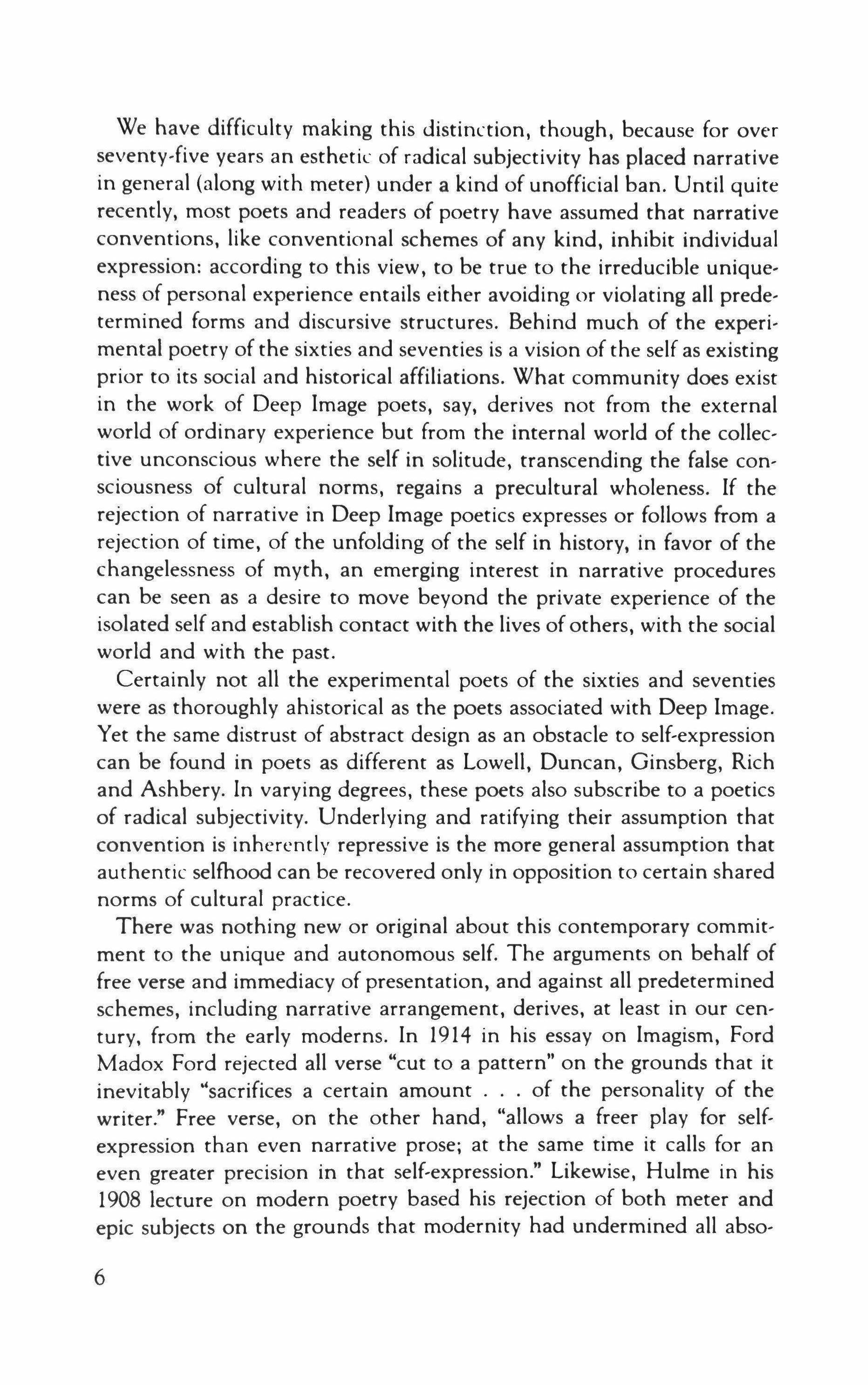
We have difficulty making this distinction, though, because for over seventy-five years an esthetic of radical subjectivity has placed narrative in general (along with meter) under a kind of unofficial ban. Until quite recently, most poets and readers of poetry have assumed that narrative conventions, like conventional schemes of any kind, inhibit individual expression: according to this view, to be true to the irreducible uniqueness of personal experience entails either avoiding or violating all predetermined forms and discursive structures. Behind much of the experimental poetry of the sixties and seventies is a vision of the self as existing prior to its social and historical affiliations. What community does exist in the work of Deep Image poets, say, derives not from the external world of ordinary experience but from the internal world of the collective unconscious where the self in solitude, transcending the false consciousness of cultural norms, regains a precultural wholeness. If the rejection of narrative in Deep Image poetics expresses or follows from a rejection of time, of the unfolding of the self in history, in favor of the changelessness of myth, an emerging interest in narrative procedures can be seen as a desire to move beyond the private experience of the isolated self and establish contact with the lives of others, with the social world and with the past.
Certainly not all the experimental poets of the sixties and seventies were as thoroughly ahistorical as the poets associated with Deep Image. Yet the same distrust of abstract design as an obstacle to self-expression can be found in poets as different as Lowell, Duncan, Ginsberg, Rich and Ashbery. In varying degrees, these poets also subscribe to a poetics of radical subjectivity. Underlying and ratifying their assumption that convention is inherently repressive is the more general assumption that authentic selfhood can be recovered only in opposition to certain shared norms of cultural practice.
There was nothing new or original about this contemporary commitment to the unique and autonomous self. The arguments on behalf of free verse and immediacy of presentation, and against all predetermined schemes, including narrative arrangement, derives, at least in our century, from the early moderns. In 1914 in his essay on Imagism, Ford Madox Ford rejected all verse "cut to a pattern" on the grounds that it inevitably "sacrifices a certain amount of the personality of the writer." Free verse, on the other hand, "allows a freer play for selfexpression than even narrative prose; at the same time it calls for an even greater precision in that self-expression." Likewise, Hulme in his 1908 lecture on modern poetry based his rejection of both meter and epic subjects on the grounds that modernity had undermined all abso-
6
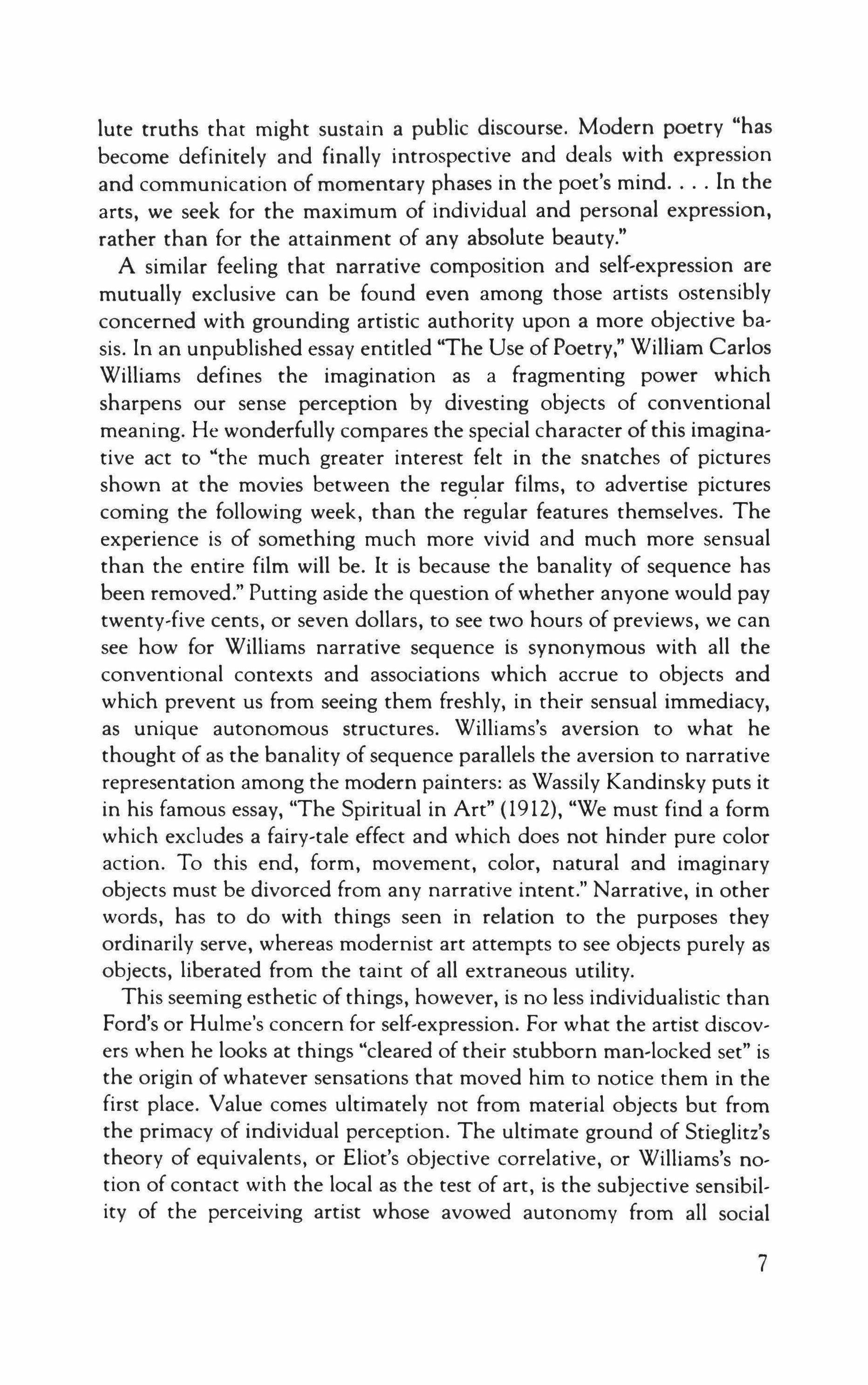
lute truths that might sustain a public discourse. Modern poetry "has become definitely and finally introspective and deals with expression and communication of momentary phases in the poet's mind In the arts, we seek for the maximum of individual and personal expression, rather than for the attainment of any absolute beauty."
A similar feeling that narrative composition and self-expression are mutually exclusive can be found even among those artists ostensibly concerned with grounding artistic authority upon a more objective basis. In an unpublished essay entitled "The Use of Poetry," William Carlos Williams defines the imagination as a fragmenting power which sharpens our sense perception by divesting objects of conventional meaning. He wonderfully compares the special character of this imaginative act to "the much greater interest felt in the snatches of pictures shown at the movies between the regular films, to advertise pictures coming the following week, than the regular features themselves. The experience is of something much more vivid and much more sensual than the entire film will be. It is because the banality of sequence has been removed." Putting aside the question of whether anyone would pay twenty-five cents, or seven dollars, to see two hours of previews, we can see how for Williams narrative sequence is synonymous with all the conventional contexts and associations which accrue to objects and which prevent us from seeing them freshly, in their sensual immediacy, as unique autonomous structures. Williams's aversion to what he thought of as the banality of sequence parallels the aversion to narrative representation among the modern painters: as Wassily Kandinsky puts it in his famous essay, "The Spiritual in Art" (1912), "We must find a form which excludes a fairy-tale effect and which does not hinder pure color action. To this end, form, movement, color, natural and imaginary objects must be divorced from any narrative intent." Narrative, in other words, has to do with things seen in relation to the purposes they ordinarily serve, whereas modernist art attempts to see objects purely as objects, liberated from the taint of all extraneous utility. This seeming esthetic of things, however, is no less individualistic than Ford's or Hulme's concern for self-expression. For what the artist discovers when he looks at things "cleared of their stubborn man-locked set" is the origin of whatever sensations that moved him to notice them in the first place. Value comes ultimately not from material objects but from the primacy of individual perception. The ultimate ground of Stieglitz's theory of equivalents, or Eliot's objective correlative, or Williams's notion of contact with the local as the test of art, is the subjective sensibility of the perceiving artist whose avowed autonomy from all social
7
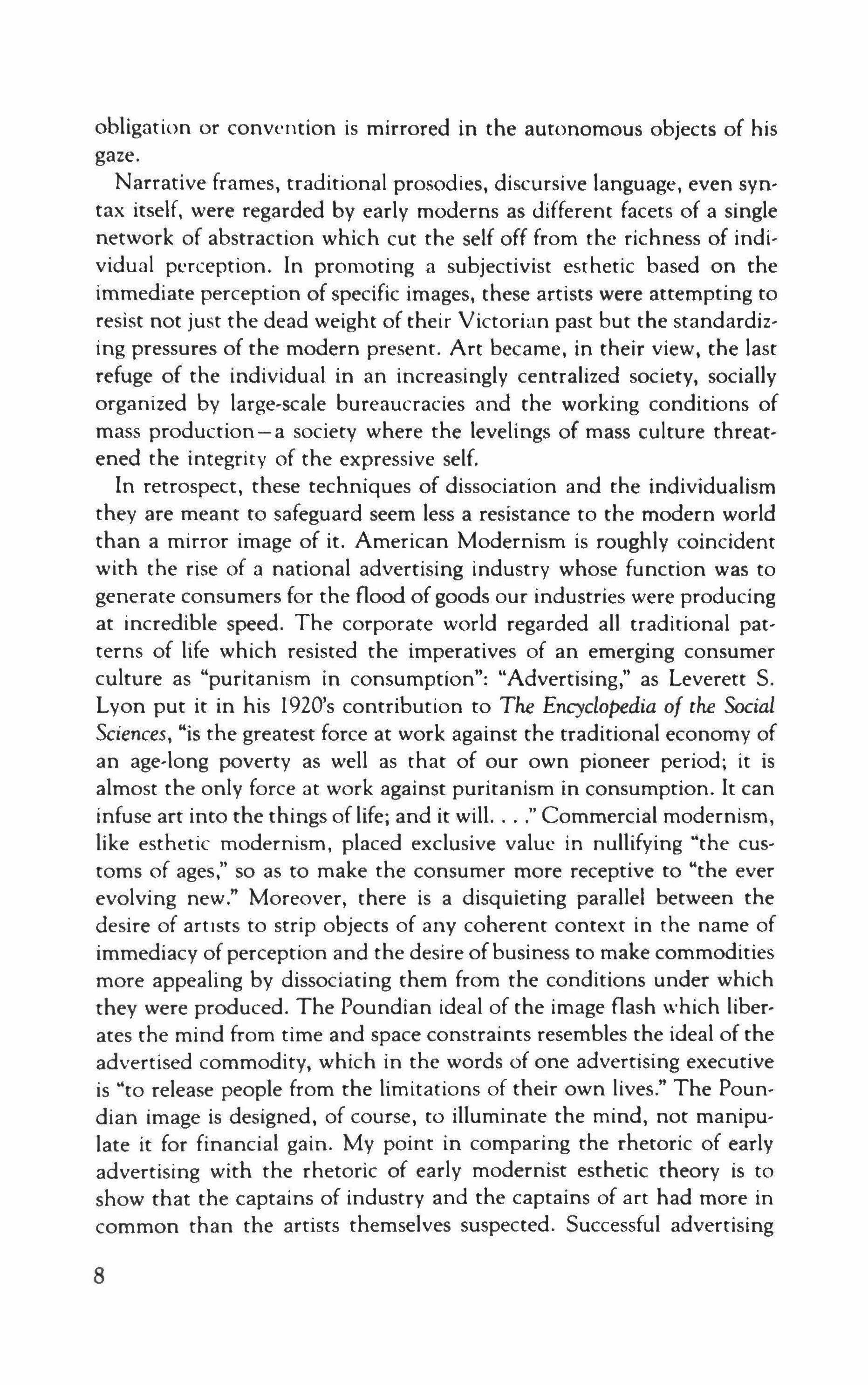
obligation or convention is mirrored in the autonomous objects of his gaze.
Narrative frames, traditional prosodies, discursive language, even syntax itself, were regarded by early moderns as different facets of a single network of abstraction which cut the self off from the richness of individual perception. In promoting a subjectivist esthetic based on the immediate perception of specific images, these artists were attempting to resist not just the dead weight of their Victorian past but the standardizing pressures of the modern present. Art became, in their view, the last refuge of the individual in an increasingly centralized society, socially organized by large-scale bureaucracies and the working conditions of mass production - a society where the levelings of mass culture threatened the integrity of the expressive self.
In retrospect, these techniques of dissociation and the individualism they are meant to safeguard seem less a resistance to the modern world than a mirror image of it. American Modernism is roughly coincident with the rise of a national advertising industry whose function was to generate consumers for the flood of goods our industries were producing at incredible speed. The corporate world regarded all traditional patterns of life which resisted the imperatives of an emerging consumer culture as "puritanism in consumption": "Advertising," as Leverett S. Lyon put it in his 1920's contribution to The Encyclopedia of the Social Sciences, "is the greatest force at work against the traditional economy of an age-long poverty as well as that of our own pioneer period; it is almost the only force at work against puritanism in consumption. It can infuse art into the things of life; and it will. Commercial modernism, like esthetic modernism. placed exclusive value in nullifying "the customs of ages," so as to make the consumer more receptive to "the ever evolving new." Moreover, there is a disquieting parallel between the desire of artists to strip objects of any coherent context in the name of immediacy of perception and the desire of business to make commodities more appealing by dissociating them from the conditions under which they were produced. The Poundian ideal of the image flash which liberates the mind from time and space constraints resembles the ideal of the advertised commodity, which in the words of one advertising executive is "to release people from the limitations of their own lives." The Poundian image is designed, of course, to illuminate the mind, not manipulate it for financial gain. My point in comparing the rhetoric of early advertising with the rhetoric of early modernist esthetic theory is to show that the captains of industry and the captains of art had more in common than the artists themselves suspected. Successful advertising
8

copy, like early modern notions of successful art, was antitraditional, anticritical, nondiscursive, nondidactic, entirely an appeal to instincts, feelings and sense perceptions. As Walter Dill Scott puts it in Influencing Men in Business (1911): "The man with the proper imagination is able to conceive of any commodity in such a way that it becomes an object of emotion to him and to those to whom he imparts his picture, and hence creates desire rather than a mere feeling of ought." (See Stuart Ewen's Captains of Consciousness, New York: McGraw-Hili, 1976.)
Many of the modernists, of course, came to feel the limitations of their early theories. Williams and Pound both attempted to develop poetic forms that would enable them to include and accommodate the heterogeneous materials of history. Pound even conceived of the Cantos in narrative terms, as "the shape of a journey which begins 'In the Dark Forest,' crosses the Purgatory of human error, and ends in the light." Yet both he and Williams, early and late, in theory if not always in practice, remained distrustful of the discursive, syntactic, narrative connections that might enact the movement of a mind through the stages of thinking, preferring instead the imagistic method of wedging image next to image, historical fragment next to historical fragment. The method of the Cantos for the most part undercuts the ambition it is meant to serve, and the poem does not "cohere."
On the other hand, the best poems by Williams, Eliot and Pound are never entirely nondiscursive, antinarrative or fragmentary. The images pure and simple of an open doorway and a maple leaf mean nothing until they are specifically connected to a world of history and grief. That is why in "Ars Poetica," one of the great unintentionally comic poems of the world, Archibald Macleish is forced to tell us what each and every image means even as he says he shouldn't have to. To the extent that "Prufrock," "Four Quartets" or "The Waste Land," books one and two of "Paterson," or "The Pisan Cantos" enact the mind in action as it attempts to clarify its historical position in the world, they carryon, by necessity, illicit relations with traditional elements of narrative.
Take, for example, Williams's justly famous poem, "By the Road to the Contagious Hospital," the first poem from Spring and All, one of his most experimental books:
By the road to the contagious hospital under the surge of the blue mottled clouds driven from the northeast - a cold wind. Beyond, the waste of broad, muddy fields brown with dried weeds, standing and fallen
9

patches of standing water the scattering of tall trees
All along the road the reddish purplish, forked, upstanding, twiggy stuff of bushes and small trees with dead, brown leaves under them leafless vines-
Lifeless in appearance, sluggish dazed spring approaches-
They enter the new world naked, cold, uncertain of all save that they enter. All about them the cold, familiar wind-
Now the grass, tomorrow the stiff curl of wildcarrot leaf
One by one objects are definedIt quickens: clarity, outline of leaf
But now the stark dignity of entrance-Still, the profound change has come upon them: rooted, they grip down and begin to awaken
The poem overall has the shape of a story, moving as it does from death to life, atomistic stasis to concerted motion, from description of discrete details to comprehension of things in complex and living relation to each other, in which the one and the many, the whole and the parts that compose it, are mutually implicated and mutually sustaining. As the story unfolds, moreover, the style itself changes in response to the changing narrative. In the pre-spring landscape of the opening three stanzas, the landscape's atomistic lifelessness is quietly suggested by the flat, merely descriptive language on the one hand and by the series of sentence fragments on the other ("patches of standing water / the scattering of tall trees"). When spring approaches, though, not only do verbs appear, joining object to object, but the language also moves from mere physical description to something more abstract and conceptual: "Lifeless in appearance, sluggish / dazed spring approaches- / They enter the new world naked The lines are as much about a change of esthetic as they are about a change of season. One can read in them a kind of tacit critique of the imagist poet's exclusive delight in the mere appearance of things, in the surfaces of sense perception. The understanding sees the metaphysical approach of spring where the eye sees only lifelessness. (These lines, in effect, look forward to "The Yachts,"
10

Williams's other great critique of an exclusively objectivist esthetic, a poem in which the eye's delight in the sensuous appearance of the yachts ["mothlike in mists"] is undercut by the mind's ability to see through that appearance to the social and political injustices which sustain it.)
As Williams moves beyond the sensory (without entirely abandoning it), he draws on a wide range of linguistic and rhetorical resources, some of which modernist literary theory had proscribed, including ideas, abstractions, personifications ("dazed spring approaches," "They enter naked, / cold, uncertain"), puns ("It quickens," "the profound change"), as well as the narrative shape implicit in the syntactical shifts from passive to active construction to suggest the passive and active nature of the changes he describes ("objects are defined - / It quickens"). The more complex language reflects a more complex vision, capable of defining objects in a kind of nominalistic purity at the same time that it connects objects to each other as different manifestations of the same general process. The exuberant energy of Williams's attention is expressed more through the syntactic arrangement of the lines than through the images. In fact, there are surprisingly few images in the second half of the poem. But notice how the arc of perception enacted by the sequence of clauses swings in chiasmatic order between general and particular terms. No sooner is spring invoked as an abstract entity than it changes into the collectivity of new growth - "they enter the new world"-which, in turn, is differentiated further into "grass," then into "the stiff curl of wildcarrot leaf"; then back again through generic "objects" to the abstract force ("It") which "quickens" them. The story played out by these stylistic changes, the turns and shifts of diction and syntax, dramatize the excitement and struggle of a mind participating in the birth it witnesses. By means of syntax the poem enacts the process of its own emergence in and through the emergence of spring.
There are also, however, extrinsic stories at work in our appreciation of the poem. "By the Road to the Contagious Hospital" is a modern pastoral. An important dimension of its meaning depends in part on our ability to situate the poem in relation to the pastoral tradition, to read it as a new chapter in the narrative of that tradition.
If most pastorals are set in some Arcadian landscape, Williams sets his by a hospital, on a barren stretch of road, where disease and waste are inescapably associated with the world into which new life will come. And while most spring poems idealize renewal, Williams sees renewal in terms of pain, struggle, vulnerability and resilience. Williams also adapts and reworks the messianic strain of the pastoral tradition, the classic exemplar of which is Virgil's "Fourth Eclogue." Virgil imagines the re-
11

establishment of the Golden Age in an idealized future while Williams suggests that the Golden Age is, as Peter Schmidt observes, "continually lost, found and lost again" (see William Carlos Williams, the Arts, and Literary Tradition, Baton Rouge: Louisiana State University Press, 1988). In playing against the expectations implicit in the tradition he inherits, Williams continues that tradition, adapting the story of it to the new conditions of the American scene. And of course there is also the subplot of the poem as an answer to "The Waste Land," which, Williams believed, had dealt a catastrophic blow to American letters. Eliot's internationalism and traditionalism, his ironic contrast of physical renewal and spiritual impoverishment, are countered in the closing lines of Williams's poem by the interweaving of moral and erotic abstractions - "the stark dignity of entrance," "the profound change" - with the physical action of gripping down and awakening, thereby investing the physical regeneration with a metaphysical, anti-Eliotic significance.
The poem, in other words, is not an autonomous structure, a purely sensory presentation of a landscape. It is rather an implied story within a matrix of stories whose intersecting arcs embrace the social and literary conditions (and this includes the past as well as the present), within which the poem was written, and within which the poem is read. But to view the poem this way is to violate many of the dichotomies so prominent in the literary theories Williams himself espouses (between past and present, tradition and self-expression, ideas and things), dichotomies which we have inherited and which have blinded us, I think, to the theory-defying richness of the work itself.
2
It should be clear from the opening section that I am not at all concerned with narrative poetry but rather with the narrative elements in poetry of any kind. I regard narrative as having more to do with a particular activity of consciousness than with technical matters, or with anecdote, or with the mere sequentiality of external happenings. Narrative involves what W. S. Di Piero calls "states of becoming," the enactment as well as imitation of action (mental or physical, emotional or intellectual) in the unfolding of the verse. The complete rendering of an action implies an arc connecting origins and ends - how I have come to do this (past) is implicit in what I am doing (present), and what I am doing is unintelligible from what I am doing it for (future). Anything in the poem which clarifies or contributes to the rendering of this action
12
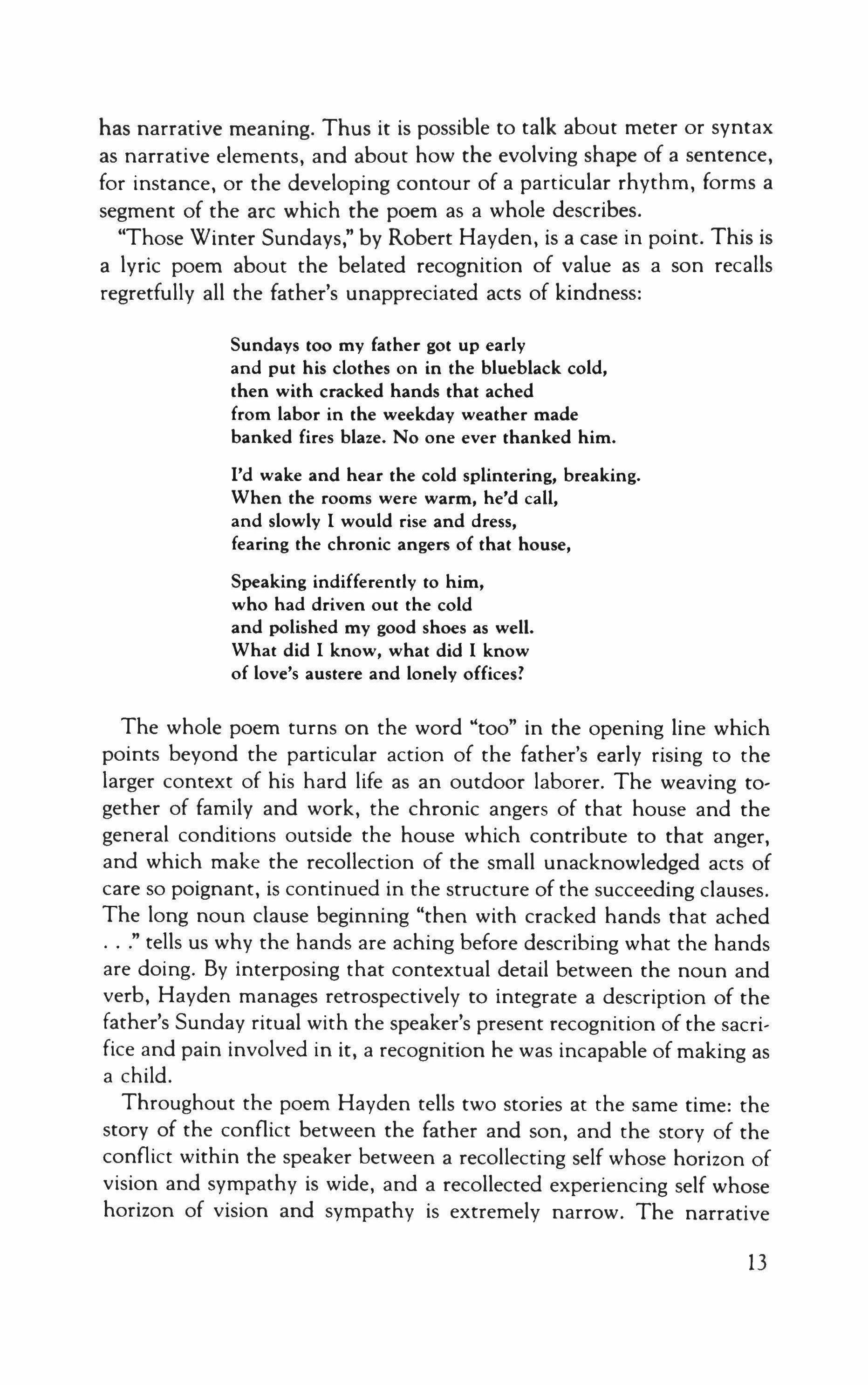
has narrative meaning. Thus it is possible to talk about meter or syntax as narrative elements, and about how the evolving shape of a sentence, for instance, or the developing contour of a particular rhythm, forms a segment of the arc which the poem as a whole describes.
"Those Winter Sundays," by Robert Hayden, is a case in point. This is a lyric poem about the belated recognition of value as a son recalls regretfully all the father's unappreciated acts of kindness:
Sundays too my father got up early and put his clothes on in the blueblack cold, then with cracked hands that ached from labor in the weekday weather made banked fires blaze. No one ever thanked him.
I'd wake and hear the cold splintering, breaking. When the rooms were warm, he'd call, and slowly I would rise and dress, fearing the chronic angers of that house,
Speaking indifferentlv to him, who had driven out the cold and polished my good shoes as well. What did I know, what did I know of love's austere and lonely offices]
The whole poem turns on the word "too" in the opening line which points beyond the particular action of the father's early rising to the larger context of his hard life as an outdoor laborer. The weaving together of family and work, the chronic angers of that house and the general conditions outside the house which contribute to that anger, and which make the recollection of the small unacknowledged acts of care so poignant, is continued in the structure of the succeeding clauses. The long noun clause beginning "then with cracked hands that ached tells us why the hands are aching before describing what the hands are doing. By interposing that contextual detail between the noun and verb, Hayden manages retrospectively to integrate a description of the father's Sunday ritual with the speaker's present recognition of the sacrifice and pain involved in it, a recognition he was incapable of making as a child.
Throughout the poem Hayden tells two stories at the same time: the story of the conflict between the father and son, and the story of the conflict within the speaker between a recollecting self whose horizon of vision and sympathy is wide, and a recollected experiencing self whose horizon of vision and sympathy is extremely narrow. The narrative
13

artistry appears not in the imagery, which as in "By the Road to the Contagious Hospital" is apt without being especially striking; but rather in the movement of the sentences as they shift almost searnlesslv back and forth between these two perspectives. The penultimate sentence, for instance, drawn over several lines, enacts both the estrangements of the past and the present feeling of connection: it isolates the father and son by placing their actions on separate lines, and yet it joins the two together by making them parts of a single sentence. The rhythm too participates in this drama, shifting as the perspective shifts. The regularity of the opening two lines, alternating between trochaic and iambic cadences, suggests the daily, repetitive nature of the father's loving attentions. When the sentence moves beyond the household to account for why the cracked hands ached, the alliteration and heavy stresses roughen the cadence to suggest the speaker's present knowledge of "love's austere and lonely offices," and of the social and economic conditions which inform and constrain that love.
3
A commitment to narrative presupposes that feeling is unintelligible apart from source or motive on the one hand, and destination or purpose on the other. Which is to say, the complete articulation of feeling implies a movement, not a stasis, an arising from as well as a going toward. This movement, moreover, can take any number of forms, from the linear unfolding of dormancy to waking in "By the Road to the Contagious Hospital," to the spiraling backward motion in "Those Winter Sundays" from present regret to past estrangement, from effect to cause. In whatever direction, the life of narrative begins with the desire to move between states of feeling so as to understand and articulate the community of relations which obtains when the poet asks why, not how, he feels. As such, he commits himself to a poetry of discrimination and judgment which does not exclude intensity of feeling but does subordinate that intensity to the tracing of the larger context within which it evolves.
Those who distrust narrative organization will counter that all feeling, and certainly the most profound feeling, is ultimately indeterminate, and that the "closure" of narrative forms inevitably falsifies the "radical openness" of life. This argument, however, depends on a rigid dichotomy between form and process, openness and closure, and a tacitly absolutist moral program that regards openness as an a priori good, and
14
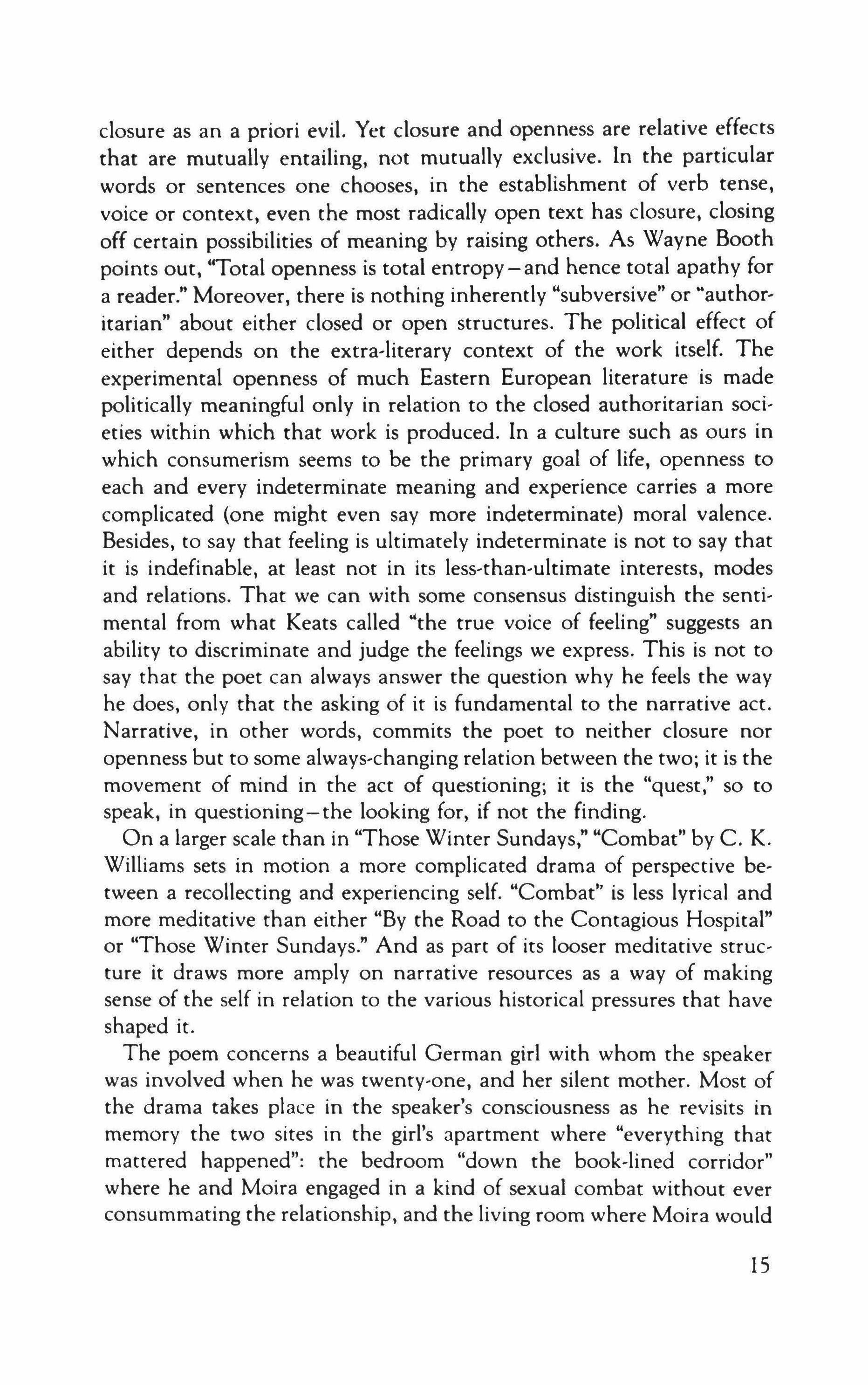
closure as an a priori evil. Yet closure and openness are relative effects that are mutually entailing, not mutually exclusive. In the particular words or sentences one chooses, in the establishment of verb tense, voice or context, even the most radically open text has closure, closing off certain possibilities of meaning by raising others. As Wayne Booth points out, "Total openness is total entropy-and hence total apathy for a reader." Moreover, there is nothing inherently "subversive" or "authoritarian" about either closed or open structures. The political effect of either depends on the extra-literary context of the work itself. The experimental openness of much Eastern European literature is made politically meaningful only in relation to the closed authoritarian societies within which that work is produced. In a culture such as ours in which consumerism seems to be the primary goal of life, openness to each and every indeterminate meaning and experience carries a more complicated (one might even say more indeterminate) moral valence. Besides, to say that feeling is ultimately indeterminate is not to say that it is indefinable, at least not in its less-than-ultimate interests, modes and relations. That we can with some consensus distinguish the sentimental from what Keats called "the true voice of feeling" suggests an ability to discriminate and judge the feelings we express. This is not to say that the poet can always answer the question why he feels the way he does, only that the asking of it is fundamental to the narrative act. Narrative, in other words, commits the poet to neither closure nor openness but to some always-changing relation between the two; it is the movement of mind in the act of questioning; it is the "quest," so to speak, in questioning-the looking for, if not the finding.
On a larger scale than in "Those Winter Sundays," "Combat" by C. K. Williams sets in motion a more complicated drama of perspective between a recollecting and experiencing self. "Combat" is less lyrical and more meditative than either "By the Road to the Contagious Hospital" or "Those Winter Sundays." And as part of its looser meditative structure it draws more amply on narrative resources as a way of making sense of the self in relation to the various historical pressures that have shaped it.
The poem concerns a beautiful German girl with whom the speaker was involved when he was twenty-one, and her silent mother. Most of the drama takes place in the speaker's consciousness as he revisits in memory the two sites in the girl's apartment where "everything that mattered happened": the bedroom "down the book-lined corridor" where he and Moira engaged in a kind of sexual combat without ever consummating the relationship, and the living room where Moira would
15
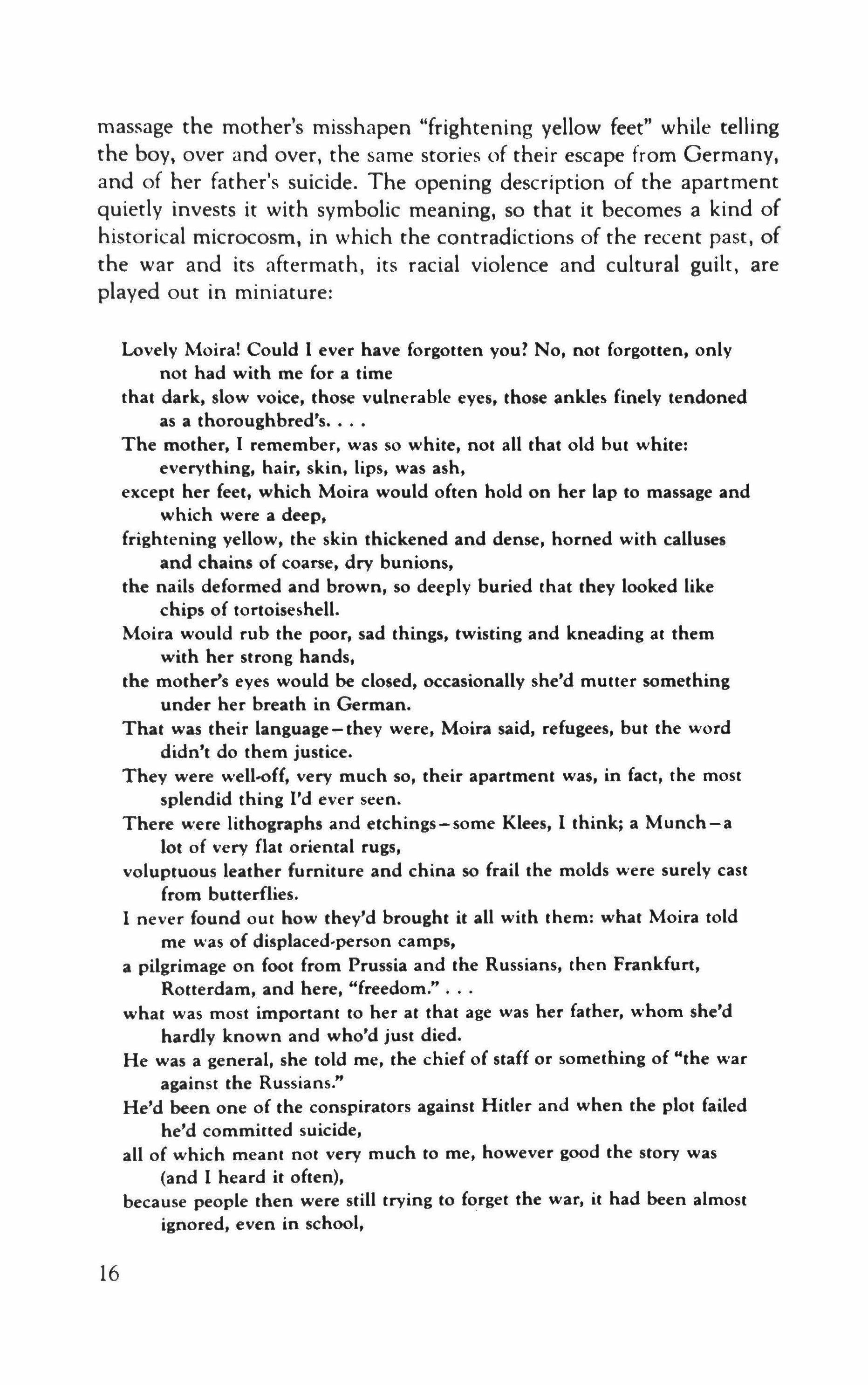
massage the mother's misshapen "frightening yellow feet" while telling the boy, over and over, the same stories of their escape from Germany, and of her father's suicide. The opening description of the apartment quietly invests it with symbolic meaning, so that it becomes a kind of historical microcosm, in which the contradictions of the recent past, of the war and its aftermath, its racial violence and cultural guilt, are played out in miniature:
Lovely Moira! Could I ever have forgotten you? No, not forgotten, only not had with me for a time that dark, slow voice, those vulnerable eyes, those ankles finely tendoned as a thoroughbred's
The mother, I remember, was so white, not all that old but white: everything, hair, skin, lips, was ash, except her feet, which Moira would often hold on her lap to massage and which were a deep, frightening yellow, the skin thickened and dense, horned with calluses and chains of coarse, dry bunions, the nails deformed and brown, so deeply buried that they looked like chips of tortoiseshell.
Moira would rub the poor, sad things, twisting and kneading at them with her strong hands, the mother's eyes would be closed, occasionally she'd mutter something under her breath in German.
That was their language-they were, Moira said, refugees, but the word didn't do them justice.
They were well-off, very much so, their apartment was, in fact, the most splendid thing I'd ever seen.
There were lithographs and etchings-some Klees, I think; a Munch-a lot of very flat oriental rugs, voluptuous leather furniture and china so frail the molds were surely cast from butterflies.
I never found out how they'd brought it all with them: what Moira told me was of displaced-person camps, a pilgrimage on foot from Prussia and the Russians, then Frankfurt, Rotterdam, and here, "freedom." what was most important to her at that age was her father, whom she'd hardly known and who'd just died.
He was a general, she told me, the chief of staff or something of "the war against the Russians."
He'd been one of the conspirators against Hider and when the plot failed he'd committed suicide, all of which meant not very much to me, however good the story was (and I heard it often), because people then were still trying to forget the war, it had been almost ignored, even in school,
16

and I had no context much beyond what my childhood comic books had given me to hang any of it on.
This passage introduces details the speaker will return to, each time with greater comprehension as he places his adolescent self in relation to the historical forces he was blind to at the time and yet which choreographed almost everything he felt, did and perceived. Everything in the apartment isolates the mother and daughter from the speaker. The apartment itself, its exquisite furnishings and high-cultural artifacts, its "book-lined corridor," stands in contrast to the boy whose knowledge of history derives primarily from "comic books." And yet the air of refinement implicit in their possessions is complicated by the stories Moira tells about her and her mother's pilgrimage to "freedom," their old life in Germany, and her father's involvement in the plot to assassinate Hitler.
Ironically, as Moira's stories grow more detailed, more poignant, the boy grows more distracted, "hardly listening anyway by then, one hand on a thigh, the other stroking, / with such compassion, such generous concern, such cunning twenty-one-year-old commiseration, / her hair, her perfect hair, then the corner of her mouth, then, so far away, the rich rim of a breast."
I was so distracted that I couldn't even get their name right and Moira's little joke before she'd let me take her clothes 0(( was that we'd have lessons, "Von C .• ," "No, Von C
Later, when I was studying the holocaust, I found it again, the name, Von C in Shirer's Reich:
it had, indeed, existed, and it had, yes, somewhere on the Eastern front, blown its noble head 0((.
I wasn't very moved. I wasn't in that city anymore, I'd ceased long before ever to see them, and besides, I'd changed by then - I was more aware of history and was beginning to realize, however tardily, that one's moral structures tended to be air unless you grounded them in real events.
Everything I did learn seemed to negate something else, everything was more or less up for grabs, but the war, the Germans, all I knew about that nowno, never: what a complex triumph to have a nation, all of it, beneath you, what a splendid culmination for the adolescence of one's ethics!
The irony with which he earlier circumscribes his adolescent longing (hardly listening to her story while his hand strokes with "such compassion, such generous concern her hair, her perfect hair "), he now
17

exercises on his later, newly awakened ethical awareness. The passage is crucial, though, for the poem is really about the poet's ethical education, which culminates in the complicated and inclusive vision that the poem overall enacts. If as a boy he sees Moira narcissistically only as an object of desire, and then later, with no less narcissism, as an object of condescension ("I reformulated her-them-forgave them, held them fondly, with a heavy lick of condescension, in my system" - as if his ethical adolescence were just a slight sublimation of his adolescent sexuality), he now begins to see her and her mother in a much more baffling and nuanced light. Ethical maturity, he implies, consists not in the mechanical and self-serving act of placing people in one's "system," in having "a nation, all of it, beneath you"; rather, it consists in the ability to open up the past to questioning. While Moira seems more beautiful now in memory than she did when he was a boy "and quibbled everything," he can also see now what escaped him then, that there were "promises of dimness, vaults and hidden banks of coolness" in the way she engineered his sexual advances, imitating all the sounds and gestures of lovemaking "while nothing would be happening, nothing, that is, in the way I'd mean it now." Now as he broods over the scene, "the three of us in place, the conversation that seemed sometimes like a ritual, eternally recurring," he brings more and more external history to bear on how he sees himself in relation to these women:
It's strange now, doing it again, the business of the camps and slaughters, the quick flicker of outrage that hardly does its work anymore, all the carnage, all our own omissions interposed, then those two, in their chambers, correct, aristocratic, even with the old one's calcifying feet and the younger one's intensities-those eyes that pierce me still from that far back with jolts of longing.
I frame the image: the two women, the young man, they, poised, gracious, he smoldering with impatience, and I realize I've never really asked myself what could she, or they, possibly have wanted of me?
What am I doing in that room, a teacup trembling on my knee, that odd, barbed name mangled in my mouth?
The long sentence that begins this passage brings all of the elements of the poem together in an arc which moves from the historical to the personal, from the camps and slaughters to the girl, and ironically from lesser to greater intensity of feeling, from the faint flicker of outrage at the Holocaust "that hardly does its work anymore," to Moira's eyes "that
18
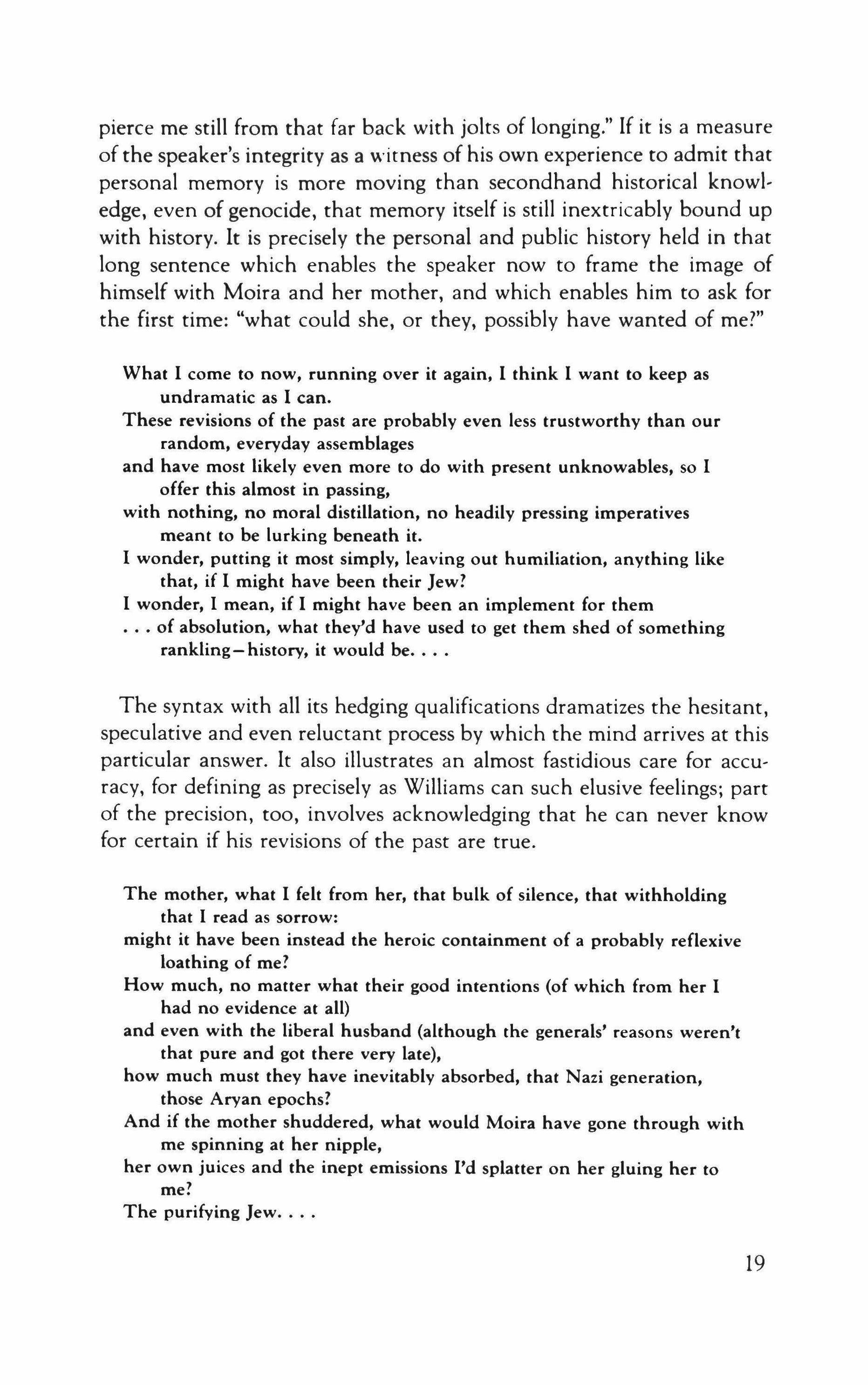
pierce me still from that far back with jolts of longing." If it is a measure of the speaker's integrity as a witness of his own experience to admit that personal memory is more moving than secondhand historical knowledge, even of genocide, that memory itself is still inextricably bound up with history. It is precisely the personal and public history held in that long sentence which enables the speaker now to frame the image of himself with Moira and her mother, and which enables him to ask for the first time: "what could she, or they, possibly have wanted of me?"
What I come to now, running over it again, I think I want to keep as undramatic as I can.
These revisions of the past are probably even less trustworthy than our random, everyday assemblages and have most likely even more to do with present unknowables, so I offer this almost in passing, with nothing, no moral distillation, no headilv pressing imperatives meant to be lurking beneath it.
I wonder, putting it most simply, leaving out humiliation, anything like that, if I might have been their Jew?
I wonder, I mean, if I might have been an implement for them of absolution, what they'd have used to get them shed of something rankling - history, it would be
The syntax with all its hedging qualifications dramatizes the hesitant, speculative and even reluctant process by which the mind arrives at this particular answer. It also illustrates an almost fastidious care for accuracy, for defining as precisely as Williams can such elusive feelings; part of the precision, too, involves acknowledging that he can never know for certain if his revisions of the past are true.
The mother, what I felt from her, that bulk of silence, that withholding that I read as sorrow: might it have been instead the heroic containment of a probably reflexive loathing of me?
How much, no matter what their good intentions (of which from her I had no evidence at all) and even with the liberal husband (although the generals' reasons weren't that pure and got there very late), how much must they have inevitably absorbed, that Nazi generation, those Aryan epochs?
And if the mother shuddered, what would Moira have gone through with me spinning at her nipple, her own juices and the inept emissions I'd splatter on her gluing her to me?
The purifying
Jew •... 19

The judgment that animates these lines is a complicated mixture of admiration and contempt. By establishing the historical pressures which inform Moira's and her mother's attitudes and actions, Williams is able to perceive an almost heroic dimension to the mother's silence without at the same time excusing the racism he imagines might be implicit in it. And yet he cannot revise his understanding of their motives without revising his understanding of his own. What until this point appears as the callow self-absorption of adolescent sexuality, his desire to have from Moira "what I had to have," now takes on a more sinister and more humiliating cast. As "the purifying Jew," the speaker realizes he was all along a figure in their history, with the disquieting implication that he may have sensed this and in his infatuation "gone along with them anyway":
All the indignities I let be perpetrated on me while I lolled in that luxurious detention: could I really have believed they only had to do with virtue, maidenhood, or even with, I remember thinking-
I came this close - some intricate attempt Moira might be making to redeem a slight on the part of the mother?
Or might inklings have risen and might I, in my infatuation, have gone along with them anyway?
I knew something, surely: I'd have had to. What I really knew, of course, I'll never know again.
Beautiful memory, most precious and most treacherous sister: what temples must we build for you.
And even then, how belatedly you open to us; even then, with what exuberance you cross us.
I want to offer here, "almost in passing with no moral distillation lurking beneath it," that the speaker's vulnerability to this sort of manipulation and self-deception is a function more of his American [ewishness than of his [ewishness per se, of his being a product of a culture that was "still trying to forget the war," someone whose knowledge of the war came primarily from "childhood comic books." His characteristically American ignorance of history - his own as well as Moira's-facilitated his participation in her historical drama.
The long lines and longer, almost fussily elaborated sentences that shift continually throughout the poem from adolescent to adult perspective, from Moira and the boy to Moira and the mother, from description to speculation, from scene to context, present to past, simultaneously enable the speaker both to reconstruct the past and to call the act of reconstruction into question. "Memory" is treacherous insofar as "our
20
revisions of the past" are conditioned by "present unknowables," by the fluid relations of public and private history, much of which is either inaccessible or belatedly accessible to consciousness. Yet memory is also precious; it is all we have to track our personal and cultural evolution. The commitment to a faithful rendering of the past-implicit in the novelistic specificity of detail-together with the understanding that such renderings are unreliable-implicit in the speculative syntax with its reversals and qualifications- is the ultimate expression of the speaker's ethical maturity. We see ourselves as we are now in and through the quality of attention enacted in our stories of the past. Hence, the need both for the "closure" of a frame and for the openness of speculation that can question what the frame distorts or excludes.
If one were to rewrite "Combat" according to an Imagist or Deep Image esthetic, removing "the banality of sequence" in favor of the nondiscursive, nonnarrative presentation of discrete sense impressions and fragments of memory, one would destroy the poem's life. As the poem unfolds, the big lines, the flexible language comprising images and abstractions, high diction and low, and the long sentences moving so restlessly through the lines, all trace the mental action of sorting through, testing and discriminating the materials of experience with the energy of thought. The image may well be the most expressive and intense feature of poetry, and a poetry composed purely of discontinuous images may achieve a degree of intensity not available to poems like "Combat." Yet what such poetry gains in intensity it loses in the power to weigh and determine the significance of what it presents. Finally, to say that images are the most intense elements of poetry is not to say that other elements are any less important. As A. C. Bradley once remarked, refuting Poe's belief that a long narrative poem wasn't, strictly speaking, poetry, "Naturally, in any poem not quite short, there must be many variations and grades of poetic intensity; but to represent the differences of these numerous grades as a simple antithesis between pure poetry and mere prose is like saying that, because the eyes are the most expressive part of the face, the rest of the face expresses nothing. To hold, again, that this variation of intensity is a defect is like holding that a face would be more beautiful if it were all eyes

"By the Road to the Contagious Hospital," "Those Winter Sundays" and "Combat" illustrate in different ways my second definition of narrative
4
21

as the implicit stylistic and thematic stories enacted by the language and movement of the verse. Though this deeper sense of narrative is also present in Elizabeth Bishop's "The Moose," this poem is distinguished from the others by its making storytelling itself an important part of its subject. "The Moose" is a poem of stories as well as a poem about stories, or more precisely about how even when the stories we tell are fraught with "deaths, deaths and sicknesses," there is still something in the communal act of telling stories that is life-affirming and life-sustaining.
As in "Combat," very little happens in the poem. Beyond the startling appearance of the moose in the concluding lines, the drama here is reflected in the speaker's perception of the changing landscape seen from the window of a bus as it journeys east to west, from Nova Scotia through New Brunswick, and in the interplay between the narrative frame which the bus journey provides, and the stories which the speaker overhears. In effect, Bishop establishes two narrative movements-the literal movement of the bus (which is also a movement from the known to the unknown, and temporally speaking from present to future), and the countermovement enacted by the stories, from west to east, present to past, strangeness to familiarity.
From narrow provinces of fish and bread and tea, home of the long tides where the bay leaves the sea twice a day and takes the herrings long rides, where if the river enters or retreats in a wall of brown foam depends on if it meets the bay coming in, the bay not at home; where, silted red, sometimes the sun sets facing a red sea, and others, veins the flats' lavender, rich mud in burning rivulets;
on red, gravelly roads, down rows of sugar maples, past clapboard farmhouses and neat, clapboard churches,
22
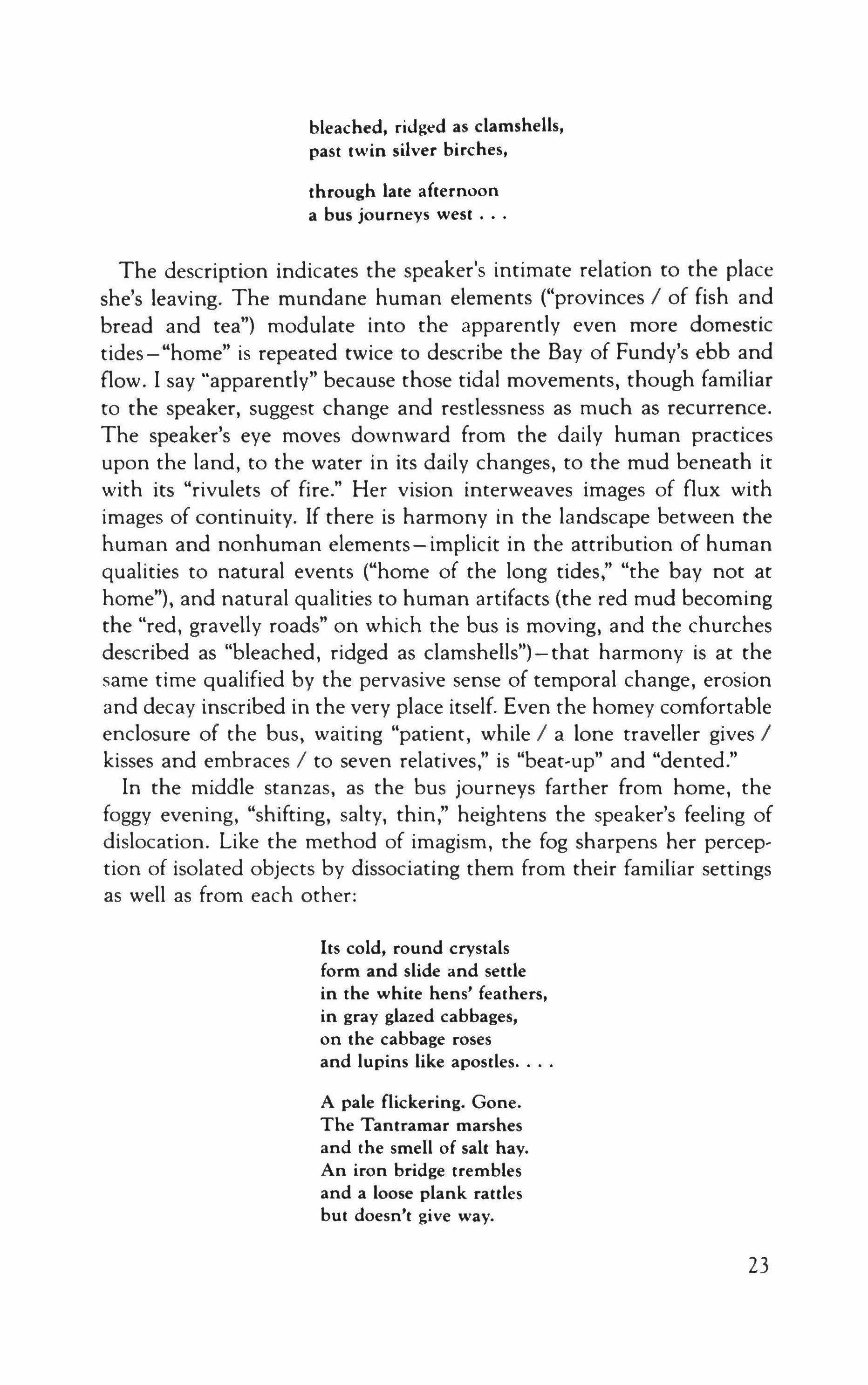
bleached, ridged as clamshells, past twin silver birches, through late afternoon a bus journeys west
The description indicates the speaker's intimate relation to the place she's leaving. The mundane human elements ("provinces / of fish and bread and tea") modulate into the apparently even more domestic tides - "home" is repeated twice to describe the Bay of Fundy's ebb and flow. I say "apparently" because those tidal movements, though familiar to the speaker, suggest change and restlessness as much as recurrence. The speaker's eye moves downward from the daily human practices upon the land, to the water in its daily changes, to the mud beneath it with its "rivulets of fire." Her vision interweaves images of flux with images of continuity. If there is harmony in the landscape between the human and nonhuman elements-implicit in the attribution of human qualities to natural events ("home of the long tides," "the bay not at home"), and natural qualities to human artifacts (the red mud becoming the "red, gravelly roads" on which the bus is moving, and the churches described as "bleached, ridged as clamshells") - that harmony is at the same time qualified by the pervasive sense of temporal change, erosion and decay inscribed in the very place itself. Even the homey comfortable enclosure of the bus, waiting "patient, while / a lone traveller gives / kisses and embraces / to seven relatives," is "beat-up" and "dented."
In the middle stanzas, as the bus journeys farther from home, the foggy evening, "shifting, salty, thin," heightens the speaker's feeling of dislocation. Like the method of imagism, the fog sharpens her perception of isolated objects by dissociating them from their familiar settings as well as from each other:
Its cold, round crystals form and slide and settle in the white hens' feathers, in gray glazed cabbages, on the cabbage roses and lupins like apostles
A pale flickering. Gone. The Tantramar marshes and the smell of salt hay. An iron bridge trembles and a loose plank rattles but doesn't give way.
23
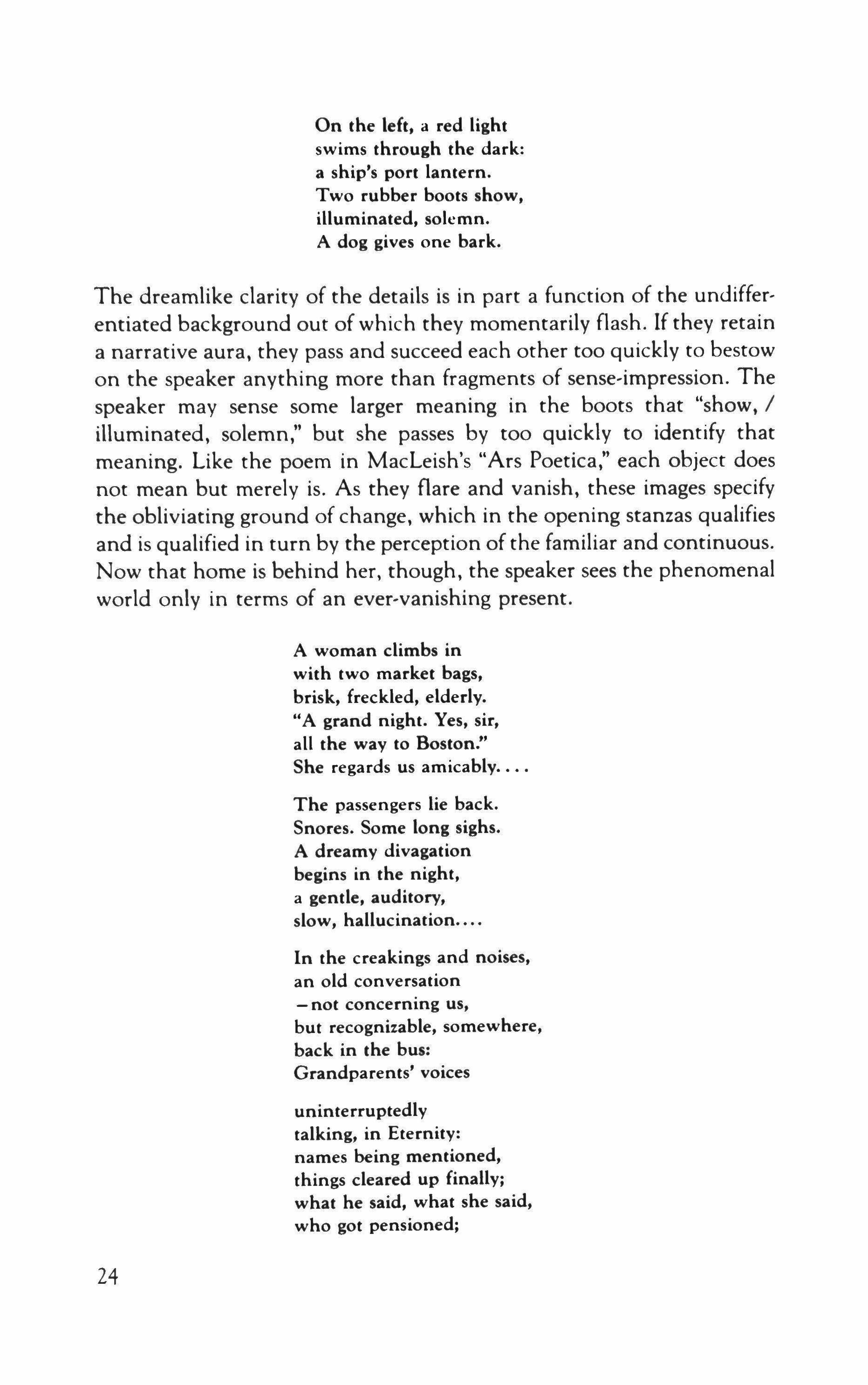
On the left, a red light swims through the dark: a ship's port lantern. Two rubber boots show, illuminated, solemn. A dog gives one bark.
The dreamlike clarity of the details is in part a function of the undifferentiated background out of which they momentarily flash. If they retain a narrative aura, they pass and succeed each other too quickly to bestow on the speaker anything more than fragments of sense-impression. The speaker may sense some larger meaning in the boots that "show, / illuminated, solemn," but she passes by too quickly to identify that meaning. Like the poem in Macl.eish's "Ars Poetica," each object does not mean but merely is. As they flare and vanish, these images specify the obliviating ground of change, which in the opening stanzas qualifies and is qualified in turn by the perception of the familiar and continuous. Now that home is behind her, though, the speaker sees the phenomenal world only in terms of an ever-vanishing present.
A woman climbs in with two market bags, brisk, freckled, elderly. "A grand night. Yes, sir, all the way to Boston." She regards us amicably
The passengers lie back. Snores. Some long sighs. A dreamy divagation begins in the night, a gentle, auditory, slow, hallucination
In the creakings and noises, an old conversation - not concerning us, but recognizable, somewhere, back in the bus: Grandparents' voices uninterruptedly talking, in Eternity: names being mentioned, things cleared up finally; what he said, what she said, who got pensioned;
24
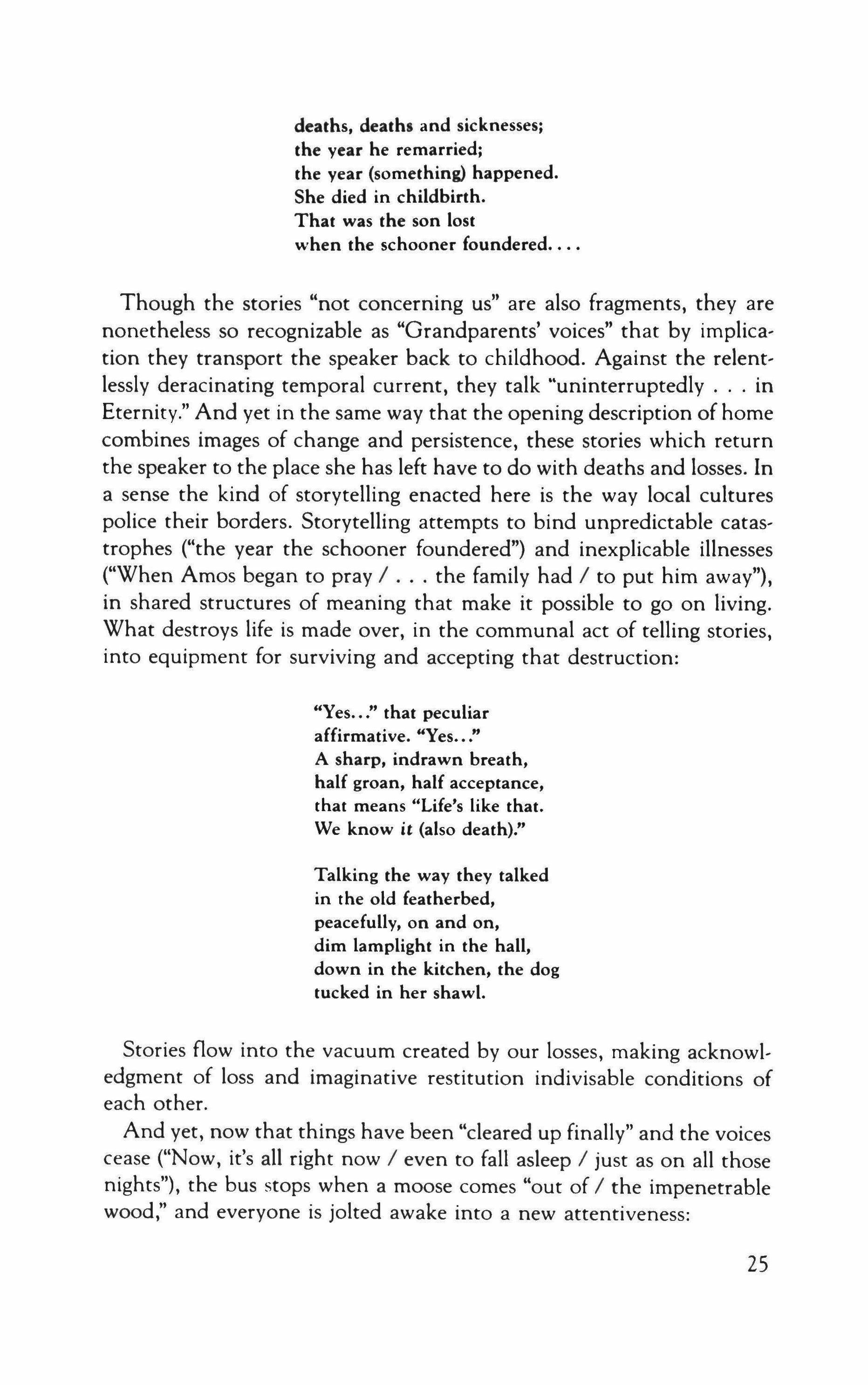
deaths, deaths and sicknesses; the year he remarried; the year (something) happened. She died in childbirth. That was the son lost when the schooner foundered
Though the stories "not concerning us" are also fragments, they are nonetheless so recognizable as "Grandparents' voices" that by implication they transport the speaker back to childhood. Against the relentlessly deracinating temporal current, they talk "uninterruptedly in Eternity." And yet in the same way that the opening description of home combines images of change and persistence, these stories which return the speaker to the place she has left have to do with deaths and losses. In a sense the kind of storytelling enacted here is the way local cultures police their borders. Storytelling attempts to bind unpredictable catastrophes ("the year the schooner foundered") and inexplicable illnesses ("When Amos began to pray / the family had / to put him away"), in shared structures of meaning that make it possible to go on living. What destroys life is made over, in the communal act of telling stories, into equipment for surviving and accepting that destruction:
"Yes " that peculiar affirmative. "Yes ,"
A sharp, indrawn breath, half groan, half acceptance, that means "Life's like that. We know it (also death)."
Talking the way they talked in the old featherbed, peacefully, on and on, dim lamplight in the hall, down in the kitchen, the dog tucked in her shawl.
Stories flow into the vacuum created by our losses, making acknowledgment of loss and imaginative restitution indivisable conditions of each other.
And yet, now that things have been "cleared up finally" and the voices cease ("Now, it's all right now / even to fall asleep / just as on all those nights"), the bus stops when a moose comes "out of / the impenetrable wood," and everyone is jolted awake into a new attentiveness:
25

Towering, antlerless, high as a church, homely as a house (or, safe as houses). A man's voice assures us "Perfectly harmless
Some of the passengers exclaim in whispers, childishly, softly, "Sure are big creatures." "It's awful plain." "Look! It's a she!"
Taking her time, she looks the bus over, grand, otherworldly. Why, why do we feel (we all feel) this sweet sensation of joy?
The moose incarnates the unpredictable which up to now has taken mostly catastrophic forms in the stories that the speaker overhears. If life surprises us with sorrow, it can surprise too with joy, which happily prevents the stories that we tell from clearing things up in any final or absolute way. The stories console and unify the people on the bus by addressing strictly human matters, whereas this encounter with the moose brings everyone into a community of joy that embraces more than the human, moving beyond the bus to include the natural world around it. In this light it is possible to see the bus as a symbol of human consciousness, "dented beat-up," bearing the marks of its temporal journey, yet open to the new and surprising, enclosed but not cut off from the mysteries of nature. Like the dog "tucked in her shawl," the moose is a feminine presence, "plain," "safe as houses," but also "otherworldly," "high as a church." The moose, too, is a natural version of the woman whose entrance in the bus initiates the storytelling. The adjective "grand" in relation to the moose echoes the woman's colloquial expression, "A grand night," linking the two, as if the moose's appearance were answering the woman's "amiable" openness to the night and its foggy mysteries. In combining the domestic and the strange, the moose embodies Bishop's vision of the sublime, not as an estranging presence but as something which despite or maybe even because of its difference nurtures a sense of mysterious kinship. But this encounter is only a moment in a longer journey and is quickly absorbed into the
26
past, becoming one more story in a life of stories as the bus continues and "a dim / smell of moose" gives way to "an acrid / smell of gasoline."

In Habits of the Heart: Individualism and Commitment in American Life (Berkeley: University of California Press, 1985), Robert Bellah characterizes the bureaucratic corporate structure of American society as a culture of separation which has fostered the belief in a radically unencumbered and autonomous self:
The most distinctive aspect of twentieth-century American society is the division of life into a number of separate functional sectors: home and workplace, work and leisure, white collar and blue collar, public and private. This division suited the needs of the bureaucratic industrial corporations that provided the model for our preferred means of organizing society by the balancing and linking of sectors as "departments" in a functional whole, as in a great business enterprise.
If the sectoral structure of contemporary life has helped create a society that is "vastly more interrelated and integrated economically, technically and functionally," it has also made it increasingly difficult for the individual to "understand himself and his activities as interrelated in morally meaningful ways with those of other, different Americans." "Instead of directing cultural and individual energies toward relating the self to its larger context," the culture of separation "urges a strenuous effort to make of our particular segment of life a small world of its own."
The separation of a public sphere of competition and professional advancement from a private sphere of leisure and consumption is also reflected in the separation of intellectual activity into specialized autonomous disciplines, each with its own mode of inquiry, its own set of problems, its own ends abstracted from the ends of other disciplines as well as from the broader questions of moral or social consequences. Not surprisingly, this specializing tendency has been as evident in the arts as in industry. If the majority of modernist poets have attempted to restrict poetry to a purely discontinuous flow of images and symbols, the majority of my contemporaries have devoted their attentions exclusively to the personal expression of private experience, making themselves, in effect, experts of sensibility, with the same narrowness of focus as the economist who views all social problems through a strictly quantitative lens of benefits and costs, or the behavioral scientist whose strictly
5
27

physiological perspective enables him to purify human action of any psychological intention, or the doctor whose strictly biomechanical concerns enable him to say, "The operation was a success, though the patient died."
One of the more encouraging developments in the postmodern period is the desire on the part of many scholars and intellectuals to dissolve the disciplinary boundaries of their respective fields. This interdisciplinary impulse has led in many cases to the recognition that constructing or attempting to construct a more inclusive knowledge of experience involves not just using the insights of other disciplines but forming those insights into a narrative that can relate the present to the past in useful and illuminating ways. In the appendix to Habits of the Heart, for instance, Bellah argues for a new kind of social science concerned with the whole of society, one that would integrate a sense of history with the specialized methods of empirical research. What that historical sense would supply, he says, is not merely information about the past, "but some idea of how we have gotten from the past to the present, in short, a narrative. Narrative is a primary and powerful way by which to know about a whole."
Scholars, intellectuals and professionals in other fields are also drawing on narrative as a way of linking their specialized pursuits to the general culture. In After Virtue (Notre Dame: University of Notre Dame Press, 1984), Alasdair Maclntvre argues that every moral philosophy has some particular sociology as its counterpart; insofar as moral concepts are socially embedded in particular traditions and practices which in turn have particular histories, we cannot understand those concepts apart from the story or narrative of the culture that creates them: "We are, whether we acknowledge it or not, what the past has made us and cannot eradicate from ourselves, even in America, those parts of ourselves which are formed by our relationship to each formative stage in our history." Even in the field of medicine, there are signs of growing impatience with the purely mechanical understanding of disease and treatment, dissociated from a patient's life history. In The Illness Narratives (New York: Basic Books, 1988), Dr. Arthur Kleinman demonstrates how the stories that patients tell about their chronic illness contribute "to the experience of symptoms and suffering." "The illness narrative," he says, "is a story the patient tells, and significant others retell, to give coherence to the distinctive events and long-term course of suffering. The plot lines, core metaphors, and rhetorical devices that structure the illness narrative are drawn from cultural and personal models for arranging experiences in meaningful ways and for effectively communicating
28

those meanings." To the extent that these stories shape and create experience over the long course of a chronic illness, the doctor must make the empathic interpretation of those stories an important feature of his clinical care. One finds the same desire to relate biomedical dysfunctions to the whole of a patient's character in the work Oliver Sacks has done with patients suffering from neurological disorders such as postencephalitic Parkinsonism and Tourette's syndrome (see Awakenings, Garden City, NY: Doubleday, 1974, and The Man Who Mistook His Wife for a Hat, New York: Summit Books, 1985). Like Kleinman, Sacks uses storytelling as a way of practicing what he calls a "romantic biology," the recognition of the indivisibility of body, character and history. In Awakenings especially, he demonstrates how his patients' responses to chemotherapy are conditioned as much by their sense of being in the world, by the quality of their relationships and attitudes, as by their physiological makeup. One cannot therefore fully understand the course of an illness apart from the course of a life history.
The resuscitation of narrative by poets and artists in general parallels this emerging spirit of narrative in the general culture. It represents a serious rethinking of the particularly American belief in the autonomy of the individual and of the culture of separation which has fostered that belief. If much of our recent poetry can be characterized as the presentation of isolated "moments" of individual perception, poets such as C. K. Williams, Frank Bidart, Robert Pinsky, W. S. Dr Piero, James McMichael, Ann Winters, Eleanor Wilner and Mary Kinzie (and many others) are recognizing that those "moments" are part of a transpersonal historical continuum which gives those moments their particular resonance and shape.
Narrative arises with the recognition that we are bearers of history. To see ourselves as embedded in the various traditions we inherit and transform, individually and collectively, in the course of living is to see life as a series of intersecting stories in which the self is simultaneously authored and authoring. As Alasdair MacIntyre remarks, "We enter a stage which we did not design, and we find ourselves part of an action that was not of our making. Each of us being a main character in his own drama plays subordinate parts in the drama of others, and each drama constrains the others." "Those Winter Sundays" and "Combat" illustrate the extent to which, in MacIntyre's words again, "the narrative of anyone life is part of an interlocking set of narratives." The personal drama they enact is made intelligible only in relation to the drama of other lives as well as to the social and cultural stage on which those lives
29

are acted, a stage which is, in turn, an effect of all the stories which precede and circumscribe each speaker's sense of who he is.
Again, this does not mean that the stories we tell are ever incontestable or absolutely true. As C. K. Williams reminds us in "Combat," our knowledge of who we are and where we come from is provisional at best. The legacies we inherit are too multifaceted ever to be completely comprehended, and the unanticipated ways in which our lives evolve change our perception of those legacies and the uses to which we put them. The responsible stories, the most inclusive ones, are those that dramatize their own incompleteness.
We are of course the bearers of more than social history. Our biological history joins us to the history of the living creatures on the planet. If our distinction as conscious creatures estranges us from that history, it also makes it possible for us to be aware of it, to see the human story in relation to that larger story out of which the human comes. As Simone Weil observes, "every separation is a link." It is this paradoxical relation to the natural world that Bishop dramatizes in "The Moose." The human travelers see the moose as an amiable yet alien emissary from the impenetrable wood of their own preconscious nature. The medium that separates them from that mysterious source also enables them to see and feel a kinship with it. In "By the Road to the Contagious Hospital," W. C. Williams attempts to bridge the chasm between the human and natural by linking implicitly the story of spring emerging out of winter to the story of form emerging out of formlessness, spirit out of earth. Mind awakens by simultaneously rising up into the differentiating light and gripping down into the nurturing instinctive ground. Narrative impels the self outward not just to the social ecology of which it is a part, but also to the natural ecology which sustains it, from which it has arisen, and into which it will dissolve.
Perhaps what we ultimately acknowledge when we tell each other stories is that we are hostages to time. Becoming conscious creatures means exchanging stories about experience for mere participation in the experiential stream. Even if our stories dramatize the hope of stopping time, of preserving the ever-vanishing present, as acts of consciousness they only widen the separation they are meant to overcome: the more vividly a story brings the past into the present, the more acutely we experience the past as past. In a sense, narrative is the figure inscribed upon the ground of being, marking our provisional position as individuals and cultures in relation to unknown origins and unknown, unknowable ends. Stories are the elegiac gifts of human consciousness.
30
Red Lipstick
Yolanda Barnes
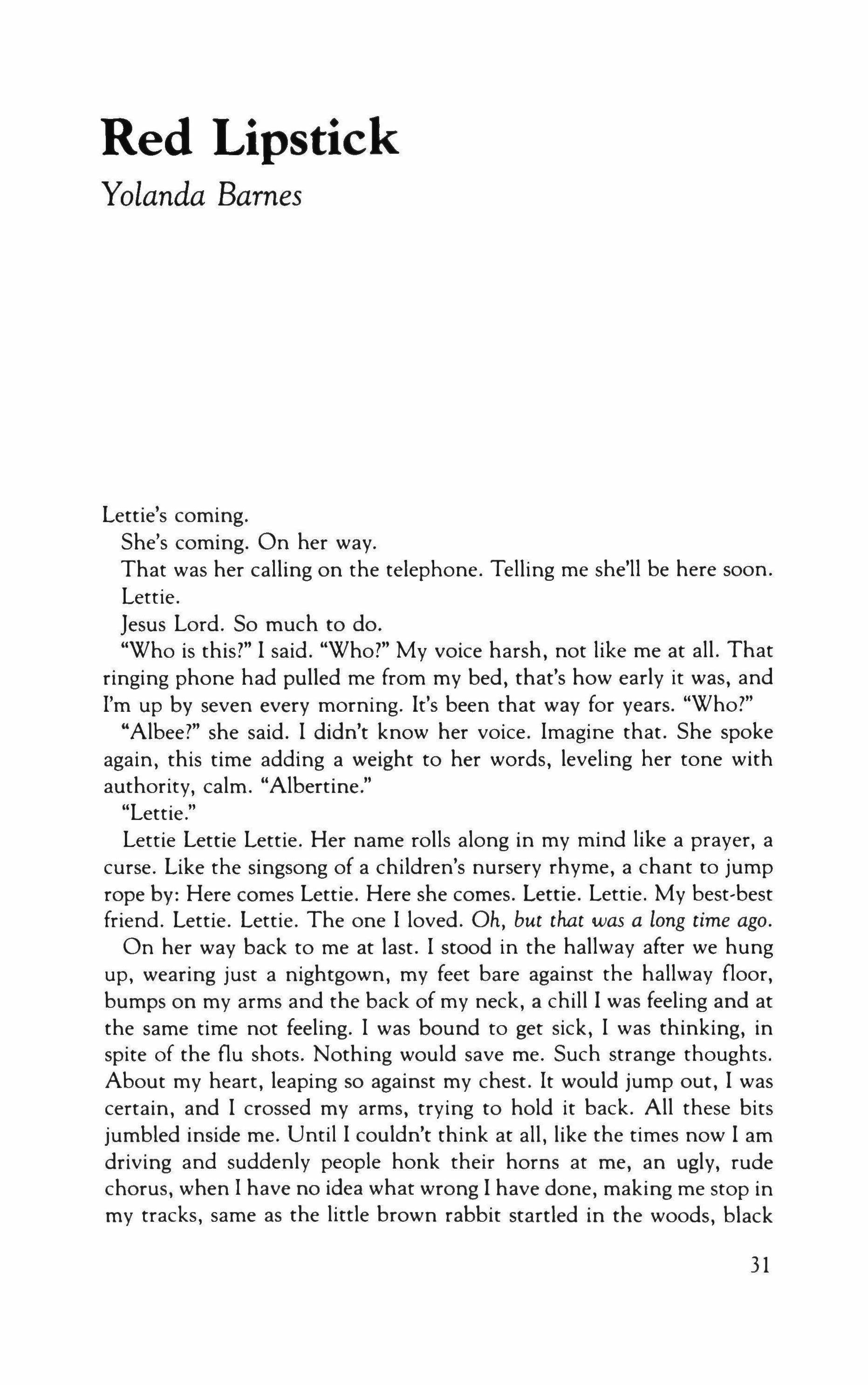
Lettie's coming. She's coming. On her way. That was her calling on the telephone. Telling me she'll be here soon. Lettie.
Jesus Lord. So much to do.
"Who is this?" I said. "Who?" My voice harsh, not like me at all. That ringing phone had pulled me from my bed, that's how early it was, and I'm up by seven every morning. It's been that way for years. "Who?" "Albee?" she said. I didn't know her voice. Imagine that. She spoke again, this time adding a weight to her words, leveling her tone with authority, calm. "Albertine." "Lettie."
Lettie Lettie Lettie. Her name rolls along in my mind like a prayer, a curse. Like the singsong of a children's nursery rhyme, a chant to jump rope by: Here comes Lettie. Here she comes. Lettie. Lettie. My best-best friend. Lettie. Lettie. The one I loved. Oh, but that was a long time ago. On her way back to me at last. I stood in the hallway after we hung up, wearing just a nightgown, my feet bare against the hallway floor, bumps on my arms and the back of my neck, a chillI was feeling and at the same time not feeling. I was bound to get sick, I was thinking, in spite of the flu shots. Nothing would save me. Such strange thoughts. About my heart, leaping so against my chest. It would jump out, I was certain, and I crossed my arms, trying to hold it back. All these bits jumbled inside me. Until I couldn't think at all, like the times now I am driving and suddenly people honk their horns at me, an ugly, rude chorus, when I have no idea what wrong I have done, making me stop in my tracks, same as the little brown rabbit startled in the woods, black
31

eyes bright and body stiff, stopped in the middle of the intersection and so nobody can go until I'm able to breathe again.
I have to reach for breath after Lettie calls. The weight of my crossed arms squeezed against my breasts. What a sight I would make for the woman doctor who worries about my blood pressure. Until I begin to rub my arms, my cheeks, the still rabbit coming back to life. Lettie's on her way and I have to prepare.
First move I make is to pull on myoid housedress with the green and brown and yellow checkered squares, torn and stitched with safety pins beneath the right arm. Tie a kerchief around my head on the way to the front yard, the first sight that will greet Lettie. I carry the broom for sweeping the curb where dirt and slips of paper and soda cans have collected. But first the lawn. Down on hands and knees, my eyes narrowed and searching the grass for weeds, I crawl about, snatching at dandelions and crabgrass until green streaks stain my palms. When the walk catches my sight. My new walk that Mr. James in the green house on the corner just finished building without taking a penny. Mr. James with his pretty wife who nudges him to help the old widow down the street. He laid the walk just the way I asked, with bricks of different colors-pink, of course, but also coral and burgundy, yellow and green and gray. Like a crazy quilt, that's what I told him. Like Joseph's coat.
I squeeze my eyes tight and see Lettie strolling along that new walk. The way she was years ago, wearing one of her dresses, bright-colored and the skirt swinging, brushing the back of her knees. Her plump cheeks and skin the shade of black plums. Her hats-the straw one with the scarves tied around the brim, the tails drifting down her back and that man's hat tilted on her head, shadowing one eye. I see her hair dyed yellow. (How my Harald talked her down for that! "A woman with skin that black," he said, like it was some crime. "She's got no business.") I see tripled strands of fake pearls slapping against her breasts as she stepped, and her lips, slick and shiny red, open and stretched across laughing teeth.
"Miz Clark?" I hear, and open my eyes. Sonya from across the street stands on my lawn. "Miz Clark?" she says. They all call me that. "How you doing today, Miz Clark?" they say; "You getting along all right, Miz Clark?" No longer Albertine. Nobody remembers Albertine but me. "Miz Clark?" Sonya is saying. "You doing O.K., Miz Clark?" Her little boy and girl dressed in blue uniforms, on their way to the Christian school. They hold Sonya's hands and stare at me with dark brown eyes, the girl's hair all in braids and fastened with blue-and-white barrettes.
"You've been working hard," Sonya says. "I saw you." Her voice is
32

weak, surprising because Sonya's a big woman. A big yellow woman. The way she fusses at me is how I imagine a daughter would. I know I should be thankful for neighbors like her. "Maybe you should rest," she says, but I just grin and pat her fleshy arm. Tell her to stop worrying. That's all I say. She wouldn't understand the rest, that I haven't felt so good in a long, long time.
Lettie never said what she wanted when she called. But I know. The same as how I know almost everything about Lettie. More, probably, than in those days we talked all the time. I know about that new house of hers and how each of her daughters turned out, about each wedding, each birth of a grandchild, each baptism, communion, graduation. I know about her boy, her baby. How his motorbike skidded on an oil, slicked road. He was nearly killed and I know that nearly killed her. There are people who tell me these things, Essie in particular, but some' times I wonder if I need them. I feel I would know no matter what. I would just know.
"Can I come over today, Albee?" she said. "I've got something to ask you." What answer possible, except "Of course, Lettie." All this time her words swirling in my mind until, finally, while working in the yard their meaning comes to me, makes me sit back on my heels although this causes great pain in my legs. Already my palms sting, my back hurts from all the pulling and stooping but I have taken certain pleasure in all these aches, accepted any sufferings stemming from Lettie's visit as natural and expected. Now, at this moment, I don't feel a thing. "So that's what she wants," I say, then snap my mouth shut, in case Sonya's back across the street, watching.
There's a sickness eating through Lettie, Essie told me. She says it can't be fought. "They put her in the hospital time after time," Essie said. "But she always comes out." I could picture Essie on the other end of the telephone, shaking her head, black curls trembling. But I know better. Lettie is a cat. What else Essie tells me, that Lettie's alone. "Alonso's left her," she lowered her voice when she told me this, and on my end of the phone I nodded my head. My whole body nodding, my shoulders rock, ing back and forth, my toes in it too, tapping the floor. Ah, Alonso. Couldn't take any more. Lettie's carrvings-on and her lies. Her arrogance. See there. I'm not the only one. "And the children," Essie said. "All gone too." That boy turned out no better than her. Traipsing around the country. Living with one woman after another. The twins, Claire and Carla. "They won't have nothing to do with her." Essie's tone hushed. Gleeful. "Won't even let her in their homes."
33
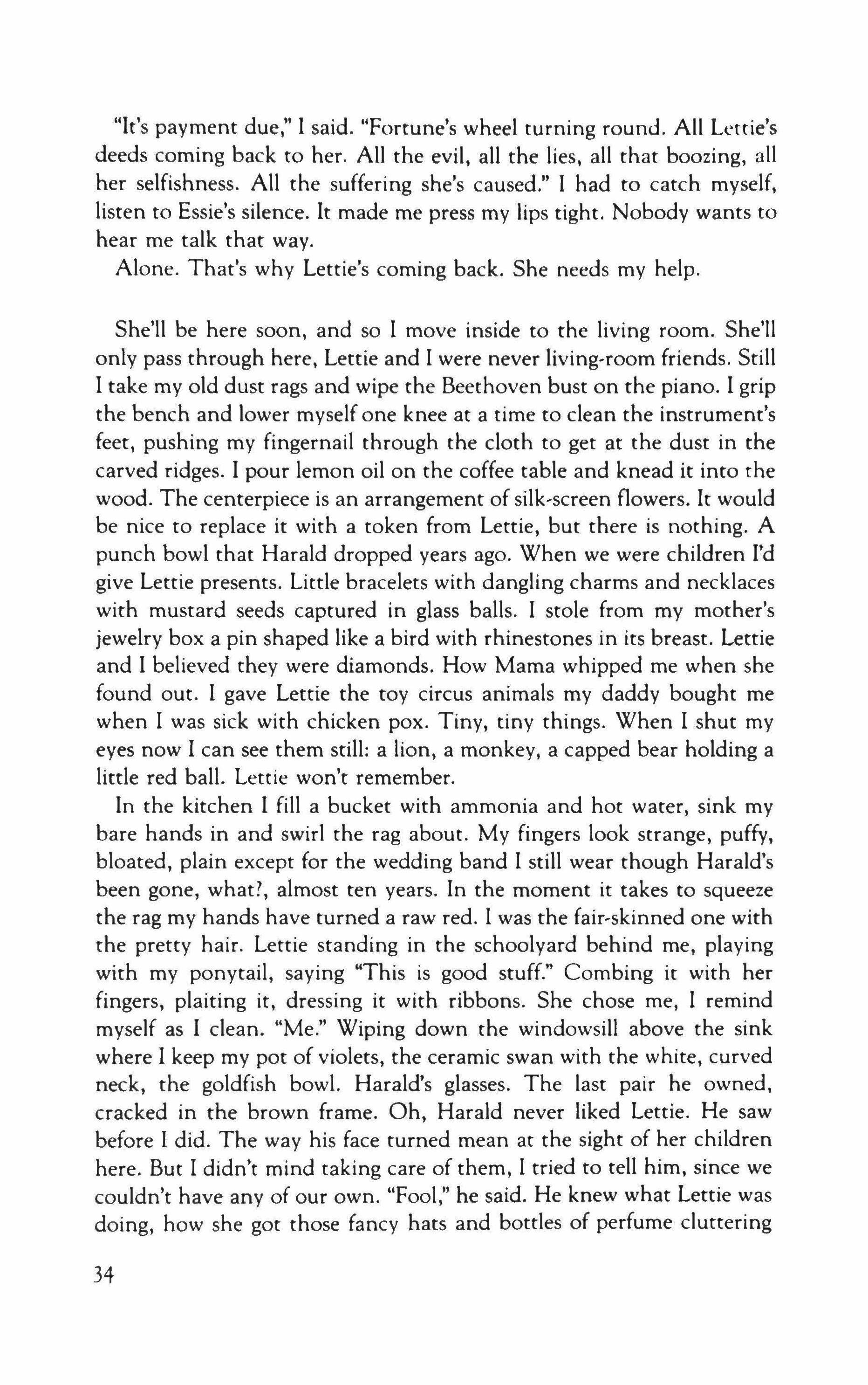
"It's payment due," I said. "Fortune's wheel turning round. All Lettie's deeds coming back to her. All the evil, all the lies, all that boozing, all her selfishness. All the suffering she's caused." I had to catch myself, listen to Essie's silence. It made me press my lips tight. Nobody wants to hear me talk that way.
Alone. That's why Lettie's coming back. She needs my help.
She'll be here soon, and so I move inside to the living room. She'll only pass through here, Lettie and I were never living-room friends. Still I take myoid dust rags and wipe the Beethoven bust on the piano. I grip the bench and lower myself one knee at a time to clean the instrument's feet, pushing my fingernail through the cloth to get at the dust in the carved ridges. I pour lemon oil on the coffee table and knead it into the wood. The centerpiece is an arrangement of silk-screen flowers. It would be nice to replace it with a token from Lettie, but there is nothing. A punch bowl that Harald dropped years ago. When we were children I'd give Lettie presents. Little bracelets with dangling charms and necklaces with mustard seeds captured in glass balls. I stole from my mother's jewelry box a pin shaped like a bird with rhinestones in its breast. Lettie and I believed they were diamonds. How Mama whipped me when she found out. I gave Lettie the toy circus animals my daddy bought me when I was sick with chicken pox. Tiny, tiny things. When I shut my eyes now I can see them still: a lion, a monkey, a capped bear holding a little red ball. Lettie won't remember.
In the kitchen I fill a bucket with ammonia and hot water, sink my bare hands in and swirl the rag about. My fingers look strange, puffy, bloated, plain except for the wedding band I still wear though Harald's been gone, what?, almost ten years. In the moment it takes to squeeze the rag my hands have turned a raw red. I was the fair-skinned one with the pretty hair. Lettie standing in the schoolyard behind me, playing with my ponytail, saying "This is good stuff." Combing it with her fingers, plaiting it, dressing it with ribbons. She chose me, I remind myself as I clean. "Me." Wiping down the windowsill above the sink where I keep my pot of violets, the ceramic swan with the white, curved neck, the goldfish bowl. Harald's glasses. The last pair he owned, cracked in the brown frame. Oh, Harald never liked Lettie. He saw before I did. The way his face turned mean at the sight of her children here. But I didn't mind taking care of them, I tried to tell him, since we couldn't have any of our own. "Fool," he said. He knew what Lettie was doing, how she got those fancy hats and bottles of perfume cluttering
34
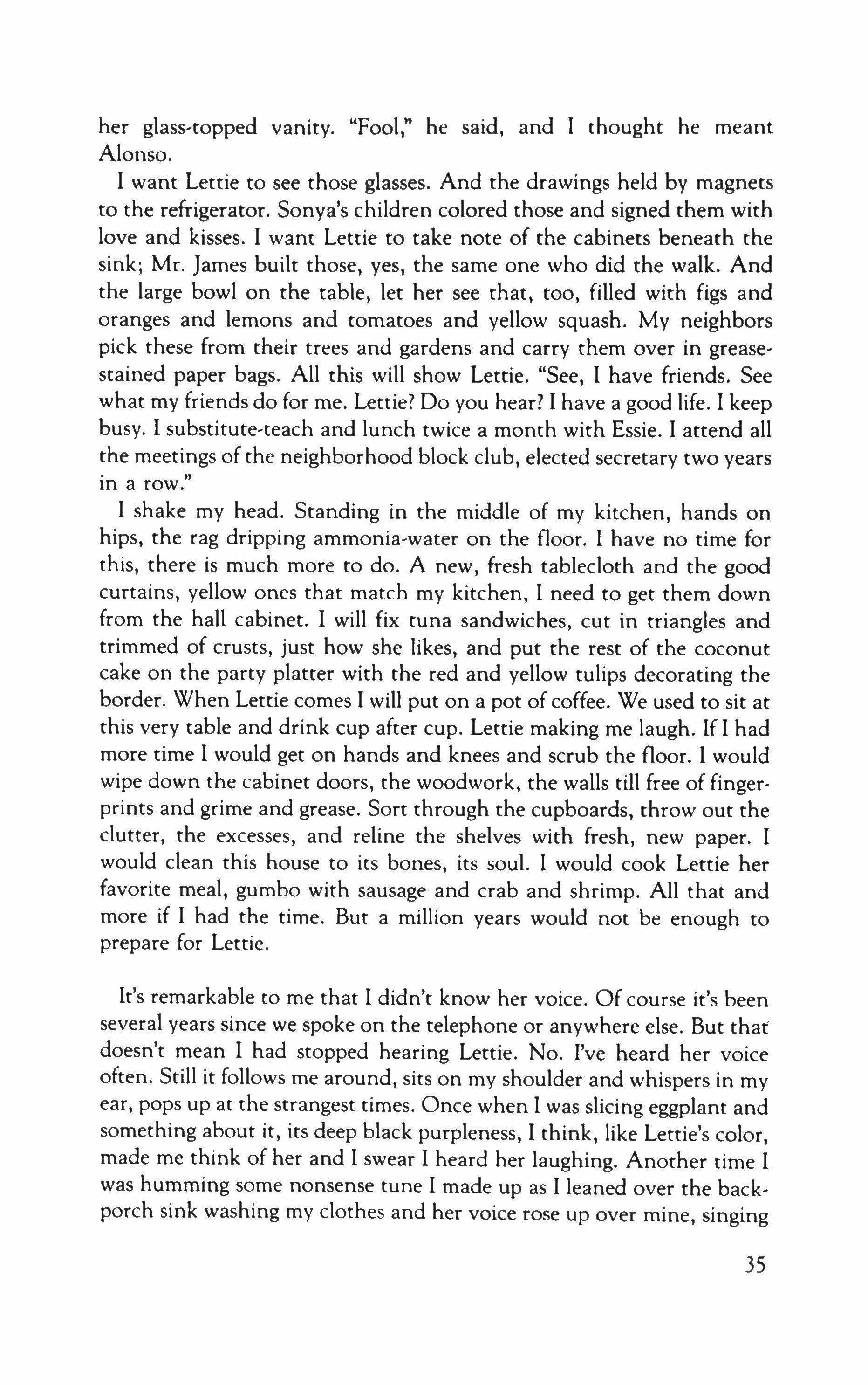
her glass-topped vanity. "Fool," he said, and I thought he meant Alonso.
I want Lettie to see those glasses. And the drawings held by magnets to the refrigerator. Sonya's children colored those and signed them with love and kisses. I want Lettie to take note of the cabinets beneath the sink; Mr. James built those, yes, the same one who did the walk. And the large bowl on the table, let her see that, too, filled with figs and oranges and lemons and tomatoes and yellow squash. My neighbors pick these from their trees and gardens and carry them over in greasestained paper bags. All this will show Lettie. "See, I have friends. See what my friends do for me. Lettie? Do you hear? I have a good life. I keep busy. I substitute-teach and lunch twice a month with Essie. I attend all the meetings of the neighborhood block club, elected secretary two years " 10 a row.
I shake my head. Standing in the middle of my kitchen, hands on hips, the rag dripping ammonia-water on the floor. I have no time for this, there is much more to do. A new, fresh tablecloth and the good curtains, yellow ones that match my kitchen, I need to get them down from the hall cabinet. I will fix tuna sandwiches, cut in triangles and trimmed of crusts, just how she likes, and put the rest of the coconut cake on the party platter with the red and yellow tulips decorating the border. When Lettie comes I will put on a pot of coffee. We used to sit at this very table and drink cup after cup. Lettie making me laugh. If I had more time I would get on hands and knees and scrub the floor. I would wipe down the cabinet doors, the woodwork, the walls till free of fingerprints and grime and grease. Sort through the cupboards, throw out the clutter, the excesses, and reline the shelves with fresh, new paper. I would clean this house to its bones, its soul. I would cook Lettie her favorite meal, gumbo with sausage and crab and shrimp. All that and more if I had the time. But a million years would not be enough to prepare for Lettie.
It's remarkable to me that I didn't know her voice. Of course it's been several years since we spoke on the telephone or anywhere else. But that' doesn't mean I had stopped hearing Lettie. No. I've heard her voice often. Still it follows me around, sits on my shoulder and whispers in my ear, pops up at the strangest times. Once when I was slicing eggplant and something about it, its deep black purpleness, I think, like Lettie's color, made me think of her and I swear I heard her laughing. Another time I was humming some nonsense tune I made up as I leaned over the backporch sink washing my clothes and her voice rose up over mine, singing
35

one of those common, nasty songs she used to know. I must hear her in my sleep too, because sometimes I wake in the night answering her. Something to ask me, that's what she said, and that is just like Lettie. Seems like she was always wanting something from me. Never the other way around. Didn't Harald say that? And Essie? Oh, I was a good friend to her, everybody knows that. But I've learned my lesson now. I'm stronger than before. "Where are my little toy animals now?" My voice bounces against the tile walls of the bathroom. I hear in it the frantic pain of the old crazy woman filthily dressed who stands at the bus stop and shouts all her business. With trembling fingers I unbutton myoid plaid dress and soap a washcloth to rub against the back of my neck, my ears, beneath my arms. Fill the basin with water and bring my face down.
People wondered after I let Lettie go. Prying, nudging questions. Essie tried to find out, oh, how she tried. She was so certain it was some one, huge thing. She questioned me about Lettie and my Harald; she knew how Lettie was. But I never answered. Let Essie think whatever she wants, tell her tales. But this is how Lettie and I came to end.
The Christmas party at Essie's house and me still in my widow's black although Harald had been gone more than two years. That's how deeply I felt, Lettie should have known that. At this party I was sitting on Essie's flowered couch, a paper plate on my lap, listening to Chloe. I was eating one of those big black olives, nodding my head to whatever talk she was talking when I heard Lettie's voice coming from the kitchen (who did not hear?) saying, "No, I don't think it's time Albertine stopped wearing black. Black suits Albertine." And then she laughed. I heard her laugh.
I went home after that and took off that black dress. I sat on my bed dressed only in my slip, my arms folded against the chilled night air, and began to think about Lettie and me. I combed through our history together.
Pulling memories like loose threads. One for the time after my third miscarriage when Lettie said to me, "Obviously the Lord doesn't intend for you to have babies, Albertine. Not every woman is meant to be a mother." A thread for the time creditors were after me, when I could have lost this home Harald and I worked so hard for (and I'll let you all know I never asked for a dime) and Lettie's answer: "Every tub must stand on its own bottom." Another for those two days Harald stayed in the hospital, those terrible last days, and she never came. Every insult, every hurt, every slight since childhood. All thought forgotten or excused or forgiven. All that I had chosen not to see. I sat there in the
36

dark with goosebumps on my bare arms, pulling them from a place deep within me, weaving these threads together. Lettie had never been my friend. She had never loved me as lloved her.
The face 1 wash is old and full, skin loose and drooping beneath the chin, at the neck. Never have 1 been one of those women to worry about vanity and I do not try to hide my age now. I pat on a little bit of powder and line my mouth with lipstick, pale pink, not red like Lettie. Once, foolishly, I asked Essie, "Does she ever mention me?" Anything would have pleased me, even spiteful words. "Does she?" And Essie waited, 1 could hear her thoughts weighing whether to spare me, before answering what 1 knew to be true. "No," she said. "Not once." 1 hold my brush with tight, curled fingers. My knuckles hurt. Twist my hair and pin it in two tightly wound coils.
At the closet I fumble through my hanging dresses. Which one? The black dress with the white polka dots. No. Eh heh. Nothing black today. The green one? The striped one? None of them seems right. Lettie will show up here in something red, hem swinging, slapping. She'll wear a hat with a feather sprouting out, or the brim trimmed with fur. Strutting up my walk without shame.
I could say no. That would serve her right. Laugh at Lettie when she asks for my help. Like she would do me. Leave her deserted. Yes. Exactly what 1 should do.
Such unChristian thoughts ruling my mind as 1 stand before the closet. Finally, I shake my head and get back to business. It's the striped dress I finally choose.
Getting time now. She'll be here. Here. I rush over to press my dress, scorching my arm below the wrist. A bad burn, but the hurt will come later. For now I am free. Standing next to the ironing board, it takes long minutes to button up that dress. Lettie.
Sometime past two o'clock I wrap the sandwiches in wax paper and push the plate far back in the refrigerator. Cover the cake and set it back on the counter. She should have been here two hours ago. Just like Lettie. To keep me waiting. And then I realize, such a horrible thought it makes me sink into one of the kitchen chairs. I brace my elbows against the table. She's not coming.
Has nothing changed?
I hear her first. Jump up and run to the window with loud thudding steps that shake the floor, stand behind the sheer yellow curtains. Let-
37

tie's here. That's her car. The gold Cadillac. I remember how she fussed and nagged until Alonso bought it though they barely had money enough for a house to live in. I step back from the window, clap my hands, lift my feet and turn in a circle. I have to do something with all this feeling bouncing inside me. "Lettie," I sing.
Does she ever think of the time she took me to the beach? I watched through the window that day too when she drove up in the Cadillac, new and gleaming then. "Let's go somewhere," she said, and I tugged the kerchief from my head. We drove, little Alonso not even born yet and the twins mere toddlers, fussing in the back seat, nearly two hours along the coast to a mission town. Lettie wearing her strawhat that time with a yellow scarf tied around the brim, the tail fluttering out the window. We came to a beach with the prettiest, clearest water I've ever seen, white pebbles that hurt my stockinged feet.
Lettie left us behind, her two babies and me, to climb the rocks. She found herself a place to settle, her straight black skirt pulled up, showing her thighs, and a bottle of orange pop in one hand. Her hair still colored yellow then. Harald was right: a common-looking false blond. I remember the babies crawling over my stomach, their reaching, slapping hands in my face struggling for attention, when all I wanted was to stare at Lettie sitting so bold on her rock. Not seeing us at all. And I was thinking, "We ought to take these babies. Harald and me. Away from her. Raise them right." Treacherous thoughts, not like me at all, and I tried to shrug them off, a burdensome cloak around my shoulders, heavy, anchoring me. "We could run into the ocean;' I whispered to those babies, gathered in my arms. "Disappear. Drown. She'd never know." And though it was hard I waited and waited until it seemed enough time had passed so I could stand and call to her, wave her back to us, shouting, "Lettie. Lettie. Let's go home."
All the times I have remembered that day and what warning I should have taken. But I've learned. I won't be a fool again.
I hurry back to the window. "It's her. Lettie." Starting up my new walk. "What will she say about that?" I whisper. "My walk of different colors? About my dress? What cruel things?"
And then I see her. I see Lettie.
She's got skinny. Too skinny. Oh, that's a bad skinny.
A step closer to the window, my face pressed into the curtains. Where is her hat? She wears a wig, a cheap one, too obvious; it is brown with strands thick and straight as a horse's mane. She wears a black dress. Black!
Lettie is dying.
38

Essie was right, I can see that now. This sickness has defeated her and now me too. Robbed me of my Lettie. Left me empty-handed. What business have I got against this woman here? I leave the window, don't want to see anymore. Betrayed again.
Racing all around my kitchen, the nervous little brown rabbit. All the things that should give me comfort. I reach up and take Harald's glasses from the windowsill, hold them to my lips. But from them get nothing. No power. Compared to Lettie it's worthless. Everything in my pretty yellow kitchen, worthless.
So I walk back to the window and push the curtains aside. A ghost stands on my front porch, and inside myself I feel something falling. Falling.
"Lettie." Her name leaves my mouth in a wail. It carries through the glass pane and causes her to look my way. Through the window our eyes meet. Startled eyes, wondering, watchful. And then I see, what I have been searching for all along. Her red lips. Red. Red. Nothing but red. Oh, Lettie's always worn the brightest red lipstick, ever since she was a girl and her mother couldn't slap her into stopping. See there.
At once I am laughing. Lettie's here. Still. She hasn't left me. Not yet. Why, I'd bet anything, beneath that wig, she still dyes her hair blond. Scarce, nappy, yellow hairs. I'd bet my life.
She stares at me. And then, slowly, smiles. I let go the curtain, fall back and lean myself against the wall. Breathless.
She will ask me for this favor. 1 know it, and without hesitation I will answer. Yes. Always yes. Anything to keep Lettie near.
And I begin to imagine the caring of Lettie. Shopping in the market, picking out the finest okra, the best green beans. For her. Plaiting Lettie's hair, pinning it up at night so she can sleep in comfort. Peeling potatoes to simmer in a stew to feed her. Washing her soiled underclothes. Bathing her, soaping and scrubbing her pathetic, racked limbs. Sitting by her bedside, squeezing her hand when she cries out in pain. All these visions bring me joy. My victory.
Now I stand in the middle of my kitchen, alone on the checkered tile floor, and listen to the doorbell ring. Twice more I hear it, dainty and distant, but still I have trouble moving. Finally, after what seems an instant, what feels my lifetime, I take my first step. On my way toward greeting Lettie.
39
The Deception
Marcia Wunsch

I
Nigel strides across the small bridge that crosses the stream. I am waiting for him, down by the water on the other side, but he doesn't know I'm waiting. This is supposed to be a chance encounter. Every day when he is done guiding I'm waiting for him across the bridge, pulling off another chance encounter, and I've done this now ten days in a row. It is not easy to perform these chance encounters. It takes half the day to prepare myself and a lot of stealth.
Nigel and I are camping in the Tetons because he is a guide here for the summer. He's a famous rock climber. He has long muscled legs and hard arms. His arms look as if they hurt to hang, hanging so heavy and loaded I can feel his shoulders ache from the weight of it. He protects the people he guides and is ready for any emergency. Several times a week he has to go on rescue missions. The helicopter lands right here in the area where we camp and the best guides, the strongest, most capable guides, are chosen to get on the helicopter. I am very glad that Nigel is always chosen. Before he leaves I touch his arm. His muscle feels like a flat river stone warmed by the sun.
II
When I was a child my mother always said, "Would I lie to you!" When I was five my father hit her on her birthday with a rolled-up Life magazine. I was under the dining-room table, so close I could smell the Ivory soap on his hands. I watched him carefully tighten the magazine into a bat then strike her in the face over and over again. She didn't make a
40

sound. Later I asked her why my father had hit her. "He didn't hit me," she said. "You have some imagination." "But I saw him," I said. "Would I lie to you?" she said.
III
Nigel and I camp in a private campground called Guide's Hill, at the base of the mountains. Since we aren't married we only have a tent, while the other guides who have wives or wives and children have tent cabins-small log cabins with white canvas roofs, each cabin equipped with a two-burner gas stove and one electrical outlet. I love the cabins. The women have put little curtains at the windows, shy and stiff as new hankies. The canvas makes the light inside as even as milk. Best of all, when the wind snaps the cloth and lifts it you can pretend you're in a sailboat someplace far away on the ocean.
The other women go off during the day with their children - on long hikes, or for picnics, or to swim in Jenny Lake. They are reticent to accept me. I am just a girlfriend, after all, and they don't take me seriously. Also, they would laugh if they knew how hard I work to prepare myself, to make myself as enticing as possible to Nigel. They would laugh because this is the early seventies and they are adamantly braless and makeup-less. They are wholesome versions of Liv Ullman. I don't consider myself a wholesome version of anything but I do not know why.
IV
It's very dark in our tent. The tent is slightly removed from the horseshoe arrangement of the other cabins, and sits alone on a wooden platform on a knoll. It's twelve-feet high in the center, an old World War II army tent. In the tent is an iron bedstead on which we have placed pads and sleeping bags. Next to the bed is a little chest of drawers made out of hard paper. In the top drawer is canned food, like canned plums which Nigel sometimes eats for breakfast, and a can opener and a fork and a knife. The other two drawers hold Nigel's climbing things: a chalk bag, feather-light bricks of chalk wrapped in white paper, and nuts and caribiners on colored slings. His clothes lie loose in the corner tangled up with climbing ropes and hiking boots and climbing shoes. My things are in a suitcase. I am ashamed of the suitcase and afraid someone will see it so I have hidden it under the bed. It's baby-blue vinyl, a Samsonite. My mother gave it to me as a present when I left my husband. "Now you can finally go places," she said.
41
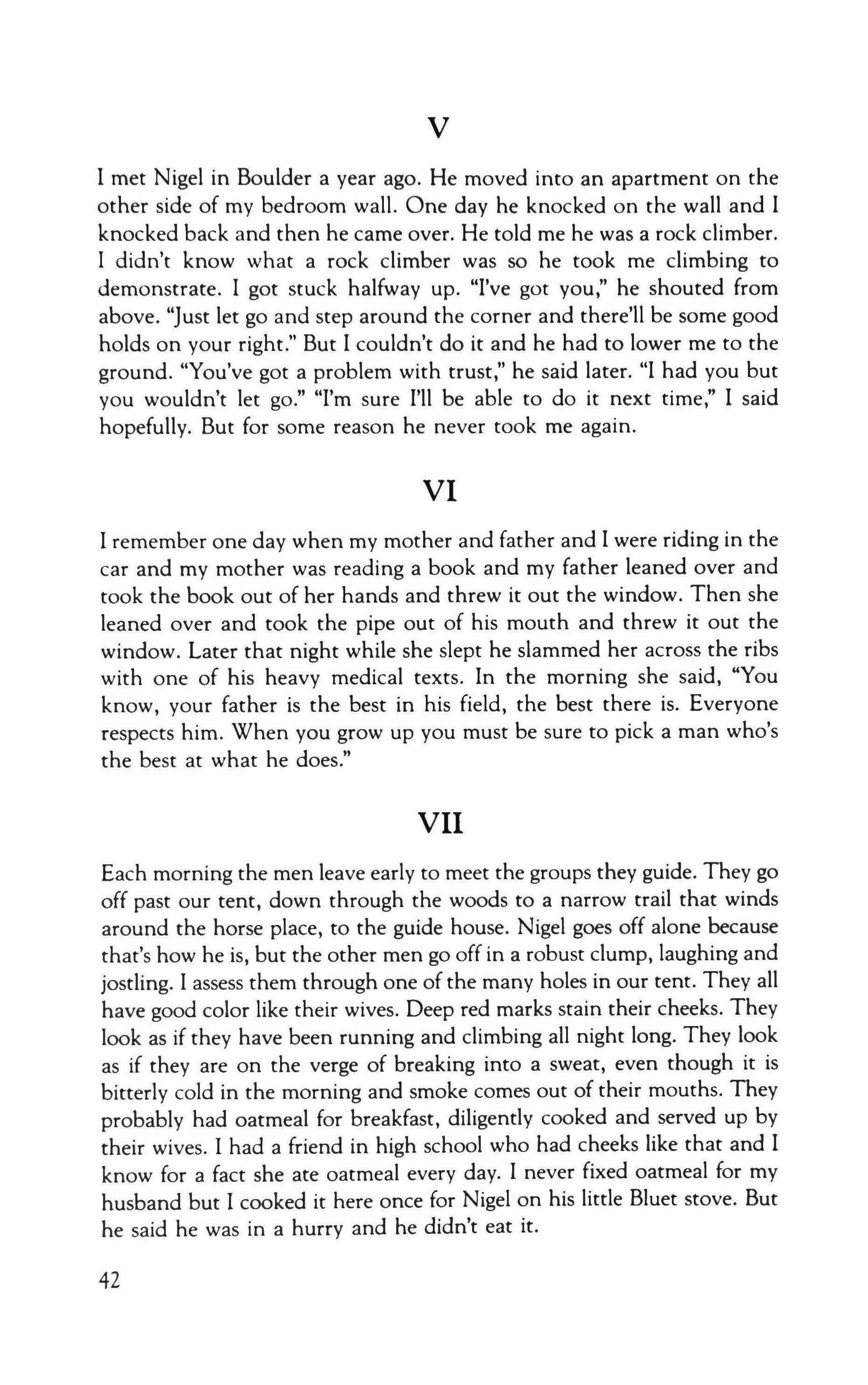
V
I met Nigel in Boulder a year ago. He moved into an apartment on the other side of my bedroom wall. One day he knocked on the wall and I knocked back and then he came over. He told me he was a rock climber. I didn't know what a rock climber was so he took me climbing to demonstrate. I got stuck halfway up. "I've got you," he shouted from above. "Just let go and step around the corner and there'll be some good holds on your right." But I couldn't do it and he had to lower me to the ground. "You've got a problem with trust," he said later. "I had you but you wouldn't let go." "I'm sure l'll be able to do it next time," I said hopefully. But for some reason he never took me again.
VI
I remember one day when my mother and father and I were riding in the car and my mother was reading a book and my father leaned over and took the book out of her hands and threw it out the window. Then she leaned over and took the pipe out of his mouth and threw it out the window. Later that night while she slept he slammed her across the ribs with one of his heavy medical texts. In the morning she said, "You know, your father is the best in his field, the best there is. Everyone respects him. When you grow up you must be sure to pick a man who's the best at what he does."
VII
Each morning the men leave early to meet the groups they guide. They go off past our tent, down through the woods to a narrow trail that winds around the horse place, to the guide house. Nigel goes off alone because that's how he is, but the other men go off in a robust clump, laughing and jostling. I assess them through one of the many holes in our tent. They all have good color like their wives. Deep red marks stain their cheeks. They look as if they have been running and climbing all night long. They look as if they are on the verge of breaking into a sweat, even though it is bitterly cold in the morning and smoke comes out of their mouths. They probably had oatmeal for breakfast, diligently cooked and served up by their wives. I had a friend in high school who had cheeks like that and I know for a fact she ate oatmeal every day. I never fixed oatmeal for my husband but I cooked it here once for Nigel on his little Bluet stove. But he said he was in a hurry and he didn't eat it.
42

After the men have left, the women go back and forth with their children to the water spigots to wash breakfast dishes and to the wooden bathhouse to take chilly showers. Then they set picnic baskets and packs on their front steps. Then they, too, leave in groups. When the last one has gone a terrible silence settles over the campground and the glittering sun breaks wildly over all the empty tent cabins until it is too bright to bear and I must quit looking and turn away.
VIII
My mother tried to commit suicide the first time when I was six. I don't remember anything about it. A few years ago I asked her where I was when she did it. "I have no idea," she snapped. "And don't you ever ask me about that again."
IX
After the women leave I swing into action. I slip into jeans and one of Nigel's sweaters and go to the shower room. Remnants of other people's mornings slap me in the face: cold pools of water on the floor, an empty Dr. Bronner's shampoo container still foaming peppermint bubbles, a tube of Fennel toothpaste. I smile at the toothpaste. As a matter of fact, I smile the whole time I am in the Tetons, the whole two weeks until Nigel moves on to another woman and I leave. I smile when we do things in bed and I smile when I'm alone-just in case, in case someone is looking and wants to report on the basic nature of my personality, either to another member of the guiding group or to Nigel. Above all I want a good report. My face aches from smiling, like it did when I was learning French and spoke so much French that I could feel my cheekbones shifting under my skin, rising higher and higher with each word like chunks of broken arctic ice pressing up out of the sea. My face aches so badly by the time I leave the Tetons that it takes almost a year before the pain no longer bothers me.
I shower and throw my clothes on before I'm completely dry and run with a wet head through the empty campground back to the tent. It is 10:00 A.M. Today Nigel took two clients to Irene's Arete and he won't be back until four. I have plenty of time to get ready, too much time. I should have gone back to bed instead of showering so early. I would have if I thought I could sleep but I can't sleep during the day. I can't sleep at night either. I don't sleep because I am thinking, but it is nothing
43

constructive. I think how tomorrow I must get my life in order, tomorrow I must decide what to do. I devise lists of complicated possibilities and then reject each one. I fall asleep only after I have convinced myself that surely tomorrow something will turn up. In the morning I awaken exhausted. feeling as if someone had been shaking me all night long.
x
One day when I was nine my mother let me put on some of her lipstick as a special treat. Then she said, "Just remember you're very beautiful but there will always be someone more beautiful than you." "Yes," I said, "You. You are the most beautiful in the world." "Not me," she said. "Other people." But she laughed, pleased. I loved it when she laughed, she hardly ever laughed.
Later that day, I told her again how she was the most beautiful, hoping once more to see her pleasure. But this time she gave me a long cold stare, as if I had stolen something from her, as if I had betrayed her.
XI
Today I lie in my sleeping bag reading Helter Skelter, the only book I have brought besides Six Ways to Improve Your Vocabulary. I am alone at the base of one of the most spectacular mountain ranges in the world. The weather is perfect. The day is stupendously glorious. A small wind pushes the tent flap open and closed and open and closed like a canvas lung breathing heart-stoppinglv beautiful light up and down on the floor. But I cannot move. I'm pinned to the bed by the book. I move only to glance at the clock and turn one page after the next. The book says life is torture, people are torture, life is murder. The book says even a short man with twinkly eyes can get you. I smile as I read it, but now I am smiling sincerely because I recognize the truth of it.
XII
My mother always took me with her when she ran away. We'd sneak out in the middle of the night and drive to the train station. She'd park the car in the almost empty lot and we'd go in and talk to the ticket man. "No trains tonight for St. Louis," he'd say, or, "No trains this late for New York." I was always disappointed for her and hopeful each time we went that there would be a train to whichever destination she wanted.
44
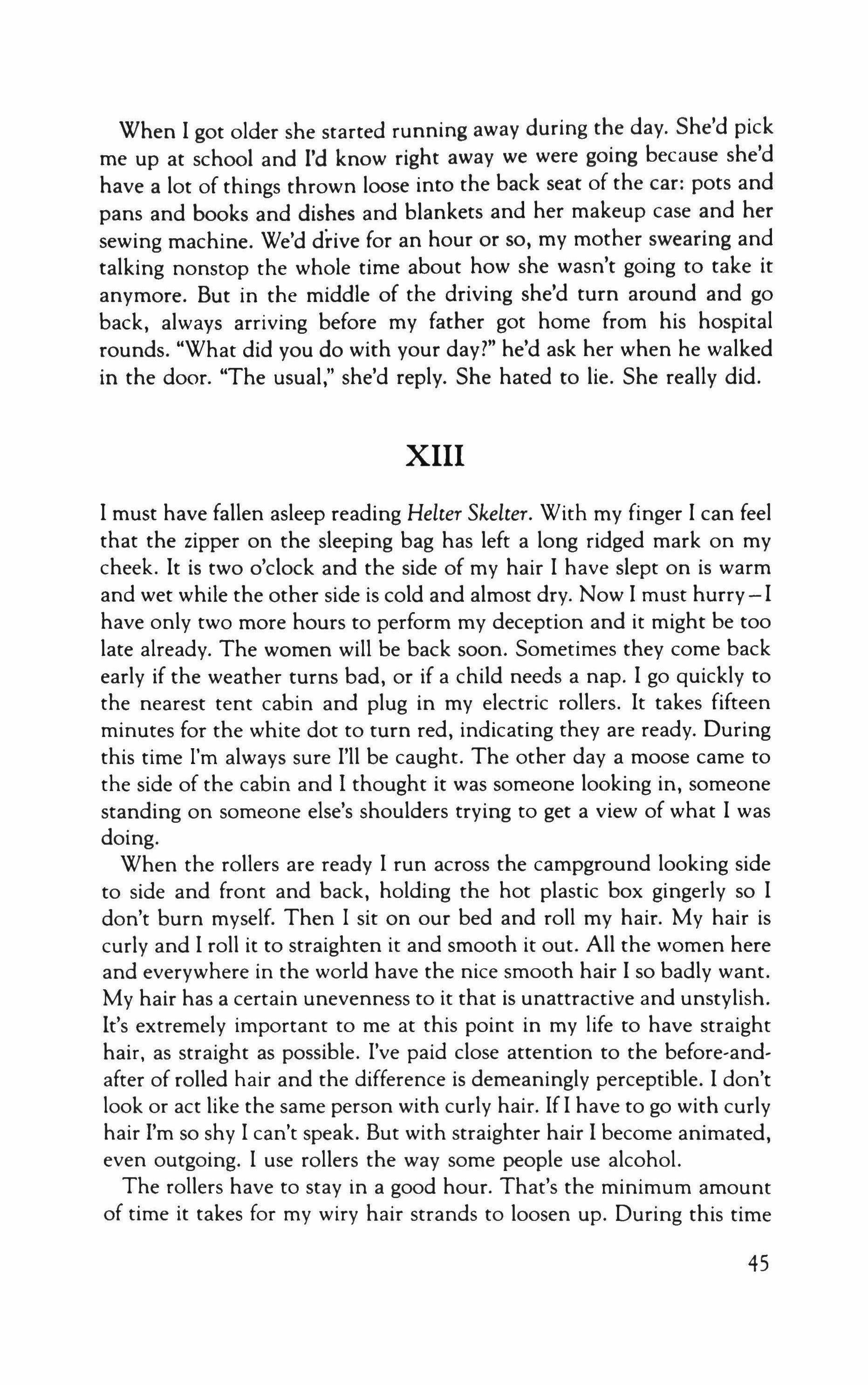
When I got older she started running away during the day. She'd pick me up at school and I'd know right away we were going because she'd have a lot of things thrown loose into the back seat of the car: pots and pans and books and dishes and blankets and her makeup case and her sewing machine. We'd drive for an hour or so, my mother swearing and talking nonstop the whole time about how she wasn't going to take it anymore. But in the middle of the driving she'd turn around and go back, always arriving before my father got home from his hospital rounds. "What did you do with your day?" he'd ask her when he walked in the door. "The usual," she'd reply. She hated to lie. She really did.
XIII
I must have fallen asleep reading Heller Skelter. With my finger I can feel that the zipper on the sleeping bag has left a long ridged mark on my cheek. It is two o'clock and the side of my hair I have slept on is warm and wet while the other side is cold and almost dry. Now I must hurry - I have only two more hours to perform my deception and it might be too late already. The women will be back soon. Sometimes they come back early if the weather turns bad, or if a child needs a nap. I go quickly to the nearest tent cabin and plug in my electric rollers. It takes fifteen minutes for the white dot to turn red, indicating they are ready. During this time I'm always sure I'll be caught. The other day a moose came to the side of the cabin and I thought it was someone looking in, someone standing on someone else's shoulders trying to get a view of what I was doing.
When the rollers are ready I run across the campground looking side to side and front and back, holding the hot plastic box gingerly so I don't burn myself. Then I sit on our bed and roll my hair. My hair is curly and I roll it to straighten it and smooth it out. All the women here and everywhere in the world have the nice smooth hair I so badly want. My hair has a certain unevenness to it that is unattractive and unstylish. It's extremely important to me at this point in my life to have straight hair, as straight as possible. I've paid close attention to the before-andafter of rolled hair and the difference is demeaningly perceptible. I don't look or act like the same person with curly hair. If I have to go with curly hair I'm so shy I can't speak. But with straighter hair I become animated, even outgoing. I use rollers the way some people use alcohol. The rollers have to stay in a good hour. That's the minimum amount of time it takes for my wiry hair strands to loosen up. During this time
45
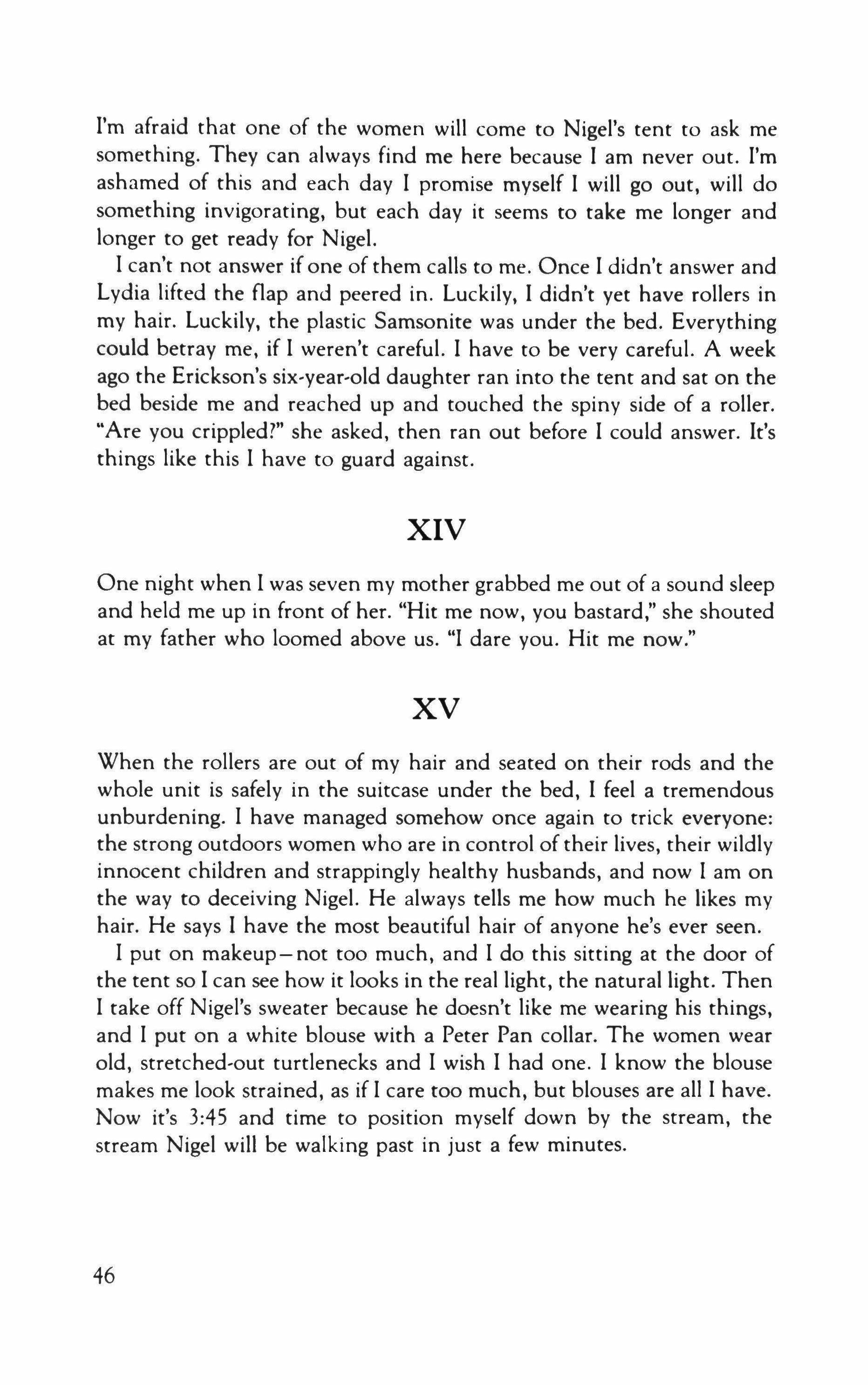
I'm afraid that one of the women will come to Nigel's tent to ask me something. They can always find me here because I am never out. I'm ashamed of this and each day I promise myself I will go out, will do something invigorating, but each day it seems to take me longer and longer to get ready for Nigel.
I can't not answer if one of them calls to me. Once I didn't answer and Lydia lifted the flap and peered in. Luckily, I didn't yet have rollers in my hair. Luckily, the plastic Samsonite was under the bed. Everything could betray me, if I weren't careful. I have to be very careful. A week ago the Erickson's six-year-old daughter ran into the tent and sat on the bed beside me and reached up and touched the spiny side of a roller. "Are you crippled?" she asked, then ran out before I could answer. It's things like this I have to guard against.
XIV
One night when I was seven my mother grabbed me out of a sound sleep and held me up in front of her. "Hit me now, you bastard," she shouted at my father who loomed above us. "I dare you. Hit me now."
XV
When the rollers are out of my hair and seated on their rods and the whole unit is safely in the suitcase under the bed, I feel a tremendous unburdening. I have managed somehow once again to trick everyone: the strong outdoors women who are in control of their lives, their wildly innocent children and strappingly healthy husbands, and now I am on the way to deceiving Nigel. He always tells me how much he likes my hair. He says I have the most beautiful hair of anyone he's ever seen. I put on makeup-not too much, and I do this sitting at the door of the tent so I can see how it looks in the real light, the natural light. Then I take off Nigel's sweater because he doesn't like me wearing his things, and I put on a white blouse with a Peter Pan collar. The women wear old, stretched-out turtlenecks and I wish I had one. I know the blouse makes me look strained, as if I care too much, but blouses are all I have. Now it's 3:45 and time to position myself down by the stream, the stream Nigel will be walking past in just a few minutes.
46

XVI
My father still hits my mother. It disgusts me that she stays but what can I do? Sometimes she calls me at four in the morning. "I'm leaving," she threatens hysterically. Sometimes she just sobs into the phone. I used to encourage her and tell her how much happier I thought she'd be without him. Or I'd soothe her and remind her that I loved her. But the last time she called I didn't say anything. I was so sick to death of hearing it I didn't say one word. She ranted on and on and ended with her usual, "He'll be sorry he did this, I'll show him. Just you wait and see."
XVII
The last day I was in the Tetons, the day I was so exhausted by deception and loneliness that I had finally made up my mind to seek out one of the women the very next day and ask if I could join her for the afternoon, I saw Nigel walking with a woman I had never seen before. I was waiting as usual a little way from the bridge, sitting on the bank down by the water, pretending to examine some stones. The two of them walked over the bridge and kept right on going. She was wearing a man's undershirt and baggy shorts. A chalk bag hung from a black nylon strap draped loosely over her hips. She had curly untrained hair. Right before they disappeared behind a stand of trees I saw her lean close to Nigel to hear something he was saying and then I heard them laugh.
I waited by the river until the sun went down. Then I went to the tent and put Helter Skelter in my suitcase and left for Colorado. I could tell you that I threw away the rollers but I never did. Well I did, but that was a long time later. Years after my face stopped hurting. Years after my mother committed suicide.
47
The Escape
)oyce Carol Oates

When, those years, we returned home from school in the late afternoon it was frequently to discover that the door to our apartment was bolted on the inside, so that our key, our lone key shared by the four of us, was not sufficient to let us in. Shyly then we rapped on the door, rang the bell at first tentatively, then with increasing desperation, minutes would pass, we might retreat temporarily to sit on the stairs doing homework (though the corridor light was poor), then renew our effort in an hour, plaintive voices pitched low so that neighbors might not overhear and, guessing our predicament, take pity on us. "Mother- it's only us, please let us in -" we would beg until finally, and by now we were likely to be crying, altogether miserable in our navy-blue woolen jumpers and starched white blouses we'd been wearing since seven-thirty that morning, there would come a fumbling at the lock, the strangely sullen sound of the bolt sliding free, and we would push the door open, not eagerly but cautiously, with regard for Mother's nerves. She would take a quick step or two back into the shadows as we entered the unlit vestibule, her eyes gleaming white, glancing behind us as if vigilant, even now, against an unannounced enemy; yet she stood tall, dignified, beautiful, head uplifted, a crocheted black shawl around her shoulders and her arms tightly crossed beneath her breasts, her thick splendid hair perfectly rolled up and back from her face, gleaming like ebony, fixed in place with large tortoise-shell and mother-ofpearl combs. Exclaiming softly, half-chiding and half-affectionate, "You girls! - always mislaying your key!"
The door would be locked again, and bolted. And gravely Mother would kiss us, one by one. Mother's marble-cool lips, pressed against our warm foreheads. One by one.
# 48
Those years, the nuns did their best to teach us such adult concepts as Justice. But we understood that Justice did not apply to children, let alone to us.

Sometimes in the night we would wake abruptly to the sound of sobbing.
Melodic, like the sea, rising and falling, muffled, then higher-pitched as if deliberate, a current of anger beneath.
A scent of bruised camellias filling the apartment, most concentrated in the shadows.
In our nightgowns, barefoot and shivering, we would creep quietly to Mother's bedroom at the far end of the corridor, hearing the sobbing more pronounced, interspersed perhaps with low soft exclamations, we dared to push in the door to discover Mother, not in bed (Mother's bed, large, high, with four brass posts and a dazzling white-lace spread, would not even have been turned back) but seated in her chair by a window, fully clothed, head uplifted, a cigarette burning in her fingers. If there was a moon, moonlight would illuminate her heavy-lidded eyes, the glisten of tears on her cheeks, but when we asked, "Mother, why are you crying?" she would regard us calmly, baring her teeth in a perfect white smile, and say, "How silly you girls are tonight! - I'm not crying."
Or, sighing, exhaling smoke in a languorous plume, "My God-why was I given daughters, and not sons!"
Or, the answer that most frightened us, since at such times Mother fixed her teary-bright gaze on us with a particular sort of satisfaction, enveloping the four of us in a single dilated gaze as if we were but one helpless creature, "One day, you won't have to ask."
Yet Mother never failed to kiss us, one by one. Those cold perfect lips, our feverish foreheads.
If you are beautiful you will be followed in the street - as Mother has been, and still is. ("And out of that insult, the litter of you sprang!")
But if you are not beautiful, no one will so much as glance at you.
Assuming of course that you are Female, and not Male.
#
#
# 49
Our suitcases were packed, a half-dozen of them, waiting just inside the vestibule to the front entrance of the apartment building, hut the taxi was late. Mother awaited us impatiently, smoking a cigarette. She wore her black belted raincoat and her hair was covered with a black silk scarf. As soon as we entered the building, wet and bedraggled from the rain, and blinking at the unexpected sight of Mother in the vestibule, she hugged us, relieved, yet annoyed-"You girls! The taxi might have been here by now, and where for God's sake were you!"
Mother's possessions were of uniformly high quality, and her matched luggage was no exception. These were leather suitcases, a deep burnished wine-red, delicious to smell, yet each was badly battered and scratched, from years of ill-usage. The eldest of us remembered, as if in a dream, having seen Mother stride purposefully to the staircase railing on our floor and drop one of the suitcases down the stairwell, to land with an alarmingly loud thud on the marble floor of the vestibule six stories below.
The taxi arrived-a striking vehicle, larger than an ordinary car, gleaming black, with a front grill like a wide chrome smile. Mother spoke to the driver in an urgent whisper, as he carried the suitcases to the taxi, set them into the trunk and onto the rack affixed to the roof. As we climbed into the rear, in haste, stumbling over one another's feet, Mother said, as if thinking aloud, "This time-none of them know our plans. This time will be different."
The driver climbed into the front of the taxi, glanced at us curiously in the rearview mirror, and said, "Ma'am? Where shall I take you?"
Mother, half shielding her face with her gloved hand, said, with an air of nervous gaiety, "Oh-you know! We're making our escape!"
The driver's gnarled eyebrows met in a single line of perplexity over the bridge of his nose. "Ma'am? - d'you mean the train station?"
Mother pressed a gloved finger over her lips. At such times she was both vehement and coquettish. "Just drive, sir, please!"
As the taxi swung away from the curb and we were thrown together, laughing breathlessly, gripping one another's hands, Mother said, in an undertone, "This time will be different, I promise!"
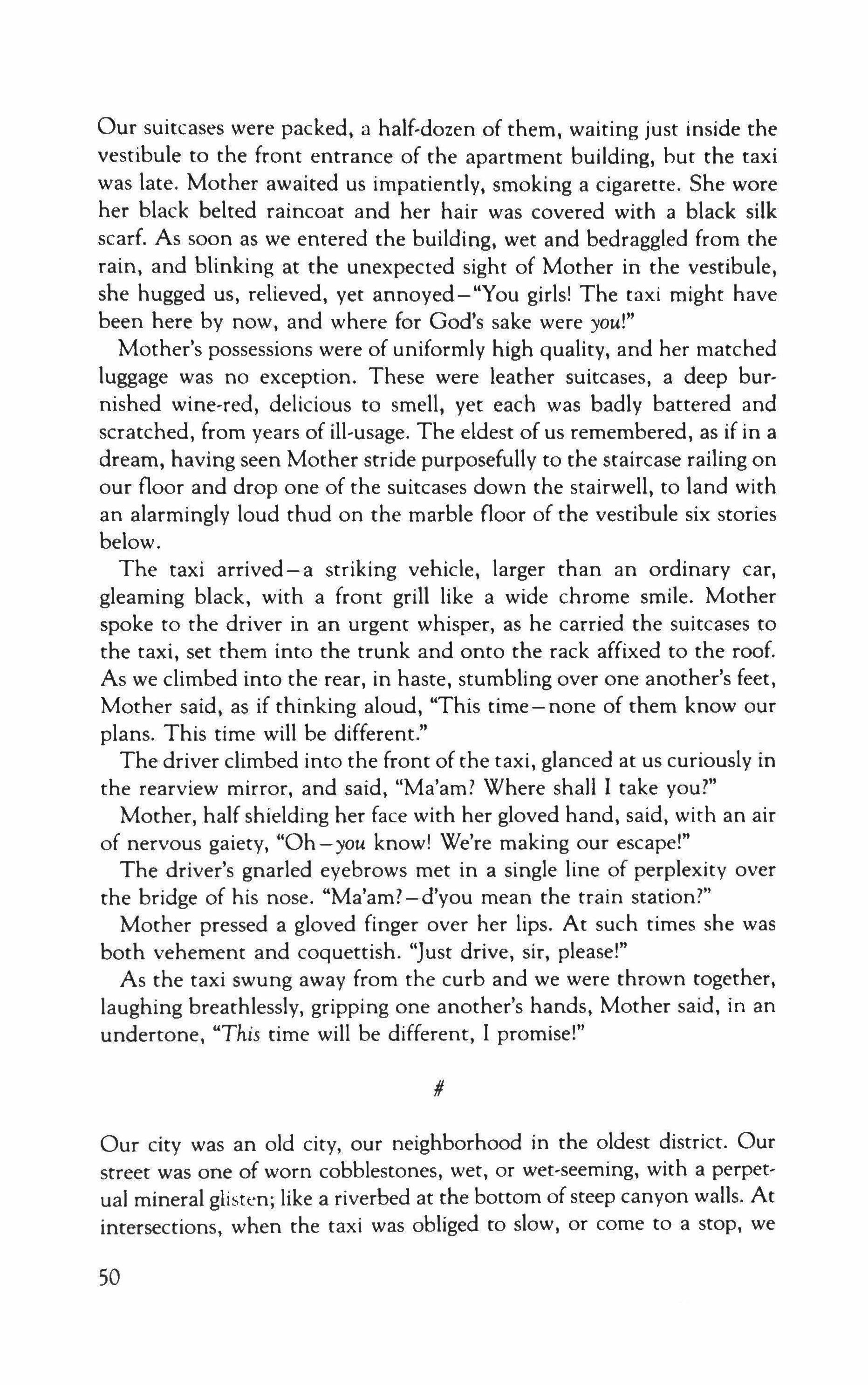
Our city was an old city, our neighborhood in the oldest district. Our street was one of worn cobblestones, wet, or wet-seeming, with a perpetual mineral glisten; like a riverbed at the bottom of steep canyon walls. At intersections, when the taxi was obliged to slow, or come to a stop, we
#
50

could see how blocks of buildings dissolved into mist, or frank emptiness- not that the buildings were under construction, though in fact some were, but that they simply broke off, like jigsaw puzzles with parts missing. If Mother, smoking her cigarette, noticed, she gave no sign. Traffic was dense on the main thoroughfares, at this hour of the day, thus our taxi moved slowly, in erratic surges of energy. Mother grew impatient, leaning forward to rap on the plastic partition that divided the front seat from the rear. "Driver? Why are you so slow? Don't you know a shorter route? Do you want us to miss our train?"
The driver regarded Mother in the rearview mirror with an expression of startled dismay. "Ma'am," he said, "nobody could get you there faster."
Mother persisted, "You have some purpose, do you? In slowing us down?"
"Ma'am-?"
"You've driven us in the past, haven't you? My daughters and me?" Mother's voice rose, as if some invisible demon were pinching her. "You recognize our faces, do you?"
"Ma'am, I don't know what you're talking about!"
But Mother was aroused with purpose, resolution. Her pale cheeks were flushed and her normally hooded eyes shone. She cried, "They sent you, didn't they! Instead of the taxi I ordered they sent their own taxi, didn't they! Let us out at once."
Useless for the taxi driver to protest, Mother never changed her mind once she was set upon a course of action. So we found ourselves on the boulevard, in the midst of traffic, our half-dozen suitcases carelessly deposited on the pavement, as Mother angrily waved for another taxi. No one dared speak as Mother ventured out into the street, risking injury, provoking drivers to sound their horns, nor did we dare glance at one another for fear of seeing tears, which are contagious.
Yet Mother succeeded in getting us another taxi, very like the one we had abandoned, though driven by an older, brisk, gray-haired man, wearing a visored cap, who brought us to the train station within twenty minutes, but upset and irrevocably offended Mother, whose nerves were so on edge, by smiling too familiarly at her, and asking where she and her "pretty little girls" were going. So this driver Mother refused to tip, on the grounds of insubordination and male buffoonery, handing over to him a dollar bill or two and a good deal of loose change, exclaiming, "They have no right, I will show them they have no right," and the driver blinked in astonishment, began to protest, but thought better of it and hastily retreated.
51

We had gamely taken up the suitcases, meaning to carry them into the train station, the eldest of us determined to carry two apiece (though the suitcases were strangely heavy, packed to bursting and strapped shut), but this Mother refused to allow, for we might injure our internal organs, in any case it was a vulgar sight, well-bred young girls grunting over luggage, thus a railway porter had to be engaged, but this proved a difficult task not because there were no porters on hand but because, perhaps on account of Mother's attractive appearance, there were too many, converging upon us, smiling and seeming solicitous, and Mother had to choose among them, laughing nervously, both flattered and annoyed, for such things were forever happening to her when she left the privacy of our apartment, especially to risk escape from the city, and the porters quarreled with one another, and Mother twice changed her mind, engaging now one man, but now another, and in the confusion it suddenly came to light that one of the suitcases was scratched - a thin but highly visible saw-toothed scratch, amid a patina ofolder, less visible scratches. And naturally Mother protested, genuinely upset, and insisted upon speaking with the station manager-"I won't be insulted, just because 1 am a woman without a male companion!"
For the next ten or fifteen minutes we four stood at a discreet distance from Mother, biting our lips, and trying not to succumb to anxious tears. When was our train scheduled to leave? we asked one another, but none of us knew; nor did we dare speak to Mother for fear of making things worse.
Finally, the matter of the scratched suitcase was resolved, and we ventured into the chaos of the station, now pushing our luggage on a porter's cart of our own, the four of us hurrying in Mother's wake. We had no trouble following her tall, regal, striking figure amidst the crowd of strangers, though it seemed to us that the station had been renovated and enlarged since our last visit, and even dimly familiar landmarks, like the old domed kiosk at the center of the waiting room, were gone. On all sides there was a dizzying turmoil of motion, like water swirling rapidly as it is about to go down a drain; ear-splitting train whistles; vendors' cries; unintelligible announcements over the amplifying system; a din as of hundreds of barrels rolling and echoing upward into the vaulted ceiling sixty feet overhead - a maze of open girders and elaborate nineteenth-century metalwork where pigeons, swifts and bats nested.
Seeking the ticket counter, which was not where it had been previously, Mother had cautiously drawn her black silk scarf up to hide the lower part of her face, and turned up her raincoat collar. Yet, still, she attracted attention, as much for her manner (both shrinking and irnpet-
52

uous, fearful yet with an air of scarcely controlled desperation) as for her appearance. Men stared openly at her, several politely inquired if she was in need of directions, but Mother ignored them, as if un hearing, smiling brightly over her shoulder at us and waving us on-"This way, girls! What slowpokes!"
At last Mother located the ticket counter, a marble ledge that stretched literally out of sight in the gloom, now to find the correct wicket, not so easy a task, thus more precious minutes were wasted until Mother joined the end of a lengthy, slow-moving, sullen line of travelers, and after forty-five frustrating minutes she found herself at the counter where, as luck would have it, poor Mother, the clerk was an officious but supremely ignorant youngish man, or was he in fact covertly rude, even mocking, misunderstanding Mother's request for tickets at first, issuing her the wrong tickets, then insisting that the train she wanted no longer ran, all train service to that part of the country had been discontinued, then reversing himself, saying no the train still ran but at irregular intervals-not at seven-thirty-five P.M., as Mother believed, but at seven-thirty-five A.M. -which was to say, not until morning.
Mother said hotly, "That's ridiculous. That's a lie."
The clerk pushed a timetable to Mother, who refused to touch it. "Madame, see for yourself."
Mother wiped brusquely at her eyes with a handkerchief, and said, "It's just so insulting. That you lie to me so openly and so crudely."
The clerk squinted at Mother with an expression of seemingly genuine astonishment. "Madame? 'Lie'-? I'm afraid I don't -"
Mother had removed her wallet from her handsome kidskin handbag, to pay for the tickets, but suddenly, in the heat of the moment, thrust it back into the handbag again, saying, "I've decided not to buy those tickets from you after all." Quickly, as the clerk stared after her, she turned from the wicket, strode away, signaling for us to follow, as naturally we did, disconcerted by Mother's decision yet not truly surprised, for such abrupt reversals had happened in the past.
It was not a propitious hour for our escape after all, as perhaps we should have guessed.
"Come, girls! Hurry!"
Exhausted as we were, faint with hunger, we followed in Mother's wake, pushing the cart high-piled with luggage, back through the immense waiting room filled with strangers, back to the entrance of the station, back to the confusion at the curb, beneath the portico, where taxis were lined up awaiting passengers and where, in order to return home, we would have to engage a taxi. Numbly but dutifully we fol-
53

lowed, and unquestioningly, as upon other, similar occasions, for it seemed self-evident that our bodies were Mother's, and her body was ours, and that Death might sweep all away, but never a part; so long as we remained together, moving forward in one swift, fluid motion, we were safe, we were inviolable. #
"Quick! - get inside, and shut the door."
As soon as we scampered inside, Mother locked and bolted the door; threw herself breathlessly against it, arms outstretched. A single ferocious tear gleamed, like a gem, on her cheek.
It was now night, the numerous high-ceilinged rooms of the apartment cloaked in darkness.
As Mother pulled off her scarf, removed her coat to toss it across a chair, the four of us, still in our coats, tiptoed about switching on lamps, timidly reclaiming the rooms one by one. We saw that, in our absence, someone had been here-a pair of embroidered cushions were out of place on a sofa, a Chinese vase had been knocked from a mantel to shatter into pieces (these pieces we hastily swept up, and hid), drawers had been opened and carelessly shoved back. And though we had surely not been gone for more than three hours, the grandfather clock in the dining room had stopped; and petals had fallen, like clumps of heavy snow, from a bouquet of camellias fresh that very morning.
If Mother noticed these things she chose to say nothing.
"Well- we're home!"
Seeing that we'd lit her bedroom lamp, and all was well in that room, Mother came in, threw herself in her chair by the window, and lit a cigarette. At such times, in a state of passion, Mother could sit for hours, simply staring out the window and smoking; we would not have disturbed her, but crept quietly off to bed, except we were ravenous with hunger, like street urchins, and guessed that Mother must be hungry too. So we banged about in the kitchen preparing a simple meal of eggs, cheese, bread (Mother had dismissed our housekeeper earlier that day), and brought it into Mother's bedroom, and we arrayed ourselves at her feet on the carpet, all of us eating together, very tired, yet happy; at least, relieved to be back home again. Seeing that Mother was relaxed, though still sullen and brooding, one of us dared ask, "Will we have to go to the train station, another time?" and Mother fixed us with that single all-enveloping gaze, and said, "One day, you won't have to ask."
54
Where I Want To Be
Robert R. Hellenga

Papa did all the cooking in our family. He started when Mama took a leave of absence for two months and went to Italy to look at the pictures, to see for herself what she'd only seen in the Harvard University Prints series and on old 3" x 4" tinted slides that she used to project on the dining-room wall; and when she came back he kept on doing it. "You're so lucky," her academic friends used to say, crowding into the kitchen. "Where'd you ever find a man like this? How about putting him on loan once in a while? I could use a man like this in my kitchen." And we thought she was lucky too, because she never had to shop for groceries, like other women, and she didn't have to slave-over-a-hot-stove, and she didn't have to clean up afterwards, either. My sisters and I did the dishes and Papa took care of everything else-not just on weekends, like Mr. Brady, who wore a funny apron when he cooked steaks on a huge outdoor grill-but day in and day out, and whether it was Italian or French or Chinese or Malaysian, it was always wonderful, it was always special. Penne alla putanesca, an arista tied with sprigs of rosemary, paper-thin strips of beef marinated in hoisin sauce and spicy Szechwan peppercorns, whole fresh salmon poached in white wine and finished with a mustard sauce, chicken thighs simmered in soy sauce and lime juice, sambals so fiery that at their first bite unwary guests would clutch at their throats and cry out for water, which didn't help a bit. Those were our favorites, the standards against which we measured other dishes; but our very favorite treat of all was the dessert which Papa made on our birthdays, instead of cake, and which was supposed to look like the hats worn by cadets at St. Cvr, the French military academy. We'd never been to St. Cvr, of course, but we would have recognized a cadet anywhere in the world, at least if he'd been wearing his hat.
55
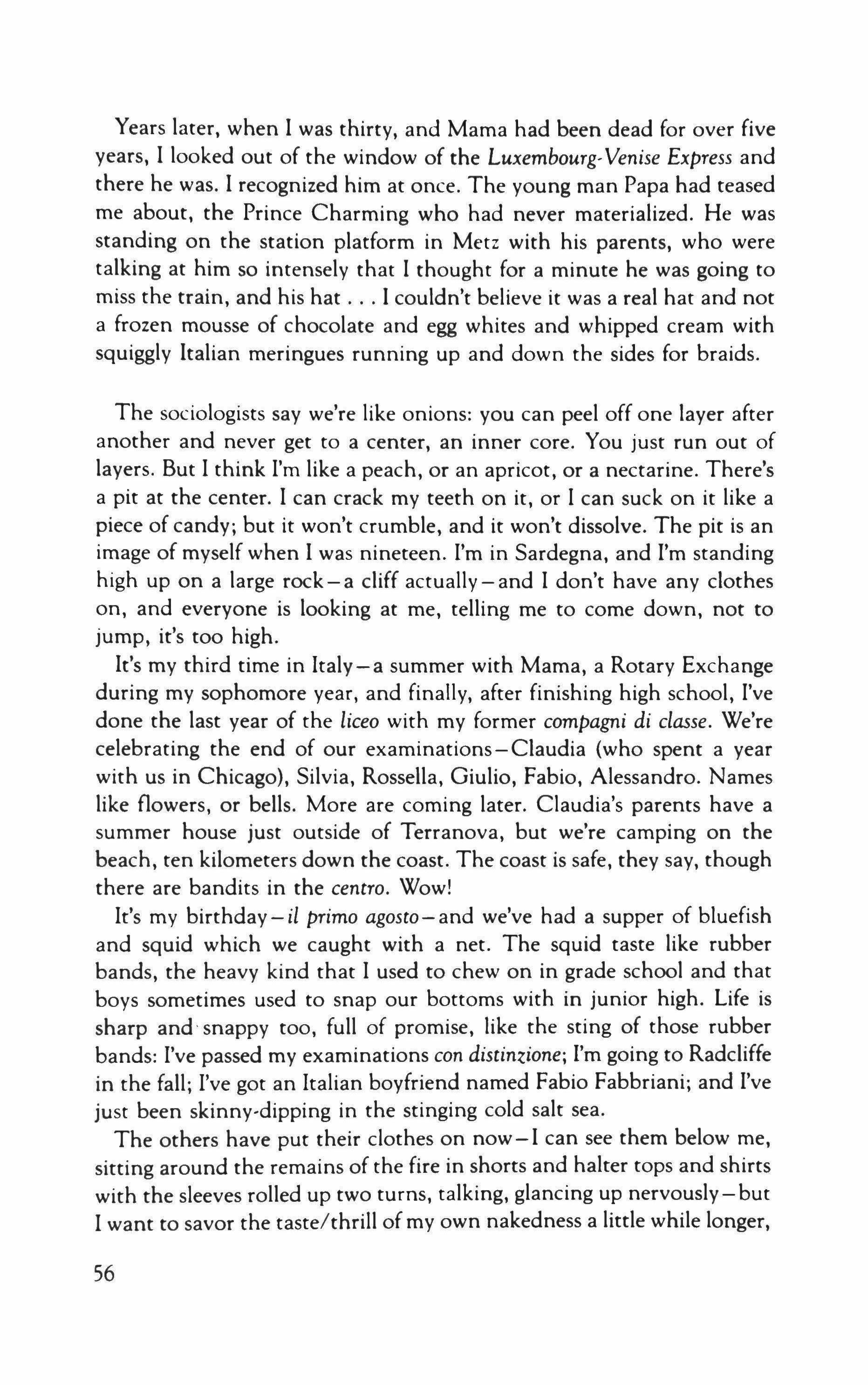
Years later, when I was thirty, and Mama had been dead for over five years, I looked out of the window of the Luxembourg-Venise Express and there he was. I recognized him at once. The young man Papa had teased me about, the Prince Charming who had never materialized. He was standing on the station platform in Metz with his parents, who were talking at him so intensely that I thought for a minute he was going to miss the train, and his hat I couldn't believe it was a real hat and not a frozen mousse of chocolate and egg whites and whipped cream with squiggly Italian meringues running up and down the sides for braids.
The sociologists say we're like onions: you can peel off one layer after another and never get to a center, an inner core. You just run out of layers. But I think I'm like a peach, or an apricot, or a nectarine. There's a pit at the center. I can crack my teeth on it, or I can suck on it like a piece of candy; but it won't crumble, and it won't dissolve. The pit is an image of myself when I was nineteen. I'm in Sardegna, and I'm standing high up on a large rock - a cliff actually - and I don't have any clothes on, and everyone is looking at me, telling me to come down, not to jump, it's too high.
It's my third time in Italy-a summer with Mama, a Rotary Exchange during my sophomore year, and finally, after finishing high school, I've done the last year of the liceo with my former compagni di dasse. We're celebrating the end of our examinations-Claudia (who spent a year with us in Chicago), Silvia, Rossella, Giulio, Fabio, Alessandro. Names like flowers, or bells. More are coming later. Claudia's parents have a summer house just outside of Terranova, but we're camping on the beach, ten kilometers down the coast. The coast is safe, they say, though there are bandits in the centro. Wow!
It's my birthday - il primo agosto - and we've had a supper of bluefish and squid which we caught with a net. The squid taste like rubber bands, the heavy kind that I used to chew on in grade school and that boys sometimes used to snap our bottoms with in junior high. Life is sharp and, snappy too, full of promise, like the sting of those rubber bands: I've passed my examinations con distinzionei I'm going to Radcliffe in the fall; I've got an Italian boyfriend named Fabio Fabbriani; and I've just been skinny-dipping in the stinging cold salt sea.
The others have put their clothes on now-I can see them below me, sitting around the remains of the fire in shorts and halter tops and shirts with the sleeves rolled up two turns, talking, glancing up nervously-but I want to savor the taste/thrill of my own nakedness a little while longer,
56

unembarrassed in the dwindling light. It's the scariest thing I've ever done, except coming to Italy in the first place.
Fabio sits with his back towards me while he smokes a cigarette, pretending to be angry because I won't come down, but when I close my eyes and will him to turn, he puts his cigarette out in the sand and turns. Just at that moment I jump, sucking in my breath for a scream but then holding it, in case I need it later, which I do. I hit the Tyrrhenian Sea feet first, generating little waves that will, in theory, soon be lapping the beaches along the entire western coast of Italy-Sicily and North Africa too. The Tyrrhenian Sea responds by closing over me and it's pitch, not like the pool in Hyde Park, where I learned to swim, but deep and dark and dangerous and deadly.
The air in my lungs-the scream that I saved for just such an occasion-carries me up to the surface, and I strike out for the cove, meeting Fabio before I'm halfway there, wondering if like me he's naked under the water and not knowing for sure till we're walking waist deep and he takes me by the shoulders and kisses me and I can feel something bobbing against my legs like a floating cork. We haven't made love yet, but it won't be long now. 0 mio dio. The waiting is so lovely. He squeezes my buns and I squeeze his, surprised, and then we splash in to the beach and put on our clothes.
What I didn't know at the time was that I was having a nervous breakdown. I was about to crack up completely, and Claudia's parents had to come with their funny little Fiat and take me, with difficulty, to a hospital in Olbia, and then Claudia's mother flew with me to Pisa where Giulio's father, a psychiatrist, arranged to look after me in the psychiatric ward at Santa Maria Nuova, which was founded in 1287 by Falco Portinari, the father ofDante's Beatrice. Giulio's father-whom I remember only as a pair of dark glasses and a hand that held mine when he came into the ward-no private rooms in Santa Maria Nuova-made arrangements for everything, including the hospital expenses. Except for Mama's plane ticket, of course, and her living expenses; but these weren't too bad because she stayed with Claudia's parents.
When Mama came she insisted that it was the strain of being away from home for so long, of trying to adapt to a foreign culture, of working so hard to do well on the examinations. Maybe so, but that's not what it felt like. What it felt like was an explosion, or a power surge. The circuits of the brain were overloaded by pleasure; the voltage was too high; the wires burned out.
And then, afterwards, nothing happened. I mean none of the things I
57

expected to happen happened. Instead of making love with Fabio Fabbriani on the verge of the Tyrrhenian Sea, I got laid on a vinyl sofa in the back room of the SNCC headquarters on Forty-seventh Street. Instead of going to Radcliffe, I went to Edgar Lee Masters Community College, where Mama taught art appreciation. Instead of graduate school I spent two years at the Institute for Paper Technology on Green Bay Road; instead of becoming a research chemist I apprenticed myself to a book conservator in Hyde Park and then took a position in the conservation department of the Newberry Library. Instead of getting married and having babies, I lived at home and looked after Mama, who was dying of lung cancer. A year went by; two years; three years, four. My sisters got married and moved away; Mama died; Papa lost most of his money; the sixties were churning around me, and I couldn't seem to get a footing. I tried to plunge in, to get wet, to catch hold, to find a place in one of the boats tossing and turning on the white-water rapids: the sit-ins, the rock concerts, the freedom rides, SNCC, CORE, SDS, the Civil Rights Act, the Great Society. I spent a lot of time holding hands and singing "We shall overcome"; and I spent a lot of time buying coffee and doughnuts and rolling joints, though I didn't do pot myself - I had enough chemical problems without it; and I spent a lot of time on my back too-the only position for a woman in the Movement.
I was thirty years old when the Arno flooded its banks on 4 November 1966. According to the Sunday Times the damage wasn't extensive, but by Monday it was clear that Florence was a disaster. Fourteen feet of water in the cloisters of Santa Croce; the Cimabue crucifix ruined beyond hope of restoration; panels ripped from the Baptistry doors; the basement of the Bibliotheca Nazionale completely under water; hundreds of thousands of volumes waterlogged; the Archivi di Stati in total disarray. On Tuesday I decided to go back, to offer my services as a humble book conservator, to help in any way I could, to save whatever could be saved, including myself.
The decision wasn't a popular one at home. Papa thought I was cracking up again, having another "episode." He was having money troubles of his own and couldn't pay for a ticket. And my boss at the Newberry. He already had his ticket, paid for by the library, and needed me to mind the store. There wasn't any point in both of us going, was there?
"Then why don't I go and you can mind the store?"
"Because because because ." "Yes?"
Because it just didn't make sense. He couldn't see his way clear to granting me a leave of absence, not even leave of absence without pay.
58

He even suggested that the library might have to replace me, in which case
But I decided to go anyway. I had enough money in my savings account for a ticket on Icelandic, and I figured I could live on the cheap once I got there. I'd lost touch with myoId classmates, but surely one of them would be willing to take me in. Besides, I wanted to break the mold in which my life was hardening, and I thought this might be a way to do it. It was better than waiting around with nothing coming up.
Or was it? The truth is, I hadn't been away from home for more than a week since Mama brought me home from Florence after my crack-up, and I was feeling very shaky. No sleep on the plane, so I took some extra lithium, just as a precaution; but the lithium blurred my vision, so it was hard to read, and besides, the story I was reading was as depressing as the view from the window of the train-flat, gray, poor, dreary, actively ugly rather than passively uninteresting. And I kept thinking about Papa and his money troubles and his lawsuits, and about the embroidered seventeenth-century prayer books on my work desk that needed to be unbound, washed, deacidified, mended, and resewn before Christmas for an exhibit sponsored by the Caxton Club.
So you can see that I was under a certain amount of pressure, and maybe you'll understand me when I say that I was looking for a sign, the way some religious people look for signs, something to let them know they're on the right track. Or on the wrong track, in which case they can turn back. I didn't know what I was looking for, but I was trying to pay attention, to notice everything-the faces of the two American women sitting opposite me in the compartment, scribbling furiously in their notebooks; the Neapolitan accent of the conductor; the depressing French farmhouses, gray boxes of stucco or cinder block, I couldn't make out which.
That's what I was doing-paying attention-when the train pulled into the station at Metz and I saw the St. Cvr cadet on the platform. That hat stirred something inside me, made me feel I was doing the right thing and that I ought to keep going, that things would work out. Just to make sure I closed my eyes and willed him into the compartment, just as I had once willed Fabio Fabbriani to turn and watch me plunge feet-first into the sea. As I was willing him into the compartment I was willing the American women out of it, not making my cadet's appearance contingent upon their departure, however, because I was pretty sure they weren't going to budge. I kept my face down in my book and waited, eyes closed lightly, listening to the noises in the corridor.
I was, I suppose, still operating, at least subconsciously, on a fairy-tale
59

model of reality: I was Sleeping Beauty, or Snow White, waiting for some prince whose romantic kisses would awaken my full feelings, liberate my stormy senses, emancipate my drowsy and constrained imagination, take me back to that last Italian summer.
The train was already in motion when the door of the compartment finally opened. I kept my eyes closed another two seconds and then looked up at-not Prince Charming but my Neapolitan conductor, an old man so frail I'd had to help him hoist the American women's mammoth suitcases up onto the overhead luggage rack. These suitcases were to luggage what Burberry trench coats are to rainwear-Iots of extra pockets and straps and mysterious zippers concealed under flaps.
I asked him about the St. Cvr cadet.
"Ii compartamento prossimo," he said; "not your type; too young; you need an older man like me."
"You're already married."
He shrugged, putting his whole body into it, arms, hands, shoulders, head cocked to one side, stomach pulled in.
"Better tell your friends" - we were speaking in Italian - "that the vagoneristorante will be taken off the train before we cross the border; you need to reserve a seat early."
I nodded.
"Unless," he went on, "they have those valigi stuffed with American food. Porcamatina." He glanced upwards at the suitcases, tapped his cheekbone with an index finger and was gone.
I felt, for these American women, some of the mixed feelings that the traveler feels for the tourist. On the one hand you want to help, to show off your superior knowledge; on the other hand, you don't want to get involved. I didn't want to get involved. They weren't my type. These were saltwater women - sailors, golfers, tennis players, club women with suntans in November, large-limbed, confident, conspicuous, firm, trim, sleek as walruses in their worsted wool suits. They reminded me of the Gold Coast women who used to show up at the CORE demonstrations, around the edges, with their checkbooks open, telling us how much they admired what we were doing, and how they wished they could help more.
As far as they knew, I was a scruffy little Italian - I hadn't spoken a word of English in their presence, and I was reading an Italian noveland it was too late to undeceive them. I had heard too much!
I knew, for example, that they'd met the previous summer at a some kind of writing workshop at Johns Hopkins University and that they'd
60

both jumped in the sack with their instructor, a novelist named Philip. I knew that Philip was bald but well-hung ("like a shillelagh"). I knew that neither of them had done it dog-fashion B.P. ("before Philip"), and that they were traveling second-class because Philip had told them they'd get more material that way for the stories that they were going to write now that they were divorced.
Part of their agenda, 1 gathered, was to notice things, to pay attention. Maybe they were looking for signs too, maybe not; in either case they seemed to be trying to impress the details of European railroad travel onto the pages of their marbled composition books by sheer physical force. Nothing escaped their notice, not even the signs, in French, German and Italian, warning passengers not to throw things out the window and not to pull the cord on the arret d'urgence. All the details went into their notebooks-the fine of not less than 5000 FF, the prison term of not less than one year. And when one noticed something, the other did too: the instructions on the window latch; the way the armrests worked; the captions on the faded views of Chartres Cathedral which hung on the walls of the compartment above the backs of the seats. (I was tempted to look at them myself, but 1 didn't want to give myself away or interrupt their game.)
I kept my nose in my book-Natalia Ginzburg's Le piccole virtu-but it was a strenuous hour and I was glad when, simultaneously, they closed their notebooks and resumed their conversation, panting like dogs after a good run.
Yolanda: Did you get the old man with the pipe?
Ruth: Got him.
Yolanda: The emergency stop?
Ruth: Got it.
Yolanda: The sheep?
Ruth: What sheep? I didn't see any sheep.
Yolanda: Hah! (She licks her finger and scores off an imaginary line in the air.) There were six sheep in sornebodv's yard.
Ruth: 0 shit. 1 wish Philip were here.
Yolanda: You can have Philip; I'll take the guy with the funny hat.
Ruth: What guy?
Yolanda: Back in Metz.
Ruth: Not fair.
Yolanda: How do you really feel about Philip? Do you think he just used us? I mean, who would have thought that first day
Ruth: Do you suppose he screwed Alice too? She's the one who really needed it. Or how about Helga?
61

Yolanda: Helga, maybe. Alice, no. Too old. No talent.
Ruth: Do you suppose that's why he teaches those workshops?
Yolanda: Do you suppose that's why we went? (A silence.)
Ruth: I think I got a lot out of it. I mean besides a roll in the hay. I mean, I think I'm getting my head together, noticing a lot of stuff I never noticed before.
Yolanda: Like the Emergency Stop?
Ruth (nods): Yeah. Maybe it's not important, but I'm learning to look at things. Really look. Like these pictures. Chartres Cathedral. Little stuff like that, or that guy with the funny hat. They all add up. It's like getting new glasses.
Yolanda: How about the announcement on the PA system? Did you get that?
Ruth {looking at her notebook}: Pardonnay something or other, that's all I got. How about you?
Yolanda: I drew a blank. (Looking out the window.) I thought France was supposed to be beautiful.
Ruth (thumbing through her guidebook): We're in Alsace-Lorraine. Remember Alsace-Lorraine? I think it used to be part of Germanylots of heavy industry and potash mining. Joan of Arc was born here.
Yolanda: Swell. How long does it last?
Ruth: Till we get to Switzerland, I guess.
Yolanda: It'll be dark by then. We won't be able to see the mountains.
The train, an express but not a "crack" express, had settled into a steady, comfortable rhythm that made me think of the books I'd read as a child in which trains went clicketv-clack, clicketv-clack, down the track, down the track, clicketv-clack. I shrugged my shoulders, mentally, and turned back to Le piccole virtu.
Ruth and Yolanda got out their notebooks and spent another hour writing-less strenuously this time - and then they read aloud what they had written, which I found more disturbing than listening to them talk about their sexual escapades with Philip. Disturbing not because it was embarrassing, but because their stories brought me, against my will, into the quiet centers of their lives, to places where Philip had never been. And yet they didn't know I was there. I was totally invisible. So invisible that I hadn't even been noticed in their furious cataloging of authentic European details.
Ruth read first, staring down hard at her notes. Her father, she began,
62
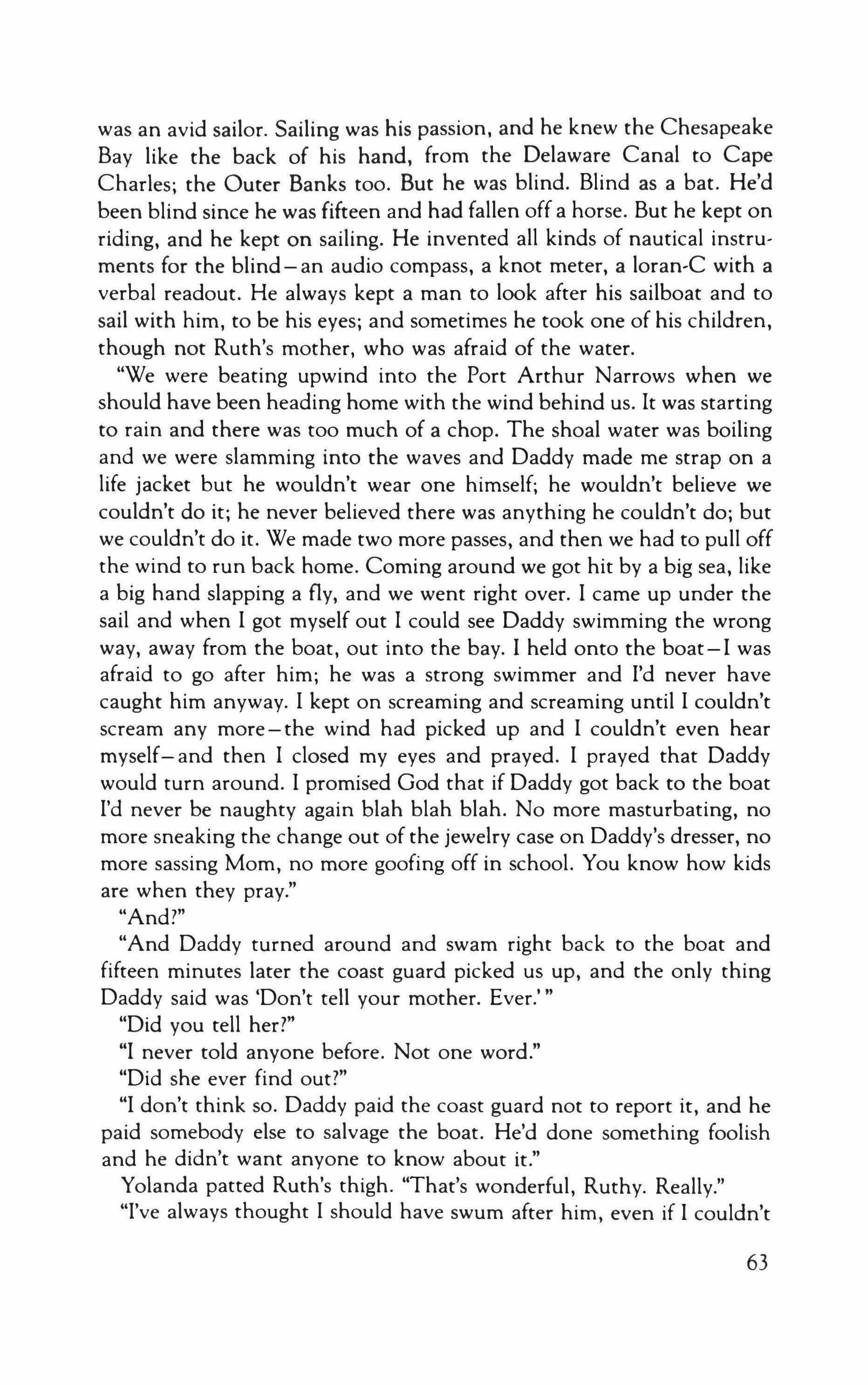
was an avid sailor. Sailing was his passion, and he knew the Chesapeake Bay like the back of his hand, from the Delaware Canal to Cape Charles; the Outer Banks too. But he was blind. Blind as a bat. He'd been blind since he was fifteen and had fallen off a horse. But he kept on riding, and he kept on sailing. He invented all kinds of nautical instruments for the blind - an audio compass, a knot meter, a loran-C with a verbal readout. He always kept a man to look after his sailboat and to sail with him, to be his eyes; and sometimes he took one of his children, though not Ruth's mother, who was afraid of the water.
"We were beating upwind into the Port Arthur Narrows when we should have been heading home with the wind behind us. It was starting to rain and there was too much of a chop. The shoal water was boiling and we were slamming into the waves and Daddy made me strap on a life jacket but he wouldn't wear one himself; he wouldn't believe we couldn't do it; he never believed there was anything he couldn't do; but we couldn't do it. We made two more passes, and then we had to pull off the wind to run back home. Coming around we got hit by a big sea, like a big hand slapping a fly, and we went right over. I came up under the sail and when I got myself out I could see Daddy swimming the wrong way, away from the boat, out into the bay. I held onto the boat-I was afraid to go after him; he was a strong swimmer and I'd never have caught him anyway. I kept on screaming and screaming until I couldn't scream any more-the wind had picked up and I couldn't even hear myself-and then I closed my eyes and prayed. I prayed that Daddy would turn around. I promised God that if Daddy got back to the boat I'd never be naughty again blah blah blah. No more masturbating, no more sneaking the change out of the jewelry case on Daddy's dresser, no more sassing Mom, no more goofing off in school. You know how kids are when they pray."
"And?"
"And Daddy turned around and swam right back to the boat and fifteen minutes later the coast guard picked us up, and the only thing Daddy said was 'Don't tell your mother. Ever.'''
"Did you tell her?"
"I never told anyone before. Not one word."
"Did she ever find out?"
"I don't think so. Daddy paid the coast guard not to report it, and he paid somebody else to salvage the boat. He'd done something foolish and he didn't want anyone to know about it."
Yolanda patted Ruth's thigh. "That's wonderful, Ruthv. Really."
"I've always thought I should have swum after him, even if I couldn't
63

have caught him - he was a powerful swimmer; but I just let him go. I was too scared. He had red hair and I could see the top of his head like a buoy that's lost its mooring, drifting farther and farther away, and then I couldn't see it at all till he was almost back at the boat. That's why I've never told anyone, that's why I didn't want anyone to know."
"And you've been a good girl ever since? No sassing your mom? No playing with vourself]" Yolanda leaned over and planted a sisterly kiss on her friend's cheek.
"No no, nothing like that. You know me."
"It's so trivial compared to yours. It's nothing. It doesn't matter."
"Yes it does, Yolo. You can't judge your own writing anyway. Philip said that over and over. You can't really see it yourself. That's why you need a reader, an audience. Every work of art needs a receiver, remember?"
It took a lot of persuading to get Yolanda to read what she'd written, but eventually Ruth prevailed. Yolanda opened her notebook but she didn't look at it. She looked out the window and just talked.
"One day when I came home from school I opened the refrigerator to get a glass of milk and a rat jumped out."
"You've got to be kidding."
"My mother died, she just died. She was standing in the doorway, all dressed up to go to the Club. You should have seen her face. Here she is in this pink shantung suit, and this rat comes charging out of the refrigerator and runs across the floor into the butler's pantry."
Ruth: 0 my God.
Yolanda: She stood there for about thirty seconds and then she closed the kitchen doors so it couldn't come back in and got on the phone. She told the exterminator that she was pregnant and that if he didn't come within half an hour she'd miscarry, and then when he did show up she made him go back out and pull his truck into the garage because she didn't want the neighbors to see it in the drive! Milton, my little brother, came down to see what was going on and he kept shouting, "a rat, a rat, there's a rat in the house." And Mama couldn't shut him up, and she couldn't get us to go to the Hendersons, who lived up the Bay Road. She wanted us out of the way; but she didn't want us to tell Mrs. Henderson what was going on.
The exterminator had a rat detector, kind of like those metal detectors you see people walking around with at the beach, with a little box thing on a shoulder strap. We followed him all around the kitchen-the rat, he said, had probably come up through the wall and made a nest under the
64
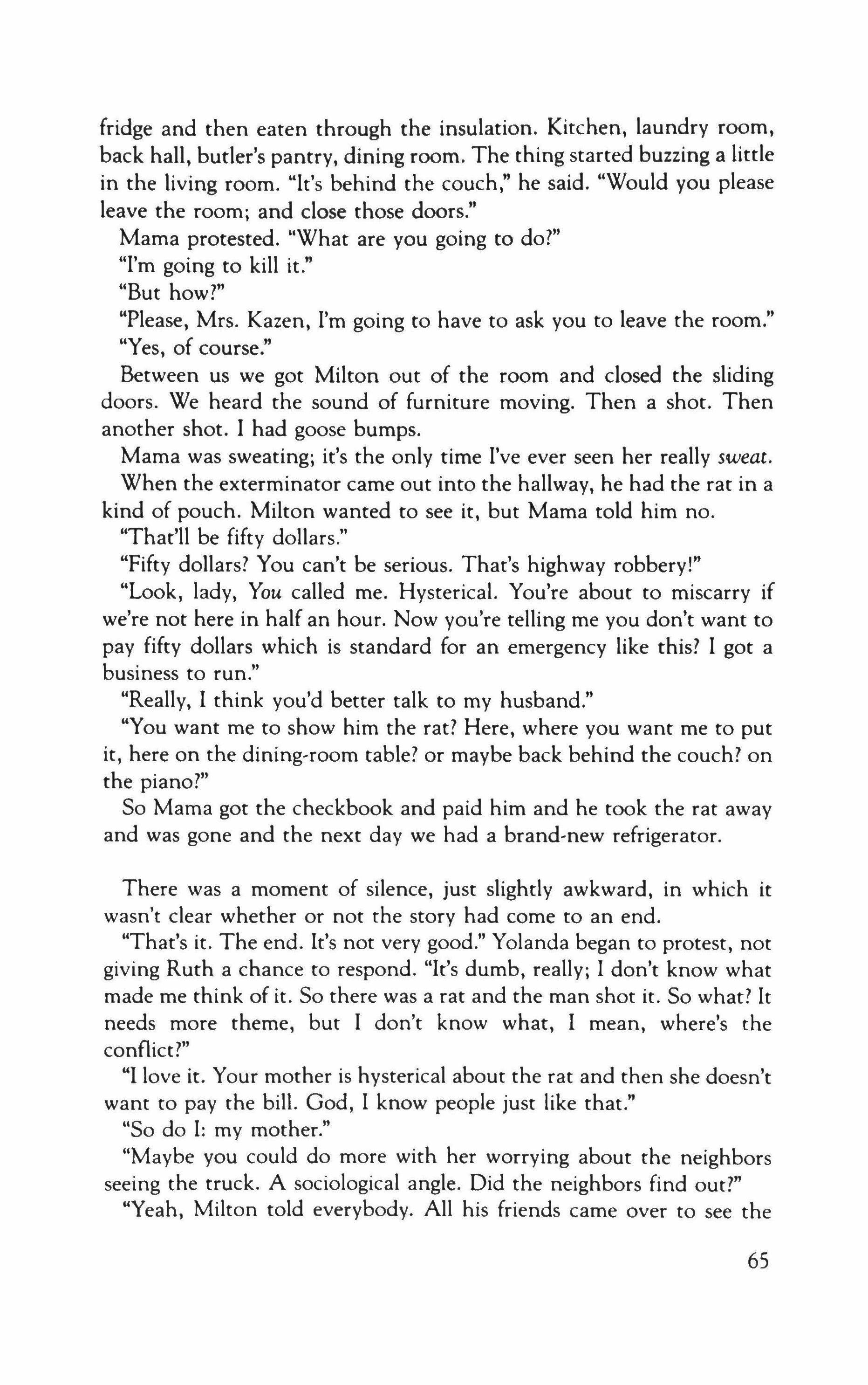
fridge and then eaten through the insulation. Kitchen, laundry room, back hall, butler's pantry, dining room. The thing started buzzing a little in the living room. "It's behind the couch," he said. "Would you please leave the room; and close those doors."
Mama protested. "What are you going to do?"
"I'm going to kill it."
"But how?"
"Please, Mrs. Kazen, I'm going to have to ask you to leave the room."
"Yes, of course."
Between us we got Milton out of the room and closed the sliding doors. We heard the sound of furniture moving. Then a shot. Then another shot. 1 had goose bumps.
Mama was sweating; it's the only time I've ever seen her really sweat.
When the exterminator came out into the hallway, he had the rat in a kind of pouch. Milton wanted to see it, but Mama told him no.
"That'll be fifty dollars."
"Fifty dollars? You can't be serious. That's highway robbery!"
"Look, lady, You called me. Hysterical. You're about to miscarry if we're not here in half an hour. Now you're telling me you don't want to pay fifty dollars which is standard for an emergency like this? 1 got a business to run."
"Really, 1 think you'd better talk to my husband."
"You want me to show him the rat? Here, where you want me to put it, here on the dining-room table? or maybe back behind the couch? on the piano?"
So Mama got the checkbook and paid him and he took the rat away and was gone and the next day we had a brand-new refrigerator.
There was a moment of silence, just slightly awkward, in which it wasn't clear whether or not the story had come to an end.
"That's it. The end. It's not very good." Yolanda began to protest, not giving Ruth a chance to respond. "It's dumb, really; I don't know what made me think of it. So there was a rat and the man shot it. So what? It needs more theme, but I don't know what, I mean, where's the conflict?"
"I love it. Your mother is hysterical about the rat and then she doesn't want to pay the bill. God, I know people just like that."
"So do I: my mother."
"Maybe you could do more with her worrying about the neighbors seeing the truck. A sociological angle. Did the neighbors find out?"
"Yeah, Milton told everybody. All his friends came over to see the
65

bullet holes. One of them got plastered over, but the other one's still there, in the molding."
"Did anybody say anything?"
"0, yeah. They talked about it all right, but it wasn't any big deal. In fact, everybody had a rat story. Maybe that's the interesting thing. It didn't matter who it was, if Papa told the rat story, pretty soon everybody was telling rat stories. Those old houses near the water, you can't help it."
"Kind of like everybody having secret fantasies, maybe."
"I tried to write about Philip too. But every time 1 write about sex it comes out all wrong. You know, I never did it dog-fashion with Teddy. We did a lot of things, but not that. But when you try to write about it, it just sounds stupid. It seems so meaningful when you're doing it, just physically, and all that mental stuff too, breaking taboos, you know what I mean? But it's hard to write about. There's no good word for youknow-what. 1 mean, just plain 'penis' sounds dumb. All those words sound dumb: prick, dick, dork, cock, schlong, wiener, wang You can't tell the truth with them."
My invisibility had become too uncomfortable. 1 was oppressed by the weight of an intimacy I couldn't share, and by the irony of the situation: two American women come to Europe in search of story material and what rises to the surface when they put pen to paper? Mama and Papa, Papa swimming blindly out towards open water, Mama bickering with the exterminator about the fee for killing a rat. I extracted my nylon bag from the luggage rack-a little calf nestled between two big bulky cowsand left the compartment without a word, turning to the left, which is how I found my St. Cyr cadet, sans chapeau, on his way back from the toilet at the end of the car. He turned abruptly, entered his compartment, and pulled the door shut behind him.
"C'e un posto libetoi" I said-"une place libre?"
He shrugged his shoulders, though there was no one else in the compartment, and no suitcases in sight except for his longish brown duffle bag and my nylon one. He'd removed his fabulous chocolate hat, which was on the seat beside him, along with a smart attache case which he'd been using as a lap desk. He was writing a letter.
"You have a very nice hat," I said in French, "un chapeau extraordinaire."
I hadn't meant to embarrass him, but he blushed and covered the letter with his hands, as if to keep me from reading it. "Vraiment," I continued, but then I got stuck. "Vraiment, 1 repeated,
66

but I couldn't get any farther. Vraimenc, vraimenc, vraimenc, un chapeau extraordinaire."
Was this a sign? This language amnesia? Was my brain sending me a message, telling me to go home?
"Are you all right?" he asked in perfect English.
"Yes, thank you. Whenever I try to speak French it comes out Italian, but I'll be all right now."
His name was Gautier, which I realized later is "Walter" in EnglishWalt; what a funny name for a Frenchman-and he was quite a nice young man, who was going to Mulhouse to visit his uncle before returning to St. Cvr-L'Ecole. He was quite amused when I finally explained about Papa's frozen dessert. He had never heard of such a thing and I promised to send him the recipe - he thought his mother would like it. I still have his address and even his phone number in my little black address book, but I never sent him the recipe, I'm not sure why. Maybe it was because I'd tried to pin some hopes on him, to invest him with the power to tell me, by some word or gesture, either that I was doing the right thing and should persevere, or that I had made a terrible mistake and should turn back before it was too late, but I hadn't been able to do it. It wasn't his fault. It was just that the redheaded blind man kept churning his way through the dark waves of my imagination. What had he been thinking of? I wondered. And why had he turned back? That was the real mystery. And, like Yolanda and Ruth, I was thinking about my own papa and mama-Papa in his old age, alone, swimming blindly out into a darkness from which there would be no turning back. And Mama, already there, Mama who once found a rat in the basement toilet. She put on rubber gloves, picked it up and wrapped it in foil and then in plastic so the dogs wouldn't smell it. Had it climbed into the toilet and fallen in, or had it come up through the pipes? Which was worse, imaginatively speaking? We'd talked about it a lot but never settled the question. "You're right," I wanted to shout; "everybody has a rat story, just like secret fantasies. If things had worked out differently, I would have told you mine."
The second seating for dinner was announced, but Gautier was planning to eat with his uncle in Mulhouse, and I didn't feel like eating. I offered him a Lifesaver, which he accepted, and then I returned to my book and he to his letter. I managed to doze off for a while and was sleeping when myoid friend the Italian conductor entered the compartment and offered to escort me back to my own seat.
I protested, but it was quite impossible, he said, for me to remain where I was. The couchette assignments could not be changed, and
67
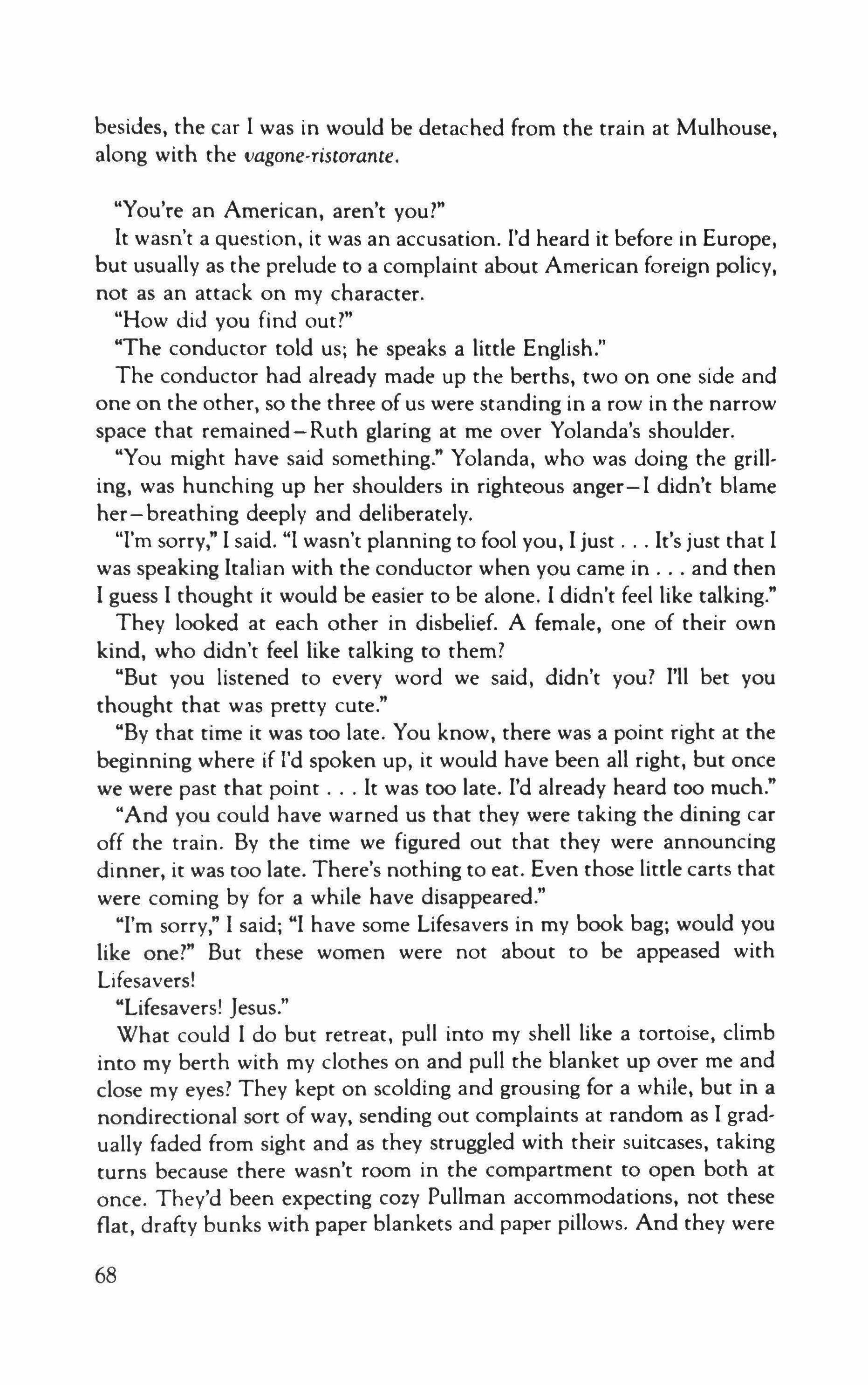
besides, the car I was in would be detached from the train at Mulhouse, along with the vegone-nstorcnre.
"You're an American, aren't you?"
It wasn't a question, it was an accusation. I'd heard it before in Europe, but usually as the prelude to a complaint about American foreign policy, not as an attack on my character.
"How did you find out?"
"The conductor told us; he speaks a little English."
The conductor had already made up the berths, two on one side and one on the other, so the three of us were standing in a row in the narrow space that remained - Ruth glaring at me over Yolanda's shoulder.
"You might have said something." Yolanda, who was doing the grilling, was hunching up her shoulders in righteous anger-I didn't blame her- breathing deeply and deliberately.
"I'm sorry," I said. "I wasn't planning to fool you, I just It's just that I was speaking Italian with the conductor when you came in and then I guess I thought it would be easier to be alone. I didn't feel like talking."
They looked at each other in disbelief. A female, one of their own kind, who didn't feel like talking to them?
"But you listened to every word we said, didn't you? I'll bet you thought that was pretty cute."
"By that time it was too late. You know, there was a point right at the beginning where if I'd spoken up, it would have been all right, but once we were past that point It was too late. I'd already heard too much."
"And you could have warned us that they were taking the dining car off the train. By the time we figured out that they were announcing dinner, it was too late. There's nothing to eat. Even those little carts that were coming by for a while have disappeared."
"I'm sorry," I said; "I have some Lifesavers in my book bag; would you like one?" But these women were not about to be appeased with Lifesavers!
"Lifesavers! Jesus."
What could I do but retreat, pull into my shell like a tortoise, climb into my berth with my clothes on and pull the blanket up over me and close my eyes? They kept on scolding and grousing for a while, but in a nondirectional sort of way, sending out complaints at random as I gradually faded from sight and as they struggled with their suitcases, taking turns because there wasn't room in the compartment to open both at once. They'd been expecting cozy Pullman accommodations, not these flat, drafty bunks with paper blankets and paper pillows. And they were
68

hungry, really hungry. I was getting hungry too, but I tried not to let it bother me as I watched them undress.
Despite the unsatisfactory accommodations, they were not about to compromise their sleeping arrangements, not about to wrinkle their tailored suits by sleeping in them. They pulled down the shades and stripped right down to the buff, teetering and tottering in the narrow space, bumping into the sides of the berths and into each other as the train swayed from side to side, showing themselves to me, from neck to knee, as freely as if I weren't there at all. I had resumed my invisibility.
Lying on my back, observing this display of bare leg and bare buttock, I was reminded of Meg and Molly, my sisters, whose mysterious flesh I had often observed from the bottom bunk in the room I shared with Molly. Ruth, like Molly, had bright-red pubic hair, and tufts of brightred hair under her arms, as if her body were bursting into flames; Yolanda, bending over to remove her nylons, revealed, beneath a delicate pucker, the little drawstring purse that held her woman's treasure. I inhaled along with the gentle aroma of expensive perfumes, a powerful damp-dog smell. Someone was having her period.
I closed my eyes and breathed deeply. Something funny had happened. My initial animosity towards these women had turned into a kind of love; not erotic, I don't mean that, but the kind of love I felt for my sisters, whose memory caught me like a charley horse or a stitch in the side, and not inexplicably either. I'd taken - stolen - a ten-dollar bill from my mother's purse once, and since no one would confess to the crime we'd all three been sent to bed without supper. My sisters, though they had refused to tattle on me, had been hungry and ill-tempered, not about to let me off the hook. Like Ruth and Yolanda, they'd wanted me to suffer for what I'd done. But not for long. They were never mad for long, and pretty soon we were horsing around just like we always did. Three travelers we'd been, starting out on a journey together, and then somehow we'd been separated, not by miles or kilometers, but by husbands and children and Mama's death and Papa's money troubles. I tried to remember what I'd done with the ten-dollar bill. How had I spent it? Movies? Candy? Books? Toys? Had I spent it at all? Was it still hidden securely between the pages of some book? I couldn't remember, but I could remember Papa coming upstairs and saying that if we didn't settle down he'd have to spank us, and then he came up again and brought his guitar and sang "The Pony Man" and "Bottle of Wine," our favorite songs. But we didn't get anything to eat till breakfast!
69
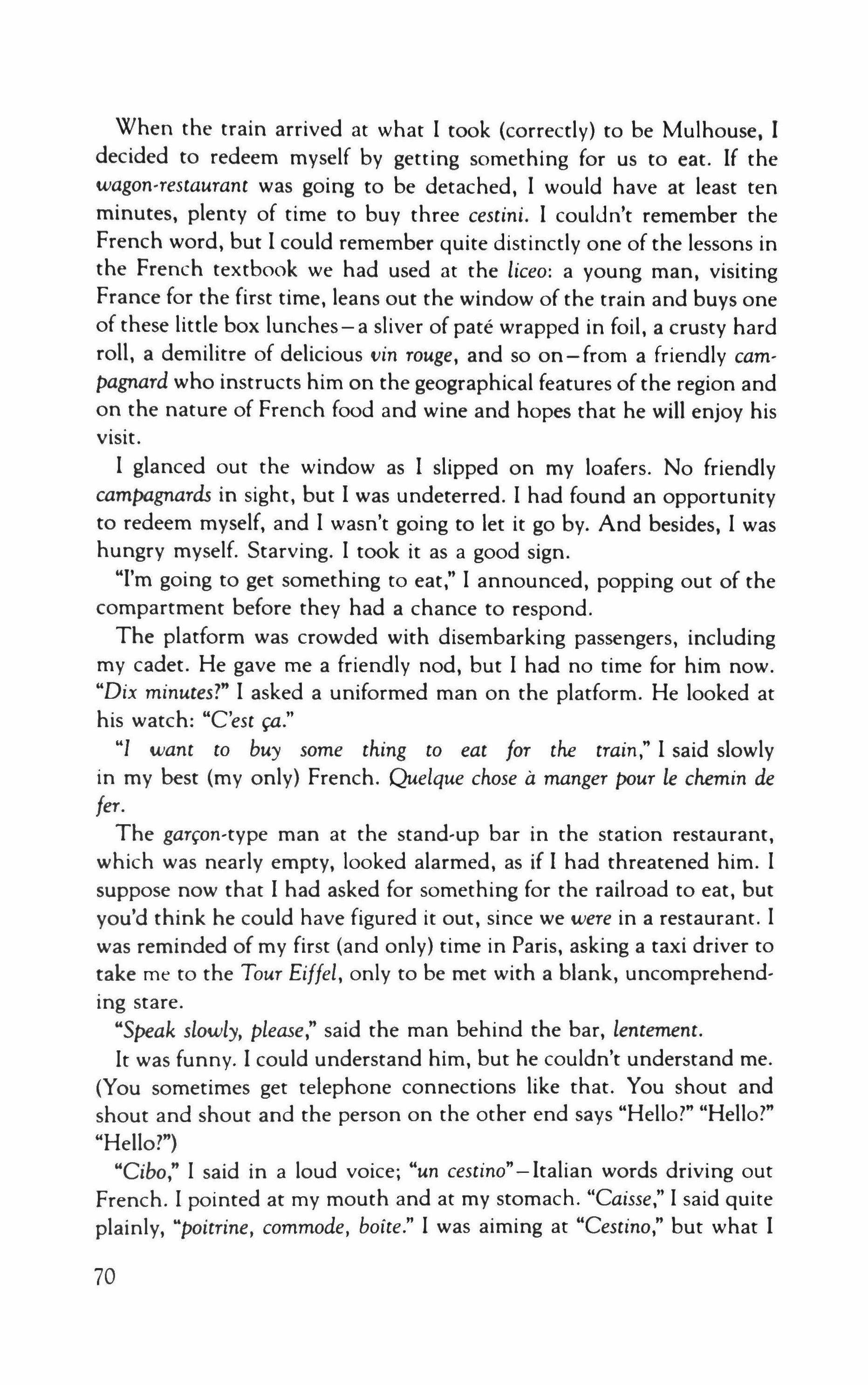
When the train arrived at what I took (correctly) to be Mulhouse, I decided to redeem myself by getting something for us to eat. If the wagon-restaurant was going to be detached, I would have at least ten minutes, plenty of time to buy three cestini. I couldn't remember the French word, but I could remember quite distinctly one of the lessons in the French textbook we had used at the liceo: a young man, visiting France for the first time, leans out the window of the train and buys one of these little box lunches - a sliver of pate wrapped in foil, a crusty hard roll, a demilitre of delicious vin rouge, and so on-from a friendly campagnard who instructs him on the geographical features of the region and on the nature of French food and wine and hopes that he will enjoy his visit.
I glanced out the window as I slipped on my loafers. No friendly campagnards in sight, but I was undeterred. I had found an opportunity to redeem myself, and I wasn't going to let it go by. And besides, I was hungry myself. Starving. I took it as a good sign.
"I'm going to get something to eat," I announced, popping out of the compartment before they had a chance to respond.
The platform was crowded with disembarking passengers, including my cadet. He gave me a friendly nod, but I had no time for him now. "Dix minutes?" I asked a uniformed man on the platform. He looked at his watch: "C'esr �."
"1 want to buy some thing to eat for the train," I said slowly in my best (my only) French. Quelque chose a manger pour le chemin de fer.
The gar�on-type man at the stand-up bar in the station restaurant, which was nearly empty, looked alarmed, as if I had threatened him. I suppose now that I had asked for something for the railroad to eat, but you'd think he could have figured it out, since we were in a restaurant. I was reminded of my first (and only) time in Paris, asking a taxi driver to take me to the Tour Eiffel, only to be met with a blank, uncomprehending stare.
"Speak slowly, please," said the man behind the bar, lentement.
It was funny. I could understand him, but he couldn't understand me. (You sometimes get telephone connections like that. You shout and shout and shout and the person on the other end says "Hello?" "Hello?" "Hello?")
"Cibo," I said in a loud voice; "un cestino" - Italian words driving out French. I pointed at my mouth and at my stomach. "Caisse," I said quite plainly, "poitrine commode, boite" I was aiming at "Cestino" but what I
70

was saying was: "Cashbox, breast, dresser, box." "Box," that was it: "boite de picnic."
"Boite de Picnic?" Once again his face assumed a pained expression. A quick glance at my watch informed me that four and one-half minutes had elapsed since I'd disembarked the train. I ran through the scene in the textbook once more, remembering, as I did so, that it had taken place in the station in Avignon, and that Petrarch had been born in Avignon, or else he'd gone to live there.
"WouLd you Like something co eat?"
"Sit Sit S'iL vous pLait."
"Yes, of course, mais oui. PLease take a seat." He gestured at a row of empty tables. ''I'LL bring you a menu. The poached chicken [I think that's what he said] is very good this evening."
"Non importa," I shouted, once again in Italian. "Ie doesn't marrer. Anything. ]'ai faim."
I could still hear him perfectly, but something was wrong at the other end of the connection. Probably it simply didn't occur to a Frenchman that anyone would order up a meal in this haphazard, thoughtless fashion; and in fact I have never found any evidence-apart from my school textbook-that anything remotely resembling Italian cestini are sold in French railroad stations, except perhaps at Avignon; certainly not in Mulhouse. In any case, I found it difficult to convey, in words, the sense of urgency that I felt, though my body must have indicated that I was in distress.
"Do you need co use the w.c.?" he asked.
"Non non non. Le train parte route de suite."
Another two minutes had elapsed.
"Le train? Ahhh! You wouLd Like something co take with you on the train?" He jerked his head in the direction of the platform, whence came hooting noises and loud bursts of hot air from the brakes.
"Yes yes yes si si si."
"Moment."
As he was disappearing through a curtained door behind the bar, I realized I had forgotten about Ruth and Yolanda. "Three," I shouted; "siamo in rre; trois personnes. QueLque choses pour trois personnes." He glanced over his shoulder and nodded, holding up three fingers: "Trois?"
"Si si si."
I decided I would give him three minutes. From where I was standing I could still see the last car of the train, which had backed into the station.
Two minutes passed. Three. By the time he returned I was almost but
71

not quite frantic. He presented me with a long flat box tied with white butcher's string and a bill for 150 FF, which I was to pay at the caissier. I hadn't expected to eat for nothing, but 150 FF was an astonishing sum, almost thirty dollars for a couple of sandwiches. It was more money than I had, in fact, in francs, but I was able to cash a traveler's check without too much difficulty, though I had trouble signing my own name.
The train, having parted from the last three cars, was already in motion when I reached the platform. I hesitated a second or two to get my bearings, unable to believe in my heart of hearts that it would actually leave without me. In my head, of course, I knew that even in Italy trains didn't wait for latecomers and that French trains might even leave a little early, just for the pleasure of spoiling someone's trip. But in my heart I knew it wasn't right that I should be left behind when all I was trying to do was get something to eat for myself and those two American women, my sisters, who would think that I had gotten what I deserved and would never know that I'd done it for them. It was simply too unjust, too unfair. Why hadn't the conductor made sure I was back on the train? I simply couldn't believe it, and then I was running along the long platform that stretched out into the night. My legs almost buckled at first, but then I found them and they began to carry me faster and faster, speeding past benches and drinking fountains and, as I approached the far end of the platform, pushcarts piled high with boxes and bags and suitcases. In a film the scene would have been shot with a telephoto, cutting back and forth from me, Margot, the box of thirtydollar sandwiches banging against my side, to the train itself; it would have peered into a lighted window, as I did, to see an old man's face pressed against the pane, or perhaps (in the film version) two lovers embracing. In the camera's foreshortened vision the train would chug and chug and chug without covering much ground and I would run and run and run without gaining on it. Actually, I was gaining on the train. It wasn't overtaking it that was the main problem, it was finding a place to get on, it was judging how far to lead - the way a hunter leads a bird or a bounding deer- the open platform on the last car of the train. If the station platform had been longer-another twenty meters-I think I would have made it, but it wasn't and I didn't. Instead of catching the train, I took a leap in the dark of the end of the platform, landed on my feet, stumbled, tumbled on rough white rocks, and picked myself up (still holding the box of sandwiches). The train, carrying my luggage, my passport, my Icelandic ticket (open-return), my supply of lithium, all my bookbinding tools, chugged indifferently down the track, displaying
72

three red lights, like stars, fading red giants-the sign I'd been looking for, unambiguous. You could only read it one way.
I experienced a brief moment of relief and absolute calm in which I went over in my mind what I had to do, reminding myself that I had enough money for a hotel room and that my baggage-my nylon suitcase and my Harvard book bag-would certainly be returned the next day. This moment lasted about two seconds and then I started to scream, to curse the train, first in English and then in Italian, in which I was quite proficient: poreatlaceamadonna, poreamadonnm:acca, and so on. Unfortunately-or perhaps fortunately-the only French swearword I knew was sacre bleu, which seemed pretty tame, but a sentence from my textbook suddenly popped into my head, an imperative: "Stop that man; he has stolen my umbrella," and I began to yell at the receding red lights: "Arretez cet homme; il a vole mon parapluie. Arretez cer homme. Arrerez ee train." Much to my surprise, the train stopped.
I didn't notice it right away. In fact, I walked half the length of the long platform before giving a backwards glance, and even then it wasn't immediately obvious that the three red lights were no longer receding. Sitting on a bench, trying to come to grips with the dramatic turn in my circumstances, wondering whether or not to call Papa and what he would say-would he be glad to have me back so soon, or would this disaster merely confirm his suspicion that I was not and never would be able to look after myself? Should I ask him to call my boss at the Newberry, to tell him I was coming home? I looked once again in the direction of the departed train, and this time I noticed that the red lights were as bright if not brighter than ever, and soon they were brighter still. I was too astonished to get up from my bench. It didn't occur to me at the moment that the train might be backing up for any reason other than my own convenience. I was delighted, overjoyed, in fact, and I had to hug myself to keep from laughing hysterically. By the time the train had backed into the station, the crowd of railroad employees who had gathered to greet it had been joined by half a dozen gendarmes, in their handsome uniforms, and something told me to stay put, not to call attention to myself. The lights were on now in most of the compartments and I caught a glimpse of Yolanda's face pressed, briefly, against one of the windows of what was now the last car. It was white as chalk in the artificial light of the carbon lamps. Then Ruth's, equally white. The gendarmes and the railroad men boarded the train. After a discreet interval, I followed and immediately popped into
73

one of the toilets. I was nervous and somewhat shaken, but pleased with myself.
When I emerged from the toilet I was told, roughly, by a gendarme, to return to my compartment rouee de suite. I was also told (I think) that I shouldn't flush the toilet in the station.
"O.K.," I said. "O.K." The gendarme let his fingertips brush against my bottom as I squeezed past him in the corridor. The French are so romantic. I brought my heel down on the toe of his shiny black boot.
The train was delayed for almost an hour and a half while the railroad people checked couplings and brakes and air hoses, and the gendarmes interrogated the passengers. Someone had pulled the Emergency Stop cord, a serious offense, not a prank. Computers in three countries were rearranging timetables to accommodate the Luxembourg-Venise Express; passengers, we were admonished, might be forced to disembark and wait several hours in the station. The gendarmes in general wanted to know WHO had pulled the cord. And the gendarme in particular whose fingers had tickled my rear end wanted to know WHO had pulled the cord, and he thought that my emergence from the w.c. was a clue of some kind. There was something odd about it, but he was no Sherlock Holmes and didn't know what to do with it.
He questioned us in French and I translated as best I could for Yolanda and Ruth, who remained in their berths holding their paper blankets up around their necks.
"Why on earth would we pull the Emergency Stop cord?"
"Pourquoi voudront-ils tiret le corde d'urgence?"
"Pas de 'voudront'; 'voudraient:" he corrected. "Not why will they, why would they."
That's what he wanted to know.
I glanced again at the warning, in three languages, but not in English: Defense de titer la corde d'urgence, and at the penalty: 5000 FF. No joke. A thousand dollars. And up to a year in a French prison.
And why was I in the w.c.? he wanted to know, after the train had stopped and the passengers had been told to remain in their compartments?
"Because 1 fuu1 to make pee pee," I shouted at him in a sudden burst of fluency; "1 fuu1 to faire pi pi, can't you understand that?"
We were all relieved when he left our compartment and went on to the next, and even more relieved when, after a nerve-numbing delay, the train once again pulled out of the station.
74

The truth is, I've never cared for the French who, in my experience, have always been as rude and boorish as the Italians are charming and gracious. I even prefer Italian cooking. What it lacks in subtlety and polish it makes up for in its fidelity to the original ingredients, which are treated not as raw materials to be disciplined and totally transmogrified into something one would never have expected, but as as as-How should I put it? As themselves, I suppose, whose essential characteristics must be respected. And yet I will have to admit that our hastily assembled queLque chose a manger pour Le chemin de fer was a gastronomic joy, un repas extraordinaire. More than that, actually. Under the circumstances, it was a joy pure and simple.
We ate standing up, the food spread out before our faces on the top berth. The box of food had been tumbled around pretty thoroughly, and some olives had gotten pressed into the currant tart, but we soon had things sorted out. Tiny mottled olives, they were, that I've never eaten anywhere else. I stood between Ruth and Yolanda and we touched each other as we stretched out our arms for this or that, a sampling from the cold buffet: slivers of pate, tiny boiled crayfish, a luscious pork-andveal pie, marinated in red wine, that we ate, like everything else, with our fingers; smoked sausages and Gruyere cheese. We had to take down Yolanda's suitcase once again to get at a corkscrew for the wine, which we drank out of the bottle, a delicious Riesling, somewhat shaken but cool and delicious. Small golden plums for dessert, along with half a tart. I don't know when I've enjoyed a meal more.
We talked while we ate. I told them about Papa and the St. Cvr gLaces and how Mama had found a rat in the toilet and how my sisters and I had been punished and how I couldn't remember what I done with the ten-dollar bill I'd stolen from Mama's purse, and how I'd happened to go to Italy.
I had a pretty good idea by that time who had pulled the cord, but I didn't want to ask, in case it wasn't true. But it was true, though they didn't tell me till we were halfway into the second bottle of wine. They had pulled it together, their hands interlaced over the wooden knob at the end of the cord.
"What if there was some way to figure out which compartment it was, like in a hotel room, when you plug in an iron and blow the fuse, they can tell whose room it was?"
"We had to take a chance. We couldn't just leave you. We could see you running, you know. You were going like the wind. We had to do something."
75
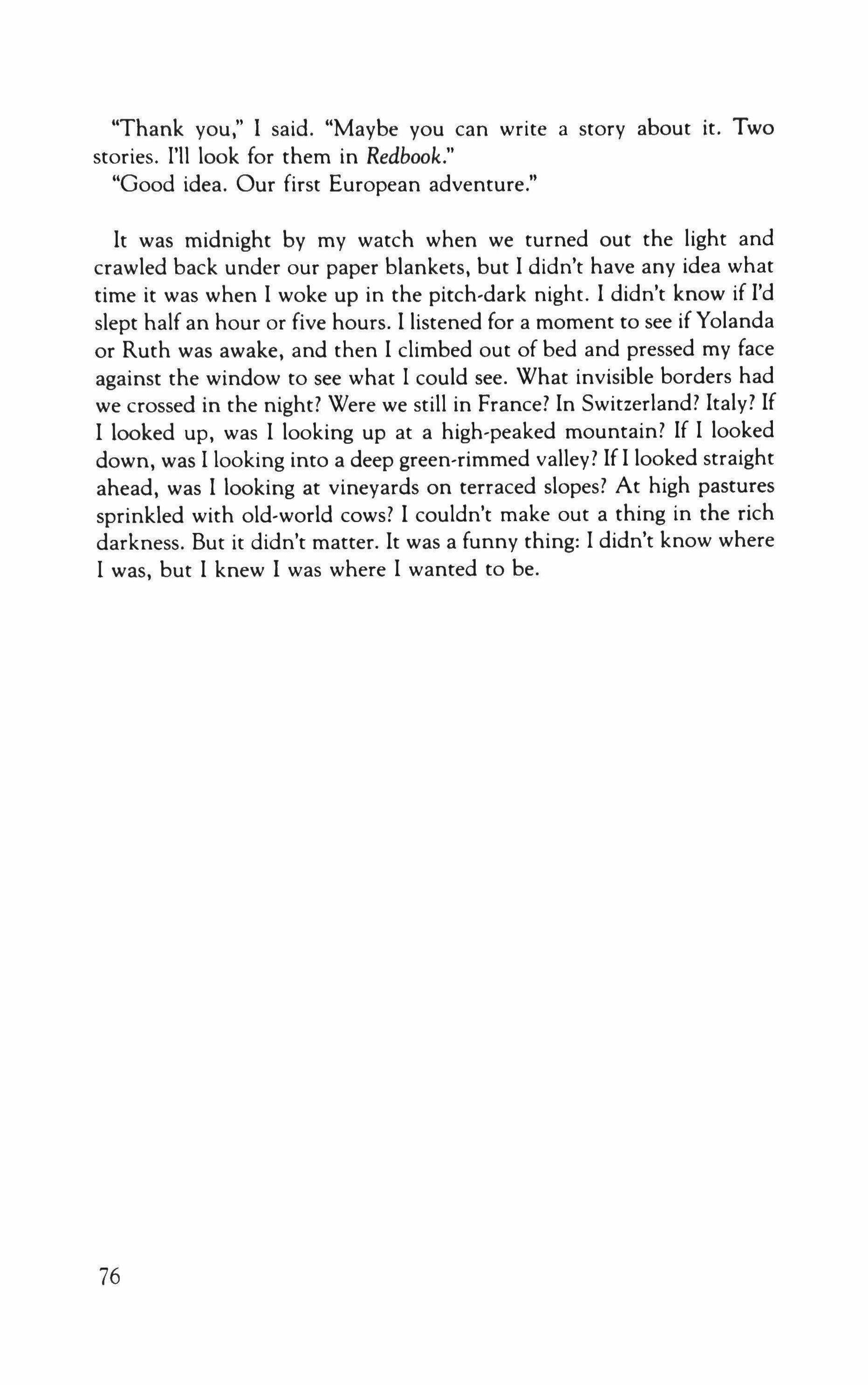
"Thank you," I said. "Maybe you can write a story about it. Two stories. I'll look for them in Redbook."
"Good idea. Our first European adventure."
It was midnight by my watch when we turned out the light and crawled back under our paper blankets, but I didn't have any idea what time it was when I woke up in the pitch-dark night. I didn't know if I'd slept half an hour or five hours. I listened for a moment to see if Yolanda or Ruth was awake, and then I climbed out of bed and pressed my face against the window to see what I could see. What invisible borders had we crossed in the night? Were we still in France? In Switzerland? Italy? If I looked up, was I looking up at a high-peaked mountain? If I looked down, was I looking into a deep green-rimmed valley? If I looked straight ahead, was I looking at vineyards on terraced slopes? At high pastures sprinkled with old-world cows? I couldn't make out a thing in the rich darkness. But it didn't matter. It was a funny thing: I didn't know where I was, but I knew I was where I wanted to be.
76
From the Diary of Gene Mays
Richard Burgin
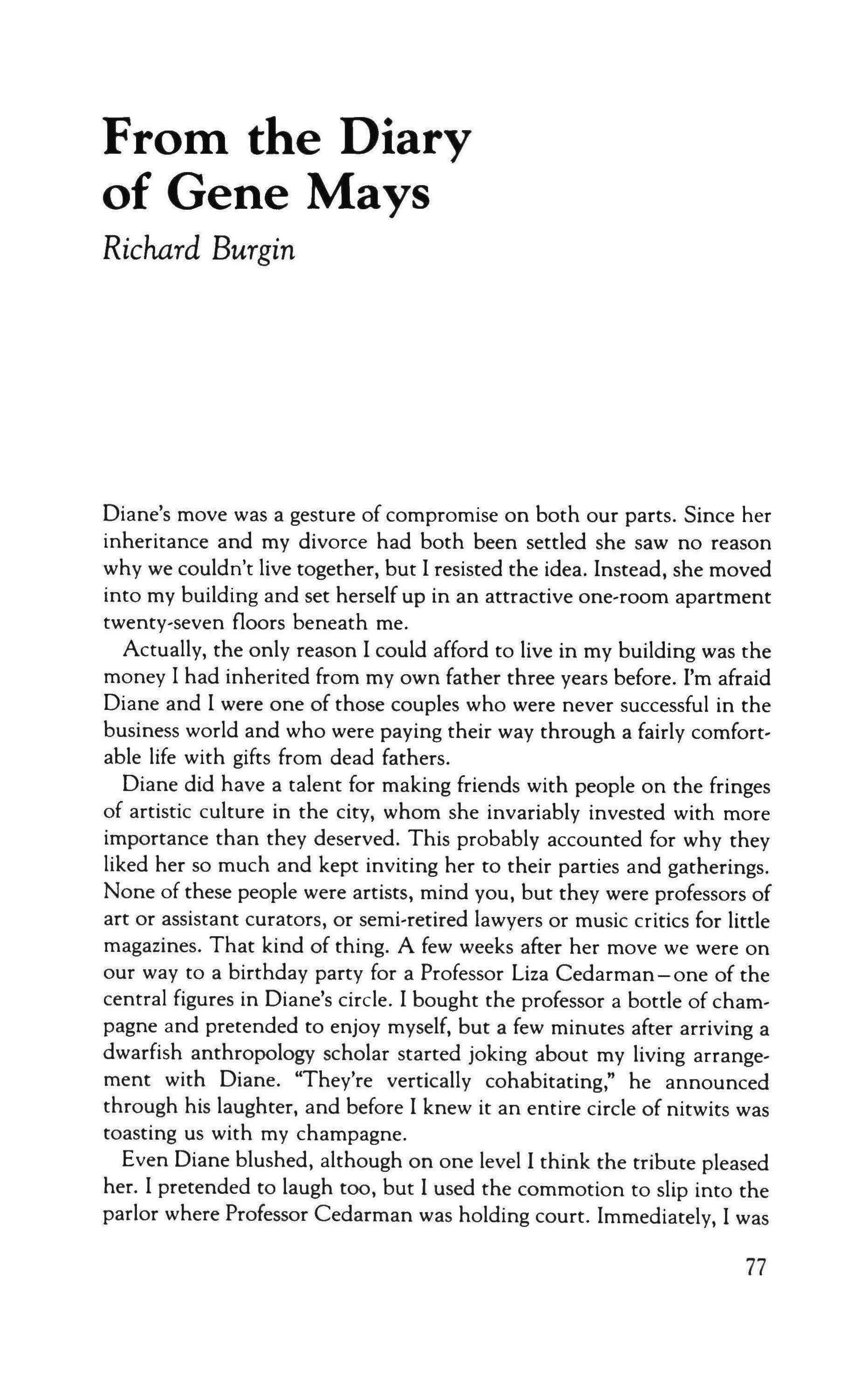
Diane's move was a gesture of compromise on both our parts. Since her inheritance and my divorce had both been settled she saw no reason why we couldn't live together, but I resisted the idea. Instead, she moved into my building and set herself up in an attractive one-room apartment twenty-seven floors beneath me.
Actually, the only reason I could afford to live in my building was the money I had inherited from my own father three years before. I'm afraid Diane and I were one of those couples who were never successful in the business world and who were paying their way through a fairly comfortable life with gifts from dead fathers.
Diane did have a talent for making friends with people on the fringes of artistic culture in the city, whom she invariably invested with more importance than they deserved. This probably accounted for why they liked her so much and kept inviting her to their parties and gatherings. None of these people were artists, mind you, but they were professors of art or assistant curators, or semi-retired lawyers or music critics for little magazines. That kind of thing. A few weeks after her move we were on our way to a birthday party for a Professor Liza Cedarman - one of the central figures in Diane's circle. I bought the professor a bottle of champagne and pretended to enjoy myself, but a few minutes after arriving a dwarfish anthropology scholar started joking about my living arrangement with Diane. "They're vertically cohabitating," he announced through his laughter. and before I knew it an entire circle of nitwits was toasting us with my champagne.
Even Diane blushed, although on one level I think the tribute pleased her. I pretended to laugh too, but I used the commotion to slip into the parlor where Professor Cedarman was holding court. Immediately, I was
77

struck by the painting on the wall over her futon. It was an oil painting of a giant orange-and-pink fish swimming by itself. Both fish and sea were painted semiabstractly so that it was hard to tell where the fish ended and the ocean began. The colors were treated in such a way that if you looked at them closely you could easily experience a slight hallucination. I found the painting somewhat amateurish yet somewhat appealing as well.
"I love the painting," I said, eager to say something both flattering and semigenuine to my hostess.
"It's by my daughter."
"Is she here in Philadelphia?"
"No, right now she's living in some kind of art community in the Berkshires. But she's done so many of these things that she gives me some whenever she visits. She just doesn't have enough space for them all, I guess."
I sensed from her tone that Liza Cedarman didn't think that much of the painting, yet I pressed on with my compliments.
"It's an amazing painting. What a conception of a fish."
"Some people see a series of curvaceous women where the fish scales are. Do you?" asked a dour-faced doctor (an organist by avocation) who sat next to Liza.
"He's much too preoccupied with me to see other women anywhere," said Diane, suddenly appearing in the room accompanied by the dwarfologist, who added, "especially since he's begun vertically cohabitaring,"
There was another round of laughter. I praised the painting again and Liza Cedarman said, "Why don't you take it? I have so many of them I barely have enough space to store them, myself. Besides I'd love for you to have it. My daughter will be tickled." Of course I protested. It was too generous, it was preposterous (I figured the painting's market value might be as high as two or three hundred dollars) but she was adamant. I'm not exactly sure of her motives even now, but everyone in the room was also awed by her generosity, and thin-lipped Liza Cedarman smiled broadly, drinking it in.
That night Diane helped me staple the painting to the wall above my bed. There had been nothing there before but a fraying poster of New York, a keepsake from a weekend with Diane. (She loved to travel for fun, whereas it always made me more nervous than happy and, later, vaguely disappointed as well.) Diane expressed some regret that I was taking down the poster but on balance was in too good a mood to complain much. She'd had a wonderful time at the party and complimented me on how polite and unusually animated I'd been. The next
78

morning when she left to go shopping and do some errands (she was a genius at creating errands) she was still in a good mood.
There was really nothing of interest on my other walls so I was able to look at the painting for perhaps a half-hour. I saw many colors in it that I hadn't noticed before - for example, the bright purples and greens and a whole rainbow of blues. I saw how the fish and water both shimmered, and saw the women in the scales and many other things. When the colors began to vibrate strongly I finally turned away.
There is definitely something magical about this painting, I thought. Then I looked around my apartment and saw the chaos of my desk, my television set resting on its stand as in a coffin, and then the white abomination of my refrigerator, like some hideous robotic snowman. I remember thinking, "There is nothing here I value except the painting." Was that because there was nothing in my life I valued either? I thought of my short-lived businesses-all mail-order schemes, never one with even a single full-time employee other than myself. The problem was I could never stand working for people but lacked the drive to succeed on my own. It was that my heart never went into any of them, and with my parents distant but financially generous and always there to bail me out, I'd stop caring each time, and so, of course, the businesses would collapse or wither away.
Well, what of my so-called love life? I was thirty-three, who had I loved and who had loved me? My ex-wife was the proverbial big mistake and far more costly than my businesses, as it turned out. My memories of her now chiefly centered around law offices. But what about Diane? We'd met at an art-gallery opening-I confess to occasionally enjoying such things-and for no special reason she set her sights on me. It seems to me I was very passive about it, and a little puzzled as well. Diane was attractive in an angular sort of way. I was not physically attractive in any way, I don't think. Later, I thought it was the money she thought I had. Still later, I realized that she feasted off my passivity, which put me in her perpetual audience and allowed her to be the star of our relationship.
For a while some need of mine must have been filled, as they say, but it had all passed and now was just another mistake to deal with. It was peculiar, I'd once valued Diane but wasn't curious at all why I had and now no longer did. It was as if an infected tooth had been pulled from my head and I'd adjusted immediately to the empty space without any desire to investigate the source of infection.
That doesn't mean that I broke it off with Diane, right away. I remained a coward in those matters, still preferring to act poorly and let
79

my partner get rid of me. It wasn't easy this time either since Diane was so breezily oblivious to my real nature and was quite used to taking what she wanted from people, including me, while ignoring the rest.
Slowly the painting began to have a therapeutic value for me. I often used it as a kind of tranquilizer while Diane was out, or as a diversion while I was forced to have sex with her. Once she caught me in bed looking at it dreamily when, of course, I should have been concentrating on her. A week or so later there was an argument, some insults were exchanged, followed by an exchange of keys and other pertinent property.
Hand on slender hip, face white and constricted with witch-like rage, she fired this last shot at me: "In the beginning I thought you had this childlike enthusiasm for things but now I see you're just a child who can never stick with anything. You go from business to business, from woman to woman, from idea to idea, always thinking there's something better around the corner. I honestly don't know whether to hate you or pity you, but either way, I don't ever want to see you again." Then for additional punctuation came the inevitable slamming of the door.
For the next few days I spent much of my time with the painting. It gives me everything, I would say to myself. It relaxes me when I worry, it sweeps me clean of memories (I'd had only one or two of either Diane or my ex-wife), it gives me a constant source of beauty and it uplifts me, filling me with a spiritual sense that is beyond words, but that I'd never felt before. I had already committed the painting to memory so that even when I had to leave the apartment to get meals, for instance, I could recall it, while at night I'd found a way for it to appear fairly regularly in my dreams.
But then this enchanted time (so short, but so exciting and yet strangely peaceful) passed and my relationship to the painting began to change. It started with the feeling, at first just a gnawing at the back of my head, that something was missing in the relationship. By the end of the day I realized it was I, myself, who was missing since I would always be the painting's adoring audience while it, of course, could never give me back any attention at all. It's not man who collects paintings, but paintings which passively but inevitably collect and imprison their admirers. This was a hell of a situation. I lay back in my bed feeling the kind of dizziness that invariably precedes my full-blown depressions. "But wait," I thought, suddenly sitting up straight again, "there's a third party involved in all this-there's the painter." The painting was not a self-actualized entity, after all, but a made thing-put together in a matter of days or even hours by a clever, devoted human being. How
80
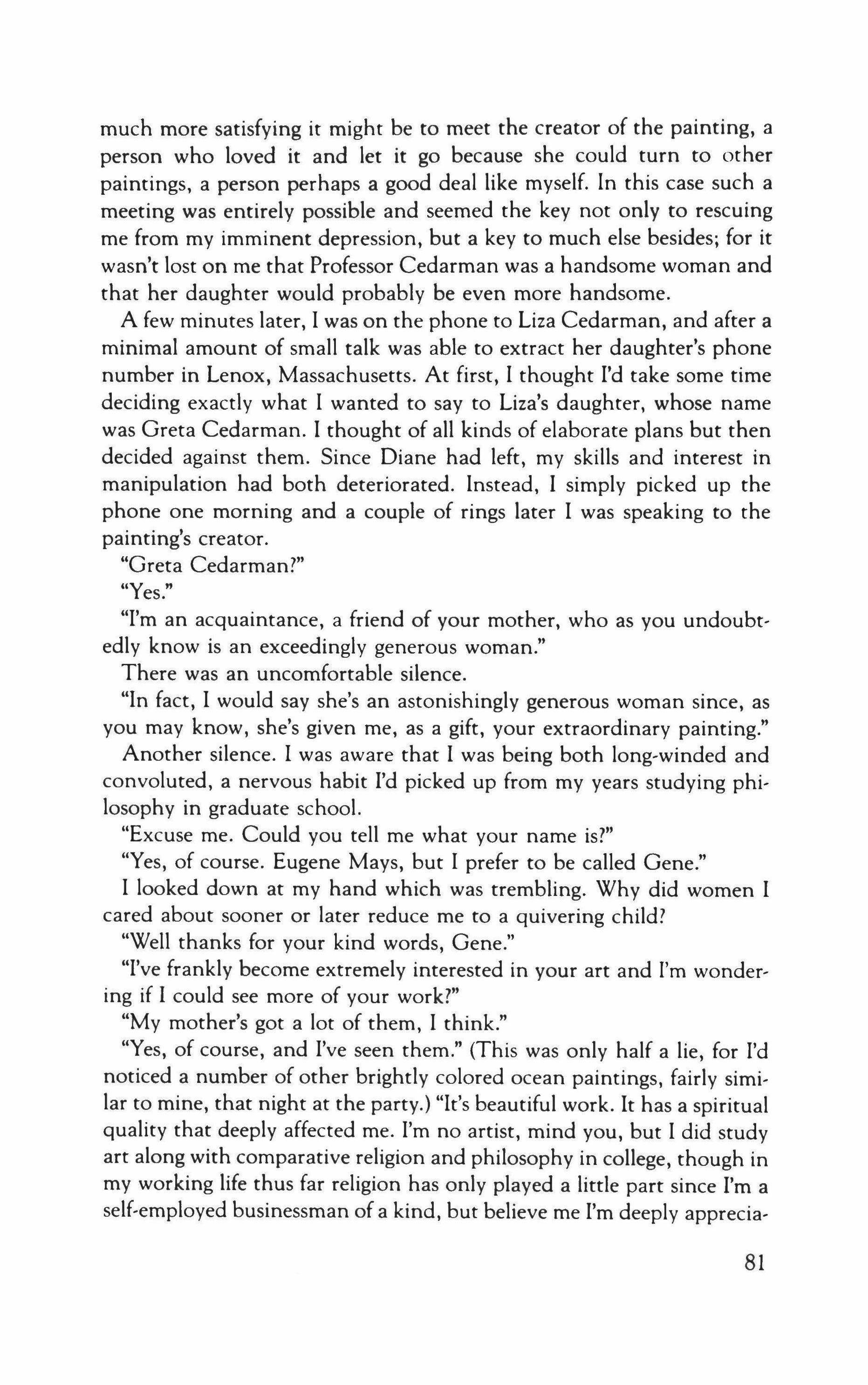
much more satisfying it might be to meet the creator of the painting, a person who loved it and let it go because she could turn to other paintings, a person perhaps a good deal like myself. In this case such a meeting was entirely possible and seemed the key not only to rescuing me from my imminent depression, but a key to much else besides; for it wasn't lost on me that Professor Cedarman was a handsome woman and that her daughter would probably be even more handsome.
A few minutes later, I was on the phone to Liza Cedarman, and after a minimal amount of small talk was able to extract her daughter's phone number in Lenox, Massachusetts. At first, I thought I'd take some time deciding exactly what I wanted to say to Liza's daughter, whose name was Greta Cedarman. I thought of all kinds of elaborate plans but then decided against them. Since Diane had left, my skills and interest in manipulation had both deteriorated. Instead, I simply picked up the phone one morning and a couple of rings later I was speaking to the painting's creator.
"Greta Cedarman?"
"Yes."
"I'm an acquaintance, a friend of your mother, who as you undoubtedly know is an exceedingly generous woman."
There was an uncomfortable silence.
"In fact, I would say she's an astonishingly generous woman since, as you may know, she's given me, as a gift, your extraordinary painting."
Another silence. I was aware that I was being both long-winded and convoluted, a nervous habit I'd picked up from my years studying philosophy in graduate school.
"Excuse me. Could you tell me what your name is?"
"Yes, of course. Eugene Mays, but I prefer to be called Gene."
I looked down at my hand which was trembling. Why did women I cared about sooner or later reduce me to a quivering child?
"Well thanks for your kind words, Gene."
"I've frankly become extremely interested in your art and I'm wondering if I could see more of your work?"
"My mother's got a lot of them, I think."
"Yes, of course, and I've seen them." (This was only half a lie, for I'd noticed a number of other brightly colored ocean paintings, fairly similar to mine, that night at the party.) "It's beautiful work. It has a spiritual quality that deeply affected me. I'm no artist, mind you, but I did study art along with comparative religion and philosophy in college, though in my working life thus far religion has only played a little part since I'm a self-employed businessman of a kind, but believe me I'm deeply apprecia-
81
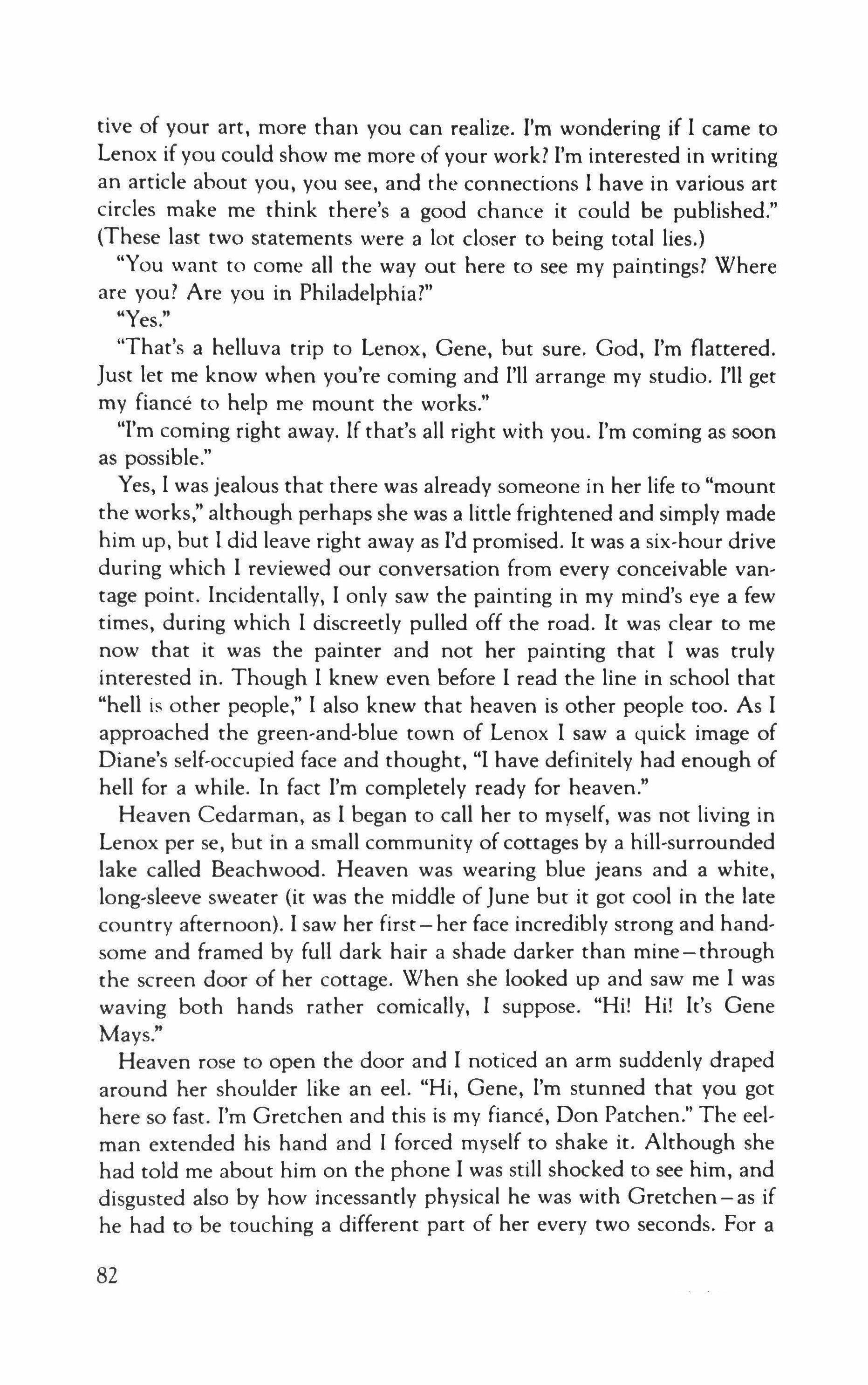
tive of your art, more than you can realize. I'm wondering if I came to Lenox if you could show me more of your work? I'm interested in writing an article about you, you see, and the connections I have in various art circles make me think there's a good chance it could be published." (These last two statements were a lot closer to being total lies.)
"You want to come all the way out here to see my paintings? Where are you? Are you in Philadelphia?" "Yes."
"That's a helluva trip to Lenox, Gene, but sure. God, I'm flattered. Just let me know when you're coming and I'll arrange my studio. I'll get my fiance to help me mount the works."
"I'm coming right away. If that's all right with you. I'm coming as soon as possible."
Yes, I was jealous that there was already someone in her life to "mount the works," although perhaps she was a little frightened and simply made him up, but I did leave right away as I'd promised. It was a six-hour drive during which I reviewed our conversation from every conceivable vantage point. Incidentally, I only saw the painting in my mind's eye a few times, during which I discreetly pulled off the road. It was clear to me now that it was the painter and not her painting that I was truly interested in. Though I knew even before I read the line in school that "hell is other people," I also knew that heaven is other people too. As I approached the green-and-blue town of Lenox I saw a quick image of Diane's self-occupied face and thought, "I have definitely had enough of hell for a while. In fact I'm completely ready for heaven."
Heaven Cedarman, as I began to call her to myself, was not living in Lenox per se, but in a small community of cottages by a hill-surrounded lake called Beachwood. Heaven was wearing blue jeans and a white, long-sleeve sweater (it was the middle of June but it got cool in the late country afternoon). I saw her first - her face incredibly strong and handsome and framed by full dark hair a shade darker than mine-through the screen door of her cottage. When she looked up and saw me I was waving both hands rather comically, I suppose. "Hi! Hi! It's Gene Mays."
Heaven rose to open the door and I noticed an arm suddenly draped around her shoulder like an eel. "Hi, Gene, I'm stunned that you got here so fast. I'm Gretchen and this is my fiance, Don Patchen." The eelman extended his hand and I forced myself to shake it. Although she had told me about him on the phone I was still shocked to see him, and disgusted also by how incessantly physical he was with Gretchen-as if he had to be touching a different part of her every two seconds. For a
82
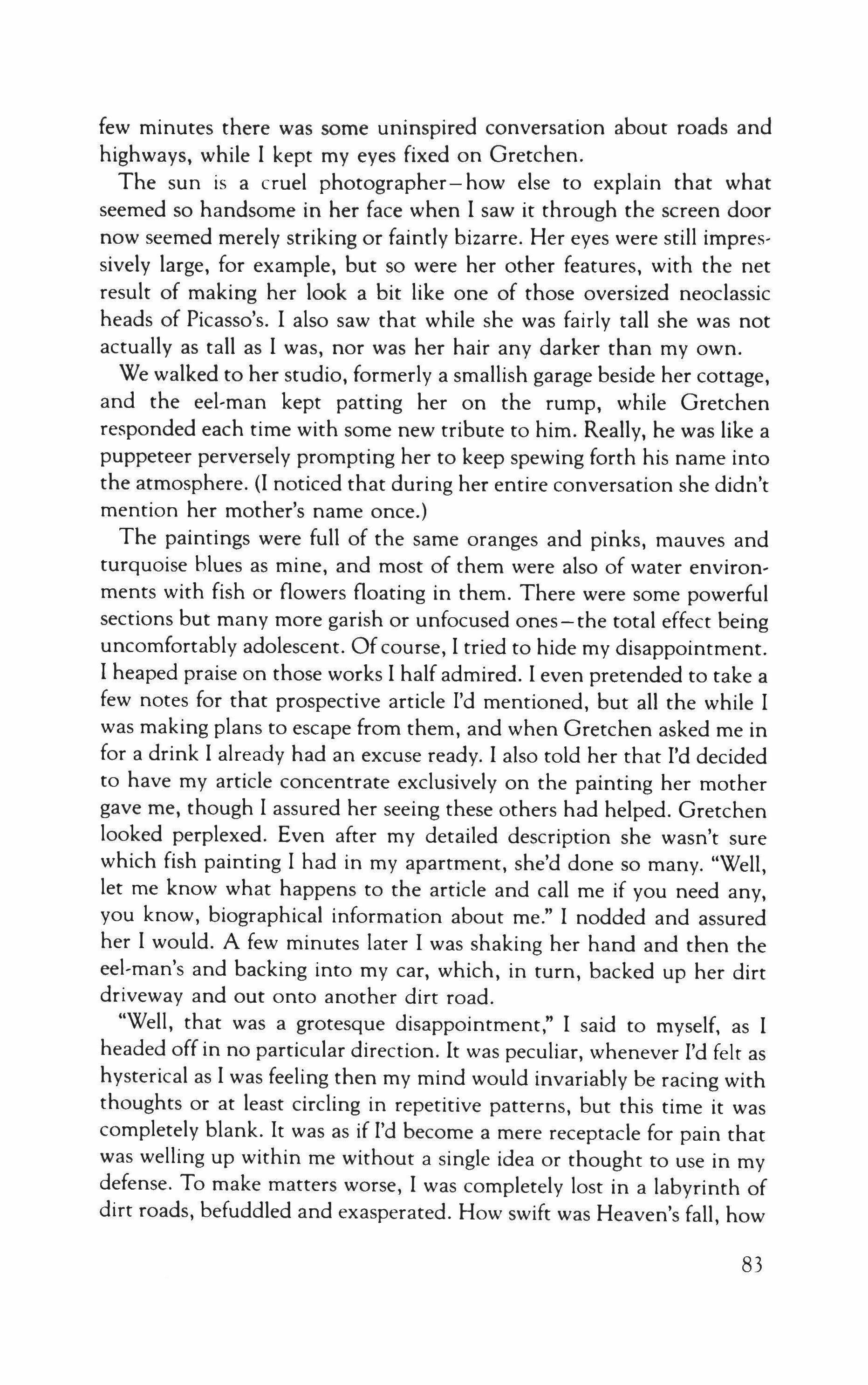
few minutes there was some uninspired conversation about roads and highways, while I kept my eyes fixed on Gretchen.
The sun is a cruel photographer- how else to explain that what seemed so handsome in her face when I saw it through the screen door now seemed merely striking or faintly bizarre. Her eyes were still impressively large, for example, but so were her other features, with the net result of making her look a bit like one of those oversized neoclassic heads of Picasso's. I also saw that while she was fairly tall she was not actually as tall as I was, nor was her hair any darker than my own.
We walked to her studio, formerly a smallish garage beside her cottage, and the eel-man kept patting her on the rump, while Gretchen responded each time with some new tribute to him. Really, he was like a puppeteer perversely prompting her to keep spewing forth his name into the atmosphere. (I noticed that during her entire conversation she didn't mention her mother's name once.)
The paintings were full of the same oranges and pinks, mauves and turquoise blues as mine, and most of them were also of water environments with fish or flowers floating in them. There were some powerful sections but many more garish or unfocused ones-the total effect being uncomfortably adolescent. Of course, I tried to hide my disappointment. I heaped praise on those works I half admired. I even pretended to take a few notes for that prospective article I'd mentioned, but all the while I was making plans to escape from them, and when Gretchen asked me in for a drink I already had an excuse ready. I also told her that I'd decided to have my article concentrate exclusively on the painting her mother gave me, though I assured her seeing these others had helped. Gretchen looked perplexed. Even after my detailed description she wasn't sure which fish painting I had in my apartment, she'd done so many. "Well, let me know what happens to the article and call me if you need any, you know, biographical information about me." I nodded and assured her I would. A few minutes later I was shaking her hand and then the eel-man's and backing into my car, which, in turn, backed up her dirt driveway and out onto another dirt road.
"Well, that was a grotesque disappointment," I said to myself, as I headed off in no particular direction. It was peculiar, whenever I'd felt as hysterical as I was feeling then my mind would invariably be racing with thoughts or at least circling in repetitive patterns, but this time it was completely blank. It was as if I'd become a mere receptacle for pain that was welling up within me without a single idea or thought to use in my defense. To make matters worse, I was completely lost in a labyrinth of dirt roads, befuddled and exasperated. How swift was Heaven's fall, how
83

eternal are the roads of Hell, I thought bitterly with all the romantic bitterness of which I was capable, which was quite a lot, and then I turned again and a miraculous thing happened.
I, Gene, lost in a maze, at last saw a clearing-a little gray beach that led to a smallish lake. Immediately, my throbbing headache disappeared and I was filled with a kind ofbliss I hadn't felt since I was a child. I knew in an instant I had to get out of the car. The only way I can describe what I felt next is that I had somehow stepped into paradise. Tears came to my eyes, then an enveloping smile. How wonderful the sand was! It was the very pavement of paradise. I kept picking it up and tossing it in the air as if I were throwing confetti as I ran down to the water's edge. The blue-gray lake rippled slightly in the cool wind. I felt like it was allowing me to think again, but on a much higher level than I ever had before. I've lost everything now, I thought, my parents, my wife, Diane. I've also lost the painting in a way, and now the painter, too. I've lost exactly what I thought would save me-yet I feel unaccountably happyhow can this be? But, of course, I was looking at the answer. I quickly threw off my shoes and waded out to the white wooden dock with all my clothes on. Magically, the water stopped at my neck. I suppose I was shivering but I hardly cared. After all, I was solving a mystery that had lasted as long as my life. While I climbed up the ladder to the dock a bluegill nipped my toes and then it seemed I'd finished solving the mystery as I finally sat gazing out at the sacred lake.
No wonder Plato had such a low opinion of artists who merely create images of things. No wonder I could not find what I needed in either the painting or its painter- it's the thing itself I needed. Water-the very fluid of God, where life emerged and foolishly fled, relegating it, in all too many cases like my own, to a mere vacation site. You cannot claim to understand or love the water if you visit it only two weeks out of the year, any more than a child could know its parents if it saw them for the same amount of time.
I am getting too frantic, I'm thinking too fast, I thought. So I dipped my feet into the water again and joy shot through me completely and instantly, and I calmed down and was able to make decisions. I would sell my hideous apartment and move near the ocean, for the lake was in a wayan image of the ocean and, transcendent as it was, it was the ocean I really yearned for. Naturally, I would eventually need to find workmy savings could last maybe two more years. So what were the possibilities? Could I be a lifeguard, for instance? I was too scrawny (and probably too old) and swam too poorly, and even if I built myself up enough to qualify there might be too many distractions at the beach. A
84
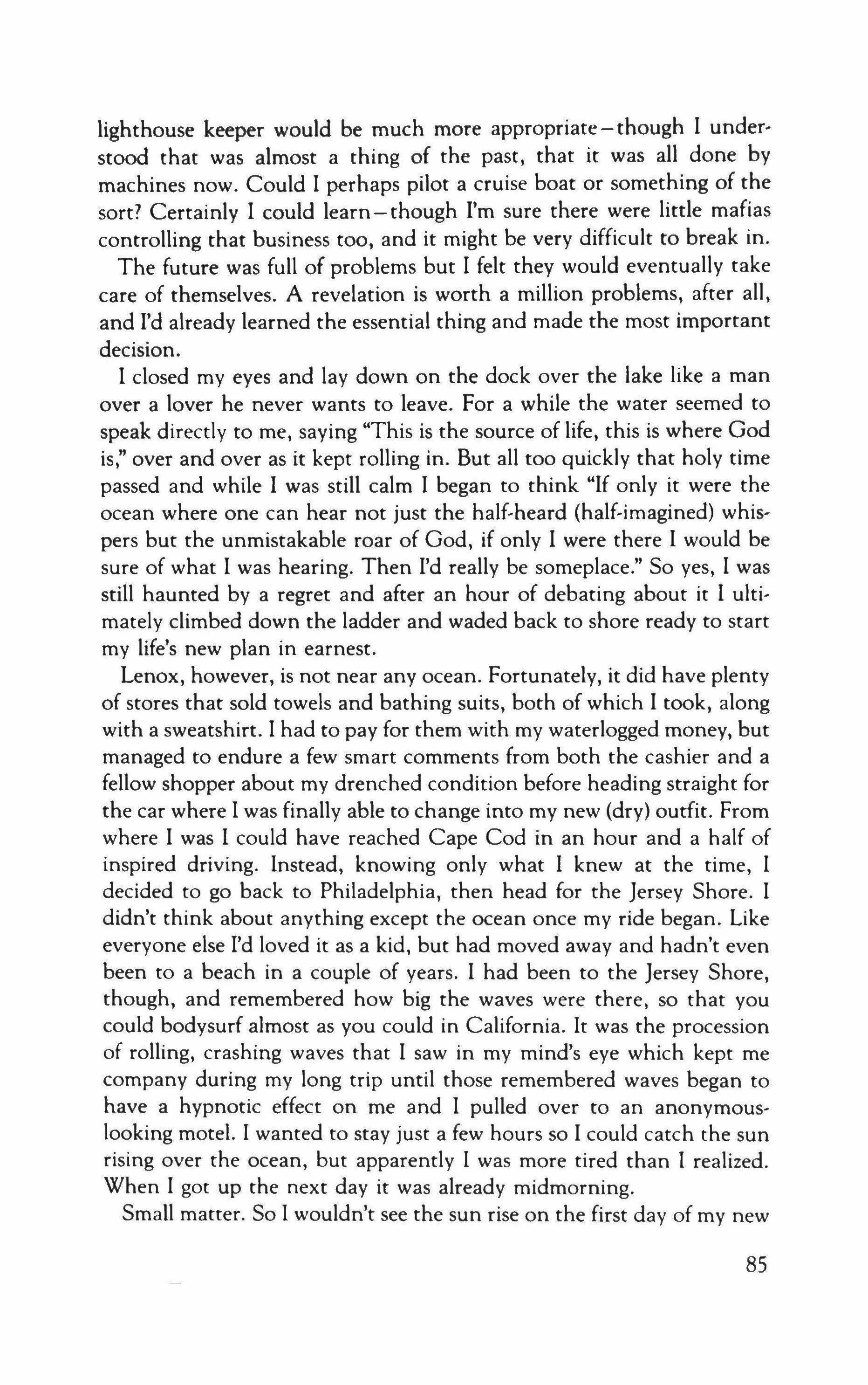
lighthouse keeper would be much more appropriate-though I understood that was almost a thing of the past, that it was all done by machines now. Could I perhaps pilot a cruise boat or something of the sort? Certainly I could learn - though I'm sure there were little mafias controlling that business too, and it might be very difficult to break in.
The future was full of problems but I felt they would eventually take care of themselves. A revelation is worth a million problems, after all, and I'd already learned the essential thing and made the most important decision.
I closed my eyes and lay down on the dock over the lake like a man over a lover he never wants to leave. For a while the water seemed to speak directly to me, saying "This is the source of life, this is where God is," over and over as it kept rolling in. But all too quickly that holy time passed and while I was still calm I began to think "If only it were the ocean where one can hear not just the half-heard (half-imagined) whispers but the unmistakable roar of God, if only I were there I would be sure of what I was hearing. Then I'd really be someplace." So yes, I was still haunted by a regret and after an hour of debating about it I ultimately climbed down the ladder and waded back to shore ready to start my life's new plan in earnest.
Lenox, however, is not near any ocean. Fortunately, it did have plenty of stores that sold towels and bathing suits, both of which I took, along with a sweatshirt. I had to pay for them with my waterlogged money, but managed to endure a few smart comments from both the cashier and a fellow shopper about my drenched condition before heading straight for the car where I was finally able to change into my new (dry) outfit. From where I was I could have reached Cape Cod in an hour and a half of inspired driving. Instead, knowing only what I knew at the time, I decided to go back to Philadelphia, then head for the Jersey Shore. I didn't think about anything except the ocean once my ride began. Like everyone else I'd loved it as a kid, but had moved away and hadn't even been to a beach in a couple of years. I had been to the Jersey Shore, though, and remembered how big the waves were there, so that you could bodysurf almost as you could in California. It was the procession of rolling, crashing waves that I saw in my mind's eye which kept me company during my long trip until those remembered waves began to have a hypnotic effect on me and I pulled over to an anonymouslooking motel. I wanted to stay just a few hours so I could catch the sun rising over the ocean, but apparently I was more tired than I realized. When I got up the next day it was already midmorning. Small matter. So I wouldn't see the sun rise on the first day of my new
85

life. Big deal. I mocked myself for my absurd perfectionism and continued driving, charged with energy and focused single-rnindedlv on any shortcuts to the sea.
I arrived at Ventnor Beach (adjacent to Atlantic City and much more charming) at 12:45. But why should I think of the fine distinction between the two beaches, why congratulate myself on driving the extra two miles to Ventnor when the same God-stunned ocean roared and laughed in front of both beaches? I tried to keep my level of inspiration up by focusing on the endless churning bar of blue before me as I ran down the sand to embrace it. I couldn't run in anything like a straight line, however, for there were lots of people on the beach playing Frisbee or lying on their stomachs sunning themselves, or striking poses in their suits as they preened and flirted and tried to pick each other up. I wanted to yell at them with all the strength of my lungs to go in the water with me but first I had to save myself.
For twenty minutes it was ecstasy. I swam, I went underwater, I played with the waves like a porpoise. I rubbed water into my hair and skin, I floated. Then I began to get a little tired and I started to shiver. Maybe there were so few people swimming because the water was so cold. Some clouds came out, covering the sun, and it grew even colder. I started to swim to shore but halfway there felt tired and half-floated the rest of the way. Somehow the undertow made me drift towards a scrawny kid with yellow hair who was busily and unapologetically peeing into the sea. I felt choked with rage when I saw this and had to fight off the desire to slap his face andlor strangle him. Quickly I turned away and swam to shore still shaking with anger and fear.
I had come perilously close to hitting a child while bathing in God's water. What was the matter with me? What had happened to my vision? I paced along the beach trying to find an isolated spot to think it all out but it was impossible. People had multiplied, their transistors blaring, their ice creams dripping, their Frisbees hitting each other, their garbage accumulating. One boy alone was being quiet. He was doing a crayon drawing of the ocean. Yet this ordinary-looking and ordinarily-skilled adolescent stopped me in my tracks. The chaos in my head began to unravel. I have come full-circle, I thought, as I watched him color in the waves.
People are treating the beach and the ocean this way because they know God isn't in it any longer. They know on some level what Plato (now that I thought more carefully about him) knew: the entire physical universe is an image, a painting, if you will, of the Archetypes. They are the original (invisible) Idea of things that were in God's mind before
86
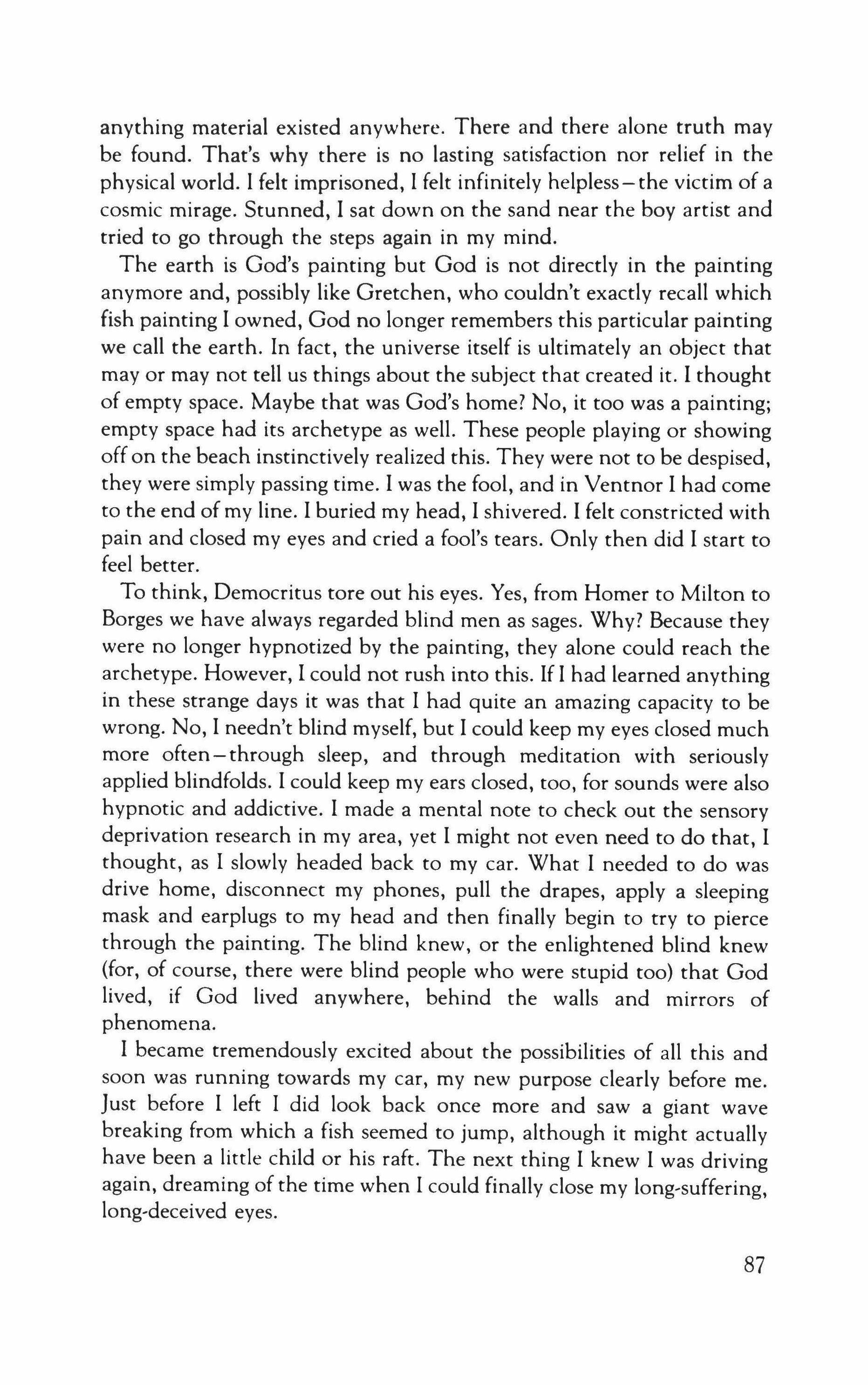
anything material existed anywhere. There and there alone truth may be found. That's why there is no lasting satisfaction nor relief in the physical world. I felt imprisoned, I felt infinitely helpless - the victim of a cosmic mirage. Stunned, I sat down on the sand near the boy artist and tried to go through the steps again in my mind.
The earth is God's painting but God is not directly in the painting anymore and, possibly like Gretchen, who couldn't exactly recall which fish painting I owned, God no longer remembers this particular painting we call the earth. In fact, the universe itself is ultimately an object that mayor may not tell us things about the subject that created it. I thought of empty space. Maybe that was God's home? No, it too was a painting; empty space had its archetype as well. These people playing or showing off on the beach instinctively realized this. They were not to be despised, they were simply passing time. I was the fool, and in Ventnor I had come to the end of my line. I buried my head, I shivered. I felt constricted with pain and closed my eyes and cried a fool's tears. Only then did I start to feel better.
To think, Democritus tore out his eyes. Yes, from Homer to Milton to Borges we have always regarded blind men as sages. Why? Because they were no longer hypnotized by the painting, they alone could reach the archetype. However, I could not rush into this. If I had learned anything in these strange days it was that I had quite an amazing capacity to be wrong. No, I needn't blind myself, but I could keep my eyes closed much more often-through sleep, and through meditation with seriously applied blindfolds. I could keep my ears closed, too, for sounds were also hypnotic and addictive. I made a mental note to check out the sensory deprivation research in my area, yet I might not even need to do that, I thought, as I slowly headed back to my car. What I needed to do was drive home, disconnect my phones, pull the drapes, apply a sleeping mask and earplugs to my head and then finally begin to try to pierce through the painting. The blind knew, or the enlightened blind knew (for, of course, there were blind people who were stupid too) that God lived, if God lived anywhere, behind the walls and mirrors of phenomena.
I became tremendously excited about the possibilities of all this and soon was running towards my car, my new purpose clearly before me. Just before I left I did look back once more and saw a giant wave breaking from which a fish seemed to jump, although it might actually have been a little child or his raft. The next thing I knew I was driving again, dreaming of the time when I could finally close my long-suffering, long-deceived eyes.
87
The River Dwight
J. H. Hall
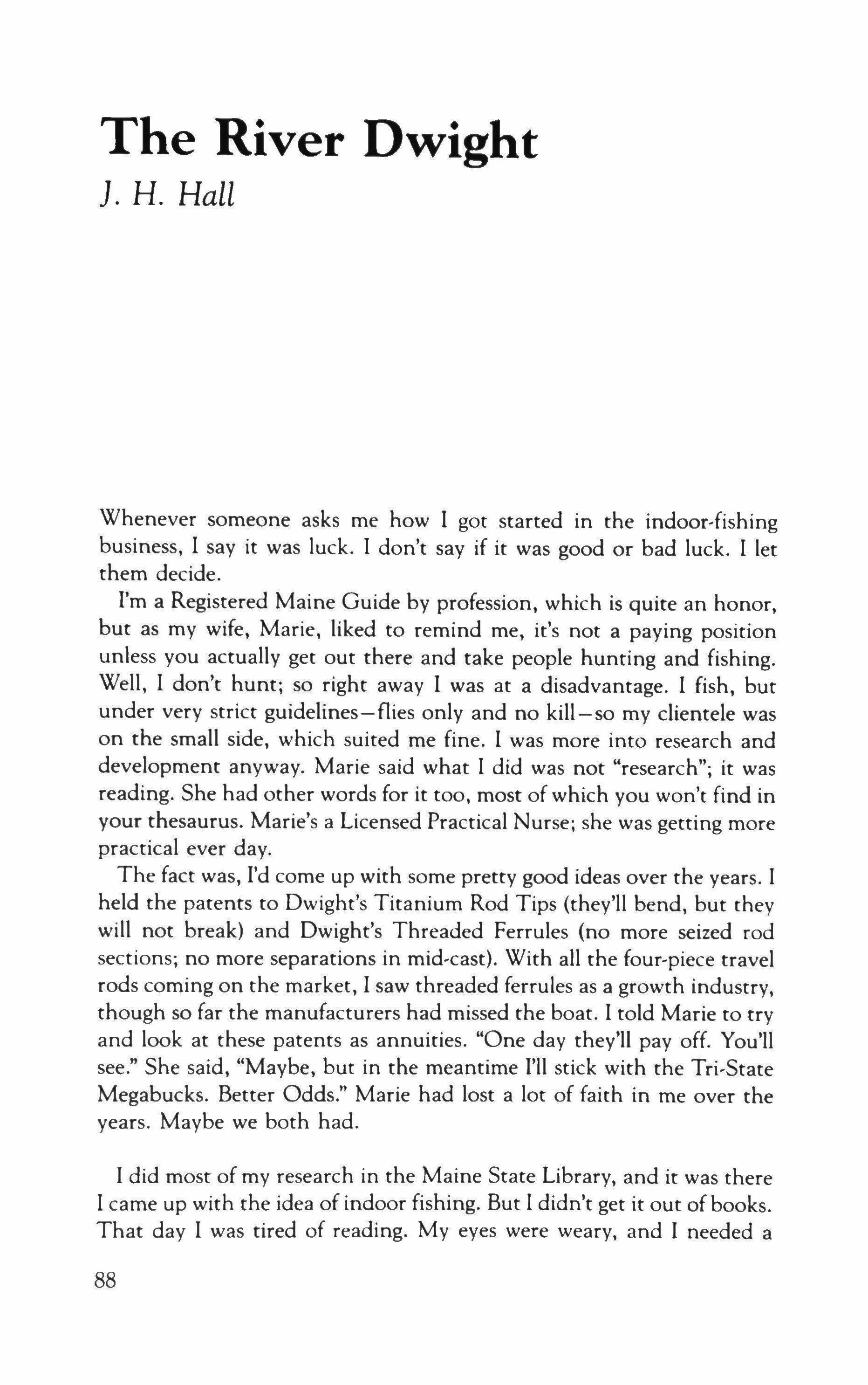
Whenever someone asks me how I got started in the indoor-fishing business, I say it was luck. I don't say if it was good or bad luck. I let them decide.
I'm a Registered Maine Guide by profession, which is quite an honor, but as my wife, Marie, liked to remind me, it's not a paying position unless you actually get out there and take people hunting and fishing. Well, I don't hunt; so right away I was at a disadvantage. I fish, but under very strict guidelines-flies only and no kill-so my clientele was on the small side, which suited me fine. I was more into research and development anyway. Marie said what I did was not "research"; it was reading. She had other words for it too, most of which you won't find in your thesaurus. Marie's a Licensed Practical Nurse; she was getting more practical ever day.
The fact was, I'd come up with some pretty good ideas over the years. I held the patents to Dwight's Titanium Rod Tips (they'll bend, but they will not break) and Dwight's Threaded Ferrules (no more seized rod sections; no more separations in mid-cast). With all the four-piece travel rods coming on the market, I saw threaded ferrules as a growth industry, though so far the manufacturers had missed the boat. I told Marie to try and look at these patents as annuities. "One day they'll payoff. You'll see." She said, "Maybe, but in the meantime I'll stick with the Tri-State Megabucks. Better Odds." Marie had lost a lot of faith in me over the years. Maybe we both had.
I did most of my research in the Maine State Library, and it was there I came up with the idea of indoor fishing. But I didn't get it out of books. That day I was tired of reading. My eyes were weary. and I needed a
88

break. I walked over to the window and watched the snow fall. Barely December and we were already into our third storm. As I watched the yellow stains and dog mess disappear, I thought, "Wouldn't it be nice if our lives were like that, if all our mistakes and false starts could be covered over with something white and pure that in the spring would wash away, carrying our miscues with it."
Soon I grew tired of watching snow and thinking big thoughts, so I wandered back through the museum section of the library, 12,000 years of Maine history. The first 11,800 was a tale told in stone. The stones were said to be implements, tools. Each minor modification of rock was supposed to represent some great societal advance, in some cases a whole new culture. To a person with even a speck of imagination, it was a very depressing exhibit. Heck, my threaded ferrules represented a bigger advance in fishing implements than these people had made in ten thousand years. Not meaning any disrespect to Native Americans, but I believe if I had lived in those days, I could have cut-conservatively speaking - centuries off their development.
Next there was a section on Pilgrims and Colonial life, which everyone who lived in New England was supposed to love, but which bored me more than the rocks, because most of the items-trivets, quilts, and other quaint knickknacks-were still available in catalogs. 1 say, let it go. Let it die!
Then came the logging and lobstering exhibits, followed by a series of Maine Wildlife Scenes-stuffed animals in their natural habitat, meaning plastic trees and papier-rnache rocks. At least there was a logic, a consistency of concept that ran unbroken through the beaver-bog scene, the salt-marsh scene, the moose scene, deer scene, bear scene, but then the concept collapsed. It was shattered by the trout-stream scene, because here was movement: water flowing over actual rock into a small pool, at the bottom of which, firming quietly, looking expectantly upstream, were real living fish! Brook trout, char, if you will, whose sleek, lively shapes heaped shame upon all the inanimate exhibits.
This was new; this was stunning. I leaned against the glass and stared longingly at the fish. I wanted to break through the pane and lie down beside the flowing water. I don't know how long I had been there, when I felt a light, bird-like tapping on my back. It startled me; I wheeled around and saw a small, harmless-looking, gray-haired lady.
"I'm sorry," she said. "I didn't mean to frighten you, but it's closing time. You wouldn't want to get locked in, would you, and have to spend the night?"
"Oh, could I?" I said. "Please."
89

She sized me up. "You poor man," she said. "No place to stay?"
It was an understandable mistake-the long black hair, the beard, the heavy boots, worn jeans, flannel shirt, the lanky haggard look, and the mental institute just across the river. "Well " I said.
"I could call a cab. They could take you to a shelter."
"That's not necessary, but tell me this. Who designed this exhibit?" Now that the mood had been shattered, technical questions of hydrology, oxygenation and finance replaced my longing. I tapped on the glass. "Whose work is this?" The lady looked puzzled. "I'm still trying to make something of my life," I said with absolute honesty. "I haven't given up yet."
"Good for you." She jotted some information on a chit of paper. "Call this number in the morning. Ask for Mr. Eliot. Tell him Bernice Bilodeau said to call."
"Thank you," I said. "Thank you very much."
She reached into her wallet.
I said, "No, really, you don't
"Don't be silly," she said, stuffing a twenty-dollar bill into my shirt pocket.
"God bless you," I said. "You won't regret this. I promise you."
Outside, the snow looked like the stuff of angels, and, though wouldn't have wanted to know the Ph, it tasted sweet as powdered sugar. This was indeed a charmed moment: my first backer, my very first investor. I made a mental note, a lifetime pass for Bernice Bilodeau to The River Dwight, and on my way home, to honor the occasion, I bought a six-pack of Molson and a bouquet of flowers.
There was a time when Marie would have been touched by the gesture. On the occasions when I forgot that those days were over, she was quick to remind me.
"I don't even want to know where you got the money," she said.
"Like 1 always say, 'Follow your heart and the money will find you.'''
"God, Dwight, you're not twenty years old any more, or even thirty, or even thirty-five, for that matter."
"If you don't like the flowers, have a beer. Have two beers. They might improve your disposition."
1 popped my second Molson, warmed myself by the woodstove and thought how really well-preserved and fetching Marie looked in her uniform, how pleasingly the pure white offset her black hair and pale blue eyes, how the cut of the dress suited her narrow waist and wide hips. 1 was feeling pretty good. "Yep," 1 said, "you had better mark this
90

day down in your little book, because on this day, your husband has had a grand idea."
"My little book is full of your grand ideas. There's not room for any more."
"No, no, your book is full of bright, little ideas, brainstorms, but this, my dear, is different. I have expanded my vision."
"Well, don't. O.K.?"
"Too late. You can't put the genie back in the bottle."
"God help us." She tossed the flowers into the stove and opened a beer. "I have prayed this day would never come," she said. "I mean, literally prayed, and regularly ever since you spent that whole year working on that dumb mayfly pattern. Day after day, night after night, tying and retying, filling the sink and tub with trash, not sleeping, walking the roads day and night for dead animals, stinking up the house with skins-I said the same prayer every night. I said, 'God, please don't let anything run him over, and keep his thinking small,' because I could see then, if you ever came up with a big idea, it would kill you, kill both of us."
I had never heard any of that before. "That hurts," I said. "That really hurts. That you don't have any more faith in me than that. That hurts."
"I'm sorry, Dwight. I'm truly sorry, but I'm not going to lie to you."
"Bernice Bilodeau has faith in me. She believes in me, but my own wife
"I suppose that's the poor soul you fleeced for beer money."
"You know what you are? You're a traitor."
"I am. I know it. My faith in you should be inexhaustible, but it isn't, and now you know. And now I'm going to bed. I've been on my feet all day, and I'm very tired, and I'm going to bed."
"One day you won't have to be on your feet all day."
"No, I'll be in a wheelchair."
For the record, Dwight's Perfect Mayfly was featured in Flytyer's News, Vol. VII, Issue #3, complete with color plates and tying instructions. True, the commercial prospects haven't panned out-so far, but who is to say that even as we sit here the fly's reputation is not spreading by word of mouth, that soon Bean's and Orvis will be forced to carry it in their catalogs, and pay me royalties? Who really is to say?
At this point I would like to thank the Taiwanese for having wrested the shoe industry from these labor-beleaguered shores. Not only have they put affordable footwear within easy reach of all Americans, but
91

they also left in their wake a windfall of old, abandoned buildings available to young, or even middle-aged, entrepreneurs at most reasonable prices. 1 believe this more than compensates for what they have done to us in Little League.
Also I would like to thank Mr. Ronald Reagan for deregulating the Savings and Loan industry, thereby liberating thousands of loan officers from the tedium of home mortgages. All over America, even in Maine, loan officers were ready to celebrate their freedom, and what better place to start than with a local project that would simultaneously revitalize downtown Augusta, give people a warm place to congregate on cold winter nights, keep teenagers off the streets and reduce adolescent pregnancy? "And I wouldn't be surprised if this project curtailed the use of drugs," I said to the loan officer, one Theresa Bilodeau, no relation to Bernice but a handsome woman in her own right, a rugged businesslike blond who wore her hair in a tidy bun.
She was wearing a conservative gray suit, but so was 1. Plus I had shaved my beard and trimmed my hair, shined my shoes and borrowed a briefcase. 1 had also rehearsed my presentation in front of the mirror, there having been no interested parties available. And it was a doozy, if I do say so myself. I could tell Theresa was impressed as she flipped through the computer printouts, plans and blueprints.
"This is all very interesting," she said. I thanked her. "And this project may do everything you say it will, but keep in mind, Kennebec National is not a charitable organization. And the first question we have to ask ourselves is, is this project financially viable? Because if the answer to that question is no, then it's not going to do any of these other things, is 7"It.
"Of course not, but I think you'll find the answer to that question on page four." I had made some earnings projections based on the number of fishermen we could accommodate, charges per hour, food sales, entry fee and so on. "You'll have to admit, those are pretty impressive numbers."
"Indeed they are," she said, after looking them over, "and there're some pretty bold assumptions underlying them. Such as, that you will be operating at full capacity."
"Cut those figures by twenty percent and we still make a profit."
"Assuming your expenses are in line, which brings up another point. Your previous business experience, or lack thereof. We do like to see ." previous experience.
"Why? So you can weed out originality, so you can keep repeating yourself."
92
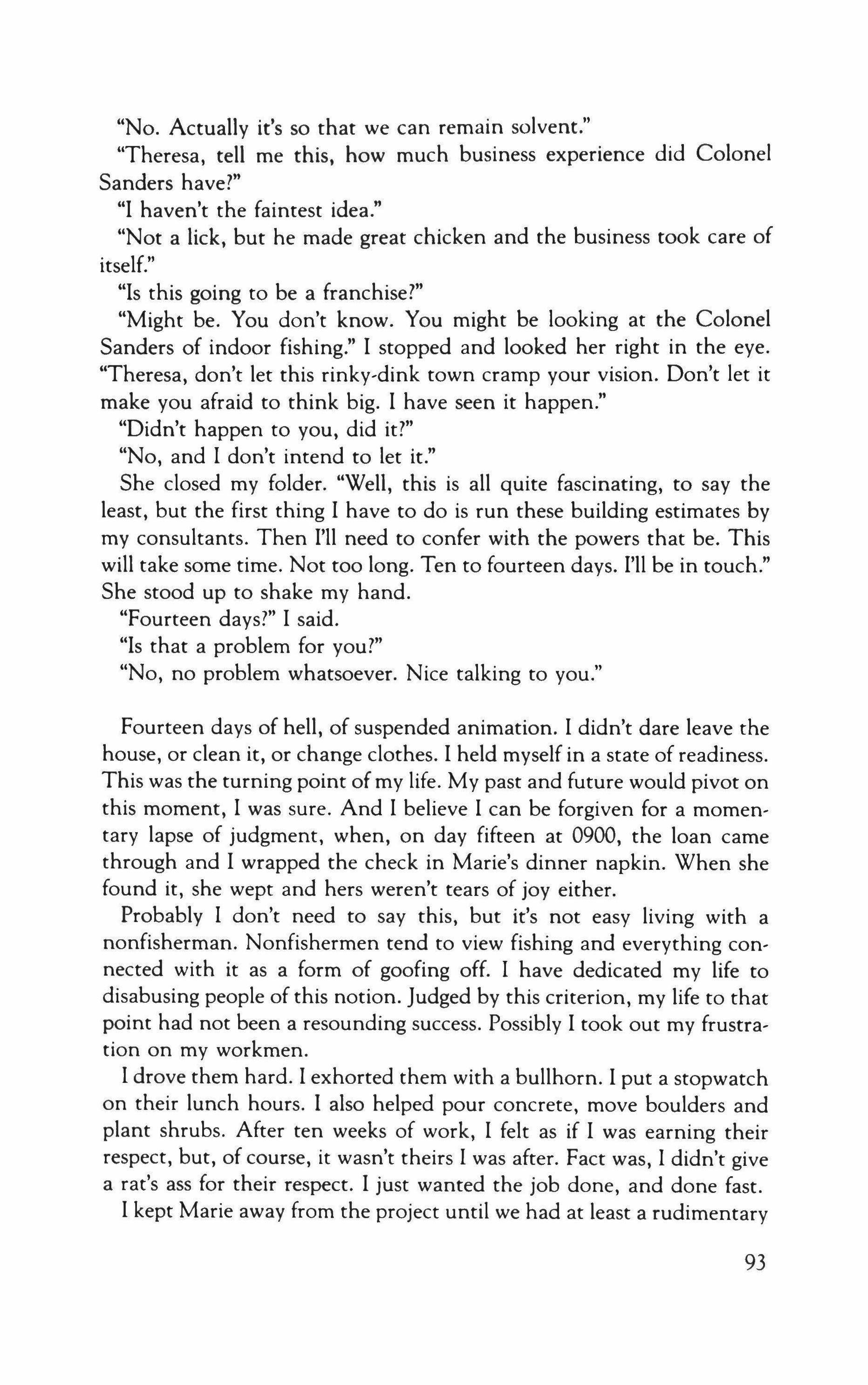
"No. Actually it's so that we can remain solvent."
"Theresa, tell me this, how much business experience did Colonel Sanders have?"
"I haven't the faintest idea."
"Not a lick, but he made great chicken and the business took care of itself."
"Is this going to be a franchise?"
"Might be. You don't know. You might be looking at the Colonel Sanders of indoor fishing." I stopped and looked her right in the eye. "Theresa, don't let this rinkv-dink town cramp your vision. Don't let it make you afraid to think big. I have seen it happen."
"Didn't happen to you, did it?"
"No, and I don't intend to let it."
She closed my folder. "Well, this is all quite fascinating, to say the least, but the first thing I have to do is run these building estimates by my consultants. Then I'll need to confer with the powers that be. This will take some time. Not too long. Ten to fourteen days. I'll be in touch." She stood up to shake my hand.
"Fourteen days?" I said.
"Is that a problem for you?"
"No, no problem whatsoever. Nice talking to you."
Fourteen days of hell, of suspended animation. I didn't dare leave the house, or clean it, or change clothes. I held myself in a state of readiness. This was the turning point of my life. My past and future would pivot on this moment, I was sure. And I believe I can be forgiven for a momentary lapse of judgment, when, on day fifteen at 0900, the loan came through and I wrapped the check in Marie's dinner napkin. When she found it, she wept and hers weren't tears of joy either.
Probably I don't need to say this, but it's not easy living with a nonfisherman. Nonfishermen tend to view fishing and everything connected with it as a form of goofing off. I have dedicated my life to disabusing people of this notion. Judged by this criterion, my life to that point had not been a resounding success. Possibly I took out my frustration on my workmen.
I drove them hard. I exhorted them with a bullhorn. I put a stopwatch on their lunch hours. I also helped pour concrete, move boulders and plant shrubs. After ten weeks of work, I felt as if I was earning their respect, but, of course, it wasn't theirs I was after. Fact was, I didn't give a rat's ass for their respect. I just wanted the job done, and done fast. I kept Marie away from the project until we had at least a rudimentary
93

river, though not yet one that would support life. That would require gravel, oxygen and an even temperature, but as soon as we had running water, I took her for a visit. I wanted her to see the river, hear it, feel it and believe in it, and in me.
I made her keep her eyes closed until we were on the balcony, standing there like the king and queen of England looking down upon our loyal subjects, who fortunately were far enough away that we couldn't see their facial expressions. The men all stopped work and looked up at us. They had my permission, my blessing, to take a break at this time-with pay. There were a couple of wolf whistles directed at Marie.
"They like you," I said. She glared at me. "They're looking up my dress." She took a step back. I made a sort of regal gesture with my right hand and a couple of the men made obscene ones in return. "Look over there," I said, diverting Marie's attention. "See that stretch of river? We're going to put spawning gravel in there. One day fish will be reproducing in this river, my river, our river."
"I don't see any river," Marie said. "All I see is a lot of dirt and concrete."
"Of course," I said. The riverbed was dry. "So. Behold." I gave the thumbs-up to one of the men. He flipped a lever and a great gush of water came pouring forth, flooding the serpentine river bed, creating riffles, pools, deep mysterious runs.
"O.K.," Marie said. "I've seen it. Can I go now?"
"That's it? That's all you have to say?"
"Dwight," she said, looking at her feet, "dear sweet Dwight, I never for one moment doubted you were capable of creating such a thing as this. Only that you could sustain it. Twenty years ago, I found your flashes of brilliance and moments of glory charming. But don't you see, flashes and moments just don't cut it anymore. Consistency, stability, that's what I find sexy now." She looked me in the eyes, such sadness. "I'm sorry," she said. "I guess I got old on you. Or middle-aged. Please forgive me." She kissed me on the cheek and left. There were tears running down the side of my face, but they were her tears.
The workmen were still looking up at me; they were unnaturally quiet. I lifted my bullhorn. "She likes it," I said, "but she was disappointed that you aren't farther along. Now back to work."
Marie elected not to attend our grand opening. It was probably just as well. It didn't turn out quite the way I planned. People had apparently misunderstood our advertisements. They thought the place was a theme park; they saw the river as a giant waterslide. Some showed up with
94
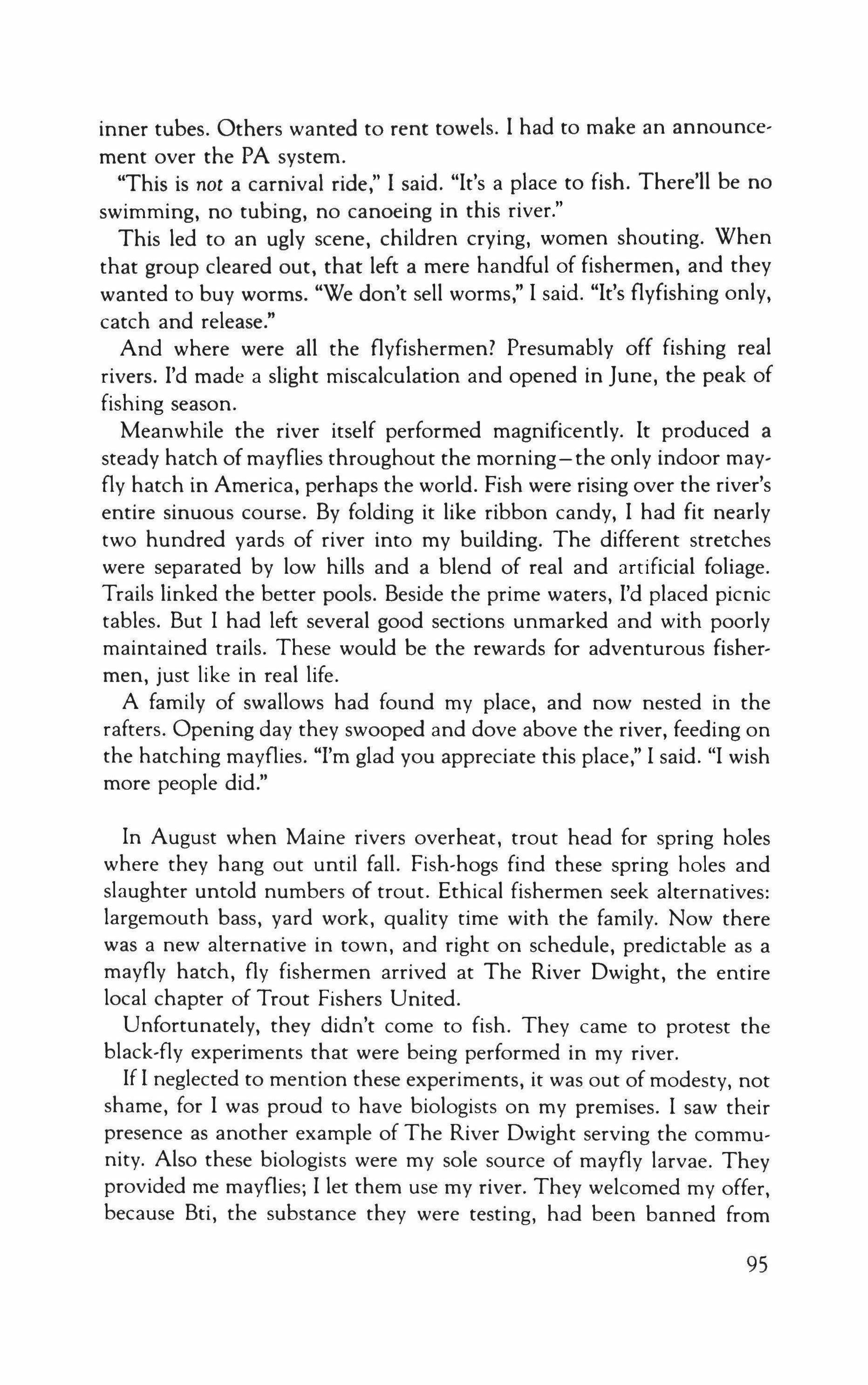
inner tubes. Others wanted to rent towels. I had to make an announcement over the PA system.
"This is not a carnival ride," I said. "It's a place to fish. There'll be no swimming, no tubing, no canoeing in this river."
This led to an ugly scene, children crying, women shouting. When that group cleared out, that left a mere handful of fishermen, and they wanted to buy worms. "We don't sell worms," I said. "It's flvfishing only, catch and release."
And where were all the flyfishermen? Presumably off fishing real rivers. I'd made a slight miscalculation and opened in June, the peak of fishing season.
Meanwhile the river itself performed magnificently. It produced a steady hatch of mayflies throughout the morning-the only indoor mayfly hatch in America, perhaps the world. Fish were rising over the river's entire sinuous course. By folding it like ribbon candy, I had fit nearly two hundred yards of river into my building. The different stretches were separated by low hills and a blend of real and artificial foliage. Trails linked the better pools. Beside the prime waters, I'd placed picnic tables. But I had left several good sections unmarked and with poorly maintained trails. These would be the rewards for adventurous fishermen, just like in real life.
A family of swallows had found my place, and now nested in the rafters. Opening day they swooped and dove above the river, feeding on the hatching mayflies. "I'm glad you appreciate this place," I said. "I wish more people did."
In August when Maine rivers overheat, trout head for spring holes where they hang out until fall. Fish-hogs find these spring holes and slaughter untold numbers of trout. Ethical fishermen seek alternatives: largemouth bass, yard work, quality time with the family. Now there was a new alternative in town, and right on schedule, predictable as a mayfly hatch, fly fishermen arrived at The River Dwight, the entire local chapter of Trout Fishers United.
Unfortunately, they didn't come to fish. They came to protest the black-fly experiments that were being performed in my river.
If I neglected to mention these experiments, it was out of modesty, not shame, for I was proud to have biologists on my premises. I saw their presence as another example of The River Dwight serving the community. Also these biologists were my sole source of mayfly larvae. They provided me mayflies; I let them use my river. They welcomed my offer, because Bti, the substance they were testing, had been banned from
95
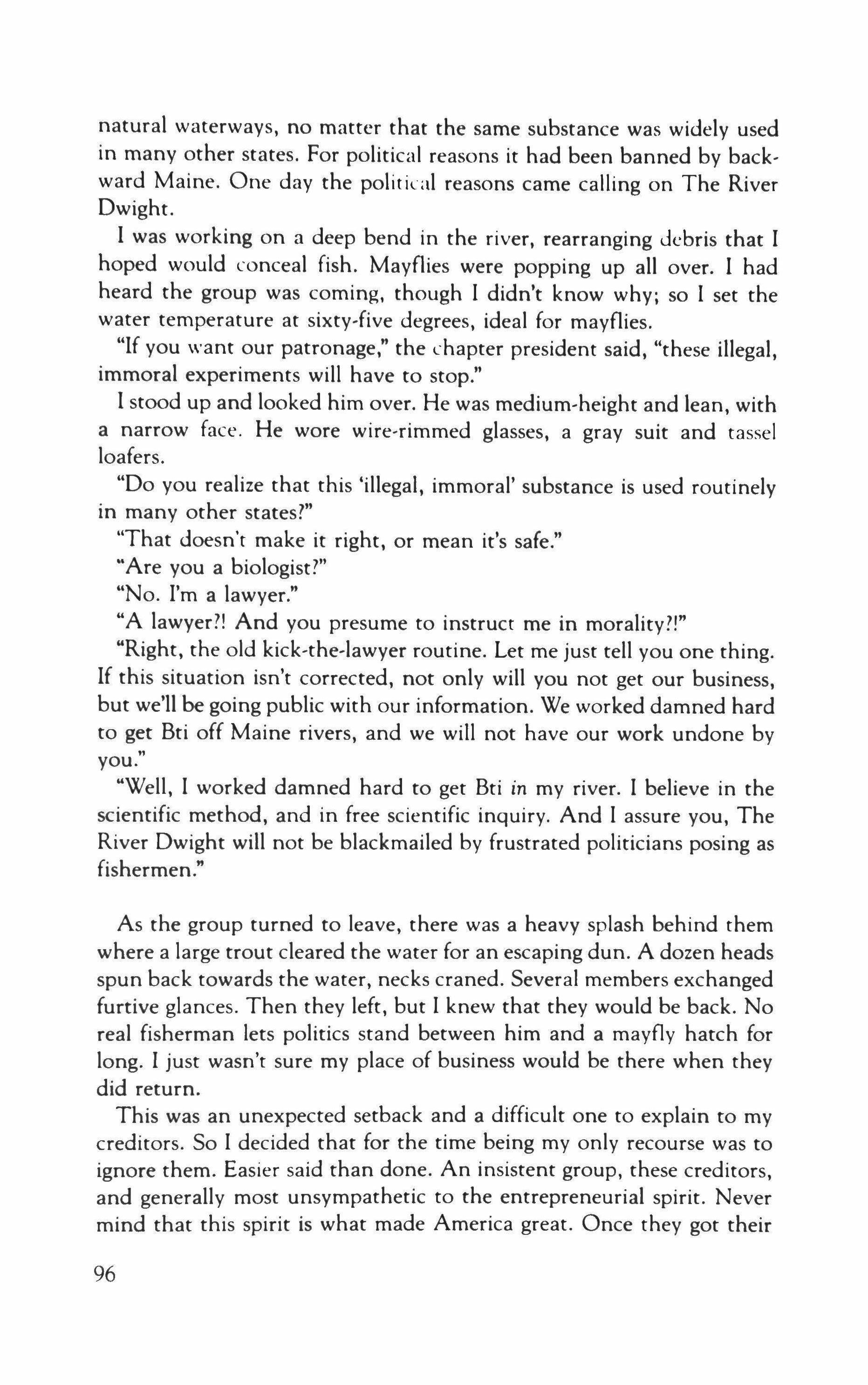
natural waterways, no matter that the same substance was widely used in many other states. For political reasons it had been banned by backward Maine. One day the political reasons came calling on The River Dwight.
I was working on a deep bend in the river, rearranging debris that I hoped would conceal fish. Mayflies were popping up all over. I had heard the group was coming, though I didn't know why; so I set the water temperature at sixty-five degrees, ideal for mayflies.
"If you want our patronage," the chapter president said, "these illegal, immoral experiments will have to stop."
I stood up and looked him over. He was medium-height and lean, with a narrow face. He wore wire-rimmed glasses, a gray suit and tassel loafers.
"Do you realize that this 'illegal, immoral' substance is used routinely in many other states?"
"That doesn't make it right, or mean it's safe."
"Are you a biologist?"
"No. I'm a lawyer."
"A lawyer?! And you presume to instruct me in morality?!"
"Right, the old kick-the-lawyer routine. Let me just tell you one thing. If this situation isn't corrected, not only will you not get our business, but we'll be going public with our information. We worked damned hard to get Bti off Maine rivers, and we will not have our work undone by you."
"Well, I worked damned hard to get Bti in my river. I believe in the scientific method, and in free scientific inquiry. And I assure you, The River Dwight will not be blackmailed by frustrated politicians posing as fishermen."
As the group turned to leave, there was a heavy splash behind them where a large trout cleared the water for an escaping dun. A dozen heads spun back towards the water, necks craned. Several members exchanged furtive glances. Then they left, but I knew that they would be back. No real fisherman lets politics stand between him and a mayfly hatch for long. I just wasn't sure my place of business would be there when they did return.
This was an unexpected setback and a difficult one to explain to my creditors. So I decided that for the time being my only recourse was to ignore them. Easier said than done. An insistent group, these creditors, and generally most unsympathetic to the entrepreneurial spirit. Never mind that this spirit is what made America great. Once they got their
96
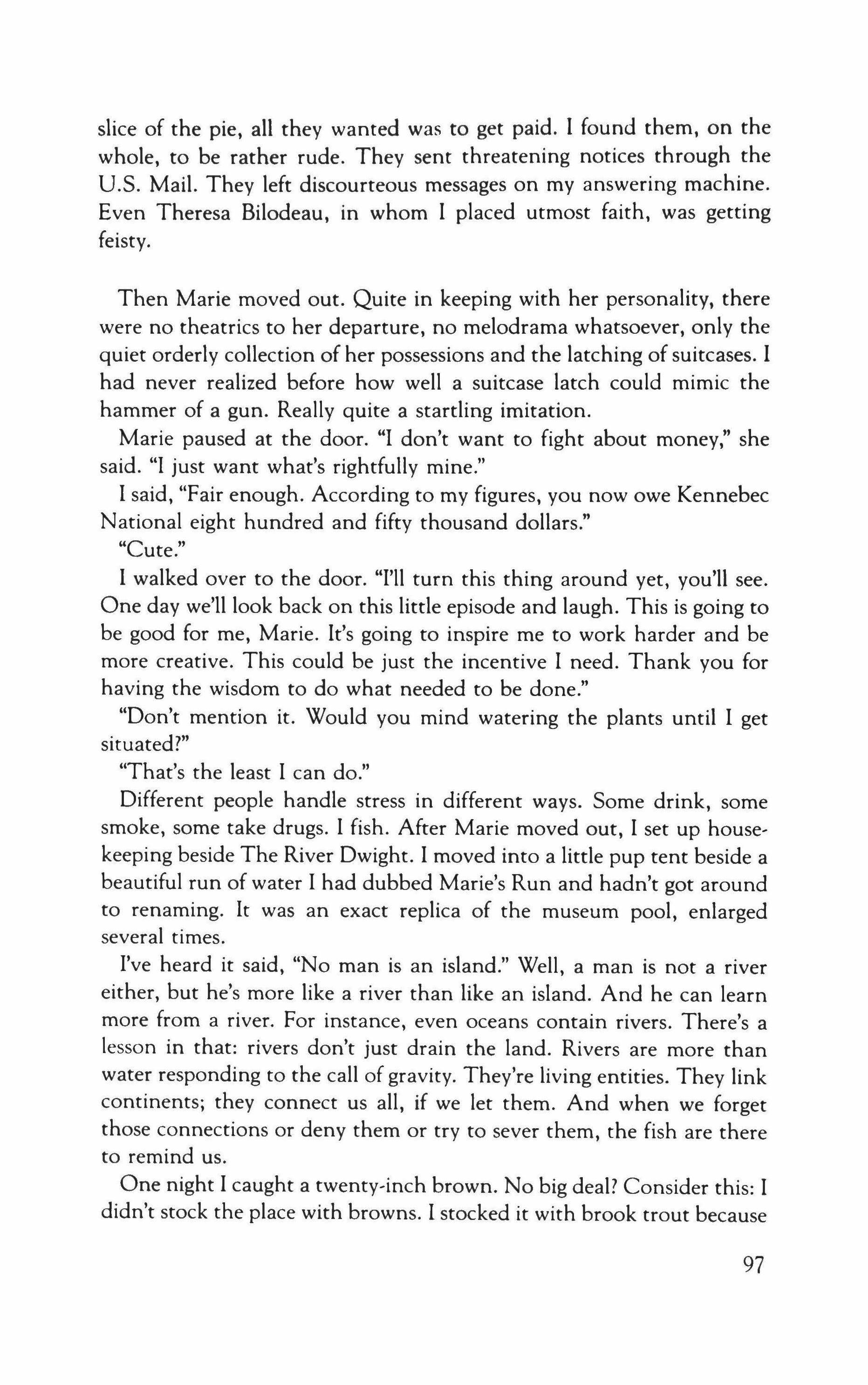
slice of the pie, all they wanted was to get paid. I found them, on the whole, to be rather rude. They sent threatening notices through the U.S. Mail. They left discourteous messages on my answering machine. Even Theresa Bilodeau, in whom I placed utmost faith, was getting feisty.
Then Marie moved out. Quite in keeping with her personality, there were no theatrics to her departure, no melodrama whatsoever, only the quiet orderly collection of her possessions and the latching of suitcases. I had never realized before how well a suitcase latch could mimic the hammer of a gun. Really quite a startling imitation.
Marie paused at the door. "I don't want to fight about money," she said. "I just want what's rightfully mine."
I said, "Fair enough. According to my figures, you now owe Kennebec National eight hundred and fifty thousand dollars."
"Cute."
I walked over to the door. "I'll turn this thing around yet, you'll see. One day we'll look back on this little episode and laugh. This is going to be good for me, Marie. It's going to inspire me to work harder and be more creative. This could be just the incentive I need. Thank you for having the wisdom to do what needed to be done."
"Don't mention it. Would you mind watering the plants until I get situated?"
"That's the least I can do."
Different people handle stress in different ways. Some drink, some smoke, some take drugs. I fish. After Marie moved out, I set up housekeeping beside The River Dwight. I moved into a little pup tent beside a beautiful run of water I had dubbed Marie's Run and hadn't got around to renaming. It was an exact replica of the museum pool, enlarged several times.
I've heard it said, "No man is an island." Well, a man is not a river either, but he's more like a river than like an island. And he can learn more from a river. For instance, even oceans contain rivers. There's a lesson in that: rivers don't just drain the land. Rivers are more than water responding to the call of gravity. They're living entities. They link continents; they connect us all, if we let them. And when we forget those connections or deny them or try to sever them, the fish are there to remind us.
One night I caught a twenty-inch brown. No big deal? Consider this: I didn't stock the place with browns. I stocked it with brook trout because
97

they're easy to catch. Browns are too finicky. And this one was no exception.
He was rising steadily at the head of the deepest pool on the river, but he wouldn't take a dry fly. My first reaction was that one of my fish was getting selective. "Don't tell me that," 1 said. Selectivity really would spell the end of my business. Then I realized the fish wasn't taking duns at all; he was nymphing. I breathed a sigh of relief and tied on a Gold Ribbed Hare's Ear. He took it on the first pass. When 1 struck, he jumped and that was when 1 realized it wasn't a brook trout at all; it was a brown and a big one at that. "What the devil?" 1 said. "Where did he come from?" He had to come from the Kennebec. That was where 1 got my water; it was where my effluent went, but there were screens, pumps and filters. A unit must have failed, but I would worry about that later.
He fought hard enough, but 1 had on a 2X tippet. 1 tightened the drag and stifled his runs. 1 wanted this fish, and soon 1 had him. 1 dragged him up onto a patch of gravel and grabbed him with both hands. He was so fat 1 could barely get my hands around him. As he lay there gasping for air, his mustard yellow sides speckled brightly in red and black, the businessman in me said, "Kill him." Browns this size are cannibals; he would eat his weight in brook trout every week. 1 took out my pocket knife, and prepared to rap him over the head, but the fisherman in me stayed my hand. I could buy more brook trout, but 1 couldn't replace a fish like this. Truth was, 1 was honored by this fish's presence in my river, however it was he gained entry.
1 waded into the shallows and held the fish in the current. 1 held him longer than was necessary. 1 didn't want to kill him, but 1 didn't want to let him go either. 1 just wanted to stand there in the river holding him. Finally the fish lost patience and freed himself.
Meanwhile Theresa Bilodeau was having a relationship with my answering machine. They were not getting along. No matter how conciliatory she sounded ("We want to work with you, Dwight"), no matter how subtly threatening ("We're bankers, not realtors"), or not so subtly ("Don't force our hand"), she got the same recorded message.
The only message that 1 answered during those troubled times was Marie's: "Where're my plants?" she asked. "I want them back. You had no right to make off with my plants."
1 left a message on her answering machine. 1 said, "The plants have found a new home. They are very happy here, but they do miss their mother. Please feel free to visit. We are open seven days from six to ten,
98
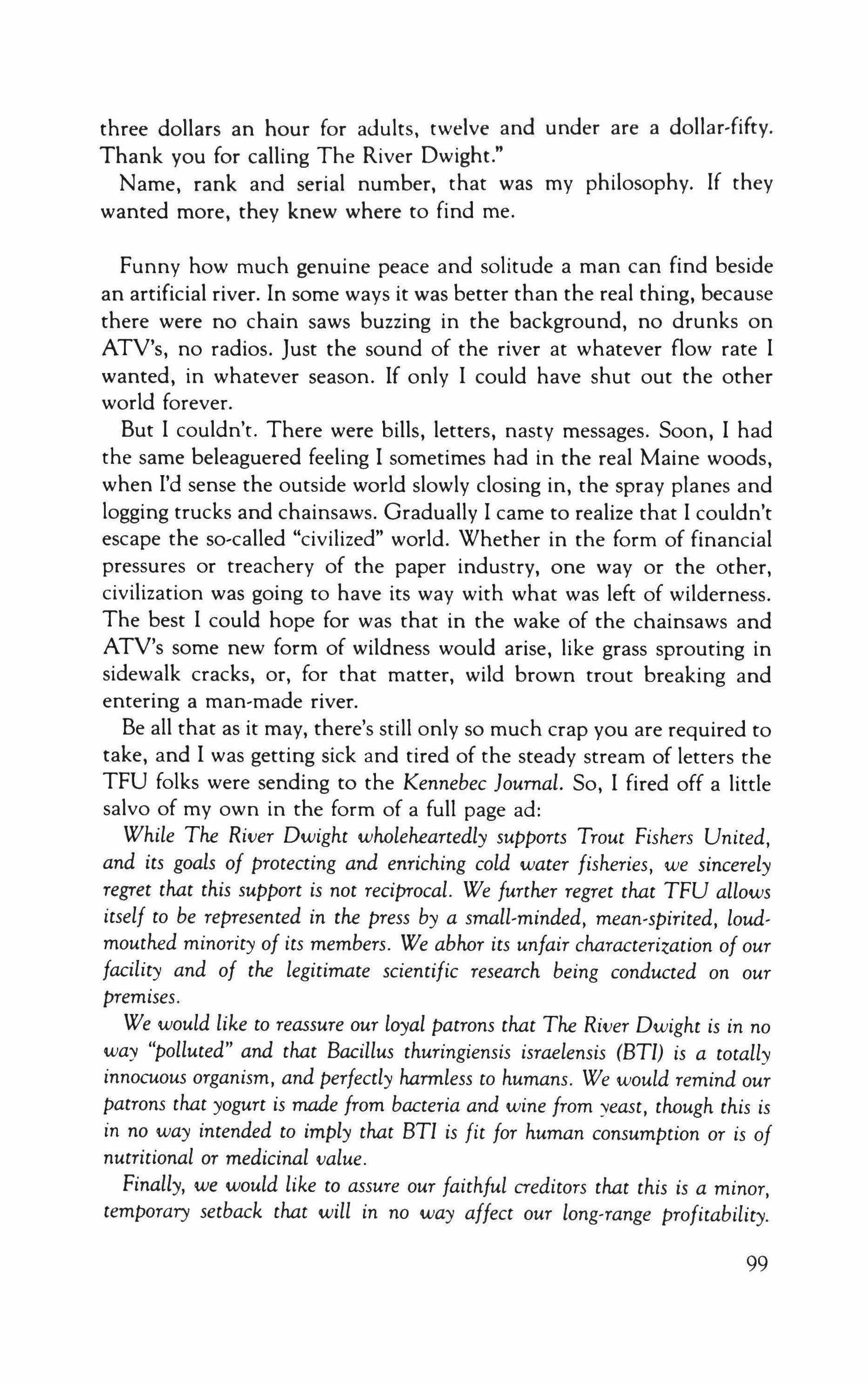
three dollars an hour for adults. twelve and under are a dollar-fifty. Thank you for calling The River Dwight." Name. rank and serial number, that was my philosophy. If they wanted more, they knew where to find me.
Funny how much genuine peace and solitude a man can find beside an artificial river. In some ways it was better than the real thing, because there were no chain saws buzzing in the background, no drunks on ATV's, no radios. Just the sound of the river at whatever flow rate I wanted, in whatever season. If only I could have shut out the other world forever.
But I couldn't. There were bills, letters, nasty messages. Soon, I had the same beleaguered feeling I sometimes had in the real Maine woods, when I'd sense the outside world slowly closing in, the spray planes and logging trucks and chainsaws. Gradually I came to realize that I couldn't escape the so-called "civilized" world. Whether in the form of financial pressures or treachery of the paper industry, one way or the other, civilization was going to have its way with what was left of wilderness. The best I could hope for was that in the wake of the chainsaws and ATV's some new form of wildness would arise, like grass sprouting in sidewalk cracks, or, for that matter, wild brown trout breaking and entering a man-made river.
Be all that as it may, there's still only so much crap you are required to take, and I was getting sick and tired of the steady stream of letters the TFU folks were sending to the Kennebec Journal. So, I fired off a little salvo of my own in the form of a full page ad:
While The River Dwight wholeheartedly supports Trout Fishers United, and its goals of protecting and enriching cold water fisheries, we sincerely regret that this support is not reciprocal. We further regret that TFU allows itself to be represented in the press by a small-minded, mean-spirited, loudmouthed minority of its members. We abhor its unfair characterization of our facility and of the legitimate scientific research being conducted on our premises.
We would like to reassure our loyal patrons that The River Dwight is in no way "polluted" and that Bacillus thuringiensis israelensis (BTl) is a totally innocuous organism, and perfectly harmless to humans. We would remind our patrons that yogurt is made from bacteria and wine from yeast, though this is in no way intended to imply that BTl is fit for human consumption or is of nutritional or medicinal value.
Finally, we would like to assure our faithful creditors that this is a minor, temporary setback that will in no way affect our long-range profitability.
99
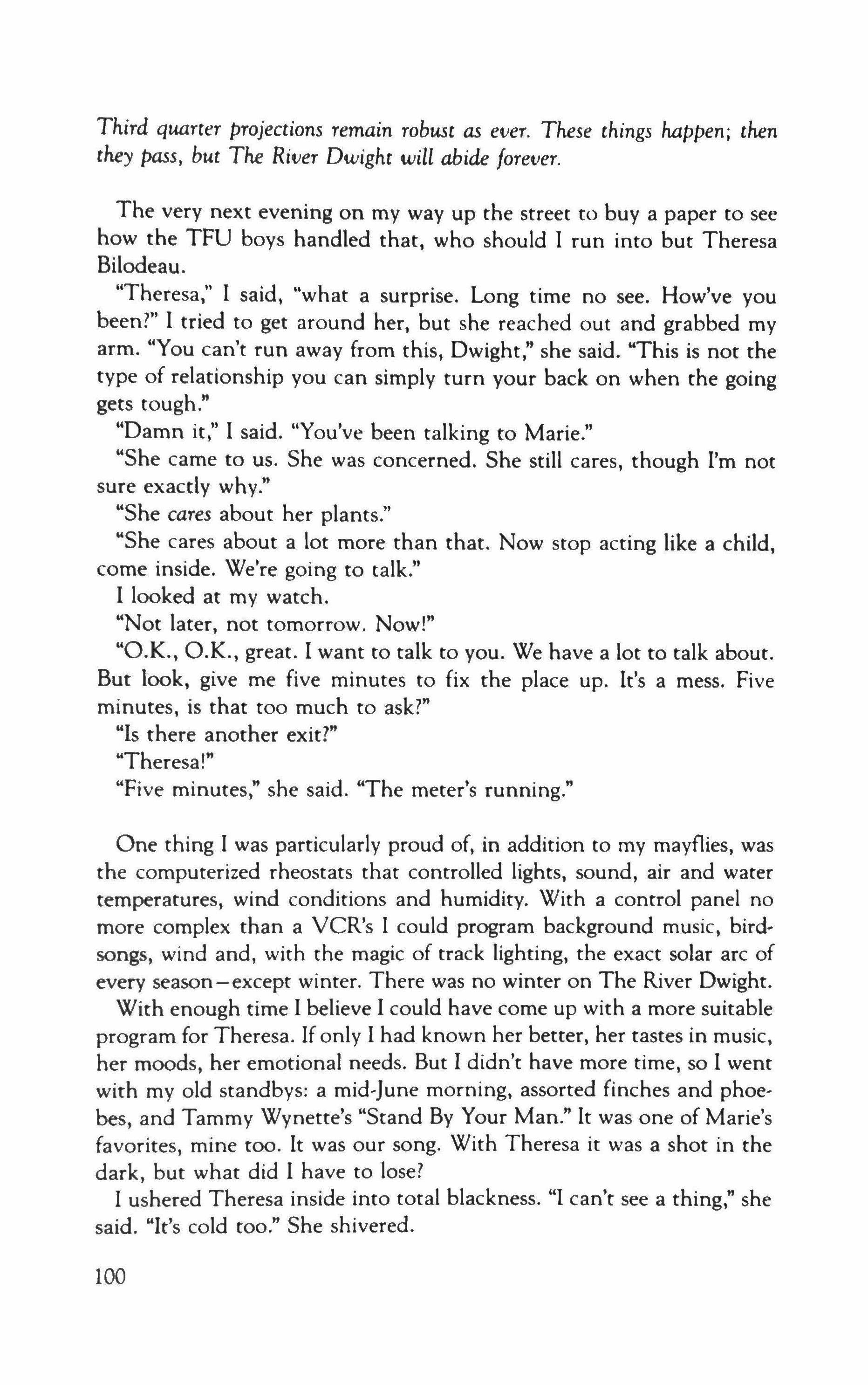
Third quarter projections remain robust as ever. These things happen; then they pass, but The River Dwight will abide forever.
The very next evening on my way up the street to buy a paper to see how the TFU boys handled that, who should I run into but Theresa Bilodeau.
"Theresa," I said, "what a surprise. Long time no see. How've you been?" I tried to get around her, but she reached out and grabbed my arm. "You can't run away from this, Dwight," she said. "This is not the type of relationship you can simply turn your back on when the going gets tough."
"Damn it," I said. "You've been talking to Marie."
"She came to us. She was concerned. She still cares, though I'm not sure exactly why."
"She cares about her plants."
"She cares about a lot more than that. Now stop acting like a child, come inside. We're going to talk."
I looked at my watch.
"Not later, not tomorrow. Now!"
"O.K., O.K., great. I want to talk to you. We have a lot to talk about. But look, give me five minutes to fix the place up. It's a mess. Five minutes, is that too much to ask?"
"Is there another exit?"
"Theresa!"
"Five minutes," she said. "The meter's running."
One thing I was particularly proud of, in addition to my mayflies, was the computerized rheostats that controlled lights, sound, air and water temperatures, wind conditions and humidity. With a control panel no more complex than a VCR's I could program background music, birdsongs, wind and, with the magic of track lighting, the exact solar arc of every season-except winter. There was no winter on The River Dwight. With enough time I believe I could have come up with a more suitable program for Theresa. If only I had known her better, her tastes in music, her moods, her emotional needs. But I didn't have more time, so I went with myoid standbys: a mid-June morning, assorted finches and phoebes, and Tammy Wynette's "Stand By Your Man." It was one of Marie's favorites, mine too. It was our song. With Theresa it was a shot in the dark, but what did I have to lose?
I ushered Theresa inside into total blackness. "I can't see a thing," she said. "It's cold too." She shivered.
100
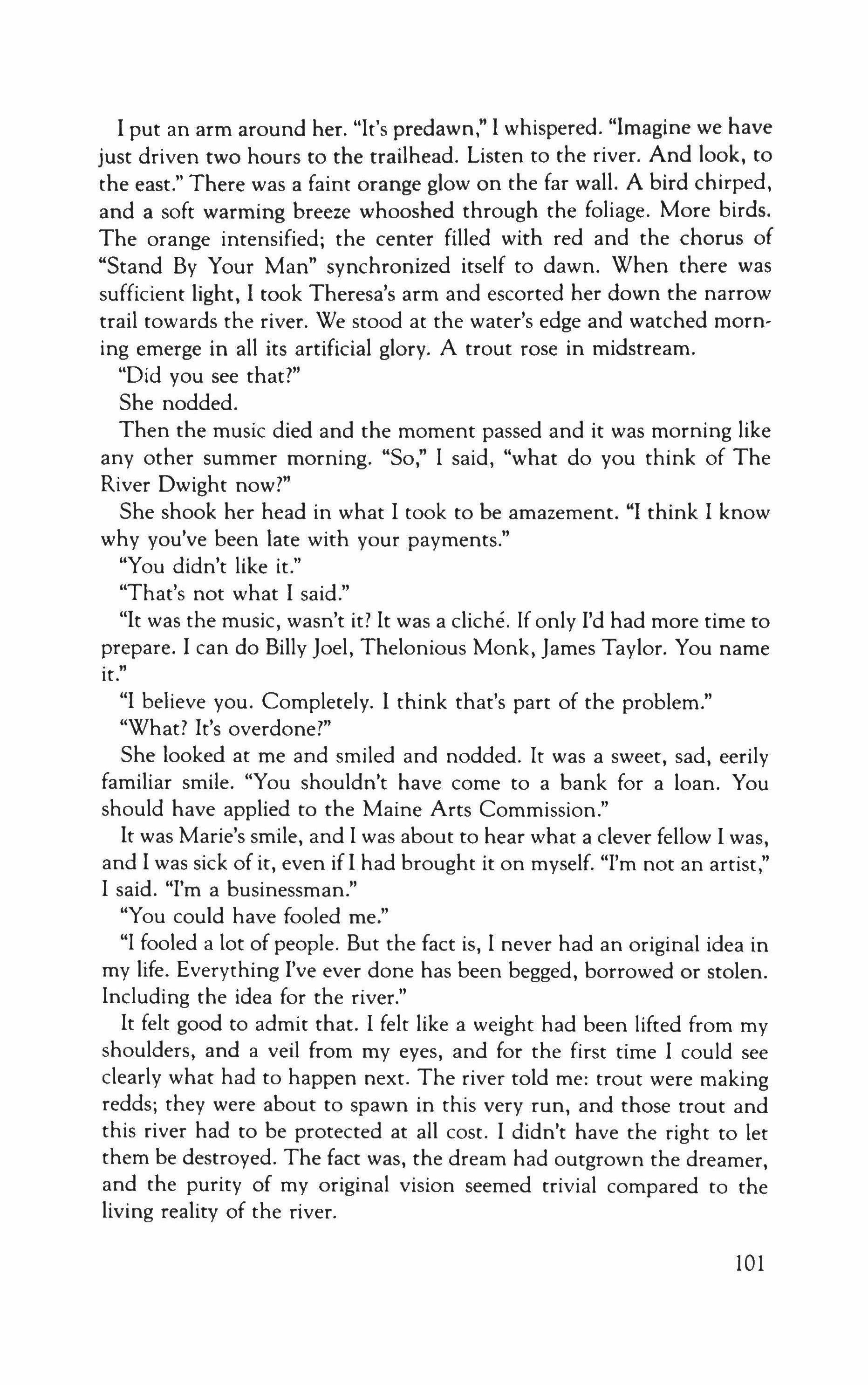
I put an arm around her. "It's predawn," I whispered. "Imagine we have just driven two hours to the trailhead. Listen to the river. And look, to the east." There was a faint orange glow on the far wall. A bird chirped, and a soft warming breeze whooshed through the foliage. More birds. The orange intensified; the center filled with red and the chorus of "Stand By Your Man" synchronized itself to dawn. When there was sufficient light, I took Theresa's arm and escorted her down the narrow trail towards the river. We stood at the water's edge and watched morning emerge in all its artificial glory. A trout rose in midstream.
"Did you see that?"
She nodded.
Then the music died and the moment passed and it was morning like any other summer morning. "So," I said, "what do you think of The River Dwight now?"
She shook her head in what I took to be amazement. "I think I know why you've been late with your payments."
"You didn't like it."
"That's not what I said."
"It was the music, wasn't it? It was a cliche. If only I'd had more time to prepare. I can do Billy Joel, Thelonious Monk, James Taylor. You name " tt.
"I believe you. Completely. I think that's part of the problem." "What? It's overdone?"
She looked at me and smiled and nodded. It was a sweet, sad, eerily familiar smile. "You shouldn't have come to a bank for a loan. You should have applied to the Maine Arts Commission."
It was Marie's smile, and I was about to hear what a clever fellow I was, and I was sick of it, even if I had brought it on myself. "I'm not an artist," I said. "I'm a businessman."
"You could have fooled me."
"I fooled a lot of people. But the fact is, I never had an original idea in my life. Everything I've ever done has been begged, borrowed or stolen. Including the idea for the river."
It felt good to admit that. I felt like a weight had been lifted from my shoulders, and a veil from my eyes, and for the first time I could see clearly what had to happen next. The river told me: trout were making redds; they were about to spawn in this very run, and those trout and this river had to be protected at all cost. I didn't have the right to let them be destroyed. The fact was, the dream had outgrown the dreamer, and the purity of my original vision seemed trivial compared to the living reality of the river.
101

1 turned back to Theresa. She was still eyeing me with sympathy and concern. "Theresa, 1 said 1 was a businessman. 1 didn't say 1 was a good businessman."
She nodded and seemed relieved by my confession, as if now my rehabilitation could begin.
"It's possible," 1 said, "that 1 might have overestimated the amount of income fishermen were going to generate."
"That sounds plausible."
"By the same token, though, 1 may have underestimated other potential sources of revenues, that I'm just now beginning to explore. The truth is, Theresa, 1 have expanded my vision ofThe River Dwight. Walk over here with me, would you?"
We cut through a wooded section to my campsite. There was the tent and my Coleman stove and my flvrod propped against a tree. "Here's a little concept I've been working on," 1 said. "Campsites beside the river. Theresa, think of all the people who get camping gear for Christmas and then have to wait five or six months to use it. How many of those people do you think would like a chance to tryout that new sleeping bag or that new tent in the winter? Beside a river, a river with real live fish in it?"
"Interesting concept."
"I could easily expand my fishing shop to handle camping gear. It would be a natural tie-in. I've pretty much decided to add a few other stores, maybe on a second floor, not to obstruct the skylight, but, you know "
"A mezzanine?"
"Exactly! You read my mind. And maybe a little boutique." Marie always wanted a boutique.
"Sort of a mall concept."
1 winced. "Well, 1 wouldn't call it that," I said. "but you can if you like. But it couldn't interfere with the river. That's one rule. Everything revolves around the river."
"Of course, it does. It wouldn't work any other way."
"You understand, Theresa, these renovations are going to require some additional funds. Probably we should talk about restructuring the loan."
"Probably we should," she said.
I could see that word meant a lot to her. "Re-structuring." It sounded responsible and businesslike. So 1 used it several more times, and 1 kept talking like that until the last vestiges of pity were gone from her eyes.
102
Lucky Accident
Susan Bailey

The reporter from the paper in Kezar Falls comes today. She wants to talk to me. It's about the dolls. 1 keep them outside, dressed for the weather. They are dressed for anything that will happen. She drives in before Elroy is gone when we are having coffee. I don't introduce her. Elroy and 1 aren't married. He finishes his coffee and leaves for work. He manages things at the lumberyard in Corliss City. We've been together three years now. I don't mind him. He's better than some of the others I've had. The reporter is young. She looks smart. I don't think she'd like it about Elroy and l. She's here for the dolls.
She's already noticed the ones outside, and she starts in on them. They are dressed in their winter outfits because it isn't spring yet although it is April. Up here it isn't spring until the end of May. It isn't summer until early July. I don't have the dolls in their summer clothes for very long. They are hardly in T-shirts before it's back to coats. In the winter I put on their hats and gloves. The worst storm, and they are not cold.
How did I get started on them? she wants to know. A friend brought me one from the dump. Perfectly good doll that somebody had thrown out. Missing an eye was all. Everything else worked fine. For a while I kept it in the house - in the living room with the dolls that my children no longer cared about. 1 couldn't bear to throw them out. There are dolls in the house. I want her see that before we go outside. I start with the ones on the highest shelves. They are the smallest ones. Some of them are made of china. They don't wear dresses. Their dresses are painted on. On the lower shelves I have stuffed puppies, teddy bears in purple bowties. They aren't all dolls. I want her to know that. The dolls are in the dining room on either side of the table. I sit in here and drink
103

coffee with them while Elroy is at the lumberyard. I like my coffee with two cubes of sugar, no cream. The cream will make me fat.
Where did these come from? she asks. I let her hold the Viennese doll that Selma bought at a secondhand shop in Portland. It looks practically new, with a red apron made in Austria. It doesn't look like any of our dolls in this country. The eyes are too large and the fingernails too perfect. It is an elegant doll, the best one I have. I don't know why anyone would give it away. I wonder what would have happened if Selma hadn't bought it for me. Many of my dolls would not have had very good lives. Even though I have enough, I feel it is my duty to take what is brought to me. People are always bringing me dolls. Sometimes they need a little repair work. They are missing arms or legs and feet but I don't let that bother me. I think about what would happen to them otherwise.
She's pretty nice, the reporter they've sent. I'm glad they haven't sent a man. I like them all right, but they aren't any good with dolls.
The dolls outside interest her the most. I knew that right away. I knew she was impatient in the house, that the dolls outside dressed for winter are more unusual, but I did not want to slight those I kept indoors. They are my companions at meals and I started with them. It is not good to forget the beginning of things. I don't like to do that. I say, O.K., I'll show you the dolls outside.
We stand in the driveway and look at the dolls from there. It's a brighter day than I thought. It's a good day for this part of the country. Around here we don't have very many good days. You take what you can get, though. Like my dolls. They have to survive the best they can. I like the view of them from this corner of the house. They seem to swarm toward the other side of the lawn. They look like they are marching for the road. The traffic is steady on Pine Tree Road. It never really stops. The dolls seem to be heading toward disaster, but I know they are not. Nothing can happen to them. She wants to look closer. She asks about pictures.
Everybody takes pictures of my dolls. There must be a thousand pictures that people have, all up and down the state. In the summer, the lake has a share of tourists and they stop across the street from my house. They don't ask for permission but I don't mind. Sometimes they wave to me and sometimes they don't. It is fine with me that my dolls impress them. They are good dolls, everyone of them. She wants to take pictures herself. She asks if I have a favorite. No, I say. I haven't any favorites. I love them all. They are my children.
When I first started I only had a few. My neighbor up the hill called
104

me on the telephone. Eleanor, your grandchildren are standing out in the rain. I laughed. Tooti, I said, those aren't my grandchildren. Those are dolls. My land, she said. Dolls? What are dolls doing on your lawn, Eleanor? She doesn't call me up anymore.
Last year someone from elsewhere moved onto Pine Tree Road. He didn't like the dolls. He called them an eyesore and told the city members to telephone me. They telephoned me, and we both laughed. Up here we're not about to do something because an outsider wants it done. If he wants the dolls taken away, he'll have to do it himself. If he thinks they are an eyesore, he can look the other way. We still live that way up here. Like Elroy says, It's a free country.
The reporter takes pictures. She stands funny with her arms tight and her feet far apart. She bends down to the dolls like she's talking to children. She takes one of the dolls pushing the wheelbarrow and one of the doll riding the ceramic donkey. That donkey came from the county fair, up in Elliot. Elroy won him for me. He's gray with a pink headstall. The doll rides him without a saddle. In the spring when I take them in for their baths I switch their positions on the lawn. I surprise them and move them around like they hadn't been in the same place for the last six months. It takes a long time to bathe all the dolls. I don't take them in all at once because the lawn would be empty. I bring them inside one at a time, take their clothes off, see how they have done through the storms. I sort the clothes by color. I wash the dolls in the bathtub. I've been doing this for eleven years now. I started eleven years ago with that one doll from the dump and every year I have more and more. When Elroy mows the lawn I go in front of him, picking up the dolls. He mows and I set them back down. It takes four hours to mow the lawn and it is the size of the three-car parking lot in front of the Falls Variety Store. Do they have names? she wants to know. She's seen my Barbie dolls. I know she likes them. She's the right age to have played with Barbie dolls when they first came out. She's about the age of my Bess, the one who was burned. Her dress caught on fire when she bent over the stove. That was before they made special fabrics. It melted the side of her face into her neck, the fire did. But Bess got married like everybody does, and she's had five children already.
The Barbies sit on the lawn, or they stand. It is hard to keep them standing, though. Several times a day I have to go out and fix them. They topple right over at the least little wind. Sometimes I make them all sit. They don't like it. They've got those long, long legs. But I make them do it. There's one Ken doll. That's enough. One man can do for a lots of women. It always worked for me.
105
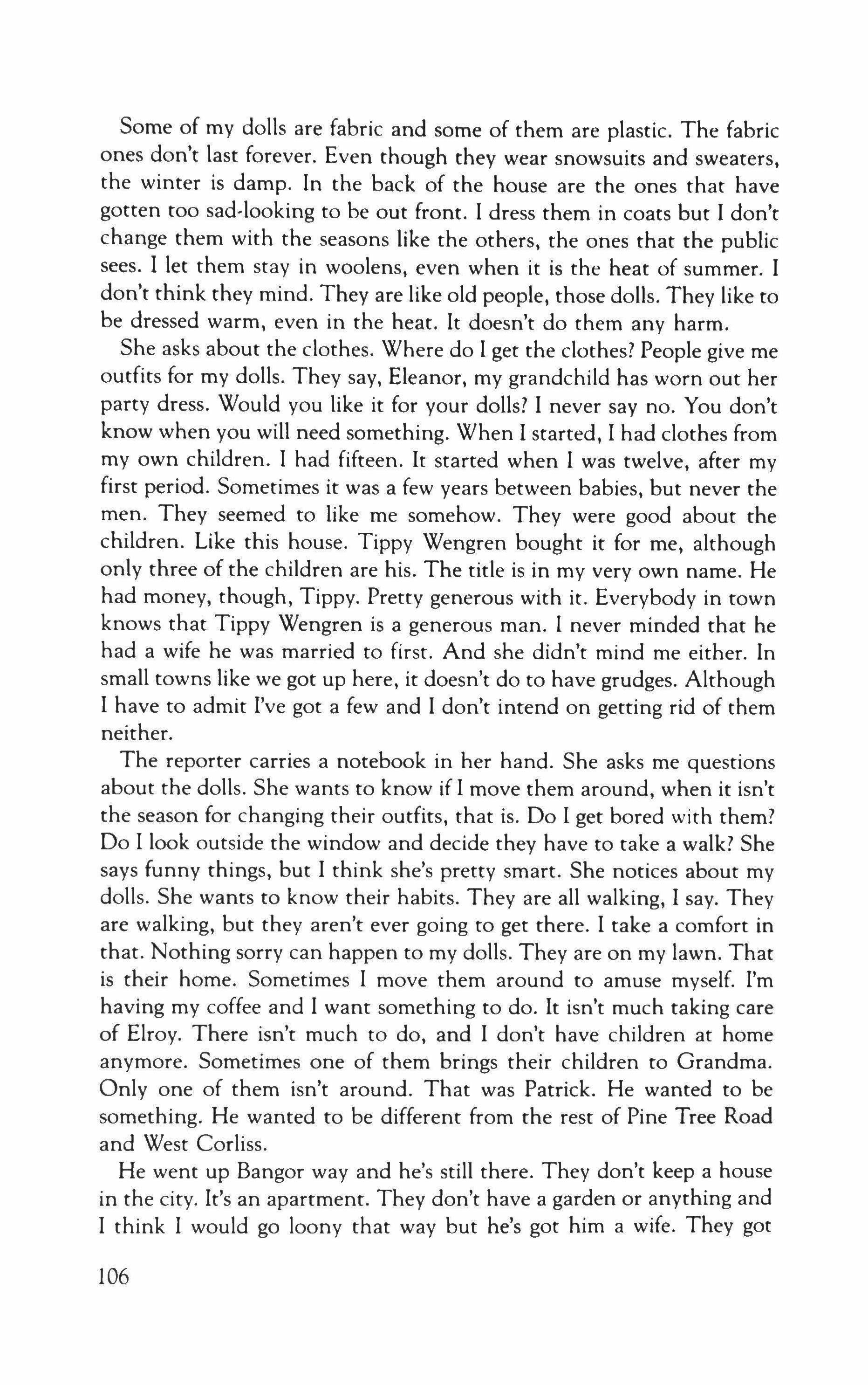
Some of my dolls are fabric and some of them are plastic. The fabric ones don't last forever. Even though they wear snowsuits and sweaters, the winter is damp. In the back of the house are the ones that have gotten too sad-looking to be out front. I dress them in coats but I don't change them with the seasons like the others, the ones that the public sees. I let them stay in woolens, even when it is the heat of summer. I don't think they mind. They are like old people, those dolls. They like to be dressed warm, even in the heat. It doesn't do them any harm.
She asks about the clothes. Where do I get the clothes? People give me outfits for my dolls. They say, Eleanor, my grandchild has worn out her party dress. Would you like it for your dolls? I never say no. You don't know when you will need something. When I started, I had clothes from my own children. I had fifteen. It started when I was twelve, after my first period. Sometimes it was a few years between babies, but never the men. They seemed to like me somehow. They were good about the children. Like this house. Tippy Wengren bought it for me, although only three of the children are his. The title is in my very own name. He had money, though, Tippy. Pretty generous with it. Everybody in town knows that Tippy Wengren is a generous man. I never minded that he had a wife he was married to first. And she didn't mind me either. In small towns like we got up here, it doesn't do to have grudges. Although I have to admit I've got a few and I don't intend on getting rid of them neither.
The reporter carries a notebook in her hand. She asks me questions about the dolls. She wants to know if I move them around, when it isn't the season for changing their outfits, that is. Do I get bored with them? Do I look outside the window and decide they have to take a walk? She says funny things, but I think she's pretty smart. She notices about my dolls. She wants to know their habits. They are all walking, I say. They are walking, but they aren't ever going to get there. I take a comfort in that. Nothing sorry can happen to my dolls. They are on my lawn. That is their home. Sometimes I move them around to amuse myself. I'm having my coffee and I want something to do. It isn't much taking care of Elroy. There isn't much to do, and I don't have children at home anymore. Sometimes one of them brings their children to Grandma. Only one of them isn't around. That was Patrick. He wanted to be something. He wanted to be different from the rest of Pine Tree Road and West Corliss.
He went up Bangor way and he's still there. They don't keep a house in the city. It's an apartment. They don't have a garden or anything and I think I would go loony that way but he's got him a wife. They got
106

married right away, before they had any children or anything. I guess Patrick is different, all right. He's only to home at Christmastime or so. But I don't mind, because I got the others.
My dolls are boys and girls. I don't care which. Some of them are girls that look like boys because someone chopped off their hair. That's how they got to the dump. That's how I find them. Sometimes I go to the dump myself and look for them. Sometimes Godfrey Mack saves them for me. He sees a doll get thrown out, so he retrieves it. When I come to the dump on trash days, he's got maybe two or three of them, in all kinds of conditions. I can't refuse. He lives right there, on the dirt road in. He sees everything at the dump. He keeps chickens for the worms and terrier dogs to kill rodents. The place is a field day for rats. My boys liked to take twenty-twos there and target-shoot. They were crack shots, everyone of them. People around here start young with a gun. We got moose and venison and some like to eat racoon although it's too strong for me. I do love a baby rabbit.
Where do you keep the clothes? she wants to know. In the basement I've got their spring outfits and their summer outfits. In summer some of the girl dolls wear bikinis. The ones that have their shape, that is. The boys have shorts. I put sandals on them. They are happy to get out of boots after all winter long. When the weather turns cool in September I put jackets on. But they are only fall jackets. They aren't any good for winter. Your husband doesn't mind? she asks. I know she doesn't want to learn that we aren't married. I wouldn't get any welfare if we were married. She's from the kind of family that doesn't get pregnant before the wedding. I knew that the minute she drove in. She isn't from around here but I don't hold that against her. She likes my dolls.
Elroy? I say. No, he doesn't mind. He doesn't mind much. He's good that way. If Lurissa comes over and leaves her children before she goes to work, they might be in the house when he gets off work, but he doesn't get angry. He never had any children, himself. He's about the only man I never had children with. Him, and Danny who I went to high school with. It just never happened, don't ask me why. We did enjoy ourselves plenty. Danny, he drove a big Chevy four-door and he kept a blanket in the back for us. He covered us up, in case someone came along. He went to Vietnam and never came back, so I guess I'm happy we didn't have children. I wouldn't like to be reminded of him.
She stands back and takes a picture of all the dolls, everyone on the lawn. You must have a job mowing in summer, she says. Oh, yes, I say. She's smart. She thought of the mowing herself. Some people don't think of that. They don't think of the time it takes, dressing and
107
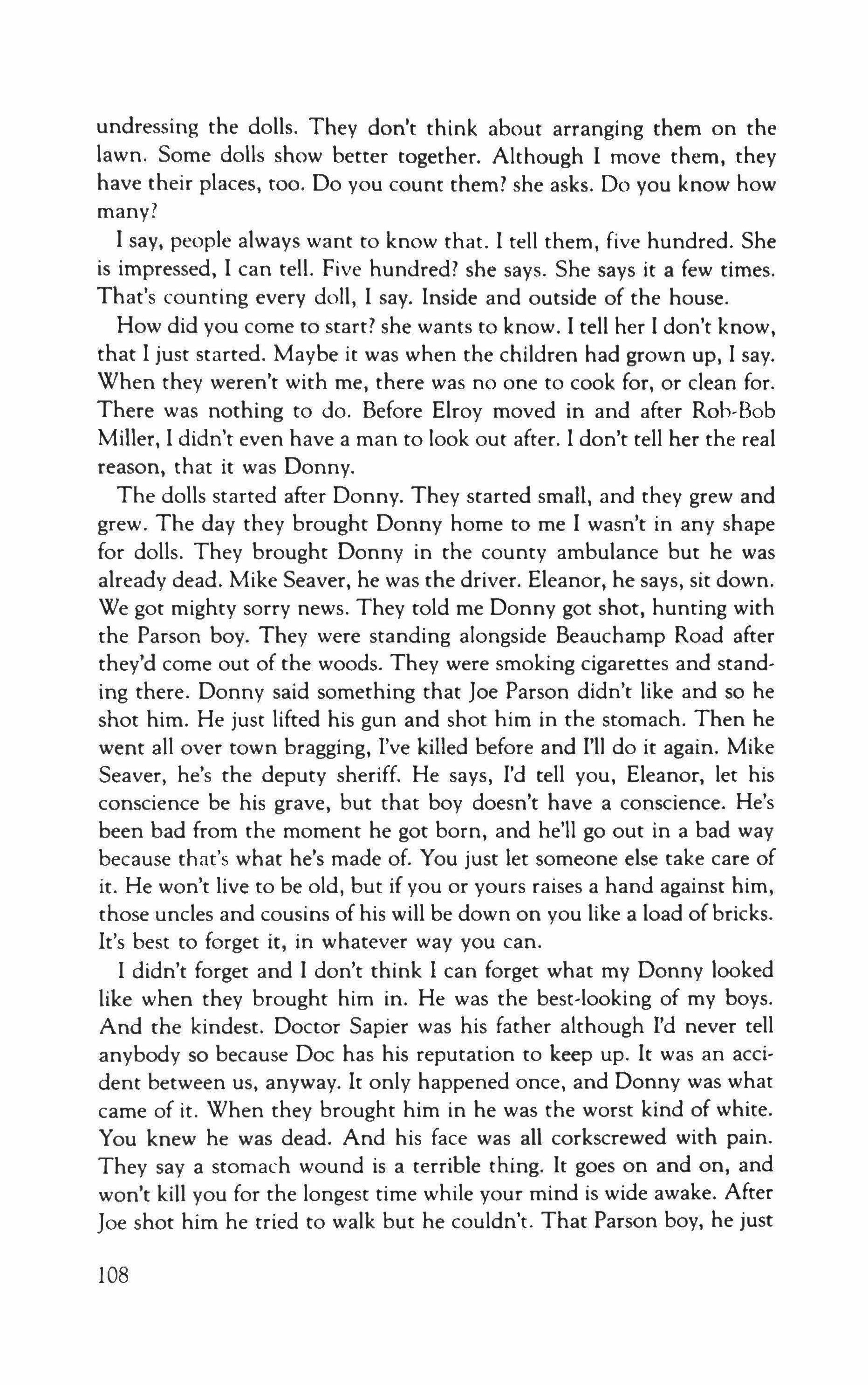
undressing the dolls. They don't think about arranging them on the lawn. Some dolls show better together. Although I move them, they have their places, too. Do you count them? she asks. Do you know how many?
I say, people always want to know that. I tell them, five hundred. She is impressed, I can tell. Five hundred? she says. She says it a few times. That's counting every doll, I say. Inside and outside of the house. How did you come to start? she wants to know. I tell her I don't know, that I just started. Maybe it was when the children had grown up, I say. When they weren't with me, there was no one to cook for, or clean for.
There was nothing to do. Before Elroy moved in and after Rob-Bob Miller, I didn't even have a man to look out after. I don't tell her the real reason, that it was Donny.
The dolls started after Donny. They started small, and they grew and grew. The day they brought Donny home to me I wasn't in any shape for dolls. They brought Donny in the county ambulance but he was already dead. Mike Seaver, he was the driver. Eleanor, he says, sit down. We got mighty sorry news. They told me Donny got shot, hunting with the Parson boy. They were standing alongside Beauchamp Road after they'd come out of the woods. They were smoking cigarettes and standing there. Donny said something that Joe Parson didn't like and so he shot him. He just lifted his gun and shot him in the stomach. Then he went all over town bragging, I've killed before and I'll do it again. Mike Seaver, he's the deputy sheriff. He says, I'd tell you, Eleanor, let his conscience be his grave, but that boy doesn't have a conscience. He's been bad from the moment he got born, and he'll go out in a bad way because that's what he's made of. You just let someone else take care of it. He won't live to be old, but if you or yours raises a hand against him, those uncles and cousins of his will be down on you like a load of bricks. It's best to forget it, in whatever way you can.
I didn't forget and I don't think I can forget what my Donny looked like when they brought him in. He was the best-looking of my boys. And the kindest. Doctor Sapier was his father although I'd never tell anybody so because Doc has his reputation to keep up. It was an accident between us, anyway. It only happened once, and Donny was what came of it. When they brought him in he was the worst kind of white. You knew he was dead. And his face was all corkscrewed with pain. They say a stomach wound is a terrible thing. It goes on and on, and won't kill you for the longest time while your mind is wide awake. After Joe shot him he tried to walk but he couldn't. That Parson boy, he just
108
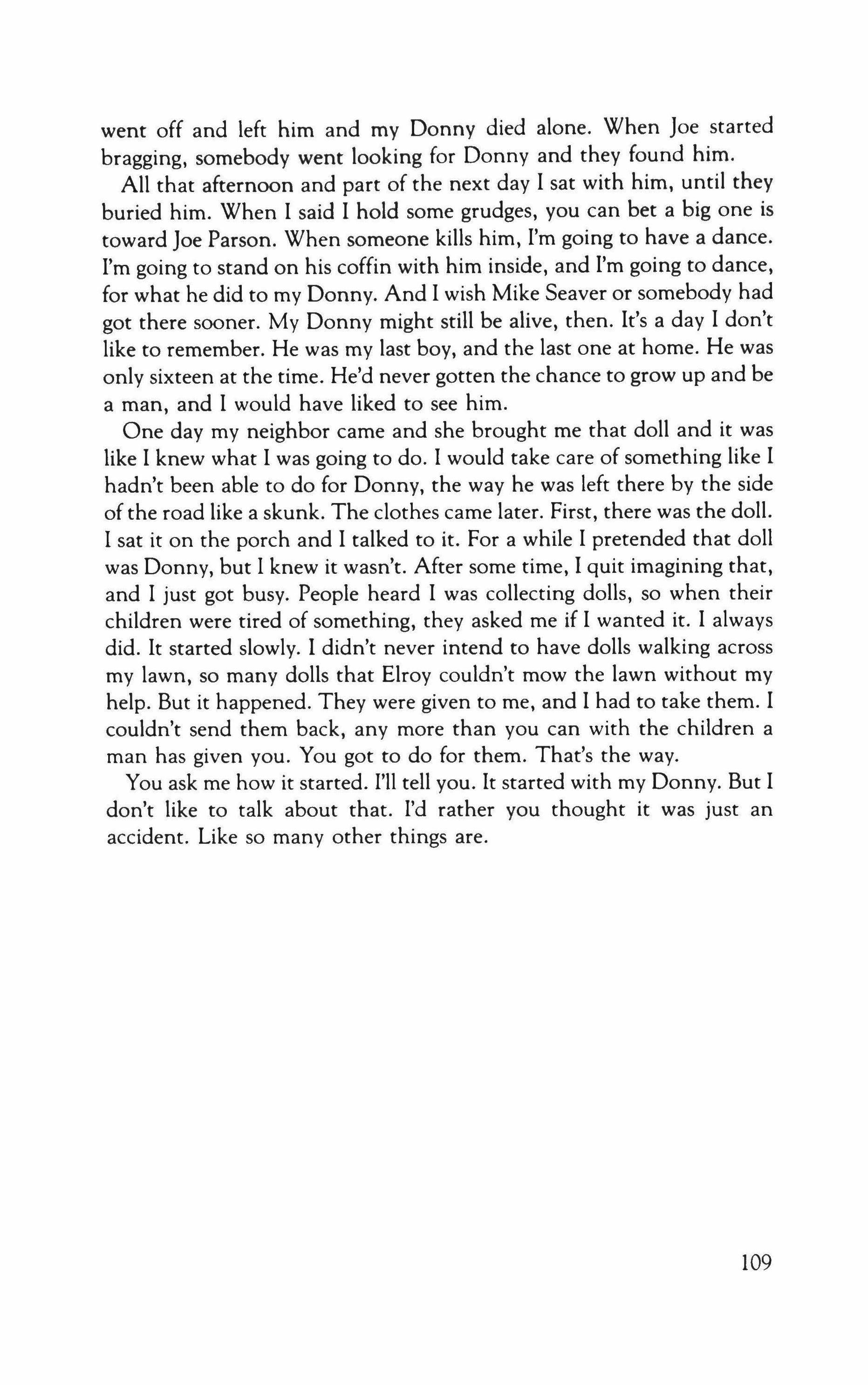
went off and left him and my Donny died alone. When Joe started bragging, somebody went looking for Donny and they found him.
All that afternoon and part of the next day I sat with him, until they buried him. When I said I hold some grudges, you can bet a big one is toward Joe Parson. When someone kills him, I'm going to have a dance. I'm going to stand on his coffin with him inside, and I'm going to dance, for what he did to my Donny. And I wish Mike Seaver or somebody had got there sooner. My Donny might still be alive, then. It's a day I don't like to remember. He was my last boy, and the last one at home. He was only sixteen at the time. He'd never gotten the chance to grow up and be a man, and I would have liked to see him.
One day my neighbor came and she brought me that doll and it was like I knew what I was going to do. I would take care of something like I hadn't been able to do for Donny, the way he was left there by the side of the road like a skunk. The clothes came later. First, there was the doll. I sat it on the porch and I talked to it. For a while I pretended that doll was Donny, but I knew it wasn't. After some time, I quit imagining that, and I just got busy. People heard I was collecting dolls, so when their children were tired of something, they asked me if I wanted it. I always did. It started slowly. I didn't never intend to have dolls walking across my lawn, so many dolls that Elroy couldn't mow the lawn without my help. But it happened. They were given to me, and I had to take them. I couldn't send them back, any more than you can with the children a man has given you. You got to do for them. That's the way.
You ask me how it started. I'll tell you. It started with my Donny. But I don't like to talk about that. I'd rather you thought it was just an accident. Like so many other things are.
109
I Never Told This to Anyone Stuart Dybek

I never told this to anyone - there wasn't anyone to tell it to - but when I was living with my Uncle Kirby on the Edge-the edge of what I never knew for sure ("Just livin' on the Edge, don't worry where," Uncle Kirby would say)-a little bride and groom would come to visit me at night. Naturally, I never mentioned this to Uncle Kirby. He'd of acted like I was playing with dolls. "A boy should play like the wild animals do-to practice survival," Uncle Kirby always said. "You wanna play, play with your Uzi."
The bride wore a white gown and silver slippers, and held a bouquet. The groom wore top hat, tails and spats. Their shoes were covered with frosting as if they'd walked through snow even though it was summer, June, when they first appeared. I heard a little pop - actually, more of a PiP! - and there on my windowsill was the groom, pouring from a tiny champagne bottle "Hi! I'm Jay and this is Trish," he said by way of introduction, adding almost confidentially, "We don't think of one another as Mister and Missus yet."
They had tiny voices, but I could hear them clearly. "That's because we enunciate," Trish said. She was pretty.
"It's these formal clothes, Old Boy," Jay explained. "Put them on and you start to speak the King's English."
I remember the first night they appeared, and the nights that followed, as celebrations-like New Year's Eve in June. There'd be big-band music on my shortwave-a station I could never locate except when Jay and Trish were over- and the PiP! PiP! PiP! of miniature champagne bottles. You should have seen them dancing to "Out of Nowhere" in the spotlight my flashlight threw as it followed them across the floor. I'd
110

applaud and Jay would kiss the bride. But each celebration seemed as if it would be the last.
"Off for the honeymoon, Old Boy," Jay would always say with a wink as they left. He'd sweep Trish off her feet and carry her across the windowsill, and Trish would laugh and wave back at me, "Ciao, we'll be staying at the Motel d'Amore," and then she'd toss her small bouquet.
I didn't want them to go. Having their visits to look forward to made living on the Edge seem less desolate. Uncle Kirby noticed the change in me. "What's with You, lately," he asked- You was sort of his nickname for me- "I mean why You goin' round with rice in your pockets and wearin' that jazzbow tie? And what's with the old shoes and tin cans tied to the back fender a your bike? How You expect to survive that way when the next attack comes outta nowhere?"
I told him that dragging shoes and cans built up my endurance and the rice was emergency rations, and he left me alone, but I knew he was keeping on eye on me.
Luckily, no matter how often Jay and Trish said they were off, they'd show up again a few nights later, back on the windowsill, scraping the frosting from their shoes. And after a while, when they'd leave, walking away hand-in-hand into the shadows, Jay hooking his tux jacket over his shoulder rather than sweeping Trish off her feet, and Trish no longer carrying a bouquet to toss, neither of them would mention the honeymoon.
I didn't notice at first, but gradually the nights quieted down. "A more sedate evening, for a change," Jay would say. Trish, especially, seemed more sedate. She said that champagne had begun making her dizzy. After dancing, she'd need a nap.
"I get no kick from champagne,"Jay would tell her, raising his glass in a toast, "but I get a kick out of you."
Trish would smile back, blow him a kiss, and then close her eyes. While she rested, Jay would sit up and talk to me. He had a confidential way of speaking that made it seem as if he was always on the verge of revealing a secret, as if we shared the closeness of conspirators.
"Actually," he'd say, almost whispering, "I still do get a kick from champagne, although it's nothing compared to what I feel around Trish. I never told this to anyone, but I married her for magic - because she made my routine, ordinary life seem somehow magical."
It wasn't until the sweltering nights of late summer, when Jay and Trish began to bicker and argue, that I realized how much things had changed. The two of them even looked different, larger somehow, as if they were outgrowing their now-stained, shabby formal wear.
III

"I'm so tired of this ratty dress," Trish complained one evening. "Nag, nag, nag instead of pip, pip, pip," Jay replied. "And please don't say ratt),. You know how I despise the term."
Jay would harangue on the subject of rodents in a way that reminded me of Uncle Kirby on the subject of Commies and certain ethnic groups. Jay had developed a bit of a potbelly and looked almost as if he was copying Trish who was, by now, obviously expecting. "Expecting" was Trish's word. "Out of all the names they give it, Old Boy, don't you think 'expecting' sounds the prettiest?" she'd asked once, surprising me, and I quickly agreed.
Their visits had become regular, and they showed up, increasingly famished, to dine on the morsels I'd filched from the supper table at Jay's suggestion. "Old Boy," Jay had said, jokingly, "you can't just take the attitude of 'Let them eat cake.' After all, cake isn't a limitless resource, you know." I was glad to pilfer the food for them. It made mealtime an adventure. Stealing rations in front of Uncle Kirby wasn't easy.
After I served their little dinner, they'd stay and visit. Jay would sit drinking the beer he'd figured a way of siphoning from Uncle Kirby's home brew.
"We could use a goddamn TV around this godforsaken, boring place. It would be nice to watch a little bowling once in a while," Jay would gripe after he'd had a few too many.
"Maybe if you'd do something besides sitting around in your dirty underwear, drinking and belching, things wouldn't be so BORrrr-ing," Trish answered.
Once, after an argument that made Trish storm off in tears, Jay held his head and muttered, as if more to himself than to me, "I never told this to anyone, but me and the Missus 1uuJ. to get married."
By the time the leaves were falling, they'd shed their wedding clothes. Trish wore a dress cut from one of my sweat socks, boots of bumblebee fur and a hat made from a hummingbird's nest. Jay, bearded, a bluejay feather poking from his top hat, dressed in the gray skin of an animal he refused to identify. He carried a knitting-needle spear, a bow he'd fashioned from the wishbone of a turkey, and a quiver of arrows-disposable hypodermic needles he'd scavenged from Uncle Kirby's supplies. He tipped each arrow in cottonmouth venom.
They never appeared now without first scavenging Uncle Kirby's storehoused supplies-at least, they called it scavenging. Uncle Kirby called it guerilla warfare. He kept scrupulous inventories of his stockpiles, and detected, almost immediately, even the slightest invasion. Yet, no matter how carefully he protected his supplies, Jay found ways to
112
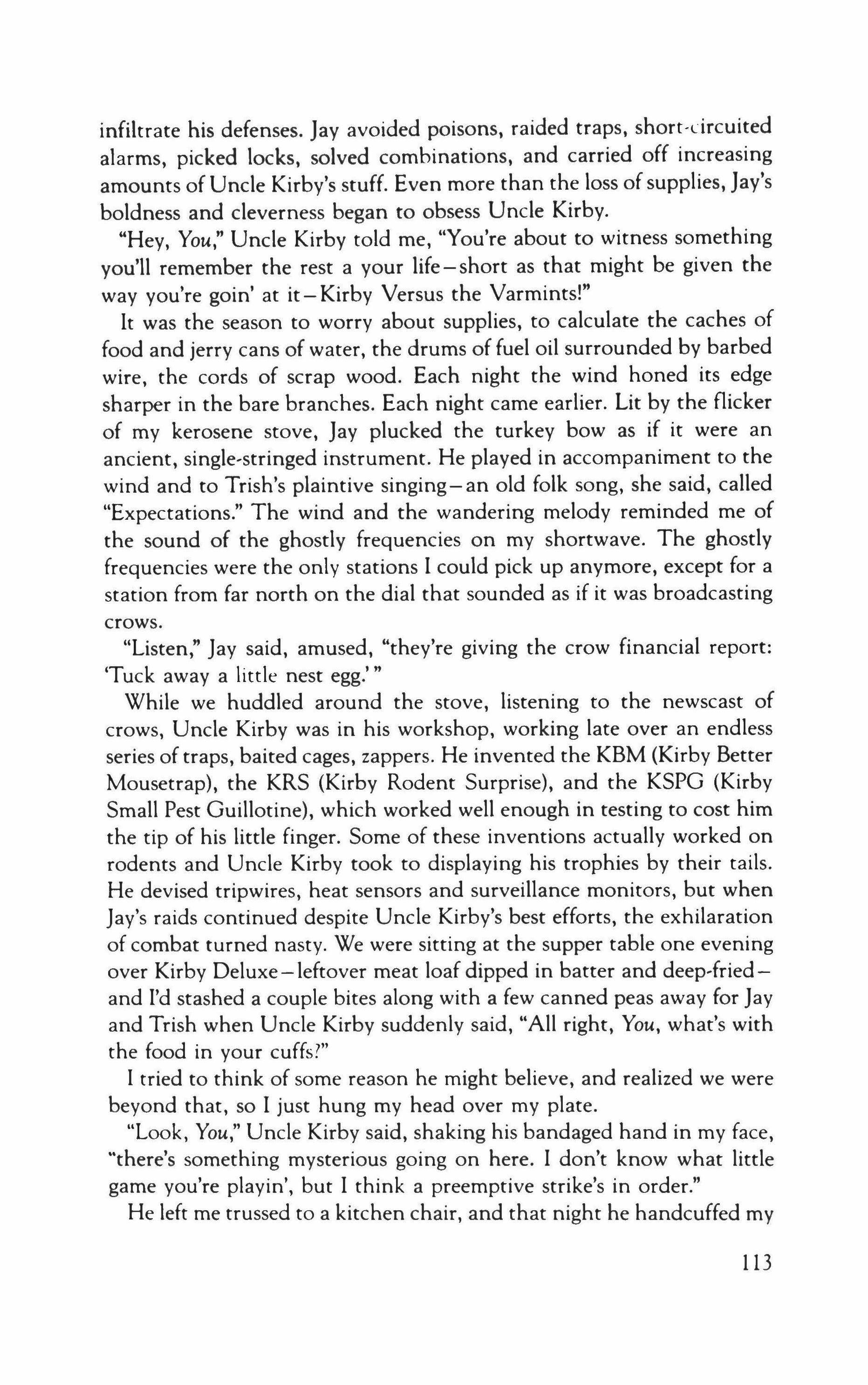
infiltrate his defenses. Jay avoided poisons, raided traps, short-circuited alarms, picked locks, solved combinations, and carried off increasing amounts of Uncle Kirby's stuff. Even more than the loss of supplies, Jay's boldness and cleverness began to obsess Uncle Kirby.
"Hey, You," Uncle Kirby told me, "You're about to witness something you'll remember the rest a your life-short as that might be given the way you're goin' at it-Kirby Versus the Varmints!"
It was the season to worry about supplies, to calculate the caches of food and jerry cans of water, the drums of fuel oil surrounded by barbed wire, the cords of scrap wood. Each night the wind honed its edge sharper in the bare branches. Each night came earlier. Lit by the flicker of my kerosene stove, Jay plucked the turkey bow as if it were an ancient, single-stringed instrument. He played in accompaniment to the wind and to Trish's plaintive singing-an old folk song, she said, called "Expectations." The wind and the wandering melody reminded me of the sound of the ghostly frequencies on my shortwave. The ghostly frequencies were the only stations I could pick up anymore, except for a station from far north on the dial that sounded as if it was broadcasting crows.
"Listen," Jay said, amused, "they're giving the crow financial report: 'Tuck away a little nest egg.'''
While we huddled around the stove, listening to the newscast of crows, Uncle Kirby was in his workshop, working late over an endless series of traps, baited cages, zappers. He invented the KBM (Kirby Better Mousetrap), the KRS (Kirby Rodent Surprise), and the KSPG (Kirby Small Pest Guillotine), which worked well enough in testing to cost him the tip of his little finger. Some of these inventions actually worked on rodents and Uncle Kirby took to displaying his trophies by their tails. He devised tripwires, heat sensors and surveillance monitors, but when Jay's raids continued despite Uncle Kirby's best efforts, the exhilaration of combat turned nasty. We were sitting at the supper table one evening over Kirby Deluxe -leftover meat loaf dipped in batter and deep-friedand I'd stashed a couple bites along with a few canned peas away for Jay and Trish when Uncle Kirby suddenly said, "All right, You, what's with the food in your cuffs?"
I tried to think of some reason he might believe, and realized we were beyond that, so I just hung my head over my plate.
"Look, You," Uncle Kirby said, shaking his bandaged hand in my face, "there's something mysterious going on here. I don't know what little game you're plavin', but I think a preemptive strike's in order."
He left me trussed to a kitchen chair, and that night he handcuffed my
113
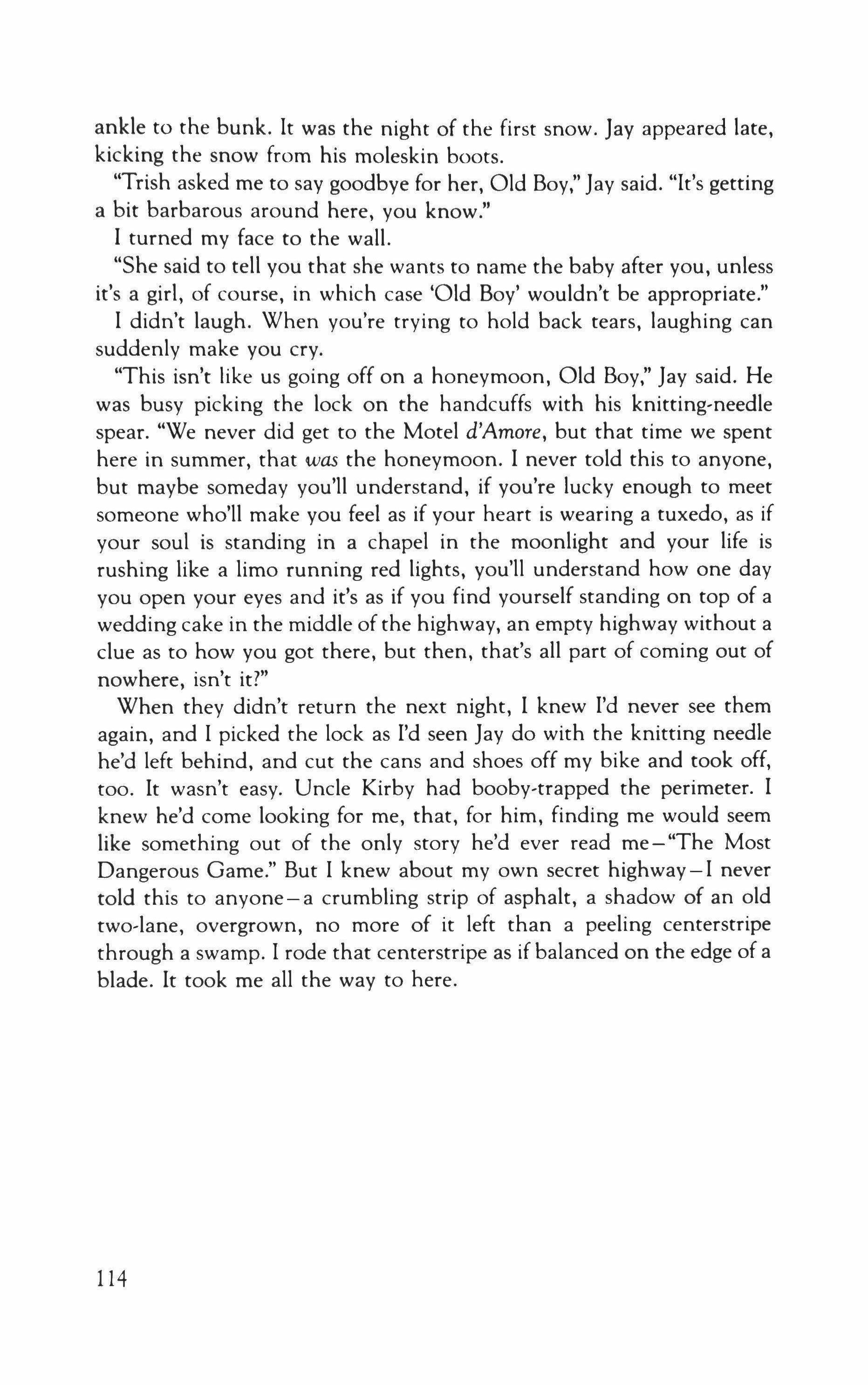
ankle to the bunk. It was the night of the first snow. Jay appeared late, kicking the snow from his moleskin boots.
"Trish asked me to say goodbye for her, Old Boy," Jay said. "It's getting a bit barbarous around here, you know."
I turned my face to the wall.
"She said to tell you that she wants to name the baby after you, unless it's a girl, of course, in which case 'Old Boy' wouldn't be appropriate." I didn't laugh. When you're trying to hold back tears, laughing can suddenly make you cry.
"This isn't like us going off on a honeymoon, Old Boy," Jay said. He was busy picking the lock on the handcuffs with his knitting-needle spear. "We never did get to the Motel d'Amore, but that time we spent here in summer, that was the honeymoon. I never told this to anyone, but maybe someday you'll understand, if you're lucky enough to meet someone who'll make you feel as if your heart is wearing a tuxedo, as if your soul is standing in a chapel in the moonlight and your life is rushing like a limo running red lights, you'll understand how one day you open your eyes and it's as if you find yourself standing on top of a wedding cake in the middle of the highway, an empty highway without a clue as to how you got there, but then, that's all part of coming out of nowhere, isn't it?"
When they didn't return the next night, I knew I'd never see them again, and I picked the lock as I'd seen Jay do with the knitting needle he'd left behind, and cut the cans and shoes off my bike and took off, too. It wasn't easy. Uncle Kirby had booby-trapped the perimeter. I knew he'd come looking for me, that, for him, finding me would seem like something out of the only story he'd ever read me - "The Most Dangerous Game." But I knew about my own secret highway - I never told this to anyone-a crumbling strip of asphalt, a shadow of an old two-lane, overgrown, no more of it left than a peeling centerstripe through a swamp. I rode that centerstripe as if balanced on the edge of a blade. It took me all the way to here.
114
In the Land of Men
Antonya Nelson

Since my attack last year, when I get off work at night one of my brothers is always waiting for me in our family car, the rusted boat, engine idling, double-parked on Halsted right outside Mizzi's, where I wait tables. No one asked them to do this and we don't talk about it, but when I emerge from the steamy restaurant into the biting, steel cold of Chicago, my heart offers up a grateful sigh at the presence of one or the other of my brothers' placid, safe faces.
Tonight they all three show. Sam, nineteen, the oldest boy but four years younger than me, sits on the hood with his pointed black ankle boots wedged between bumper and car. An inch of bare skin is exposed where the boots and pants cuffs don't quite meet, which is Sam's style. It is zero degrees out, according to the radio, factoring in wind chill, but Sam doesn't wear a coat.
"Too cool to feel cold?" I say.
He shells out a pittance of a smile. "Let's go." He hops off the hood to hold open the front door and presses my back with his palm. Sensing his eyes casting about protectively behind me, I catch my first whiff of something gone awry.
"I love a warm car," I say, settling in the passenger seat with my hands in front of the blowing heat vents. My other two brothers sit in the back the way the youngest always do. I say to them, "Hey."
Sam slams the driver's door and jerks us out of Park. He drives as if our transmission is not automatic, shifting into low or neutral frequently, keeping one hand active on the thin metal stick. Even as his older sister, I stay a certain nervous distance from Sam. Beneath his meticulously maintained smooth surface is a rage that can erupt and break windows or punch walls.
115

For a time I just ride along in the warmth, quietly losing my waitress aches. Lately I've found real comfort in these pocket-like moments of heat and peace, which can be as refreshing as deep, unconscious sleep. I breathe out, at last, hating to end it, but knowing I must. "So, what's the occasion?"
Sam grimly says nothing, flicking his eyes to the rearview. I turn, catty-cornered, to Donald. Seventeen, the worrier, he looks alarmingly pale in the passing streetlights. His hand is in a fist under his nose as he bites a fingernail, staring desperately at the sidewalk and storefronts like a trapped dog. Donald has ulcers, migraines, all the ailments symptomatic of early adulthood. Beside him, Les, the family baby, seems more rosy-cheeked than usual, as if he's syphoned off Donald's color to top his own. But even happy Les has an uncertain smile on his face and watches Sam for cues. His teeth chatter, despite the car's abundant warmth. Without taking his eyes off the panel van in front of him, Sam says tightly, "You got any plans tonight?"
I point at my chest. "Me? You're talking to me?"
"That's right. Anything you were going to do?"
"Is something wrong?" I ask, simultaneously anxious and annoyed that they are protecting me by withholding. "Is it Dad? Has something happened to Dad?"
"No," Donald says, looking at his watch. "Time for WGN News at Nine. Pistachios and beer."
From behind me, Les pats my arm soothingly. "Dad's cool," he assures me.
Sam catches my eye and we share an older sibling's smile, as if over Les's head. "He's fine," Sam says.
"And here you guys are. So what could it be?" I sit back, relieved: My family is alive. Lesser scenarios occur to me. A surprise party. An unexpected friend waiting at the airport. A trip to the police to clear up some minor infraction before my father discovers the offense. But here we are, enclosed and fine and balanced. I enjoy, for a second, suspense's tantalizing luxury. "So when do you tell me, guys?"
Sam stops uncharacteristically at a yellow light. We rock forward with inertia, rock back. Pedestrians, loaded down with after-work, early Christmas shopping, plunge into the crosswalks, heads ducked in irritation against the cold. Telltale, forest-green Marshall Field's sacks swing from their gloved fingers. It's late and they're homeward-bound. A man carries a paper funnel of flowers, shielding it with his chest, turning his back to protect this gift for some woman. Ashy snow blows up in the sixway intersection, sings along the cracks in our car doors, and the taxi in
116
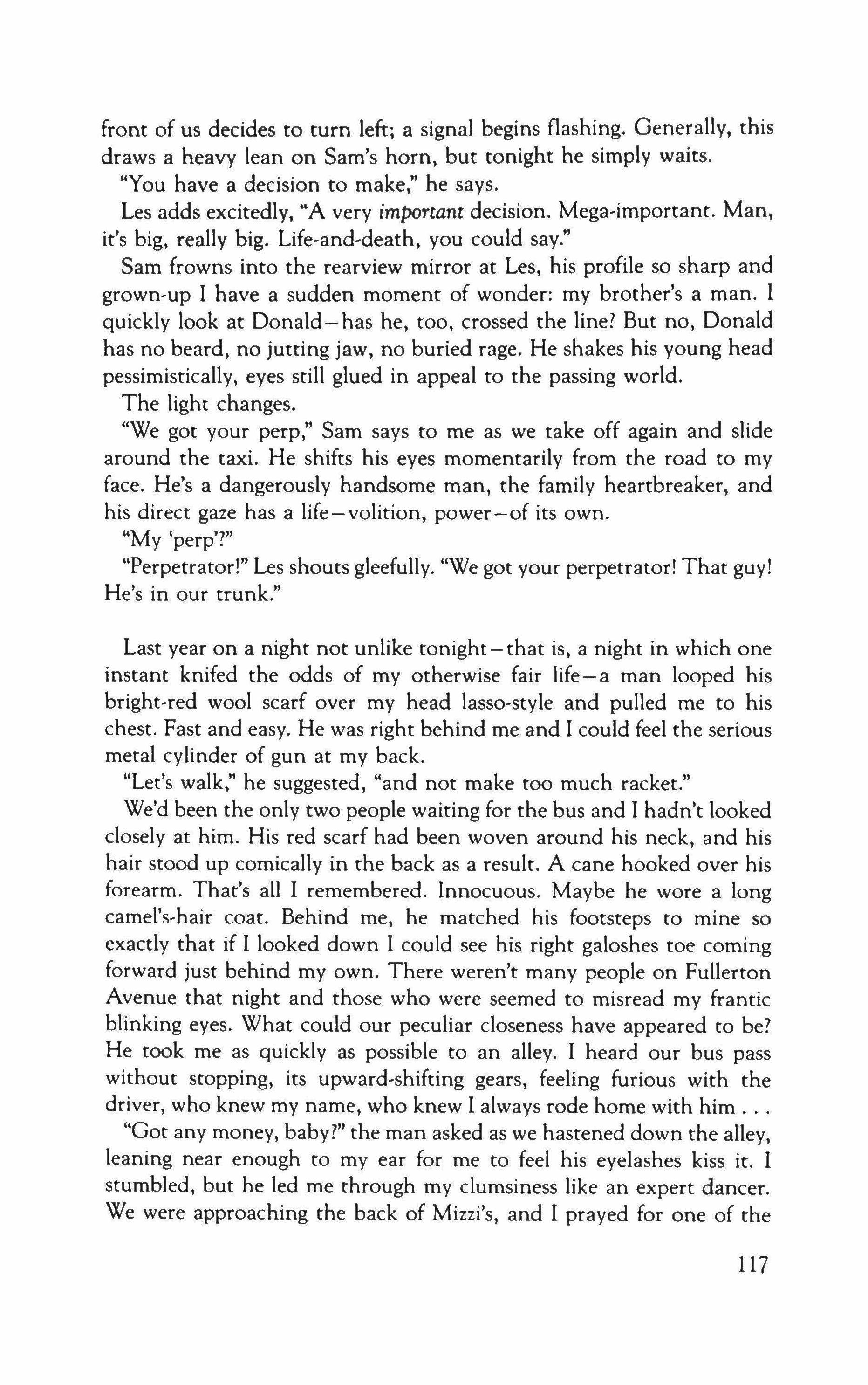
front of us decides to turn left; a signal begins flashing. Generally, this draws a heavy lean on Sam's horn, but tonight he simply waits.
"You have a decision to make," he says.
Les adds excitedly, "A very important decision. Mega-important. Man, it's big, really big. Life-and-death, you could say."
Sam frowns into the rearview mirror at Les, his profile so sharp and grown-up I have a sudden moment of wonder: my brother's a man. I quickly look at Donald - has he, too, crossed the line? But no, Donald has no beard, no jutting jaw, no buried rage. He shakes his young head pessimistically, eyes still glued in appeal to the passing world.
The light changes.
"We got your perp," Sam says to me as we take off again and slide around the taxi. He shifts his eyes momentarily from the road to my face. He's a dangerously handsome man, the family heartbreaker, and his direct gaze has a life-volition, power-of its own.
"My 'perp?"
"Perpetrator!" Les shouts gleefully. "We got your perpetrator! That guy! He's in our trunk."
Last year on a night not unlike tonight-that is, a night in which one instant knifed the odds of my otherwise fair life-a man looped his bright-red wool scarf over my head lasso-style and pulled me to his chest. Fast and easy. He was right behind me and I could feel the serious metal cylinder of gun at my back.
"Let's walk," he suggested, "and not make too much racket."
We'd been the only two people waiting for the bus and I hadn't looked closely at him. His red scarf had been woven around his neck, and his hair stood up comically in the back as a result. A cane hooked over his forearm. That's all I remembered. Innocuous. Maybe he wore a long camel's-hair coat. Behind me, he matched his footsteps to mine so exactly that if I looked down I could see his right galoshes toe coming forward just behind my own. There weren't many people on Fullerton Avenue that night and those who were seemed to misread my frantic blinking eyes. What could our peculiar closeness have appeared to be? He took me as quickly as possible to an alley. I heard our bus pass without stopping, its upward-shifting gears, feeling furious with the driver, who knew my name, who knew I always rode home with him
"Got any money, baby?" the man asked as we hastened down the alley, leaning near enough to my ear for me to feel his eyelashes kiss it. I stumbled, but he led me through my clumsiness like an expert dancer. We were approaching the back of Mizzi's, and I prayed for one of the
117

busboys, Danbo or Rudy, to be outside smoking a jay. But it was too cold; they would be up above the walk-in refrigerator, in the space between floors. There wasn't a soul in the alley. I heard the muffled clatter of dishes and the motor of the Hobart, could easily imagine that lively, hot kitchen only a few crucial feet of space away from me.
"Money, babe?" he reminded me.
I nodded in my scarf sling. "I do. Take it, please, in my bag." I lifted my right shoulder carefully to draw attention to my purse hanging there.
He said, "Good girl. You a good girl? It would be in your interest to be a very good girl, you know." He had a precise, British accent, cheerful and civilized-sounding. Could I have felt relief? We'd stopped and he positioned me face-first against the rear wall of the empty storefront down the block from Mizzi's. It would be open in a month, its front windows claimed. A comedy club. I'd passed the sign a hundred times. Open mike on Wednesdays, no cover, two-drink minimum. He pushed me gently to the wall, nose to brick, and told me to grab on to the black window bars on either side.
"You hang on for dear life, do you hear me?
I certainly did.
His gun, that metal erection, pressed into my lower spine, sending its insinuations to every part of me. Without lowering the gun, he dropped his cane to the ground and told me to put a foot at either end of it. I concentrated on the rubber tip and the curve of its worn handle. The worst thing that could happen, I told myself, was not going to. Then he drew my head back by the hair and slammed my forehead against the bricks. I tasted red wool.
Donald says, "He can probably hear us, you know. The trunk is right here." He pats the seat behind him, leaning away from it. Les looks startled and also tips forward.
Even the remotest possibility of this man's presence has made me queasy and I clutch the door handle, as if waiting for the right moment to escape. "You can't be serious," I say hopefully.
"Serious as a heart attack, sweetheart," Sam says.
We're heading west on the Eisenhower. Magnificent, colorful Michigan Avenue has given way to gloomy industrial warehouses. Traffic is light and, for the second time in my city life, I wish it otherwise. Cars, humanity, witnesses- but to what?
I say, "How can you be positive it's him? I mean, did you ask him?"
"We didn't talk to him," Les says. "God, it was hard enough to find
118

him. We've been watching him for a long time. We knew it was him. He had that England accent. Plus the cane."
My feet arch reflexively at the mention of the cane, the dry texture of scarf once more in my mouth. "What do you mean, you've been watching him? What are you talking about?"
Donald says, "They. These two have been staking out this guy since last winter. Not me. I was ready to let the police do it."
"The police," Sam scoffs. He shakes his head once.
"That's right!" Donald says. "The cops. You can't just go around being above the law."
Sam says, "Says who?"
"I thought about dressing up like a girl," Les tells me, and new images unreel before my eyes at a dizzying speed. "A decoy. But I would have looked like Bride of Frankenstein, and I kept thinking, what would Mom have thought?"
"Mom," Donald says, "would have wondered where you guys were all those nights. Mothers know where their kids are. With Dad, it's like, 'Oh, Sam and Les? Huh. Studying in their rooms, I guess.' Mom would never have let you out the door."
I say, "What are you saying?"
"They chased the guy," Donald explains.
"We tailed him," Les corrects. "There was no chasing. Chasing means running."
"Whatever. They tailed him. They-"
"We waited until he was alone," Les says. "We saw him at that same bus stop, you know " He clears his throat to indicate discretion in alluding to my rape.
"And?" I say.
"And we followed him home."
"On foot," Sam says pointedly. Since he's had his driver's license he's hardly walked anywhere.
Les bounces on the seat as he talks. "We know where he lives!"
"Pricey," Sam adds. "Yuppie."
"After we found out, we watched his walk-up, we saw him through the curtains. He's got those sheer kind, the ones Mom always said were a bad idea on the first floor. But we couldn't get him alone. He would walk out the door, and we'd start to get out of the car- here comes some people. Man, it was frustrating. I don't see how you could make a living doing it."
Sam says to me, "It is weird how hard it was to find him by himself."
The car is silent for a moment, all of us meditating on my rapist's
119

extended good fortune. Then Donald says, "These two have been out asking for it, just asking for-"
"We had a gun," Les protests. "He didn't have a gun-"
"Luckily for you," Donald interrupts.
"- but we did, see, that's the whole point. We were in charge. Once we got some privacy, the rest was so easy you couldn't believe it. He comes out to get the paper, nobody around, and bang, Sam's there with the gun."
'Bang'?" I ask. 'Bang'? Oh guys, you didn't shoot him?"
"Not bang like that, just bang, like, get in the car, bud, let's go for a cruise. We didn't even have to tie him up."
"But he had a gun," I say. "Last year, he had a gun."
Sam turns to me. "Nuh-uh. Piece of pipe. We've been watching, like Les said. We saw asswipe's weapon. Carries it in his coat. Jesus. Little sixinch pipe."
Donald, relinquishing his role as the voice of reason for a moment, giggles and says, "Saturday-night plumber's special." They all three laugh, a frightening expulsion of breath.
"Please tell me you don't have a man in the trunk of this car."
"Sorry," Sam says. "No can do." His coldness, his assuredness-the way the thrust of his strong, righteous jaw seems to drive the very car-these things let me know they not only have a man in the trunk, but the right man. I now feel his weight, as if the back end of the automobile were notably lower to the road.
"Please," I say weakly, "could we think for a minute about going to the cops with this?"
"They'll turn him free," Sam says. "Right now we have him, he's ours, but they'll turn him free."
"You know what the problem is?" Donald says speculatively. "The problem is overcrowding in jails. I've been thinking that they should just stick the smaller-crime guys in the army. You know how the army always needs recruits? Two birds with one -
"Dumb," Sam says. "Put that guy in the army?"
"Not him. He's in prison for life. I said, small crime guys get in the army."
"Dumb," Sam repeats.
"Why? It could work," Donald says, then adds, "But now it's too late to go to the cops. Now we'd be in trouble, even me, accessory after the fact. This is a no-win situation."
"We followed him on a date." Les leans against my seat, elbows on either side of me. "Movie at the Biograph, coffee at the French place. We
120

could see him through one window, and you waiting tables right across the street through another window. Was that bizarre, or what?"
"We thought about getting him and his date," Sam says. "See how he'd feel about that."
"I can't believe we finally got him!" Les says in awe. "We waxed his ass. We showed him!"
Donald shakes his head at the sorriness of Les's logic. "Right. Let's talk counting chickens before they're hatched. He's still here." He indicates the trunk with his thumb. "We haven't shown him thing one."
For two weeks after the rape, I didn't go back to work. I didn't often leave the house, and, if I did, I was escorted to and from like a politician or criminal. I read the Trib every morning looking for other attacks. They seemed to be epidemic, but what doesn't, once it's happened to you? The cops told me my assailant sounded like one they'd been after for months. They liked to name their criminals; this one was Big Ben. He did have a British accent. He did speak in complete sentences. I saw a counselor. She'd been raped before, too. It was like a club. I prepared myself for nightmares, as instructed, but never had any directly related to that night. The signs in my dreams were more oblique. I would be pursuing a seemingly safe course on a road, then suddenly I would look around-where were the landmarks of civilization? Billboards, buildings, traffic lights? Surrounding me would be blank, cool air. High as an airplane, I would suddenly realize even my vehicle was gone. Nothing kept me from plummeting. The road, my world-all of it snatched out from under me, and it was then that horror would return.
I took sedatives. I slept like something dead.
And then two weeks later I was back at work. I'd been emptied but other things began inevitably to fill my life again, so that the attack was, soon enough, supplanted. Or, at least, shuffled into the deck. Still, it was the marked card, the one dividing before and after.
"I could kill him," Sam admits calmly, and I realize he's speaking the truth. He could. "If it was me, I'd kill him, but you decide." He turns to his brothers. "We'll do what she decides." We're parked a few yards from an off-ramp, in front of the boarded windows of the Five Cents GermFree Cleaners. Inland from Lake Michigan, the snow falls more heavily and soon the car is its own late-model Ford igloo of isolation.
"I thought we were going to definitely kill him," Les whines. "I thought we had a plan. We had a lot of plans. Tell her about the dumpster plan, Sam."
121

"Shut up," Donald says. "Really, just shut up. The right thing to do is turn around and go back to his house. We have to let him go. Otherwise we're all in trouble. Doesn't that make sense, Sam? He doesn't know us."
"We pull up, dump him, say, 'Hey, sorry, pal, just a joyride'?" Sam says this snidely, whirling in his seat to face Donald, behind him. "Who you think is going to press charges at that point? We kidnapped him, basically."
Donald puts his finger to his lips. "He might be listening," he whispers. "You're giving him ideas."
"What about the drive-the-car-into-the-lake plan?" Les goes on. "That was good. We get a new car out of it, too, so it's a double-good pian." His teeth, crooked and spotted with miniscule notches from his braces, chatter loud enough for us to hear over the sound of the wind. "Or castrating him. We talked about that."
"Jesus," Donald says.
"What if he's dead?" Les says suddenly, his teeth still. "What if he suffocated back there?"
Sam nods solemnly. "Back to the dumpster plan. Dead, we don't have a problem."
"Man, if he's dead we have about ten million problems," Donald says, forgetting to whisper.
"But alive," Sam continues, "alive, I'm not sure what to do with him." He turns to me. "Like I said, it should be up to you. What do you want?"
"Shoot him," Les pleads. "Choose shooting."
"Shut up!" Donald orders. They all three look at me. The car has grown so cold I can see their breath. It would be colder still in the trunk. I review my options; turn him loose, maim him, kill him, variations thereof. The moment I say the word, we all move into the future. For now, however, we're in one of those pockets.
Of course I have wanted this man punished, but I never went further than hoping he would get what he deserved, a concrete wish with only abstract underpinnings, one I would have been happy to let someone else make real. I never saw the man's face-maybe if I had I could have declared the correct retribution, hollowed the perfect scar- but as it was, he might have been any man, and any man might have been him.
"Maybe I should look at him," I say, stalling.
"Yeah?" Sam takes the keys from the ignition and spins them on his forefinger. "Yeah?"
"I want to see him," I decide.
Sam reaches across me and pokes the glove compartment open. A gun
122

spills into his waiting hand. "Okey-doke," he says. "You want it, you got it."
"He's ugly," Les warns me as he clambers out.
From the outside, our car looks like one abandoned, the four swungopen doors leaving gaping holes in the storm. Feeling a curious and appealing sense of deja vu, I imagine our walking away, four children on a long winter trek. But, of course, passive as it is, even walking away is doing something.
Les whisks the snow off the trunk with his bare hand and raps on the metal. "Anyone home?"
"Listen," Donald says. "O.K., we don't let him go, that won't work. But He ticks off steps on his fingers. "We drive to the police station, we say Les and I got the guy-we're under eighteen, so it's a juvenile crime-we know he's the one, the cane, et cetera, and she," he nods at me, "she identifies his voice. She makes him say what he said to her last year, he sounds like Prince Charles, they book him. It can happen. O.K.?" He moves his head up and down as if he can coach us into agreement.
"Finished?" Sam asks.
Donald sighs. "You all are crazy, 1 swear."
Sam tries to hand me the gun.
"1 don't want that."
"Yes," he says, "you do." He nudges my fingertips with the cold handle.
"I'll hold it," Les volunteers. "Let me hold it. 1 haven't gotten to hold it yet." This from my fourteen-year-old brother, the one who, until he was a least twelve, cried when he saw dead animals in the road.
"Give me that," 1 tell Sam. 1 use both hands and find myself with my knees bent like a TV cop.
"Ready?" he says, key to the trunk lock.
1 shake my head no. It's funny, but even with a gun in my hands and the lid locked I don't feel at all invulnerable. Donald turns and begins walking away from us.
Sam yells to his back, "Keep a look out for cars."
Donald stops at the street, his shoulders drawn, as if trying to decide whether to step off the curb and keep on going.
"You watching?" Sam calls to him. A horn blows in the distance. When Donald turns our way, I admire his loyalty to his brothers' bad cause. He nods to Sam. I aim the gun at the back of our car, quaking. Then I say, "Now." Without taking my eyes off the bumper, 1 blink rapidly so 1 won't have to when the lid flies up.
123

The man lies fetus-like, filling our trunk, back to us. Expensive coat. A cane thrown on top of him like an afterthought. The little light inside shows half his face, one closed eye which, while I stare, opens.
"Shut it!" I yell at Sam. "Shut it! Shut it!"
Our mother died three years ago. We worried all along about the wrong things. We fretted about her recovery from cancer, chemotherapy and the fluctuating number of months her doctors had thrown around as her life expectancy. But those things never turned out to be relevant. Some percentage of people slip away under anesthesia. It's a risk of every operation, a posted figure, like car accidents, like crimes. After my mother was gone, with only my brothers and my father and me, I thought, Here you are in the land of men. I never missed her more, I never felt more outnumbered, than when I came home from the police station last year. I told myself growing up meant losing things, but then it didn't feel so much like loss as it did theft.
"What do you want us to do?" my brother Sam asks me, patiently. He must know that patience, or its illusion, is a grown-up virtue. Back in the driver's seat, he is tired, his duties in this territory of his own kind so mercilessly never-ending.
"We can't just leave him there," Donald says. "For one thing, this is our car. What if we want to go somewhere? For another, it's cruel and unusual punishment."
Les, brave and savagely young, proclaims, "He could rot in there, for what he did to our sister!"
"That's true," Sam agrees. "He could rot and he could not. You want him to rot?" he asks me.
I look out at the blanketed and beautified ugly buildings around us. Is there any wish made more often than the one for time to stop? But the snowdrift forming around our car has gotten deeper, and soon, if we let it, it will trap us, all five of us. What I want is for him to disappear, but I consider my real choices and also the misnomer of justice in an unjust world. Soon I will insist on driving the car back into the city, back to the lights and signs and authorities created by mankind to keep us civilized.
Meanwhile, my brothers wait.
"I'm thinking," I tell them.
124
The Death of Them Yet
Ferenc Santa
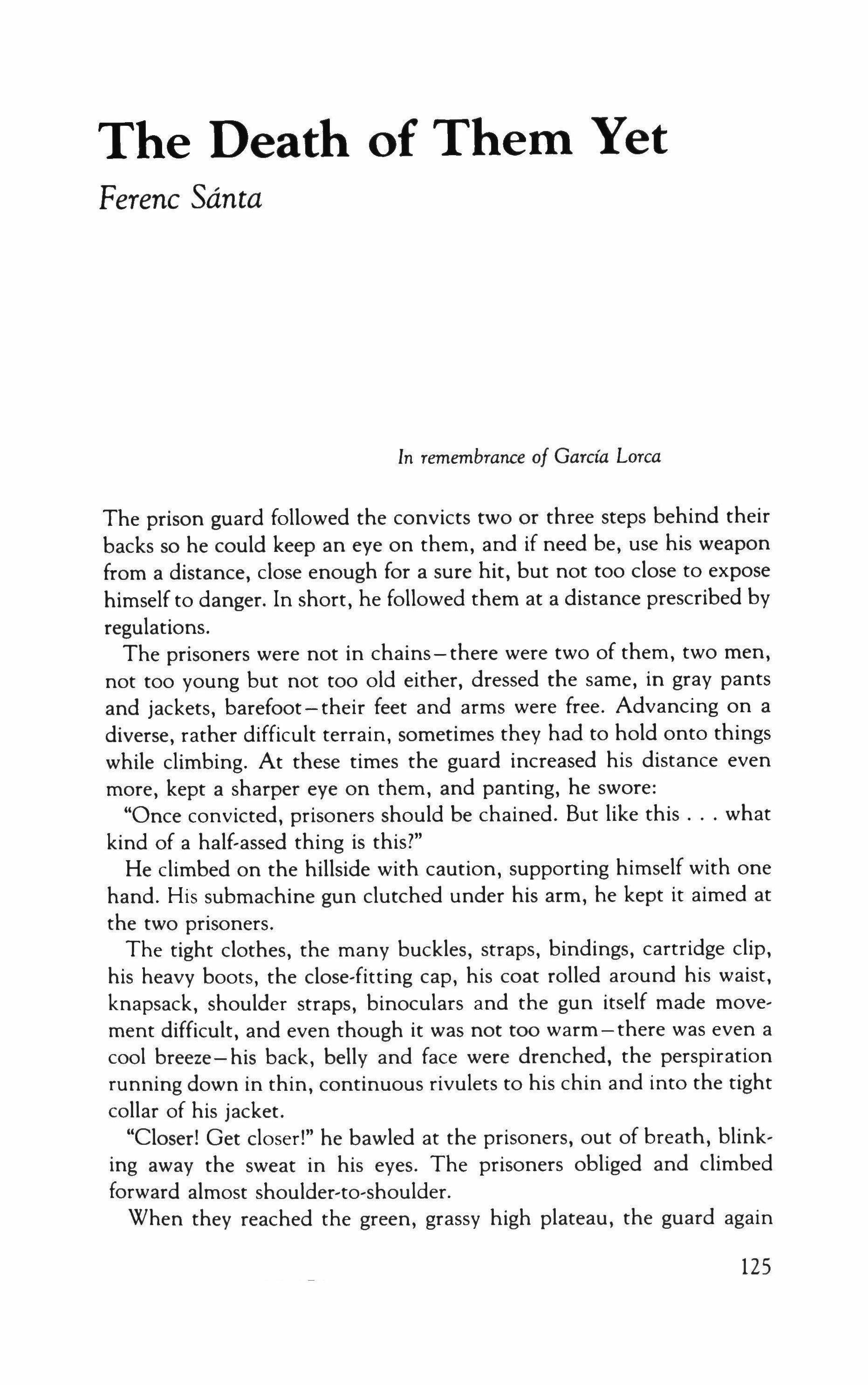
In remembrance of Garcia Lorca
The prison guard followed the convicts two or three steps behind their backs so he could keep an eye on them, and if need be, use his weapon from a distance, close enough for a sure hit, but not too close to expose himself to danger. In short, he followed them at a distance prescribed by regulations.
The prisoners were not in chains-there were two of them, two men, not too young but not too old either, dressed the same, in gray pants and jackets, barefoot-their feet and arms were free. Advancing on a diverse, rather difficult terrain, sometimes they had to hold onto things while climbing. At these times the guard increased his distance even more, kept a sharper eye on them, and panting, he swore:
"Once convicted, prisoners should be chained. But like this what kind of a half-assed thing is this?"
He climbed on the hillside with caution, supporting himself with one hand. His submachine gun clutched under his arm, he kept it aimed at the two prisoners.
The tight clothes, the many buckles, straps, bindings, cartridge clip, his heavy boots, the close-fitting cap, his coat rolled around his waist, knapsack, shoulder straps, binoculars and the gun itself made movement difficult, and even though it was not too warm-there was even a cool breeze-his back, belly and face were drenched, the perspiration running down in thin, continuous rivulets to his chin and into the tight collar of his jacket.
"Closer! Get closer!" he bawled at the prisoners, out of breath, blinking away the sweat in his eyes. The prisoners obliged and climbed forward almost shoulder-to-shoulder.
When they reached the green, grassy high plateau, the guard again
125
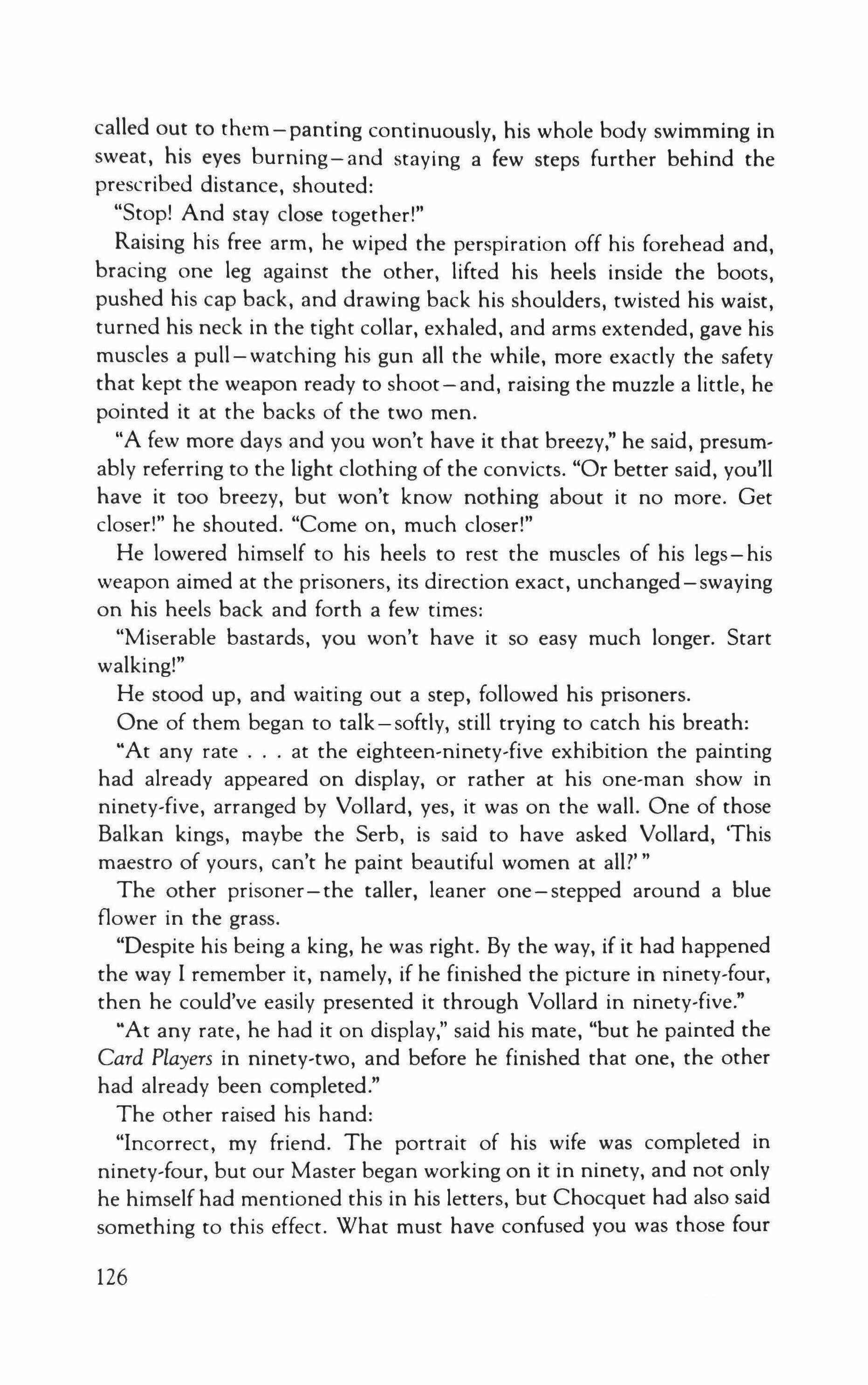
called out to them-panting continuously, his whole body swimming in sweat, his eyes burning- and staying a few steps further behind the prescribed distance, shouted:
"Stop! And stay close together!"
Raising his free arm, he wiped the perspiration off his forehead and, bracing one leg against the other, lifted his heels inside the boots, pushed his cap back, and drawing back his shoulders, twisted his waist, turned his neck in the tight collar, exhaled, and arms extended, gave his muscles a pull-watching his gun all the while, more exactly the safety that kept the weapon ready to shoot-and, raising the muzzle a little, he pointed it at the backs of the two men.
"A few more days and you won't have it that breezy," he said, presumably referring to the light clothing of the convicts. "Or better said, you'll have it too breezy, but won't know nothing about it no more. Get closer!" he shouted. "Come on, much closer!"
He lowered himself to his heels to rest the muscles of his legs- his weapon aimed at the prisoners, its direction exact, unchanged-swaying on his heels back and forth a few times:
"Miserable bastards, you won't have it so easy much longer. Start walking!"
He stood up, and waiting out a step, followed his prisoners.
One of them began to talk-softly, still trying to catch his breath:
"At any rate at the eighteen-ninety-five exhibition the painting had already appeared on display, or rather at his one-man show in ninety-five, arranged by Vollard, yes, it was on the wall. One of those Balkan kings, maybe the Serb, is said to have asked Vollard, 'This maestro of yours, can't he paint beautiful women at all?'"
The other prisoner-the taller, leaner one-stepped around a blue flower in the grass.
"Despite his being a king, he was right. By the way, if it had happened the way I remember it, namely, if he finished the picture in ninety-four, then he could've easily presented it through Vollard in ninety-five."
"At any rate, he had it on display," said his mate, "but he painted the Card Players in ninety-two, and before he finished that one, the other had already been completed."
The other raised his hand:
"Incorrect, my friend. The portrait of his wife was completed in ninety-four, but our Master began working on it in ninety, and not only he himself had mentioned this in his letters, but Chocquet had also said something to this effect. What must have confused you was those four
126

years between the conception of the theme and its execution in ninetyfour."
"Possible, quite possible are you sure of this?"
"Perfectly sure."
The other knitted his brows for a moment.
"I was mistaken, then. Thanks. Well, going back to that certain bucket of Cezanne and his stones, you see, that ugly woman of his who could scare even the Muses away, who used to sit down as if she was about to get up and go after her chores- because, what's the use of all that art if we don't do our work in the kitchen-this ugly woman never forgot to fill that bucket with water and keep it in place (as if by coincidence), never let the stone supply run out around the fence (as if by miracle), so this poor man of hers could keep throwing them, and indeed, after his daily walk the Master never missed a day at the fence, picking his stones and throwing them carefully one by one at the bucket, or rather into it, while counting anxiously, trembling at the thought of how many would hit the water and how many would miss, because, oh, it was important, who knows what his vexed and tormented nerves meant to see, guess or predict with his direct hits and those good citizens of Aix, what did they think while strolling by and watching this strange, silent man, throwing stones into a bucket, his movements heavy, sluggish, his face under his large forehead unsmiling?"
The other burst out laughing:
"Once, when Shelley visited Byron in Ravenna, he described his visit to Peacock like this: 'I found the household of Lord Byron' - he wrote, more or less-'very pleasant, especially (not counting his servants) his eight dogs, three monkeys, five cats, two eagles, one crow and a hawk
Then, he added in his P.S.: 'It seems I haven't listed them all, because I've just met five peacocks on the main staircase, two guinea-fowls and an Egyptian crested heron all of them stroll around freely in the rooms of his Lordship, and he chats with them!'"
The two prisoners laughed in unison. A calm, cheerful mood brightened their faces, they fell silent for a while, the silence broken by a chuckle here and there as they walked on. The sun was covered almost completely by a fine veil of clouds, the sky radiating a soft, opaque light over the landscape. Under their feet the grass glistened with dew, the air was sharp and clear, dressed in blue the mountains stood in silence, the nearby valleys spread out before their eyes in greens, browns and soft yellows.
"Going back to Cezanne," said the taller prisoner, "or rather to his
127

stones and buckets, there isn't much difference between his and JeanJacques's pastimes, either
"Pastime pastime?" the other raised his eyebrows. "My dear God what is, after all, pastime in these things?"
"Well, the things Jean-Jacques pursued at the place of Madame de Warens-"
"- at the place of that pious lady with her snow-white, chaste soul of a god's lamb, who never thought in any other terms but in God's, her eyes always downcast -
"as her charming letters attest, don't they? Out there, in that little valley where she had her summer cottage, or house, a rented property it was, I think, you know the period I'm referring to, well, on his morning walks Jean-Jacques used to gather stones for target-practice on branches and tree trunks. If I remember correctly, he mentions this in his Promenade, and Diderot was told by Rousseau himself that whenever he couldn't fill his quota of hits within a given time and certain number of stones, he simply went a step closer to the target after each throwsaying that the most important thing was not to miss-and so it often happened that with the last stone cast at the tree only a step away, JeanJacques had finally achieved his victory. And then, as if he'd done his best, felt satisfied for the day - after all, he had more hits than not."
"And there was no one to tell him: 'Master, throw a whole rock to that tree trunk, and you're done with it for an entire week!'"
The smaller prisoner laughed, joined by a low chuckle from the other. But at the next instant the laughing man stumbled forward, flung his arms to regain his balance, and after a few awkward steps fell to the ground, his arms spread out on the grass.
Behind the prisoners the guard raised his leg again and with the sole of his boot gave a kick to the other prisoner as well. He too, stumbled, and fell. They struggled to their feet at the same time. The barrel of the gun was aimed at their chests, the opaque light glittered on the steel.
"Keep your mouth shut," said the guard. "Come on, line up! And if you start guffawing again, I'm going to flatten your stinking faces. Then you won't be walking around no more like on a promenade!"
The guard stretched his neck in the tight collar, raised his free arm, wiped his nose on the heavy cloth of his jacket and spat on the ground:
"Line up and off with you!"
The prisoners lined up side by side. The smaller one straightened his jacket, and, touching his nose, began to sniffle.
"Did you hurt yourself badly?" asked the other.
"No I don't think so. The fright was worse than the fall." He
128
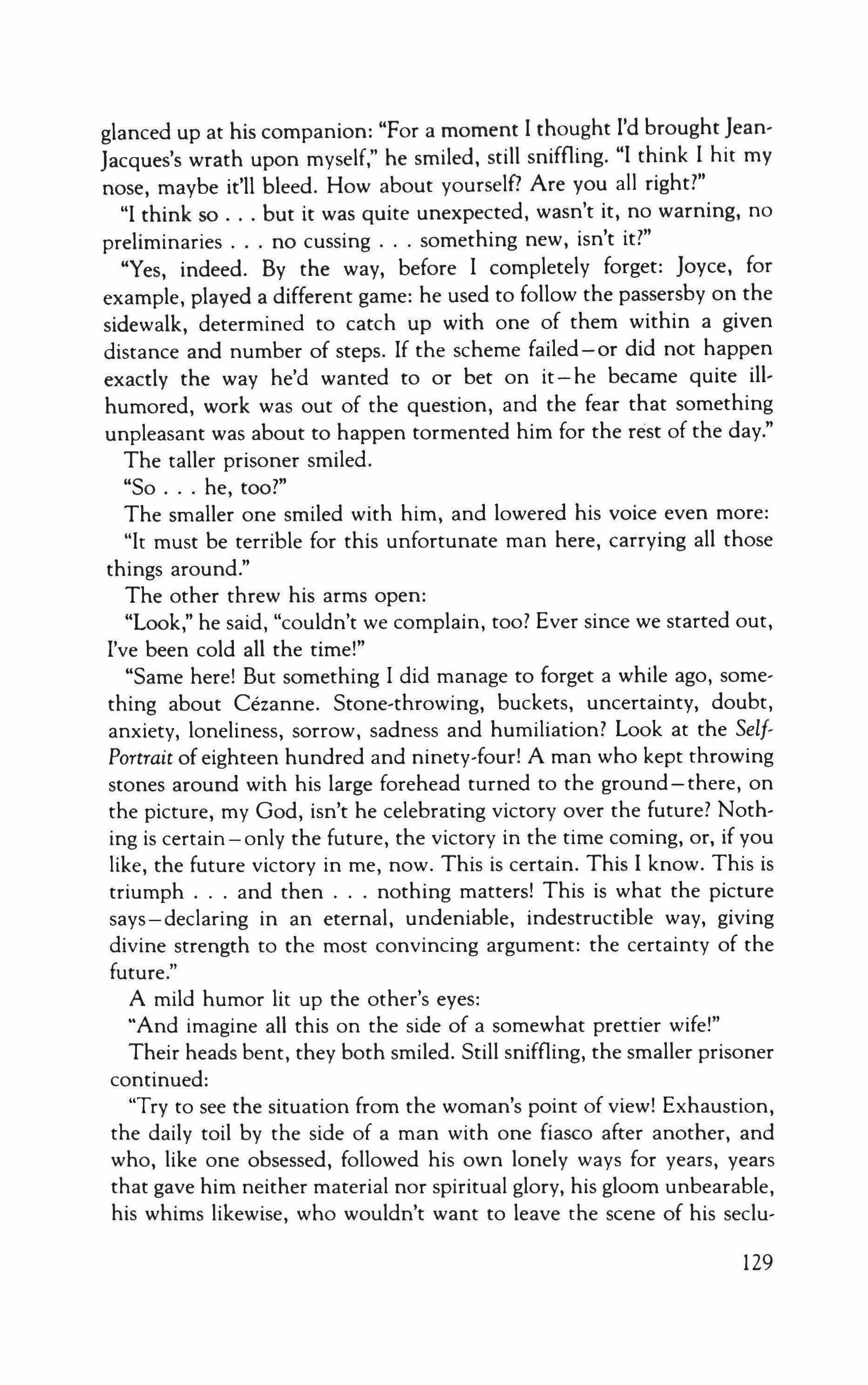
glanced up at his companion: "For a moment I thought I'd brought JeanJacques's wrath upon myself," he smiled, still sniffling. "I think I hit my nose, maybe it'll bleed. How about yourself? Are you all right?"
"I think so but it was quite unexpected, wasn't it, no warning, no preliminaries no cussing something new, isn't it?"
"Yes, indeed. By the way, before I completely forget: Joyce, for example, played a different game: he used to follow the passersby on the sidewalk, determined to catch up with one of them within a given distance and number of steps. If the scheme failed-or did not happen exactly the way he'd wanted to or bet on it-he became quite iIIhumored, work was out of the question, and the fear that something unpleasant was about to happen tormented him for the rest of the day."
The taller prisoner smiled.
"So he, too?"
The smaller one smiled with him, and lowered his voice even more:
"It must be terrible for this unfortunate man here, carrying all those things around."
The other threw his arms open:
"Look," he said, "couldn't we complain, too? Ever since we started out, I've been cold all the time!"
"Same here! But something I did manage to forget a while ago, something about Cezanne. Stone-throwing, buckets, uncertainty, doubt, anxiety, loneliness, sorrow, sadness and humiliation? Look at the SelfPortrait of eighteen hundred and ninety-four! A man who kept throwing stones around with his large forehead turned to the ground-there, on the picture, my God, isn't he celebrating victory over the future? Nothing is certain-only the future, the victory in the time coming, or, if you like, the future victory in me, now. This is certain. This I know. This is triumph and then nothing matters! This is what the picture says-declaring in an eternal, undeniable, indestructible way, giving divine strength to the most convincing argument: the certainty of the future."
A mild humor lit up the other's eyes:
"And imagine all this on the side of a somewhat prettier wife!"
Their heads bent, they both smiled. Still sniffling, the smaller prisoner continued:
"Try to see the situation from the woman's point of view! Exhaustion, the daily toil by the side of a man with one fiasco after another, and who, like one obsessed, followed his own lonely ways for years, years that gave him neither material nor spiritual glory, his gloom unbearable, his whims likewise, who wouldn't want to leave the scene of his seclu-
129

sion, wouldn't hear of Paris - and the woman who thought of nothing but Paris, who couldn't stand the monotony of the country, whose plans, dreams, longings were all burned up in the fiery passion of one man 1 don't want to repeat this, but ask yourself: do only the great deserve the laurels?"
"The question is justified. Especially where these greats are concerned: Galilei,* Newton, Adam Smith, Hobbes, Descartes, Locke, Spinoza, Kant, Leibniz, Hume, Gibbon, Macaulay, Leonardo da Vinci, Raphael, Michelangelo, Handel, Beethoven, Mendelssohn-all of them, as you know, were bachelors, therefore they never had to share their laurels with wives of any sort! Aside from these, you're right in all the other cases."
Glancing at his companion, the other smiled.
"For my part, 1 am satisfied with all the other cases."
The guard spoke up behind their backs:
"Stop the hocus-pocus and talk sense. Pretty soon you won't be talking at ali."
The prisoners fell silent. They walked side by side without uttering a word. After a while the taller one picked up the conversation again:
"Observe this tree ahead of us, to the left! This lonely, spreading tree "
"Yes," said the other. "A beech? Or an oak?"
"Oak. 1 don't know if you're familiar with the kind, it is known to have the highest specific gravity. The specific gravity of trees is calculated by the weight proportion in cubic decimeter; I'm not sure, but as far as 1 can recall, the cocoa-tree is the weightiest, or perhaps the ebony
"And the mahogany?"
"I was surprised to learn that it is much lower on the scale. But the oak precedes it, the one here before us, and even the hornbeam tree comes before the mahogany. By the way, isn't it surprising how trees can dry out to the highest degree?"
"This is common knowledge, isn't it?"
"It is. But what 1 mean is, at the time of the cutting of the tree-or felling, as the loggers call it - the water content is fifty percent, and in the dry condition it is only six."
"I think trees must contain very little organic matter 1 draw my conclusion from the fact that after burning there's very little ashes left."
Squinting at the oak tree, the taller prisoner sighed, smiling:
*Galileo Galilei. In Hungary the astronomer's last name is used.
130
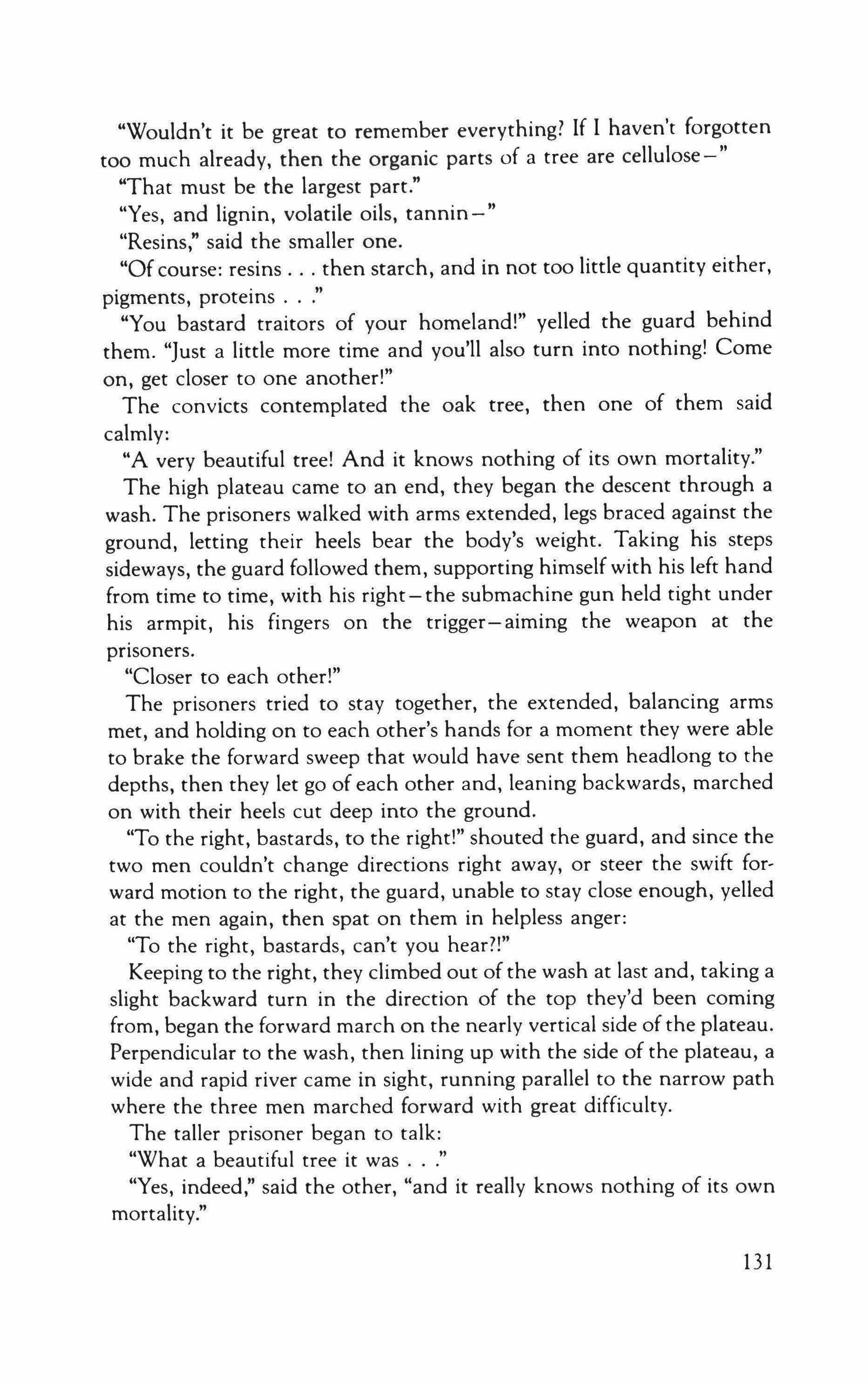
"Wouldn't it be great to remember everything? If I haven't forgotten too much already, then the organic parts of a tree are cellulose -"
"That must be the largest part."
"Yes, and lignin, volatile oils, tannin -"
"Resins," said the smaller one.
"Of course: resins then starch, and in not too little quantity either, pigments, proteins
"You bastard traitors of your homeland!" yelled the guard behind them. "Just a little more time and you'll also turn into nothing! Corne on, get closer to one another!"
The convicts contemplated the oak tree, then one of them said calmly:
A very beautiful tree! And it knows nothing of its own mortality."
The high plateau carne to an end, they began the descent through a wash. The prisoners walked with arms extended, legs braced against the ground, letting their heels bear the body's weight. Taking his steps sideways, the guard followed them, supporting himself with his left hand from time to time, with his right-the submachine gun held tight under his armpit, his fingers on the trigger- aiming the weapon at the prisoners.
"Closer to each other!"
The prisoners tried to stay together, the extended, balancing arms met, and holding on to each other's hands for a moment they were able to brake the forward sweep that would have sent them headlong to the depths, then they let go of each other and, leaning backwards, marched on with their heels cut deep into the ground.
"To the right, bastards, to the right!" shouted the guard, and since the two men couldn't change directions right away, or steer the swift forward motion to the right, the guard, unable to stay close enough, yelled at the men again, then spat on them in helpless anger:
"To the right, bastards, can't you hear?!"
Keeping to the right, they climbed out of the wash at last and, taking a slight backward turn in the direction of the top they'd been corning from, began the forward march on the nearly vertical side of the plateau. Perpendicular to the wash, then lining up with the side of the plateau, a wide and rapid river carne in sight, running parallel to the narrow path where the three men marched forward with great difficulty.
The taller prisoner began to talk:
"What a beautiful tree it was
"Yes, indeed," said the other, "and it really knows nothing of its own mortality."
131
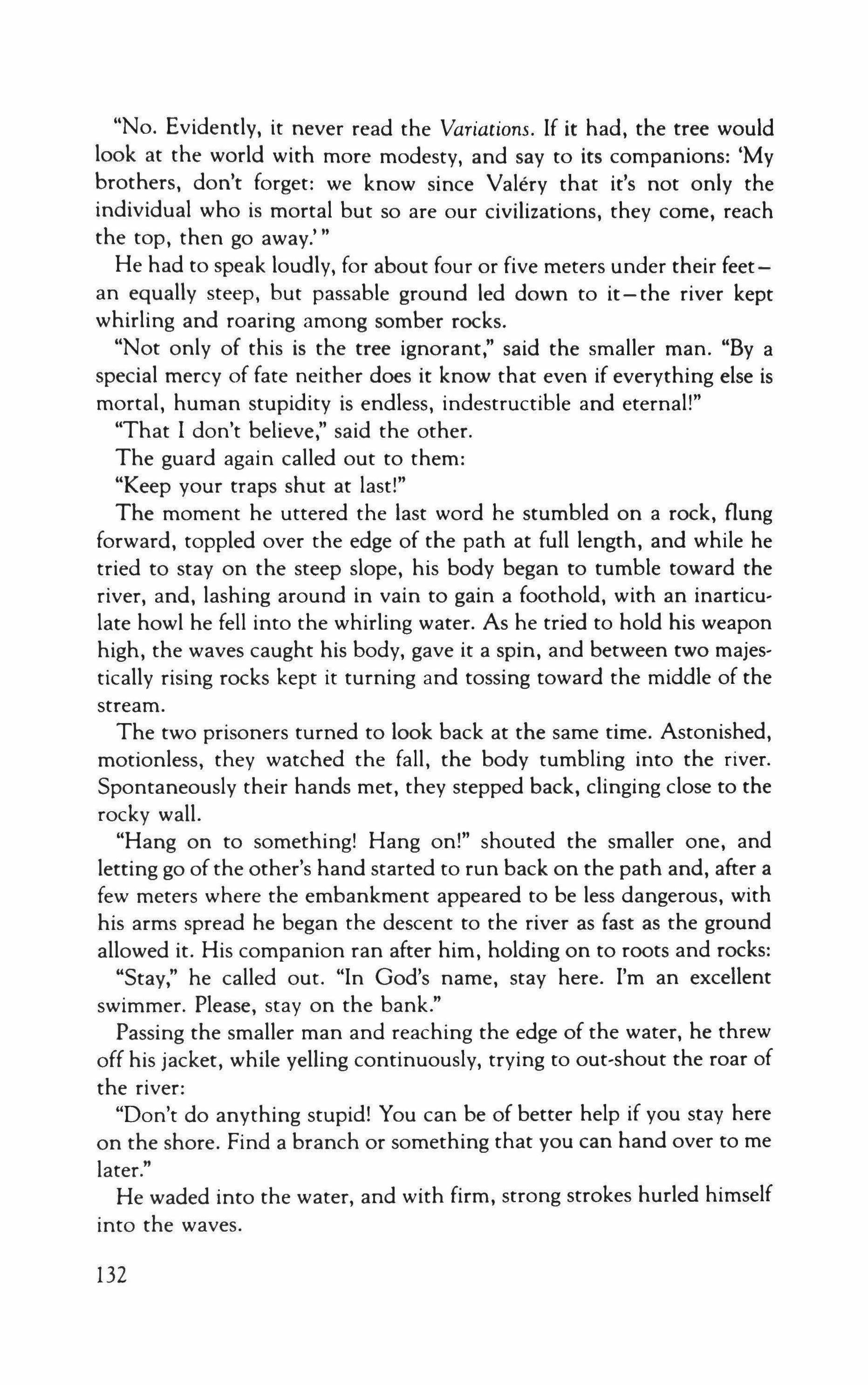
"No. Evidently, it never read the Variations. If it had, the tree would look at the world with more modesty, and say to its companions: 'My brothers, don't forget: we know since Valery that it's not only the individual who is mortal but so are our civilizations, they come, reach the top, then go away.'"
He had to speak loudly, for about four or five meters under their feetan equally steep, but passable ground led down to it-the river kept whirling and roaring among somber rocks.
"Not only of this is the tree ignorant," said the smaller man. "By a special mercy of fate neither does it know that even if everything else is mortal, human stupidity is endless, indestructible and eternal!"
"That I don't believe," said the other.
The guard again called out to them:
"Keep your traps shut at last!"
The moment he uttered the last word he stumbled on a rock, flung forward, toppled over the edge of the path at full length, and while he tried to stay on the steep slope, his body began to tumble toward the river, and, lashing around in vain to gain a foothold, with an inarticulate howl he fell into the whirling water. As he tried to hold his weapon high, the waves caught his body, gave it a spin, and between two majestically rising rocks kept it turning and tossing toward the middle of the stream.
The two prisoners turned to look back at the same time. Astonished, motionless, they watched the fall, the body tumbling into the river. Spontaneously their hands met, they stepped back, clinging close to the rocky wall.
"Hang on to something! Hang on!" shouted the smaller one, and letting go of the other's hand started to run back on the path and, after a few meters where the embankment appeared to be less dangerous, with his arms spread he began the descent to the river as fast as the ground allowed it. His companion ran after him, holding on to roots and rocks:
"Stay," he called out. "In God's name, stay here. I'm an excellent swimmer. Please, stay on the bank."
Passing the smaller man and reaching the edge of the water, he threw off his jacket, while yelling continuously, trying to out-shout the roar of the river:
"Don't do anything stupid! You can be of better help if you stay here on the shore. Find a branch or something that you can hand over to me later."
He waded into the water, and with firm, strong strokes hurled himself into the waves.
132
Stuck between the two stately rocks the guard was still struggling in the water, the beating waves tossing him back and forth between the middle of the stream and the embankment. His clothes and boots, apparently soaked, were pulling him down, drawing him toward the bottom; despite all the lashing around he was helpless and, besides, he was still holding on to his gun, trying to keep it above his head. His howls did not cease, whenever his face became visible for a moment or two his eyes were seen dilated from terror, his mouth wide open, gaping for air.
"To your right! To your right!" shouted the smaller prisoner from the bank the moment he caught a glimpse of his companion, the head raised above the water in an attempt to locate the drowning man.
"To the right, more to the right!"
He ran up and down along the riverbank, his chest heaving, then he took off his light cotton jacket and climbing down to the edge of the water, kept shouting:
"To the right, more to the right! Let go of yourself on the water! The current will take you there. It'll take you exactly there!"
His voice got lost in the rumble of the water. Wrestling with the waves, his companion drew closer and closer to the drowning guard and, reaching him at last, knocked off his cap and grabbed his hair. He braced himself against the rock and, treading water, held the rattling mouth high above the waves, the closed eyes, the tormented human head.
Out of breath, laboring with difficulty, they lifted the man by his arms and legs - the submachine gun still in his hand - and carried him up to the path. They laid him down on a flat rock, and with quick fingers the smaller prisoner unbuttoned the guard's jacket and shirt all the way, until his wide chest lay bare. Then he looked up at his mate:
"How are you?"
He reached up from his kneeling position and took the hand of his companion:
"Lie down you, too, must lie down!"
The taller prisoner leaned against the rocky wall, his chest rose and fell almost to the point of bursting. Then he eased himself to his knees along the wall and, leaning back carefully, lay down on the ground:
"It's all right he said, breathing laboriously. "Try to help him."
The other stepped over to his fellow prisoner and lowered himself to his knees:
"How do you feel?"
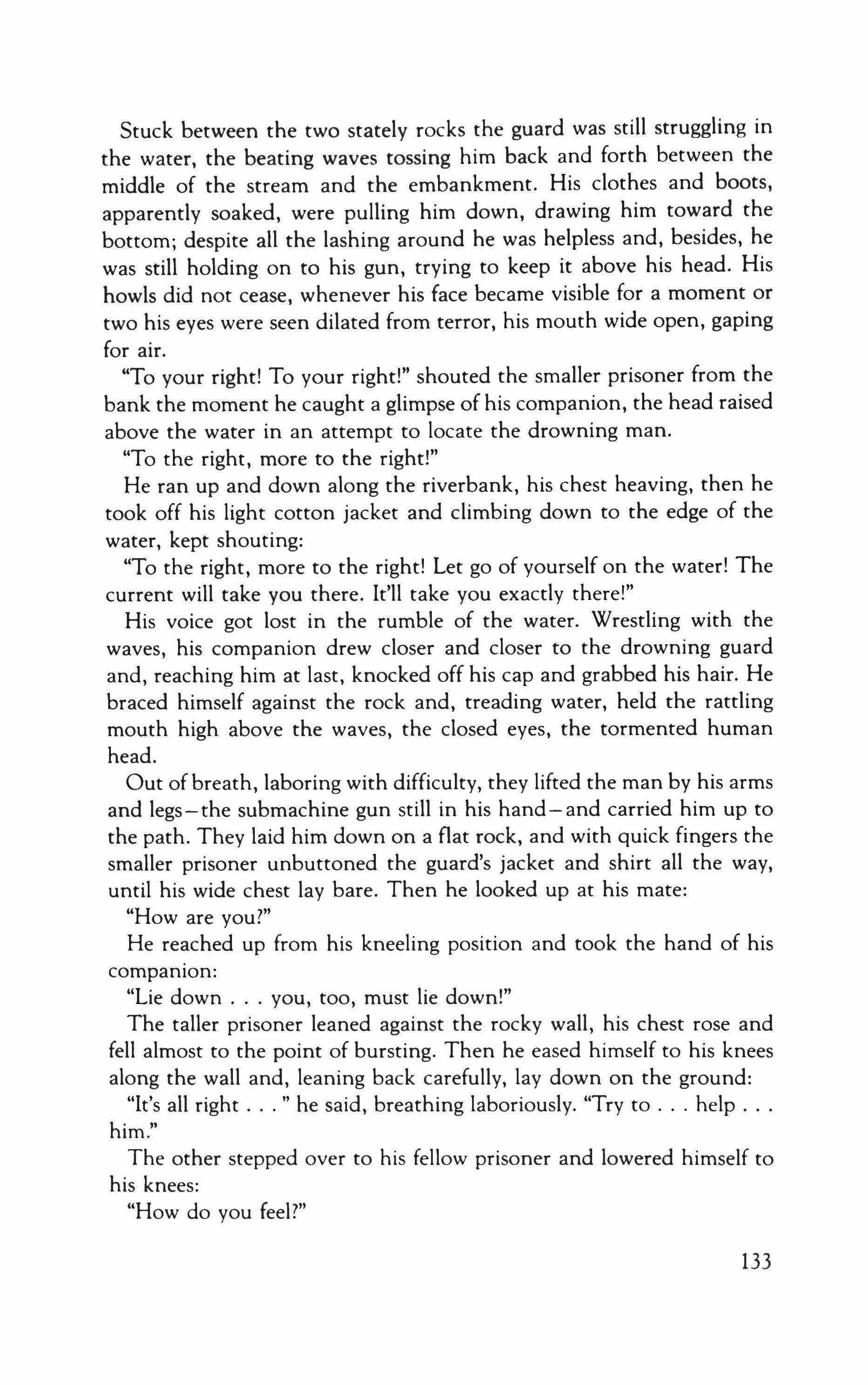
133

"Not bad but very tired. I must rest a little. Go and try to give him artificial respiration
"Yes," said the other.
Without getting up he approached the motionless body, raised the two arms and began to move them up and down, repeatedly, rhythmically. The guard's chest rose and a wide jet of water gushed from his mouth.
The taller prisoner called out to the other:
"Lift him, lift him up by his legs!" He struggled to his feet and approached the two men, his chest still heaving.
"Help me to grab his legs but take the gun from his hand first."
The other pried the guard's fingers off the gun.
"He's still holding onto it fast," he said.
"Like that, yes wrench his fingers off of it."
The smaller prisoner took the gun into his hands:
"It is much lighter than I thought." Holding the weapon at a distance he took a look at it, then put it down further away on the ground.
"Let's lift him!" said the other.
They lifted the guard. Held by his ankles, the head low, his mouth began to retch up water. When they laid him back down, his head began to stir, his eyes opened with effort for a moment.
"Now," said the taller man, "now try artificial respiration again."
Struggling to speak, the mouth of the guard opened, the eyes became visible, the eyeballs turned this way and that, the chest, even though irregularly, began to sink and rise.
"Feeling better?" asked the taller prisoner.
The guard looked at him and raised himself to one side. He spat, then vomited. His respiration became more regular, the cloudy, swollen, red eyes began to dart from one prisoner to the other. His face seemed to be overtaken by terror, and sitting up with alarm, he glanced to his right, to his left.
"Give him his gun!" called the taller prisoner to his companion.
The smaller one lifted the gun from the ground and, giving it another pensive look, put the weapon into the guard's hand.
"Doing better?" he asked him.
The guard got up and, swaying a little, leaned against the rocky wall, bent his head and, taking deep breaths, drew air. Then, all of a sudden, he raised his head and fixed his startled, bewildered eyes on the two prisoners. His mouth fell open, he blinked from one to another with a strange, alarmed look of surprise on his face, the expression mixed with a kind of deep, animal-like fright.
Pressing himself to the rocky wall he slowly raised the muzzle of the
134
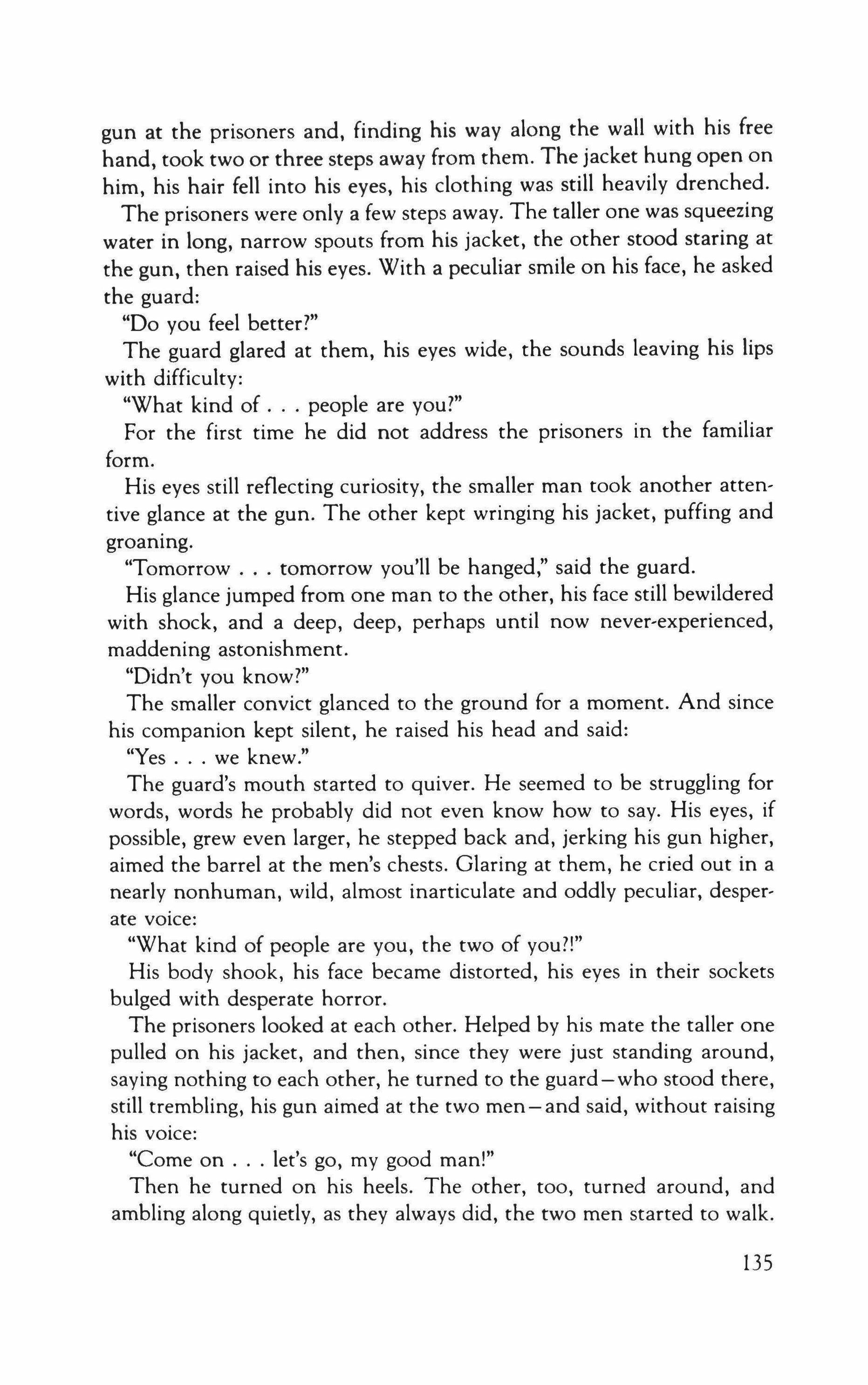
gun at the prisoners and, finding his way along the wall with his free hand, took two or three steps away from them. The jacket hung open on him, his hair fell into his eyes, his clothing was still heavily drenched.
The prisoners were only a few steps away. The taller one was squeezing water in long, narrow spouts from his jacket, the other stood staring at the gun, then raised his eyes. With a peculiar smile on his face, he asked the guard:
"Do you feel better?"
The guard glared at them, his eyes wide, the sounds leaving his lips with difficulty:
"What kind of people are you?"
For the first time he did not address the prisoners in the familiar form.
His eyes still reflecting curiosity, the smaller man took another attentive glance at the gun. The other kept wringing his jacket, puffing and groaning.
"Tomorrow tomorrow you'll be hanged," said the guard.
His glance jumped from one man to the other, his face still bewildered with shock, and a deep, deep, perhaps until now never-experienced, maddening astonishment.
"Didn't you know?"
The smaller convict glanced to the ground for a moment. And since his companion kept silent, he raised his head and said:
"Yes we knew."
The guard's mouth started to quiver. He seemed to be struggling for words, words he probably did not even know how to say. His eyes, if possible, grew even larger, he stepped back and, jerking his gun higher, aimed the barrel at the men's chests. Glaring at them, he cried out in a nearly nonhuman, wild, almost inarticulate and oddly peculiar, desperate voice:
"What kind of people are you, the two of you?!"
His body shook, his face became distorted, his eyes in their sockets bulged with desperate horror.
The prisoners looked at each other. Helped by his mate the taller one pulled on his jacket, and then, since they were just standing around, saying nothing to each other, he turned to the guard-who stood there, still trembling, his gun aimed at the two men - and said, without raising his voice:
"Come on let's go, my good man!"
Then he turned on his heels. The other, too, turned around, and ambling along quietly, as they always did, the two men started to walk.
135
After a few steps they stopped and, looking back, waited for the guard to catch up.
The smaller prisoner began to talk:
"He's quite confused, completely disheartened, the poor devil."
Glancing over his shoulder, the other smiled. The smaller prisoner resumed his walk, and quickening his steps, went on:
"He fell into a considerably neurotic state. No wonder; according to Freud, if I recall it correctly, the starting point of a neurosis is uncertainty, and the threatening sense of inferiority."
They laughed, then the taller one, still squeezing the water from his jacket, said to the other:
"In reference to Lord Byron, or rather to his animals, Walter Scott, for example, kept about thirty or forty dogs, and in the company of his favorite valet called Thomas Purdie, who was an expert on animals, went roaming about with ten or twenty of his dogs for days. Carlyle claimed his best friend was his horse, but so were his innumerable other horses, or remember the enormous quantity of cats Goya had and, writing about the countryside excursions of Lucilius and Scipio, Cicero tells us how they used to romp with their dogs and monkeys along the shores and gardens of Caitea, * and even if the old man doesn't mention it, he'd lived and played the same way and, when Bentham knighted one of his cats, he ordered his servants to treat the cat with the very respect the title called for."
The smaller prisoner burst out laughing-and they walked on.
Translated from the Hungarian by Marta Palos
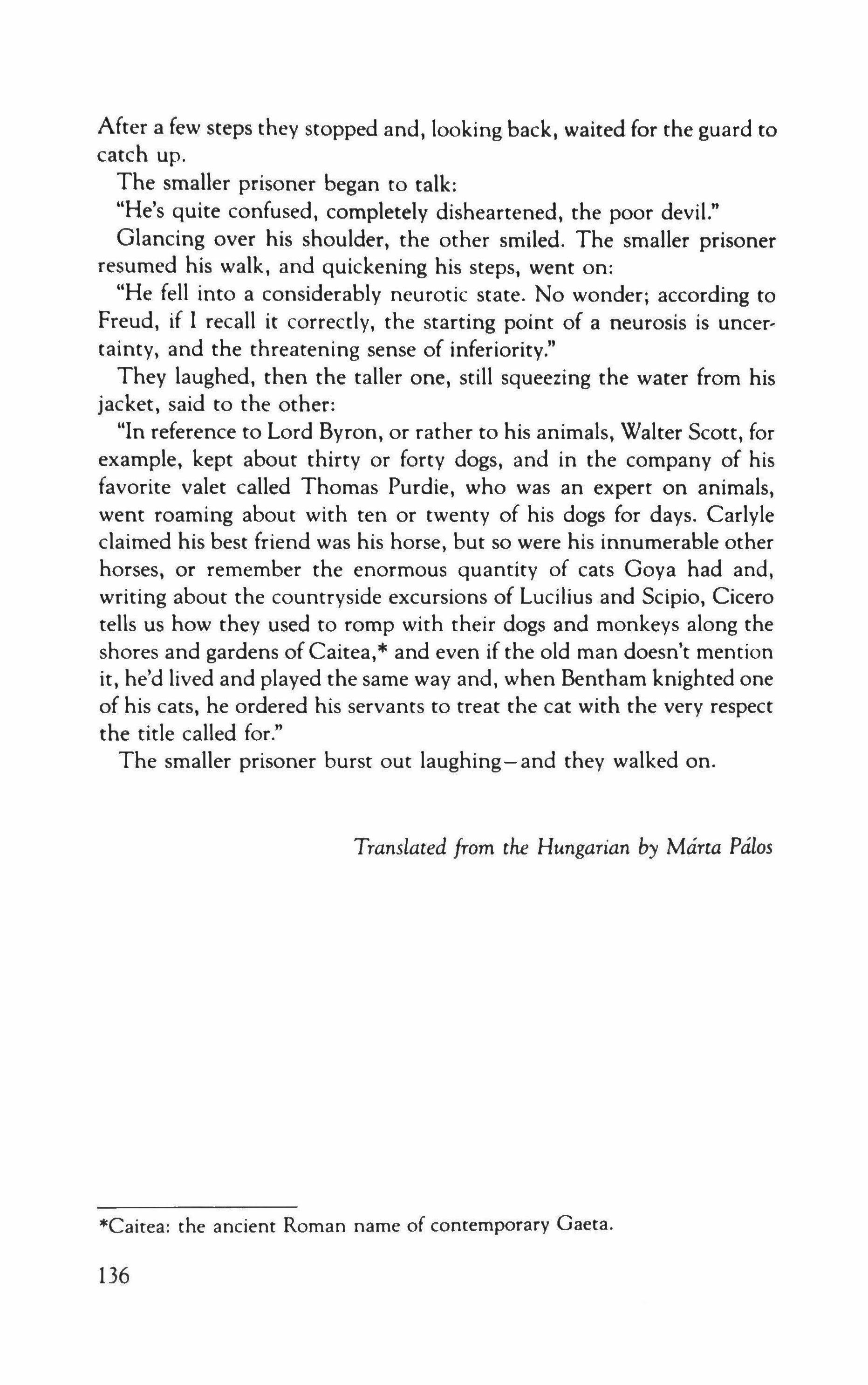
*Caitea: the ancient Roman name of contemporary Gaeta.
136
The Seven Days of Creation
 By Heinz Seelig
By Heinz Seelig

In the beginning God created the heaven and the earth and the evening and the morning were the first day.
'1/rl'r � iu.Mj-

And God said, Let there be a firmament in the midst of the waters, and let it divide the waters from the waters and the evening and the morning were the second day.
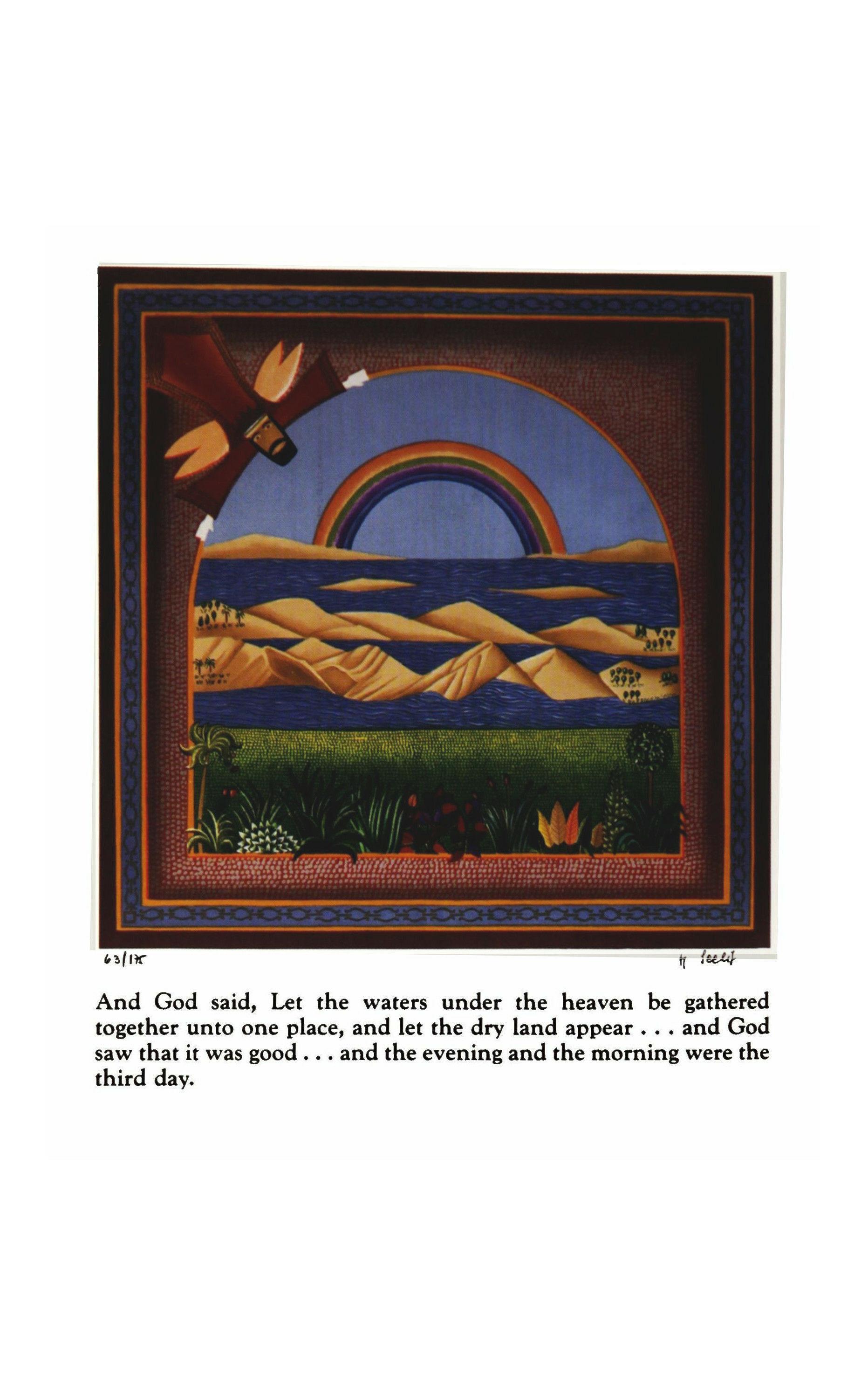
And God said, Let the waters under the heaven be gathered together unto one place, and let the dry land appear •.• and God saw that it was good and the evening and the morning were the third day.

And God said, Let there be lights in the firmament of the heaven to divide the day from the night and the evening and the morning were the fourth day.
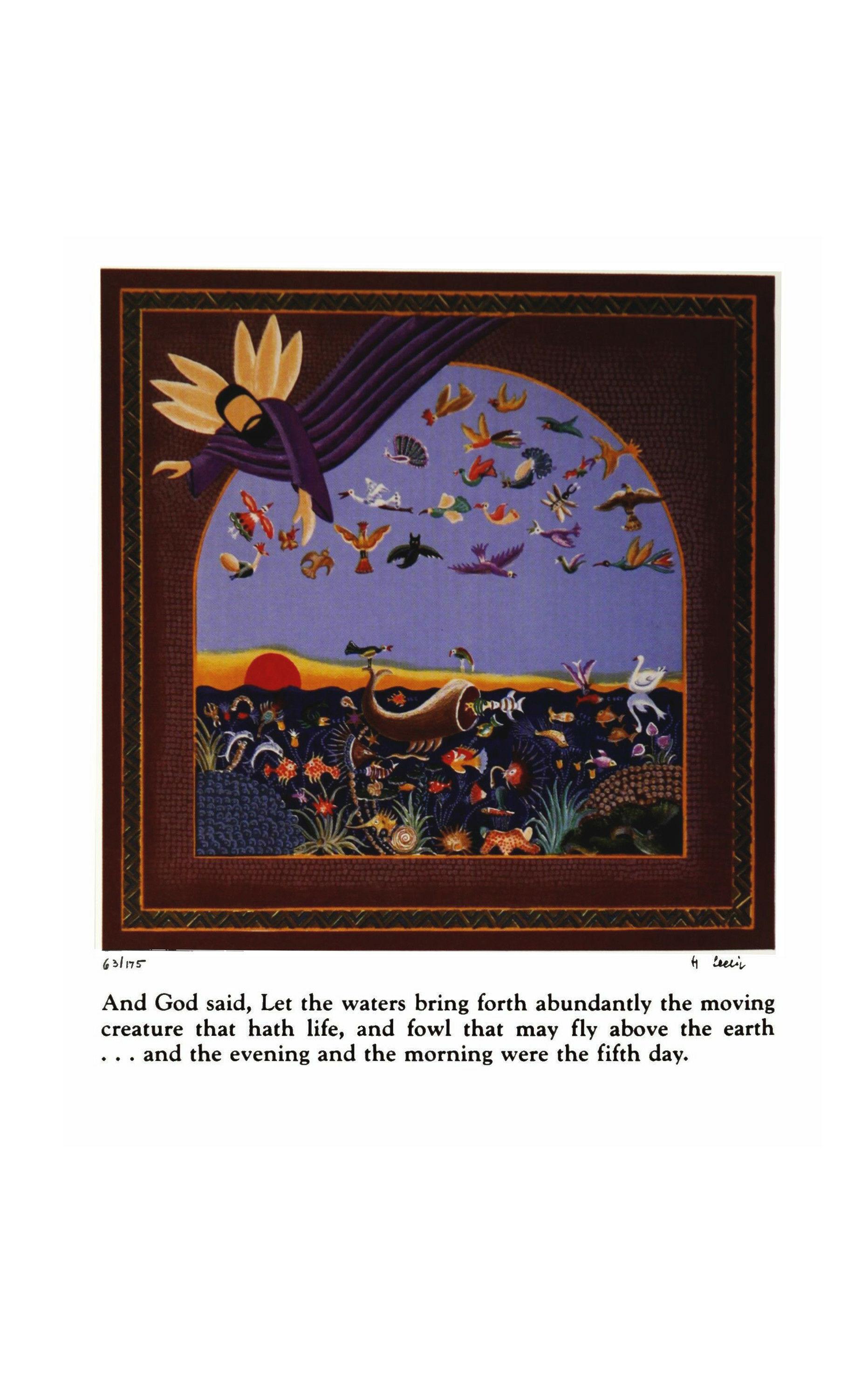
And God said, Let the waters bring forth abundantly the moving creature that hath life, and fowl that may fly above the earth and the evening and the morning were the fifth day.

And God said, Let us make man in our image, after our likeness. So God created man in His own image, in the image of God created He him; male and female created He them and the evening and the morning were the sixth day.

And on the seventh day God ended His work which He had made; and He rested on the seventh day from all His work which He had made.
In the Waiting Room
Jim Powell

In a letter to his Polish translator written thirteen months before he died Rilke found himself commenting on poetry's relations with the things of this world:
Nature, the things of our intercourse and use, are provisionalirv and perishing. But they are, as long as we are here, our possession and our friendship, confidants in our extremity and joy, as already they have been the familiars of our forebears. So it is important not to make this world here out to be evil and put it down: because of their very provisionalness, which they share with us, these appearances, this world of things is supposed to be grasped in an innermost sense and transformed. Transformed? Yes, because it is our task to imprint this provisional, perishing earth in ourselves so deeply, with such passion and endurance that its reality rises again in us "invisibly." We are the bee! of the invisible. We distractedly plunder the honey of the visible in order to gather it into the great golden hive of the Invisible. The earth has no escape other than to become invisible: in us who with a part of our nature partake of invisibility.
Poetry gathers the world's honey into the invisible hive of her imagining, and there discovers an "other" world, a double world, a place that is the same and also different. One sign of this otherness, as poets since Homer have taken pleasure in reminding us, is that song is immortal. Its ghostly voices invisibly survive the bodily perishing of individual men and women to whisper at the inner ears, the spiritual ears of the community they create-a communion that transcends continents and cultures and millennia. But if poetry is immortal, the world she "plunders" in her reflections is "provisional, perishable," and one thing this world shows poetry in the mirror of its transience is her own ghostly stillness. Crossing the threshold of their poetic immortality, the things of this passing
145

world pay for their admission there with an eternity of stillness, yielding up the chance to perish or to change, to fear or to wish, to suffer, hope or grieve.
The glimpses of her own face that poetry catches in her mirror, that is, show her what her immortal stillness lacks and what in time she comes to long for: our very transience, our perishing. Like the world turned left-to-right in her mirror, poetry is herself turned: our bodies, our incarnate selves, are the condition and substance of our mortality. The body of poetry, conversely-words, sheer words, the voice made of air alive in the air, repeatedly renewed-poetry's body is the condition of her immortality. What makes us mortal makes her eternal. Like ours, then, poetry's nature is double-visible and invisible, material and spiritual. And just as we enter upon self-conscious being through the recognition of a carnal finitude, a mortality that is at once ours and not ours but given, so for poetry it is this doubling, this reflection that brings her to self-awareness, to self-sight.
In 1976 Elizabeth Bishop published her last collection of poetry, Geography III. Its first poem depicts this passage into self-sight.
In the Waiting Room
In Worcester, Massachusetts, I went with Aunt Consuelo to keep her dentist's appointment and sat and waited for her in the dentist's waiting room. It was winter. It got dark early. The waiting room was full of grown-up people, arctics and overcoats, lamps and magazines. My aunt was inside what seemed like a long time and while I waited I read the National Geographic (I could read) and carefully studied the photographs: the inside of a volcano, black, and full of ashes; then it was spilling over in rivulets of fire.
Osa and Martin Johnson dressed in riding breeches, laced boots, and pith helmets. A dead man slung on a pole
146

-"Long Pig," the caption said. Babies with pointed heads wound round and round with string; black, naked women with necks wound round and round with wire like the necks of light bulbs. Their breasts were horrifying. I read it right straight through. I was too shy to stop. And then 1 looked at the cover: the yellow margins, the date.
Suddenly, from inside, came an oh! of pain -Aunt Consuelo's voicenot very loud or long.
1 wasn't at all surprised; even then 1 knew she was a foolish, timid woman.
1 might have been embarrassed, but wasn't. What took me completely by surprise was that it was me: my voice, in my mouth. Without thinking at all 1 was my foolish aunt, 1- we - were falling, falling, our eyes glued to the cover of the National Geographic, February, 1918.
1 said to myself: three days and you'll be seven years old. 1 was saying it to stop the sensation of falling off the round, turning world into cold, blue-black space. But 1 felt: you are an I, you are an Elitabeth, you are one of them. Why should you be one, too?
1 scarcely dared to look to see what it was 1 was.
1 gave a sidelong glance -1 couldn't look any higherat shadowy gray knees, trousers and skirts and boots and different pairs of hands
147

lying under the lamps. I knew that nothing stranger had ever happened, that nothing stranger could ever happen. Why should I be my aunt, or me, or anyone? What similaritiesboots, hands, the family voice I felt in my throat, or even the National Geographic and those awful hanging breastsheld us all together or made us all just one? How-l didn't know any word for it - how "unlikely" How had I come to be here, like them, and overhear a cry of pain that could have got loud and worse but hadn't?
The waiting room was bright and too hot. It was sliding beneath a big black wave, another, and another.
Then I was back in it. The War was on. Outside, in Worcester, Massachusetts, were night and slush and cold, and it was still the fifth of February, 1918.
This is a poem about the birth of the soul and it portrays this birth as a doubling. The psyche it represents is dual. It depicts not the first moments of consciousness but the first motions of self-sight, of selfconsciousness. At the crisis of the poem Aunt Consuelo's cry emerges from an inner room and precipitates Elizabeth's birth into personhood by showing her that she is, as Yeats says, "fastened to a dying animal." The National Geographic has filled her imagination with images of human corporeality and physical mortality - "babies with pointed heads" and "those awful hanging breasts," "a dead man slung on a pole" and "The War." Now her aunt's cry evokes "from inside" her an answering cry that reveals to her her own share of human mortality, and reveals it to her first as a voice:
148
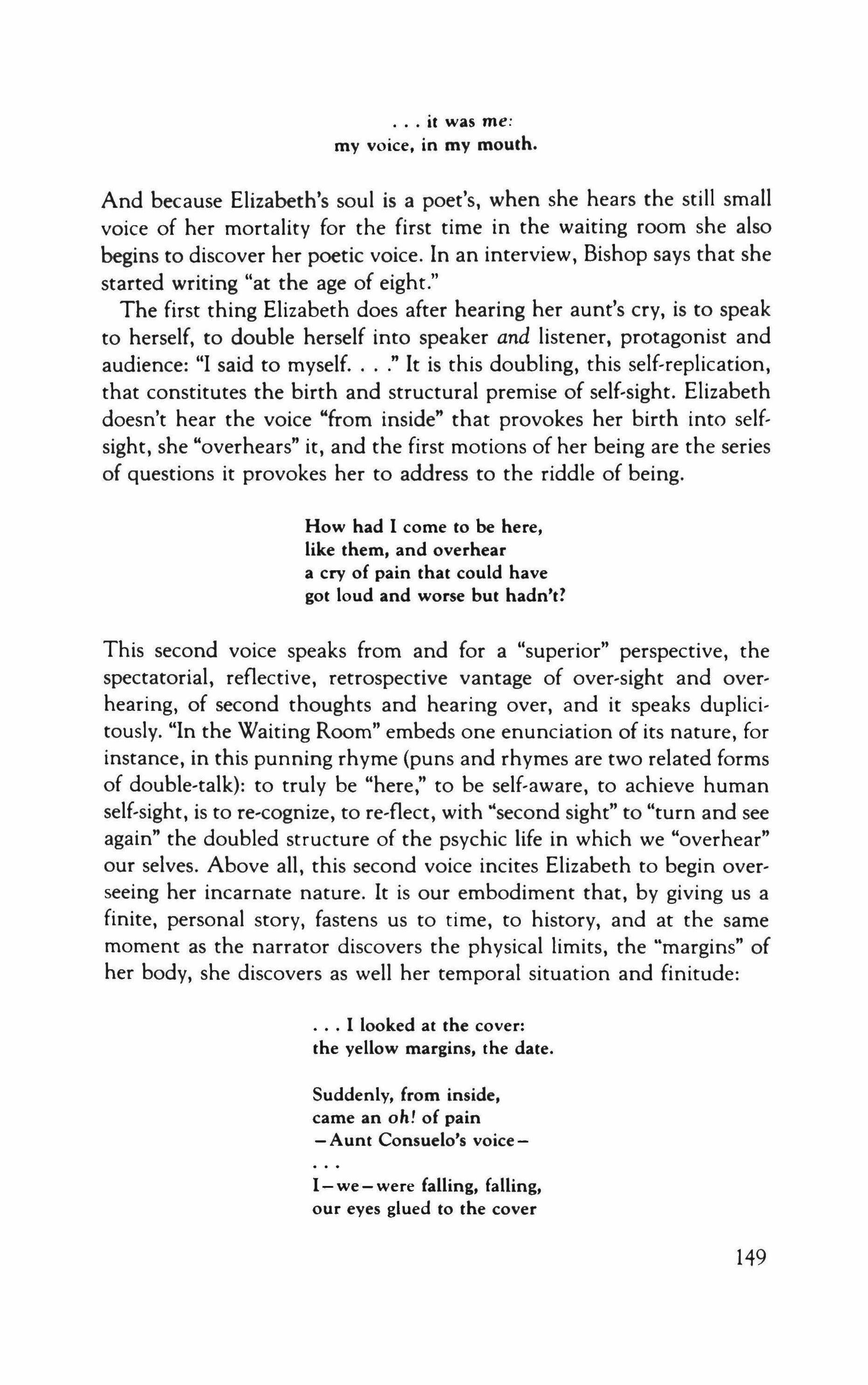
it was me: my voice, in my mouth.
And because Elizabeth's soul is a poet's, when she hears the still small voice of her mortality for the first time in the waiting room she also begins to discover her poetic voice. In an interview, Bishop says that she started writing "at the age of eight."
The first thing Elizabeth does after hearing her aunt's cry, is to speak to herself, to double herself into speaker and listener, protagonist and audience: "I said to myself It is this doubling, this self-replication, that constitutes the birth and structural premise of self-sight. Elizabeth doesn't hear the voice "from inside" that provokes her birth into selfsight, she "overhears" it, and the first motions of her being are the series of questions it provokes her to address to the riddle of being.
How had 1 come to be here, like them, and overhear a cry of pain that could have got loud and worse but hadn't?
This second voice speaks from and for a "superior" perspective, the spectatorial, reflective, retrospective vantage of over-sight and overhearing, of second thoughts and hearing over, and it speaks duplicitously. "In the Waiting Room" embeds one enunciation of its nature, for instance, in this punning rhyme (puns and rhymes are two related forms of double-talk): to truly be "here," to be self-aware, to achieve human self-sight, is to re-cognize, to re-flect, with "second sight" to "turn and see again" the doubled structure of the psychic life in which we "overhear" our selves. Above all, this second voice incites Elizabeth to begin overseeing her incarnate nature. It is our embodiment that, by giving us a finite, personal story, fastens us to time, to history, and at the same moment as the narrator discovers the physical limits, the "margins" of her body, she discovers as well her temporal situation and finitude:
1 looked at the cover: the yellow margins, the date.
Suddenly, from inside, came an oh! of pain
-Aunt Consuela's voice-
1- we - were falling, falling, our eyes glued to the cover
149

of the National Geographic, February, 1918.
1 said to myself: three days and you'll be seven years old.
When Elizabeth is born into self-sight, she is born into a world of doublings. Throughout the poem she finds herself mirrored in her averse identifications with Aunt Consuelo, with the other people in the waiting room and with the representations (themselves reflections) she encounters reading the National Geographic. Elizabeth identifies deeply, unthinkingly, with her aunt's "oh! of pain," but she also experiences a simultaneous sense of personal existential isolation - "you are an Elizabeth, / you are one of them." - and it is into the space beginning to open between these conflicting senses of human solidarity and of personal isolation that her soul is born.
Learning to reflect requires this division, this "superior vantage" of overhearing and oversight, but its opening produces the vertigo the child Elizabeth suffers as she discovers her self in averse identification with the people around her: the discovery of her singularity, of her own private inwardness, involves its converse, a realization of the outward, the other. Suddenly, dizzyingly, she glimpses herself from the outside, as a member of a group-a kind, a genus-and so for the first time catches sight of a self she will one day portray as caught at once in biology's carnal and in language's pronominal meshes:
1 felt: you are an I, you are an EIi�abeth, you are one of them.
Like each of us, Elizabeth is born into a self-sight whose structures are prepared for her in the speech of the linguistic community around her. Seeing herself as a member of this group, as "an Elizabeth," she begins to create an alienated vantage from which to view her self, to over-see herself from the distance of these others. This distance is a projection outward mirroring the reflective distance inward language is opening inside her dividing psyche which allows her (invites her, compels her) to say "I said to myself " But at the same time all her efforts to envision this alienated and alienating vantage also show her her own separateness and isolation and vulnerability: she is also just "one of them": "what made us all just one" also means "what made us each just one."
Significantly, almost all the objects of her identifications (her family,
150

the people who wait with her, most of the pictures in the National Geographic) are adults, and it is a distanced, adult vantage that she is beginning to construct within herself. To put it another way, Elizabeth construes spectatorial distances inside her self because she is beginning to construct the interior stage upon which and the inward gallery to which she will play her self. This process is terrifying and causes her to suffer vertigo partly because it is diminishing and defining: it shows her her self as if from outside, smaller-as it were from a superior vantage, looking down. But Elizabeth is still a child: more looked down on than looking downward, she projects this withering regard outward and conceives herself primarily as the object rather than the subject (" - I couldn't look any higher-") of a gaze which is the more threatening because its source cannot be firmly located (there seems to be no adult in her life to receive and embody this projection benevolently).
Two voices speak throughout this poem. One of them is the Child, Elizabeth, who utters the plain declarative sentences of the opening lines, who employs phrases such as "grown-up people" and charms us with statements like "I read it right straight through. / I was too shy to stop." The other voice, an Adult's, is audible in words like "rivulets," in such double entendres as "margins," in the ironic undertones of the last six lines. It supplies the missing adjective "unlikely" and is heard more openly in such turns of phrase as "even then I knew she was I a foolish, timid woman." "In the Waiting Room" is about the genesis of this second, distanced, retrospective voice, about the formation of the "superior" critical vantage from which we hear it cite in reminiscence its own first words: "I said to myself
This second voice controls the poem's overt narrative, telling the riddle of its own nativity, but it is these two voices together and the duality they embody that governs the form of the whole poem by creating its double structure of overt and implicit meanings - the "deeper" senses our rereadings pursue. This dual vantage functions to make our experience of the poem vividly conflicted, complex, contradictory - and always double: unremittingly divided between our empathy with the child's pathos and our converse identification (as readers, as interpreters) with the adult's understanding, her interpretative distance. In an interview, Bishop speaks of poems as attempts to "dramatize the mind in action," and in fact this dual perspective is not peculiar to "In the Waiting Room." It is a defining characteristic of all poetry-though it is uncommonly active and visible here because "In the Waiting Room" is self-reflexive, taking for its subject the birth of the dual psyche this
151
fundamental poetic structure reflects. The poem is a mirror of the soul and its riddles mirror the riddles of a dual self's life in the world.

"In the Waiting Room" treats an actual incident in Bishop's childhood. In the closing paragraph of "The Country Mouse," a memoir published ten years before the poem, she gives this account of the same event:
After New Year's, Aunt Jenny had to go to the dentist, and asked me to go with her. She left me in the waiting room, and gave me a copy of the National GeogTaphic to look at. It was still getting dark early, and the room had grown very dark. There was a big yellow lamp in one corner, a table with magazines, and an overhead chandelier of sorts. There were others waiting, two men and a plump middle-aged lady, all bundled up. I looked at the magazine cover-l could read most of the words-shiny, glazed, yellow and white. The black letters said: FEBRUARY 1918. A feeling of absolute and utter desolation came over me. I felt ..• myself. In a few days it would be my seventh birthday. I felt I, I, I, and looked at the three strangers in panic. I was one of them too, inside my scabby body and wheezing lungs. "You're in for it now," something said. How had I got tricked into such a false position? I would be like that woman opposite who smiled at me so falsely every once in a while. The awful sensation passed, then it came back again. "You are you," something said. "How strange you are, inside looking out. You are not Beppo, or the chestnut tree, or Emma, you are you and you are going to be you forever." It was like coasting downhill, this thought, only much worse, and it quickly smashed into a tree. Why was I a human being?
We recognize many details from the poem, but though it tells much the same story, the prose account's radically different mode of discourse leads to departures as well. For all of Bishop's command of a modern poetic plain style, for instance, it is difficult to imagine "In the Waiting Room" absorbing such a statement as "A feeling of absolute and utter desolation came over me." On the other hand, the poem's volatile restraint would be deflated by the violence of the memoir's powerful concluding simile. Most notably, in the memoir there is no scream, no "oh! of pain." But like the poem the prose narrative depicts Elizabeth's discovery of her interiority and human singularity ("How strange you are, inside looking out") as simultaneous with her realization of her involvement in a spectatorial community ("I was one of them") and with her dawning knowledge of her self as incarnate: "I was one of them too, inside my scabby body and wheezing lungs." And once more, this realization coincides with the awakening of an other voice: 'You're in for it now,' something said 'You are you,' something said."
* * *
152
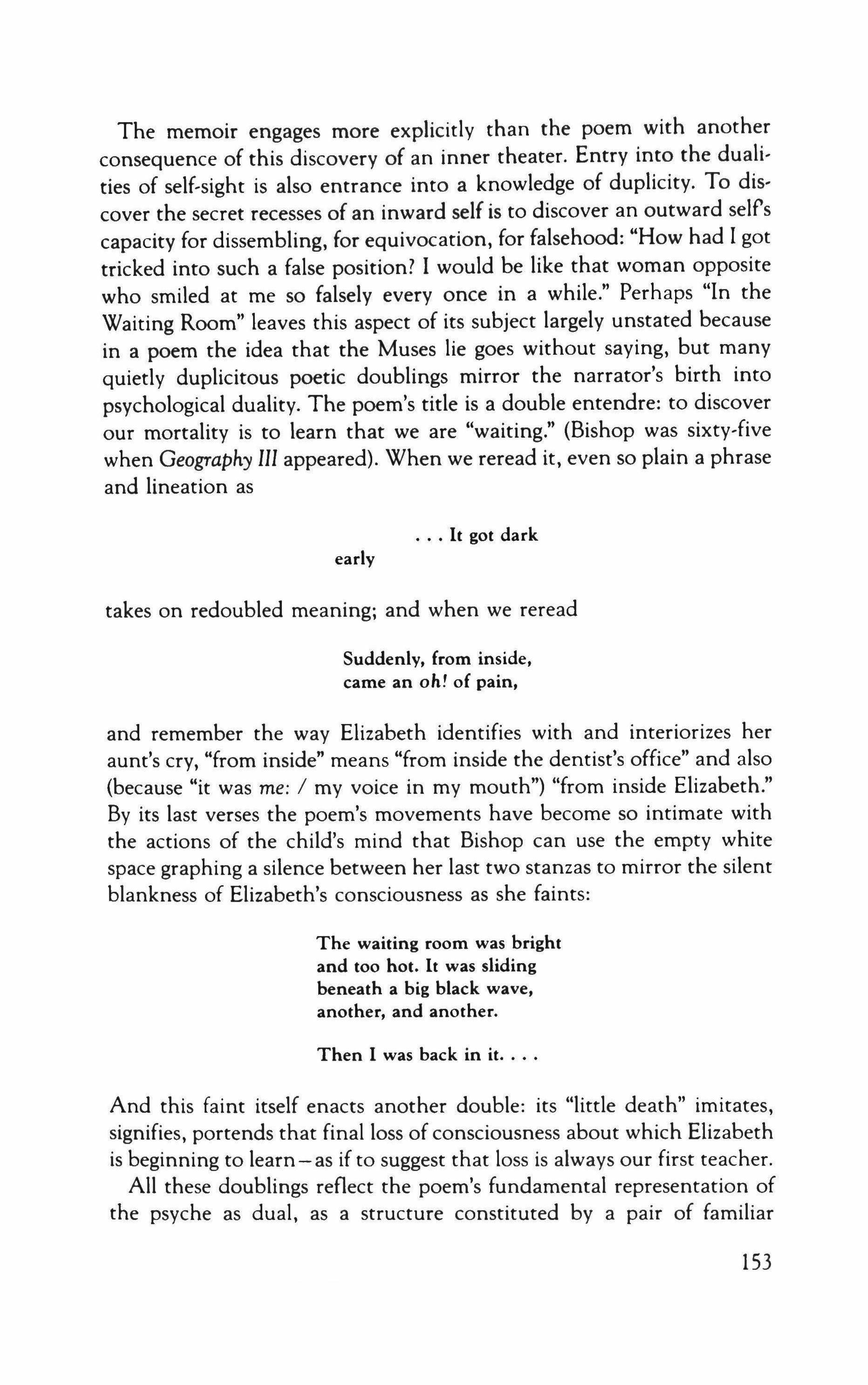
The memoir engages more explicitly than the poem with another consequence of this discovery of an inner theater. Entry into the dualities of self-sight is also entrance into a knowledge of duplicity. To discover the secret recesses of an inward self is to discover an outward self's capacity for dissembling, for equivocation, for falsehood: "How had I got tricked into such a false position? I would be like that woman opposite who smiled at me so falsely every once in a while." Perhaps "In the Waiting Room" leaves this aspect of its subject largely unstated because in a poem the idea that the Muses lie goes without saying, but many quietly duplicitous poetic doublings mirror the narrator's birth into psychological duality. The poem's title is a double entendre: to discover our mortality is to learn that we are "waiting." (Bishop was sixty-five when Geography III appeared). When we reread it, even so plain a phrase and lineation as
It got dark early takes on redoubled meaning; and when we reread
Suddenly, from inside, came an oh! of pain,
and remember the way Elizabeth identifies with and interiorizes her aunt's cry, "from inside" means "from inside the dentist's office" and also (because "it was me: / my voice in my mouth") "from inside Elizabeth." By its last verses the poem's movements have become so intimate with the actions of the child's mind that Bishop can use the empty white space graphing a silence between her last two stanzas to mirror the silent blankness of Elizabeth's consciousness as she faints:
The waiting room was bright and too hot. It was sliding beneath a big black wave, another, and another.
Then 1 was back in it
And this faint itself enacts another double: its "little death" imitates, signifies, portends that final loss of consciousness about which Elizabeth is beginning to learn-as if to suggest that loss is always our first teacher. All these doublings reflect the poem's fundamental representation of the psyche as dual, as a structure constituted by a pair of familiar
153
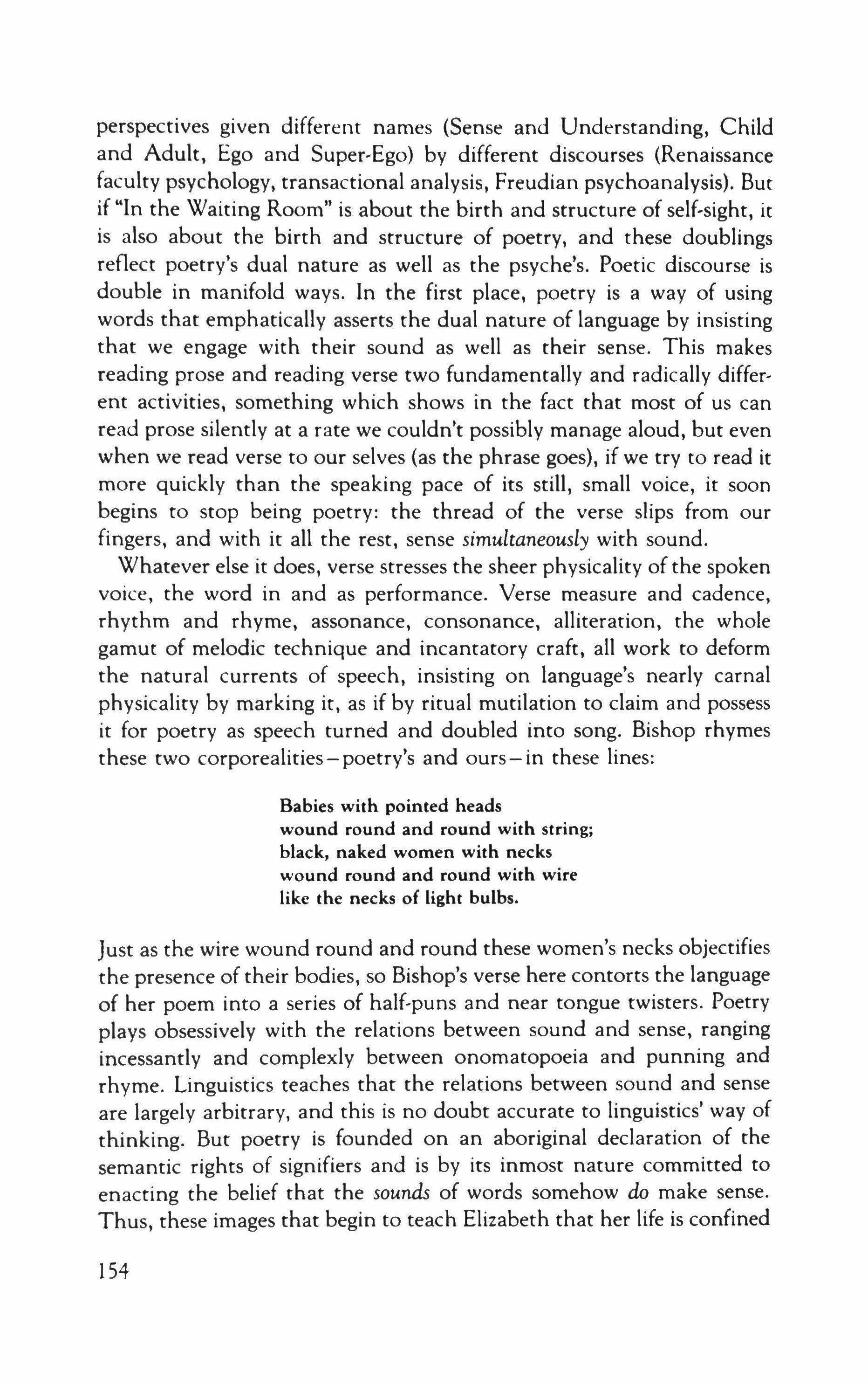
perspectives given different names (Sense and Understanding, Child and Adult, Ego and Super-Ego) by different discourses (Renaissance faculty psychology, transactional analysis, Freudian psychoanalysis). But if "In the Waiting Room" is about the birth and structure of self-sight, it is also about the birth and structure of poetry, and these doublings reflect poetry's dual nature as well as the psyche's. Poetic discourse is double in manifold ways. In the first place, poetry is a way of using words that emphatically asserts the dual nature of language by insisting that we engage with their sound as well as their sense. This makes reading prose and reading verse two fundamentally and radically different activities, something which shows in the fact that most of us can read prose silently at a rate we couldn't possibly manage aloud, but even when we read verse to our selves (as the phrase goes), if we try to read it more quickly than the speaking pace of its still, small voice, it soon begins to stop being poetry: the thread of the verse slips from our fingers, and with it all the rest, sense simultaneously with sound. Whatever else it does, verse stresses the sheer physicality of the spoken voice, the word in and as performance. Verse measure and cadence, rhythm and rhyme, assonance, consonance, alliteration, the whole gamut of melodic technique and incantatory craft, all work to deform the natural currents of speech, insisting on language's nearly carnal physicality by marking it, as if by ritual mutilation to claim and possess it for poetry as speech turned and doubled into song. Bishop rhymes these two corporealities - poetry's and ours - in these lines:
Babies with pointed heads wound round and round with string; black, naked women with necks wound round and round with wire like the necks of light bulbs.
Just as the wire wound round and round these women's necks objectifies the presence of their bodies, so Bishop's verse here contorts the language of her poem into a series of half-puns and near tongue twisters. Poetry plays obsessively with the relations between sound and sense, ranging incessantly and complexly between onomatopoeia and punning and rhyme. Linguistics teaches that the relations between sound and sense are largely arbitrary, and this is no doubt accurate to linguistics' way of thinking. But poetry is founded on an aboriginal declaration of the semantic rights of signifiers and is by its inmost nature committed to enacting the belief that the sounds of words somehow do make sense. Thus, these images that begin to teach Elizabeth that her life is confined
154

and marked by fatal margins are themselves embodied in language evidently marked by a fatality, constricted, wounded by form. And this conjunction itself embodies (mimes, doubles) one of the poem's central themes-that we are wounded into being, that (as Bishop writes in a much earlier poem),
The shadow of the crib makes an enormous cage upon the wall.
In Bishop's early life, the shadows were huge. When she was less than a year old her father's death precipitated a mental breakdown in her mother, who "was taken to McLeans Sanitarium on the outskirts of Boston for treatment. Her condition did not improve there, however, and she returned in 1916 to her home and family in Nova Scotia in the hope that, in familiar surroundings, she might recover." (Elizabeth had already returned there to live with her maternal grandparents after a difficult sojourn with her father's Bostonian family.) "But the visit ended in tragedy. Her final breakdown occurred that summer."
In an autobiographical short story first published in 1953, "In the Village," Bishop narrates a child's experience of her mother's lapse into madness. David Kalstone describes it as "the vital center from which many of Bishop's poems radiate." As if to assert its importance to her life in poetry, Bishop reprinted it in the middle of her third collection of poems, Questions of Travel. The story offers a half-submerged myth of a poetic genesis, an account which portrays the artistic imagination as engendered partly in response to and partly as a means of repressing primal experiences of helplessness and terror. As Thomas Travisano writes, it depicts "with unsentimental psychological precision the way a five-year-old child deals with overwhelming and bewildering emotion. She keeps it at a distance." The story portrays this distancing as at once repressive and transforming. The child seeks refuge from the scream signifying the onset of her mother's madness in the town smithy with Nate, a charming and magnificent avatar of Vulcan, the archetypal maker (and therefore a god of poetry) "- Nate, wearing a long black leather apron over his trousers and bare chest, sweating hard, a black leather cap on top of dry, thick, black-and-gray curls, a black sooty face; iron filings, whiskers, and gold teeth
In the blacksmith's shop things hang up in the shadows and shadows hang up in the things, and there are black and glistening piles of dust in each corner. A tub of night-black water stands by the forge. The horseshoes sail
155

through the dark like bloody little moons and follow each other like bloody little moons to drown in the black water, hissing, protesting.
In the duplicitous decor of Bishop's post-symbolist poetics, too, "thing: hang up in the shadows and shadows hang up in the things."
"In the Village" recounts many incidents in which the child receive: what amount to lessons in repression: a picture hastily hidden; the chile sent on an errand (to buy "humbugs") to get her "out of the way"; he: aunt playing the piano (Mendelssohn's "War March of the Priests," re peatedlv) to drown out the butchering of a pig. But it also recounts a: many more events showing the child's actual awareness behind the mas] of repressed obliviousness she is learning to wear: "Hands are on m, head, pushing me down; I slide out from under them." "We are waitiru for a scream." "1 am caught in a skein of voices." "But neither of us i: really listening to what he is saying; we are listening for sounds frorr upstairs. But everything is quiet." "The address of the sanatorium is ir my grandmother's handwriting, in purple indelible pencil, on smoothed out wrapping paper. It will never come off." And in the story's last page: repression and knowledge, submergence and transparence, the "Clang of Nate's forging hammer and her mother's despairing scream fuse undei the sign of the changing moon:
Every Monday afternoon I go past the blacksmith's shop with the package under my arm, hiding the address of the sanatorium with my arm and my other hand.
Going over the bridge, I stop and stare down into the river. All the little trout that have been too smart to get caught - for how long now! - are there, rushing in flank movements, foolish assaults and retreats, against and away from the old sunken fender of Malcolm McNeil's Ford. It has lain there for ages and is supposed to be a disgrace to us all. So are the tin cans that glint there, brown and gold.
From above, the trout look as transparent as the water, but if one did catch one, it would be opaque enough, with a little slick moon-white belly with a pair of tiny, pleated, rose-pink fins on it. The leaning willows soak their narrow yellowed leaves.
Clang.
Clang.
Nate is shaping a horseshoe.
Oh, beautiful pure sound!
It turns everything else to silence.
But still, once in a while, the river gives an unexpected gurgle. "SIp," it says, out of glassy-ridged brown knots sliding along the surface.
Clang.
And everything except the river holds its breath.
Now there is no scream. Once there was one and it settled slowly down to
156
earth one hot summer afternoon; or did it float up, into that dark, too dark, blue sky? But surely it has gone away, forever.
It sounds like a bell buoy out at sea.
It is the elements speaking: earth, air, fire, water.
All those other things - clothes, crumbling postcards, broken china; things damaged and lost, sickened or destroyed; even the frail almost-lost screamare they too frail for us to hear their voices long, too mortal?
Nate!
Oh, beautiful sound, strike again!
Like the events of "In the Village," the crisis of "In the Waiting Room" is precipitated by a scream, but in the story the child actually witnesses her mother's cry. She is just learning to construct hidden, hiding recesses inside her: the transparent river in which she can still see the submerged debris "supposed to be a disgrace to us all" presents a translucent symbol of her five-year-old mind - without ever ceasing to be a river (in this it is an exemplary post-symbolist image). In the poem, conversely, the cry emerges from an inner chamber concealing its source, which must be deduced by the reading of a sign. Elizabeth is several years older, and her psychic situation has changed: she is moving into what one writer calls an "adult awareness" and another "her rational maturity."
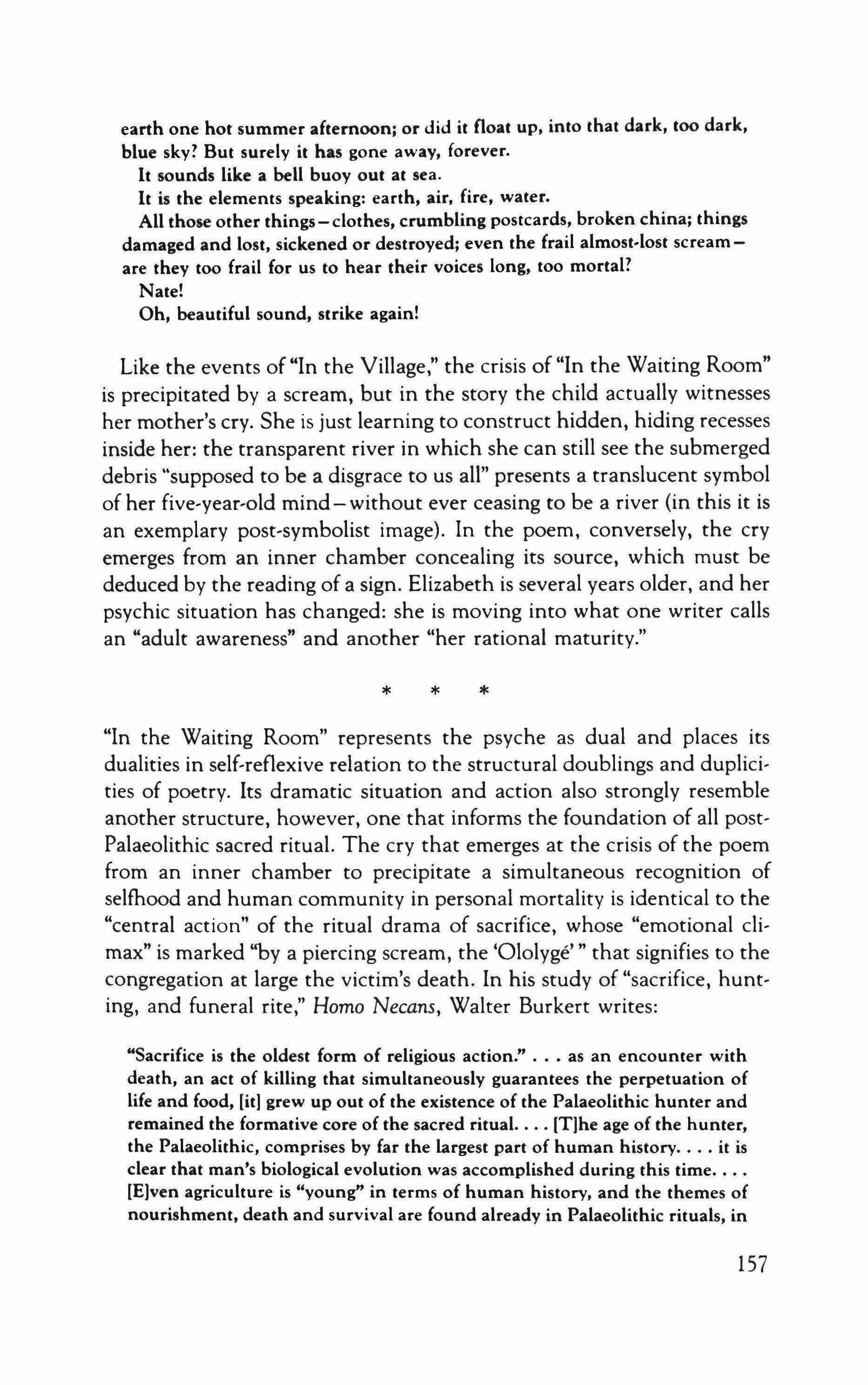
"In the Waiting Room" represents the psyche as dual and places its dualities in self-reflexive relation to the structural doublings and duplicities of poetry. Its dramatic situation and action also strongly resemble another structure, however, one that informs the foundation of all postPalaeolithic sacred ritual. The cry that emerges at the crisis of the poem from an inner chamber to precipitate a simultaneous recognition of selfhood and human community in personal mortality is identical to the "central action" of the ritual drama of sacrifice, whose "emotional climax" is marked "by a piercing scream, the 'Ololyge' that signifies to the congregation at large the victim's death. In his study of "sacrifice, hunting, and funeral rite," Homo Necans, Walter Burkert writes:
"Sacrifice is the oldest form of religious action." as an encounter with death, an act of killing that simultaneously guarantees the perpetuation of life and food, [it) grew up out of the existence of the Palaeolithic hunter and remained the formative core of the sacred ritual. [T)he age of the hunter, the Palaeolithic, comprises by far the largest part of human history it is clear that man's biological evolution was accomplished during this time [E)ven agriculture is "young" in terms of human history, and the themes of nourishment, death and survival are found already in Palaeolithic rituals, in
* * *
157

the complex of hunting and sacrifice The study of prehistory (shows that) man became man through the hunt, through the act of killing [T[he "sacred" act done at the "sacred" place by the "consecrating" actor consists of slaughtering sacrificial animals Sacrificial killing is the basic experience of the "sacred." Homo religiosus ("religious man") acts and at. tains self-awareness as homo necans ("man the killer").
(In the hunt,) the quarry became a quasi-human adversary, experienced as human and treated accordingly (The hunter-later the sacrificeridentifies with the victim in whose death he sees his own mortality foreshadowed) The Greeks mentioned explicitly that the initiate surrendered the animal to death "in his stead" and that a life was exchanged for a life .•••
(The kill) is surrounded by barriers to be broken down in a complicated, set way, corresponding to the ambivalence of the event: sacralization and desacralization around a central point where weapons, blood, and death establish a sense of human community. The irreversible event becomes a forma. rive experience for all participants Nourishment, order, and civilized life are born of their antithesis: the encounter with death. Only homo necans can become homo sapiens.
In the circle of the Palaeolithic hunt those who take part in the kil and those who witness it are one and the same; sacrificial ritual pre serves the dramatic structure of "sacralization and desacralization" estab lished in the hunt, but in sacred ritual a theatrical division of labor taker place - between actors and audience, between those who take part in the enactment of the rite, the kill itself, and those who attend it, whc witness it at one remove. For the priesthood, the crux of the ritua remains in essence what it was for the Palaeolithic hunter, a paradoxi cally double revelation of individual mortal solitude and simultaneous communal solidarity before the experience of death. For the congrega tion created by sacred rite, conversely, the crux becomes the reading of 2 sign. The kill is no longer directly witnessed but is instead imagined at the prompting of a sign which is overheard issuing from "behind the scenes" of the ritual theater. Like violence generally in Greek tragedy, the kill itself takes place as it were "offstage." The "central action" and "emotional climax" of sacrificial rite are marked "by a piercing scream, the 'Ololvge' which must be read as a sign by the congregation at large. It is a paradox of the human imagination that the reading of this sign of the kill can prove more spiritually efficacious than the actual beholding of the sacrifice. We can too readily avert our eyes from disturbing sights, but as Sophocles' Oedipus observes, the wellsprings of hearing cannot be as easily stopped up as the eyes. A sign that is heard, like every other, does not exist as a sign until someone becomes implicated in its interpretation, but before interpretation even begins, a heard sign is
158

already there, ringing in an imagination it has already penetrated. Just as the child Elizabeth's speculative relation with her aunt's cry compels her imaginative elaboration as she reflects that it "could have / got loud and worse but hadn't," so at the sacrifice the Ololvge precipitates in the congregation an internalization of the essence of the rite, its display of the primal fact of mortality in the death of the victim. For the congregation the Ololvge emerges, like the repressed, from offstage, "from inside." To be read, its hidden source must be imagined. But whatever we can imagine we already secretly know. Reading, we discover our selves implicated in what we read. "I was too shy to shop," as Bishop writes. Her own responses betray her to her self.
There is a characteristically low-key, wry humor in the materials Bishop finds to image this situation. A dentist's office makes a sharply "modern, scientific" sanctum; as a surrogate for the classical theater of sacrifice and the Palaeolithic hunt it is at once dryly amusing and painful. (Interestingly, when researchers propose to kill laboratory animals "for the sake of" experiment, they speak of "sacrificing" them.) Similarly, in another poem, "First Death in Nova Scotia," which deals with the same period of her life and with related themes, the icons of imperial British civil religion - "the chromographs: / Edward, Prince of Wales, / with Princess Alexandra, / and King George with Queen Mary" - turn out to possess a comparably perfect ritual efficacy. Religion, Bishop seems disingenuously to suggest, is all in the practice.
It is not particularly surprising that poetry preserves structures of such antiquity. Its traditions are older by centuries (Homer to Anaximander) and in most cases by millennia than those of other modes of thought or discourse. Aboriginally, poetry is incantatory ritual. Burkert shows that post-Palaeolithic rite derives from and perpetuates the forms of sacrifice. Insofar as it is a ritual enactment, poetry is no different. The dramatic configurations of sacrificial rite constitute a crucial structural substrate of all poetic form, and poetry shapes poets and readers alike to its own measures in the ritual forms transmitted by tradition and enacted whenever we succeed in our search for that dreamy thing, a "poem." And of course we are perfectly accustomed to speak of poets and artists "sacrificing their lives to their work," nor is this always a purely figurative expression. Kenneth Rexroth somewhere remarks that in the course of his life in letters he knew more than two dozen American poets of "anthology rank" who committed suicide. Poetry "plunders" this world for the sake of another, as Rilke observes, but if art may be otherworldly, artists live and die in this one.
Because of its self-reflexivity, "In the Waiting Room" allows us to see
159
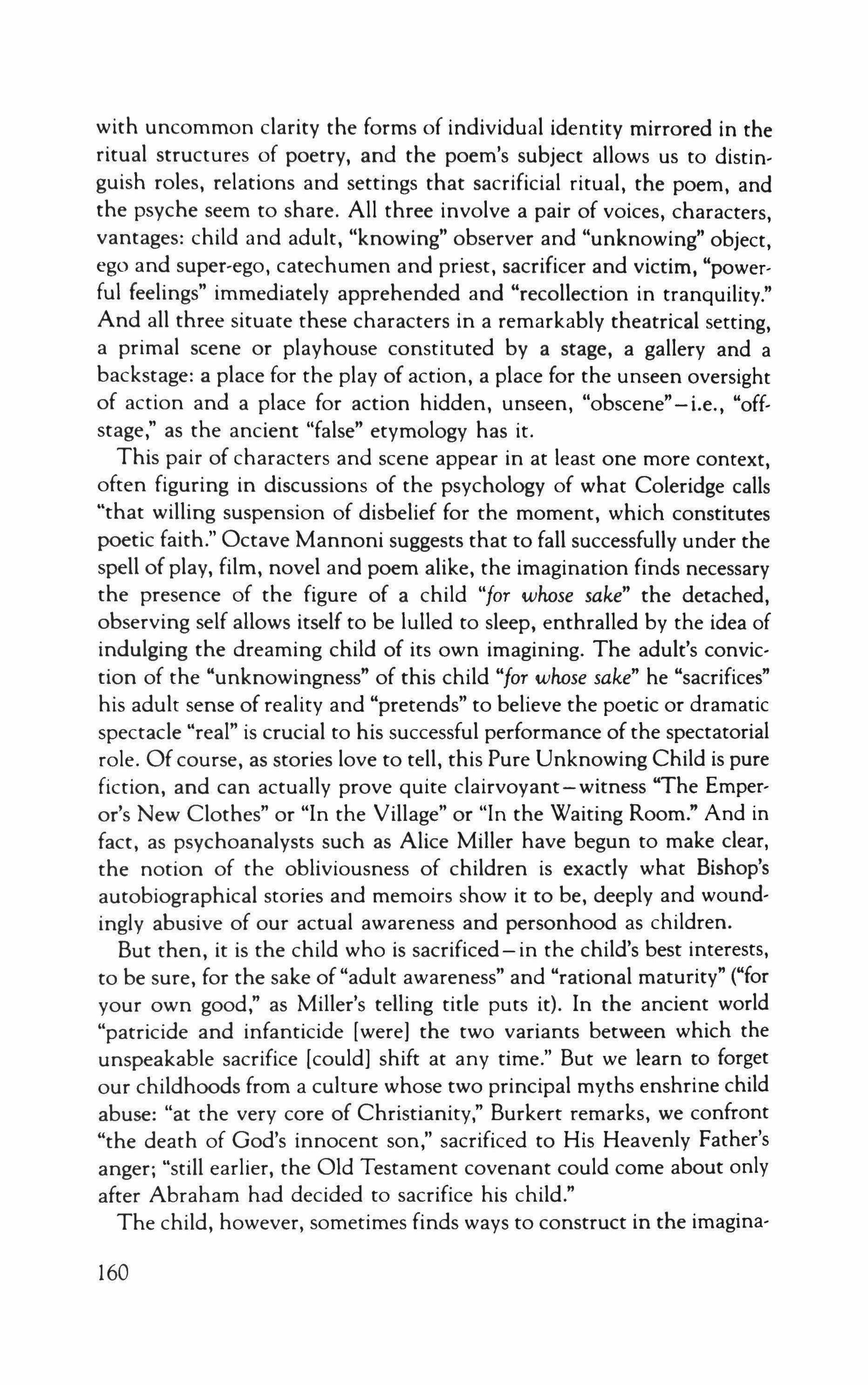
with uncommon clarity the forms of individual identity mirrored in the ritual structures of poetry, and the poem's subject allows us to distinguish roles, relations and settings that sacrificial ritual, the poem, and the psyche seem to share. All three involve a pair of voices, characters, vantages: child and adult, "knowing" observer and "unknowing" object, ego and super-ego, catechumen and priest, sacrificer and victim, "powerful feelings" immediately apprehended and "recollection in tranquility." And all three situate these characters in a remarkably theatrical setting, a primal scene or playhouse constituted by a stage, a gallery and a backstage: a place for the play of action, a place for the unseen oversight of action and a place for action hidden, unseen, "obscene" - i.e., "offstage," as the ancient "false" etymology has it.
This pair of characters and scene appear in at least one more context, often figuring in discussions of the psychology of what Coleridge calls "that willing suspension of disbelief for the moment, which constitutes poetic faith." Octave Mannoni suggests that to fall successfully under the spell of play, film, novel and poem alike, the imagination finds necessary the presence of the figure of a child "for whose sake" the detached, observing self allows itself to be lulled to sleep, enthralled by the idea of indulging the dreaming child of its own imagining. The adult's conviction of the "unknowingness" of this child "for whose sake" he "sacrifices" his adult sense of reality and "pretends" to believe the poetic or dramatic spectacle "real" is crucial to his successful performance of the spectatorial role. Of course, as stories love to tell, this Pure Unknowing Child is pure fiction, and can actually prove quite clairvoyant-witness "The Emperor's New Clothes" or "In the Village" or "In the Waiting Room." And in fact, as psychoanalysts such as Alice Miller have begun to make clear, the notion of the obliviousness of children is exactly what Bishop's autobiographical stories and memoirs show it to be, deeply and woundingly abusive of our actual awareness and personhood as children.
But then, it is the child who is sacrificed - in the child's best interests, to be sure, for the sake of "adult awareness" and "rational maturity" ("for your own good," as Miller's telling title puts it). In the ancient world "patricide and infanticide [were) the two variants between which the unspeakable sacrifice [could) shift at any time." But we learn to forget our childhoods from a culture whose two principal myths enshrine child abuse: "at the very core of Christianity," Burkert remarks, we confront "the death of God's innocent son," sacrificed to His Heavenly Father's anger; "still earlier, the Old Testament covenant could come about only after Abraham had decided to sacrifice his child."
The child, however, sometimes finds ways to construct in the imagina-
160
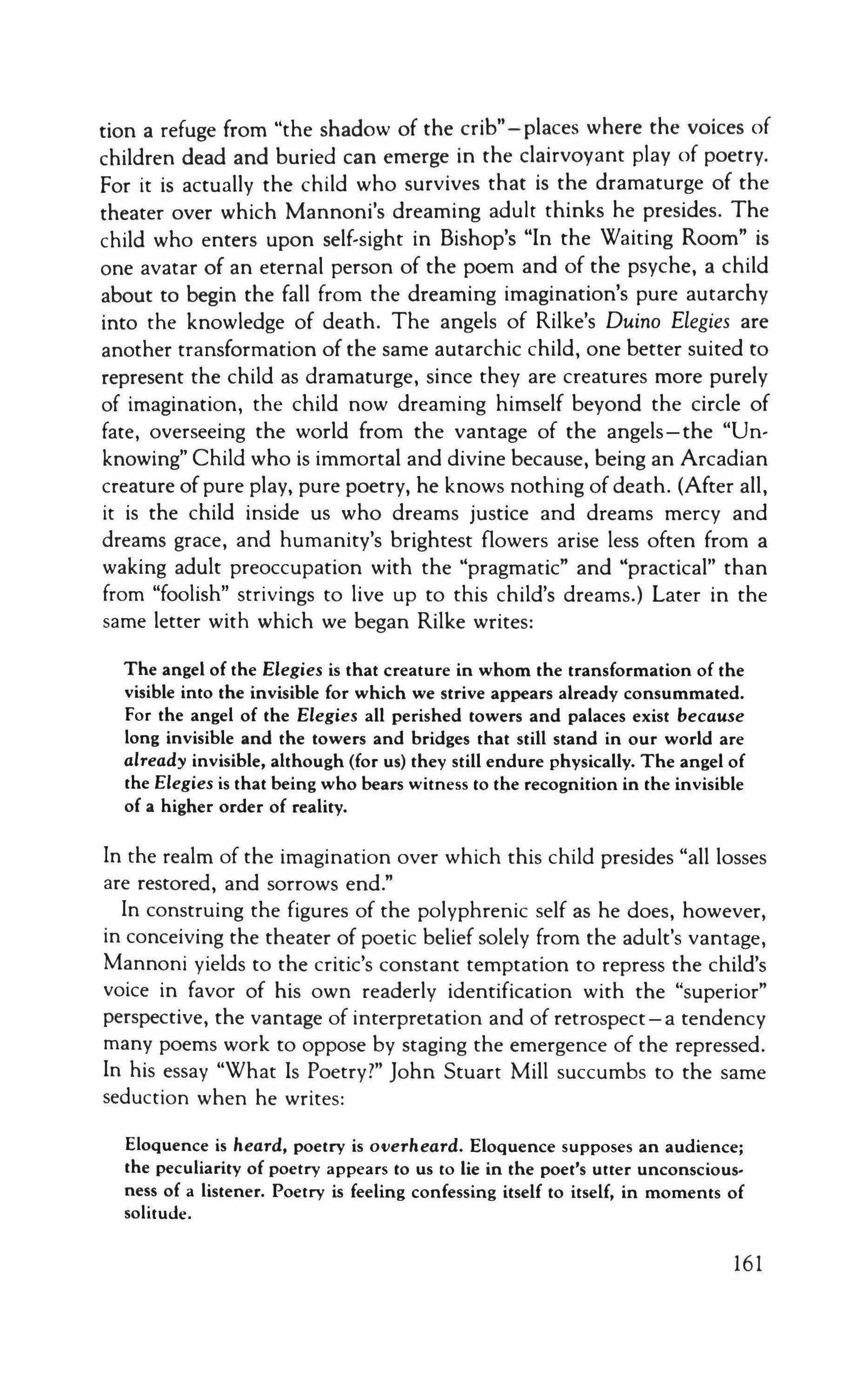
tion a refuge from "the shadow of the crib" - places where the voices of children dead and buried can emerge in the clairvoyant play of poetry. For it is actually the child who survives that is the dramaturge of the theater over which Mannoni's dreaming adult thinks he presides. The child who enters upon self-sight in Bishop's "In the Waiting Room" is one avatar of an eternal person of the poem and of the psyche, a child about to begin the fall from the dreaming imagination's pure autarchy into the knowledge of death. The angels of Rilke's Duino Elegies are another transformation of the same autarchic child, one better suited to represent the child as dramaturge, since they are creatures more purely of imagination, the child now dreaming himself beyond the circle of fate, overseeing the world from the vantage of the angels-the "Unknowing" Child who is immortal and divine because, being an Arcadian creature of pure play, pure poetry, he knows nothing of death. (After all, it is the child inside us who dreams justice and dreams mercy and dreams grace, and humanity's brightest flowers arise less often from a waking adult preoccupation with the "pragmatic" and "practical" than from "foolish" strivings to live up to this child's dreams.) Later in the same letter with which we began Rilke writes:
The angel of the Elegies is that creature in whom the transformation of the visible into the invisible for which we strive appears already consummated. For the angel of the Elegies all perished towers and palaces exist because long invisible and the towers and bridges that still stand in our world are alTeady invisible, although (for us) they still endure physically. The angel of the Elegies is that being who bears witness to the recognition in the invisible of a higher order of reality.
In the realm of the imagination over which this child presides "all losses are restored, and sorrows end."
In construing the figures of the polvphrenic self as he does, however, in conceiving the theater of poetic belief solely from the adult's vantage, Mannoni yields to the critic's constant temptation to repress the child's voice in favor of his own readerly identification with the "superior" perspective, the vantage of interpretation and of retrospect-a tendency many poems work to oppose by staging the emergence of the repressed. In his essay "What Is Poetry?" John Stuart Mill succumbs to the same seduction when he writes:
Eloquence is heard, poetry is overhecrd, Eloquence supposes an audience; the peculiarity of poetry appears to us to lie in the poet's utter unconsciousness of a listener. Poetry is feeling confessing itself to itself, in moments of solitude.
161
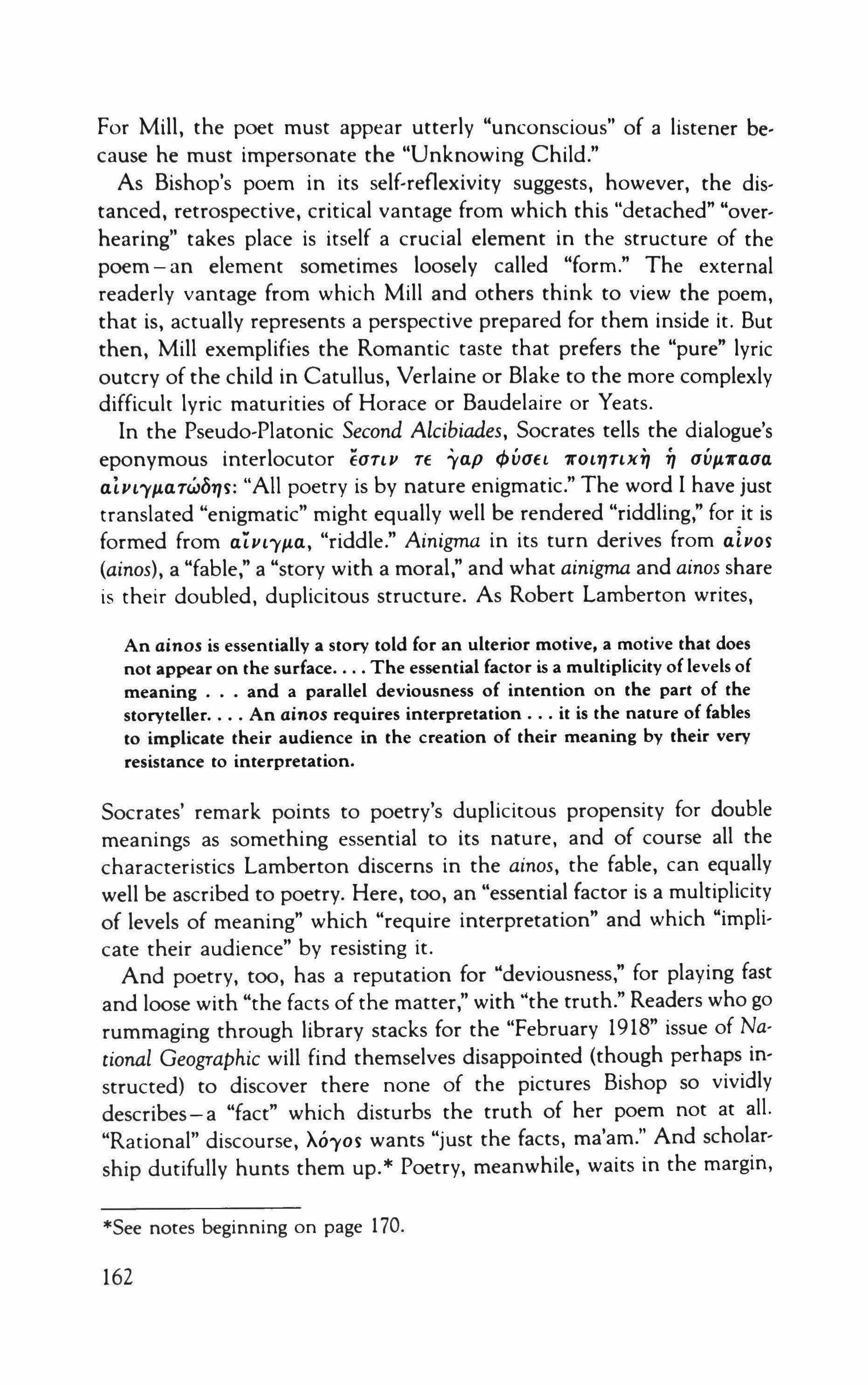
For Mill, the poet must appear utterly "unconscious" of a listener because he must impersonate the "Unknowing Child."
As Bishop's poem in its self-reflexivity suggests, however, the distanced, retrospective, critical vantage from which this "detached" "overhearing" takes place is itself a crucial element in the structure of the poem - an element sometimes loosely called "form." The external readerly vantage from which Mill and others think to view the poem, that is, actually represents a perspective prepared for them inside it. But then, Mill exemplifies the Romantic taste that prefers the "pure" lyric outcry of the child in Catullus, Verlaine or Blake to the more complexly difficult lyric maturities of Horace or Baudelaire or Yeats.
In the Pseudo-Platonic Second Alcibiades, Socrates tells the dialogue's eponymous interlocutor faTUI TE lap q,uaH 1rOLT/TLX� � aup.1raaa aivL'Yp.aTWl>T/S: "All poetry is by nature enigmatic." The word I have just translated "enigmatic" might equally well be rendered "riddling," for it is formed from a'ivL'Yp.a, "riddle." Ainigma in its turn derives from aivos (ainos), a "fable," a "story with a moral," and what ainigma and ainos share is their doubled, duplicitous structure. As Robert Lamberton writes,
An ainos is essentially a story told for an ulterior motive, a motive that does not appear on the surface The essential factor is a multiplicity of levels of meaning and a parallel deviousness of intention on the part of the storyteller An ainos requires interpretation it is the nature of fables to implicate their audience in the creation of their meaning by their very resistance to interpretation.
Socrates' remark points to poetry's duplicitous propensity for double meanings as something essential to its nature, and of course all the characteristics Lamberton discerns in the ainos, the fable, can equally well be ascribed to poetry. Here, too, an "essential factor is a multiplicity of levels of meaning" which "require interpretation" and which "implicate their audience" by resisting it.
And poetry, too, has a reputation for "deviousness," for playing fast and loose with "the facts of the matter," with "the truth." Readers who go rummaging through library stacks for the "February 1918" issue of National Geographic will find themselves disappointed (though perhaps instructed) to discover there none of the pictures Bishop so vividly describes-a "fact" which disturbs the truth of her poem not at all. "Rational" discourse, AO"YOS wants "just the facts, ma'am." And scholarship dutifully hunts them up. * Poetry, meanwhile, waits in the margin,
*See notes beginning on page 170.
162
watching in the person of Hesiod's Muses, sweetly laughing because they know that in the things of the heart, "the 'facts'" include their shadows, their contradictory opposites-laughing because
iOP.EII VtEVOEa 1ro�a �f'YHII ETVP.OtUtll op.o'la, iOP.EII 0' E�T' E8E�WP.EII a��fa 'YfIpvuau6at.
We know how to tell a lot of lies that seem true, and we know, when we want, how to sing the truth.
And since they don't say how to tell the one from the other, before we know it we find our selves caught dreaming in webs of interpretation.
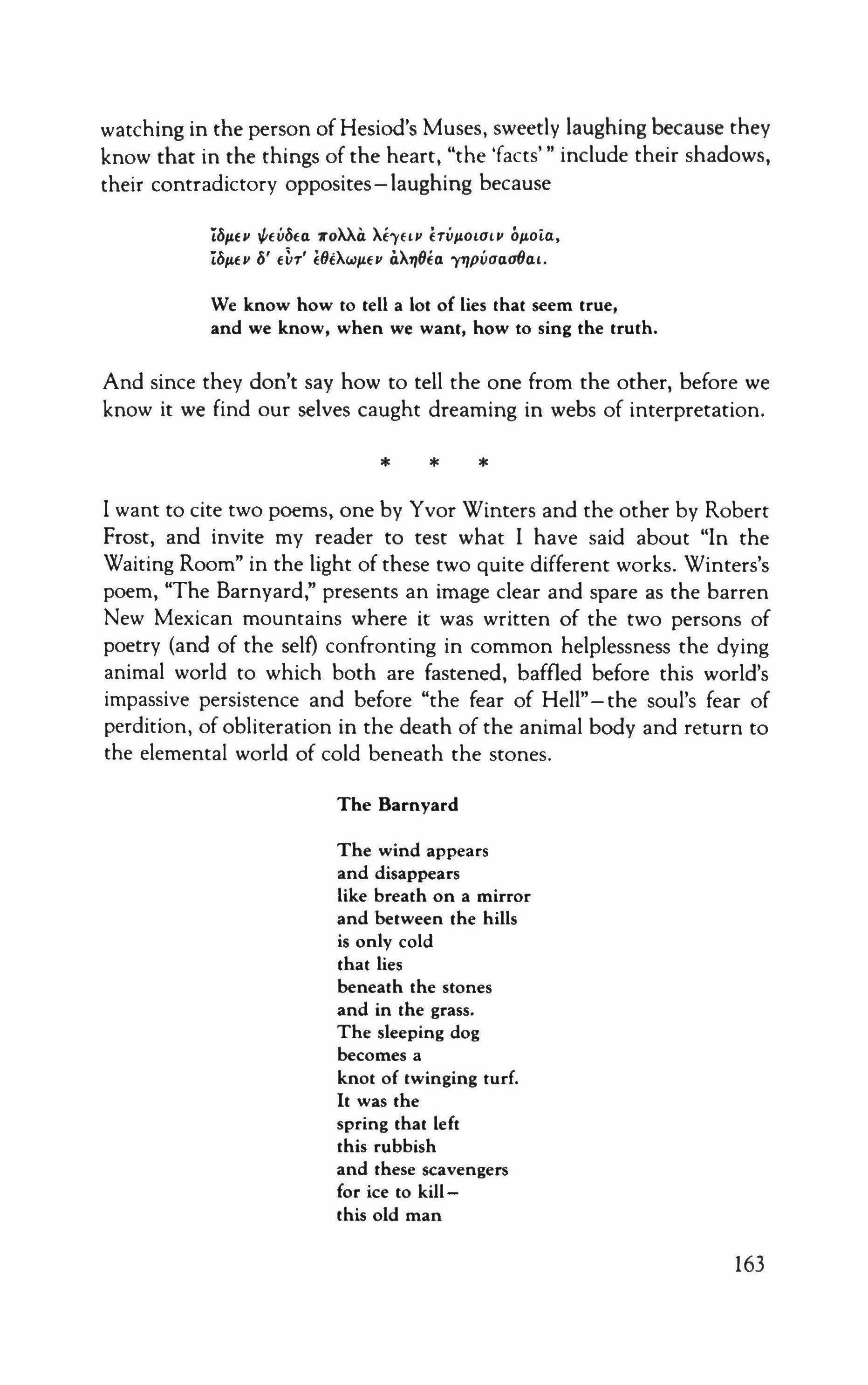
I want to cite two poems, one by Yvor Winters and the other by Robert Frost, and invite my reader to test what I have said about "In the Waiting Room" in the light of these two quite different works. Winters's poem, "The Barnyard," presents an image clear and spare as the barren New Mexican mountains where it was written of the two persons of poetry (and of the self) confronting in common helplessness the dying animal world to which both are fastened, baffled before this world's impassive persistence and before "the fear of Hell" - the soul's fear of perdition, of obliteration in the death of the animal body and return to the elemental world of cold beneath the stones.
The Barnyard
The wind appears and disappears like breath on a mirror and between the hills is only cold that lies beneath the stones and in the grass. The sleeping dog becomes a knot of twinging turf. It was the spring that left this rubbish and these scavengers for ice to killthis old man
* * *
163

wrinkled in the fear of Hell, the child that staggers straight into the clotting cold with short fierce cries.
The relations of Frost's "Directive" with the themes I have been exploring are perhaps a little less obvious, but they are probably also deeper. Its concluding lines allude to a passage in the Gospel of Mark. The third and fourth chapters of this Gospel evince a concern with the duplicities of madness and of parable. After his relatives attempt to have him confined as insane, Jesus tells the Parable of the House Divided, repudiates his mother and brothers, and then tells the Parable of the Sower-a self-reflexive parable about parables, which concludes: "He that hath ears to hear, let him hear." Like ainos (a word which was obsolete in its original sense well before the writing of the Gospels), 7rapa{3oA�, parable means a story with a double meaning (its root sense is "a juxtaposition" or "a comparison"). Parables share with poems and riddles a double structure and native duplicity. After the multitude has departed, the disciples ask Jesus to explain the Parable of the Sower; before offering an interpretation, Jesus speaks the verses to which the poem alludes:
'T"iJl TO p.va"';'ploJl ofooTal 1ljs {jaalAEias TOU 8EOU' fJaiJlOIS oE Tois Uw ill apatJo>.ais TO. allTa -yiIlETal, ilia (3AE7rOJlTH (3).f. WOIII )tat ,,� iOwaI", )tal (nOVO"TH (houwalJl )tat p.� OVJlIWOIII, ""' OTE E1noTpfy,woIII )tat aq,t8p aVTois.
Unto you it is given to know the mystery of the kingdom of God: but to them that are without, all these things are done in parables: That seeing they may see, and not perceive; and hearing they may hear, and not understand; lest at any time they should be converted, and their sins should be forgiven them.
It may also be helpful to recall that springs (and later, basins of water) playa role in sacrificial rite - not only as sources of the water of life for libation and purification, but as the earliest ready source of reflection, the primal mirror. Here is Frost's poem:
Directive
Back out of all this now too much for us, Back in a time made simple by the loss Of detail, burned, dissolved, and broken off Like graveyard marble sculpture in the weather,
164
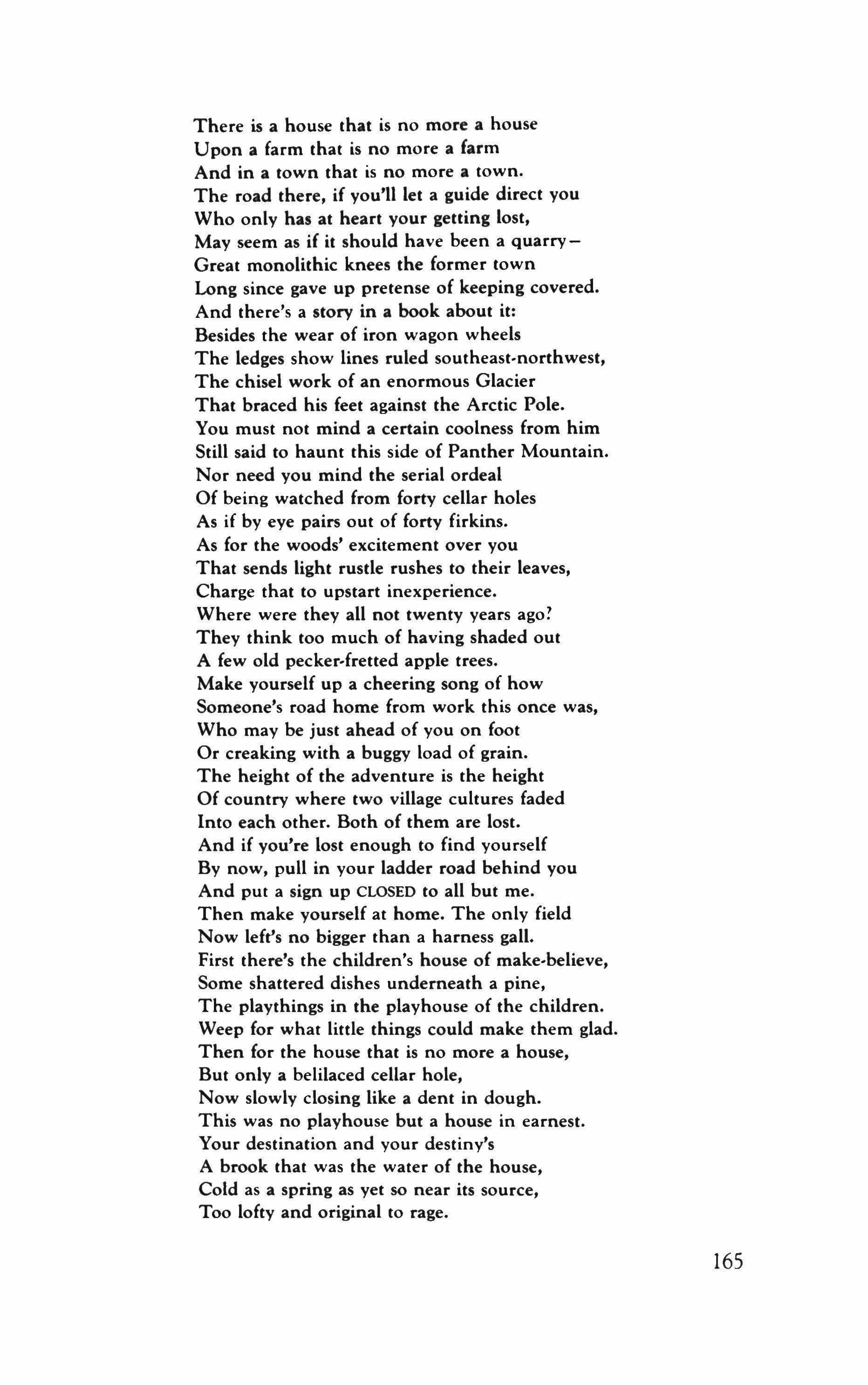
There is a house that is no more a house
Upon a farm that is no more a farm
And in a town that is no more a town.
The road there, if you'll let a guide direct you Who only has at heart your getting lost, May seem as if it should have been a quarryGreat monolithic knees the former town
Long since gave up pretense of keeping covered. And there's a story in a book about it: Besides the wear of iron wagon wheels
The ledges show lines ruled southeast-northwest, The chisel work of an enormous Glacier That braced his feet against the Arctic Pole. You must not mind a certain coolness from him
Still said to haunt this side of Panther Mountain. Nor need you mind the serial ordeal
Of being watched from forty cellar holes
As if by eye pairs out of forty firkins. As for the woods' excitement over you That sends light rustle rushes to their leaves, Charge that to upstart inexperience. Where were they all not twenty years ago? They think too much of having shaded out
A few old peeker-fretted apple trees.
Make yourself up a cheering song of how Someone's road home from work this once was, Who may be just ahead of you on foot Or creaking with a buggy load of grain. The height of the adventure is the height Of country where two village cultures faded Into each other. Both of them are lost.
And if you're lost enough to find yourself By now, pull in your ladder road behind you And put a sign up CLOSED to all but me. Then make yourself at home. The only field Now left's no bigger than a harness gall.
First there's the children's house of make-believe, Some shattered dishes underneath a pine, The playthings in the playhouse of the children. Weep for what little things could make them glad. Then for the house that is no more a house, But only a belilaced cellar hole, Now slowly closing like a dent in dough. This was no playhouse but a house in earnest. Your destination and your destiny's
A brook that was the water of the house, Cold as a spring as yet so near its source, Too lofty and original to rage.
165
(We know the valley streams that when aroused Will leave their tatters hung on barb and thorn.)
1 have kept hidden in the instep arch
Of an old cedar at the waterside
A broken drinking goblet like the Grail
Under a spell so the wrong ones can't find it, So can't get saved, as Saint Mark says they mustn't. (1 stole the goblet from the children's plavhouse.)
Here are your waters and your watering place. Drink and be whole again beyond confusion.
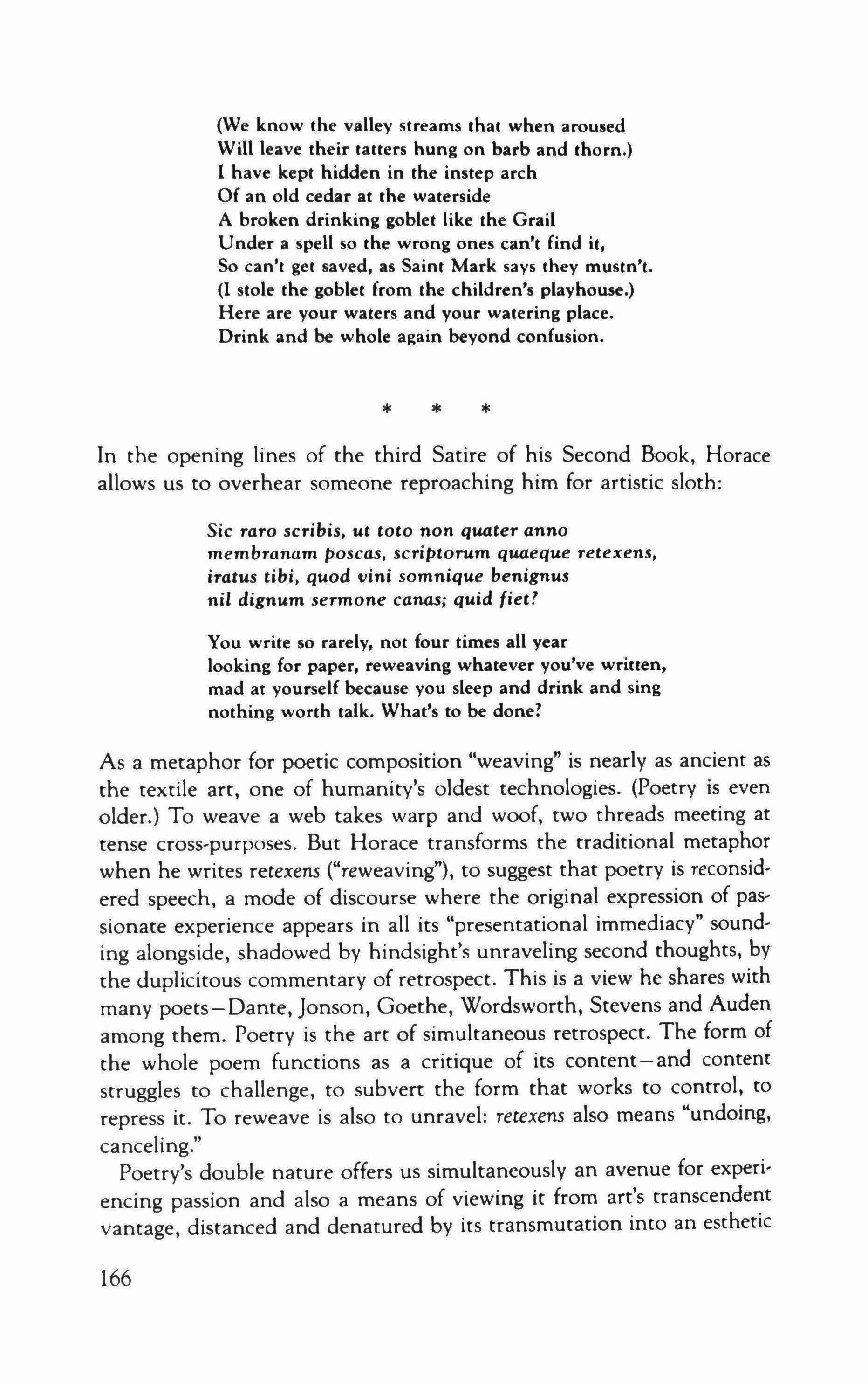
In the opening lines of the third Satire of his Second Book, Horace allows us to overhear someone reproaching him for artistic sloth:
Sic raro scribis, ut toto non quater anno membranam poscas, scriptorum quaeque rerexens, iratus tibi, quod "ini somnique benignus nil dignum sermone canas; quid [iet!
You write so rarely, not four times all year looking for paper, reweaving whatever you've written, mad at yourself because you sleep and drink and sing nothing worth talk. What's to be done?
As a metaphor for poetic composition "weaving" is nearly as ancient as the textile art, one of humanity's oldest technologies. (Poetry is even older.) To weave a web takes warp and woof, two threads meeting at tense cross-purposes. But Horace transforms the traditional metaphor when he writes retexens ("reweaving"), to suggest that poetry is reconsidered speech, a mode of discourse where the original expression of passionate experience appears in all its "presentational immediacy" sounding alongside, shadowed by hindsight's unraveling second thoughts, by the duplicitous commentary of retrospect. This is a view he shares with many poets-Dante, Jonson, Goethe, Wordsworth, Stevens and Auden among them. Poetry is the art of simultaneous retrospect. The form of the whole poem functions as a critique of its content-and content struggles to challenge, to subvert the form that works to control, to repress it. To reweave is also to unravel: retexens also means "undoing, canceling."
Poetry's double nature offers us simultaneously an avenue for experiencing passion and also a means of viewing it from art's transcendent vantage, distanced and denatured by its transmutation into an esthetic
* * *
166
object. Poetry gives simultaneous voice to our empathy for the child's pathos and our interpretative (dis-Jengagernent with the adult's understanding. Shakespeare has this situation in mind when, sending his Beloved a blank book or diary, he says
Look what thy memory cannot contain, Commit to these waste blanks, and thou shalt find Those children nursed, delivered from thy brain, To take a new acquaintance of thy mind.
Poetry represents (reveals, betrays) the soul in self-address, in self-sight. What Shakespeare says to his Beloved he says also to himself. There is a structural similarity between the inner dialogues of poems and the inner dialogue which constitutes the psyche, and to be in love is to project one of the persons of this dialogue onto an other. In the world of our speech with ourselves we-language weaving us-create persons of the imagination, addressing ourselves as "you," overhearing ourselves say "I":
I said to myself: three days and you'll be seven years old.
These persons of grammar and of the imagination (Kleinian psychoanalysis calls them "internal objects") are also Persons of Language and Persons of the Poem, and the vision of the self as plural which informs them goes back to poetry's beginnings. In the Iliad Homer says of Odysseus,
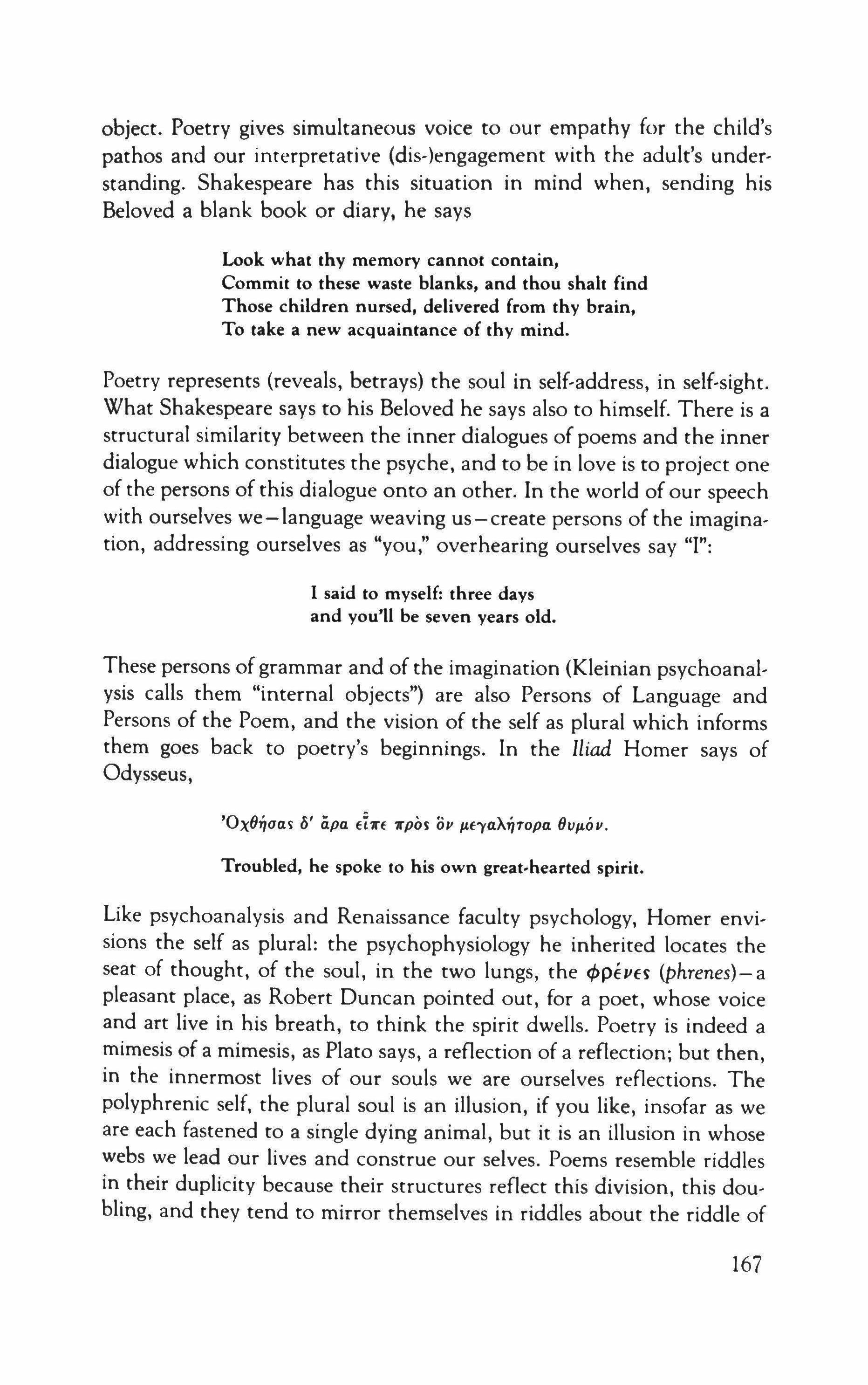
Troubled, he spoke to his own great-hearted spirit.
Like psychoanalysis and Renaissance faculty psychology, Homer envisions the self as plural: the psychophysiology he inherited locates the seat of thought, of the soul, in the two lungs, the cPpiJlH (phrenes)- a pleasant place, as Robert Duncan pointed out, for a poet, whose voice and art live in his breath, to think the spirit dwells. Poetry is indeed a mimesis of a mimesis, as Plato says, a reflection of a reflection; but then, in the innermost lives of our souls we are ourselves reflections. The polvphrenic self, the plural soul is an illusion, if you like, insofar as we are each fastened to a single dying animal, but it is an illusion in whose webs we lead our lives and construe our selves. Poems resemble riddles in their duplicity because their structures reflect this division, this doubling, and they tend to mirror themselves in riddles about the riddle of
167

being, which is, for poems as for human beings, partly the riddle of the parted self. This is why, as the discourse of reason loves to observe, poems are riddled with holes. The self is plural. "le est un autre," as Rimbaud put it: "I is an other." Yes, because I are.
Like all ritual, poetry is constituted in repetition. The poem comes to life in the incantatory measures of its verses as we recite them, and the first aim of all its art lies in leading us to return from its last verse to its first to repeat the incantation, reading it a second time, now from the reflective vantage of retrospect. Similarly, the life of the mind (of the soul: the life for which reading is a yeast) resides in the repetitions of recollection and reflection, and also of daydream, nightmare, fantasy. "Mirror on mirror mirrored is all the show," as Yeats says. When we respond to a poem, falling under its spell, we acknowledge an affinity, affirm a shared vision. Read deeply, the poem reads us, shows us our own hidden knowledge newly conceived, discloses the secrets of our souls to us in the mirror of its differences. When the poem works its spell, effects its catharsis, provides its consolation, its exaltation, the wounded, buried child is released.
Poetry's dual nature allows opposites to coexist in the poem, grants contradictory voices equal, equivocal entrance there. Many poems, in fact, constitute themselves very directly in the conflict between two voices or visions-think, for instance, of Sidney's "Thou blind man's mark" and Shakespeare's "Th' expense of spirit in a waste of shame" (Sonnet 129), two diatribes against lust that we begin to understand only when we realize that their speakers are not free from the passion they assail, that their words give the desire they condemn a body and life that bear witness for as well as against it. Or think of Catullus 51, llle mi par esse deo, whose last stanza turns back to violently repudiate the values the rest of the lyric passionately voices. This is one reason why poetry's powers are inherently and necessarily heretical: insofar as poetry needs to state both sides, it inevitably undermines any dogma, orthodoxy, creed, doctrine. It isn't so much Milton who is "of the devil's party without knowing it" as it is his medium that insists on Satan having his say. To the impassioned espousals of a poem's first voice, its second voice inevitably asks that troubling question. "Why are you telling me this story?" What Freud said about dreams is equally true of poetry: the dream syntax, the story that connects the materials of the dream, is a cover story. The primal poetic drama occurs when the content repressed by this cover story emerges to challenge it. This is how poetry betrays poets and readers alike- betrays us to our selves.
Poetry's play with projection reflects in the ritual structures of the
168
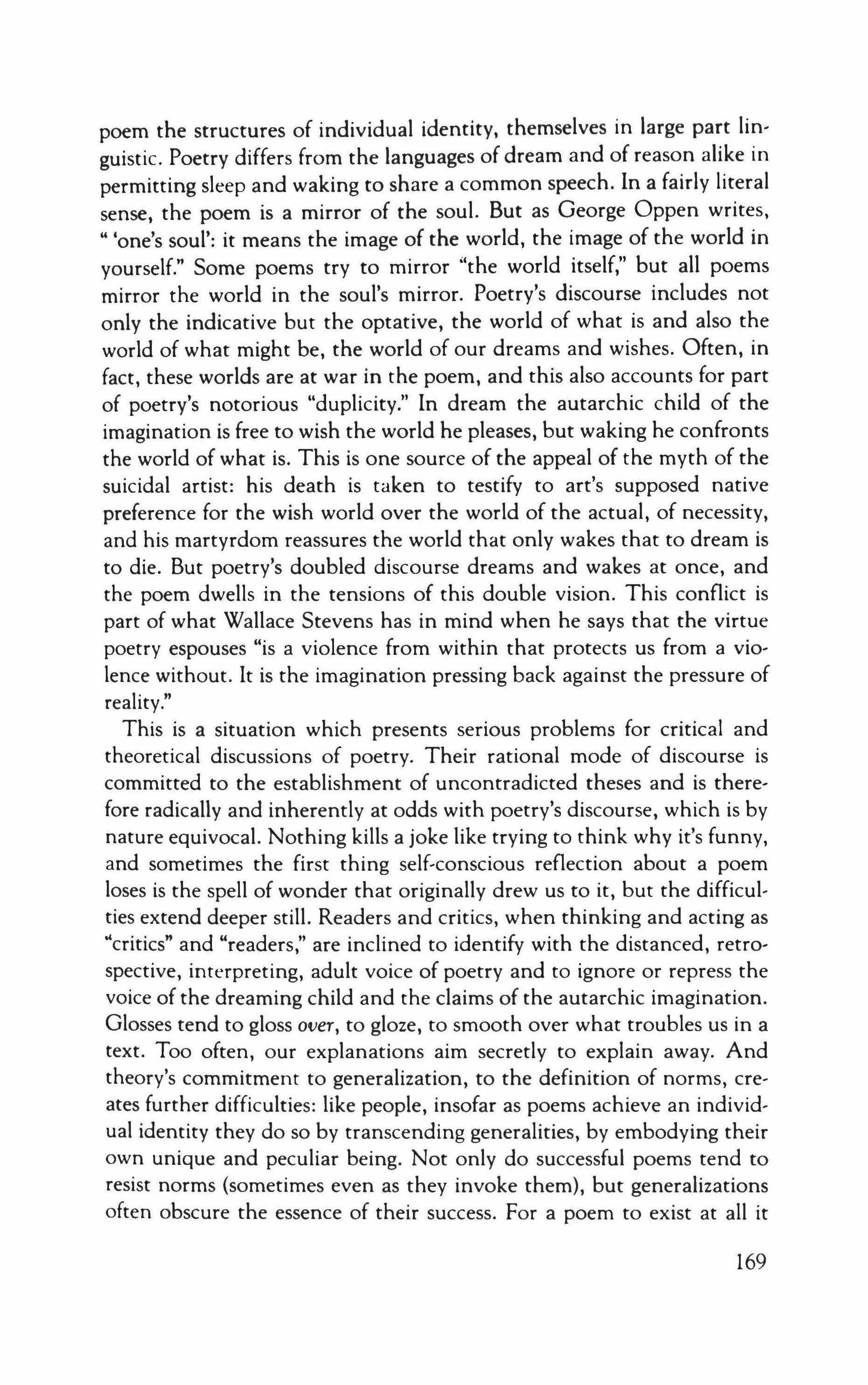
poem the structures of individual identity, themselves in large part linguistic. Poetry differs from the languages of dream and of reason alike in permitting sleep and waking to share a common speech. In a fairly literal sense, the poem is a mirror of the soul. But as George Oppen writes, 'one's soul': it means the image of the world, the image of the world in yourself." Some poems try to mirror "the world itself," but all poems mirror the world in the soul's mirror. Poetry's discourse includes not only the indicative but the optative, the world of what is and also the world of what might be, the world of our dreams and wishes. Often, in fact, these worlds are at war in the poem, and this also accounts for part of poetry's notorious "duplicity." In dream the autarchic child of the imagination is free to wish the world he pleases, but waking he confronts the world of what is. This is one source of the appeal of the myth of the suicidal artist: his death is taken to testify to art's supposed native preference for the wish world over the world of the actual, of necessity, and his martyrdom reassures the world that only wakes that to dream is to die. But poetry's doubled discourse dreams and wakes at once, and the poem dwells in the tensions of this double vision. This conflict is part of what Wallace Stevens has in mind when he says that the virtue poetry espouses "is a violence from within that protects us from a violence without. It is the imagination pressing back against the pressure of reality."
This is a situation which presents serious problems for critical and theoretical discussions of poetry. Their rational mode of discourse is committed to the establishment of uncontradicted theses and is therefore radically and inherently at odds with poetry's discourse, which is by nature equivocal. Nothing kills a joke like trying to think why it's funny, and sometimes the first thing self-conscious reflection about a poem loses is the spell of wonder that originally drew us to it, but the difficulties extend deeper still. Readers and critics, when thinking and acting as "critics" and "readers," are inclined to identify with the distanced, retrospective, interpreting, adult voice of poetry and to ignore or repress the voice of the dreaming child and the claims of the autarchic imagination. Glosses tend to gloss over, to gloze, to smooth over what troubles us in a text. Too often, our explanations aim secretly to explain away. And theory's commitment to generalization, to the definition of norms, creates further difficulties: like people, insofar as poems achieve an individual identity they do so by transcending generalities, by embodying their own unique and peculiar being. Not only do successful poems tend to resist norms (sometimes even as they invoke them), but generalizations often obscure the essence of their success. For a poem to exist at all it
169
must attain something very like personhood, and like people, each poem, insofar as it is a poem, is unique, and radically incomparable. Like poetic discourse itself, the reading of poetry is defined by repetition: it is what draws us to reread, what continues to intrigue us, that keeps us a poem's readers, and when it no longer surprises or disturbs us, it is dead for us, at least for the moment - or we are dead to it.
Dissonance
(if you are interested) leads to discovery
William Carlos Williams wrote around 1950, speaking (in the first instance) of the Curies' discovery of the radioactivity of uranium. And ten years later Thomas Kuhn published The Structure ofScientific Revolutions, which argues the same point at length: knowledge advances by confronting observations that conflict with its dominant paradigms. The two "voices" whose dialogue informs the deep structure of poems often enact the same upset of established ideas, staging the emergence of what the dominant paradigm represses-in the first instance, the voice of the sacrificed child at the heart of every poem, the child that staggers straight into the clotting cold with short fierce cries.

*Notes to page 162:
Bishop's Arcadian Geographic
Bishop's critics quickly noticed what Jerome Mazzarro calls her "tampering" with the contents of "the National Geographic, / February, 1918" ("The Poetics of Impediment: Elizabeth Bishop," Postmodem American Poetry, Urbana: University of Illinois Press, 1980, pp. 166-96). This issue of the Geographic in fact contains nothing of what the poem describes. Before long the poet herself was drawn into the discussion. In an interview with George Starbuck ("The Work!", Ploughshares Nos. 3 and 4, 1977, pp. 11-29, reprinted in Lloyd Schwartz and Sybil P. Estess, eds., Elizabeth Bishop and Her Art, Ann Arbor: University of Michigan, 1983),
170
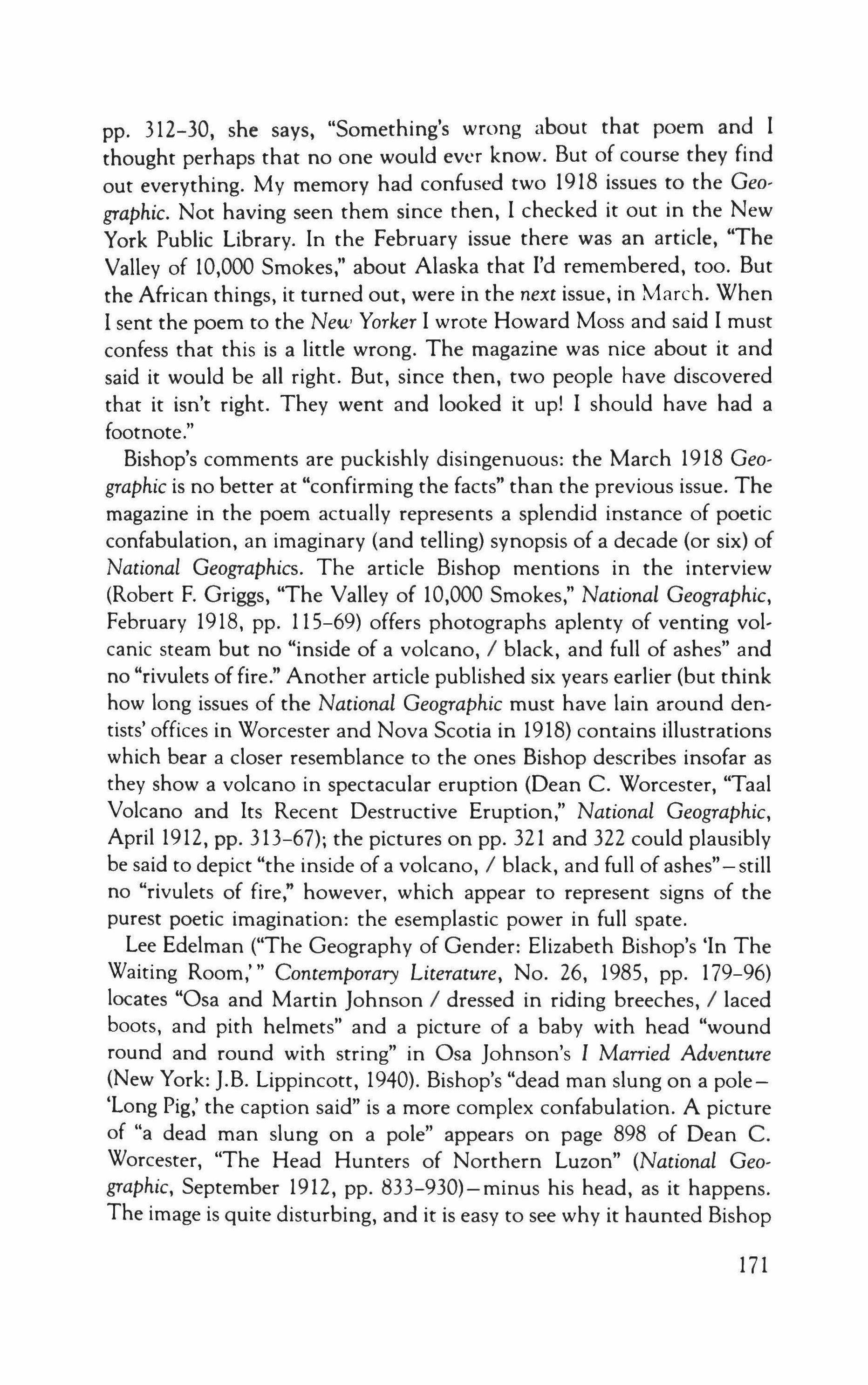
pp. 312-30, she says, "Something's wrong about that poem and I thought perhaps that no one would ever know. But of course they find out everything. My memory had confused two 1918 issues to the Geographic. Not having seen them since then, I checked it out in the New York Public Library. In the February issue there was an article, "The Valley of 10,000 Smokes," about Alaska that I'd remembered, too. But the African things, it turned out, were in the next issue, in March. When I sent the poem to the New Yorker I wrote Howard Moss and said I must confess that this is a little wrong. The magazine was nice about it and said it would be all right. But, since then, two people have discovered that it isn't right. They went and looked it up! I should have had a footnote."
Bishop's comments are puckishlv disingenuous: the March 1918 Geographic is no better at "confirming the facts" than the previous issue. The magazine in the poem actually represents a splendid instance of poetic confabulation, an imaginary (and telling) synopsis of a decade (or six) of National Geographics. The article Bishop mentions in the interview (Robert F. Griggs, "The Valley of 10,000 Smokes," National Geographic, February 1918, pp. 115-69) offers photographs aplenty of venting volcanic steam but no "inside of a volcano, / black, and full of ashes" and no "rivulets of fire." Another article published six years earlier (but think how long issues of the National Geographic must have lain around dentists' offices in Worcester and Nova Scotia in 1918) contains illustrations which bear a closer resemblance to the ones Bishop describes insofar as they show a volcano in spectacular eruption (Dean C. Worcester, "Taal Volcano and Its Recent Destructive Eruption," National Geographic, April 1912, pp. 313-67); the pictures on pp. 321 and 322 could plausibly be said to depict "the inside of a volcano, / black, and full of ashes" - still no "rivulets of fire," however, which appear to represent signs of the purest poetic imagination: the esemplastic power in full spate.
Lee Edelman ("The Geography of Gender: Elizabeth Bishop's 'In The Waiting Room,'" Contemporary Literature, No. 26, 1985, pp. 179-96) locates "Osa and Martin Johnson / dressed in riding breeches, / laced boots, and pith helmets" and a picture of a baby with head "wound round and round with string" in Osa Johnson's I Married Adventure (New York: J.B. Lippincott, 1940). Bishop's "dead man slung on a pole'Long Pig,' the caption said" is a more complex confabulation. A picture of "a dead man slung on a pole" appears on page 898 of Dean C. Worcester, "The Head Hunters of Northern Luzon" (National Geographic, September 1912, pp. 833-930)-minus his head, as it happens. The image is quite disturbing, and it is easy to see why it haunted Bishop
171
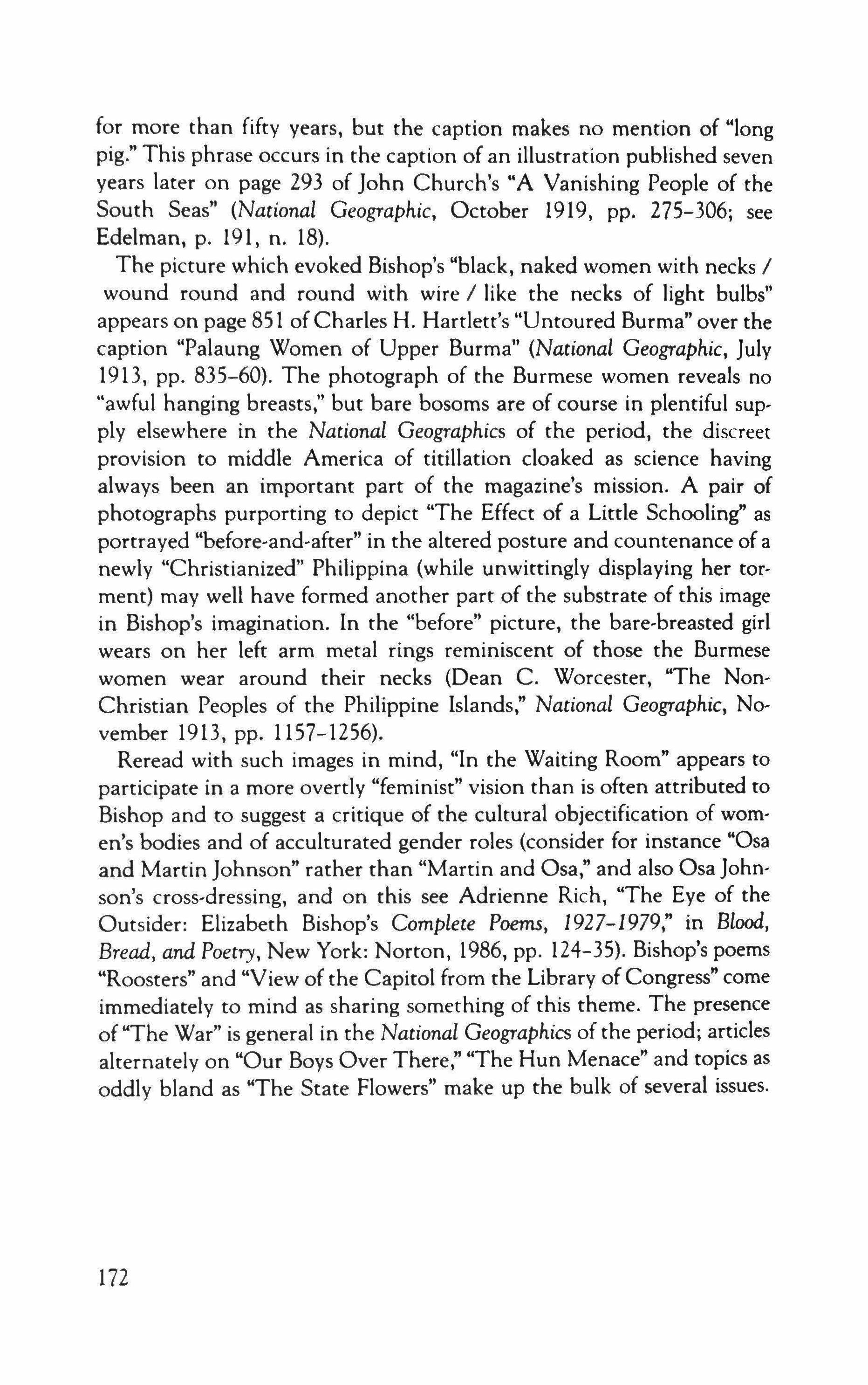
for more than fifty years, but the caption makes no mention of "long pig." This phrase occurs in the caption of an illustration published seven years later on page 293 of John Church's "A Vanishing People of the South Seas" (National Geographic, October 1919, pp. 275-306; see Edelman, p. 191, n. 18).
The picture which evoked Bishop's "black, naked women with necks / wound round and round with wire / like the necks of light bulbs" appears on page 851 of Charles H. Hartlett's "Untoured Burma" over the caption "Palaung Women of Upper Burma" (National Geographic, July 1913, pp. 835-60). The photograph of the Burmese women reveals no "awful hanging breasts," but bare bosoms are of course in plentiful supply elsewhere in the National Geographics of the period, the discreet provision to middle America of titillation cloaked as science having always been an important part of the magazine's mission. A pair of photographs purporting to depict "The Effect of a Little Schooling" as portrayed "before-and-after" in the altered posture and countenance of a newly "Christianized" Philippina (while unwittingly displaying her torment) may well have formed another part of the substrate of this image in Bishop's imagination. In the "before" picture, the bare-breasted girl wears on her left arm metal rings reminiscent of those the Burmese women wear around their necks (Dean C. Worcester, "The NonChristian Peoples of the Philippine Islands," National Geographic, November 1913, pp. 1157-1256).
Reread with such images in mind, "In the Waiting Room" appears to participate in a more overtly "feminist" vision than is often attributed to Bishop and to suggest a critique of the cultural objectification of women's bodies and of acculturated gender roles (consider for instance "Osa and Martin Johnson" rather than "Martin and Osa," and also Osa Johnson's cross-dressing, and on this see Adrienne Rich, "The Eye of the Outsider: Elizabeth Bishop's Complete Poems, 1927-1979," in Blood, Bread, and Poetry, New York: Norton, 1986, pp. 124-35). Bishop's poems "Roosters" and "View of the Capitol from the Library of Congress" come immediately to mind as sharing something of this theme. The presence of "The War" is general in the National Geographics of the period; articles alternately on "Our Boys Over There," "The Hun Menace" and topics as oddly bland as "The State Flowers" make up the bulk of several issues.
172

National Geographic's caption: "PALAUNG WOMEN OF UPPER BURMA. The females of one branch of the Karens and Palaungs wear brass rings around their necks, arms, and legs, weighing, it is said, 50 to 60 pounds. The neck rings, as thick as the little finger, are put on the girl in infancy, four or five rings at first and others added as fast as she grows, till 18 or 20 keep the neck always stretched."
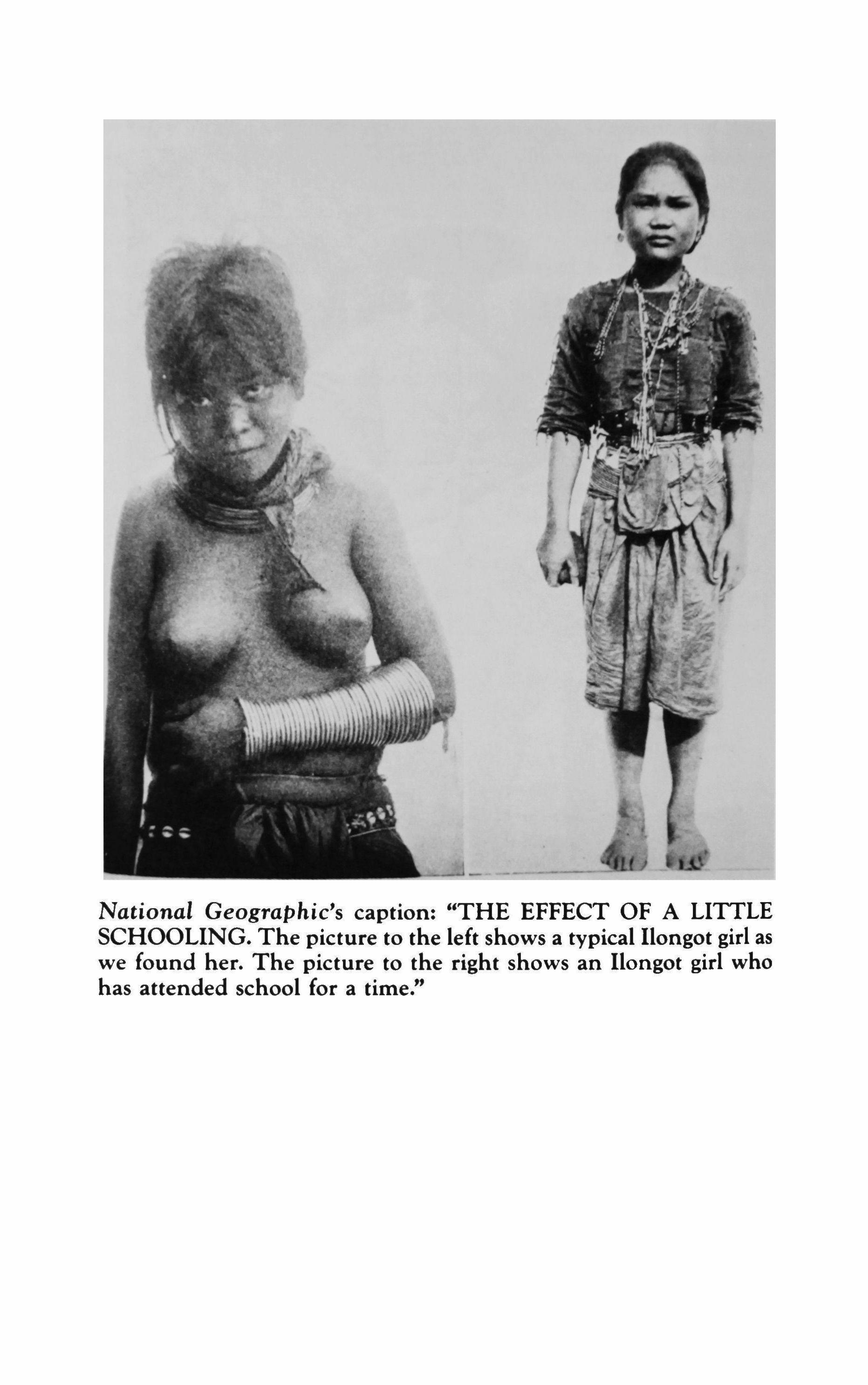
National Geographic's caption: "THE EFFECT OF A LITTLE SCHOOLING. The picture to the left shows a typical Ilongot girl as we found her. The picture to the right shows an Ilongot girl who has attended school for a time."
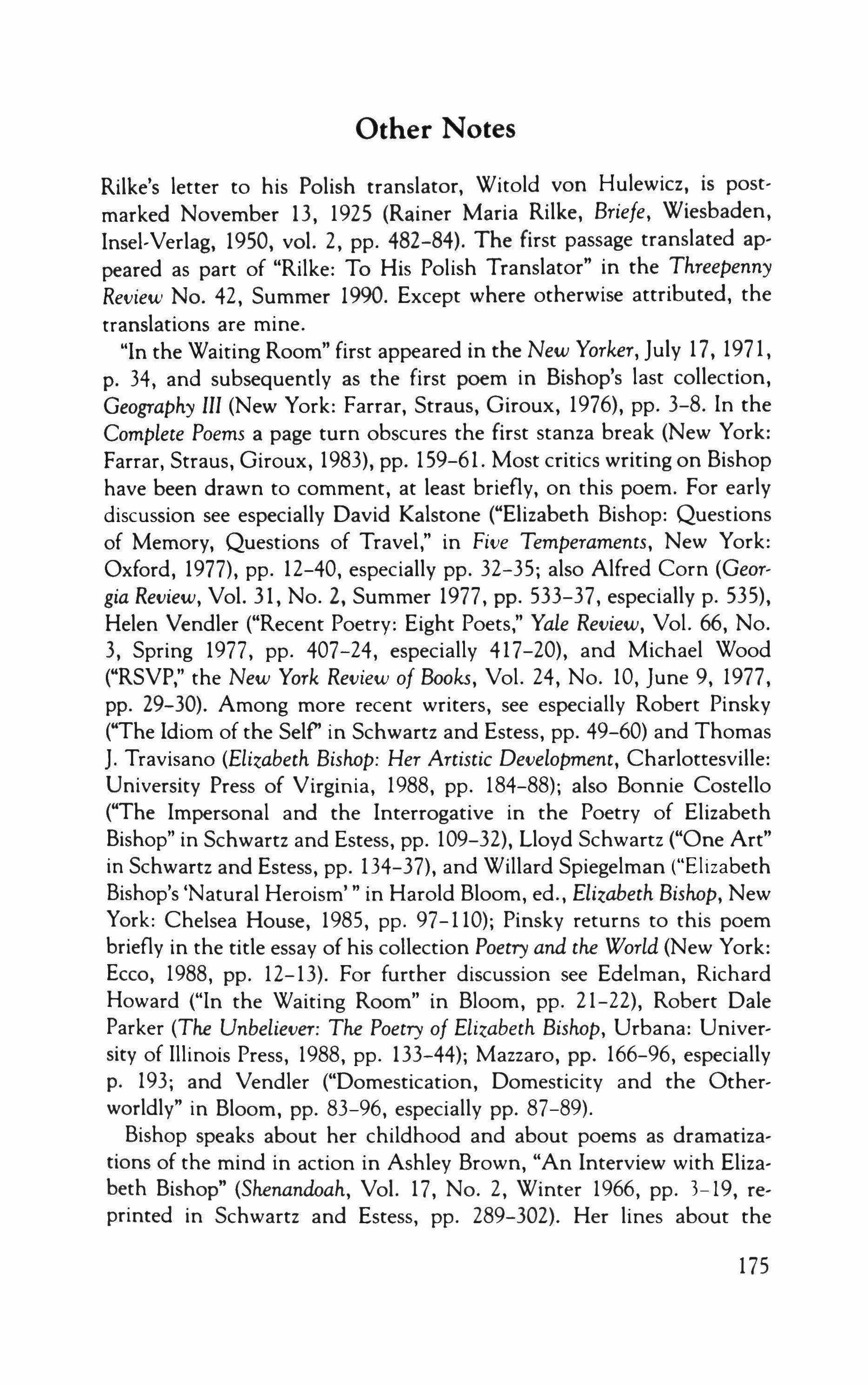
Other Notes
Rilke's letter to his Polish translator, Witold von Hulewicz, is postmarked November 13, 1925 (Rainer Maria Rilke, Briefe, Wiesbaden, lnsel-Verlag, 1950, vol. 2, pp. 482-84). The first passage translated appeared as part of "Rilke: To His Polish Translator" in the Threepenny Review No. 42, Summer 1990. Except where otherwise attributed, the translations are mine.
"In the Waiting Room" first appeared in the New Yorker, July 17, 1971, p. 34, and subsequently as the first poem in Bishop's last collection, Geography III (New York: Farrar, Straus, Giroux, 1976), pp. 3-8. In the Complete Poems a page turn obscures the first stanza break (New York: Farrar, Straus, Giroux, 1983), pp. 159-61. Most critics writing on Bishop have been drawn to comment, at least briefly, on this poem. For early discussion see especially David Kalstone ("Elizabeth Bishop: Questions of Memory, Questions of Travel," in Five Temperaments, New York: Oxford, 1977), pp. 12-40, especially pp. 32-35; also Alfred Corn (Georgia Review, Vol. 31, No.2, Summer 1977, pp. 533-37, especially p. 535), Helen Vendler ("Recent Poetry: Eight Poets," Yale Review, Vol. 66, No. 3, Spring 1977, pp. 407-24, especially 417-20), and Michael Wood ("RSVP," the New York Review of Books, Vol. 24, No. 10, June 9, 1977, pp. 29-30). Among more recent writers, see especially Robert Pinsky ("The Idiom of the Self" in Schwartz and Estess, pp. 49-60) and Thomas J. Travisano (Elizabeth Bishop: Her Artistic Development, Charlottesville: University Press of Virginia, 1988, pp. 184-88); also Bonnie Costello ("The Impersonal and the Interrogative in the Poetry of Elizabeth Bishop" in Schwartz and Estess, pp. 109-32), Lloyd Schwartz ("One Art" in Schwartz and Estess, pp. 134-37), and Willard Spiegelman C'Elizabeth Bishop's 'Natural Heroism' " in Harold Bloom, ed., Elizabeth Bishop, New York: Chelsea House, 1985, pp. 97-110); Pinsky returns to this poem briefly in the title essay of his collection Poetry and the World (New York: Ecco, 1988, pp. 12-13). For further discussion see Edelman, Richard Howard ("In the Waiting Room" in Bloom, pp. 21-22), Robert Dale Parker (The Unbeliever: The Poetry of Elizabeth Bishop, Urbana: University of Illinois Press, 1988, pp. 133-44); Mazzaro, pp. 166-96, especially p. 193; and Vendler ("Domestication, Domesticity and the Otherworldly" in Bloom, pp. 83-96, especially pp. 87-89).
Bishop speaks about her childhood and about poems as dramatizations of the mind in action in Ashley Brown, "An Interview with Elizabeth Bishop" (Shenandoah, Vol. 17, No.2, Winter 1966, pp. 3-19, reprinted in Schwartz and Estess, pp. 289-302). Her lines about the
175
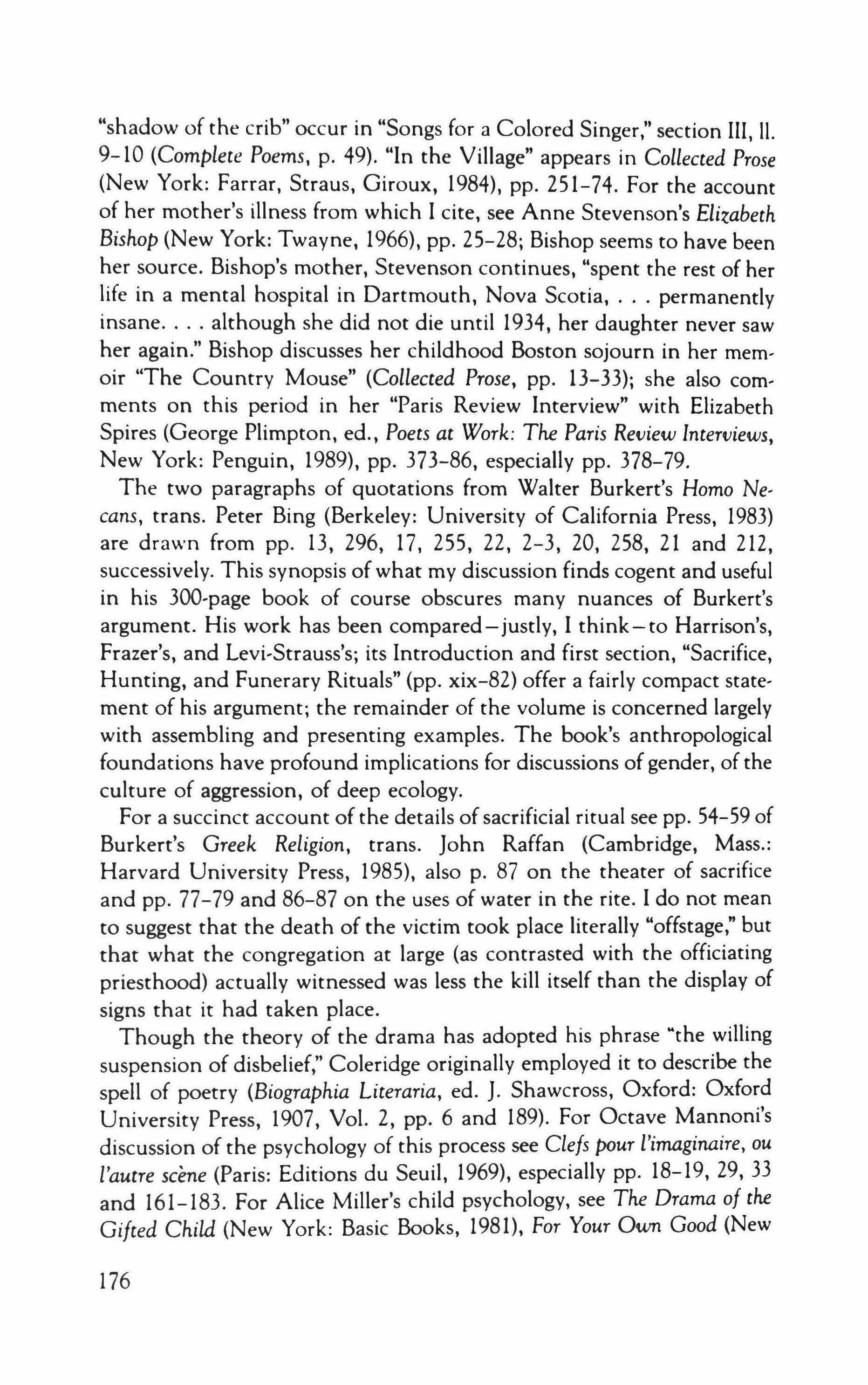
"shadow of the crib" occur in "Songs for a Colored Singer," section Ill, II. 9-10 (Complete Poems, p. 49). "In the Village" appears in Collected Prose (New York: Farrar, Straus, Giroux, 1984), pp. 251-74. For the account of her mother's illness from which I cite, see Anne Stevenson's Elizabeth Bishop (New York: Twayne, 1966), pp. 25-28; Bishop seems to have been her source. Bishop's mother, Stevenson continues, "spent the rest of her life in a mental hospital in Dartmouth, Nova Scotia, permanently insane although she did not die until 1934, her daughter never saw her again." Bishop discusses her childhood Boston sojourn in her memoir "The Country Mouse" (Collected Prose, pp. 13-33); she also comments on this period in her "Paris Review Interview" with Elizabeth Spires (George Plimpton, ed., Poets at Work: The Paris Review Interviews, New York: Penguin, 1989), pp. 373-86, especially pp. 378-79.
The two paragraphs of quotations from Walter Burkert's Homo Necans, trans. Peter Bing (Berkeley: University of California Press, 1983) are drawn from pp. 13, 296, 17, 255, 22, 2-3, 20, 258, 21 and 212, successively. This synopsis of what my discussion finds cogent and useful in his 300-page book of course obscures many nuances of Burkert's argument. His work has been compared-justly, I think-to Harrison's, Frazer's, and Levi-Strauss's; its Introduction and first section, "Sacrifice, Hunting, and Funerary Rituals" (pp. xix-82) offer a fairly compact statement of his argument; the remainder of the volume is concerned largely with assembling and presenting examples. The book's anthropological foundations have profound implications for discussions of gender, of the culture of aggression, of deep ecology.
For a succinct account of the details ofsacrificial ritual see pp. 54-59 of Burkert's Greek Religion, trans. John Raffan (Cambridge, Mass.: Harvard University Press, 1985), also p. 87 on the theater of sacrifice and pp. 77-79 and 86-87 on the uses of water in the rite. I do not mean to suggest that the death of the victim took place literally "offstage," but that what the congregation at large (as contrasted with the officiating priesthood) actually witnessed was less the kill itself than the display of signs that it had taken place.
Though the theory of the drama has adopted his phrase "the willing suspension of disbelief," Coleridge originally employed it to describe the spell of poetry (Biographia Literaria, ed. J. Shawcross, Oxford: Oxford University Press, 1907, Vol. 2, pp. 6 and 189). For Octave Mannoni's discussion of the psychology of this process see Clefs pour l'imaginaire, ou l'autre scene (paris: Editions du Seuil, 1969), especially pp. 18-19, 29, 33 and 161-183. For Alice Miller's child psychology, see The Drama of the Gifted Child (New York: Basic Books, 1981), For Your Own Good (New
176
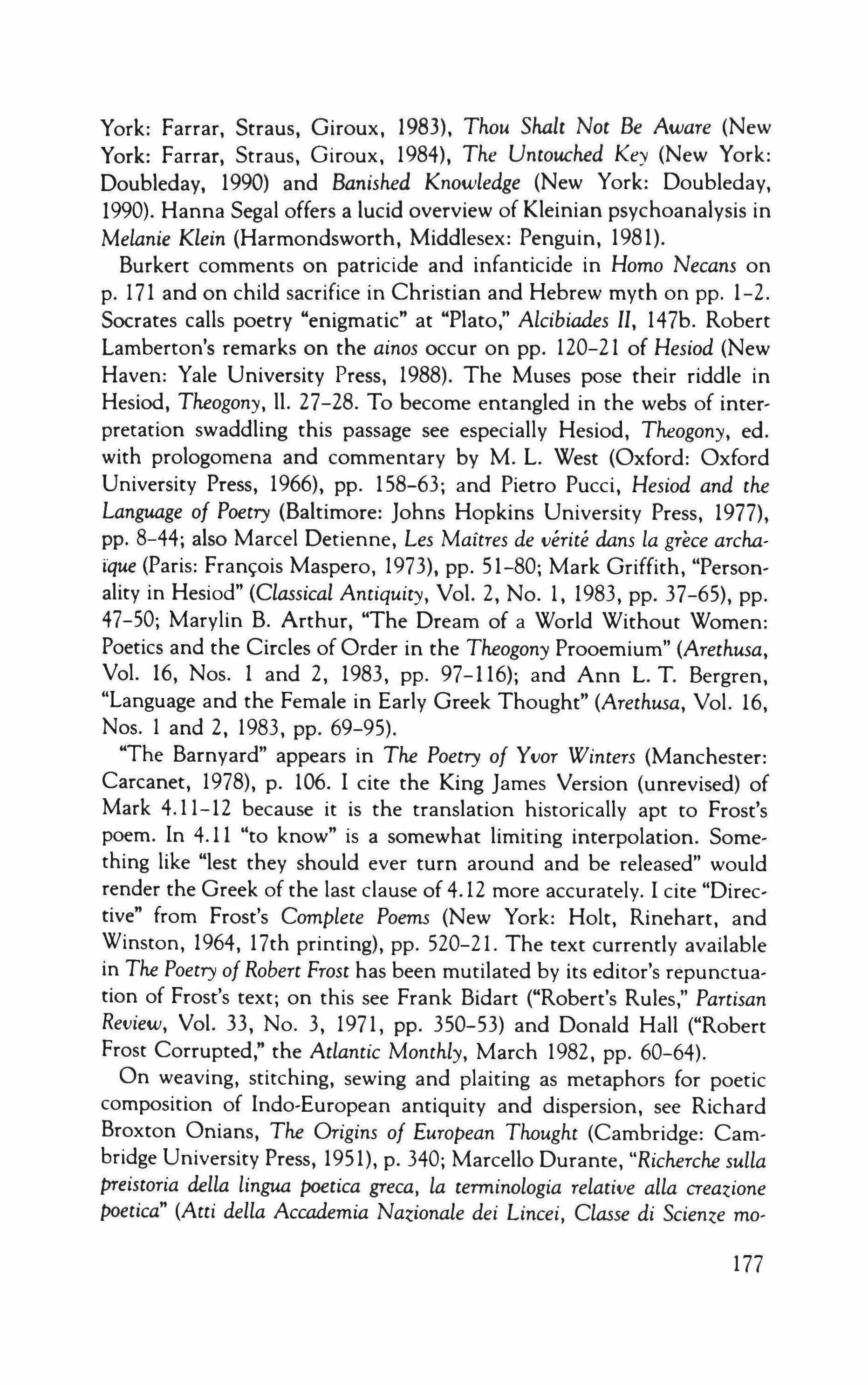
York: Farrar, Straus, Giroux, 1983), Thou Shalt Not Be Aware (New York: Farrar, Straus, Giroux, 1984), The Untouched Key (New York: Doubleday, 1990) and Banished Knowledge (New York: Doubleday, 1990). Hanna Segal offers a lucid overview of Kleinian psychoanalysis in Melanie KLein (Harmondsworth, Middlesex: Penguin, 1981).
Burkert comments on patricide and infanticide in Homo Necans on p. 171 and on child sacrifice in Christian and Hebrew myth on pp. 1-2. Socrates calls poetry "enigmatic" at "Plato," Alcibiades II, 147b. Robert Lamberton's remarks on the ainos occur on pp. 120-21 of Hesiod (New Haven: Yale University Press, 1988). The Muses pose their riddle in Hesiod, Theogony, II. 27-28. To become entangled in the webs of interpretation swaddling this passage see especially Hesiod, Theogony, ed. with prologomena and commentary by M. L. West (Oxford: Oxford University Press, 1966), pp. 158-63; and Pietro Pucci, Hesiod and the Language of Poetry (Baltimore: Johns Hopkins University Press, 1977), pp. 8-44; also Marcel Detienne, Les Maitres de verite dans La grece archai"que (Paris: Francois Maspero, 1973), pp. 51-80; Mark Griffith, "Personality in Hesiod" (ClassicaL Antiquity, Vol. 2, No. I, 1983, pp. 37-65), pp. 47-50; Marylin B. Arthur, "The Dream of a World Without Women: Poetics and the Circles of Order in the Theogony Prooemium" (Arethusa, Vol. 16, Nos. 1 and 2, 1983, pp. 97-116); and Ann L. T. Bergren, "Language and the Female in Early Greek Thought" (Arethusa, Vol. 16, Nos. 1 and 2, 1983, pp. 69-95).
"The Barnyard" appears in The Poetry of Yvor Winters (Manchester: Carcanet, 1978), p. 106. 1 cite the King James Version (unrevised) of Mark 4.11-12 because it is the translation historically apt to Frost's poem. In 4.11 "to know" is a somewhat limiting interpolation. Something like "lest they should ever turn around and be released" would render the Greek of the last clause of 4.12 more accurately. 1 cite "Directive" from Frost's CompLete Poems (New York: Holt, Rinehart, and Winston, 1964, 17th printing), pp. 520-21. The text currently available in The Poetry of Robert Frost has been mutilated by its editor's repunctuation of Frost's text; on this see Frank Bidart ("Robert's Rules," Partisan Review, Vol. 33, No.3, 1971, pp. 350-53) and Donald Hall ("Robert Frost Corrupted," the Atlantic MonthLy, March 1982, pp. 60-64).
On weaving, stitching, sewing and plaiting as metaphors for poetic composition of Indo-European antiquity and dispersion, see Richard Broxton Onians, The Origins of European Thought (Cambridge: Cambridge University Press, 1951), p. 340; Marcello Durante, "Richerche sulla pteiscoria della Lingua poetica greca, La terminologia relative alla creazione poetica" (Arn della Accademia NazionaLe dei Lincei, Classe di Scienze mo-
177

rale, storiche e filologiche, Ser. 8, Vol. IS, Nos. 5 and 6,1960, pp. 231-49), pp. 238-44; Rudiger Schmitt, Dichtung und Dichtersprache in indogermanischer Zeit (Wiesbaden: Harrassowitz, 1967), pp. 300-01; M. L. West, "Greek Poetry 2000-700 B.C." (Classical Quarterly No. 67, 1973, pp. 179-92), p. 179; and Ann L. T. Bergren, "Helen's Web: Time and Tableau in the Iliad" (Helios, Vol. 7, No.1, 1980, pp. 19-34), pp. 23 and 31-32.
Kenneth Rexroth derives the phrase "presentational immediacy" from Whitehead. On poetry as reconsidered speech see Dante, La Vita Nuooa 24, "ripensando;" Ben Jonson, "To The Memory Of My Beloved, The Author Mr. William Shakespeare And What He Hath Left Us," ll. 55-62; Goethe, letter to Wilhelm von Humboldt, March 17, 1832, "Nachdenken"; Wordsworth, "Preface to Lyrical Ballads (1802)" (Poems, New Haven: Yale University Press, 1972), Vol. I, p. 886, "recollection"; Wallace Stevens (The Necessary Angel: Essays on Reality and the Imagination, New York: Random House, 1951), p. 109, "reflection"; W. H. Auden, "Making, Knowing and Judging" (The Dyer's Hand, New York: Random House, 1989), pp. 31-60.
The lines from Shakespeare are Sonnet 77.9-12. The verse from the Iliad is 11.403. On Homeric psychophysiology see Onians. Rimbaud's famous phrase occurs in his letter of May 13, 1871 to Georges Izambard. The line of Yeats is from "The Statues." For George Oppen's phrase see 'Meaning is to be Here,' A Selection from the Daybook" (Conjunctions, No. 10, 1987, pp. 186-208), p. 188. The quotation from Stevens appears on p. 36 of The Necessary Angel. The lines from Williams can be found on p. 207 of Paterson (New York: New Directions, 1963). A second edition of Thomas S. Kuhn's The Structure of Scientific Revolutions appeared in 1970 (Chicago: University of Chicago Press).
178
Two Poems
Dabney Stuart Seesaw

a birthday poem
Welcome to the big fifty, fulcrum, or not, as you choose how life tilts your soul and bones. It's unsteady, and sharp, alike to the dull and heavy-footed and the gazelle-quick, who balance and look into the dark at either end, where a glint of galled fire shoots like sunlight off an ax raised and falling into the winter wood, splitting it for the hearth. Age burns, and is burned. And it's a good thing, too, for who would seek out the corded years again, to feel them add circle to circle only for another felling? Better the long growth and smolder, banked according to one's sense
179
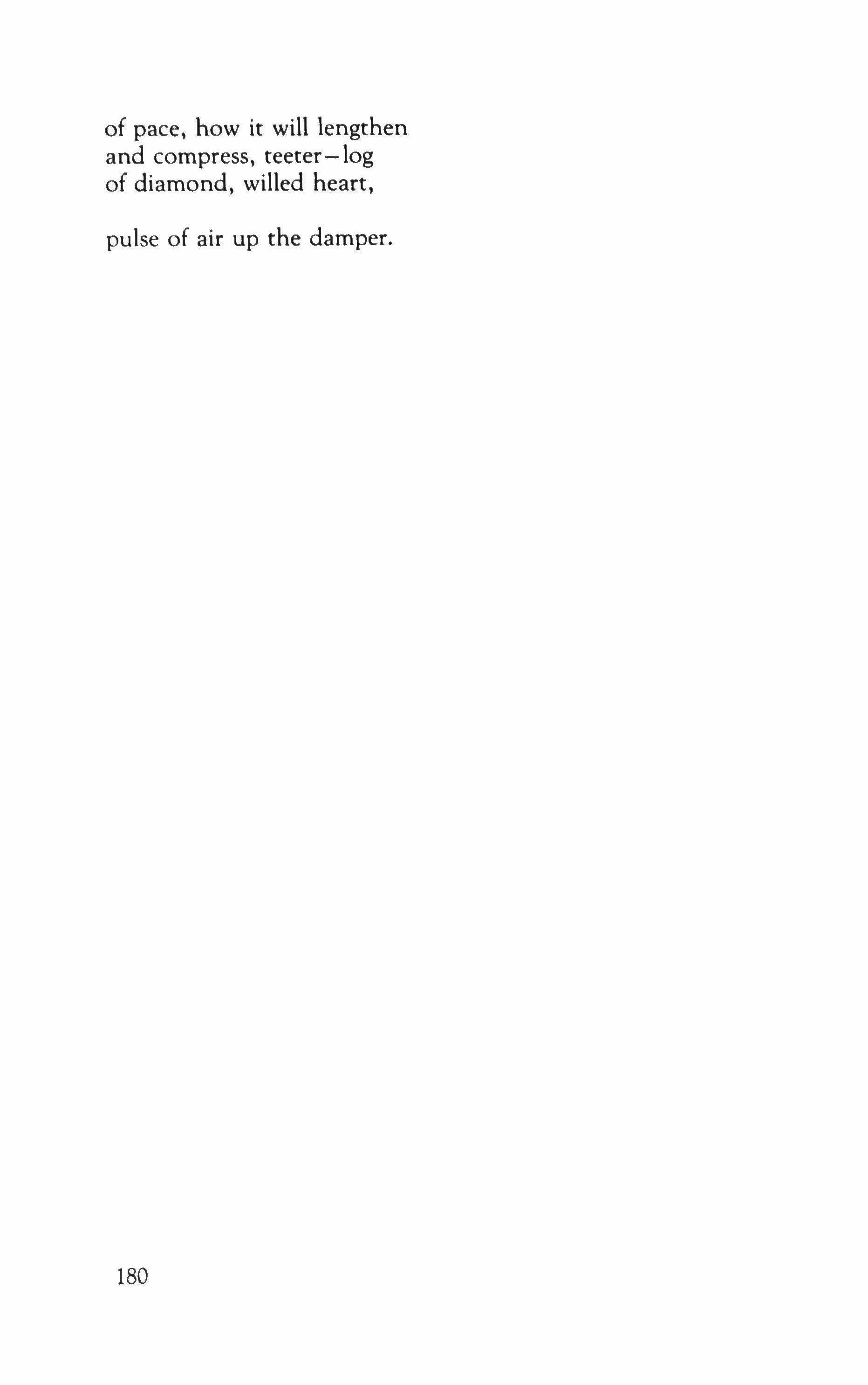
of pace, how it will lengthen and compress, teeter-log of diamond, willed heart, pulse of air up the damper.
180
Grubbing Thistle
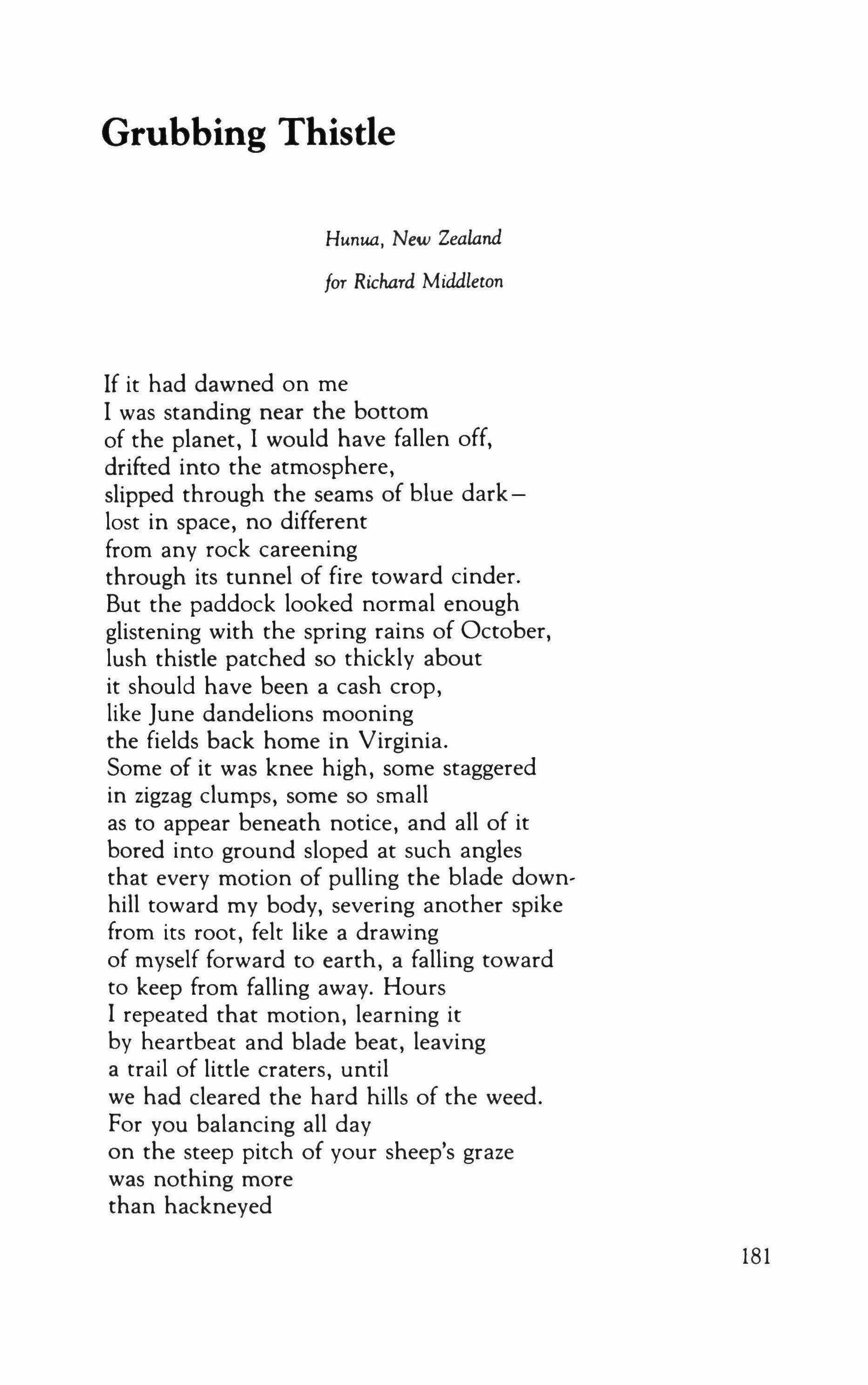
Hunua, New Zealand
for Richard Middleton
If it had dawned on me
I was standing near the bottom of the planet, I would have fallen off, drifted into the atmosphere, slipped through the seams of blue darklost in space, no different from any rock careening through its tunnel of fire toward cinder. But the paddock looked normal enough glistening with the spring rains of October, lush thistle patched so thickly about it should have been a cash crop, like June dandelions mooning the fields back home in Virginia. Some of it was knee high, some staggered in zigzag clumps, some so small as to appear beneath notice, and all of it bored into ground sloped at such angles that every motion of pulling the blade downhill toward my body, severing another spike from its root, felt like a drawing of myself forward to earth, a falling toward to keep from falling away. Hours I repeated that motion, learning it by heartbeat and blade beat, leaving a trail of little craters, until we had cleared the hard hills of the weed. For you balancing all day on the steep pitch of your sheep's graze was nothing more than hackneyed
181
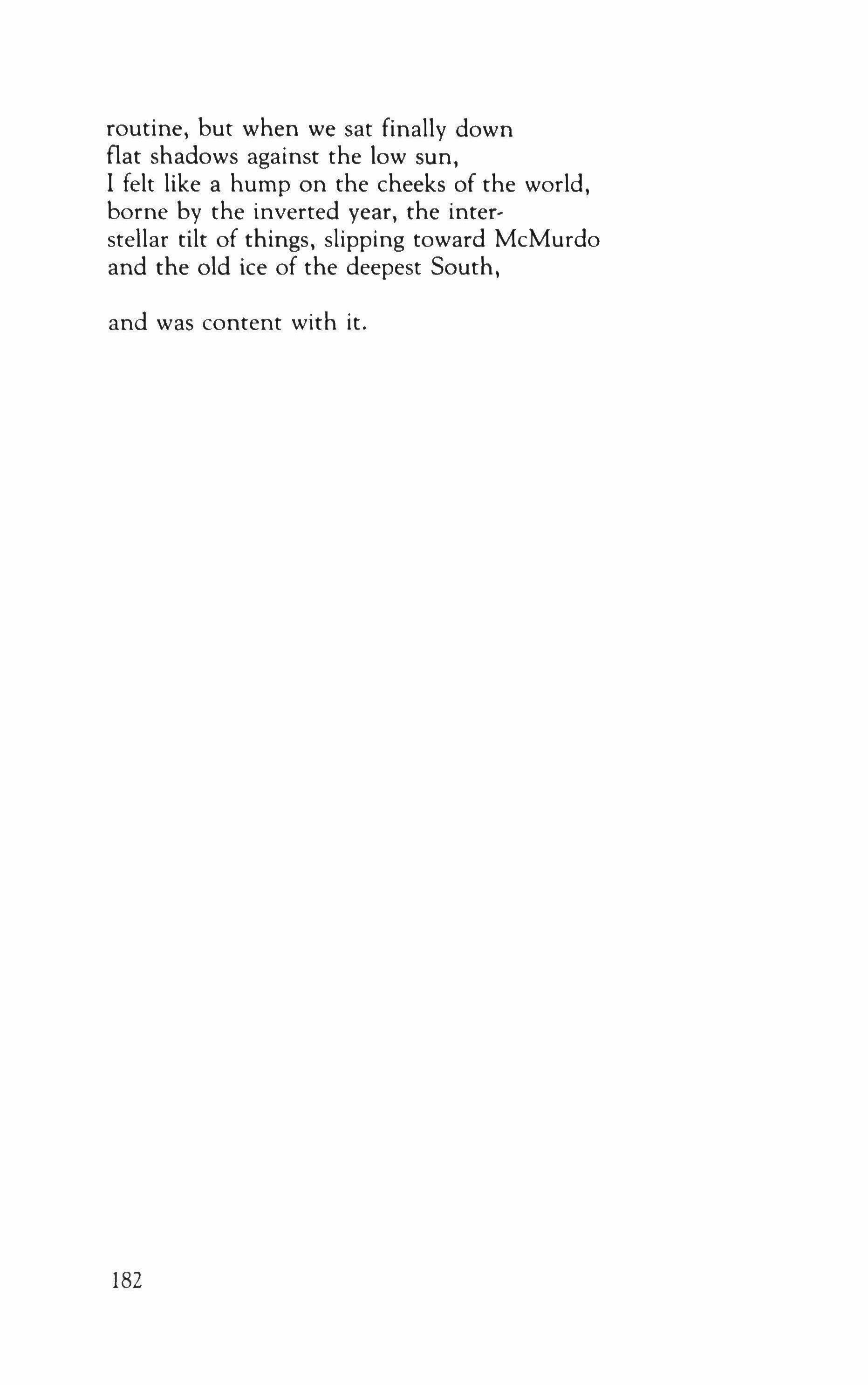
routine, but when we sat finally down flat shadows against the low sun, I felt like a hump on the cheeks of the world, borne by the inverted year, the interstellar tilt of things, slipping toward McMurdo and the old ice of the deepest South, and was content with it.
182
Plaintive Song to the Members of My Generation
Istvan Csukas

We are slowly gathering into ranks, we who are over forty, former boys and girls, we seize each other's hands and go forward humming pertly, but with eyes already squinting; the evergreen years remain behind, the wild-scented grassbeds, where we took pleasure in each other's bodies, milk-scented kids, the school's hallways are sinking where we tried again and again the adolescence-kiss, the coughing toilets are dissolving with the inhaled cigarette smoke, and the schoolgate molders as well, although its clanging still sounds in our ears; right now we shave ourselves daily, looking piercingly into the mirror, the women the wrinkles, the men the spite, because we've become men and women, and we were scattered among the age-groups, losing sight of each other, and we were paddling in the big pool that is called life, above water, below water, that once was hot, another time stiffeningly icy, we were drowning and were sunbathing, the god would not have recognized us anymore, even if there was a collective Eden in our hearts, yet so many things had already settled in it,
183
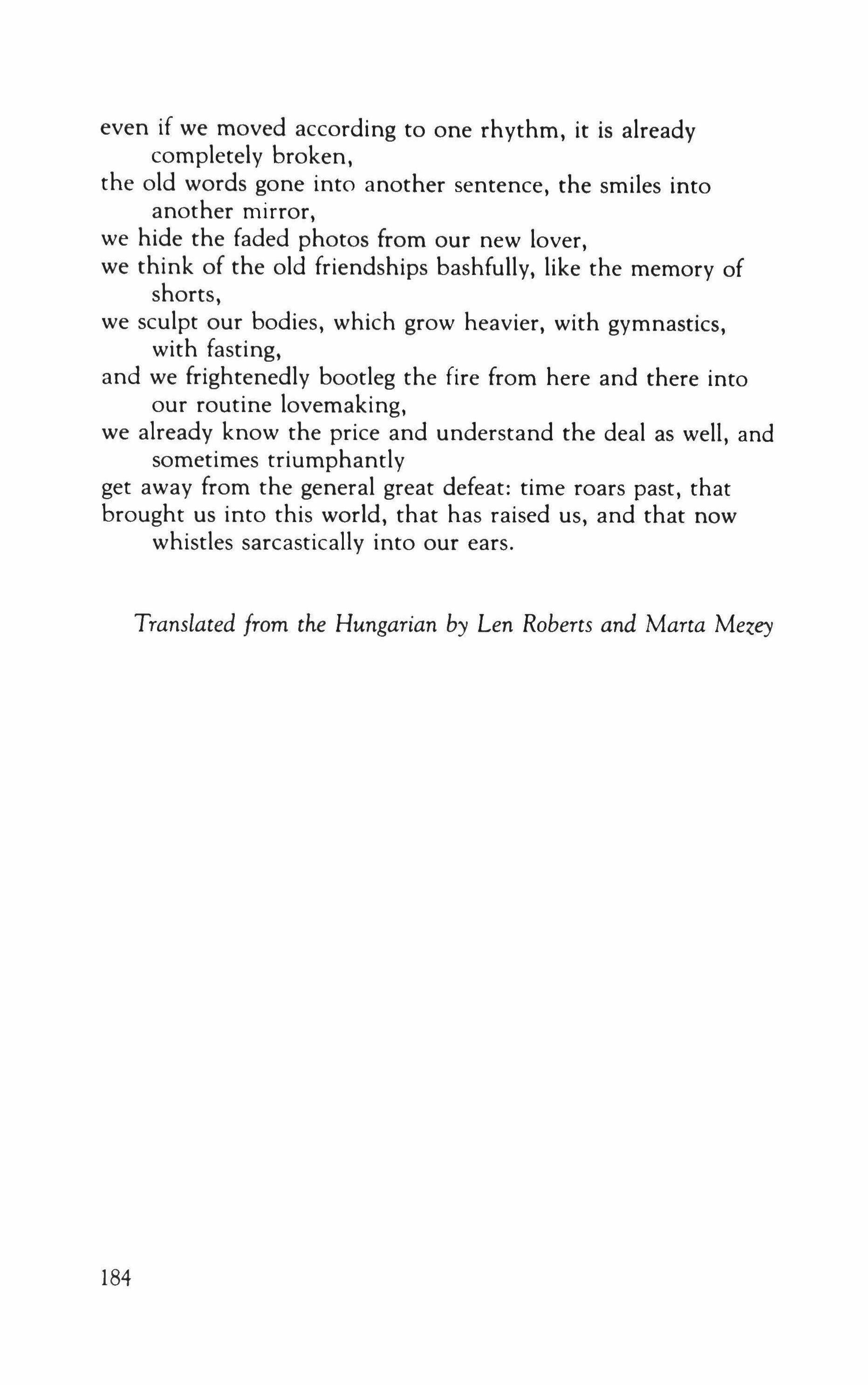
even if we moved according to one rhythm, it is already completely broken, the old words gone into another sentence, the smiles into another mirror, we hide the faded photos from our new lover, we think of the old friendships bashfully, like the memory of shorts, we sculpt our bodies, which grow heavier, with gymnastics, with fasting, and we frightenedly bootleg the fire from here and there into our routine lovemaking, we already know the price and understand the deal as well, and sometimes triumphantly get away from the general great defeat: time roars past, that brought us into this world, that has raised us, and that now whistles sarcastically into our ears.
Translated from the Hungarian by Len Roberts and Marta Mezey
184
Two Poems
Daniel Halpern

For the Unidentified
From above the park is bruised surface, unilluminated, thick enough to disallow
even the bright bounding of the imagination. Why not? -this spring night so cool the room's
heat finds itself possessive, brutal against the chilled window glass that responds in fog. A blur now the participants who gather at the park edge active where a midnight collision has occurred to bring us from sleep to the window already blood-filled with the lights of service vehicles. What did we say of our names? The injured out there won't feel the chill, nor pain in shock.
The park from above is area blotted out. Perhaps we are so hopeless that being lost there
is safer than finding our way to this. What do you think? We consider ourselves lucky,
185
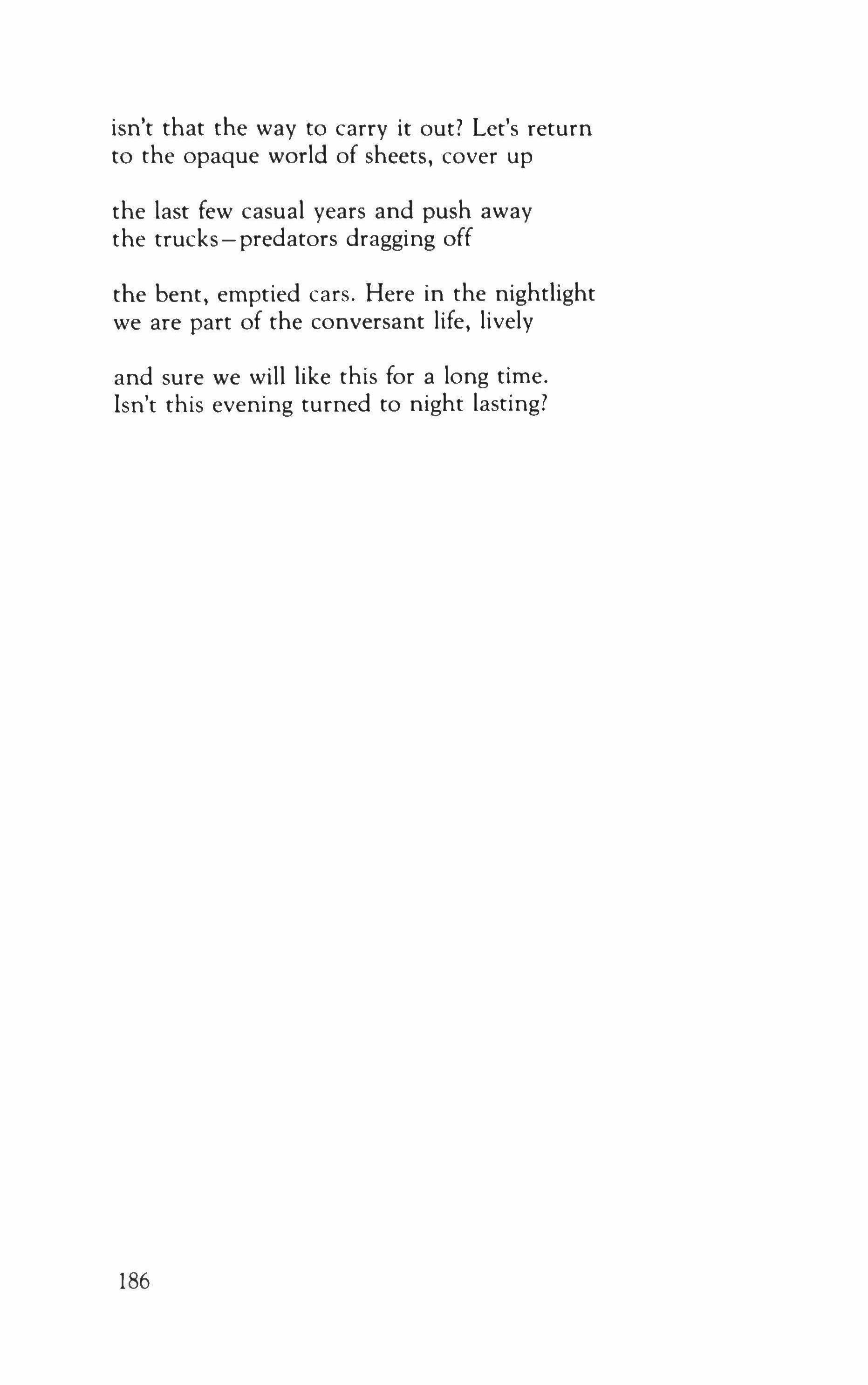
isn't that the way to carry it out? Let's return to the opaque world of sheets, cover up
the last few casual years and push away the trucks-predators dragging off
the bent, emptied cars. Here in the nightlight we are part of the conversant life, lively and sure we will like this for a long time. Isn't this evening turned to night lasting?
186
Last Dance

Heard melodies are sweet, buc chose unheard Are sweeter; cherefore, ye sofe pipes, play on - John Keats
but oh chat 1 was young again, and held her in my arms.
-w. B. Yeats
You were dancing. You were dancing but without music, although the music played, tunes that would have reminded you death once seemed so very far away. You spent entire nights adding on your fingers how many more times you could live again your ten years before reaching seventy. Six more lifetimessix more times around the short block you'd already run. And even then it seemed so short a time, with so much still ahead clouding the future with one mystery or another.
But you were dancing, her head sending to you
187

dark scents of hair, the outer ring of her ear part of your peripheral vision. Years of dancing told you her eyes were lightly closed, tapping out the little light left in the room of dancers with spinning globes of reflected light, the bass a heart between your hearts. Of the seven lives you granted yourself, you'd now used four, addition no longer required. You thought living to forty was luck and everything after what we call gravy. And here you are, lucky but forty nonetheless, counting what remains but not with fingerswhat one friend called the collapse of the body biology, sure signs, the reddening of leaves out of deep summer, the level road that suddenly turns uphill. She's asleep standing, her fingers dead weight in your hand, her head beyond music, listening to your music. That's right, you were dancing
188

without music in music, the years rolling off the lasting remembered melodies.
You were dancing a slow dance, but you were dancing.
189
The Gold Note Lounge and Boogie Palace
Albert Goldbarth

She was a smoky-throated eel-boned woman, that's for sure; and, as she danced, the denim countermambo of her hips implicated the whole of the room - t he women as well as the men, knocked into a rapt daze by this living faucet of sexual hotchacha. I remember a thickly amber beer-and-bourbon slowness to the air, that bar-air, you know it-like grimy honey. I remember a note the sax held, it was a coalburning train's moaned o's ripped straight down the middle. Something beautiful and sad and ugly was going to happen, something very human, with its licked lips and its bellvhairs, with its rinkytink diversions and its handbills for the next week's band. But now what we have is another slice-of-blues-and-lowlife exercise, when what I wanted was something else entirely: outside, the pebble lot is cool and gray. You only need to saunter two, three steps away, and its surface is already smooth. The city beyond is like that, too-its deeply-cratered griefs and highstrung pleasures are, with distance, no more grained than a lizardskin bag. Some highways. A dump. The rim of slag plants. Then the plain itself, the muscular redclay plain - below those stars that burn in sky like its adrenalin. Then foothills. Then, past even that darkly purple ruff, the mountains-where the gods live, Zeus and Aphrodite, Yahweh, Condor-lightning-Flinger, the whole gang. Their view is well, to them the icing-over of Lake Caudell is like the closing to bone
190
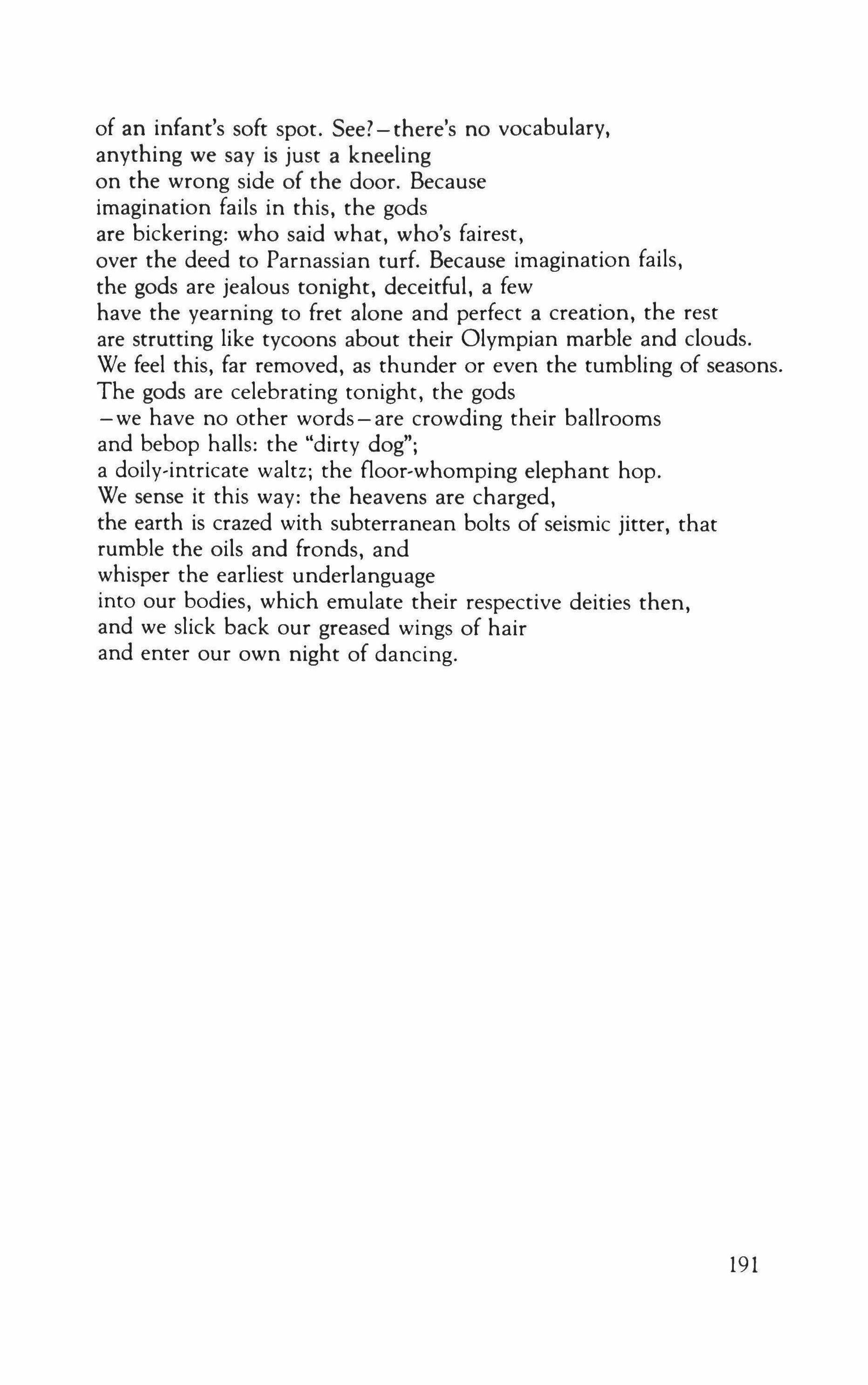
of an infant's soft spot. See? - there's no vocabulary, anything we say is just a kneeling on the wrong side of the door. Because imagination fails in this, the gods are bickering: who said what, who's fairest, over the deed to Parnassian turf. Because imagination fails, the gods are jealous tonight, deceitful, a few have the yearning to fret alone and perfect a creation, the rest are strutting like tycoons about their Olympian marble and clouds. We feel this, far removed, as thunder or even the tumbling of seasons. The gods are celebrating tonight, the gods -we have no other words-are crowding their ballrooms and bebop halls: the "dirty dog"; a doily-intricate waltz; the floor-whomping elephant hop. We sense it this way: the heavens are charged, the earth is crazed with subterranean bolts of seismic jitter, that rumble the oils and fronds, and whisper the earliest underlanguage into our bodies, which emulate their respective deities then, and we slick back our greased wings of hair and enter our own night of dancing.
191
Three Poems
Sheila P. Donohue
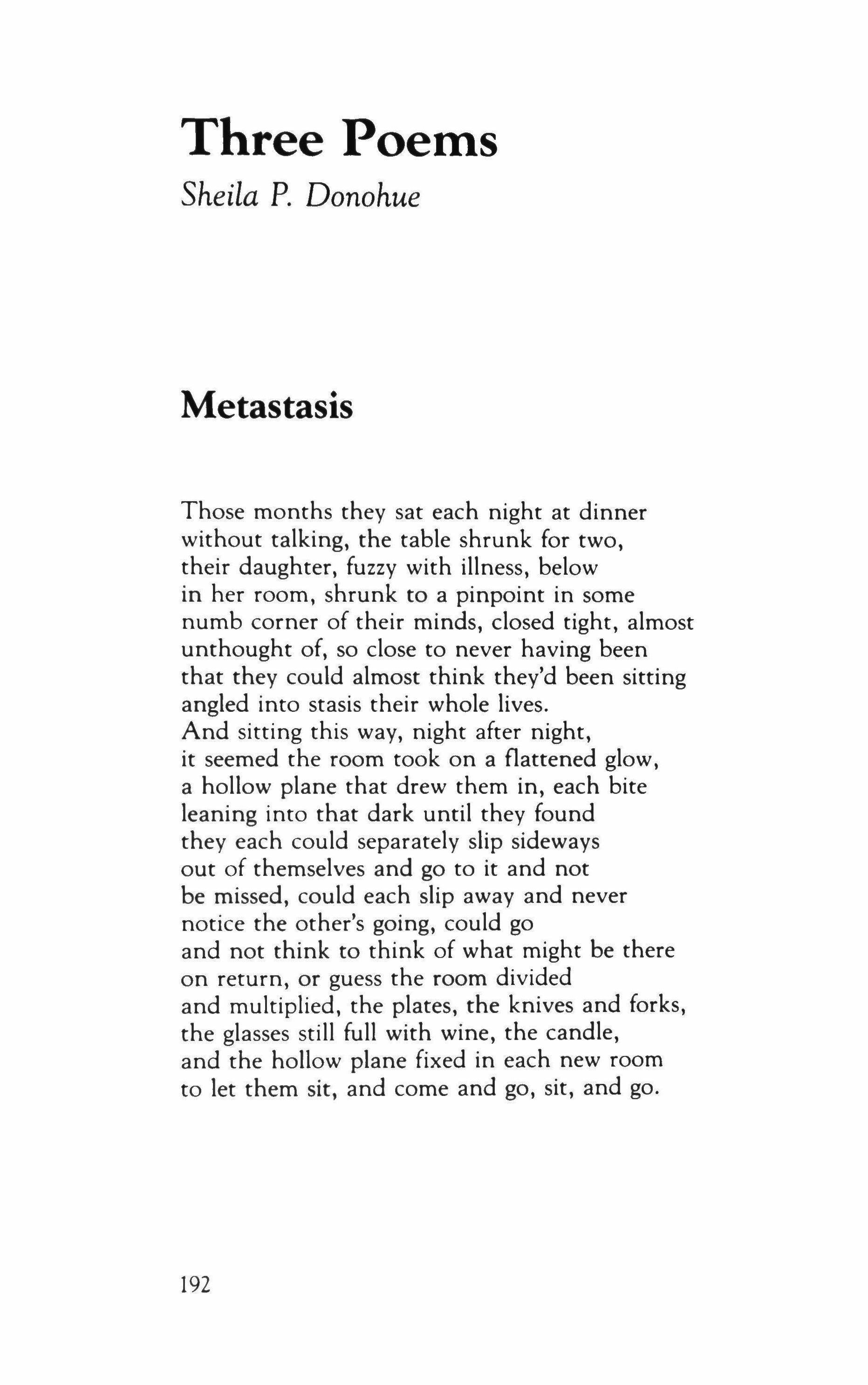
Metastasis
Those months they sat each night at dinner without talking, the table shrunk for two, their daughter, fuzzy with illness, below in her room, shrunk to a pinpoint in some numb corner of their minds, closed tight, almost unthought of, so close to never having been that they could almost think they'd been sitting angled into stasis their whole lives. And sitting this way, night after night, it seemed the room took on a flattened glow, a hollow plane that drew them in, each bite leaning into that dark until they found they each could separately slip sideways out of themselves and go to it and not be missed, could each slip away and never notice the other's going, could go and not think to think of what might be there on return, or guess the room divided and multiplied, the plates, the knives and forks, the glasses still full with wine, the candle, and the hollow plane fixed in each new room to let them sit, and come and go, sit, and go.
192
Clean and Fine
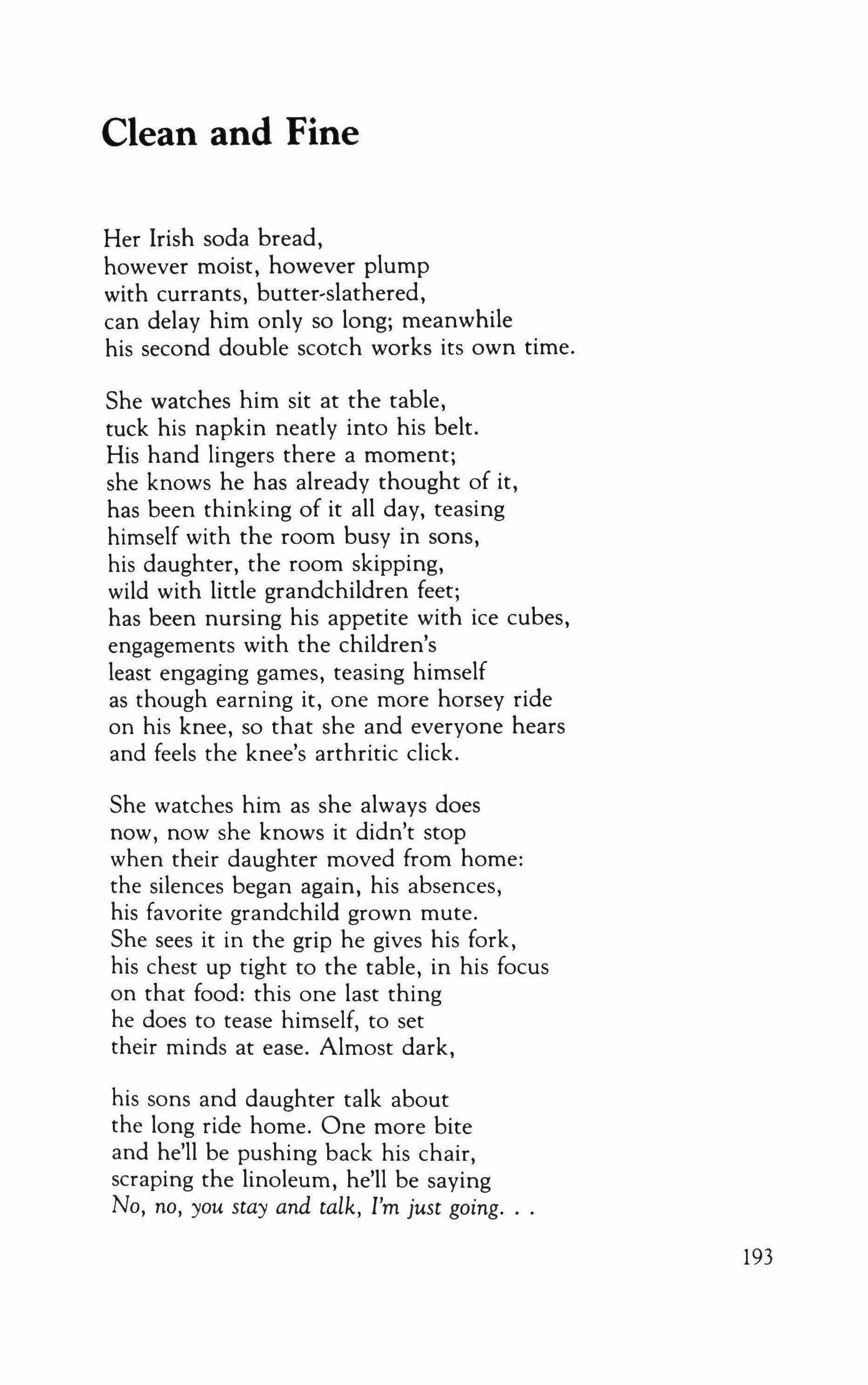
Her Irish soda bread, however moist, however plump with currants, butter-slathered, can delay him only so long; meanwhile his second double scotch works its own time.
She watches him sit at the table, tuck his napkin neatly into his belt. His hand lingers there a moment; she knows he has already thought of it, has been thinking of it all day, teasing himself with the room busy in sons, his daughter, the room skipping, wild with little grandchildren feet; has been nursing his appetite with ice cubes, engagements with the children's least engaging games, teasing himself as though earning it, one more horsey ride on his knee, so that she and everyone hears and feels the knee's arthritic click.
She watches him as she always does now, now she knows it didn't stop when their daughter moved from home: the silences began again, his absences, his favorite grandchild grown mute. She sees it in the grip he gives his fork, his chest up tight to the table, in his focus on that food: this one last thing he does to tease himself, to set their minds at ease. Almost dark,
his sons and daughter talk about the long ride home. One more bite and he'll be pushing back his chair, scraping the linoleum, he'll be saying No, no, you stay and talk, I'm just going
193

And they will stay and talk, the sons at ease, oblivious as always, her daughter deep in this conspiracy of love, or fear, mired in these walls where she has never grown up, still silent, the first to please him, to deliver each request, fresh drink, the paper, but always at a distance, body rooted, arm outstretched, the distance widening as she grew tall, every muscle toned for this evasion: her daughter, tensed to deafness with his love. But as they talk,
she, not his daughter, will hear his footsteps on the stairway down to the den, imagine his gait to the easy chair; will almost hear the click and whine swinging to recline; and the one grandchild, too nervous to eat, maybe thinking, The farthest room, the deepest in the ground, the darkest room where he can't find me, being called and called, until his call becomes command, resistance high treason, until the child rises, stumbles sleepily to his chair, is snaked up onto his lap, his hands wrapped around her ribs- What happens in that silence, this It, what must she think to seethose hands she knows better than her own?; what must she think to feel-that child's smoothness broken by his calloused palms?; what logic keeps her frozen, stiff as stone?; and in that silence before the child returns, dark-eyed, what will she think to say? - his fork now clinking loudly on the empty plate,
194

his tongue cleaning the last bits of bread from his lips; what she'll think to say will rise from her tightening throat and be lost in her mouth, rise like smoke into a black night, seamless, unremarkable, will drift through her teeth like so much empty air, float like the smallest gust of wind to her daughter's cheek, rosy blush now clean and fine, will become her only gesture, mute as love, her lips kissing it all away.
195
The Mirror

Two versions of the same design, they face themselves, each other, side by side, bodies apart, inches between, each inch a mile, each mile for every moment She says the wrong thing and she cannot forgive it. Seeing Her own eyes in that face, She knows the fear of never being good enough, of hating these breasts, skin, hands, smile-this mouth till it must twist, ugly as She feels, of this same mouth that moves to haunt Her, doubles and shifts. Lifting the brush, She moves
behind the girl, whose eyes track Her movement, Yes-wanting to be touched but not this way, hand that falls to her shoulder, holds her there, pinned for the mark. Now face above the face, already the girl hits her mother's chin. The marks on the doorframe charting her growth, which crept to twelve, now jump an inch in a month, each date penciled in that keeps her frozen: year, day: each line her mother will point to, saying, When you were six. That voice now claims its double's face. You will be beautiful, it says, She says, meaning, It's possible, meaning, You must. As for now, there is none, still too old or not old enough, always more or less than she should be. The girl twists her mouth, as ugly as she knows she is, while the brush sweeps down, each strand of what she'll be drawn through its bristles and tamed into shape, back on course, brushing until it gleamsHow shalll fix you, fire you, freeze youthe source and hope of all that glitters, brushing down, brushing it, brushing it down.
196
Women and Objects
Sandra McPherson

As the bereft, the biochemically woebegone, the work-hollowed lose the sticky surface things adhere to, these souls' possessions roll to the walls and breathe among themselves how emptyhanded their owner seems. And she stops collecting, balks at this livelihood of acquisitions, the embellishing gestures
of the sport: the extravagant scrawl on checks, clutched mail, reconstellating, collocating, by distinguishing marks. All that vaporizes as if it never meant whatever color means or harvest bounty or vivacity of form on form on soul.
She is a woman without objects now and her finger neither dials nor points.
197

The herring gulls wheel over black water. Muslinyellow sand empillows the hips of the winter visitor at early sundown. Nerves
of one fingerprint know the nacre of a shell; while the thumb supports ridged outer roughness planted with a small seaweed: "And thus I have already violated the absentee in me with a first object," she reflects over a postcard that night at home (a close-up of shellsGreetings from the Coast). By then she's borrowed quite a few of the sea's belongings. Drying, the objects consign sea-crystals to her mat, her tabletop, her bed.
The chafing begins to hallow her. "Women and Objects,"
my Day of the Dead figure types (her hair is starlit blue; her cheekbones the basic cheer behind the absent smileable musculature).
"Always," she remembers, "the disorder of paper-stacks and copied birds (spun, potted, painted, carved), of favorite baskets, Anne's painting of woven straps of fishtraps=elected objectification of someone else's favored object.
198

At the time one is alive the clutter becomes intolerable, you blame yourself for aggregating visions that build no tower, that architect a rubble (fascinating in detail) of mineral tones and scrumbly surfaces with no museum-clear results. You and your objects! - the fish-ripe
sea sponges that puff in garden alcoves when it rains, the mushroom ten years old that walks across a path-stone in heavy dew. It's all permissible from death," she's typing on her Underwood that is a jumble of mussel shells clinging to her desk which is the sea "Credit your chaos with categorization if you can organize by beauty
equally as by use (because each object shares both fairnesses the same).
Slovenliness is golden and mean in which you still recall the broken fingers of the doll, torn drills in writing with a very fine hand, and the hard fling away of Do not touch. You wanted to keep something, make something, buy; if not icons to worship, images of an imagination that has worshipped. Only hatred of art
199
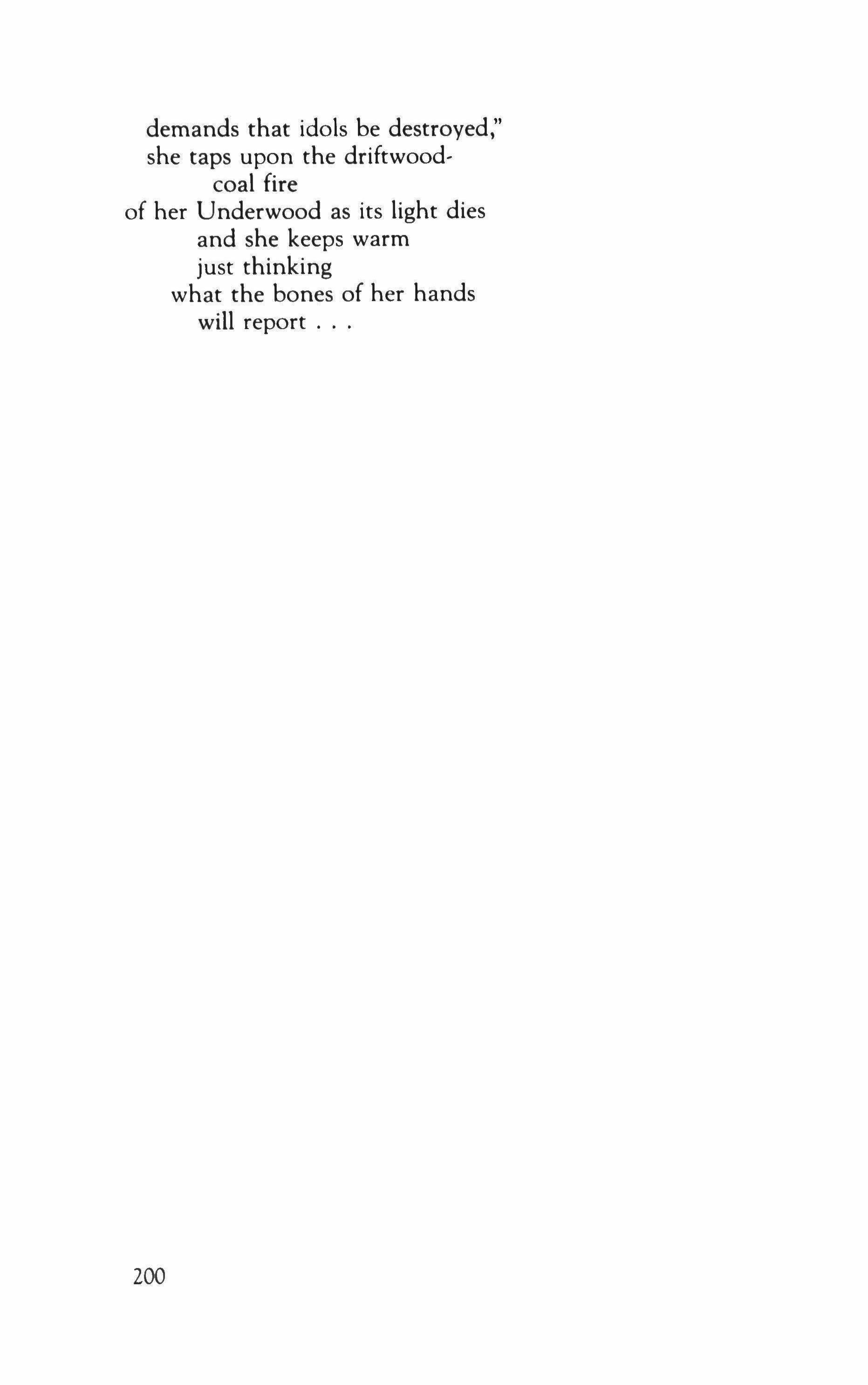
demands that idols be destroyed," she taps upon the driftwoodcoal fire of her Underwood as its light dies and she keeps warm just thinking what the bones of her hands will report
200
Three Poems
Linda McCarriston

The Apple Tree
faT my mother
More beautiful now than ever you were in pale May blossom, or in August, gravid againyour chained boughs bearing, your skirts, stiff camouflage arustle-you stand, past use, past prettiness in the winter of your winter, at the brink of encroaching woods, in the yard of the old farm, where now, out windows, curtains shake themselves like rags from a lost cleaning morning. Here, in the light that by noon takes your shadow and carries it from the garden to the barn, now, from your deep seeking source under snow, drink long, breathe slow, be still, as did the child, she of the single body. The many that found you and took you are fallen away.
201
Answer

I am the woman you saw, Louise Bogan, hanging clothes on the line from the cold back porch of her tenement, the woman you said you'd trade to be-free as she seemed from where you stood at your barred asylum window. But did your whole mind ache to be out, to be only whole enough that day to sort whites from darks, to man the wringer, to be that mechanical thing not singing as she chapped her pale hands raw in the city wind? Today I went through the motions that woman knew, motions I'd guessed you'd spent your life refusing, a waking day when my body or my mind -I can't tell which-dragged the other from room to room, wiping fingerprints, washing the bowl, polishing faucets. It is all I did. How many have they been, the days like this, when at the end I could stop and thank God watch the sun finally falling and say again I didn't give in. I got up and stayed up and the wash got done and I moved a whole day closer to the end. Yours are the poems I want to write but I can't lie down and be cared for, can't ever crack, and I hate her, the thick char who will not fall, that deadweight peasant who can't be plowed over, plowed under to crumble and turn in the earth of her pain into something that flowers. 1 believed it when I read it, but now I don't believe you ever meant
202

to be her, mere her, mere me, you proud raku vase whose self preferred to shatter time and again than to plod the slack back porches and call it alive.
203
A Thousand Genuflections

Winter mornings when I call her, out of falling snow she trots into view, her tail and mane made flame by movement, carrying, as line and motion, back into air her shape and substance-like fire into heat into light, turns the candle takes, burning. And her head - her senses, everyone is a scout sent out ahead of her, behind, beside: her eye upon me, over the distance, her ear, its million listeners, delicate and vast her nose, her mouth, her voice upon me, closing the distance. I could just put the buckets down and go, but I kneel to hold them as she eats, as she drinks, to be this close. For something of myself lives here, stripped of the knowing that is not knowing, a single thing from the least webbed tissues of the heart straight out to the tips of the guardhairs that shimmer off beyond my sight into air, the grasses, grain, the water, light. I've come like this each day for years across the hard winters, seeing a figure for the thing itself, divine-appetite and breath, flesh and attention. This morning her presence asks of me: And might you be your body? Might we be not the figure, but the thing itself?
204
Three Poems
M. Wyrebek
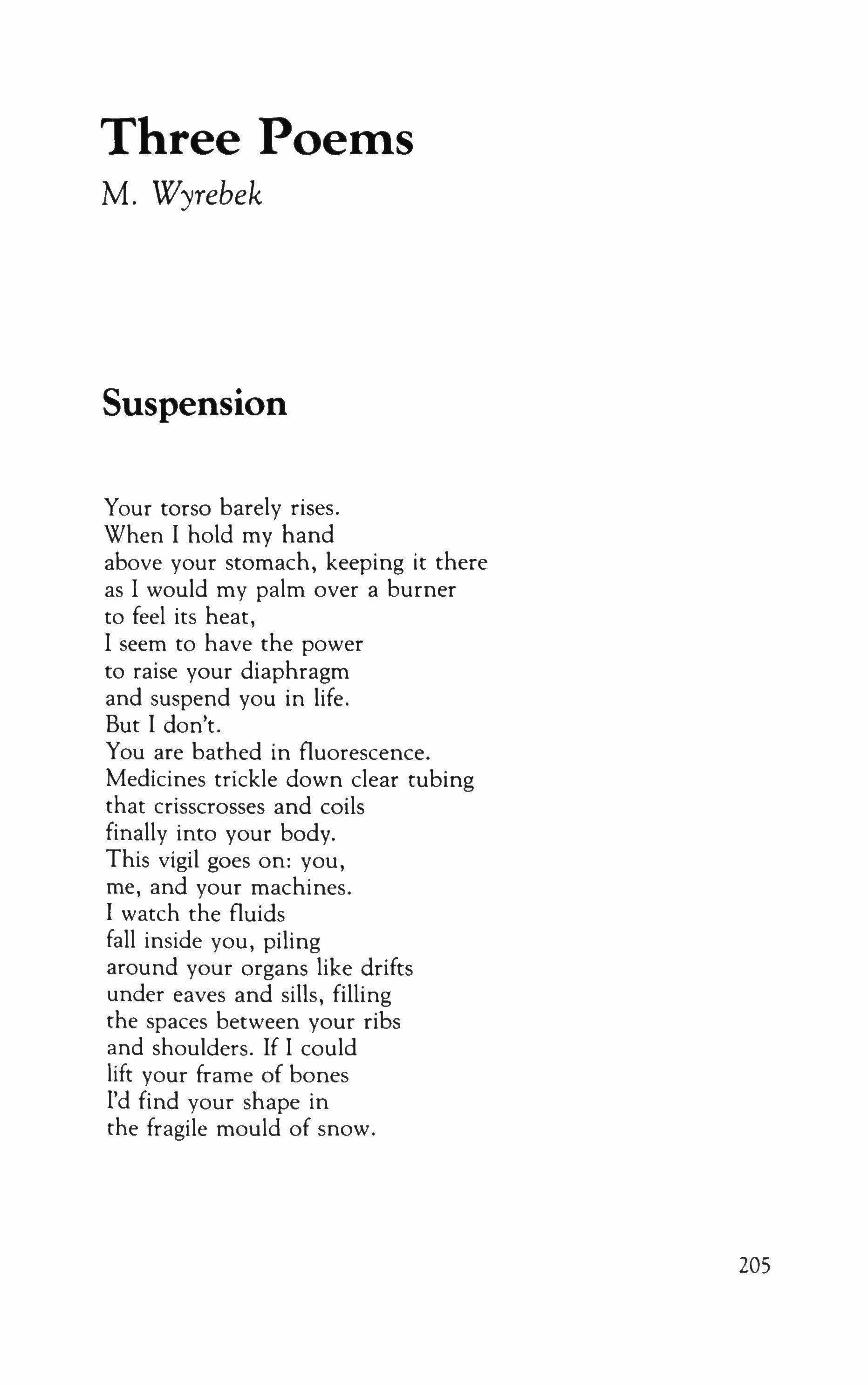
Suspension
Your torso barely rises. When I hold my hand above your stomach, keeping it there as I would my palm over a burner to feel its heat, I seem to have the power to raise your diaphragm and suspend you in life. But I don't. You are bathed in fluorescence. Medicines trickle down clear tubing that crisscrosses and coils finally into your body. This vigil goes on: you, me, and your machines. I watch the fluids fall inside you, piling around your organs like drifts under eaves and sills, filling the spaces between your ribs and shoulders. If I could lift your frame of bones I'd find your shape in the fragile mould of snow.
205
Bronchoscopy

for J.e. w.
First you need a light source. Without it the bronchoscope is useless. From the narrow operating-room bed I'm looking for this source. I have imagined a huge machine with an attached chamber holding a silo of sunlight but it's not here. There's just a box on the table. The anesthesiologist tells me I won't feel a thing. I've got to open wide for the endotracheal tube. I don't want to.
A tube slides along the slope of my throat, slinking past the pharynx. It glances the pearl of my uvula, glides behind my epiglottis into the larynx to strike the harp of my vocal cords. The tube tunnels down my trachea and into it the doctor threads his rat-tailed catheter, wending a braid of light into my thoracic cavity.
In the recovery room I keep thinking: how does a magician pull a rabbit out of a hat? My throat is a long black sleeve the doctor's arm fits into. His hand punches through the other end, spoking the darkness there with fingers of light. From out of the depths he brings
206

colors, shapes, textures, things that will tell him if I am normal.
This is a lie.
The Olympus Model BF�B2 flexible, fiberoptic bronchoscope was introduced into the supportive airway and entered the tracheobronchial tree without incident. The doctor excised tissue samples from the chest wall using biopsy forceps. No embolectomy catheter was needed. I left the O.R. as I came, full of wonder, already wounded.
207
Three O'clock Dose

The nurse comes in, checks my pulse. The blood pressure cuff wheezes as it tightens around my arm. She takes the empty IV packet from my pole and hangs a pouch of yellow liquid, my three o'clock dose of ceftazidime. I hear none of this, of course. It's her leaving that wakes me, her actions a pantomime in my head. I am forever just-missing people, just-waiting for something to strike me as funny. It keeps me vigilant. This morning lightning touches my eleventh-floor window like a wand. A storm appears, moving quickly, thunder so loud it's like bad comedy, as if stooges are bonking the heads of buildings together. Right now, strong medicine enters my cells the way lightning skewers clouds. It's three fifty-eight in the morning, the sky is cracking up, but I am too tired to laugh.
208
Two Poems
K. Reynolds Dixon

Whitsun Sounding at Holy Loch
Through wisping dawn chop, before the first mordents of prelude, a narwhal weltered up and tilted at the iron-gray slope of a missile sub's hull, answering with its tusk the whelming ping of calibration, while scallops gibbered the stunned surface.
And that deep electric keen raised itself, brazed the salt draft past the churchyard crenellate with headstones, past habitual hearing for miles above the aeries of uppermost till, an itch in the osprey's egg, a coppery soured recoil
from the ewe's teat, faintest, fugal toll of abandonment in the pastor's morning dreams. The nubby folds stammered, osprey
209

swooped the loch's teem; and when within an hour, the chapel nave restive with villagers, that sounding queered the organ's quaver,
the pastor stumbled in his book, scallops rained and shattered on the founders' shallow epitaphs, the clear font water shook.
210
Vigil

The rosewood whorls of the rocker willed him by his mother are what he sees last before dousing the light; and he smiles, as sleep bears down, to think of the boy he was to her, how when his night fear came she spelled him, her gown wreathing luminous to her rocker by his bed, whispering there was nothing in the dark the light did not contain.
As to her contralto and steady heel of bentwood over oak, he lulls. But he will, hours later, bolt awake and tighten at the chair's skeletal arabesque, dread-wild for any ripple in the dark, the naming shush; and after fumbling a lamp and the radio host's dusky tease he will remember how easily the rocker moves and block it well before he sleeps again.
211
At the Trenton State Hospital
Teresa Cader

It was always the same group of twenty women in rollers and rayon robes, in pink padded slippers, blue or white hair- Marjorie and Mildred, Elizabeth and Ginger, Kit and two Miriams. On Saturday mornings they'd cluster in the corridors, waiting for me to unlock the metal cabinets and take down the red, white and blue Bingo chips, the greasy game cards. Sometimes when they'd crowd around me, I'd feel the air between us grow dry and brittle, as though a single match could burn it away. I smelled their cheesy breath, their damp clothes and hair. They wanted to touch the white apron covering my pinafore, to stroke my skin. I knew nothing of their lives, how long they'd been gone.
For three hours each Saturday, I was what they lived for. They'd clap and cheer when I'd begin to call out the numbers and I'd make sure all of them had chips and cards, that none of the cheaters sat together. I had just finished separating Elizabeth and Kit one Saturday when Sammy kicked open the door with her boots, slid herself into a chair at the front table and fixed her one good eye on me with all the unswerving concentration of a judge sizing up a defendant. I saw wind brushing snow against the metal window grates, I saw pigeons fly in and out of the eaves of the guard's house across the road, and I saw,
212
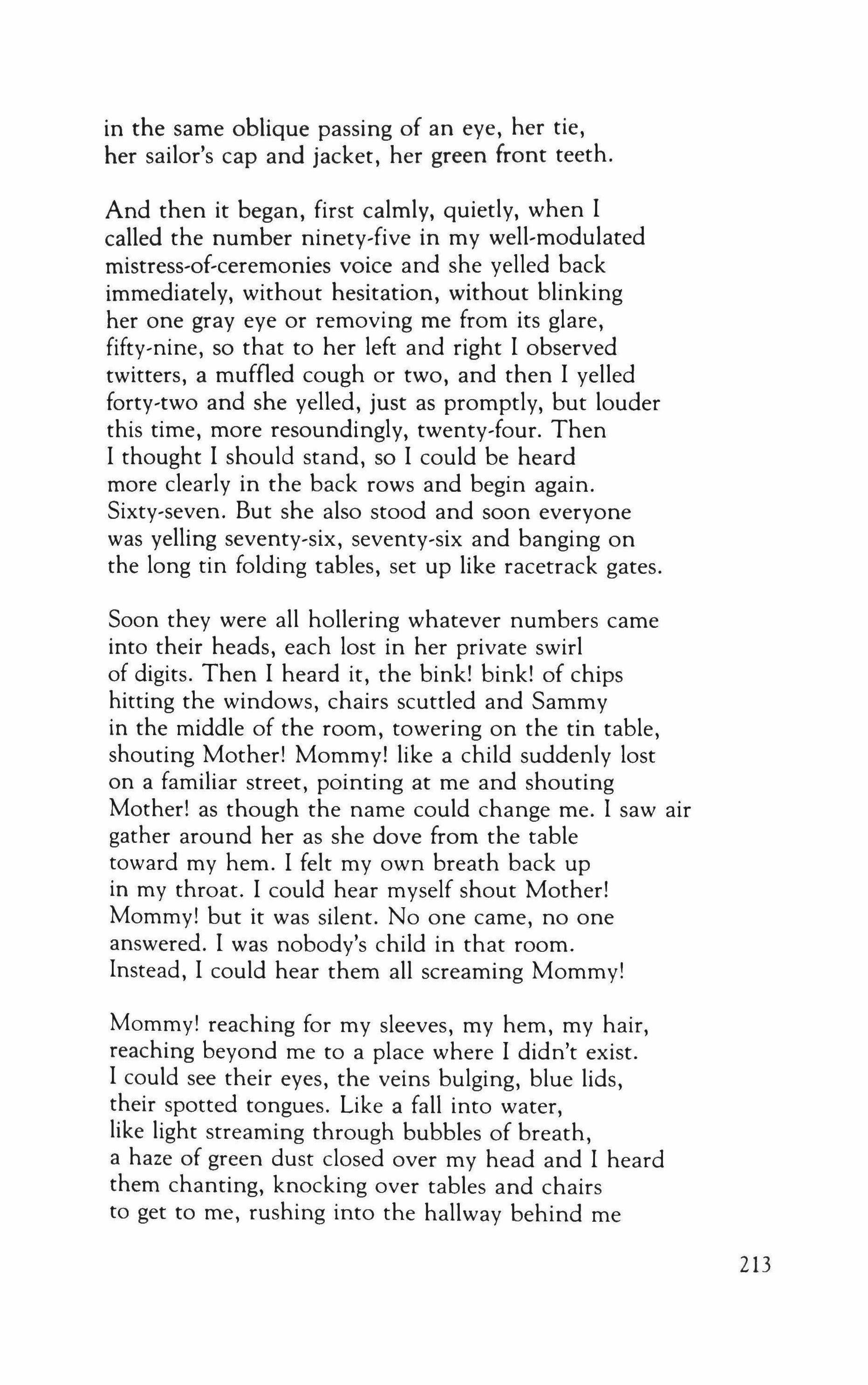
in the same oblique passing of an eye, her tie, her sailor's cap and jacket, her green front teeth.
And then it began, first calmly, quietly, when I called the number ninety-five in my well-modulated mistress-of-ceremonies voice and she yelled back immediately, without hesitation, without blinking her one gray eye or removing me from its glare, fifty-nine, so that to her left and right I observed twitters, a muffled cough or two, and then I yelled forty-two and she yelled, just as promptly, but louder this time, more resoundingly, twenty-four. Then I thought I should stand, so I could be heard more clearly in the back rows and begin again. Sixty-seven. But she also stood and soon everyone was yelling seventy-six, seventy-six and banging on the long tin folding tables, set up like racetrack gates.
Soon they were all hollering whatever numbers came into their heads, each lost in her private swirl of digits. Then I heard it, the bink! bink! of chips hitting the windows, chairs scuttled and Sammy in the middle of the room, towering on the tin table, shouting Mother! Mommy! like a child suddenly lost on a familiar street, pointing at me and shouting Mother! as though the name could change me. I saw air gather around her as she dove from the table toward my hem. I felt my own breath back up in my throat. I could hear myself shout Mother! Mommy! but it was silent. No one came, no one answered. I was nobody's child in that room. Instead, I could hear them all screaming Mommy!
Mommy! reaching for my sleeves, my hem, my hair, reaching beyond me to a place where I didn't exist. I could see their eyes, the veins bulging, blue lids, their spotted tongues. Like a fall into water, like light streaming through bubbles of breath, a haze of green dust closed over my head and I heard them chanting, knocking over tables and chairs to get to me, rushing into the hallway behind me
213
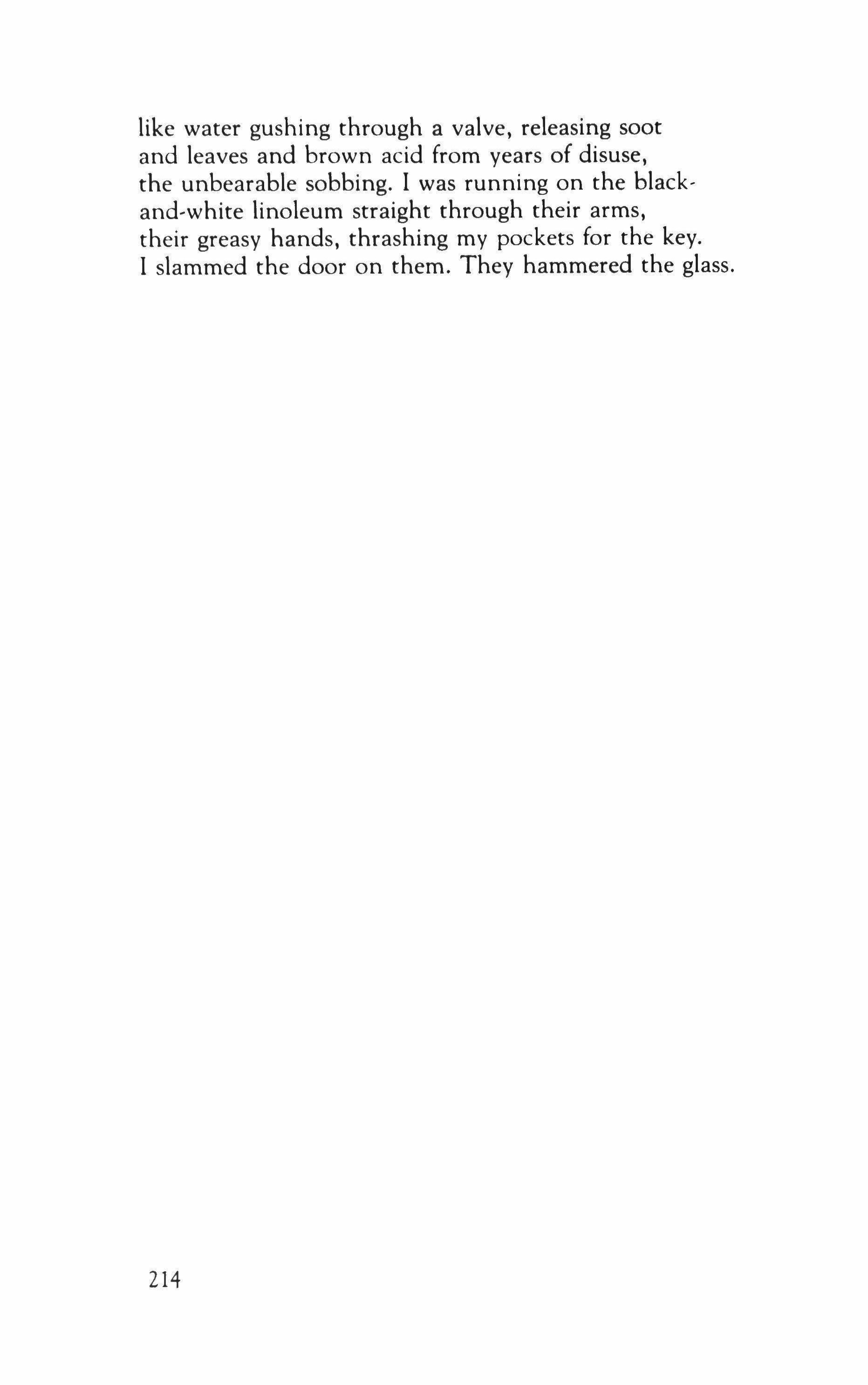
like water gushing through a valve, releasing soot and leaves and brown acid from years of disuse, the unbearable sobbing. I was running on the blackand-white linoleum straight through their arms, their greasy hands, thrashing my pockets for the key. I slammed the door on them. They hammered the glass.
214
Mother's Red Beans and Rice
Sheryl St. Germain

The beans were tight and small as my young ass, and 1 loved the sound they made when she poured them into the pot. 1 could never resist plunging both my hands in to feel the abundance of them, the hardness and sureness of them. In the morning, after she'd left them to soak in the night, they would be larger, softer, the skins wrinkled like her stomach from all the children.
She'd put them on to cook, adding other ingredients as the beans heated - ham bone with marrow to make the gravy thick, salt pork to make the beans meaty, smoky.
She'd scavenge around for whatever else we had, always an onion or two, and I'd watch her as she chopped them-1 knew it was the onions made her cry, but 1 also knew there was much to cry about, so 1 was glad when she finished, scooped the tears and onion into the pot.
She always took so long cutting up the garlic, mincing and mincing, and not really paying attention until her eyes became dreamy and sloppy like they did when she talked about the boy she almost married, and inevitably she would cut a thumb or index finger,
215
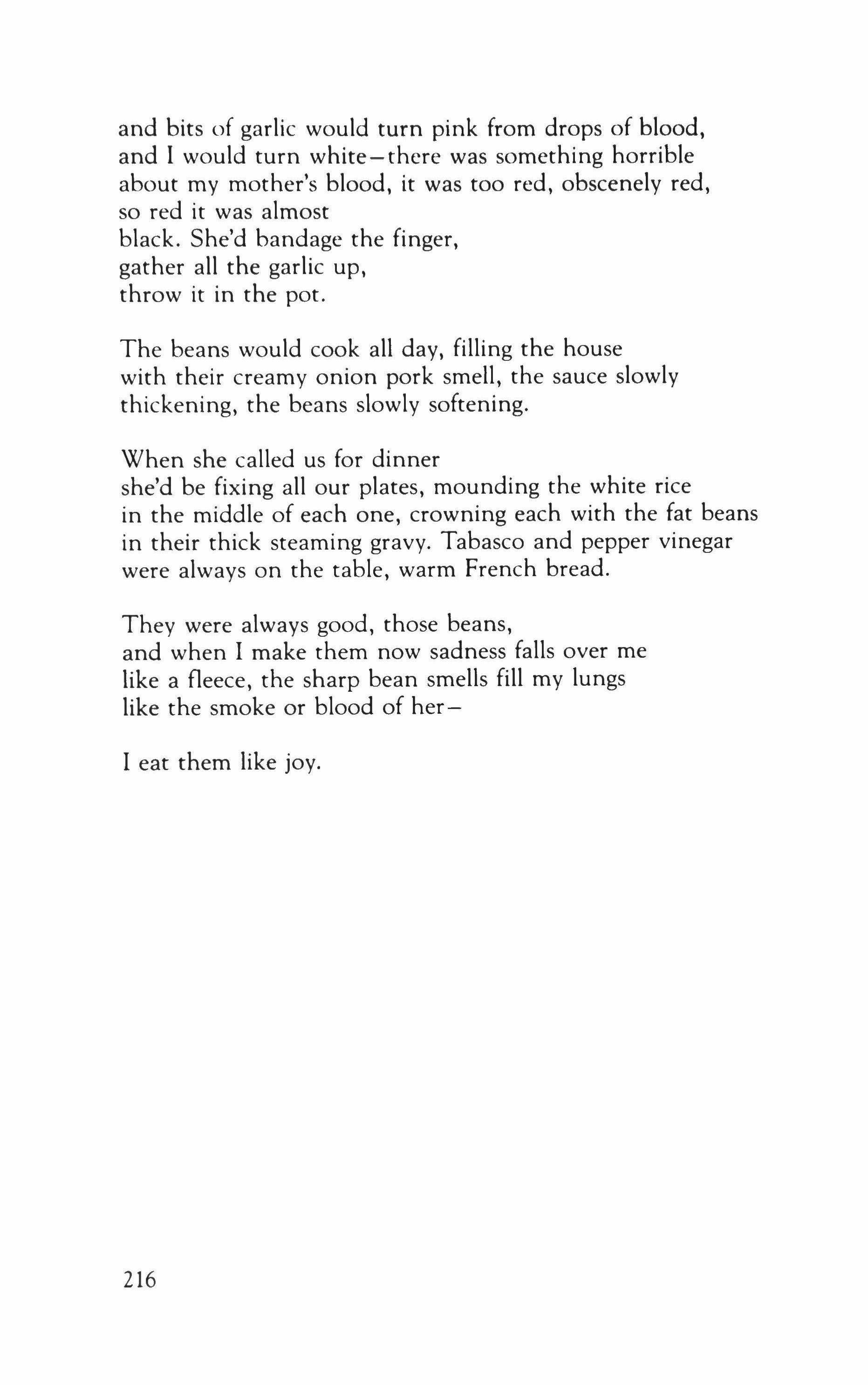
and bits of garlic would turn pink from drops of blood, and I would turn white-there was something horrible about my mother's blood, it was too red, obscenely red, so red it was almost black. She'd bandage the finger, gather all the garlic up, throw it in the pot.
The beans would cook all day, filling the house with their creamy onion pork smell, the sauce slowly thickening, the beans slowly softening.
When she called us for dinner she'd be fixing all our plates, mounding the white rice in the middle of each one, crowning each with the fat beans in their thick steaming gravy. Tabasco and pepper vinegar were always on the table, warm French bread.
They were always good, those beans, and when I make them now sadness falls over me like a fleece, the sharp bean smells fill my lungs like the smoke or blood of her-
I eat them like joy.
216
The Machinist, Teaching His Daughter to Play the Piano
B. H. Fairchild

The brown wrist and hand with its raw knuckles and blue nails packed with dirt and oil, pause in midair, the fingers arched delicately, and she mimics him, hand held just so, the wrist loose, then swooping down to the wrong chord. She lifts her hand and tries again.
Drill collars rumble, hammering the nubbin-posts. The helper lifts one, turning it slowly, then lugs it into the lathe's chuck.
The bit sheers the dull iron into new metal, falling into the steady chant of lathe work, and the machinist lights a cigarette, holding in his upturned palms the polonaise he learned at ten, then later the easiest waltzes, etudes, impossible counterpoint
like the voice of his daughter he overhears one night standing in the backyard. She is speaking to herself but not herself, as in prayer, the listener is some version of herself, and the names are pronounced carefully, self-consciously: Chopin, Mozart,
217

Scarlatti, these gestures of voice, and hands suspended over the keyboard that move like the lathe in its turning toward music, the wind dragging the hoist chain, the ring of iron on iron in the holding rack. His daughter speaks to him one night, but not to him, rather someone created between them, a listener, there and not there, a master of lathes, a student of music.
218
Sound Waves
Mary Kinzie

I. (At fourteen weeks)
In the first negative, a shape presages
The almost human profile of the skull Against a bolster the technician gauges
Could be placenta. Like a general Reposed in state-or like a fogbound hullThe infant drifts among its dim debris
Of nourishment and rigging, a vehicle Tethered to darkness by one spectral knee, Rib and feature faint in quality.
II. (At sixteen weeks)
A fortnight later, hurtling through its stages
So fast the brow has doubled, the huge null Of the eye socket-now twice as deep-engages
The parents' with its primal monocle (The other eye blurred by some obstacle), As if to caution us, or disagree. What have we done? This enigmatical Creature has spied our mediocrity, Rib and feature white with gravity.
Ill. (At twenty-one weeks)
Seeming to speak, a fresh image assuages
That baleful hollow glare: A chronicle Of kind floats forth and riffles through the pages
219

Of its movements. After an interval
With an arm upraised, to mark the body's lull, Something like smiling flickers on the screen, In recognition of its own sweet will Buoyed above the molten vertebrae, Rib and feature warm with clemency.
Envoi
A second view looks from the fontanelle
Down through the shining oval cavity Where thread is spun. The spine curves in this well Like a rope dropped from the vertex to that sea Where rib and feature weave their history.
While in the last one, and most personal, The feet we know as hers lie sleepily
Side by side, but not quite parallel. Each is bird-like, or like a fluted shell, Yet close to home, just as her self would be, And ribbed and featured with humanity.
220
Girl Under the Kadam-Tree: The Poetry of Anuradha Mahapatra
Carolyne Wright

I first encountered the poetry of Anuradha Mahapatra in January 1987, the third month of nearly two years I would stay in Calcutta. This was a first visit to the breeze-filled Tollygunge home of poet and journalist Jyotirmoy Datta, whose abilities as a translator had been recommended to me by another American scholar. As I sipped cool nimbu pani and noticed a herd of massive black water buffalo lumber past the suburban houses on their way to the nearby pond, I listened to Jyoti recite the first few translations he had drafted on speculation for me. The oddly rural scene out the living-room window coalesced with the stark landscape of fields and isolated villages of the poems. The author of these verses, Jyoti told me, was an obscure young Bengali woman from the remote district of Medinipur, far to the west of Calcutta. Her father was a small cloth merchant, her mother a village housewife; she was one of seven children.
This was, I already realized, an atypical background for a contemporary Bengali woman poet. Most of the others I had met and worked with so far had been born into comfortable upper-caste, middle- or uppermiddle-class families based in Calcutta or some other major city in India. Most had received the bulk of their education in English-medium private schools, and had settled by marriage or profession into the social and cultural life of Calcutta intelligentsia, the urbane and sometimes political milieu which served as the setting for much of the writing I had seen already. This village woman, Anuradha Mahapatra, was from a different world - vast, rural, isolated, full of disturbing visions and surrealistic juxtapositions at the edge of myth:
221
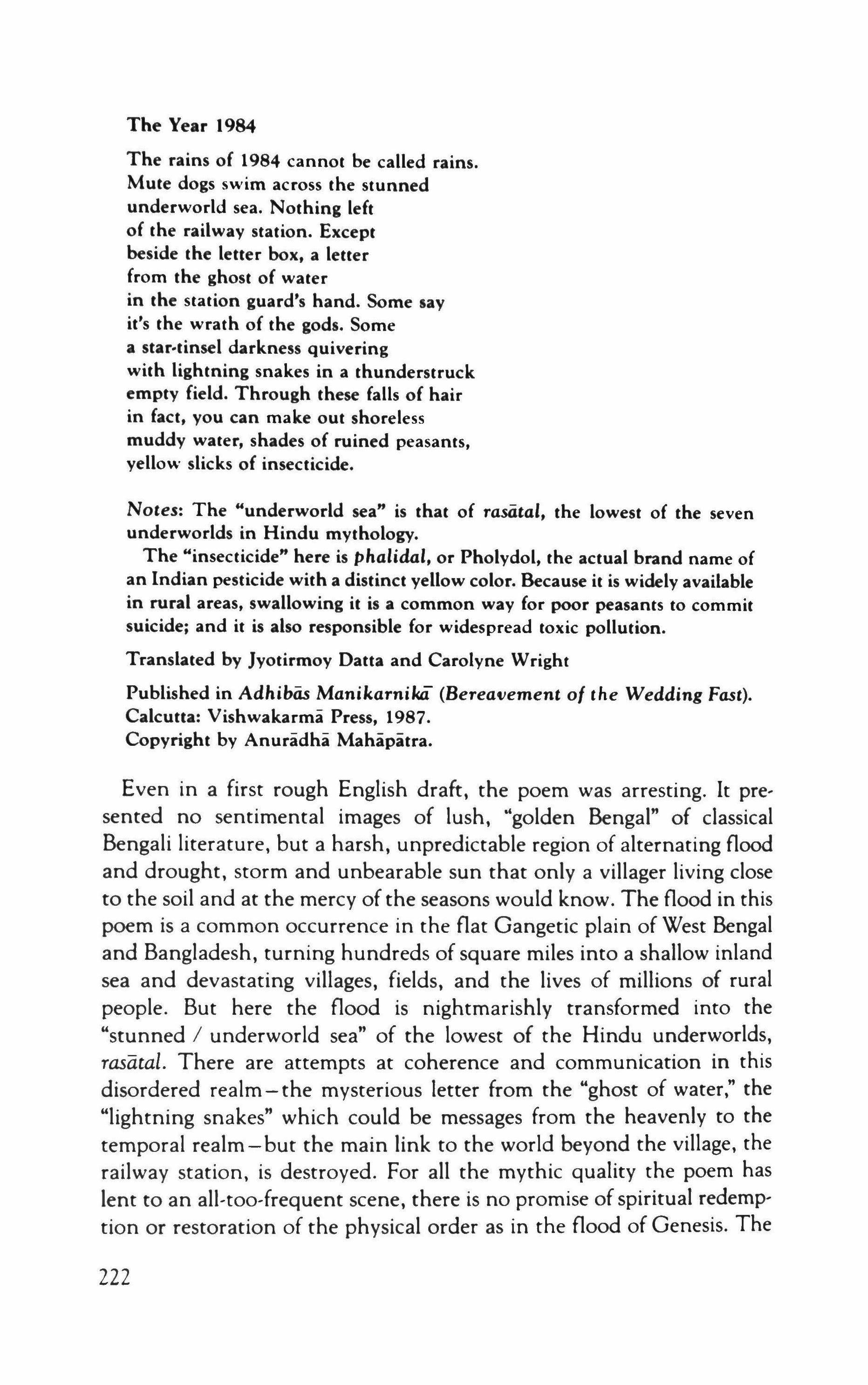
The Year 1984
The rains of 1984 cannot be called rains. Mute dogs swim across the stunned underworld sea. Nothing left of the railway station. Except beside the letter box, a letter from the ghost of water in the station guard's hand. Some say it's the wrath of the gods. Some a star-tinsel darkness quivering with lightning snakes in a thunderstruck empty field. Through these falls of hair in fact, you can make out shoreless muddy water, shades of ruined peasants, yellow slicks of insecticide.
Notes: The "underworld sea" is that of rasatal, the lowest of the seven underworlds in Hindu mythology.
The "insecticide" here is phalidal, or Pholvdol, the actual brand name of an Indian pesticide with a distinct yellow color. Because it is widely available in rural areas, swallowing it is a common way for poor peasants to commit suicide; and it is also responsible for widespread toxic pollution.
Translated bv lyotirmoy Datta and Carolvne Wright
Published in Adhibas Manikarnika (Bereavement of the Wedding Fast).
Calcutta: Vishwakarmi Press, 1987.
Copyright by Anuridhi Mahipitra.
Even in a first rough English draft, the poem was arresting. It presented no sentimental images of lush, "golden Bengal" of classical Bengali literature, but a harsh, unpredictable region of alternating flood and drought, storm and unbearable sun that only a villager living close to the soil and at the mercy of the seasons would know. The flood in this poem is a common occurrence in the flat Gangetic plain of West Bengal and Bangladesh, turning hundreds of square miles into a shallow inland sea and devastating villages, fields, and the lives of millions of rural people. But here the flood is nightrnarishly transformed into the "stunned / underworld sea" of the lowest of the Hindu underworlds, rasatal. There are attempts at coherence and communication in this disordered realm-the mysterious letter from the "ghost of water," the "lightning snakes" which could be messages from the heavenly to the temporal realm - but the main link to the world beyond the village, the railway station, is destroyed. For all the mythic quality the poem has lent to an all-too-frequent scene, there is no promise of spiritual redemption or restoration of the physical order as in the flood of Genesis. The 222
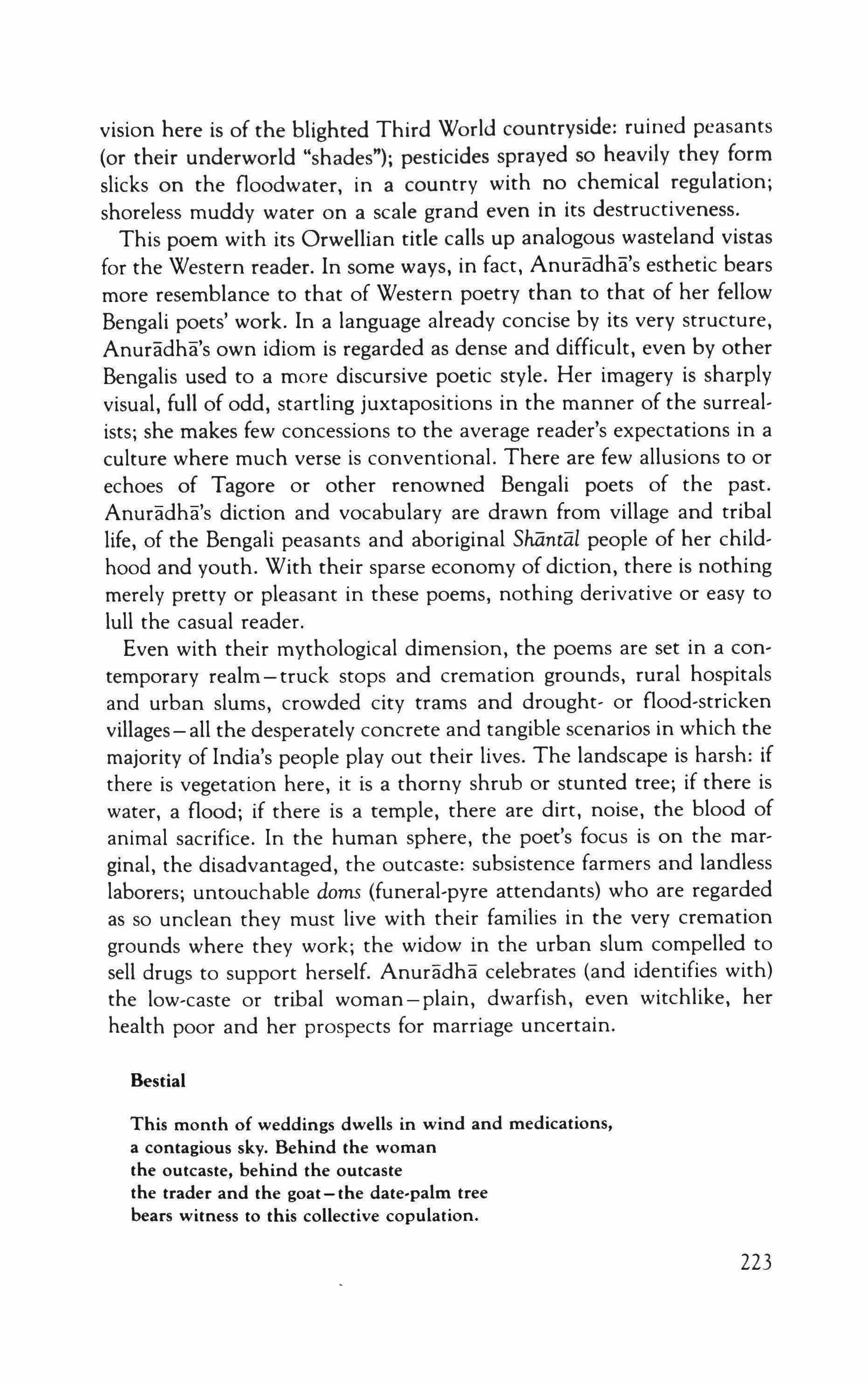
vision here is of the blighted Third World countryside: ruined peasants (or their underworld "shades"); pesticides sprayed so heavily they form slicks on the floodwater, in a country with no chemical regulation; shoreless muddy water on a scale grand even in its destructiveness. This poem with its Orwellian title calls up analogous wasteland vistas for the Western reader. In some ways, in fact, Anuradha's esthetic bears more resemblance to that of Western poetry than to that of her fellow Bengali poets' work. In a language already concise by its very structure, Anuradha's own idiom is regarded as dense and difficult, even by other Bengalis used to a more discursive poetic style. Her imagery is sharply visual, full of odd, startling juxtapositions in the manner of the surrealists; she makes few concessions to the average reader's expectations in a culture where much verse is conventional. There are few allusions to or echoes of Tagore or other renowned Bengali poets of the past. Anuradha's diction and vocabulary are drawn from village and tribal life, of the Bengali peasants and aboriginal Shantiil people of her childhood and youth. With their sparse economy of diction, there is nothing merely pretty or pleasant in these poems, nothing derivative or easy to lull the casual reader.
Even with their mythological dimension, the poems are set in a contemporary realm-truck stops and cremation grounds, rural hospitals and urban slums, crowded city trams and drought- or flood-stricken villages - all the desperately concrete and tangible scenarios in which the majority of India's people play out their lives. The landscape is harsh: if there is vegetation here, it is a thorny shrub or stunted tree; if there is water, a flood; if there is a temple, there are dirt, noise, the blood of animal sacrifice. In the human sphere, the poet's focus is on the marginal, the disadvantaged, the outcaste: subsistence farmers and landless laborers; untouchable dams (funeral-pyre attendants) who are regarded as so unclean they must live with their families in the very cremation grounds where they work; the widow in the urban slum compelled to sell drugs to support herself. Anuradha celebrates (and identifies with) the low-caste or tribal woman - plain, dwarfish, even witchlike, her health poor and her prospects for marriage uncertain.
Bestial
This month of weddings dwells in wind and medications, a contagious sky. Behind the woman the outcaste, behind the outcaste the trader and the goat-the date-palm tree bears witness to this collective copulation.
223

The shaven-headed brethren on their reed mats and the India tanked up on date-palm wine: all these do not belong to the sea. Nowadays weddings and tree-plantings take place enveloped in medication. The snake goddess and the sky god preside over diseases of the blood, so I round up the lame goats unfit for sacrifice from all the fields of night; then sit on the reed mat folding my coppery backwoods knees, belonging to Kali of the contagious sky.
Note: Kal] is the fearsome, black-skinned Destroyer Goddess especially revered in Bengal. She is usually depicted trampling in a frenzy on the prone figure of her consort Lord Shiva, who is trying to stop her world-destroying rampage. She was probably an aboriginal deity once, incorporated into the Hindu system as a representation of powerful, primitive energies.
Translated by Jyotirmoy Datta and Carolyne Wright
Published in Adhibiis Manikarnika (Bereavement of the Wedding Fast).
Calcutta: Vishwakarrna Press, 1987.
Copyright by Anuradha Mahapatra.
This is the woman pursued not by suitors but by outcastes, itinerant traders and goats. These characters move behind her as background also: they are part of her origins and the impetus of her ongoing imaginative life. Ironically, despite her motley entourage, the marriage season months are for this woman a time of illness and convalescence. She perceives everything around her in terms of her malady, or malaise ("a contagious sky"), as if it were "enveloped in medication." At the end of the poem, the speaker is cut off from both the traditional Brahmanical and Vedic spiritual practices (those of "the shaven-headed brethren") and from worldly distractions ("the India tanked up on date-palm wine") that offer their respective forms of escape from her condition. She appropriates instead the customs of the outcaste, tribal ("backwoods") people, rounding up the animals rejected as unfit for sacrifice, and sitting on a reed mat like one of the established religion's hierophants or like a bride before her wedding. Aligning herself with less prominent deities such as the sky god and Manasa-devl , the goddess propitiated by tribals and villagers for protection against snakebite, she takes her own place in the complex and shifting spiritual hierarchies of contemporary India.
At the poem's end, the speaker claims, perhaps not so ironically, to belong to "KaIT of the contagious sky," as if she were a new manifestation of the fearsome, black-skinned Destroyer Goddess revered in Bengal.
224
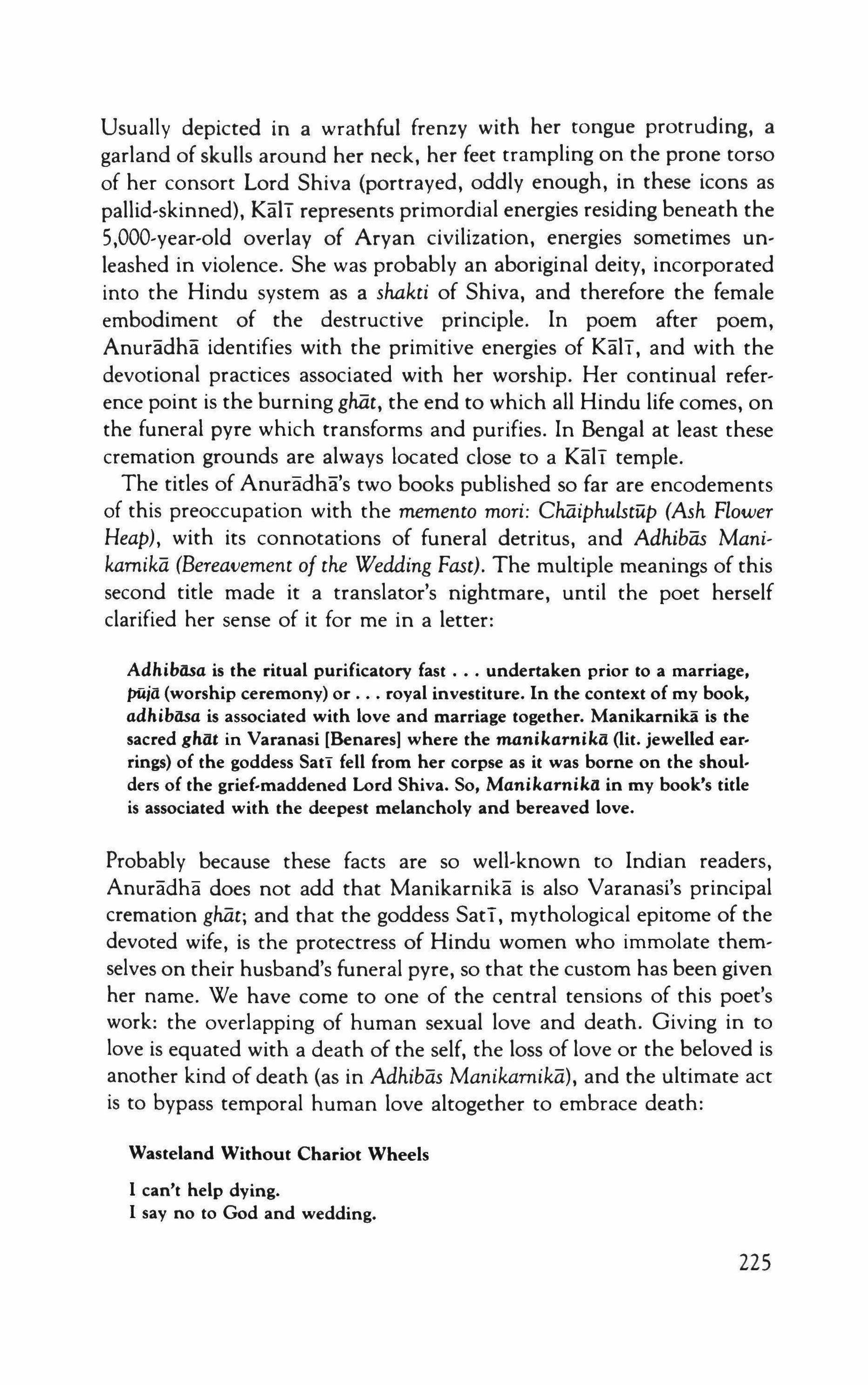
Usually depicted in a wrathful frenzy with her tongue protruding, a garland of skulls around her neck, her feet trampling on the prone torso of her consort Lord Shiva (portrayed, oddly enough, in these icons as pallid-skinned), KalT represents primordial energies residing beneath the 5,OOO-year-old overlay of Aryan civilization, energies sometimes unleashed in violence. She was probably an aboriginal deity, incorporated into the Hindu system as a shakti of Shiva, and therefore the female embodiment of the destructive principle. In poem after poem, Anuradhii identifies with the primitive energies of KalT, and with the devotional practices associated with her worship. Her continual reference point is the burning ghat, the end to which all Hindu life comes, on the funeral pyre which transforms and purifies. In Bengal at least these cremation grounds are always located close to a xstr temple.
The titles of Anuradha's two books published so far are encodements of this preoccupation with the memento mori: Chaiphulstup (Ash Flower Heap), with its connotations of funeral detritus, and Adhiblis Manikamika (Bereavement of the Wedding Fast). The multiple meanings of this second title made it a translator's nightmare, until the poet herself clarified her sense of it for me in a letter:
Adhibllsa is the ritual purificatory fast undertaken prior to a marriage, PUili (worship ceremony) or royal investiture. In the context of my book, adhibllsa is associated with love and marriage together. Manikamika is the sacred ghlit in Varanasi [Benares) where the manikaTnika (lit. jewelled earrings) of the goddess San fell from her corpse as it was borne on the shoulders of the grief-maddened Lord Shiva, So, ManikaTnikll in my book's title is associated with the deepest melancholy and bereaved love.
Probably because these facts are so well-known to Indian readers, Anuradha does not add that Manikarnika is also Varanasi's principal cremation ghat; and that the goddess Sati, mythological epitome of the devoted wife, is the protectress of Hindu women who immolate themselves on their husband's funeral pyre, so that the custom has been given her name. We have come to one of the central tensions of this poet's work: the overlapping of human sexual love and death. Giving in to love is equated with a death of the self, the loss of love or the beloved is another kind of death (as in Adhibas Manikarnika), and the ultimate act is to bypass temporal human love altogether to embrace death:
Wasteland Without Chariot Wheels
I can't help dying.
I say no to God and wedding.
225
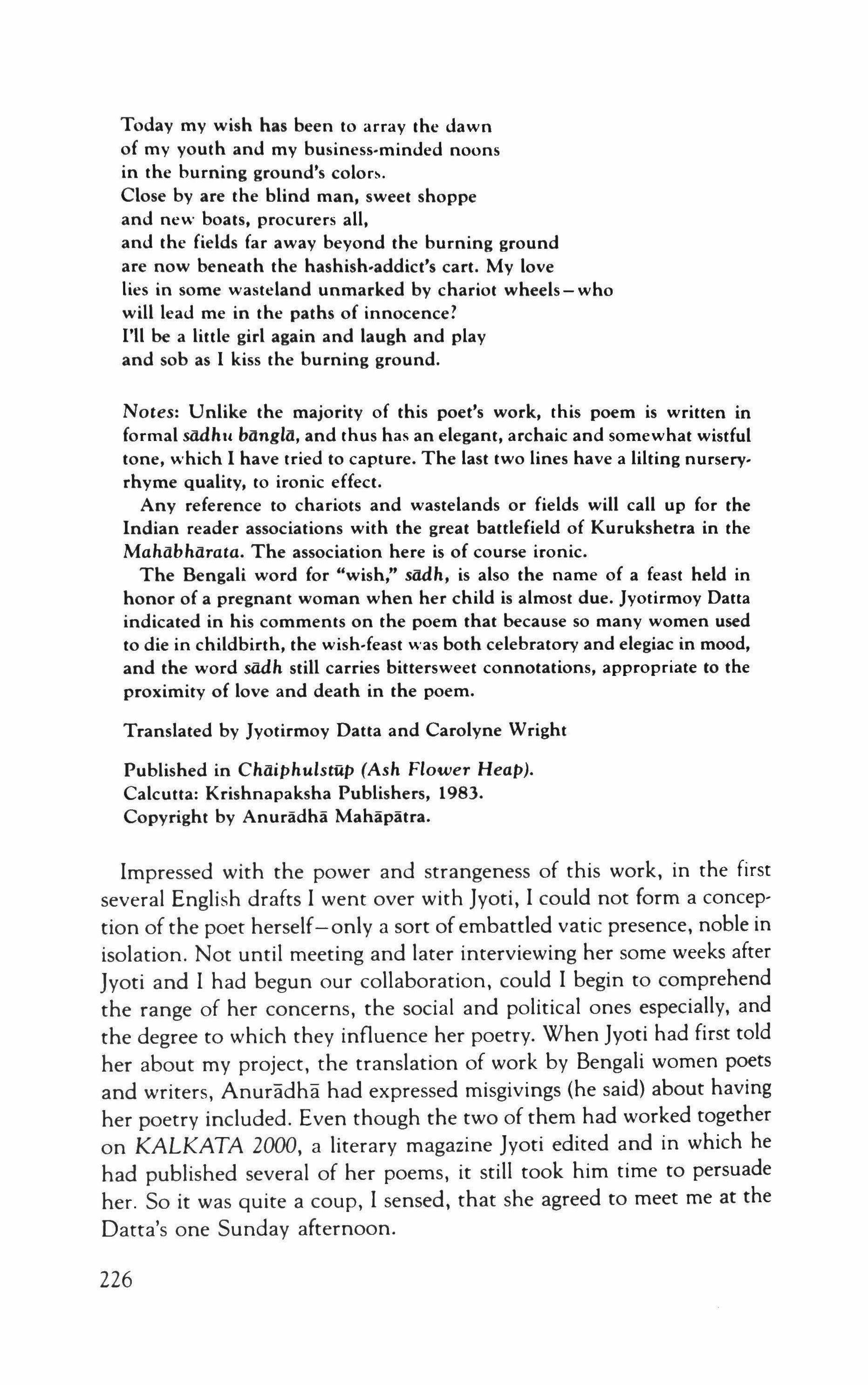
Today my wish has been to array the dawn of my youth and my business-minded noons in the burning ground's colors.
Close by are the blind man, sweet shoppe and new boats, procurers all, and the fields far away beyond the burning ground are now beneath the hashish-addict's cart. My love lies in some wasteland unmarked by chariot wheels - who will lead me in the paths of innocence?
I'll be a little girl again and laugh and play and sob as I kiss the burning ground.
Notes: Unlike the majority of this poet's work, this poem is written in formal sadhu bdngld, and thus has an elegant, archaic and somewhat wistful tone, which I have tried to capture. The last two lines have a lilting nurseryrhyme quality, to ironic effect.
Any reference to chariots and wastelands or fields will call up for the Indian reader associations with the great battlefield of Kurukshetra in the Mahabharata. The association here is of course ironic.
The Bengali word for "wish," sadh, is also the name of a feast held in honor of a pregnant woman when her child is almost due. Jyotirmoy Datta indicated in his comments on the poem that because so many women used to die in childbirth, the wish-feast was both celebratory and elegiac in mood, and the word sadh still carries bittersweet connotations, appropriate to the proximity of love and death in the poem.
Translated by Jyotirmoy Datta and Carolvne Wright
Published in Chdiphulstup (Ash Flower Heap).
Calcutta: Krishnapaksha Publishers, 1983.
Copyright by Anuradha Mahapatra.
Impressed with the power and strangeness of this work, in the first several English drafts I went over with [vori, I could not form a conception of the poet herself-only a sort ofembattled vatic presence, noble in isolation. Not until meeting and later interviewing her some weeks after Jyoti and I had begun our collaboration, could I begin to comprehend the range of her concerns, the social and political ones especially, and the degree to which they influence her poetry. When Jyoti had first told her about my project, the translation of work by Bengali women poets and writers, Anurfidha had expressed misgivings (he said) about having her poetry included. Even though the two of them had worked together on KALKATA 2000, a literary magazine Jyoti edited and in which he had published several of her poems, it still took him time to persuade her. So it was quite a coup, I sensed, that she agreed to meet me at the Datta's one Sunday afternoon.
226

I had already come to recognize, among the upper-middle-class women poets and writers I had met, a certain forcefulness, an extroverted sort of confidence and pleasure in their effect on others that seemed to emanate from many of them: privileged women in a society where most womenmost people-were without privilege. Anuradhii did not possess their drawing-room sophistication. She was small in the way village women are, dressed in an unstarched cotton Bengal hand-loom sari and a sweater, no makeup or jewelry, her hair drawn back in a knot. Sitting on a bright khadi-cloth covered divan, she shivered a little in the chilly late February breeze from the barred, glassless windows. She spoke quietly to Jyoti in Bengali, who translated: she didn't want to use English with me, she told him, until she knew me somewhat better. Her commitment to her work, and her desire that it be accurately translated and presented, had to be communicated precisely. We spent that afternoon going over, word by word, the English renderings prepared by Jyoti and revised by me, stopping to discuss unclear or difficult phrases. Jyoti translated her explanations of her intended meanings in ambiguous passages, and (in Bengali back to her) my rationale for choices of English wording. By the end of that session, Anuradhii seemed to be satisfied with our methodology. From then on, she was content to let me and my collaborators (jvoti for the first twenty poems, then Pararnira Banerjee for the rest} work independently of her, trusting that our English versions would be faithful to her intentions.
The need for a two-way oral translator at our first meeting threw into high relief not only my imperfect grasp of Bengali, but the cultural distances separating us across the middle-class Tollygunge living room: the historical, religious, social, political and economic conditions, as well as the languages, from which our respective cultures evolved. But there were also in Anuradha's own story, as she told it to me in a mixture of Bengali and English at our ensuing meetings in the lounge of the Ramakrishna Mission Institute of Culture where I stayed, a number of parallels with the early lives of many American women and minority writers, especially those from the rural South. Born in 1957 in Nandigrarn, a village in the dry upland district of Medinipur, near West Bengal's border with the states of Orissa and Bihar, Anuradha was the fourth of seven children, and the first woman in her family to graduate from the local Nandigram Sitananda College and go on to Calcutta for an M. A. in Bengali Literature at Calcutta University. She began to publish poetry in literary magazines there, and stayed on in the city, working first as a translator (from medieval to modern Bengali) and proofreader for Bengali publishing houses. In 1985 she joined the staff of Unnayan, a
227
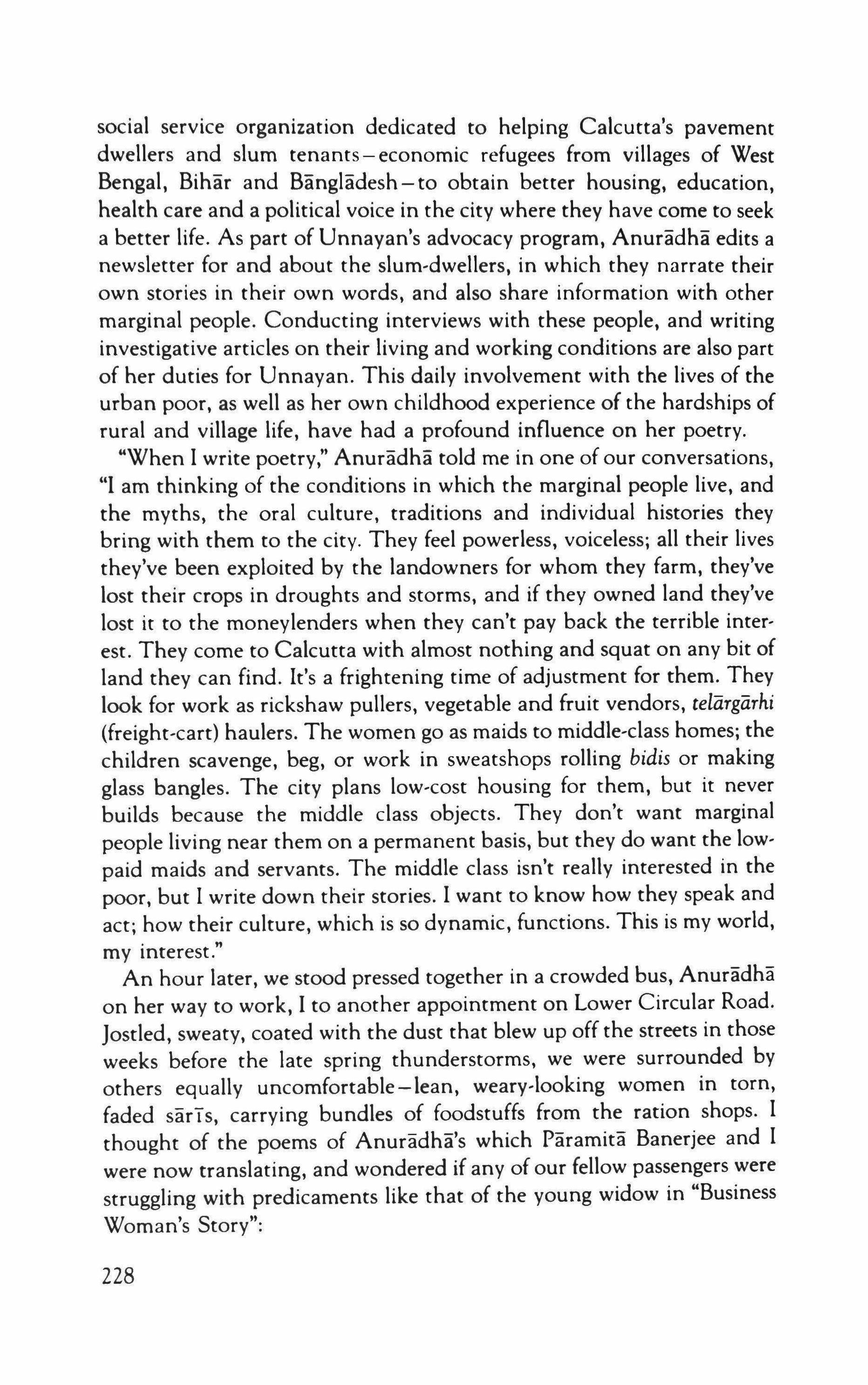
social service organization dedicated to helping Calcutta's pavement dwellers and slum tenants - economic refugees from villages of West Bengal, Bihar and Bangladesh - to obtain better housing, education, health care and a political voice in the city where they have come to seek a better life. As part of Unnayan's advocacy program, Anuradha edits a newsletter for and about the slum-dwellers, in which they narrate their own stories in their own words, and also share information with other marginal people. Conducting interviews with these people, and writing investigative articles on their living and working conditions are also part of her duties for Unnayan. This daily involvement with the lives of the urban poor, as well as her own childhood experience of the hardships of rural and village life, have had a profound influence on her poetry.
"When I write poetry," Anuradha told me in one of our conversations, "I am thinking of the conditions in which the marginal people live, and the myths, the oral culture, traditions and individual histories they bring with them to the city. They feel powerless, voiceless; all their lives they've been exploited by the landowners for whom they farm, they've lost their crops in droughts and storms, and if they owned land they've lost it to the moneylenders when they can't pay back the terrible interest. They come to Calcutta with almost nothing and squat on any bit of land they can find. It's a frightening time of adjustment for them. They look for work as rickshaw pullers, vegetable and fruit vendors, telargarhi (freight-cart) haulers. The women go as maids to middle-class homes; the children scavenge, beg, or work in sweatshops rolling bidis or making glass bangles. The city plans low-cost housing for them, but it never builds because the middle class objects. They don't want marginal people living near them on a permanent basis, but they do want the lowpaid maids and servants. The middle class isn't really interested in the poor, but I write down their stories. I want to know how they speak and act; how their culture, which is so dynamic, functions. This is my world, my interest."
An hour later, we stood pressed together in a crowded bus, Anuradha on her way to work, I to another appointment on Lower Circular Road. Jostled, sweaty, coated with the dust that blew up off the streets in those weeks before the late spring thunderstorms, we were surrounded by others eq ually uncomfortable -lean, weary-looking women in torn, faded SarIS, carrying bundles of foodstuffs from the ration shops. I thought of the poems of Anuradha's which Pararnira Banerjee and I were now translating, and wondered if any of our fellow passengers were struggling with predicaments like that of the young widow in "Business Woman's Story":
228

Business Woman's Story
Sunday goes by in marijuana, but the village girl's entire year goes nowhere. The seasons change in stars and genitals, but this year what she owes in town are no small debts.
From the border of her white widow's sari black sweat drips; the funeral meal, worship of the dark-skinned goddess, and the half-burnt hut set her to worrying, though in her body countless seeds give off their ripe aroma. The child in the marijuana shop rocking on his broken ribs is the flower of her lap, the harvest month's granary. In fact, carrying all of death's addictions in her belly-cloth at night, dozing on a half-burnt mat in her half-demolished hut all year, she grows old in the receding hopes of business.
Notes: In poor villages of West Bengal and elsewhere, widows left with no inheritance or means of earning a living must often resort to prostitution or small-scale smuggling of liquor, foodstuffs or drugs in order to feed themselves and their children.
The white widow's sari is actually in Bengali the dhuti (dhoti), the husband's garment, worn as a widow's sari after his death.
The "funeral meal" is the habishya, a sacrificial meal of boiled rice and ghee eaten during ceremonies including funerals. It is the widow's first meal after the cremation of her husband.
Translated by Paramita Banerjee and Carolvne Wright
Published in ChaiphulstUp (Ash Flower Heap).
Calcutta: Krishnapaksha Publishers, 1983. Copyright by Anuradha Mahapatra.
In a country with no social security system, poor women are often left destitute when their husbands die-or worse, saddled with their debts. In urban slums, in the impecunious villages surrounding big cities, such widows must sometimes resort to prostitution, small-scale smuggling of liquor and foodstuffs, or drug-peddling to feed themselves and their children. But the poem does not simply illustrate a social ill. Like the marginal people the poet interviews, this village girl is individuated as well as representative. Her "business" is not going well-seasons and customers may change, but her debts don't shrink. She has no money to
229

repair the half-burnt hut: damaged by a cooking fire, a "client's" careless smoking, a disgruntled buyer's act of revenge? Even her widow's white garment is not her own sarT but (in the Bengali) a dhoti, perhaps her late husband's. She is still young, her body full of ripe-smelling seed; but her child rocks on "broken ribs" in the marijuana shop, already damaged by her trade, and in her belly-cloth (the strip of material around their waist in which village women store their valuables) she carries "death's addictions." In fact, whatever business she has to keep herself and her child alive is a traffic in death.
Another kind of death comes for the Hindu bride, that creature of so much adulation and financial outlay in marriage-mad Bengal. She is swathed in a gold-embroidered red sarT, loaded with as many gold ornaments as her father can go into debt for, subjected to merciless teasing by friends and relatives, advice and criticism by the groom's family. She is exhausted by months of preparation, fasts, ritual baths, pujas to various presiding deities. For many Bengali girls the few days of wedding celebration are the climax and culmination of their entire lives-the transition point between childhood subjugation to the father and married subjugation to the husband selected by that father. But Anuradha envisions for her "Girl Before Her Marriage" a different sort of fate:
Girl Before Her Marriage
Under the kadam-tree, the girl about to be married sits alone after her bath of blood. Within her breast and outstretched arms: vegetation, sea, and cave-art, the swaha-mantra chanted at the ceremony's end. Not art but suicide, a profound offering as if to a cobra. Someone brings water in spellbound hands, the Meghamallar raga plays on all the strings of the body. Even though the sky's so near an auspicious planet dies.
The girl is drawn to the evil hour's lonely seasonal dark storm. Because she'll never see the sky the boy grown straight and strong as the kadam-tree will never come, breaking off the Krishna-chura's branches. After her bath of blood, has she put her hands on the oil lamp, her lips to the conch shell? Somebody keeps staring with spellbound eyes, water or the dark storm? Who will give her back? After a hundred springtimes will the girl learn the alphabet in cave-art, roasting of meat and bread in a clay oven, that bath
230
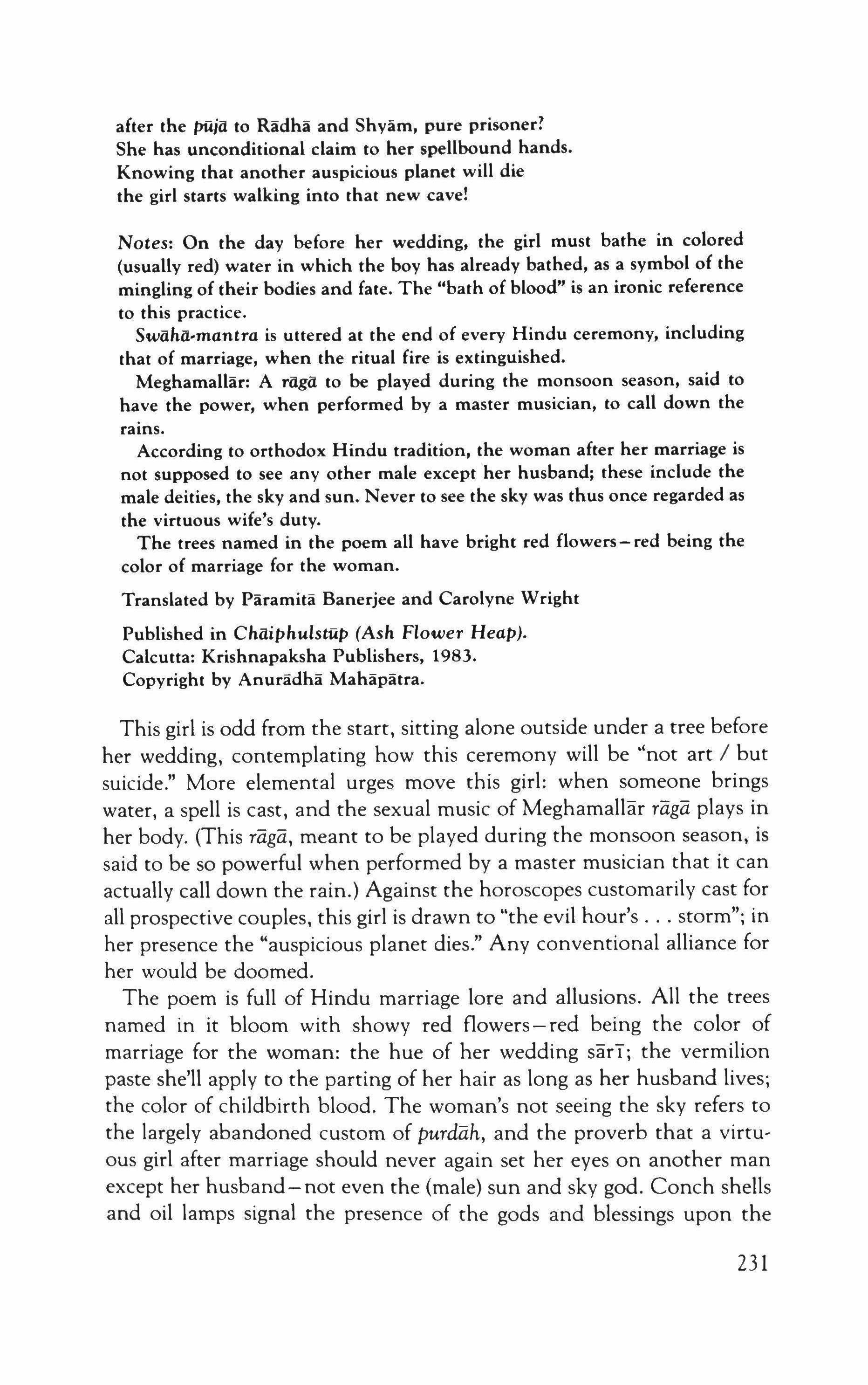
after the paia to Radha and Shvarn, pure prisoner? She has unconditional claim to her spellbound hands. Knowing that another auspicious planet will die the girl starts walking into that new cave!
Notes: On the day before her wedding, the girl must bathe in colored (usually red) water in which the boy has already bathed, as a symbol of the mingling of their bodies and fate. The "bath of blood" is an ironic reference to this practice.
Swaha-mantra is uttered at the end of every Hindu ceremony, including that of marriage, when the ritual fire is extinguished.
Meghamallar: A raga to be played during the monsoon season, said to have the power, when performed by a master musician, to call down the rains.
According to orthodox Hindu tradition, the woman after her marriage is not supposed to see any other male except her husband; these include the male deities, the sky and sun. Never to see the sky was thus once regarded as the virtuous wife's duty.
The trees named in the poem all have bright red flowers - red being the color of marriage for the woman.
Translated by Paramita Banerjee and Carolvne Wright
Published in Chaiphulsmp (Ash Flower Heap).
Calcutta: Krishnapaksha Publishers, 1983.
Copyright by Anuradha Mahapatra.
This girl is odd from the start, sitting alone outside under a tree before her wedding, contemplating how this ceremony will be "not art I but suicide." More elemental urges move this girl: when someone brings water, a spell is cast, and the sexual music of Megharnallar raga plays in her body. (This raga, meant to be played during the monsoon season, is said to be so powerful when performed by a master musician that it can actually call down the rain.) Against the horoscopes customarily cast for all prospective couples, this girl is drawn to "the evil hour's storm"; in her presence the "auspicious planet dies." Any conventional alliance for her would be doomed.
The poem is full of Hindu marriage lore and allusions. All the trees named in it bloom with showy red flowers-red being the color of marriage for the woman: the hue of her wedding sari; the vermilion paste she'll apply to the parting of her hair as long as her husband lives; the color of childbirth blood. The woman's not seeing the sky refers to the largely abandoned custom of purdah, and the proverb that a virtuous girl after marriage should never again set her eyes on another man except her husband - not even the (male) sun and sky god. Conch shells and oil lamps signal the presence of the gods and blessings upon the 231

union; the conch shells are blown by women of the bride's family at the arrival of the groom, and oil lamps brought to him on platters of sweets and flowers. At this point in the festivities, the typical bride would be sitting in glory on a dais in an inner room, surrounded by family and friends, her eyes downcast, her demeanor meek and demure, betraying (as modesty demands) no enjoyment or excitement.
But the girl in the poem is motivated by desires that threaten to tear at the traditions given official religious and social sanction: desires for a genuine sexual union, as with the forces of the earth, and the consequent chance of personal fulfillment. These primordial urges are evoked in language redolent of tribal life - the "cave-art's alphabet" or the knowledge and skills by which such elemental life is conducted, the natural forces of the storm, the "boy grown straight and strong as the kadam-tree," the virile, freely chosen partner whom the girl is unlikely to meet in a traditional arranged marriage. By the end of the poem, though, the girl seems to have defeated tradition's hold on her: she is "walking into that new cave" of her own vitality, her own life.
There is a price to be paid, however, for freedom from social convention, especially for women. In a culture where custom still approves for women few options other than marriage; where almost all women, even the most educated and financially independent, feel compelled eventually to marry, the decision to remain unmarried carries with it a great burden of isolation and potential ostracism. There is virtually no "singles' lifestyle" in India, even in a large cosmopolitan city like Calcutta. Despite progress in educational and employment opportunities for women, despite family-planning programs and a growing women's movement especially among India's large middle class, many women are still trained to regard the husband as a god. The statement, "I have not seen God" by an unmarried woman could therefore carry a doubleedged meaning. In "God," the unmarried speaker accordingly conflates spiritual and religious associations with those related to marriage-to ironic effect:
God
I have not seen God. When I see temples I think of Hiranyakashipu the demon king, and when I see an image worshipped I think about the daughter of the house being sold for cash. Offering one faded life to another.
To see blood coughed
232

from the mouths of the bloodless is the final joke.
Still, when I saw that fellow in the grimy blue-black Teshirt on the tram, straight as a cast-iron cannon, I wished he were God! Then at least I'd have gotten a proper place to hide, or I could have pushed him and even if he'd been killed I could have loved him.
Nowadays when I put my foot on the running board of a bus I think of God.
Notes: The demon king Hiranyakashipu is usually depicted in temple iconography being torn apart by Narasinha, the lion-headed incarnation of the god Vishnu.
This 'poem exemplifies, albeit in an extreme and contemporary urban form, the bhakti (devotional) tradition of seeing God in all forms of life, even the lowest.
Translated by jvotirmov Datta and Carolyne Wright
Published in Chaiphulstup (Ash Flower Heap).
Calcutta: Krishnapaksha Publishers, 1983.
Copyright by Anuradha Mahapatra.
This speaker's view of religion is not favorable. When she sees temples she thinks of God in one of his most "beastly," horrific manifestationsas Hiranyakashipu, a tyrannical demon-king always depicted being torn apart by Narasirnha, the lion-headed incarnation of the god Vishnu. Seeing other images worshipped reminds her of the cruelties of the dowry system, the coldly commercial transaction of "marrying off' and getting rid of the daughter, who becomes in the flower of her adolescence a "faded life" with no opportunity for choice or control over her destiny. Like those who suffer from tuberculosis (a disease still common among the poor in India), this girl coughs up her life - metaphorically of course in her case-but like the truly bloodless, she who is married off is already in effect dead.
Nevertheless, the unmarried speaker still longs for the comforts and social protections, as well as the sexual expression accorded to Indian women only in marriage. She invests her frustration and loneliness in the virile figure of the fellow on the tram-a lower-caste fellow, his clothing tells us; the cannon simile, clearly phallic - and her spiritual and sexual yearnings merge in the wish that "he were God." The final conditional statements reveal in a daringly ugly way the extent of the 233

speaker's desperation: perhaps the only contact, the only expression of love possible for this isolated woman is with a stranger on a public tram, in an "accidental" touch or possibly fatal push. Anyone who has ridden Calcutta's perilously overcrowded (and often doorless) busses and trams as they brake, lurch, race each other and sometimes turn over going too fast around corners, knows how common such accidents can be. Ironically then, this poem's lonely speaker may be closer to God than the temple devotee or the woman with a husband to worship and serve: she thinks of God in the most ordinary, dangerous and unbeautiful places.
Although these last two poems could be construed as feminist in tone and stance, Anuradha asserts quite firmly that she is not a feminist: that is, she does not view men as "the enemy," the inherent oppressors of women. She may portray the injustices suffered by women, but she does not believe (as she told me in one of our interviews) in "such classification or division of male and female I am part of the whole society and culture, and the whole of human suffering also In India, she explained, feminism is still the province of the middle class. These privileged women do a great deal of voluntary social and charitable work among the poor, but they themselves suffer comparatively little. Women from the lower castes and less affluent socioeconomic levels, however, are painfully aware of the equality of poor men and women in the exploitation to which they are subject. Given India's staggering social problems, women concerned with larger sociopolitical and economic issues that involve whole castes, tribes, states and regions are often impatient with narrowly feminist agendas, or such frivolous (to their minds) debates as those about female writing styles or sentence construction, as have been explored in the West. Men and women must be dealt with together, they assert, if any social improvements are to succeed. Despite problems, family and community cohesiveness is very strong in India. The village woman transplanted to the city, as Anuradha herself is, can feel lost, alienated, longing for the manageable dimensions of village life, the love of her family, the quiet and beauty of the countryside. In one of her most affecting and lyrical poems, the epistolary "To You, Mother," Anuradha evokes her village girlhood, the simple details of life with her parents-though there is no sense here of the presence of her brothers and sister. To this poignancy of recollection she counterposes the isolation of her "boarding-house life" in the big city, the "fear and greed, death's masks" of which urban existence seems to be constituted.
234
To You, Mother
Long time no letter from you, Mother, dreams of seastorms that pressed my face in fear to your breasts smelling of neem, a long-time embroidery work covering my face with lemon flowers, I've been beyond the hunger for your fresh hot bread a long while. Here, fear and greed, dearh's masks. Sleepless, hanging up my mosquito net, I watch the gecko's stealth stalking a moth, this boarding-house life like a train fading away inside the room. Keys tied to your sari-end haven't jangled for a long time, smell of your quilt, I haven't eaten murala-fish and rice from your hands for a long while, Mother. For you, Mother, my eyes are boats, or stones, endless rolls of blank paper. Where does love lie, Mother? In your troubled breathing? The faded red border of your sari? Bloodless pale soles of your feet or in Father's hair now sprinkled salt-white, in light of the storm lantern hanging from his shoulder? In paper bags of rice puffs and molasses candy he brought for me? Or when you learned I'd have to cross two whole rivers the light faded in both your faces. "Have a safe journey, Baby."-I have no salutations for you, Mother, I drop of your blood, but now so far away, my body now filled with a secret thrill. Not the light in your marriage-mark's vermilion, this my moon's dark phase, when my breast-flower first blossomed. Eerily alone I look at one one-stringed lute, not knowing who this vigil's for. Yet these eyes of mine have looked into the holy image of your eyes. Receive my salutation, keep well, let the water of two whole rivers stay dammed in my heart for you, Mother.
Thus, your lonely self-begotten.

Notes:
Neem: The margosa tree, whose fragrant and astringent twigs are used by Bengali villagers to brush their teeth.
Murala: A tiny, minnow-like inexpensive fish, curried and eaten whole in Bengali dishes.
The "moon's dark phase" is krishnapaksha in Bengali, an expression denoting the dark nights preceding the new moon every month, and still a way of referring to and measuring time in India.
235

Krishnapaksha is also the name of the publisher of the poet's first book, in which this poem appears.
The "one-stringed lute" is the ektard (literally, "one-string"), made from a bottle gourd and played by the bauls, wandering musicians and members of a syncretic devotional sect of Bengal.
The entire Bengali phrase, chamchame eka ek ektara dekhi, stresses the aloneness and singularity of the poem's speaker, in its repetition of forms of ek, the word for "one."
Translated by Jyotirmoy Datta and Carolvne Wright
Published in Chdiphulswp (Ash Flower Heap).
Calcutta: Krishnapaksha Publishers, 1983.
Copyright by Anuradha Mahapatra.
What is probably most pleasing for the Western reader about this poem is its wealth of realistic, almost cinematographic detail of domestic life in rural Bengal. From her memory the poet picks out the kantha (embroidery-work) quilt pulled over the sleepy child's face, the jangling of the mother's keys knotted at the end of her sari, the storm lantern hanging from her father's shoulder as he returns in the evening with small bags of sweets for his daughter. The grown daughter alone in her hostel room at night, hanging up her mosquito net from the bedposts, watches a tik-tiki (gecko) stalking a moth on the wall and sees in it a figure for the predatory nature of city life. She recalls how she explained to her dismayed parents the distance between that city and the village she is about to leave, in terms they as villagers are most familiar with: the "two whole rivers" are the Subarnarekha, which flows through the family's native Medinipur district, and the Hooghlv, the distributary of the Ganga on whose eastern banks lies Calcutta. By the poem's end, the rivers - both of which flow from the direction of her village toward this city where she now lives-have become metaphorical as well: figures for the abiding sources of her inner life, however "dammed" or circumscribed these may be.
As a meditation, this poem is not strictly narrative or chronological. Its moments follow one another by association, as the reminiscing writer of the ostensible letter home moves back and forth between images from the distant and recent past in her village, and those of her urban present. This speaker likewise vacillates between the two worlds-the village, whose mythical substratum, religious and social traditions, and family ties can absorb and overwhelm the individual in a powerful web of connectedness, and give her a well-defined, secure but inflexible role in the cyclical dynamic of survival; and the city, which holds out the promise of individual fulfillment and progress through education, em-
236
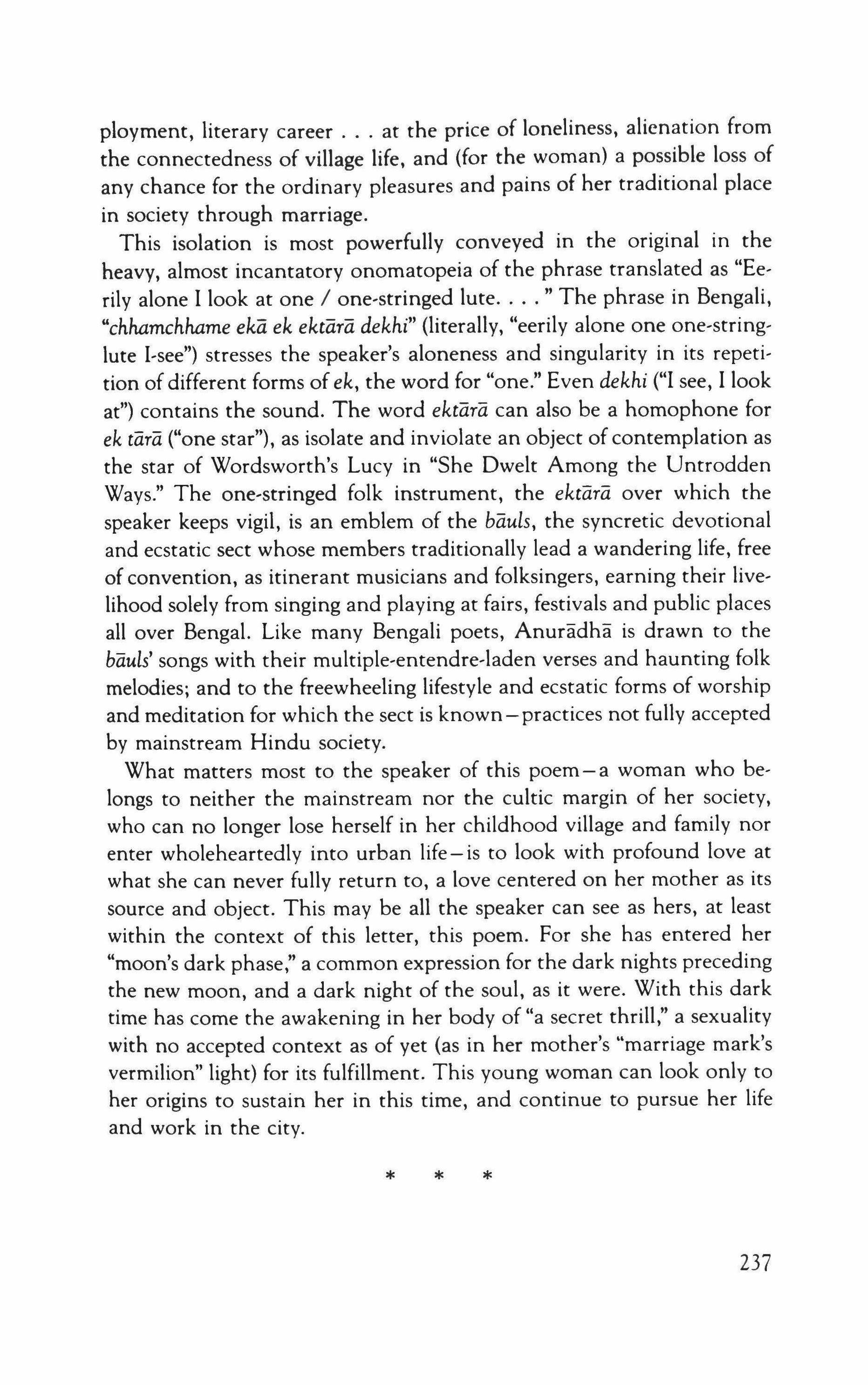
ployment, literary career at the price of loneliness, alienation from the connectedness of village life, and (for the woman) a possible loss of any chance for the ordinary pleasures and pains of her traditional place in society through marriage.
This isolation is most powerfully conveyed in the original in the heavy, almost incantatory onomatopeia of the phrase translated as "Eerily alone I look at one lone-stringed lute " The phrase in Bengali, "chhamchhame eka ek ektara dekhi" (literally, "eerily alone one one-stringlute l-see") stresses the speaker's aloneness and singularity in its repetition of different forms of ek, the word for "one." Even dekhi ("I see, I look at") contains the sound. The word ektara can also be a homophone for ek tara ("one star"), as isolate and inviolate an object of contemplation as the star of Wordsworth's Lucy in "She Dwelt Among the Untrodden Ways." The one-stringed folk instrument, the ektara over which the speaker keeps vigil, is an emblem of the hauls, the syncretic devotional and ecstatic sect whose members traditionally lead a wandering life, free of convention, as itinerant musicians and folksingers, earning their livelihood solely from singing and playing at fairs, festivals and public places all over Bengal. Like many Bengali poets, Anuradha is drawn to the hauls' songs with their multiple-entendre-laden verses and haunting folk melodies; and to the freewheeling lifestyle and ecstatic forms of worship and meditation for which the sect is known-practices not fully accepted by mainstream Hindu society.
What matters most to the speaker of this poem-a woman who belongs to neither the mainstream nor the cultic margin of her society, who can no longer lose herself in her childhood village and family nor enter wholeheartedly into urban life-is to look with profound love at what she can never fully return to, a love centered on her mother as its source and object. This may be all the speaker can see as hers, at least within the context of this letter, this poem. For she has entered her "moon's dark phase," a common expression for the dark nights preceding the new moon, and a dark night of the soul, as it were. With this dark time has come the awakening in her body of "a secret thrill," a sexuality with no accepted context as of yet (as in her mother's "marriage mark's vermilion" light) for its fulfillment. This young woman can look only to her origins to sustain her in this time, and continue to pursue her life and work in the city.
* * * 237

It is difficult to compose an adequate introduction for Western readers to the work of a poet like Anuradha Mahapatra without providing a comprehensive overview of the culture from which poet and poems emerge. That the translator must literally carry that culture across, along with the work being translated, is nowhere more evident than with a language like Bengali. Unlike European and European-derived languages which share a common [udeo-Christian, Greco-Roman culture, history, and general set of values and assumptions, Bengali and other languages of the Indian subcontinent do not lend themselves so readily to non-Indian readers, even in translation. Their Indo-European connection has been overlaid with several thousand years of intervening history and cultural evolution, largely independent from the West until the last several centuries of British trade and colonialization. Even in the Raj era, "native life," as it was called-indigenous culture-kept its identity distinct from the influences absorbed by a minority of the upper classes. For Westerners interested in Bengali writing in translation, there are few books available, most of them novels or poetry selections of Nobel-Prize-winning Rabindranarh Tagore. Neither the recent flurry of books and films set during the Raj (most of which deal almost exclusively with British characters and situations) nor the media's focus on Mother Teresa of Calcutta, on floods in Bangladesh, separatist violence in Darjeeling, and disease and squalor throughout, can give any but the most superficial notion of Bengali life. Some knowledge of Indian philosophy, mythology and iconography, Hindu and Muslim religious tenets, Indian music and dance, is helpful, as is familiarity with the works of Tagore, the films of Satyajit Ray. All of this material is available in the West.
Such familiarity, along with a basic knowledge of Bengali, were what I began with when I came to Calcutta in November 1986; I was fortunate to be able to immerse myself there for nearly two years in Bengali culture. But despite extensive exploration of Calcutta, visits to surrounding villages and settlements, travel through much of West Bengal, and a network of Bengali colleagues and friends, much of Anuradha's subject matter lay outside of my personal experience. I was dependent on reading, conversations with Bengali friends and the information provided by my co-translators for many of the allusions to traditions, customs, proverbial expressions and recent political events. Each poem here could be introduced with more extensive notes, such as William Radice provides for his Selected Poems of Rabindranath Tagore; but I have attempted to convey essential background information in a sue-
238

cinct manner, avoiding a scholarly tone and yet making these poems as accessible as I could to the general reader.
I am indebted to Jyotirmoy Datta for first introducing me to Anuradha's work, and for communicating to me his sense of excitement for it through his high-spirited imagination and acute critical perceptions; and to Pararnita Banerjee for her unflagging efforts to continue and complete the remainder of the first English drafts-efforts that persisted alongside full-time teaching and family duties, the birth of a second daughter, the translation of other women poets for me, and a bizarre kidnapping and robbery incident in which she disappeared and was unconscious for nearly twenty-four hours, and found only by chance by a friend on the platform at Sealdah Railway Station! lowe much as well to the families and friends of these two co-translators, for their generous hospitality and friendship to me, and for assistance with many practical tasks without which this work would have been greatly impeded.
From Anuradha Mahapatra herself I received, besides her consent to have the work translated and published in English, a powerful sense of dedication to an art that is even less remunerated, subsidized and distributed in Bengal than its counterpart in the U. S. - an art that is nonetheless far more widely respected and deeply loved among Bengalis. Whatever her earlier obscurity, Anuradha Mahapatra has become one of Bengal's most respected younger poets, an uncompromising practitioner of her craft and her social and political ideals, with little interest in the external trappings of fame and fortune. She is one of the group of politically committed "antiestablishment" writers who are opposed to the commercialism and patronage-seeking of many big-name Bengali authors, and for several years she has refrained from sending her poems to the mainstream magazines and book publishers. Unlike some of the authors I met, with Anuradha no internal engines of ambition roared into high gear at the prospect of having her work receive attention in the West. Though pleased, she seemed more bemused than anything at my interest.
The last time I saw her before my departure from India, she expressed her bemusement once again. We met by chance in Shantiniketan, outside the Purba Palli Guesthouse where we had each come with friends to attend the mid-April (1988) Bengali New Year celebrations sponsored by Visva Bharati University in honor of its founder Rabindranath Tagore; we had just come away from an open-air performance of Tagore's dancedrama ShyamalT. As we stood in the lane outside the guesthouse in the
239
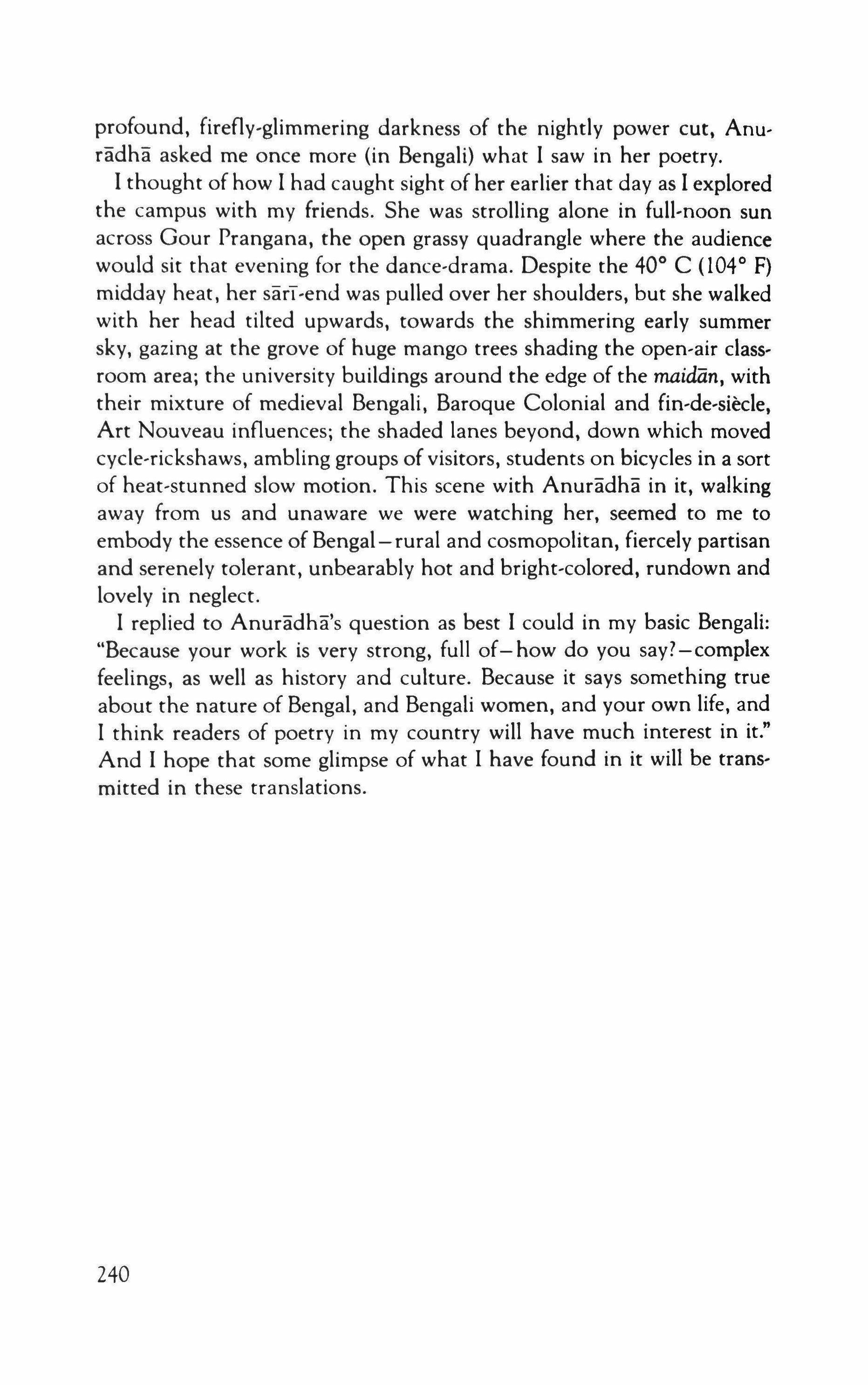
profound, firefly-glimmering darkness of the nightly power cut, Anura:dha: asked me once more (in Bengali) what I saw in her poetry.
I thought of how I had caught sight of her earlier that day as I explored the campus with my friends. She was strolling alone in full-noon sun across Gour Prangana, the open grassy quadrangle where the audience would sit that evening for the dance-drama. Despite the 400 C (1040 F) midday heat, her sari-end was pulled over her shoulders, but she walked with her head tilted upwards, towards the shimmering early summer sky, gazing at the grove of huge mango trees shading the open-air classroom area; the university buildings around the edge of the maidan, with their mixture of medieval Bengali, Baroque Colonial and fin-de-siecle, Art Nouveau influences; the shaded lanes beyond, down which moved cycle-rickshaws, ambling groups of visitors, students on bicycles in a sort of heat-stunned slow motion. This scene with Anuradha in it, walking away from us and unaware we were watching her, seemed to me to embody the essence of Bengal- rural and cosmopolitan, fiercely partisan and serenely tolerant, unbearably hot and bright-colored, rundown and lovely in neglect.
I replied to Anuradha's question as best I could in my basic Bengali: "Because your work is very strong, full of-how do you say?-complex feelings, as well as history and culture. Because it says something true about the nature of Bengal, and Bengali women, and your own life, and I think readers of poetry in my country will have much interest in it." And I hope that some glimpse of what I have found in it will be transmitted in these translations.
240


Sappho
Sam Hamill

He is almost a god, a man beside you, enthralled by your talk, by your laughter. Watching makes my heart beat fast because, seeing little, I imagine much. You put a fire in my cheeks. Speech won't come. My ears ring. Blind to all others, I sweat and I stammer. I am a trembling thing, like grass, an inch from dying.
So poor I've nothing to lose, I must gamble
All the stars turn away their faces when the pale moon grows full, who, in her splendor, turns the wide, shining world into silver.
Had you lusted after something noble or decent, had you not filled your talk with the vilehad you told the truth, shame would not force you to turn away your eyes.
243
Eros seizes and shakes my very soul like the wind on the mountain shaking ancient oaks.

As the full moon slowly rose, women rose before it as though it were an altar.
At last, on delicate feet, the women of Crete dance 'round the altar, tromping down soft summer grass.
Someday you will be dead. Even our memory of you will die.
You think you've earned a wreath of laurels to crown your pretty head?
Unknown even as you wander the infinities of Hell, you belong among the shadows of the dead.
Must be some girl from the villages has hypnotized your heart:
some tart who's yet to learn how and when to drop her dress!
244
Never being one for vengeance, I cling to a childlike innocence.
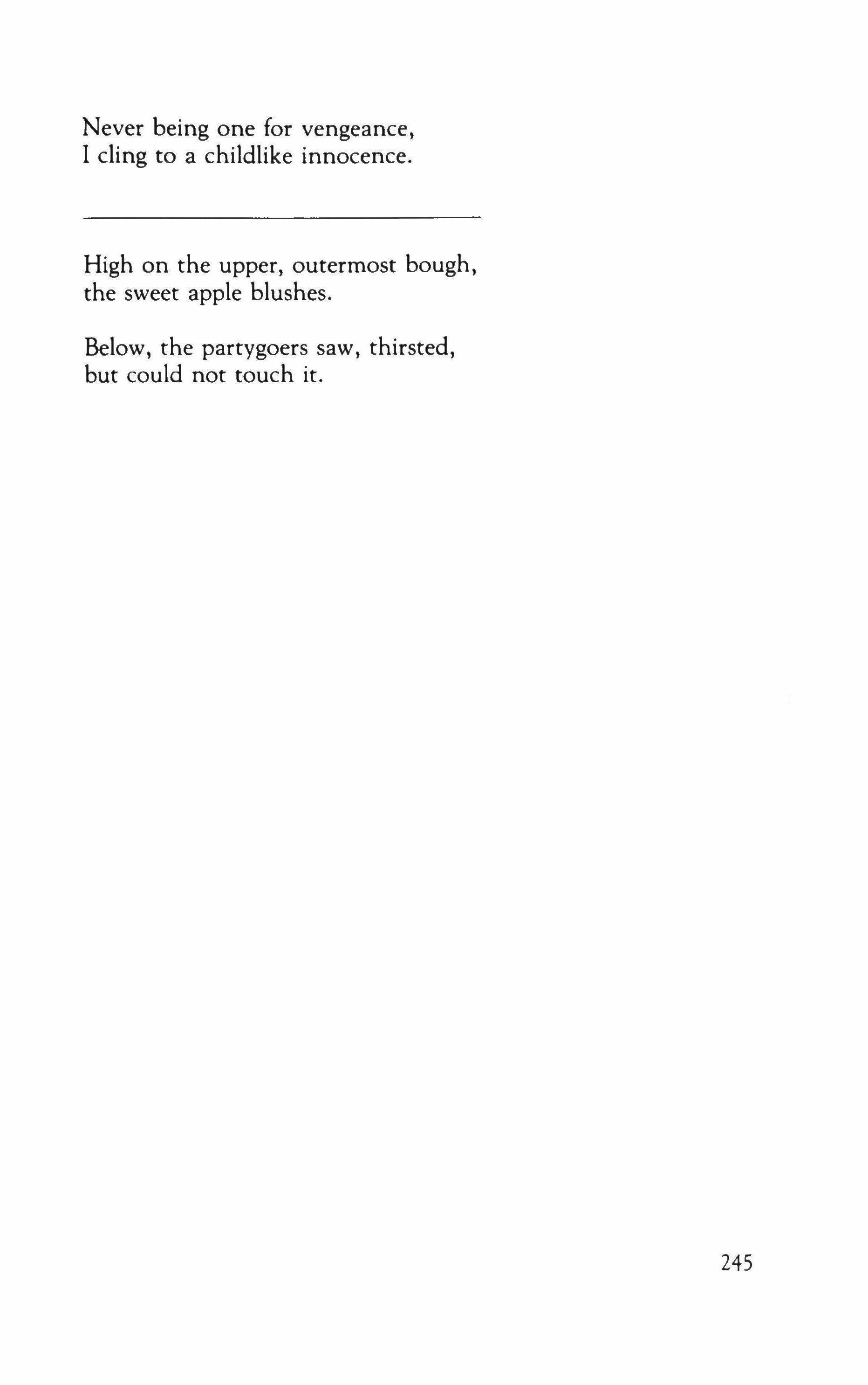
High on the upper, outermost bough, the sweet apple blushes.
Below, the partygoers saw, thirsted, but could not touch it.
245
1 7 from Sappho: You Burn Me
Stephen Berg

you burn me burn me burn me whose these arms can't touch the sky his yours do you love him two minds better to me
wind heart of a little child fantasy there is touch the problem of the night o who and I yearn for you who cannot touch the sky well one day I saw the prettiest girl picking flowers there is the problem of of dawn sleep next to me fingertips graze my face the bright and beautiful belong what a thought to the desire of the sunlight gold nothing destroys moth worm neither can eat it
246
not one human heart has ever resisted it or the moon
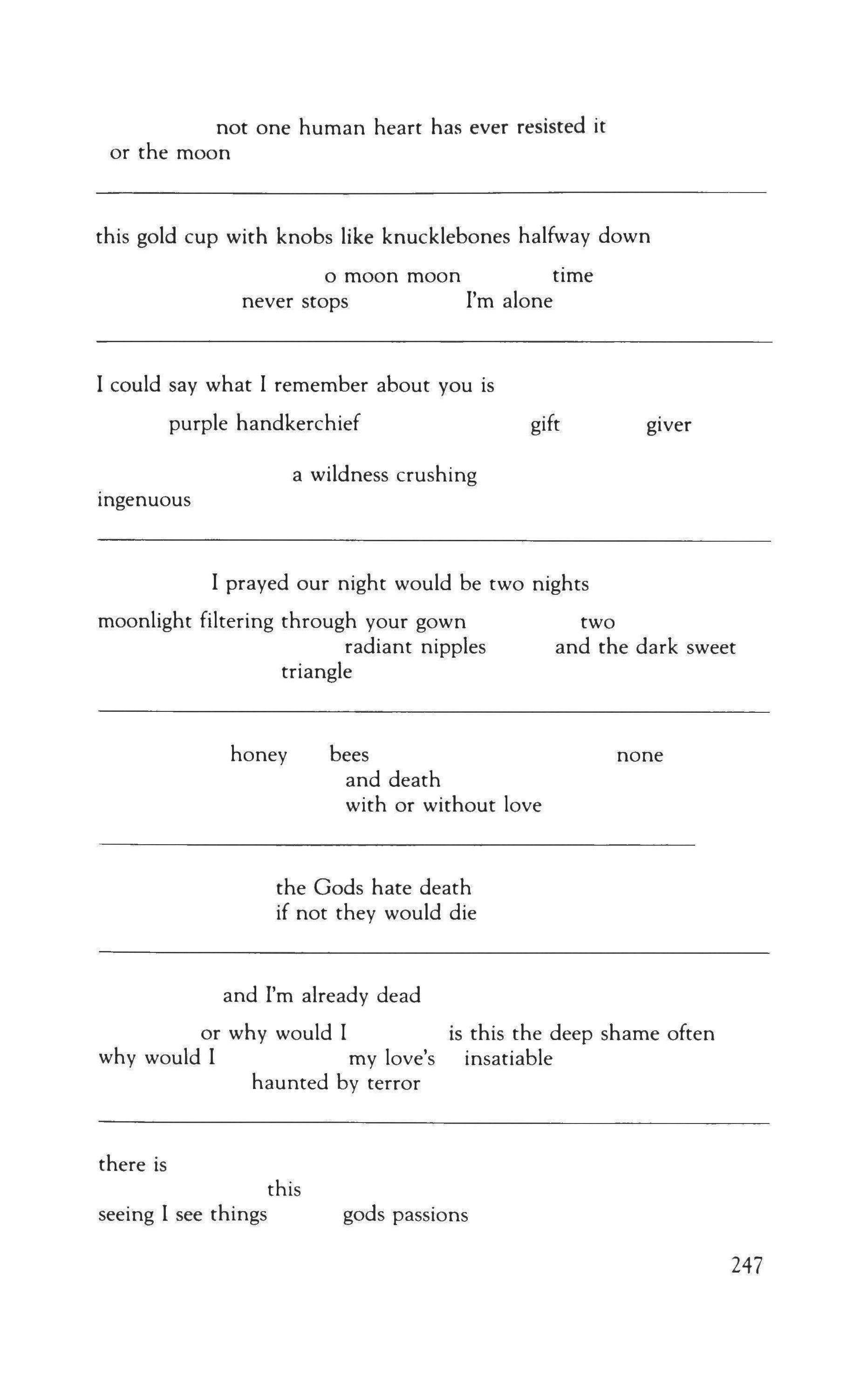
this gold cup with knobs like knucklebones halfway down o moon moon time never stops I'm alone
I could say what I remember about you is purple handkerchief gift giver a wildness crushing ingenuous I prayed our night would be two nights moonlight filtering through your gown radiant nipples triangle two and the dark sweet honey bees and death with or without love none the Gods hate death if not they would die and I'm already dead or why would I why would I my love's haunted by terror is this the deep shame often insatiable there is this seeing I see things gods passions
247

my arms legs stars flung on the sky my whole body
because forever nobody will ever touch me dust
o touch me now kiss these eyelids breasts thighs weeds the moon right there above your shoulder
unknown order stars in an could it be this voice trying to return
my heart and your heart touch I can feel how we will always shine back fair face upon fair face
deeper than flesh and blood
Brocheo
sitting watching your face I can barely breathe what are you I a god like this given your voice given your soft laughter I can barely speak
Brocheo who are you veiled eyes there's a singing trembling sweat trickles from every pore nothing's left I'm pale green grass to my soul poor
delicate fire and death and a dark burning there my death time again time threshold as always
o mind
dream and in it a sign Hermes I told Hermes
248
I wanted to die
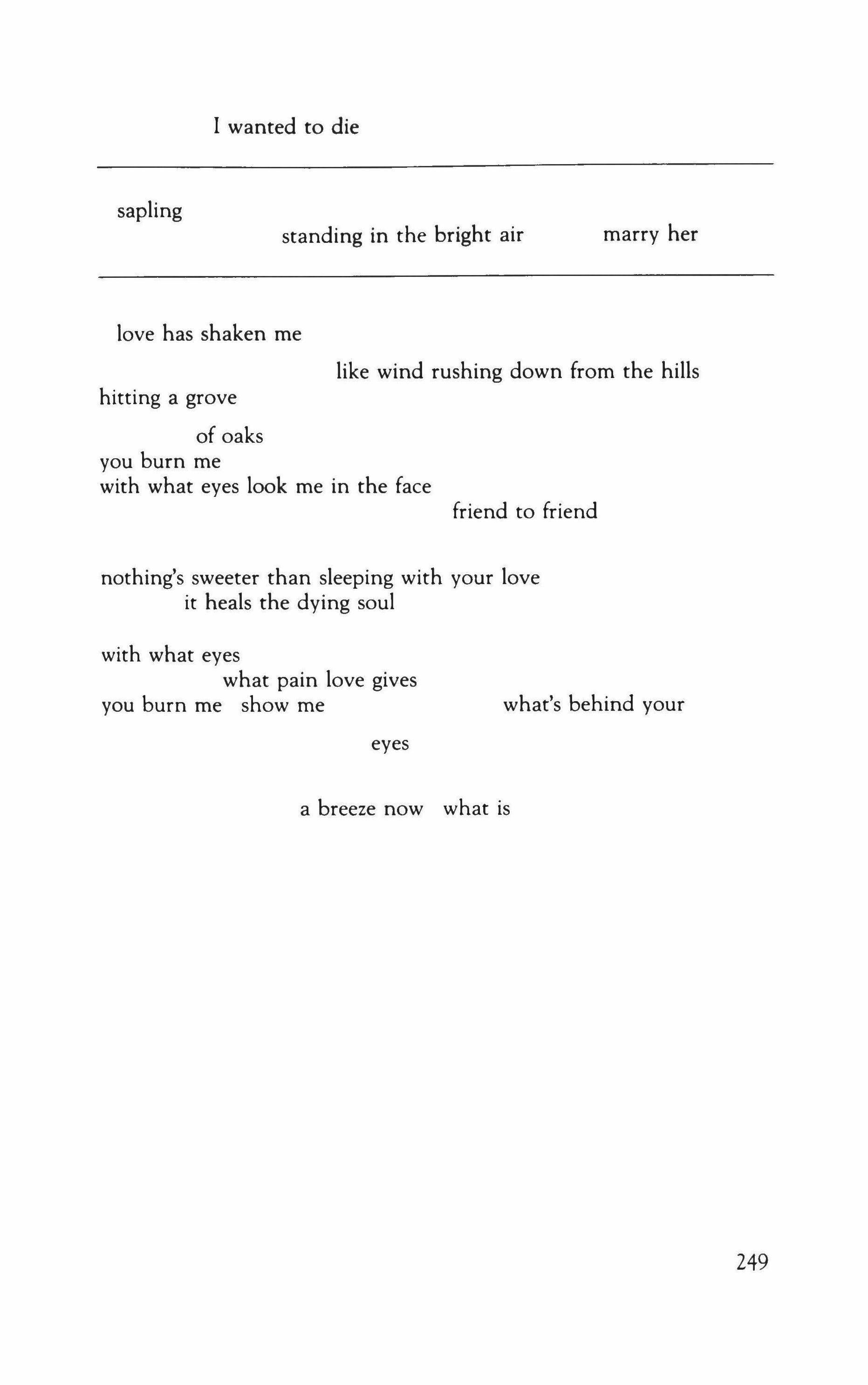
sapling
standing in the bright air marry her
love has shaken me
like wind rushing down from the hills hitting a grove of oaks you burn me with what eyes look me in the face friend to friend
nothing's sweeter than sleeping with your love it heals the dying soul with what eyes what pain love gives you burn me show me what's behind your eyes a breeze now what is
249
Contributors
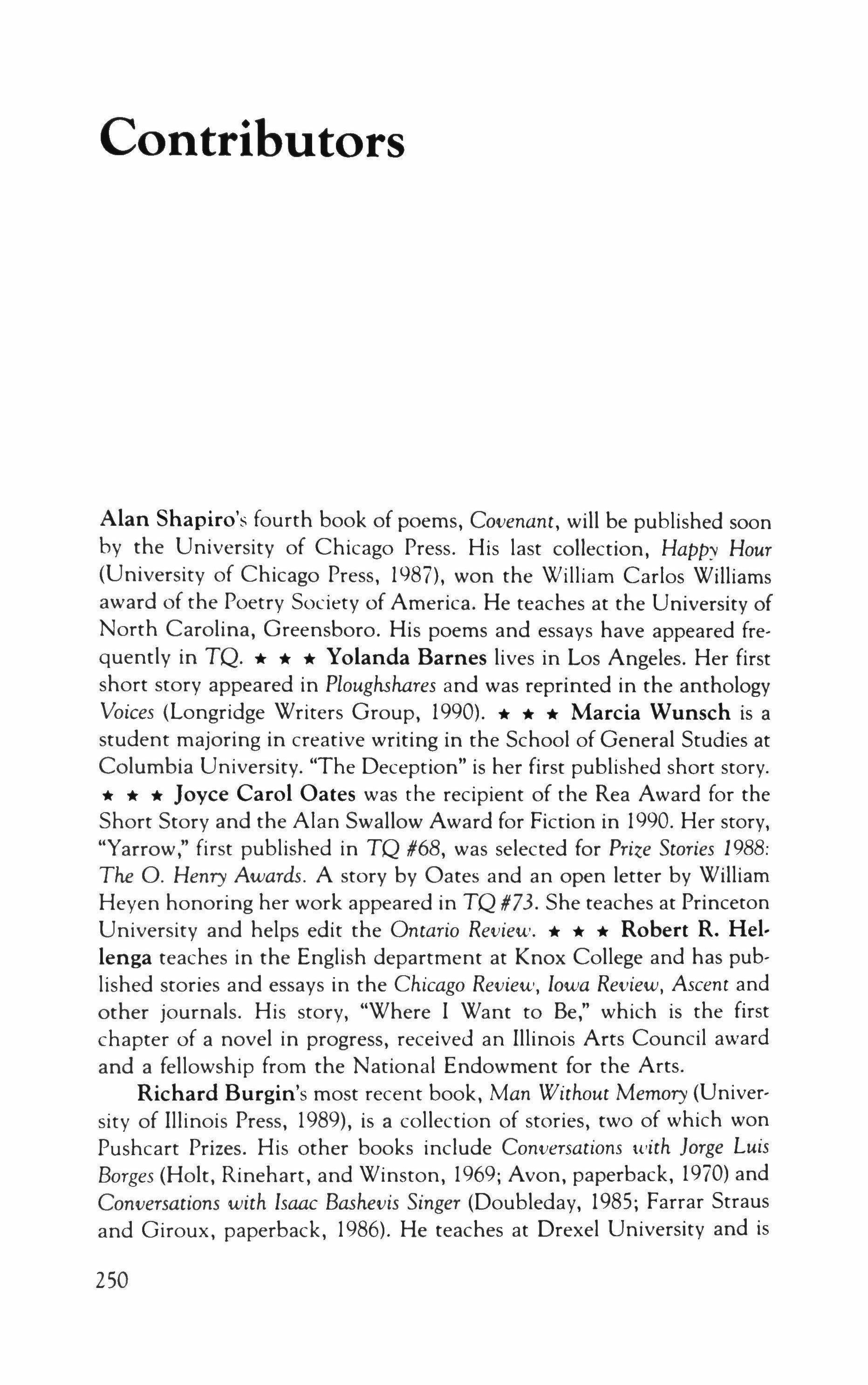
Alan Shapiro's fourth book of poems, Covenant, will be published soon by the University of Chicago Press. His last collection, Happy Hour (University of Chicago Press, 1987), won the William Carlos Williams award of the Poetry Society of America. He teaches at the University of North Carolina, Greensboro. His poems and essays have appeared frequently in TQ. * * * Yolanda Barnes lives in Los Angeles. Her first short story appeared in Ploughshares and was reprinted in the anthology Voices (Longridge Writers Group, 1990). * * * Marcia Wunsch is a student majoring in creative writing in the School of General Studies at Columbia University. "The Deception" is her first published short story.
* * * Joyce Carol Oates was the recipient of the Rea Award for the Short Story and the Alan Swallow Award for Fiction in 1990. Her story, "Yarrow," first published in TQ #68, was selected for Prize Stories 1988: The O. Henry Awards. A story by Oates and an open letter by William Heyen honoring her work appeared in TQ #73. She teaches at Princeton University and helps edit the Ontario Review. * * * Robert R. Hellenga teaches in the English department at Knox College and has published stories and essays in the Chicago Review, Iowa Review, Ascent and other journals. His story, "Where I Want to Be," which is the first chapter of a novel in progress, received an Illinois Arts Council award and a fellowship from the National Endowment for the Arts.
Richard Burgin's most recent book, Man Without Memory (University of Illinois Press, 1989), is a collection of stories, two of which won Pushcart Prizes. His other books include Conversations with Jorge Luis Borges (Holt, Rinehart, and Winston, 1969; Avon, paperback, 1970) and Conversations with Isaac Bashevis Singer (Doubleday, 1985; Farrar Straus and Giroux, paperback, 1986). He teaches at Drexel University and is
250
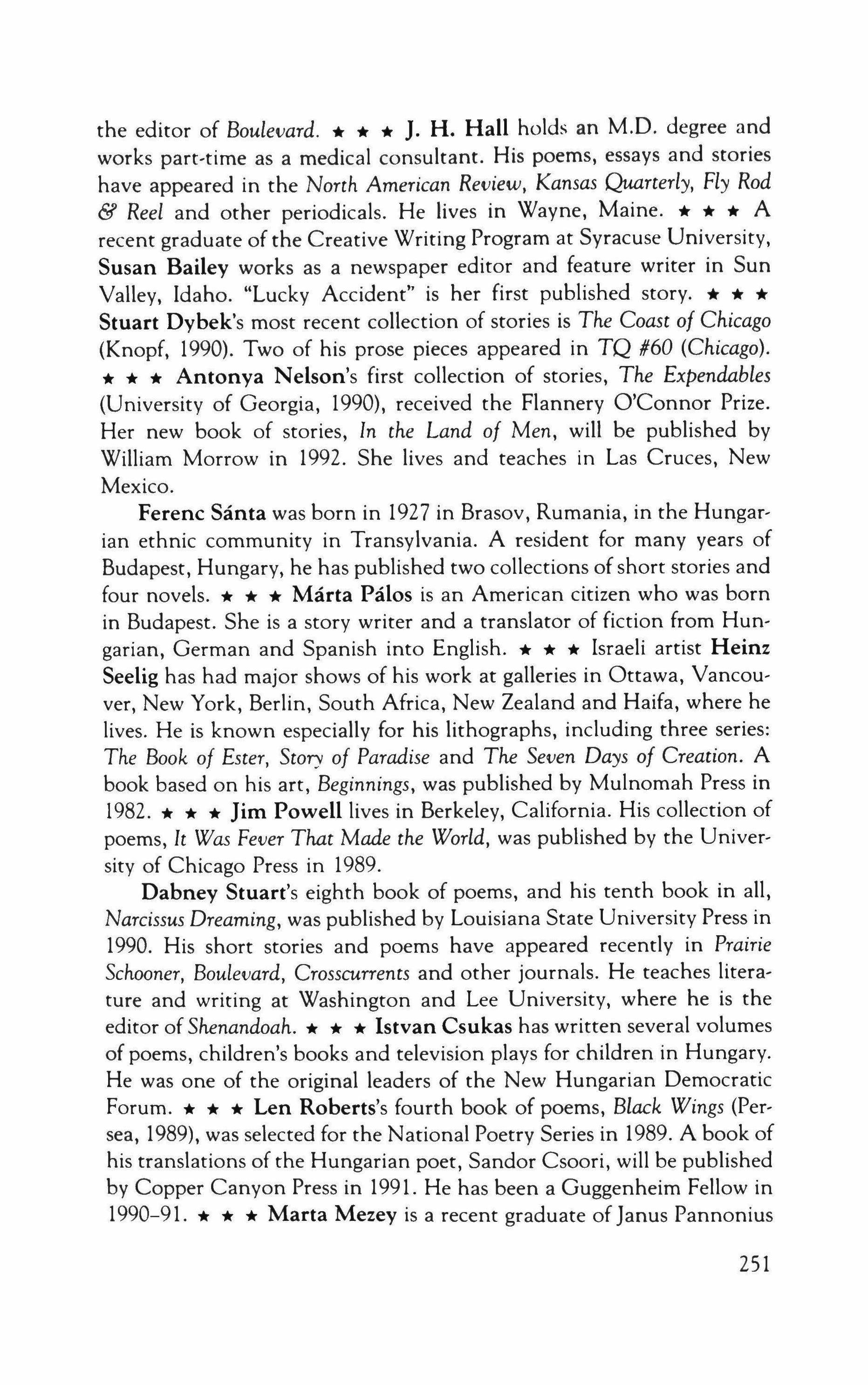
the editor of Boulevard. * * * J. H. Hall holds an M.D. degree and works part-time as a medical consultant. His poems, essays and stories have appeared in the North American Review, Kansas Quarterly, Fly Rod & Reel and other periodicals. He lives in Wayne, Maine. * * * A recent graduate of the Creative Writing Program at Syracuse University, Susan Bailey works as a newspaper editor and feature writer in Sun Valley, Idaho. "Lucky Accident" is her first published story. * * * Stuart Dvbek's most recent collection of stories is The Coast of Chicago (Knopf, 1990). Two of his prose pieces appeared in TQ #60 (Chicago). * * * Antonya Nelson's first collection of stories, The Expendables (University of Georgia, 1990), received the Flannery O'Connor Prize. Her new book of stories, In the Land of Men, will be published by William Morrow in 1992. She lives and teaches in Las Cruces, New Mexico.
Ferenc Santa was born in 1927 in Brasov, Rumania, in the Hungarian ethnic community in Transylvania. A resident for many years of Budapest, Hungary, he has published two collections of short stories and four novels. * * * Marta Palos is an American citizen who was born in Budapest. She is a story writer and a translator of fiction from Hungarian, German and Spanish into English. * * * Israeli artist Heinz Seelig has had major shows of his work at galleries in Ottawa, Vancouver, New York, Berlin, South Africa, New Zealand and Haifa, where he lives. He is known especially for his lithographs, including three series: The Book of Ester, Story of Paradise and The Seven Days of Creation. A book based on his art, Beginnings, was published by Mulnomah Press in 1982. * * * Jim Powell lives in Berkeley, California. His collection of poems, It Was Fever That Made the World, was published by the University of Chicago Press in 1989.
Dabney Stuart's eighth book of poems, and his tenth book in all, Narcissus Dreaming, was published by Louisiana State University Press in 1990. His short stories and poems have appeared recently in Prairie Schooner, Boulevard, Crosscurrents and other journals. He teaches literature and writing at Washington and Lee University, where he is the editor of Shenandoah. * * * Istvan Csukas has written several volumes of poems, children's books and television plays for children in Hungary. He was one of the original leaders of the New Hungarian Democratic Forum. * * * Len Roberts's fourth book of poems, Black Wings (Persea, 1989), was selected for the National Poetry Series in 1989. A book of his translations of the Hungarian poet, Sandor Csoori, will be published by Copper Canyon Press in 1991. He has been a Guggenheim Fellow in 1990-91. * * * Marta Mezey is a recent graduate of Janus Pannonius
251

University, in Pees, Hungary. This is her first published translation. * * * Daniel Halpern's forthcoming book of poems, Foreign Neon, will be published by Knopf in November 1991. His most recent collection is Tango (Viking/Penguin, 1987). He is an adjunct professor in the Graduate Writing Program at Columbia University and editor-in-chief of Antaeus and the Ecco Press.
Albert Goldbarth's new collection of poems, Heaven and Earth, is being published by the University of Georgia Press in 1991. He is the Distinguished Professor of Humanities at Wichita State University. A poem by Goldbarth appeared in TQ #60 (Chicago). * * * Sheila P. Donohue received the Stegner Poetry Fellowship at Stanford University for 1991. She held the Randall Jarrell Fellowship at the University of North Carolina, Greensboro, and received an Academy of American Poets Prize in 1990 for "The Mirror," which is published here for the first time. She was formerly the poetry editor of the Greensboro Review. Her poems have appeared in the Carolina Quarterly, the Southern Poetry Review and elsewhere. * * * Sandra McPherson's most recent book of poems is Screamers (Ecco Press, 1988). She teaches at the University of California at Davis. Her poems have appeared in TQ #74 and 76. * * * Linda McCarriston is the second recipient of the Terrence Des Pres Prize for Poetry. Her collection of poems, Eva-Mary, will be published by TriQuarterly Books/Another Chicago Press in fall 1991. Her first book of poems, Talking Soft Dutch, was published by Texas Tech University Press in 1984. Her poems have appeared in Poetry, the Georgia Review, TriQuarterly and other journals. She teaches at Vermont College.
M. Wvrebek graduated from Vassar College and is studying in the MFA program in creative writing at Warren Wilson College. * * * K. Reynolds Dixon's poems have appeared in the Greensboro Review, the Iowa Review, the International Poetry Review and other journals. He was formerly the Randall Jarrell Fellow at the University of North Carolina, Greensboro. * * * Teresa Cader's first book of poems, Guests, received the Ohio State University Press/The Journal Award in Poetry and will be published in fall 1991. She has received fellowships in poetry from the National Endowment for the Arts and the Mary Ingraham Bunting Institute at Radcliffe College. A poem by Cader appeared in TQ #67. * * * Sheryl St. Germain has published two chapbooks of poems, The Mask of Medusa (Cross Cultural, 1987) and Going Home (Perivale, 1989). She teaches writing at the University of Texas at Dallas and is the Dobie-Paisano Fellow for 1990-91. * * * B. H. Fairchild's books of poems include Flight (Devil's Millhopper Press, 1985), The 252
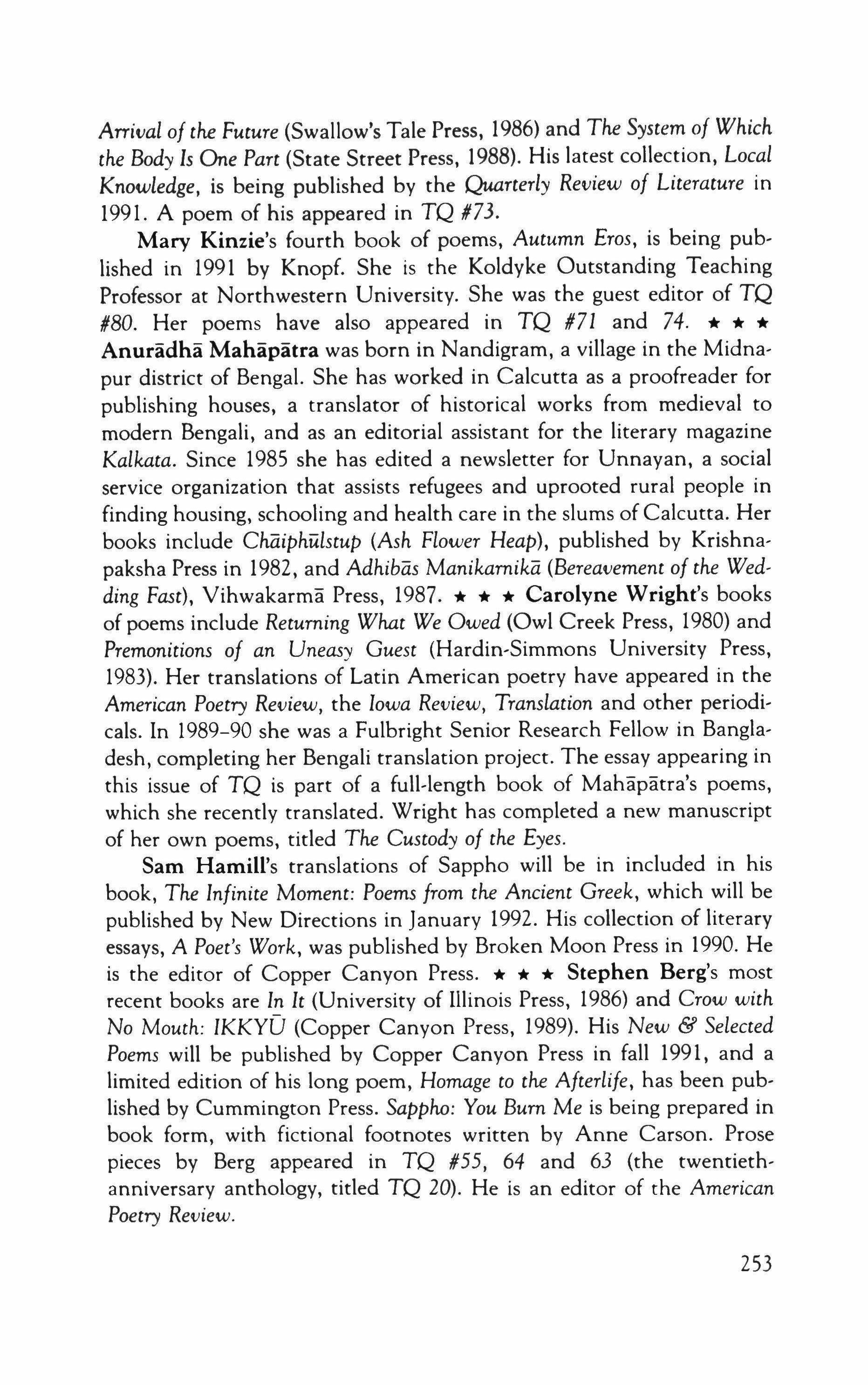
Arrival of the Future (Swallow's Tale Press, 1986) and The System of Which the Body Is One Part (State Street Press, 1988). His latest collection, Local Knowledge, is being published by the Quarterly Review of Literature in 1991. A poem of his appeared in TQ #73.
Mary Kinzie's fourth book of poems, Autumn Eros, is being published in 1991 by Knopf. She is the Koldvke Outstanding Teaching Professor at Northwestern University. She was the guest editor of TQ #80. Her poems have also appeared in TQ #71 and 74. * * *
Anuradha Mahapatra was born in Nandigram, a village in the Midnapur district of Bengal. She has worked in Calcutta as a proofreader for publishing houses, a translator of historical works from medieval to modern Bengali, and as an editorial assistant for the literary magazine Kalkata. Since 1985 she has edited a newsletter for Unnayan, a social service organization that assists refugees and uprooted rural people in finding housing, schooling and health care in the slums of Calcutta. Her books include Chaiphulstup (Ash Flower Heap), published by Krishnapaksha Press in 1982, and Adhibas Manikarnika (Bereavement of the Wedding Fast), Vihwakarrna Press, 1987. * * * Carolvne Wright's books of poems include Returning What We Owed (Owl Creek Press, 1980) and Premonitions of an Uneasy Guest (Hardin-Simmons University Press, 1983). Her translations of Latin American poetry have appeared in the American Poetry Review, the Iowa Review, Translation and other periodicals. In 1989-90 she was a Fulbright Senior Research Fellow in Bangladesh, completing her Bengali translation project. The essay appearing in this issue of TQ is part of a full-length book of Mahapatra's poems, which she recently translated. Wright has completed a new manuscript of her own poems, titled The Custody of the Eyes.
Sam Hamill's translations of Sappho will be in included in his book, The Infinite Moment: Poems from the Ancient Greek, which will be published by New Directions in January 1992. His collection of literary essays, A Poet's Work, was published by Broken Moon Press in 1990. He is the editor of Copper Canyon Press. * * * Stephen Berg's most recent books are In It (University of Illinois Press, 1986) and Crow with No Mouth: IKKYO (Copper Canyon Press, 1989). His New & Selected Poems will be published by Copper Canyon Press in fall 1991, and a limited edition of his long poem, Homage to the Afterlife, has been published by Cummington Press. Sappho: You Burn Me is being prepared in book form, with fictional footnotes written by Anne Carson. Prose pieces by Berg appeared in TQ #55, 64 and 63 (the twentiethanniversary anthology, tided TQ 20). He is an editor of the American Poetry Review.
253
The editors are indebted to Miriam Goldman and Goldman's Art Gallery, Haifa, Israel, and the Goldman-Kraft Gallery, Chicago, Illinois, for their kind assistance in obtaining the series of Heinz Seelig lithographs, The Seven Days of Creation, for publication.

A PLACE FOR SHORT FICTION
TriQuarterly has always been especially dedicated to short fiction. Lately, to powerful and original work by such newcomers-domestic and foreign-to the American scene as Susan Straight, Anne Calcagno, Amy Herrick, Leo Masliah and Angela Jackson. And to new fiction by Njabulo S. Ndebele, Carol Bly, Robert Coover and many others. Plus poetry, essays and graphic art. Join us now for our twenty-fifth anniversary year, when subscribers will receive our huge retrospective anthology of our best fiction from the 1980's.
TriQuarterly Northwestern University 2020 Ridge Ave., Evanston, Il 60208 $18 year/individuals $26 year/institutions $2501life subscription
254

"Ian MacMillan, a member of my children's generation, has emerged as the Stephen Crane of World War Two in Europe, coming closer to the truth of that nightmare, as did Crane to the truth of the nightmare of the Civil War, than has anyone who was really there. Orbit of Darkness is a Red Badge of Courage for our own century. H
-Kurt Vonnegut
"What caught me in its deathly grip and hurtled me to its awful conclusion was the sheer resourcefulness of the author's imagination and his determination to see the central formula of horror enacted across so vast a stage. No matter that everything here is shocking beyond our poor power to absorb shock. One finishes the book saying, 'It was so."
-R.V. Cossill
SHENANDOAH
THE WASHINOTON AND LEE UNIVERSITY REVIEW
"Full of fictional, critical, poetic and biographical splendor." - The Neui York Times Book Retneui
"The best literary magazines have always endeavored to discover, accommodate, and sustain good writing Shenandoah does all three." - Booklist
"A showcase for exceptional writing." - The Washington Post
AMONG OUR PAST CONTRIBUTORS:
Alice Adams
W. H. Auden
John Berryman
Philip Dacey
James Dickey
William Faulkner
Jorie Graham
Seamus Heaney
John Hersey
Conrad Hilberry
Daniel Hoffman
Wilham Hoffman
Maxine Kumin

Robert Lowell
Thomas McGuane
Howard Nemerov
Flannery O'Connor
Reynolds Price
David Slavin
Jean Stafford
Peter Taylor
Anne Tyler
John Updike
Eudora Welty
Richard Wilbur
Robert Wrigley
SHENANDOAH, Box 722, LEXINGTON, VA. 24450
Name ��
Address
City Slate Zip
SINGLE ISSUE: $3.50 SUBSCRIPTION: 511.00 A YEAR (514.00 FOREIGN)
PhoeniX'
Harriet Rubin's Mother's Wooden Hand
Susan Hahn
"Harriet Rubin s Mothers Wooden Hand is a superb book, passionate and moving, yet put together with considerable elegance and contral. I found it gripping and consistently involving. A very remarkable first book. "-Frank Bidart
Paper $8.95 96 pages
Cloth $22.00

Between the Chains
Turner Cassity
"At a time when most poems seem a commodity, quickly written, quickly read and easily thrown away, Turner Cassity's poems seem even more astonishing examples of good writing and reading, exceptions to be admired and kept."-Edgar Bowers
Paper $8.95 96 pages
Cloth $22.00 The University of Chicago Press
t� I. It ( tTY BHWHI 'hUNS { .ih ct. \.):;
5801 South Ellis Chicago,IL 60637
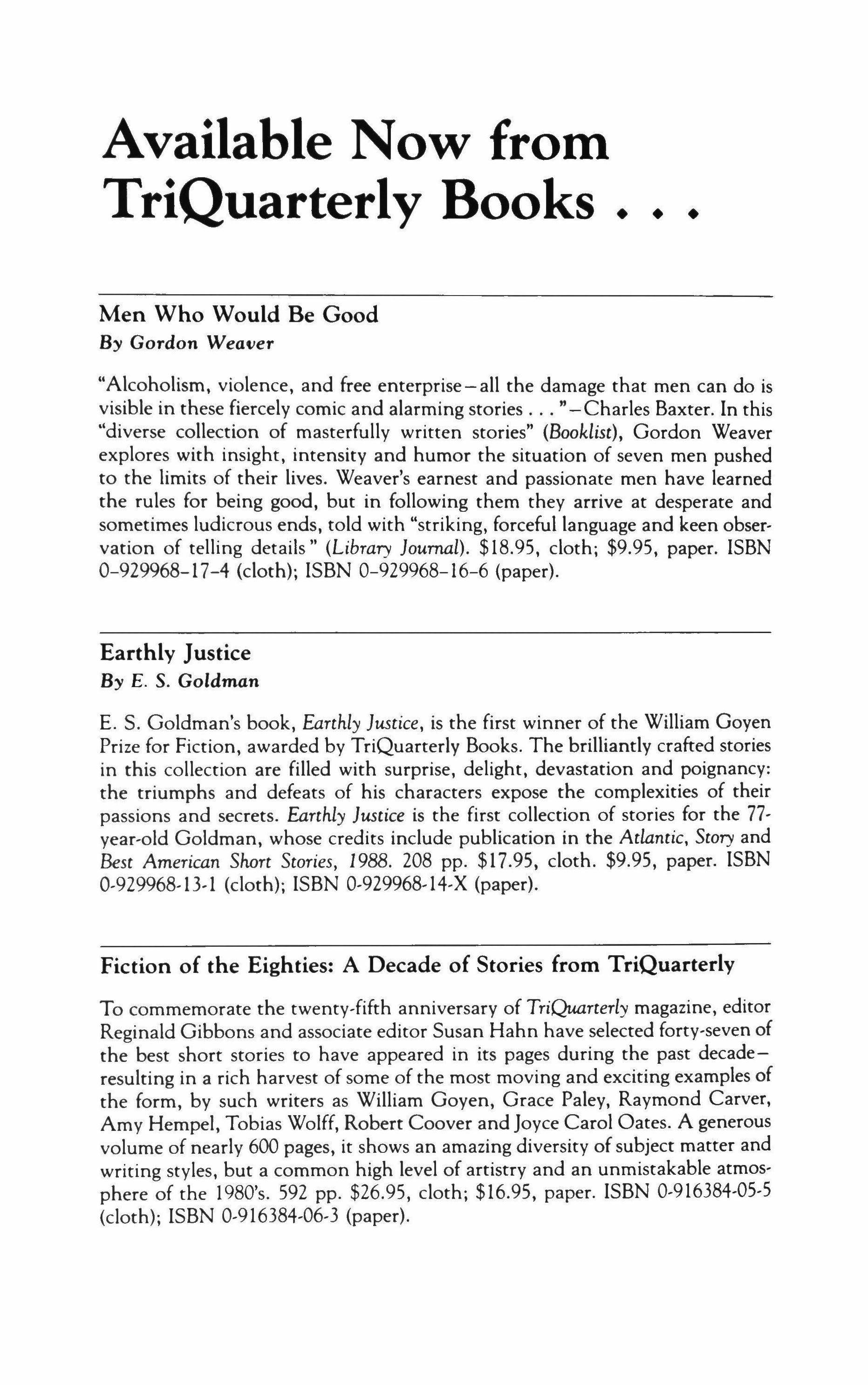
Available Now from TriQuarterly Books
Men Who Would Be Good
By Gordon Weaver
"Alcoholism, violence, and free enterprise-all the damage that men can do is visible in these fiercely comic and alarming stories "-Charles Baxter. In this "diverse collection of masterfully written stories" (Booklist), Gordon Weaver explores with insight, intensity and humor the situation of seven men pushed to the limits of their lives. Weaver's earnest and passionate men have learned the rules for being good, but in following them they arrive at desperate and sometimes ludicrous ends, told with "striking, forceful language and keen observation of telling details" (Library Journal). $18.95, cloth; $9.95, paper. ISBN 0-929968-17-4 (cloth); ISBN 0-929968-16-6 (paper).
Earthly Justice
By E. S. Goldman
E. S. Goldman's book, Earthly Justice, is the first winner of the William Goyen Prize for Fiction, awarded by TriQuarterly Books. The brilliantly crafted stories in this collection are filled with surprise, delight, devastation and poignancy: the triumphs and defeats of his characters expose the complexities of their passions and secrets. Earthly Justice is the first collection of stories for the 77year-old Goldman, whose credits include publication in the Atlantic, Story and Best American Short Stories, 1988. 208 pp. $17.95, cloth. $9.95, paper. ISBN 0-929968-13-1 (cloth); ISBN 0-929968-14-X (paper).
Fiction of the Eighties: A Decade of Stories from TriQuarterly
To commemorate the twenty-fifth anniversary of TriQuarterly magazine, editor Reginald Gibbons and associate editor Susan Hahn have selected forty-seven of the best short stories to have appeared in its pages during the past decaderesulting in a rich harvest of some of the most moving and exciting examples of the form, by such writers as William Goyen, Grace Paley, Raymond Carver, Amy Hempel, Tobias Wolff, Robert Coover and Joyce Carol Oates. A generous volume of nearly 600 pages, it shows an amazing diversity of subject matter and writing styles, but a common high level of artistry and an unmistakable atmosphere of the 1980's. 592 pp. $26.95, cloth; $16.95, paper. ISBN 0-916384-05-5 (cloth); ISBN 0-916384-06-3 (paper).
• • •
Selected Poems: The Weight of the Body
By Stanislaw Baranclak
Translated from the Polish by several distinguished translators and the author, this is the first full-length poetry collection to be published in the U.S. by Stanislaw Baranczak, the brilliant poet, essayist and translator who has lived here in exile since 1981. Baranczak's is a distinctive voice of great range-from satire to elegy, from farce to lyric. First winner of the Terrence Des Pres Prize for Poetry. 96 pp. $16.95, cloth; $8.95, paper. ISBN 0-929968-02-6 (cloth); ISBN 0-929968-01-8 (paper).
Stephen Deutch, Photographer
This long overdue collection of more than a half-century of the work of photographer Stephen Deutch - the first full record of his multifaceted achievement to be published-is a companion volume to his recent retrospective exhibition at the Chicago Cultural Center. Like the show, the book covers the full range of Deutch's vast body of work, including photojournalism, portraiture, nudes and advertising. With a preface by Studs Terkel and a critical essay by Abigail Foerstner. 192 pp., with plates both in duotone and color. $45.00, cloth; $23.50, paper. ISBN 0-929968-05-0 (cloth); ISBN 0-929968-06-9 (paper).
The Collected Poems of Sterling A. Brown
Selected by Michael S. Harper
Arguably the greatest black poet of our time, Sterling A. Brown, who died in 1989, is a legend among writers, teachers and readers-an extraordinary poet, the founder of African-American literary criticism and a great teacher and scholar. His poems have brought neglected but essential and precious subjects, tones of voice, and poetic techniques into American poetry. His Collected Poems, winner of the Lenore Marshall Prize when first published in 1984, has now been returned to print by TriQuarterly Books/Another Chicago Press. 282 pp. $9.95, paper. ISBN 0-929968-07-7.

TriQuarterly Books are published by Another Chicago Press and distributed by ILPA. To order, call or write ILPA, P.O. Box 816, Oak Park, IL 60303. Phone: 1.800.242·4572.
• • •

SENECA REVIEW
IN THE ACT: Essays on the Poetry of Hayden Carruth
IN THE ACT
Edited
by
David Weiss
Essays by: Wendell Berry
Philip Booth
David Budbill
WS. Di Piero
Geoffrey Gardner
Sam Hamill
Geof Hewitt
Carolyn Kizer
Maxine Kumin
Stephen Kuusisto
William Matthews
David Rivard
Anthony Robbins
David Weiss
An Interview with and New Poems by Hayden Carruth
Please send me copy/copies of In The Art at $6.95 each. Or enter my subscription for 2 years, beginning with In The Art, for $15. (Smeal Revirul is published twice yearly, spring and fall.)
Make check payable to Seneca Review, and mail orders to Deborah Tall, Editor, Seneca Revirul, Hobart & William Smith Colleges, Geneva, NY 14456.
Name
Address
Twentieth Anniversary Issue
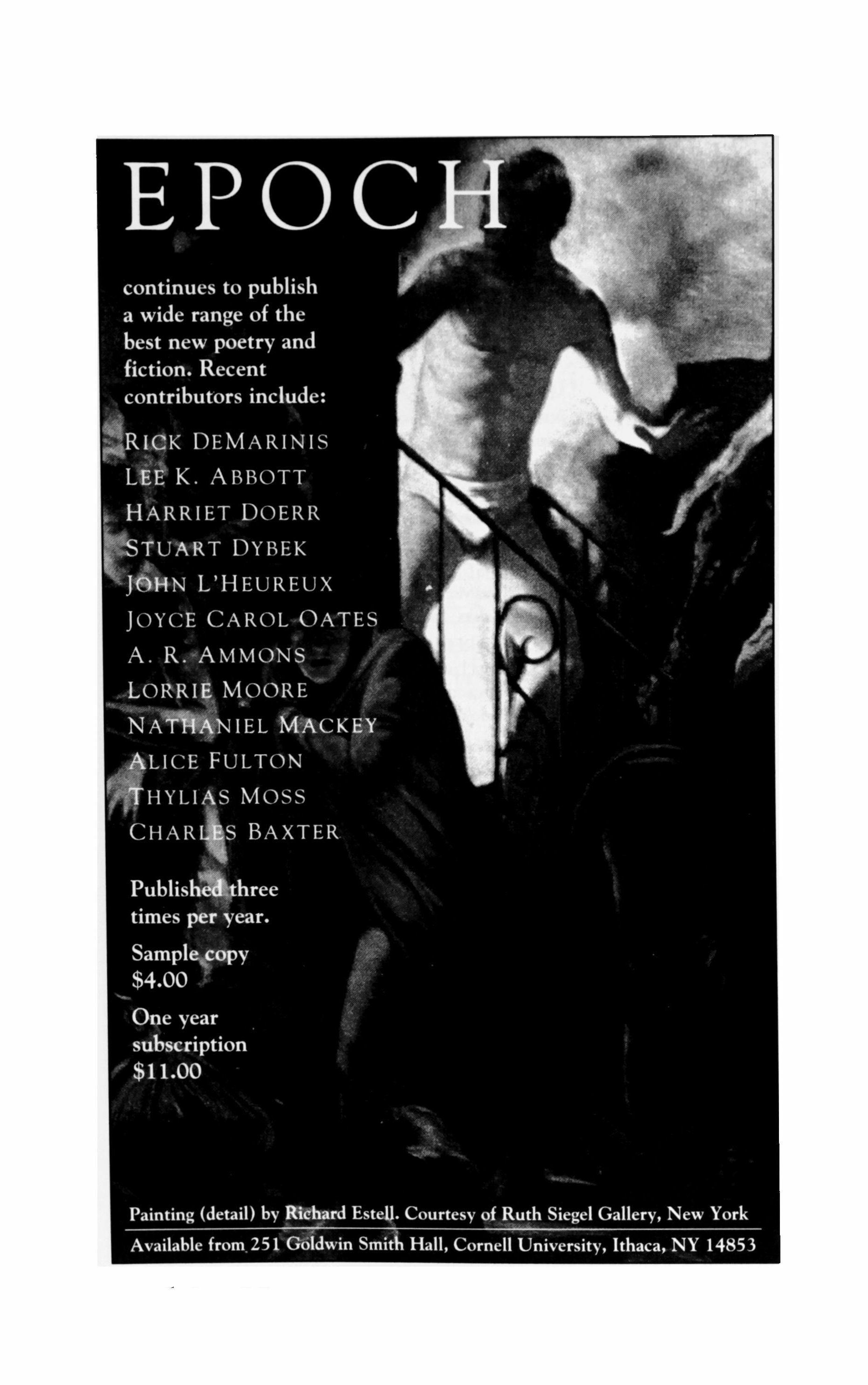
Mississippi • AMagazineofNew literature
eVlew
MR47/48: CYBERPUNK. GuEST EdiTEd by lARny McCAffERy;
ficTioN by WilliAM GibsoN, BRUCE STERUNG, JoItN SltiRIEy; iNTERviEW wirlt Willi.w GibsoN; SYMPOSiUM; ESSAYS byTiMOrity
lfARy, GEOnGE SlUSSER. 288 W, $�5().
MR49�: PANIC SEX. GuEST edned by KEN WATSON &
RObERT MiElkE; ESSAYS by MARC Sltdl, JEAN,JoSfI)It Goux, MicltArl SPEAks, Anrltun KnokER, JAMES HANS. 241 W, $�5().
M�: BLAST/LENIN ISSUE. FicTioN by SARA lEWis, DAvid Upsky, AOCE MATTiSON, KArltAniNE HAAkE; POEMS by MARC Dory, Riclt IVES, JEAN TARdiEU, ANd JAMES Gil 120 w, 5�.�
M�: THE REDHEAD. FicTioN by EIizAbaIt TAIIENr, JoItN HolMAN, PAul Usicky, lARRy FRENCIt; poEMS by BiN RAMkE, ROGER WEiNGAnTEN, CltnisTopkER MERRill, ANd PAul HOOVER; CyNr!tiA KAdoItATA ON BREECE D'J PANCAkE. 1'11 w, 57.�.
M�fi4: BEGINNINGS. ONE ltuNdnEd lORry SEVEN pMAGRApk.-IENGrit OPENiNGS fnoM ONE ItUNdREd lORry SEVEN sronirs bywonkiNG WRiTERS. 1H W, $8.00
M�fi6: THE WORKSHOP ISSUE. STORiES ANd poEMS fROM 80 US WRiTiNG PROGRAMS; Also, A MiNi.-sYMposiuM ON rucltiNG CREATivE WRiTiNG. � pp, 512.00
MR57: NEW POETRY. GuEST EdiTEd by ANGElA BAU ANd DAvid BERRY; A sunvEY of ANd SYMPOSiUM ON CONTEMPORARY AMERicAN poernv, SPRiNG 1991, m w, $8.00.
MR58ti9: INTERVlEWS. INTERviEWS wirIt NEW WRiTERS (lsltiGuno, AckER, OrltERS), ANd wirIt lARRy McCAffERy ON ritE AnT of ritE iNTERviEW. FAU 1991, 200 W, $8.00.
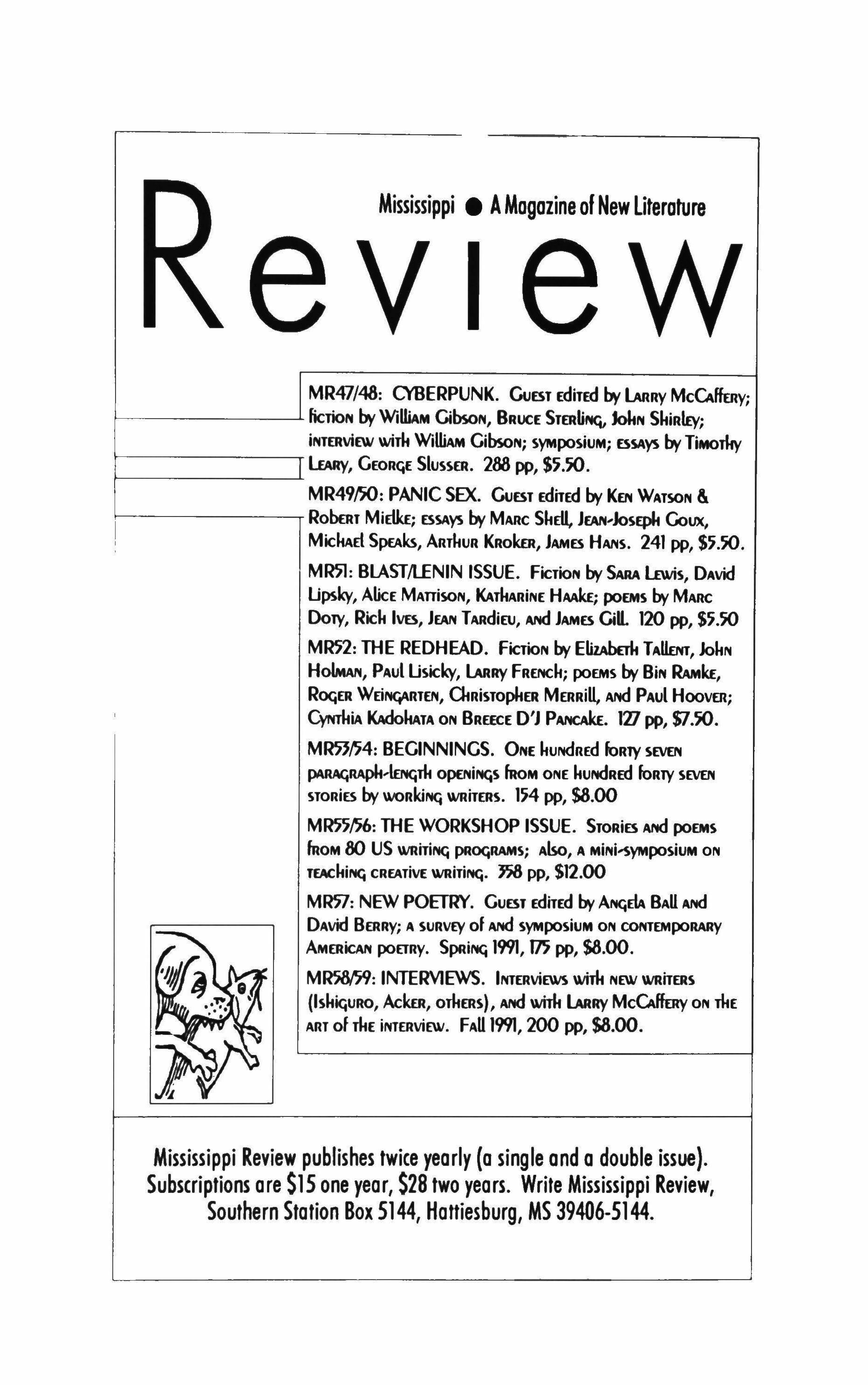
Mississippi Review publishes twice yearly (a single and a double issue).
Subscriptions are srs one year, $28 two years. Write Mississippi Review, Southern Station Box S144, Hattiesburg, MS 39406-S144.
f-------------'-
I--------�
f---------�

On Mark Rudman's previous book, By Contraries
"These poems are not promises made but promises fulfilled in astonishingly sustained performance." William Arrowsmith
"The title poem, will, I think, find a lasting place in the canon, as it documents the compulsion of experience generously, forsaking closure for a more difficult truth."
Donald Revell, Denver Quarterly
"A sentient self emerges clearly in Mark Rudman's work - complex, despairing, seeking to confront the contradictions offered up by contemporary urban life, and to achieve reconciliation with them. He displays considerable craftsmanship and control over his material as he confronts a complex world with a sensitivity that is acute, subtle, and entirely unshielded."
Leslie Ullman, The New York Times Book Review
"By Contraries is an important achievement." David Ignatow
"Here is a poetry that has a chance of seeing the world. Here, happily, is the public poetry of a private person, inheritor but radical transmutor of the legacies of so diverse a pair as Walt Whitman and Robert Lowell."
Roger Mitchell, American Book Review
THE NOWHERE STEPS
Poems by MARK
RUDMAN
The task of the poems in The Nowhere Steps is to develop a vocabulary for grief and mourning and to record the process of transformation and labor of learning to fall in love with the world again.
Mourning is endless.
One day you walk out and think nothing's the matter and then, flash of sunlight on a curb, you're back in the world of grief, overcome.
The poet is compelled to retrace his steps, through his childhood and boyhood in the flatlands and the desert, with a detective's patience and fierce adherence to "the facts." In his night visions, he throws "light on landscapes you can never see by day."
Published by the Sheep Meadow Press, 131 Pages, paper (ISBN 0-935296-90-5) $11.95, hardcover (ISBN 0-935296-93-X) $16.95, Available at bookstores or directly through Sheep Meadow, 212-549-3321.
Distributed by Consortium Book Sales &. Distribution, 287 East 6th St., Suite 365, St. Paul, MN 55101
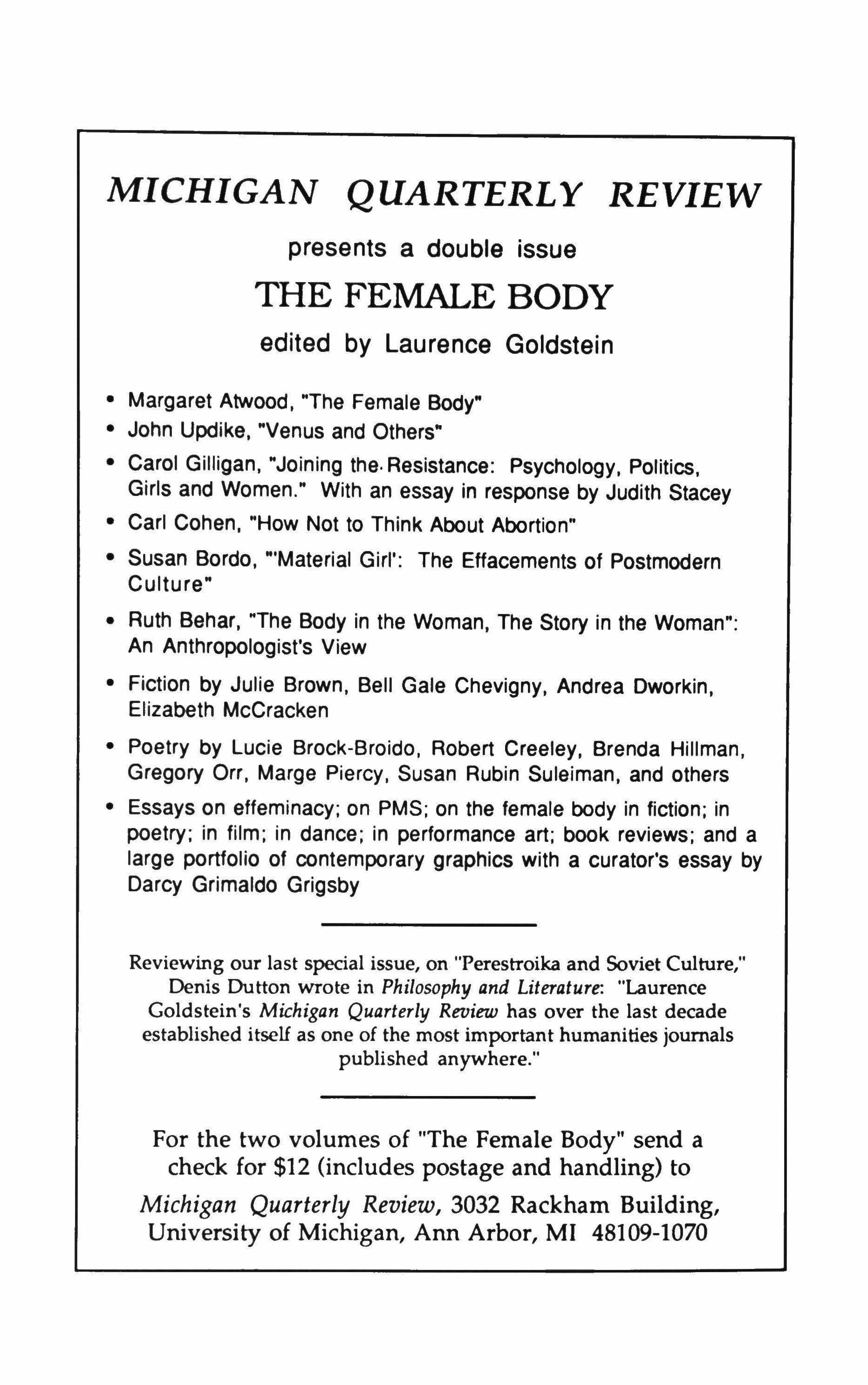
MICHIGAN QUARTERLY REVIEW
presents a double issue
THE FEMALE BODY
edited by Laurence Goldstein
• Margaret Atwood, "The Female Body"
• John Updike, "Venus and Others"
Carol Gilligan, "Joining the· Resistance: Psychology, Politics, Girls and Women." With an essay in response by Judith Stacey Carl Cohen, "How Not to Think About Abortion"
• Susan Bordo, "'Material Girl': The Effacements of Postmodern Culture"
Ruth Behar, "The Body in the Woman, The Story in the Woman": An Anthropologist's View
Fiction by Julie Brown, Bell Gale Chevigny, Andrea Dworkin, Elizabeth McCracken
Poetry by Lucie Brock-Broido, Robert Creeley, Brenda Hillman, Gregory Orr, Marge Piercy, Susan Rubin Suleiman, and others
• Essays on effeminacy; on PMS; on the female body in fiction; in poetry; in film; in dance; in performance art; book reviews; and a large portfolio of contemporary graphics with a curator's essay by Darcy Grimaldo Grigsby
Reviewing our last special issue, on "Perestroika and Soviet Culture," Denis Dutton wrote in Philosophy and Literature: "Laurence Goldstein's Michigan Quarterly Review has over the last decade established itself as one of the most important humanities journals published anywhere."
For the two volumes of "The Female Body" send a check for $12 (includes postage and handling) to Michigan Quarterly Review, 3032 Rackham Building, University of Michigan, Ann Arbor, MI 48109-1070

Social Control and the Arts*
Liu Binyan: Writing in China - Svetlana Boym: Paradoxes of Perestroika Bheki Langa: South Africa - John Solt: Japan - Marjorie Agosin: Art Under Dictatorship - William Marshall: Homosexuality and Democracy
Grzegorz Boguta: Poland - Gregg Bordowitz: Helms - Carolivia Herron: Black Women's Writing on Trial- Kate Millett, Martha Rosier, Pamela Berger, David Joselit, Joshua Cohen, Andre Schiffrin on market censorship and the star system in the United States
Edited by Susan R. Su/eiman, Alice A. Jardine, Ruth Perry and Carta Mazzio
On Peter Dale Scott's Coming to Jakarta
David Gewanter - Alan Williamson - Jennifer Clarvoe
Robert Hass - Peter Dale Scott a
Plus poetry, fiction and reviews by Sadoff, Ardizzone, Bok, Revel, Engel, Updike, Digges, Balakian, Logan, Wojahn, Sleigh, Espada, Standing, Grennan and others. Art portfolio by Gregory Amenoff. a
410 pages. $12
"'Social Control and the Arts is also available as a separate paperback book (96 pages) at $5.00.
SPECIAL OFFER: 15% off Agni 31/32 and one year's subscription ($12) when you purchase both together.
o I'd like to take advantage of the special offer. Send me Agn131/32 and a year's subscription. I enclose $20.
o I'd like to order copies of Agnl 31/32. I enclose $12 for each copy.
o Please send me copies of Social Control and the Arts. I enclose $5 for each copy. TO
Name
Addr�
City State Zip
Mail to Agnl, Boston University, Creative Writing Program, 236 Bay State Road, Boston, MA 02215.
AGN131/32
a

Offers the finest in literature four ways
.tt. New Letters
The distinguished quarterly will soon celebrate 20 years of publishing the finest new poetry, fiction, essays and art.
� New Letters Review ofBooks
The tabloid companion to New Letters features reviews, essays and interviews with writers such as Mary Gordon, Walker Percy and Leon Edel.
it. New Letters on the Air
This weekly half-hour radio series is broadcast by many National Public Radio stations. It now includes almost 500 programs of readings and interviews with both well-known and up-and-coming writers. Check your local NPR station for time of broadcast, or write for our catalog
.tt. New Letters Poem for the Day
This new series presents a single poem by a contemporary or classical poet, with a brief narrative. Check with your local NPR station about this service, too.
SubSCriptions to New Letters include both the quarterly and the review of books: $17 one year; $28 two years.
The above projects have support from the Missouri Arts Council, the National Endowment for the Arts and the University of Missouri-Kansas City College of Arts and Sciences.
New Letters, James McKinley, editor, University of MissouriKansas City, 5100 Rockhill Rd., Kansas City, Mo. 64110.
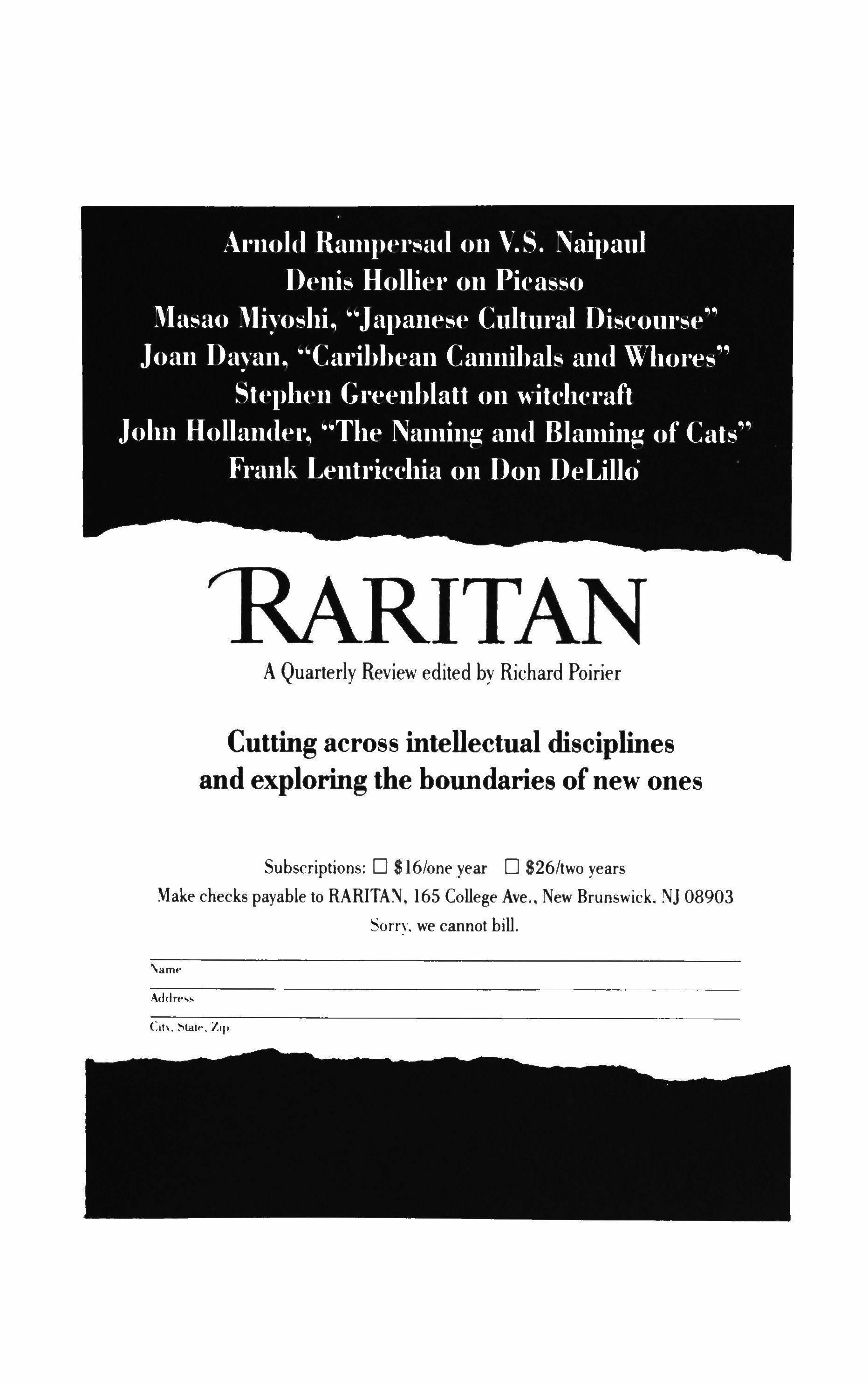
Arnold Hampersad on Y,S, �aipaul
J)t'ni� Hollier on Pieasso
'Iasao 'Ii�'oshi� japanese Cultural Discours«��
joan J)a�'an� "Carihhean Caunihals anti \VhOl'es�'
Stephen G"('('nhlatt on witchcraft
juhn Hollander, "The Nalllin� anti Blaming of Cats��
Frallk Lentricehia Oil Don DeLillo'
�RITAN
A Quarterly Review edited by Richard Poirier
Cutting across intellectual disciplines and exploring the boundaries of new ones
Subscriptions: 0 s 16/0ne year 0 $26/two years
�ake checks payable to RARITA�, 165 College Ave., New Brunswick. NJ 08903 Sorry. we cannot bill.
'arne-
A Gathering oJWays JOHN MATTHIAS
"John Maahias is a poet with much to show us. Objective andclear, his poetry is a splendidfusion ofengaging subjects and masterful technique. He has refined the narrative andspeculativepoem, giving it a lyric integrityofgreat strength and beauty. '-Guy Davenport
A GatheringofWays is John Matthias' first collection ofpoems since the publication ofhis warmly received Northern Summer collection in 1984. The book consists ofthree long poems dealing with the geography, geology, prehistory, and history oftwo places closely identifted with Matthias' work, the East Anglian region ofBritain and the American Midwest, and a third place which provides the book with a new and deeply resonant setting: those parts ofsouthern France and northern Spainthrough which run the famous pilgrimage routes to Santiago de Compostela.
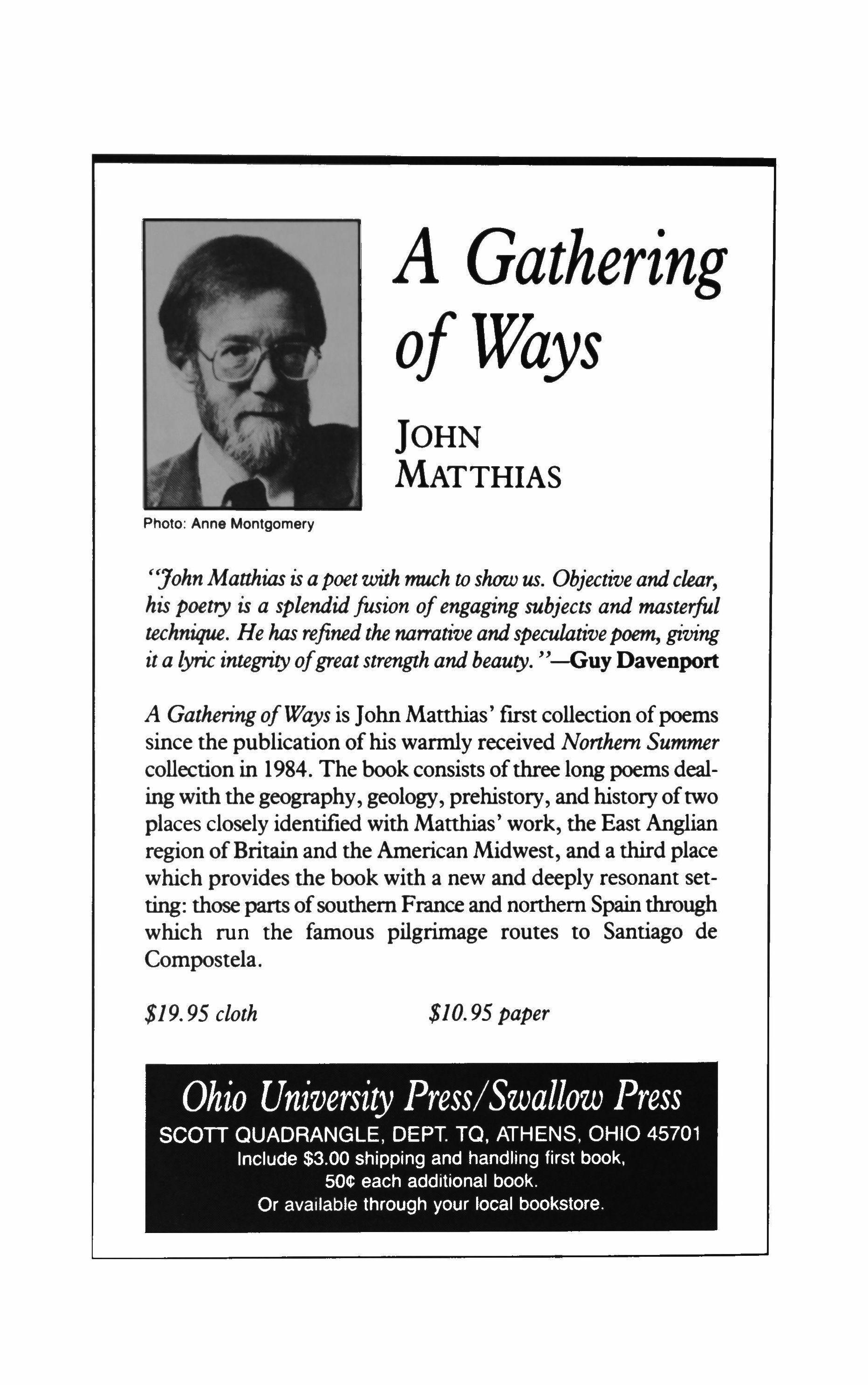
Include $3.00 shipping and handling first book, 50¢ each additional book. Or available through your local bookstore.
Photo: Anne Montgomery
$19.95 cloth $10.95 paper Ohio University Press/Swallow Press SCOTT QUADRANGLE, DEPT. TQ, ATHENS, OHIO 45701
THE MALAHAT REVIEW

University of Victoria P.O. Box 1700
Victoria, B.C. V8W 2Y2
MARGARET ATWOOD: The Malahat Review is a literary journal of international quality. I'm proud that my work has appeared in its pages since its inception. Long may it flourish.
DAVID DONNELL: A capital MUST. Only the black bean soup fromJoe Allan's and the key lime pie from the Boulevard Cafe catch my attention as quickly as a new, impeccable, but jam-packed issue of The Malahat Review.
JOYCE CAROL OATES: The Malahat Review must be one of the most consistently interesting magazines of its kind in the world. It is certainly close to being the most consistently beautiful.
MICHAEL ONDAATJE: The Malahat Review presents the best prose and poetry being written in Canada today. Malahat takes risks. Malahat discovers new writers. A fabulous magazine.
JANE RULE: Serving on the Periodicals Jury for the Canada Council, I have had to read all the quarterlies. The Malahat Review stands head and shoulders above the rest in terms of quality and range of interests.
AUDREY THOMAS: Strictly speaking, The Malahat Review is not a feminist magazine, but it is a place where feminists can be proud to send and proud to see their work.
FRED WAH: The Malahat Review is important reading material because the editors accurately register the range of important activity in current writing - without their map we'd just be sitting on a log.
BRONWEN WALLACE: I read Malahat from cover to cover - as soon as it arrives. I'm always impressed by the contents: the mix of new and known writers, traditional and experimental writing styles. I like the way it looks too -lovely covers, attractive layout. A very good deal!
o One year subscription (4 issues) at SI5.00 l'S,
o Three year subscription (12 issues) at S40.00 U.S,
o Institution subscription (4 issues) at S25.00 U.S.
NAME:
ADDRESS:
CITY & STATE
o Payment enclosed
o Bill me later ZIP
�
Back-Issue Offer:
20070 Off on Orders of
Two or More
Copies
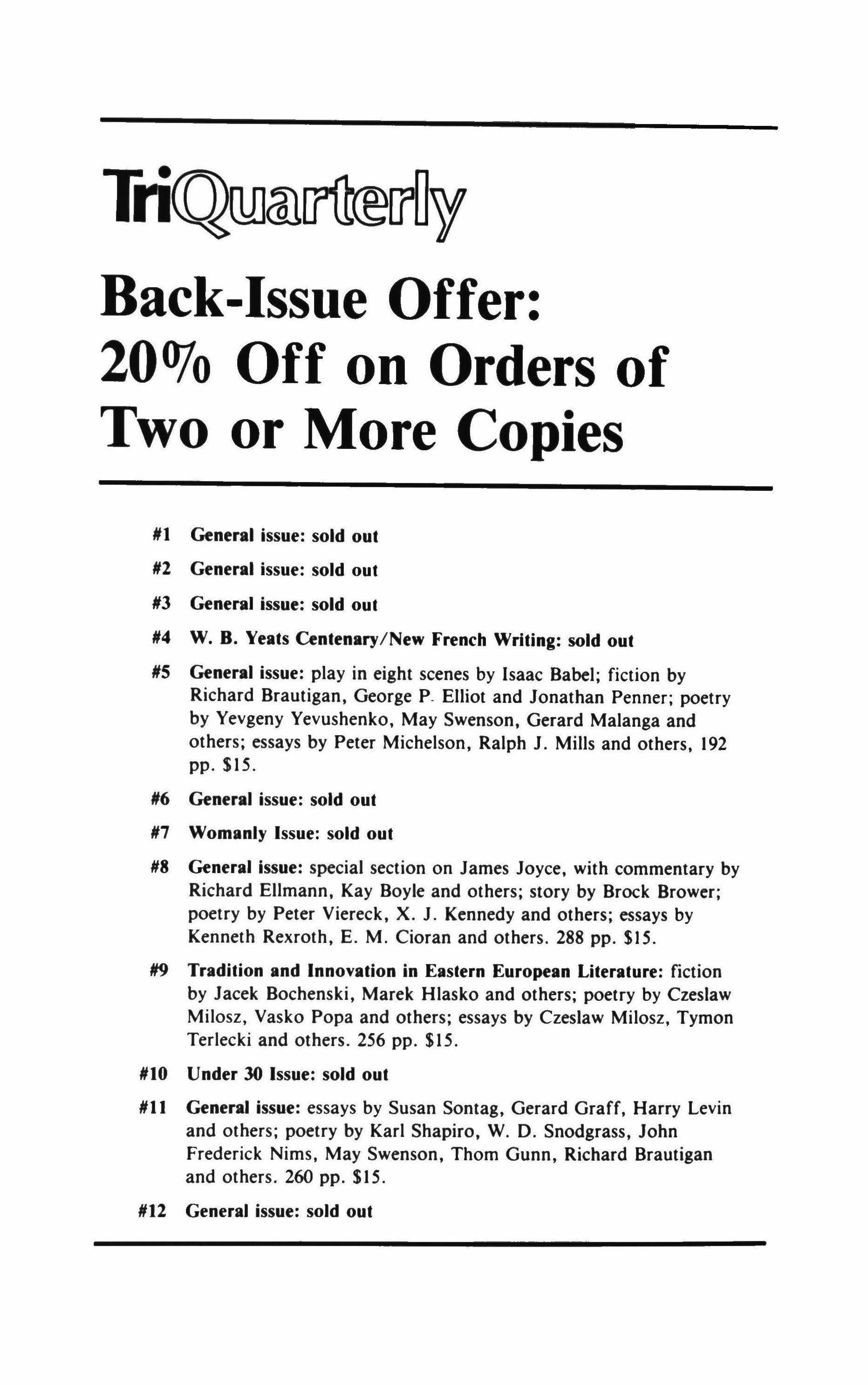
#1 General issue: sold out
N2 General issue: sold out
#3 General issue: sold out
#4 W. B. Yeats Centenary/New French Writing: sold out
#S General issue: play in eight scenes by Isaac Babel; fiction by Richard Brautigan, George P. Elliot and Jonathan Penner; poetry by Yevgeny Yevushenko, May Swenson, Gerard Malanga and others; essays by Peter Michelson, Ralph J. Mills and others, 192 pp. $15.
#6 General issue: sold out
N7 Womanly Issue: sold out
#8 General issue: special section on James Joyce. with commentary by Richard EHmann, Kay Boyle and others; story by Brock Brower; poetry by Peter Viereck, X. J. Kennedy and others; essays by Kenneth Rexroth, E. M. Cioran and others. 288 pp. $15.
N9 Tradition and Innovation in Eastern European Literature: fiction by Jacek Bochenski, Marek Hlasko and others; poetry by Czeslaw Milosz, Vasko Popa and others; essays by Czeslaw Milosz, Tymon Terlecki and others. 256 pp. $15.
#10 Under 30 Issue: sold out
#11 General issue: essays by Susan Sontag, Gerard Graff, Harry Levin and others; poetry by Karl Shapiro, W. D. Snodgrass, John Frederick Nims, May Swenson. Thom Gunn, Richard Brautigan and others. 260 pp. $15.
#12 General issue: sold out
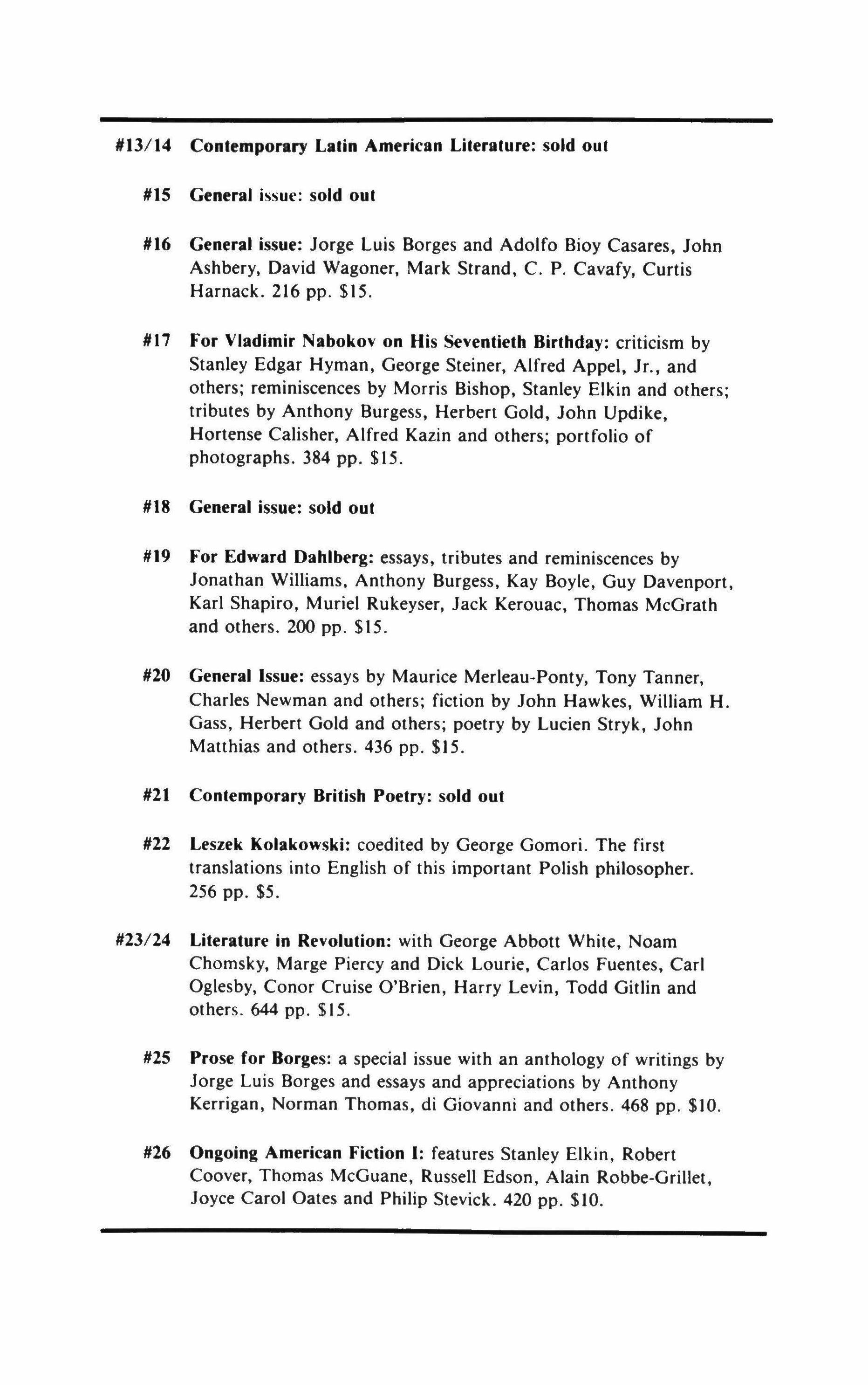
#13/14 Contemporary Latin American Literature: sold out
#15 General issue: sold out
#16 General issue: Jorge Luis Borges and Adolfo Bioy Casares, John Ashbery, David Wagoner, Mark Strand. C. P. Cavafy, Curtis Harnack. 216 pp. $15.
#17 For Vladimir Nabokov on His Seventieth Birthday: criticism by Stanley Edgar Hyman, George Steiner, Alfred Appel, Jr.• and others; reminiscences by Morris Bishop, Stanley Elkin and others; tributes by Anthony Burgess, Herbert Gold, John Updike, Hortense Calisher, Alfred Kazin and others; portfolio of photographs. 384 pp. $15.
#t8 General issue: sold out
#19 For Edward Dahlberg: essays, tributes and reminiscences by Jonathan Williams, Anthony Burgess, Kay Boyle, Guy Davenport, Karl Shapiro, Muriel Rukeyser, Jack Kerouac, Thomas McGrath and others. 200 pp. $15.
#20 General Issue: essays by Maurice Merleau-Ponty, Tony Tanner, Charles Newman and others; fiction by John Hawkes, William H. Gass, Herbert Gold and others; poetry by Lucien Stryk, John Matthias and others. 436 pp. $15.
#21 Contemporary British Poetry: sold out
#22 Leszek Kolakowski: coedited by George Gomori. The first translations into English of this important Polish philosopher. 256 pp. $5.
#23/24 Literature in Revolution: with George Abbott White, Noam Chomsky. Marge Piercy and Dick Lourie. Carlos Fuentes, Carl Oglesby, Conor Cruise O'Brien, Harry Levin, Todd Gitlin and others. 644 pp. $15.
#25 Prose for Borges: a special issue with an anthology of writings by Jorge Luis Borges and essays and appreciations by Anthony Kerrigan, Norman Thomas. di Giovanni and others. 468 pp. $10.
#26 Ongoing American Fiction I: features Stanley Elkin, Robert Coover, Thomas McGuane, Russell Edson, Alain Robbe-Griller, Joyce Carol Oates and Philip Stevick. 420 pp. $10.
#27
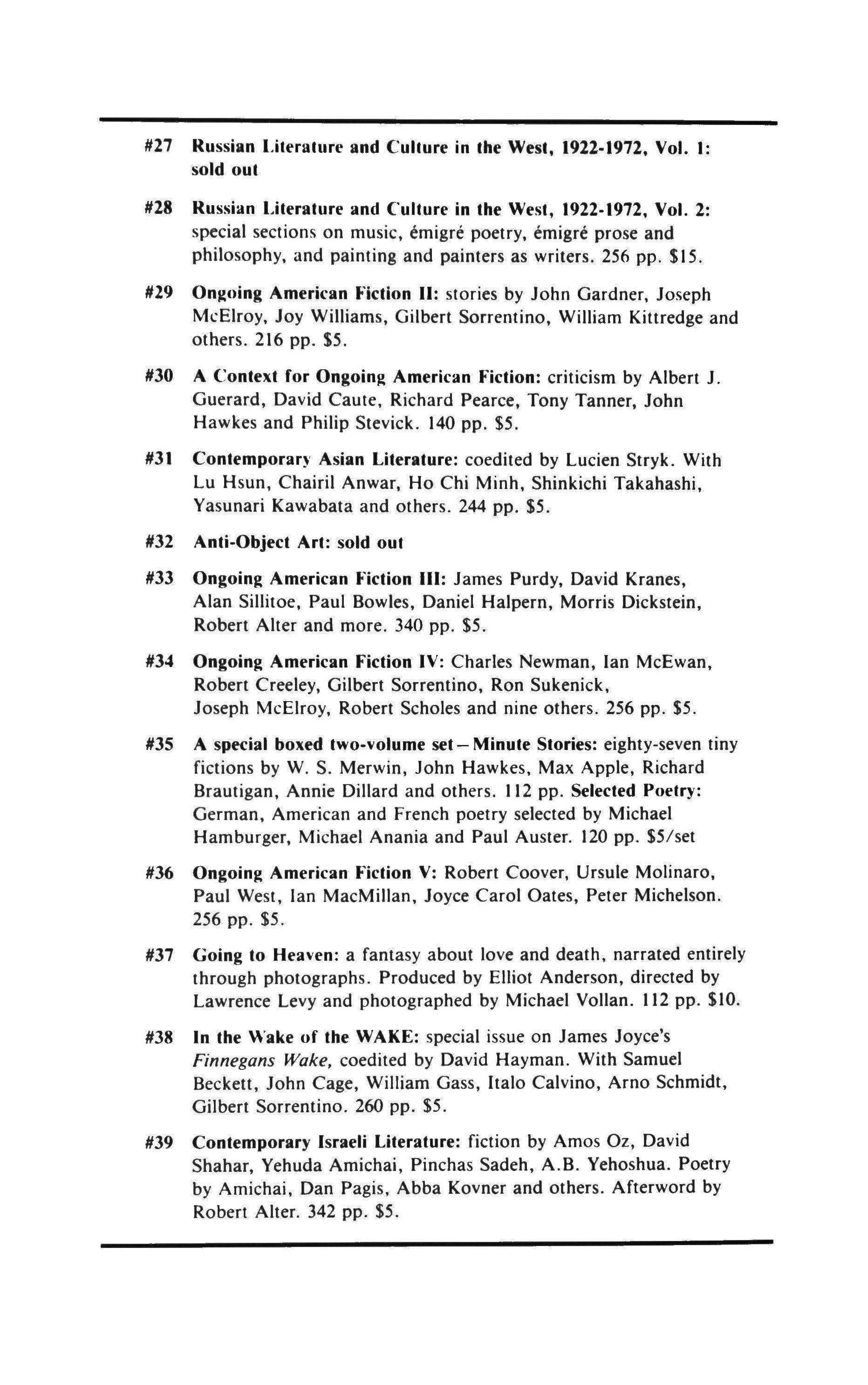
Russian Literature and Culture in the West, 1922-1972, Vol. I: sold out
#28 Russian Literature and Culture in the West, 1922-1972, Vol. 2: special sections on music, emigre poetry, emigre prose and philosophy, and painting and painters as writers. 256 pp. $15.
#29 Ongoing American Flctlon II: stories by John Gardner, Joseph McElroy, Joy Williams, Gilbert Sorrentino, William Kittredge and others. 216 pp. $5.
#30 A Context for Ongoing American Fiction: criticism by Albert J. Guerard, David Caute, Richard Pearce, Tony Tanner, John Hawkes and Philip Stevick. 140 pp. $5.
#31 Contemporary Asian Literature: coedited by Lucien Stryk. With Lu Hsun, Chairil Anwar, Ho Chi Minh, Shinkichi Takahashi, Yasunari Kawabata and others. 244 pp. $5.
#32 Anti-Object Art: sold out
#33 Ongoing American Fiction III: James Purdy, David Kranes, Alan Sillitoe, Paul Bowles, Daniel Halpern, Morris Dickstein, Robert Alter and more. 340 pp. $5.
#34 Ongoing American Fiction IV: Charles Newman, Ian McEwan, Robert Creeley, Gilbert Sorrentino, Ron Sukenick Joseph Mclilroy, Robert Scholes and nine others. 256 pp. $5.
#35 A special boxed two-volume set - Minute Stories: eighty-seven tiny fictions by W. S. Merwin, John Hawkes. Max Apple, Richard Brautigan, Annie Dillard and others. 112 pp. Selected Poetry: German, American and French poetry selected by Michael Hamburger, Michael Anania and Paul Auster. 120 pp. $5/set
#36 Ongoing American Fiction V: Robert Coover, Ursule Molinaro, Paul West, Ian MacMillan, Joyce Carol Oates, Peter Michelson. 256 pp. $5.
#37 Going to Heaven: a fantasy about love and death. narrated entirely through photographs. Produced by Elliot Anderson, directed by Lawrence Levy and photographed by Michael Vollan. 112 pp. $10.
#38 In the Wake of the WAKE: special issue on James Joyce's Finnegans Wake, coedited by David Hayman. With Samuel Beckett, John Cage, William Gass, halo Calvino, Arno Schmidt, Gilbert Sorrentino. 260 pp. $5.
#39 Contemporary Israeli Literature: fiction by Amos Oz, David Shahar, Yehuda Amichai, Pinchas Sadeh, A.B. Yehoshua. Poetry by Amichai, Dan Pagis, Abba Kovner and others. Afterword by Robert Alter. 342 pp. $5.
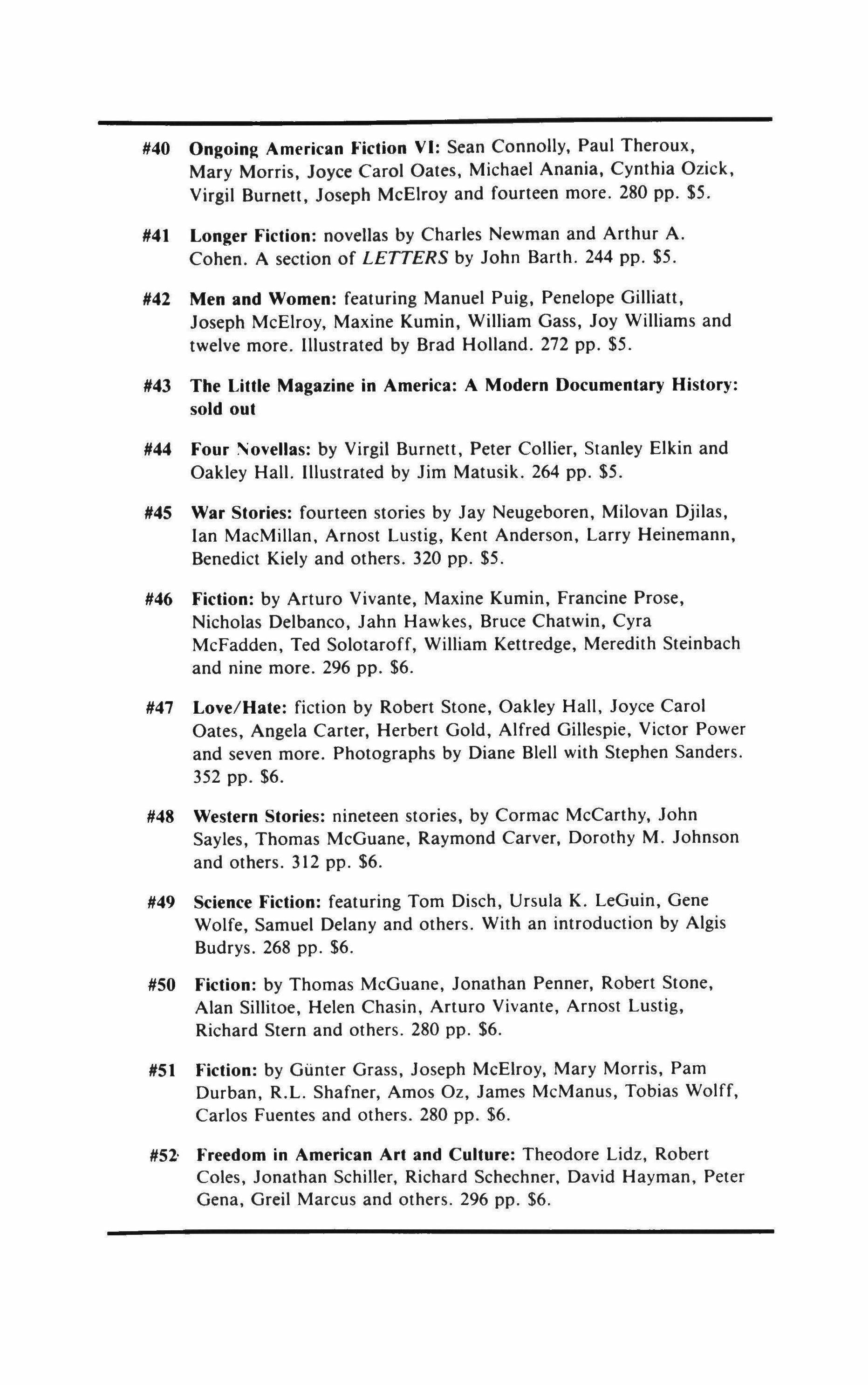
"40 Ongoing American f'iction VI: Sean Connolly, Paul Theroux, Mary Morris, Joyce Carol Oates, Michael Anania, Cynthia Ozick, Virgil Burnett, Joseph McElroy and fourteen more. 280 pp. $5.
"41 Longer Fiction: novellas by Charles Newman and Arthur A. Cohen. A section of LETTERS by John Barth. 244 pp. $5.
1142 Men and Women: featuring Manuel Puig, Penelope Gilliatt, Joseph McElroy, Maxine Kumin, William Gass, Joy Williams and twelve more. Illustrated by Brad Holland. 272 pp. $5.
1143 The Little Magazine in America: A Modern Documentary History: sold out
1144 Four Novellas: by Virgil Burnett, Peter Collier, Stanley Elkin and Oakley Hall. Illustrated by Jim Matusik. 264 pp. $5.
1145 War Stories: fourteen stories by Jay Neugeboren, Milovan Djilas, Ian MacMillan, Arnost Lustig, Kent Anderson, Larry Heinemann, Benedict Kiely and others. 320 pp. $5.
"46 Fiction: by Arturo Vivante, Maxine Kumin, Francine Prose, Nicholas Delbanco, Jahn Hawkes, Bruce Chatwin, Cyra McFadden, Ted Solotaroff, William Kettredge, Meredith Steinbach and nine more. 296 pp. $6.
"47 Love/Hate: fiction by Robert Stone, Oakley Hall, Joyce Carol Oates, Angela Carter, Herbert Gold, Alfred Gillespie, Victor Power and seven more. Photographs by Diane Bleil with Stephen Sanders. 352 pp. $6.
#48 Western Stories: nineteen stories, by Cormac McCarthy, John Sayles, Thomas McGuane, Raymond Carver, Dorothy M. Johnson and others. 312 pp. $6.
"49 Science Fiction: featuring Tom Disch, Ursula K. LeGuin, Gene Wolfe, Samuel Delany and others. With an introduction by Algis Budrys. 268 pp. $6.
"50 Fiction: by Thomas McGuane, Jonathan Penner, Robert Stone, Alan Sillitoe, Helen Chasin, Arturo Vivante, Arnost Lustig, Richard Stern and others. 280 pp. $6.
1151 Fiction: by Gunter Grass, Joseph McElroy, Mary Morris, Pam Durban, R.L. Shafner, Amos Oz, James McManus, Tobias Wolff, Carlos Fuentes and others. 280 pp. $6.
"52' Freedom in American Art and Culture: Theodore Lidz, Robert Coles, Jonathan Schiller, Richard Schechner, David Hayman, Peter Gena, Greil Marcus and others. 296 pp. $6.
1153
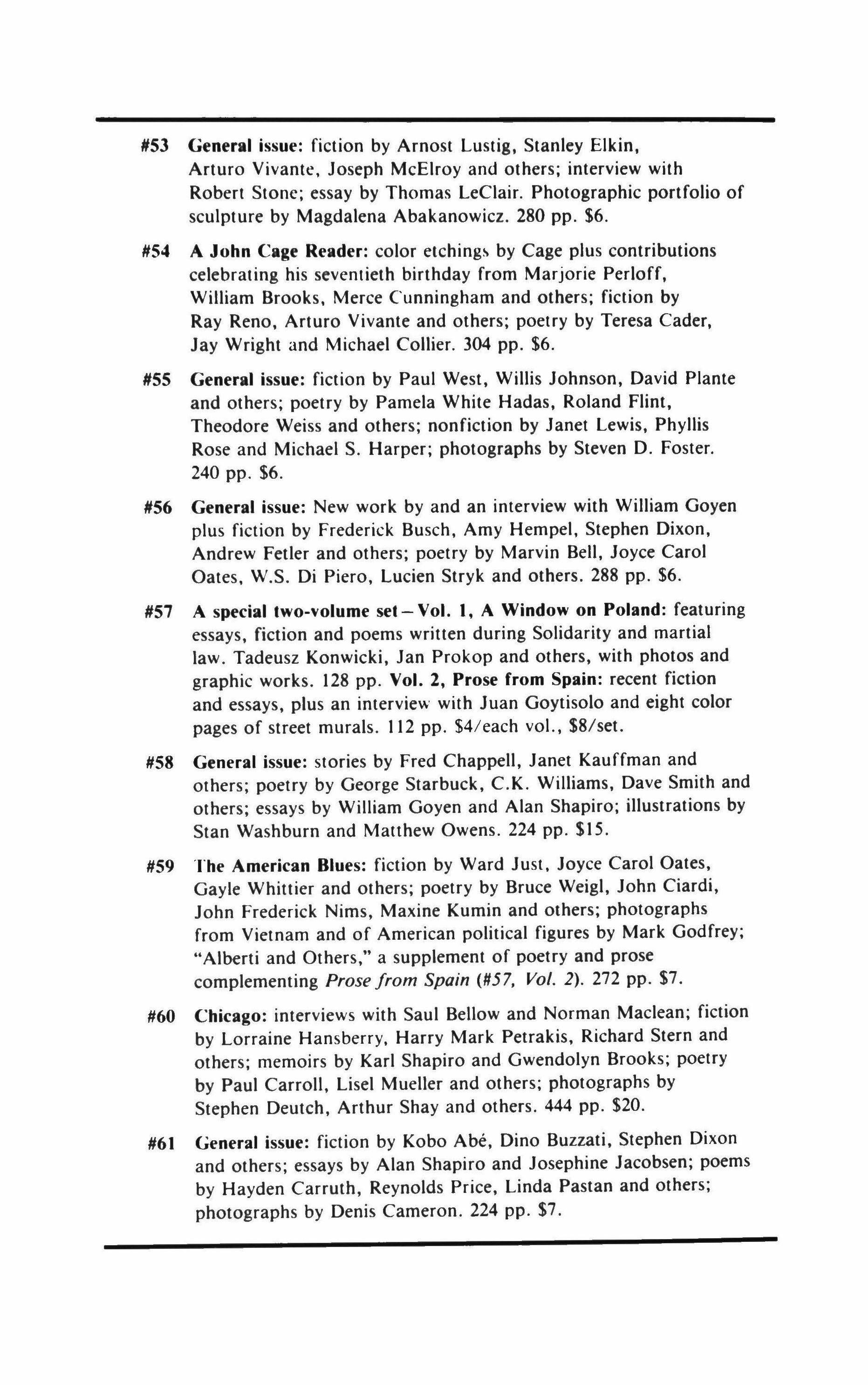
General issue: fiction by Arnost Lustig, Stanley Elkin, Arturo Vivante, Joseph McElroy and others; interview with Robert Stone; essay by Thomas LeClair. Photographic portfolio of sculpture by Magdalena Abakanowicz. 280 pp. $6.
1154 A John Cage Reader: color etchings by Cage plus contributions celebrating his seventieth birthday from Marjorie Perioff, William Brooks, Merce Cunningham and others; fiction by Ray Reno, Arturo Vivante and others; poetry by Teresa Cader, Jay Wright and Michael Collier. 304 pp. $6.
#55 General issue: fiction by Paul West, Willis Johnson, David Plante and others; poetry by Pamela White Hadas, Roland Flint, Theodore Weiss and others; nonfiction by Janet Lewis, Phyllis Rose and Michael S. Harper; photographs by Steven D. Foster. 240 pp. $6.
1156 General issue: New work by and an interview with William Goyen plus fiction by Frederick Busch, Amy Hempel, Stephen Dixon, Andrew Fetler and others; poetry by Marvin Bell, Joyce Carol Oates, W.S. Di Piero, Lucien Stryk and others. 288 pp. $6.
#57 A special two-volume sel- Vol. I, A Window on Poland: featuring essays, fiction and poems written during Solidarity and martial law. Tadeusz Konwicki, Jan Prokop and others, with photos and graphic works. 128 pp. Vol. 2, Prose from Spain: recent fiction and essays, plus an interview with Juan Goytisolo and eight color pages of street murals. 112 pp. $4/each vol., $8/set.
#58 General issue: stories by Fred Chappell, Janet Kauffman and others; poetry by George Starbuck, C.K. Williams, Dave Smith and others; essays by William Goyen and Alan Shapiro; illustrations by Stan Washburn and Matthew Owens. 224 pp. $15.
#59 The American Blues: fiction by Ward Just, Joyce Carol Oates, Gayle Whittier and others; poetry by Bruce Weigl, John Ciardi, John Frederick Nims, Maxine Kumin and others; photographs from Vietnam and of American political figures by Mark Godfrey; "Alberti and Others," a supplement of poetry and prose complementing Prose from Spain (#57, Vol. 2). 272 pp. $7.
#60 Chicago: interviews with Saul Bellow and Norman Maclean; fiction by Lorraine Hansberry, Harry Mark Petrakis, Richard Stern and others; memoirs by Karl Shapiro and Gwendolyn Brooks; poetry by Paul Carroll, Lisel Mueller and others; photographs by Stephen Deutch, Arthur Shay and others. 444 pp. $20.
#61 General issue: fiction by Kobo Abe, Dino Buzzati, Stephen Dixon and others; essays by Alan Shapiro and Josephine Jacobsen; poems by Hayden Carruth, Reynolds Price, Linda Pastan and others; photographs by Denis Cameron. 224 pp. $7.
#62

General issue: sold out
#63 TQ 20: twentieth-anniversary issue, with fiction by James T. Farrell, Richard Brautigan, Stanley Elkin, Jorge Luis Borges, Joyce Carol Oates, Vladimir Nabokov, Cynthia Ozick, Raymond Carver, William Goyen, Lorraine Hansberry and others; poetry by Anne Sexton, Howard Nemerov, W. S. Merwin, Jack Kerouac, Marvin Bell and others; interview with Saul Bellow; illustrations and photographs. 684 pp. $13.
#64 General issue: poems by Alan Shapiro, Donald Davie, Charles Simic; fiction by Cyrus Colter, Gordon Weaver, Robert Boswell; photographs by Mark Steinmetz. 288 pp. $7.
#65 The Writer in Our World: symposium featuring Stanislaw Baranczak, Terrence Des Pres, Gloria Emerson, Leslie Epstein, Carolyn Forche, Michael S. Harper, Ward Just, Grace Paley, Mary Lee Settle, Robert Stone, Derek Walcott and C. K. Williams, with original work by most participants and by moderators Angela Jackson and Bruce Weigl; photographs. 332 pp. $9.
#66 General issue: stories by Reynolds Price, David Plante, Gordon Lish, Norbert Blei and others; poems by Raymond Carver, Susan Hahn, Irina Ratushinskaya and others; essay by Fred Miller Robinson. 240 pp. $7.
#67 General issue: stories by Janet Desaulniers, Amy Herrick, Carol Emshwiller and Martha Bennett Stiles; poems by Rita Dove, Joyce Carol Oates, Timothy Dekin and others; special section of essays and poems by W. S. Di Piero; excerpt from autobiography by Paul Zweig. 208 pp. $7.
#68: General issue: stories by Robert Coover, Lynn Grossman, Joyce Carol Oates; poems by Thomas McGrath, Joseph Gastiger, Linda Pastan, Alan Shapiro; portfolio of poems by Donald Davie and photographs by Doreen Davie; "Jazz and Letters: A Colloquy" by Al Young, Larry Kart, Michal S. Harper. 208 pp. $7.
#69 From South Africa: available from the University of Chicago Press.
#70 Thomas McGrath: Life and the Poem: sold out
#71 General issue: fiction by Meredith Steinbach, Sidney Sulkin, Susan Straight, Robert S. Nelsen and others; poetry by Mary Kinzie, John Dickson and others; special section on recent poetry from Poland. 256 pp. $15.
#72 General issue: stories by Norman Manea, Anne Calcagno, Sheila Schwartz and others; poems by Bruce Weigl, Jenny Mueller, Alan Shapiro and others; essay by C. K. Williams; special section of poetry and prose by John Peck. 224 pp. $8.
1173

#74
General issue: stories by Sandy Huss, Carol Bly, Susan Straight; poetry by Anna Akhmatova, Michael Anania, Pattiann Rogers, Sterling Plumpp; special sections on Joyce Carol Oates and Wole Soyinka. 208 pp. $8.
General Issue: stories by Leo Litwak, Margaret Broucek, Donna Trussell, Angela Jackson; poetry by Sandra McPherson. Mary Kinzie, Czeslaw Milosz, Adrienne Rich, Eleanor Wilner. 272 pp. $8.
117S Writing and Well-Being: memoirs, essays and poems by William Goyen, Paul West. Perri Klass, Gwendolyn Brooks, Nancy Mairs, Jay Cantor. Annie Dillard, Maxine Kumin, Paul Bowles, Reynolds Price and others. 208 pp. $8.
1176
1177
General issue: fiction by Francine Prose, Christopher Mcllroy, Ami Sands Brodoff; poetry by Rita Dove, Stuart Dybek, Lisel Mueller, Joseph Gastiger; memoir by Peter Kenez; essays by Robert Pinsky and others. 224 pp. $8.
General issue: special section on Modern Indian Poems; interview w ith Samuel Beckett; fiction by Arthur Morey. David Michael Kaplan; poetry by Eavan Boland, Li-Young Lee, Maxine Kumin, Claribel Alegria. 336 pp. $10.
1178 Fiction of the Eighties: A Decade of Stories from TriQuarterly: twenty-fifth anniversary anthology featuring stories by Grace Paley, William Goyen, Raymond Carver, John Sayles, Frederick Barthelme, Tobias Wolff, Carol Bly, Richard Ford, T. Coraghessan Boyle, Amy Hempel, Robert Coover, Joyce Carol Oates, many new writers and a number of writers in translation. 592 pp. cloth, $26.95; paper, $16.95.
1179 General issue: sold out

For orders of two or more books, deduct 20'" from total price. We pay postage on orders of three or more copies. (For orders of one or two books please add $1.00 for shipping and handling.) Send check or money order, or charge to VISA or MasterCard.
Note: While supplies last, an index to issues I-50 is available on request, free ofcharge, with any order.
TriQuarterly, Northwestern University
2020 Ridge Ave., Evanston, IL 60208-4302
Please send me the following back issues of TriQuarterly:
I
$ -� D. VJS4' 0 t:z:J #-------------------
enclose
Signature: Expires: Name Address City State Zip
The Best of The Missouri Review Fiction, 1978-1990
Edited by Speer Morgan, Greg Michalson, and Io Sapp
"A marvelous, historic collection by some of the most compelling of contemporary literary talents."
-LoNise Erdrieh
"An important anthology from an important place: The MissON" Rmey has found the heart ofAmerican fiction" - ThIl",1JS MeGN'"''
"The Shakespeare Squadron is on the march! Bowles, Carver, Hempel, Shacochis, Mahfouz, and Ohle-the American Beckett-they're all here. The short story isn't dead after all. Read on!"
- Willi"", BNrrIINghS
"Tb« Ben O/ThB MISSOURI RBvIBwis a first-rate gathering, top ofthe line, and splendidly representative. It belongs on the shelves ofeveryone who cares about the art of the short story."
-George Gil,.,.,"
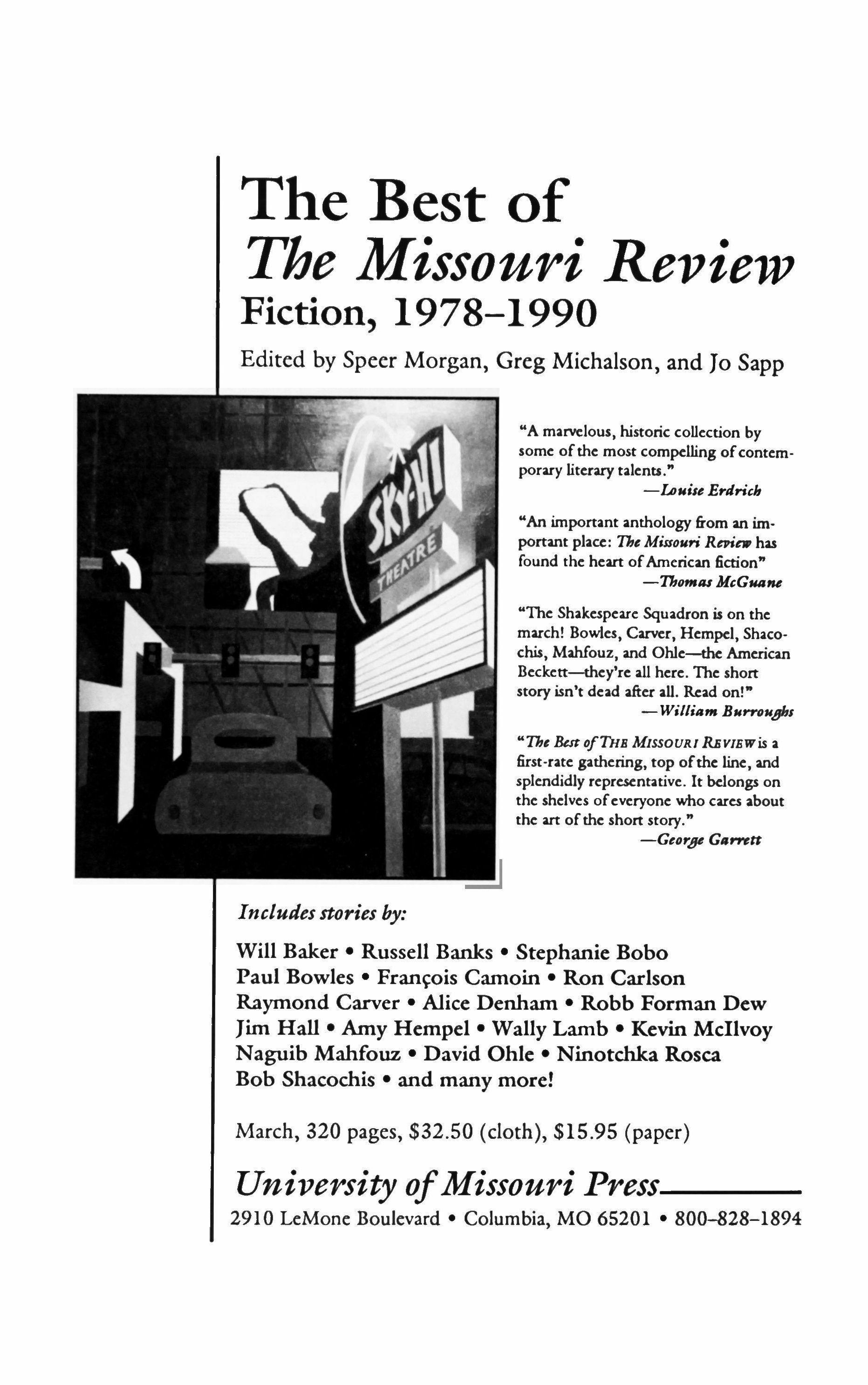
Includes stories by:
Will Baker Russell Banks Stephanie Bobo
Paul Bowles Francois Camoin Ron Carlson
Raymond Carver Alice Denham • Robb Forman Dew
Jim Hall • Amy Hempel Wally Lamb Kevin McIlvoy
Naguib Mahfouz v David Ohle s Ninotchka Rosca
Bob Shacochis • and many more!
March, 320 pages, $32.50 (cloth), $15.95 (paper)
2910 LeMone Boulevard Columbia, MO 65201 800-828-1894
University ofMissouri Press----
TriQuarterly thanks the following life subscribers:
David C. Abercrombie
Amin Alimard
Lois Ames
Richard H. Anderson
Roger Anderson
Sandy Anderson
l. N. C. Aniebo
University of Arizona Poetry Center
Gayle Arnzen
Michael Attas
Asa Baber
Tom G. Bell
Carol Blv
Kay Bonetti
Robert Boruch
Van K. Brock
Gwendolyn Brooks
Timothy Browne
Paul Bundy
Eric O. Cahn
David Cassak
Stephen Chapman
Anthony Chase
Freda Check
Michael Chwe
Andrew Cvr
Doreen Davie
Kenneth Day
Mark W. DeBree
Alan Distler
Anstiss Drake
J. A. Dufresne
John B. Elliott
Christopher English
Carol Erickson
Steven Finch
David R. Fine
Paul Fjelstad
Torrence Fossland
Helen and C. Dwight Foster
Jeffrey Franklin
Peter S. Fritz
Mrs. Angela M. Gannon
Kathy M. Garness
Lawrence J. Gorman
Maxine Groffsky
Rev. Dr. Elliott Hagle
Jack Hagstrom
Ross B. Heath
Charles Hedde
Gene Helton
Donald Hey
Donald A. Hillel
Craig V. Hodson

Irwin L. Hoffman
Irwin T. Holtzman
P. Hosier
Charles Huss
Curtis Imrie
Helen Jacob
Del Ivan Janik
Gary Michael Katz
Dr. Alfred D. Klinger
Loy E. Knapp
Sydney Knowlton
Mr. and Mrs. Carl A. Kroch
Judy Kunz
Conrad A. Langenberg
John Larroquette
Isaac Lassiter
Dorothy Latiak
Patricia W. Linton
Philip Lister
Mr. and Mrs. W. J. Lorentz de Haas
Prof. Kubet Luchterhand
Ellen L. Marks
Richard Marmulstein
James Marquardt
Kevin McCanna
Robert D. McChesney
Charles Gene McDaniel
Robert McMillan
Michael Meaney
George Meredith
Lois Adele Meyer
C. R. Michel
University of Michigan Hopwood Room
Ralph Miller
Kenneth Monroe
James E. Morrison IV
Max Nathan
Dean Neprud
Catherine Ohs
Paul Peters and Rosemarie Kozdron
Scott Peters
Jane Petro
Evelyn Pine
Doyle Pitman
Barbara Polikoff
Alex T. Primm
Richard Prinz, M.D.
Honora Rankine-Gallowav
Anne Kathervn Ream
J. M. Reese
Peter Reich
Susan Reiners
Don Reynolds
Christopher Richter
Diane Rider
Rivier College
Sam Rosenthal
David Roth, M.D.
Jim Rowe
Patricia Ruby
Joan Rybka
Joel Schilling, D.D.S.
Paul and June Schlueter, Ph.D.s
Mrs. H. C. Schmidt
Robert 1. Schneideman
Hart Frank Schulz
Koji Seki
David A. Selby
Herbert Shore
John Silbersack
Martin Silverman
Gregory F. Smolarek

Dr. Wanda Sorgente
Laurel Speer
Jane M. Starkey
Michael O. Stearns
Ken Stevens
Lawrence D. Stewart
Mr. and Mrs. W. H. Sullivan
Miriam Treger-Honig
Geoffrey Ward Turner
University Club of San Francisco
William E. Waechter
Daniel Wegner
Anne R. Whipple
Scott R. White
Erie Wilson
Zeljko Zie
Anthony S. Zummer
Life subscriptions are available at the rate of $250 each for individuals and $300 each for institutions, from TriQuarterly, 2020 Ridge Ave., Evanston, IL 60208.
We wish to express our thanks to the following supporters of TriQuarterly:
TriQuarterly Council
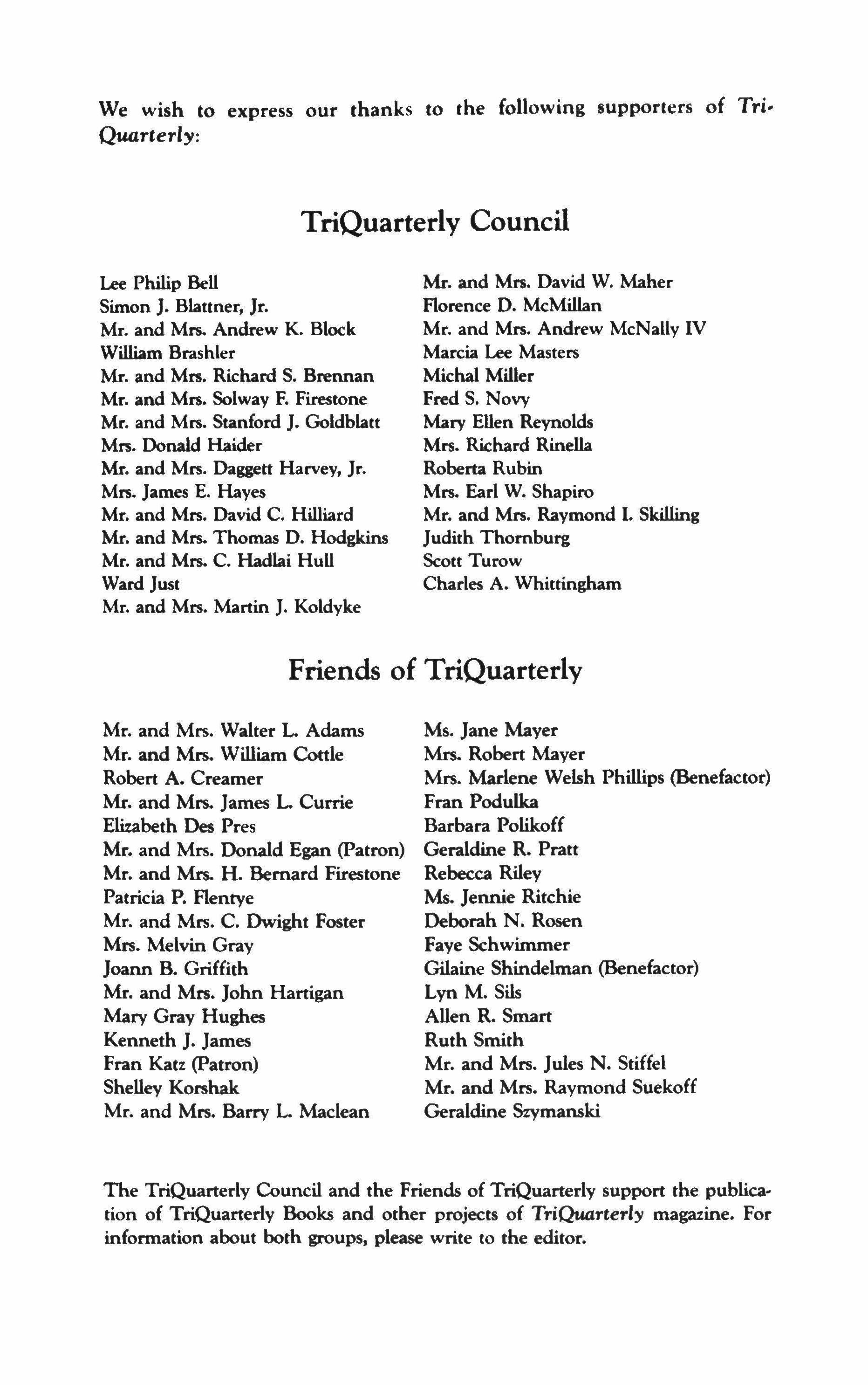
Lee Philip Bell
Simon J. Blattner, Jr.
Mr. and Mrs. Andrew K. Block
William Brashier
Mr. and Mrs. Richard S. Brennan
Mr. and Mrs. Solway F. Firestone
Mr. and Mrs. Stanford J. Goldblatt
Mrs. Donald Haider
Mr. and Mrs. Daggett Harvey, Jr.
Mrs. James E. Hayes
Mr. and Mrs. David C. Hilliard
Mr. and Mrs. Thomas D. Hodgkins
Mr. and Mrs. C. Hadlai Hull
Ward Just
Mr. and Mrs. Martin J. Koldvke
Mr. and Mrs. David W. Maher
Florence D. McMillan
Mr. and Mrs. Andrew McNally IV
Marcia Lee Masters
Michal Miller
Fred S. Novy
Mary Ellen Reynolds
Mrs. Richard Rinella
Roberta Rubin
Mrs. Earl W. Shapiro
Mr. and Mrs. Raymond I. Skilling
Judith Thornburg
Scott Turow
Charles A. Whittingham
Friends of TriQuarterly
Mr. and Mrs. Walter 1.. Adams
Mr. and Mrs. William Cottle
Robert A. Creamer
Mr. and Mrs. James 1.. Currie
Elizabeth Des Pres
Mr. and Mrs. Donald Egan (patron)
Mr. and Mrs. H. Bernard Firestone
Patricia P. Flentye
Mr. and Mrs. C. Dwight Foster
Mrs. Melvin Gray
Joann B. Griffith
Mr. and Mrs. John Hartigan
Mary Gray Hughes
Kenneth J. James
Fran Katz (patron)
Shelley Korshak
Mr. and Mrs. Barry L Maclean
Ms. Jane Mayer
Mrs. Robert Mayer
Mrs. Marlene Welsh Phillips (Benefactor)
Fran Podulka
Barbara Polikoff
Geraldine R. Pratt
Rebecca Riley
Ms. Jennie Ritchie
Deborah N. Rosen
Faye Schwimmer
Gilaine Shindelman (Benefactor)
Lyn M. Sits
Allen R. Smart
Ruth Smith
Mr. and Mrs. Jules N. Stiffel
Mr. and Mrs. Raymond Suekoff
Geraldine Szymanski
The TriQuarterly Council and the Friends of TriQuarterly support the publication of TriQuarterly Books and other projects of TriQuarterly magazine. For information about both groups, please write to the editor.
Yolanda Barnes
Joyce Carol Oates
Richard Burgin
Susan Bailey
Antonya Nelson
Jim Powell
Istvan Csukas
Albert Coldbarth
Sandra McPherson
M. Wyrebek
Teresa Cader
B. H. Fairchild
Carolyne Wright
Stephen Berg

$9.95
.----
.-











































































































































 By Heinz Seelig
By Heinz Seelig
















































































































































